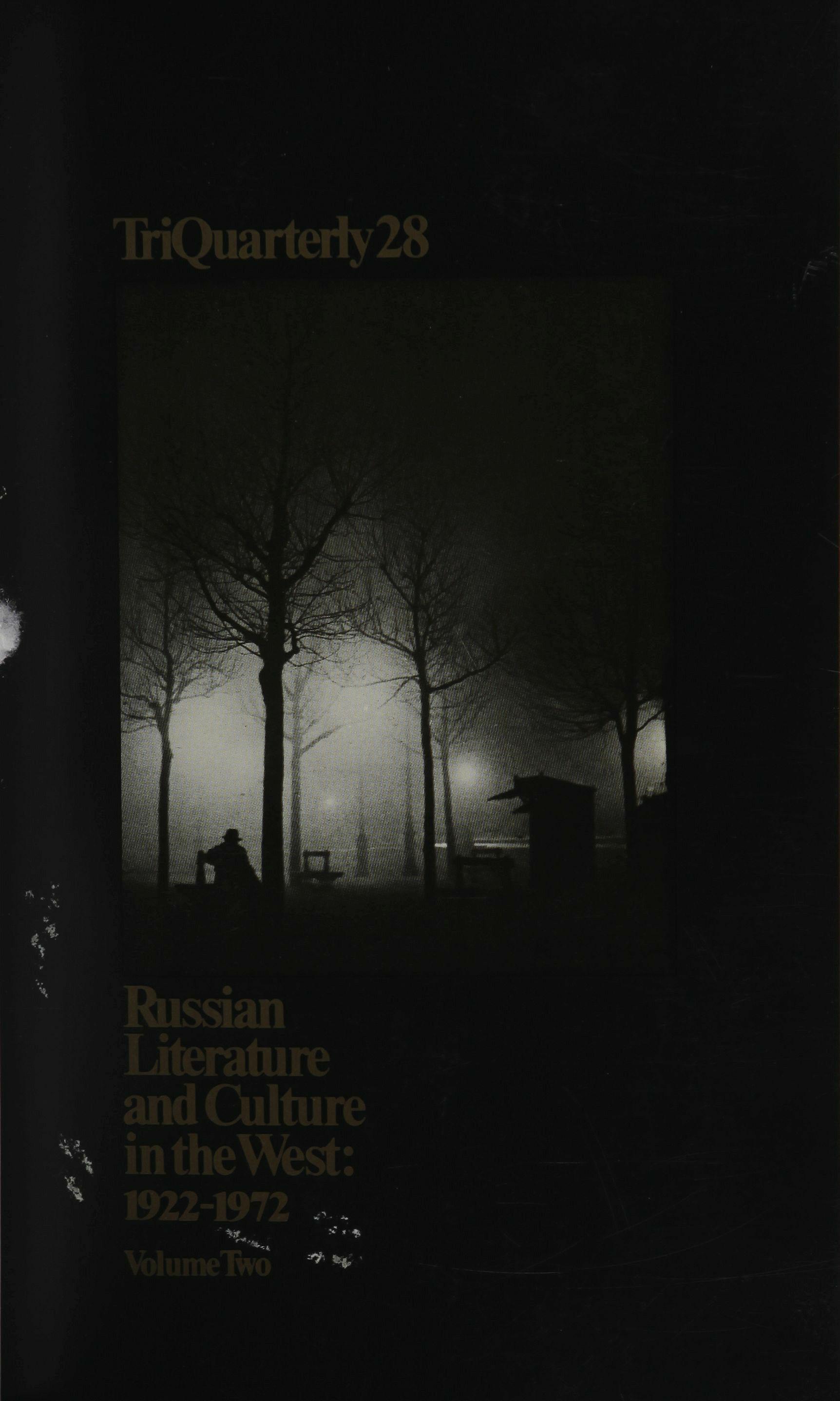

NORTHWESTERN UNIVERSITY ARCHIVES
EVANSTON, ILLINOIS
Charles Newman
EDITOR •.•••.••..••••.•..
GUEST CO-EDITORS
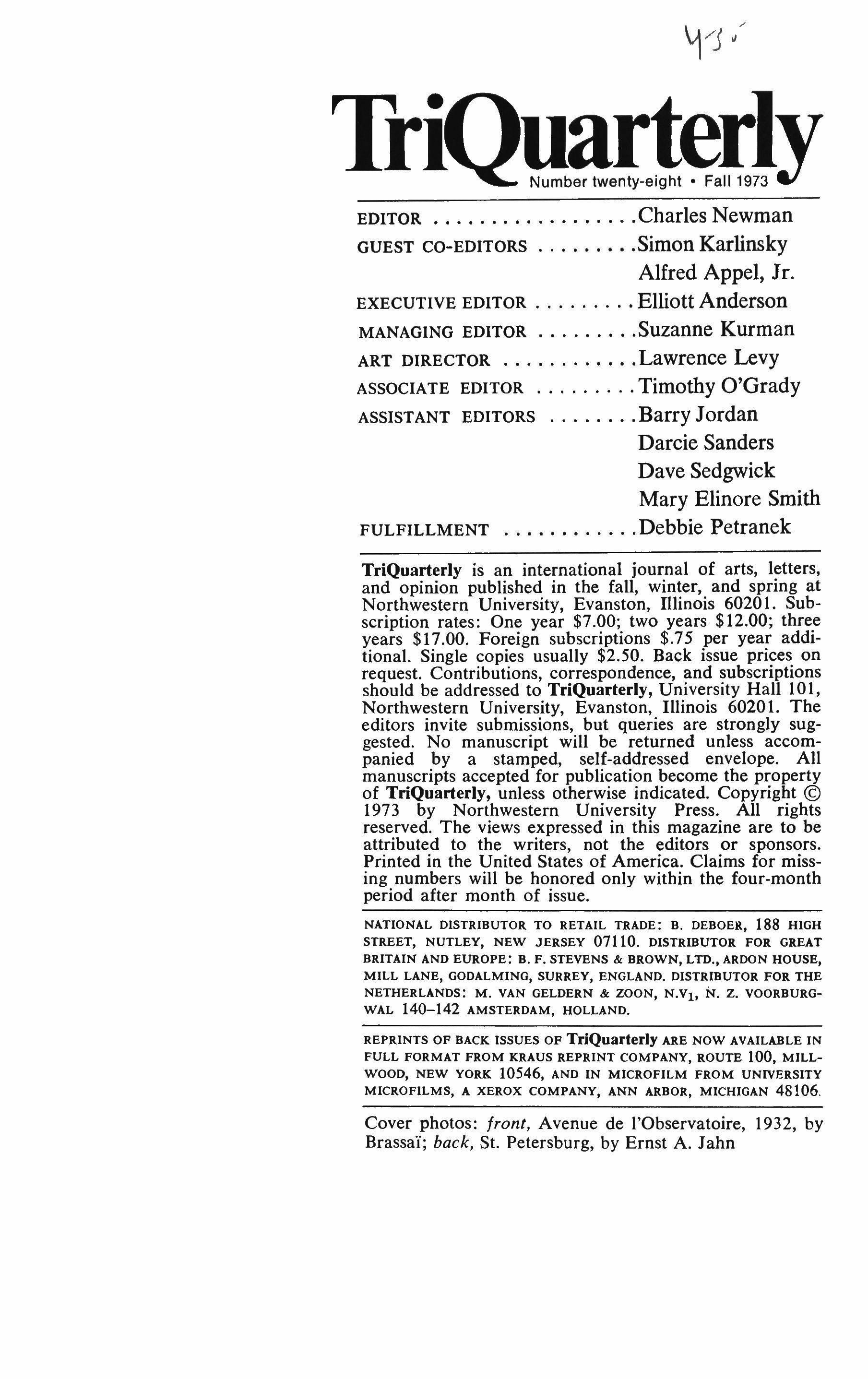
Simon Karlinsky
Alfred Appel, Jr.
EXECUTIVE EDITOR ........• Elliott Anderson
MANAGING EDITOR Suzanne Kurman
ART DIRECTOR Lawrence Levy
ASSOCIATE EDITOR
ASSISTANT EDITORS
FULFILLMENT
Timothy O'Grady
Barry Jordan
Darcie Sanders
Dave Sedgwick
Mary Elinore Smith
Debbie Petranek
TriQuarterly is an international journal of arts, letters, and opinion published in the fall, winter, and spring at Northwestern University, Evanston, Illinois 60201. Subscription rates: One year $7.00; two years $12.00; three years $17.00. Foreign subscriptions $.75 per year additional. Single copies usually $2.50. Back issue prices on request. Contributions, correspondence, and subscriptions should be addressed to TriQuarterly, University Hall 101, Northwestern University, Evanston, Illinois 60201. The editors invite submissions, but queries are strongly suggested. No manuscript will be returned unless accompanied by a stamped, self-addressed envelope. All manuscripts accepted for publication become the property of TriQuarterly, unless otherwise indicated. Copyright © 1973 by Northwestern University Press. All rights reserved. The views expressed in this magazine are to be attributed to the writers, not the editors or sponsors. Printed in the United States of America. Claims for missing numbers will be honored only within the four-month period after month of issue.
NATIONAL DISTRIBUTOR TO RETAIL TRADE: B. DEBOER, 188 HIGH STREET, NUTLEY, NEW JERSEY 07110. DISTRIBUTOR FOR GREAT BRITAIN AND EUROPE: B. F. STEVENS & BROWN, LTD., ARDON HOUSE, MILL LANE, GODALMING, SURREY, ENGLAND. DISTRIBUTOR FOR THE NETHERLANDS: M. VAN GELDERN & ZOON, N.Vl, N. Z. VOORBURGWAL 140-142 AMSTERDAM, HOLLAND.
REPRINTS OF BACK ISSUES OF TriQuarterly ARE NOW AVAILABLE IN FULL FORMAT FROM KRAUS REPRINT COMPANY, ROUTE 100, MILLWOOD, NEW YORK 10546, AND IN MICROFILM FROM UNIVERSITY MICROFILMS, A XEROX COMPANY, ANN ARBOR, MICHIGAN 48106.
Cover photos: front, Avenue de l'Observatoire, 1932, by Brassai; back, St. Petersburg, by Ernst A. Jahn
TriQmrWrJy
In the last issue, number twenty-seven, spring 1973
SIMON KARLINSKY
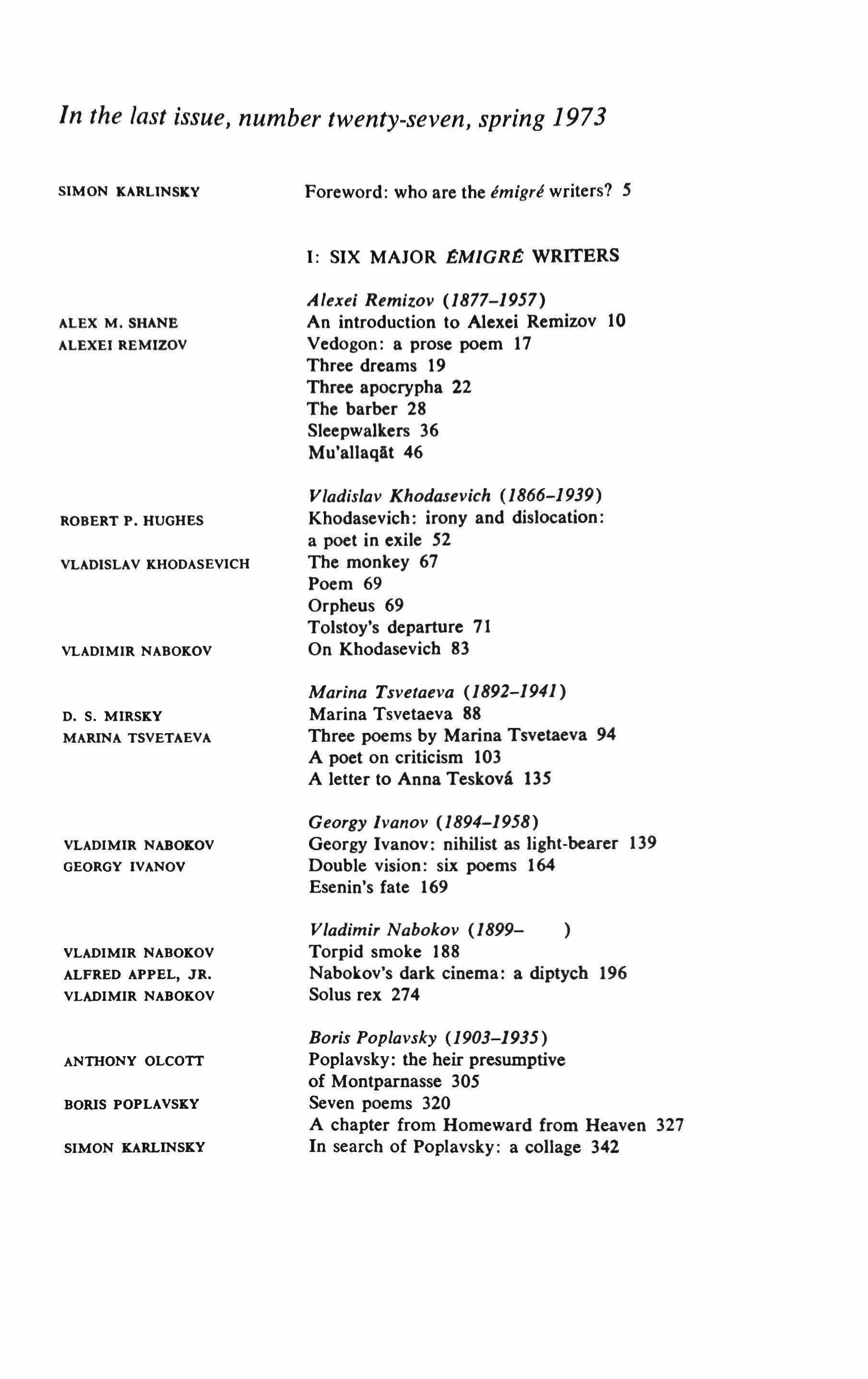
ALEX M. SHANE
ALEXEI REMIZOV
ROBERT P. HUGHES
VLADISLAV KHODASEVICH
Foreword: who are the emigre writers? 5
I: SIX MAJOR £MIGR£ WRITERS
Alexei Remizov (1877-1957)
An introduction to Alexei Remizov 10
Vedogon: a prose poem 17
Three dreams 19
Three apocrypha 22
The barber 28
Sleepwalkers 36
Mu'allaqAt 46
Vladislav Khodasevich (1866-1939)
Khodasevich: irony and dislocation:
a poet in exile 52
The monkey 67
Poem 69
Orpheus 69
Tolstoy's departure 71
On Khodasevich 83
VLADIMIR NABOKOV
D. S. MIRSKY
MARINA TSVETAEVA
VLADIMIR NABOKOV
GEORGY IVANOV
VLADIMIR NABOKOV
ALFRED APPEL, .JR.
VLADIMIR NABOKOV
ANTHONY OLCOTT
BORIS POPLAVSKY
SIMON KARLINSKY
Marina Tsvetaeva (1892-1941)
Marina Tsvetaeva 88
Three poems by Marina Tsvetaeva 94
A poet on criticism 103
A letter to Anna Teskova 135
Georgy Ivanov (1894-1958)
Georgy Ivanov: nihilist as light-bearer 139
Double vision: six poems 164
Esenin's fate 169
Vladimir Nabokov (1899Torpid smoke 188
Nabokov's dark cinema: a diptych 196
Solus rex 274
Boris Poplavsky (1903-1935)
Poplavsky: the heir presumptive of Montparnasse 305
Seven poems 320
A chapter from Homeward from Heaven 327
In search of Poplavsky: a collage 342
In this issue, number twenty-eight, fall 1973
II: MUSIC
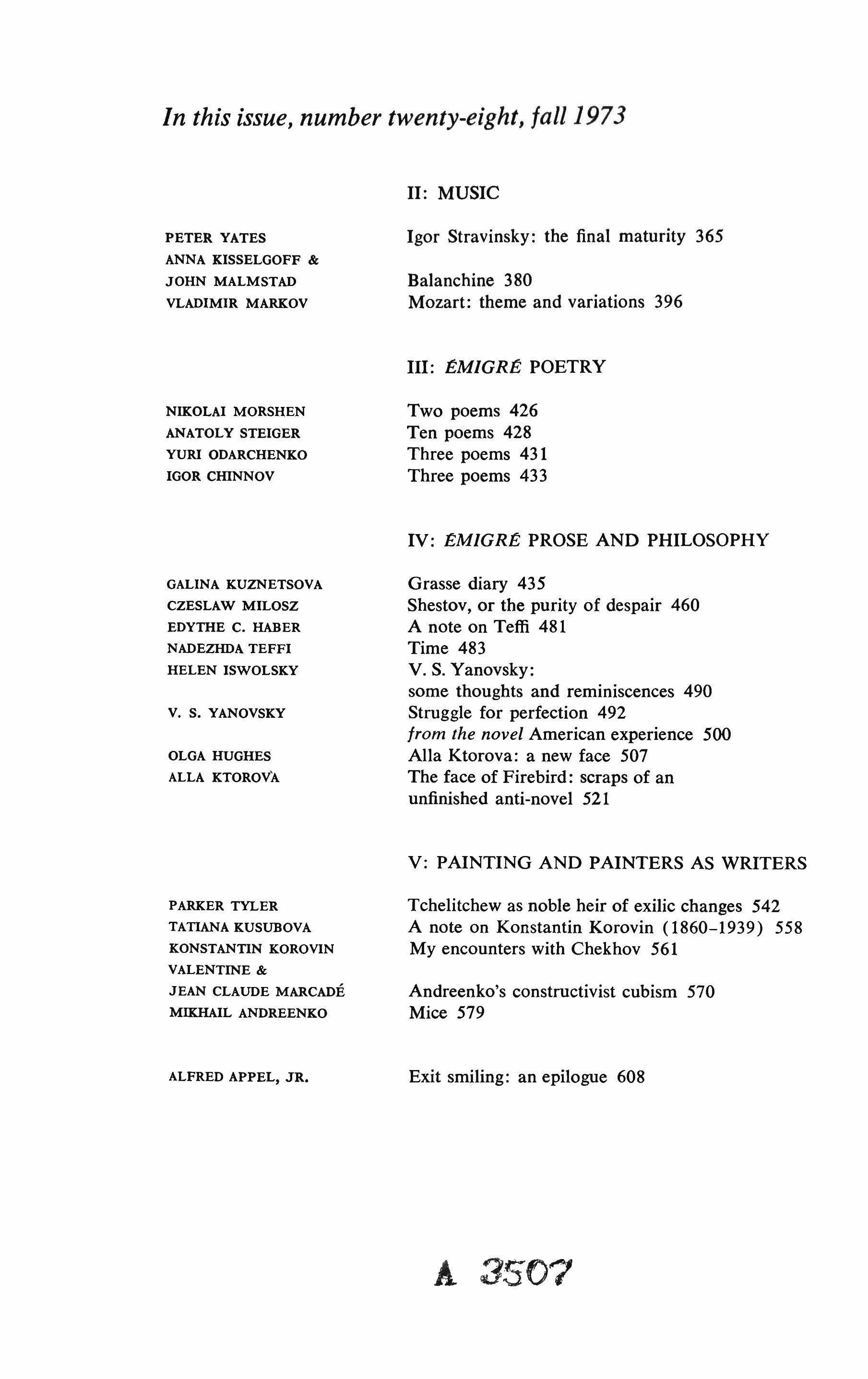
PETER YATES
ANNA KISSELGOFF & JOHN MALMSTAD
VLADIMIR MARKOV
NIKOLAI MORSHEN
ANATOLY STEIGER
YURI ODARCHENKO
IGOR CIDNNOV
GAUNA KUZNETSOVA
CZESLAW MILOSZ
EDYTHE C. HABER
NADEZHDA TEFFI
HELEN ISWOLSKY
V. S. YANOVSKY
OLGA HUGHES
ALLA KTOROv'A
PARKER TYLER
TATIANA KUSUBOVA
KONSTANTIN KOROVIN
VALENTINE &
JEAN CLAUDE MARCADE
MIKHAIL ANDREENKO
ALFRED APPEL, JR.
Igor Stravinsky: the final maturity 365
Balanchine 380
Mozart: theme and variations 396
III: EMIGRE POETRY
Two poems 426
Ten poems 428
Three poems 431
Three poems 433
IV: EMIGRE PROSE AND PHILOSOPHY
Grasse diary 435
Shestov, or the purity of despair 460
A note on Teffi 481
Time 483
V. S. Yanovsky: some thoughts and reminiscences 490 Struggle for perfection 492 from the novel American experience 500
AIla Ktorova: a new face 507 The face of Firebird: scraps of an unfinished anti-novel 521
V: PAINTING AND PAINTERS AS WRITERS
Tchelitchew as noble heir of exilic changes 542
A note on Konstantin Korovin (1860-1939) 558 My encounters with Chekhov 561
Andreenko's constructivist cubism 570 Mice 579
Exit smiling: an epilogue 608
A 3507
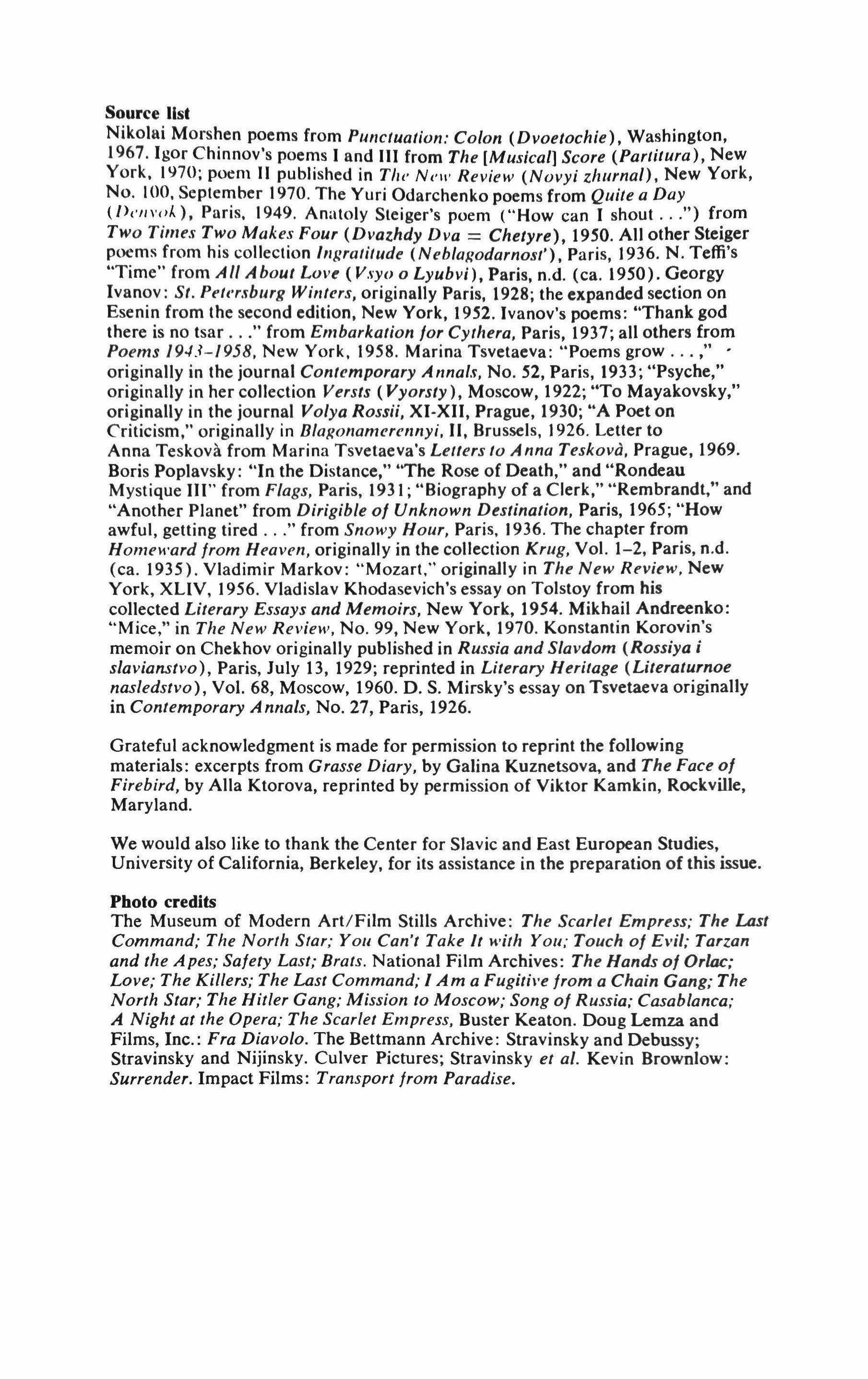
Source list
Nikolai Morshen poems from Punctuation: Colon iDvoetochle), Washington, 1967. Igor Chinnov's poems I and III from The [Musical] Score (Panitura), New York, 1970; poem II published in The NI'II' Review (Novyi zhurnal), New York, No. 100, September 1970. The Yuri Odarchenko poems from Quite a Day (1)('/1\'0/..), Paris, 1949. Anatoly Steiger's poem ("How can I shout ") from Two Times Two Makes Four (Dvazhdy Dva = Chetyre), 1950. All other Steiger poems from his collection Ingratitude iNebiagodarnost'Y, Paris, 1936. N. Teffi's "Time" from A II About Love ( V.I'Yo 0 Lyubvi), Paris, n.d. (ca. 1950). Georgy Ivanov: St. Petersburg Winters, originally Paris, 1928; the expanded section on Esenin from the second edition, New York, 1952. Ivanov's poems: "Thank god there is no tsar from Embarkation for Cythera, Paris, 1937; all others from Poems /9·U-1958, New York, 1958. Marina Tsvetaeva: "Poems grow ," originally in the journal Contemporary Annals, No. 52, Paris, 1933; "Psyche," originally in her collection Versts (Vyorsty), Moscow, 1922; "To Mayakovsky," originally in the journal Volya Rossii, XI-XII, Prague, 1930; "A Poet on Criticism," originally in Blagonamerennyi, II, Brussels, 1926. Letter to Anna Teskova from Marina Tsvetaeva's Letters to Anna Teskova, Prague, 1969. Boris Poplavsky: "In the Distance," "The Rose of Death," and "Rondeau Mystique III" from Flags, Paris, 1931; "Biography of a Clerk," "Rembrandt," and "Another Planet" from Dirigible of Unknown Destination, Paris, 1965; "How awful, getting tired from Snowy Hour, Paris, 1936. The chapter from Homeward from Heaven, originally in the collection Krug, Vol. 1-2, Paris, n.d. (ca. 1935). Vladimir Markov: "Mozart," originally in The New Review, New York, XLIV, 1956. Vladislav Khodasevich's essay on Tolstoy from his collected Literary Essays and Memoirs, New York, 1954. Mikhail Andreenko: "Mice," in The New Review, No. 99, New York, 1970. Konstantin Korovin's memoir on Chekhov originally published in Russia and Slavdom (Rossiya i slavianstvo), Paris, July 13, 1929; reprinted in Literary Heritage (Literatumoe nasledstvo); Vol. 68, Moscow, 1960. D. S. Mirsky's essay on Tsvetaeva originally in Contemporary Annals, No. 27, Paris, 1926.
Grateful acknowledgment is made for permission to reprint the following materials: excerpts from Grasse Diary, by Galina Kuznetsova, and The Face of Firebird, by Alia Ktorova, reprinted by permission of Viktor Kamkin, Rockville, Maryland.
We would also like to thank the Center for Slavic and East European Studies, University of California, Berkeley, for its assistance in the preparation of this issue.
Photo credits
The Museum of Modern Art/Film Stills Archive: The Scarlet Empress; The Last Command; The North Star; You Can't Take It with You; Touch of E�'iI; Tarzan and the Apes; Safety Last; Brats. National Film Archives: The Hands of Orlac; Love; The Killers; The Last Command; I Am a Fugitive from a Chain Gang; The North Star; The Hitler Gang; Mission to Moscow; Song of Russia; Casablanca; A Night at the Opera; The Scarlet Empress, Buster Keaton. Doug Lemza and Films, Inc.: Fra Diavolo. The Bettmann Archive: Stravinsky and Debussy; Stravinsky and Nijinsky, Culver Pictures; Stravinsky et al. Kevin Brownlow: Surrender. Impact Films: Transport from Paradise.
Igor Stravinsky: the final maturity
PETER YATES
)l,f\Pb-nTHUl\ CKI\3KI\·bAJIETb 60 1)·110 KI'\I"THtlI'\Xb.

L'OISEJ-IO DE FEll,
C01'(Tf O.f\NS£ E."I 2 TI\BLf.1\(JX
Igor Strawlnsky.
With the death of Igor Stravinsky and of Carl Ruggles, both in 1971, the generation that created 20th century music has ended. Ruggles, who lived the longest, wrote the least; a performance of his complete works at Bennington in 1968 filled so much less than one evening concert that his largest work, Sun Treader, was repeated. Stravinsky, the beloved Haydn of our era, poured out compositions almost without interruption lifelong, yet, as the intervening short life of Mozart was necessary to the final maturity of Haydn, so Stravinsky's belated discovery of Schoenberg opened for him a new potency. Whether this late product was a final maturity or a turning aside has been fiercely debated. Stravinsky himself seems never to have doubted that it was a step forward, although he was inclined in public utterance to give equal or more credit to his slightly later discovery of Webern. I would say that the revelation came through Schoenberg, the congeniality of the new
ABOVE PHOTO: The first edition of The Firebird score (1910), inscribed by Stravinsky "50 years later"(!) for James J, Fuld, author of The Book of WorldFamous Music. (Photo courtesy James J. Fuld.)
TrlQuarterly 365
�.----.-.....(/.�--,<',�,,/ Hropa c;���mmo.�T�';-j]--�? �(.>,L--7 "9 ..::..
�.r;:""
�'i

practice from Webern. Stravinsky's music of the last years was not a change of direction but a fulfillment.
The true change was internal. In Stravinsky'S statement: "Today harmonic novelty is at an end. As a means of musical instruction, harmony offers no further resources in which to inquire and from which to seek profit. The contemporary ear and brain require a completely different approach to music."
Simple enough! the innovators exclaim. Throw out tradition with harmony, throw out order with tradition. Destruction is not reconstitution; the fathers of 20th century musical freedom, with release, probed difficulty.
Ruggles vehemently condemned Stravinsky for writing other men's music. You couldn't argue the point with Carl; he was stone deaf. Carl held firmly to the belief that every note of every measure one wrote must be one's own original conception; in that granitic purpose he reworked and rewrote his few compositions. The polyglot Stravinsky appropriated whatever he came on in sound or organizing method that seemed appropriate to himself. "One does not borrow, one steals," he quoted to me. "One does not imitate, one makes one's own." The score of Threni brings together Monteverdi, the tone-row, and the choral speaking-singing of Schoenberg's Moses and Aron and De Profundis. "I like very much the speaking-singing of Schoenberg's later compositions," Stravinsky said to me. Yet anyone hearing Threni (1961) and The Wedding (1914-1923) in succession must agree that each measure of rhythm, each isolate timbral composite, Jeremiah or Muzhik, speak and sound the one Stravinsky.
So much for originality. There is only music fully made or insufficiently made-s-pastiche. Well-organized pastiche furnishes the 'Commonplace originality of every generation. The cluttering craftsmanship of the contemporaries falls away, and a younger generation inherits what remains, the essential workmanship of the generation preceding the last. Today the generation preceding the last is that of Schoenberg, Ruggles, Webem, and Stravinsky. Also Ives, on whose music Stravinsky'S highest praise lighted in the 1960's, to be afterwards characteristically qualified. The block-
366
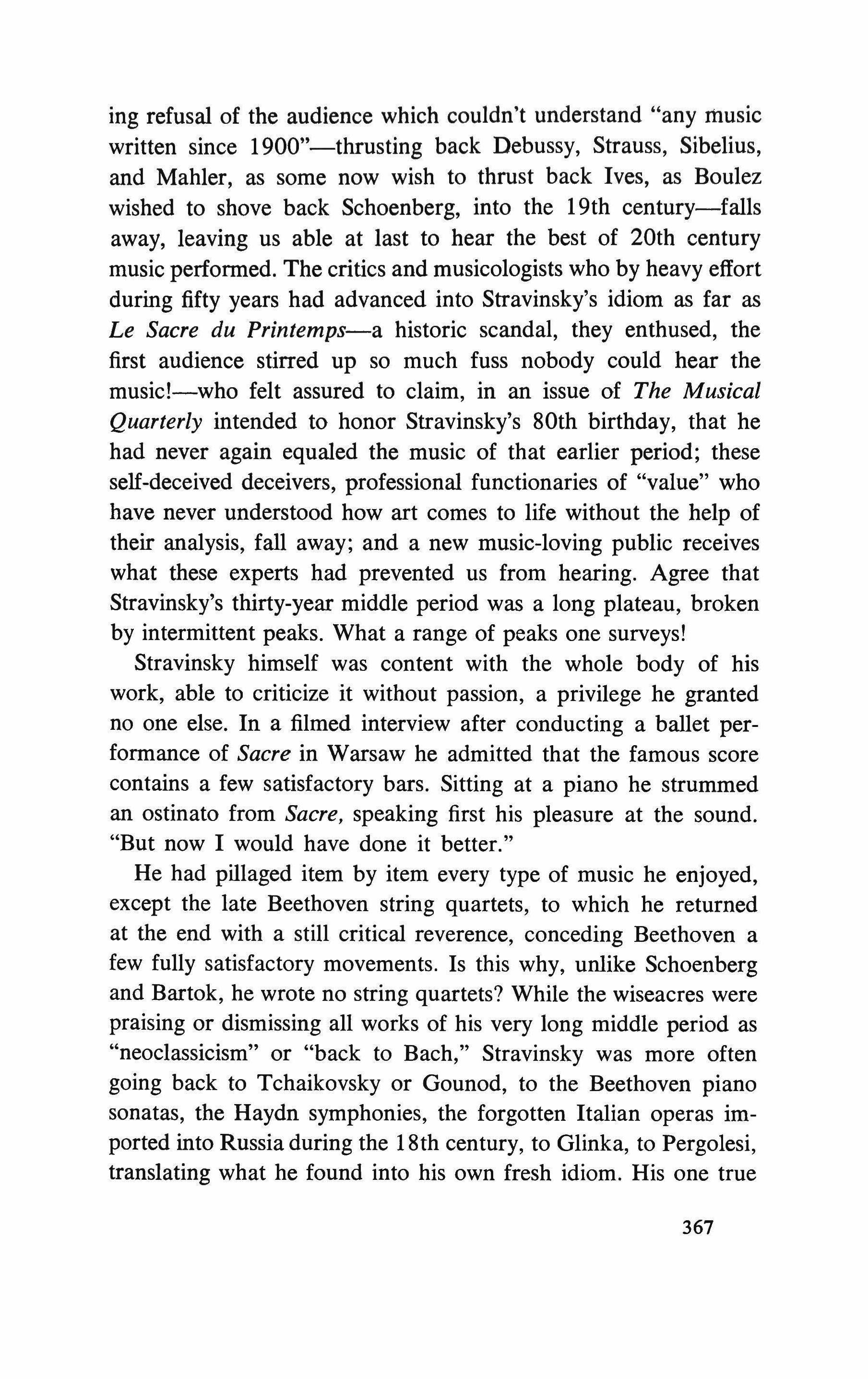
ing refusal of the audience which couldn't understand "any music written since 1900"-thrusting back Debussy, Strauss, Sibelius, and Mahler, as some now wish to thrust back Ives, as Boulez wished to shove back Schoenberg, into the 19th century-falls away, leaving us able at last to hear the best of 20th century music performed. The critics and musicologists who by heavy effort during fifty years had advanced into Stravinsky's idiom as far as Le Sacre du Printemps-a historic scandal, they enthused, the first audience stirred up so much fuss nobody could hear the music!-who felt assured to claim, in an issue of The Musical Quarterly intended to honor Stravinsky's 80th birthday, that he had never again equaled the music of that earlier period; these self-deceived deceivers, professional functionaries of "value" who have never understood how art comes to life without the help of their analysis, fall away; and a new music-loving public receives what these experts had prevented us from hearing. Agree that Stravinsky's thirty-year middle period was a long plateau, broken by intermittent peaks. What a range of peaks one surveys!
Stravinsky himself was content with the whole body of his work, able to criticize it without passion, a privilege he granted no one else. In a filmed interview after conducting a ballet performance of Sacre in Warsaw he admitted that the famous score contains a few satisfactory bars. Sitting at a piano he strummed an ostinato from Sacre, speaking first his pleasure at the sound. "But now I would have done it better."
He had pillaged item by item every type of music he enjoyed, except the late Beethoven string quartets, to which he returned at the end with a still critical reverence, conceding Beethoven a few fully satisfactory movements. Is this why, unlike Schoenberg and Bartok, he wrote no string quartets? While the wiseacres were praising or dismissing all works of his very long middle period as "neoclassicism" or "back to Bach," Stravinsky was more often going back to Tchaikovsky or Gounod, to the Beethoven piano sonatas, the Haydn symphonies, the forgotten Italian operas imported into Russia during the 18th century, to Glinka, to Pergolesi, translating what he found into his own fresh idiom. His one true
367
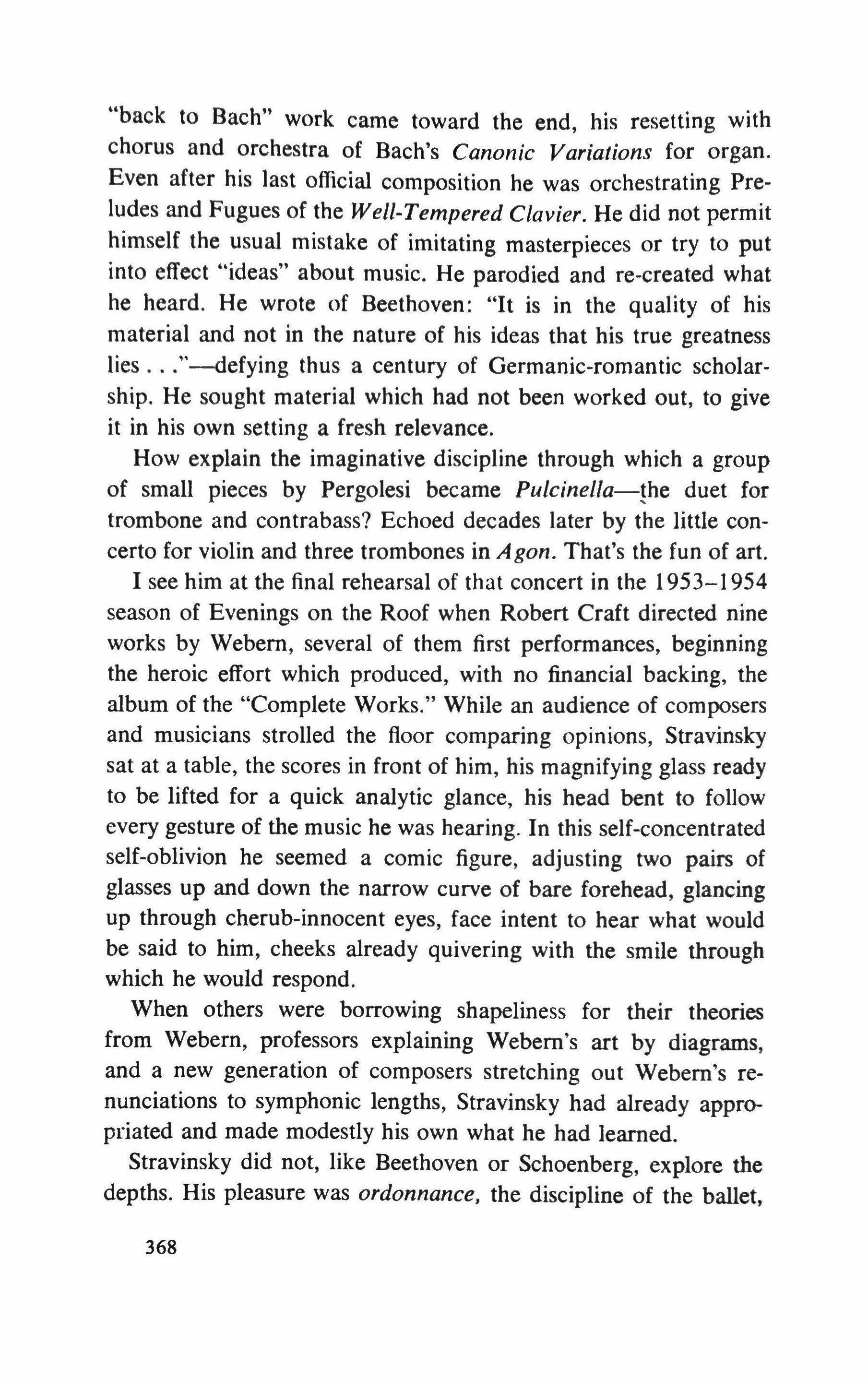
"back to Bach" work came toward the end, his resetting with chorus and orchestra of Bach's Canonic Variations for organ. Even after his last official composition he was orchestrating Preludes and Fugues of the Well-Tempered Clavier. He did not permit himself the usual mistake of imitating masterpieces or try to put into effect "ideas" about music. He parodied and re-created what he heard. He wrote of Beethoven: "It is in the quality of his material and not in the nature of his ideas that his true greatness lies "--defying thus a century of Germanic-romantic scholarship. He sought material which had not been worked out, to give it in his own setting a fresh relevance.
How explain the imaginative discipline through which a group of small pieces by Pergolesi became Pulcinella-!he duet for trombone and contrabass? Echoed decades later by the little concerto for violin and three trombones in Agon. That's the fun of art.
I see him at the final rehearsal of that concert in the 1953-1954 season of Evenings on the Roof when Robert Craft directed nine works by Webem, several of them first performances, beginning the heroic effort which produced, with no financial backing, the album of the "Complete Works." While an audience of composers and musicians strolled the floor comparing opinions, Stravinsky sat at a table, the scores in front of him, his magnifying glass ready to be lifted for a quick analytic glance, his head bent to follow every gesture of the music he was hearing. In this self-concentrated self-oblivion he seemed a comic figure, adjusting two pairs of glasses up and down the narrow curve of bare forehead, glancing up through cherub-innocent eyes, face intent to hear what would be said to him, cheeks already quivering with the smile through which he would respond.
When others were borrowing shapeliness for their theories from Webem, professors explaining Webern's art by diagrams, and a new generation of composers stretching out Webern's renunciations to symphonic lengths, Stravinsky had already appropriated and made modestly his own what he had learned.
Stravinsky did not, like Beethoven or Schoenberg, explore the depths. His pleasure was ordonnance, the discipline of the ballet,
368

the precise movement, the illuminated stage, the gesture sufficient to itself, not caught up in the superreality of drama. Sacre had gone too far; he preferred not to go that way again. Only through the religious music did he a little reveal what was inward to him, and there too he preferred not the questioning of Schoenberg but a formality of ritual celebration. I believe that may have been why, during the later years, he so often performed the Symphony of Psalms. His Oedipus Rex is deliberately not a tragedy of human beings; he twice returned the libretto to Cocteau asking him to make it "more banal," and for that reason he had the text translated into the impersonality of Latin. At the first performance in Philadelphia nine-foot puppets slowly gestured the roles, while the singers, sitting around the great mound that was Matzenauer, performed as in an oratorio.
It was possible to guess before he said so that the Symphony in Three Movements responded to the Second World War, but it is not outwardly a battle symphony or expressive of the subjects he attributed to the three movements. From the Symphonies for Winds, in Memory of Claude Debussy, through the several brief elegiac works of his·later years, to Threni, and the utmost austerity of his own commitment to death, Requiem Canticles, there is a growing, sometimes embittered and defiant sadness. His great career ends in the Canticles; he added one little work, elusive as a smile and dedicated to his wife, Vera, a setting for voice and piano of Edward Lear's The Owl and the Pussycat.
For Schoenberg the stage of the melodic drama was the mind in depth, not easily transferable to the visual stage: the idiom a ceaseless melodic interchange expressive of conflicting, arguingthe chief quality of the music, which is the passionate development of the argument Stravinsky wrote, mentioning also "the songfulness and the humor "-emotions unresolved, symbolic, dreamlike, conceptual, needing only a few registers on the organ of timbral color; the rhythm, at first hearing almost indeterminable, governed by the interweaving phrases. Schoenberg's intricate designing of melodic idiom had early rejected the metrical measure of accompaniment, so familiar in Stravinsky, the ostinati of the 369
Stravinsky and Claude Debussy, 1912, a picture cherished by Stravinsky.
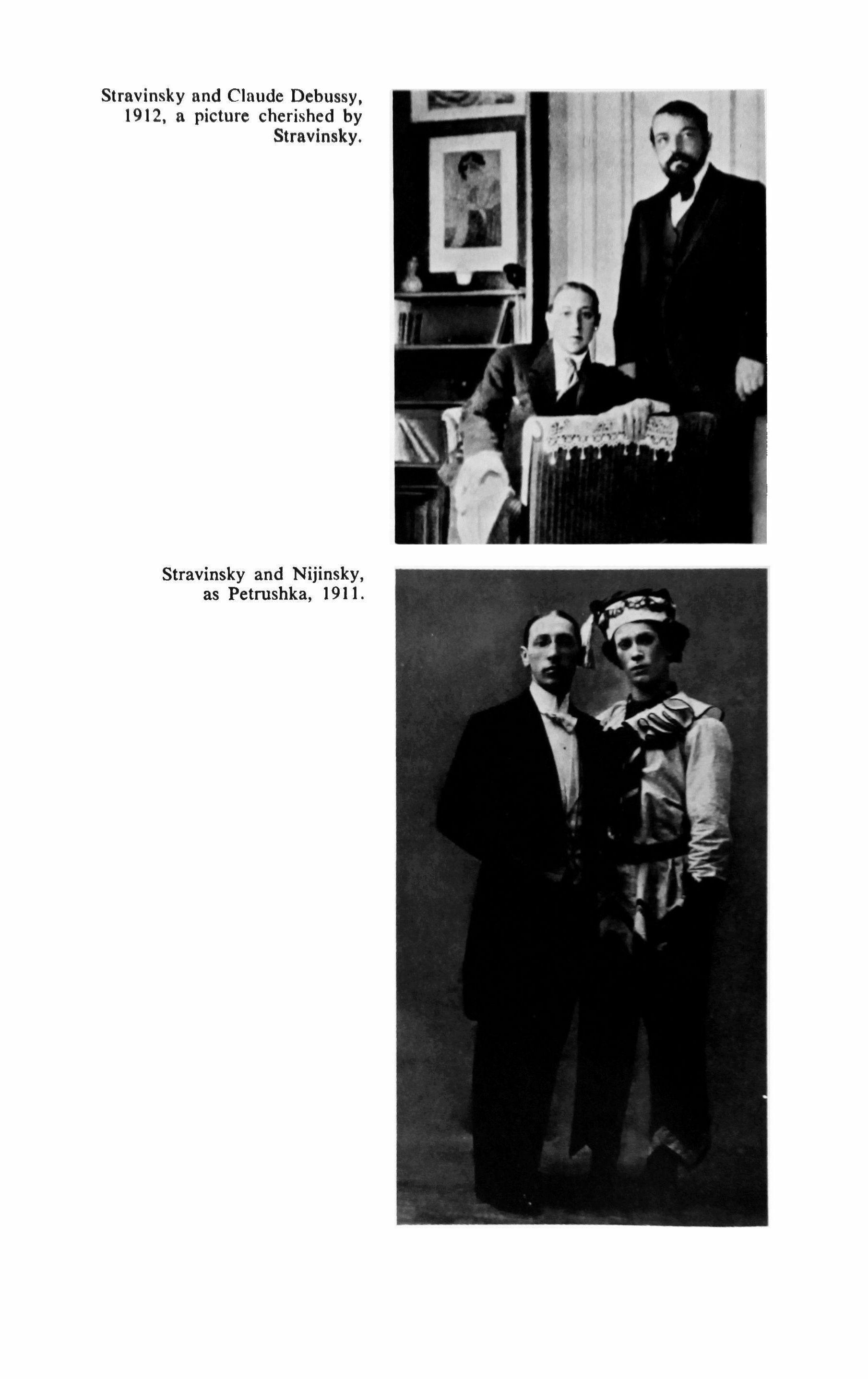
Stravinsky and Nijinsky, as Petrushka, 1911.

Manuscript work-sheet of "Full Fathom Five," second of the Three Songs by William Shakespeare (1953) dedicated to the Evenings on the Roof concerts. Inscribed with a couplet by Stravinsky to Peter Yates: "Who kindled this Roof in the Evenings/For listeners so cool in the day."
� I&J':-�) t'l'.r- l ,,_ "'�r s; ��I';;'I'.�.--t I'" t I tl,/!" :- if : / Ik, "" ", /,;:;,.., I� ; -1-'61' L�. 'f. j+tc��r ·'bL�) .!'-fc. /11 :§1{"_ 1111!; 11101/,'>', t'1'.-/�1 /./S,
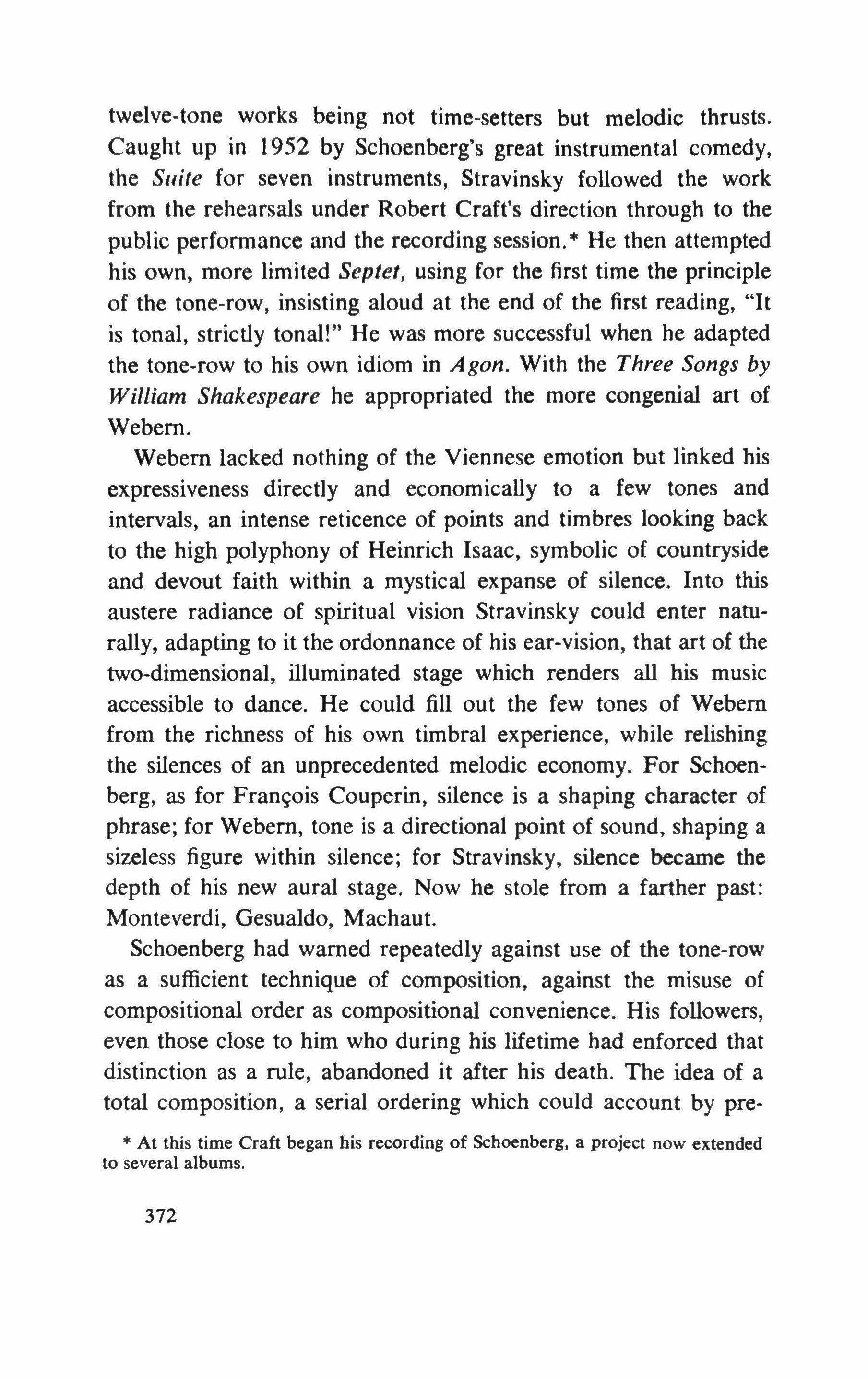
twelve-tone works being not time-setters but melodic thrusts. Caught up in 1952 by Schoenberg's great instrumental comedy, the Suite for seven instruments, Stravinsky followed the work from the rehearsals under Robert Craft's direction through to the public performance and the recording session." He then attempted his own, more limited Septet, using for the first time the principle of the tone-row, insisting aloud at the end of the first reading, "It is tonal, strictly tonal!" He was more successful when he adapted the tone-row to his own idiom in Agon. With the Three Songs by William Shakespeare he appropriated the more congenial art of Webern.
Webern lacked nothing of the Viennese emotion but linked his expressiveness directly and economically to a few tones and intervals, an intense reticence of points and timbres looking back to the high polyphony of Heinrich Isaac, symbolic of countryside and devout faith within a mystical expanse of silence. Into this austere radiance of spiritual vision Stravinsky could enter naturally, adapting to it the ordonnance of his ear-vision, that art of the two-dimensional, illuminated stage which renders all his music accessible to dance. He could fill out the few tones of Webern from the richness of his own timbral experience, while relishing the silences of an unprecedented melodic economy. For Schoenberg, as for Francois Couperin, silence is a shaping character of phrase; for Webern, tone is a directional point of sound, shaping a sizeless figure within silence; for Stravinsky, silence became the depth of his new aural stage. Now he stole from a farther past: Monteverdi, Gesualdo, Machaut.
Schoenberg had warned repeatedly against use of the tone-row as a sufficient technique of composition, against the misuse of compositional order as compositional convenience. His followers, even those close to him who during his lifetime had enforced that distinction as a rule, abandoned it after his death. The idea of a total composition, a serial ordering which could account by pre-
At this time Craft began his recording of Schoenberg, a project now extended to several albums.
372
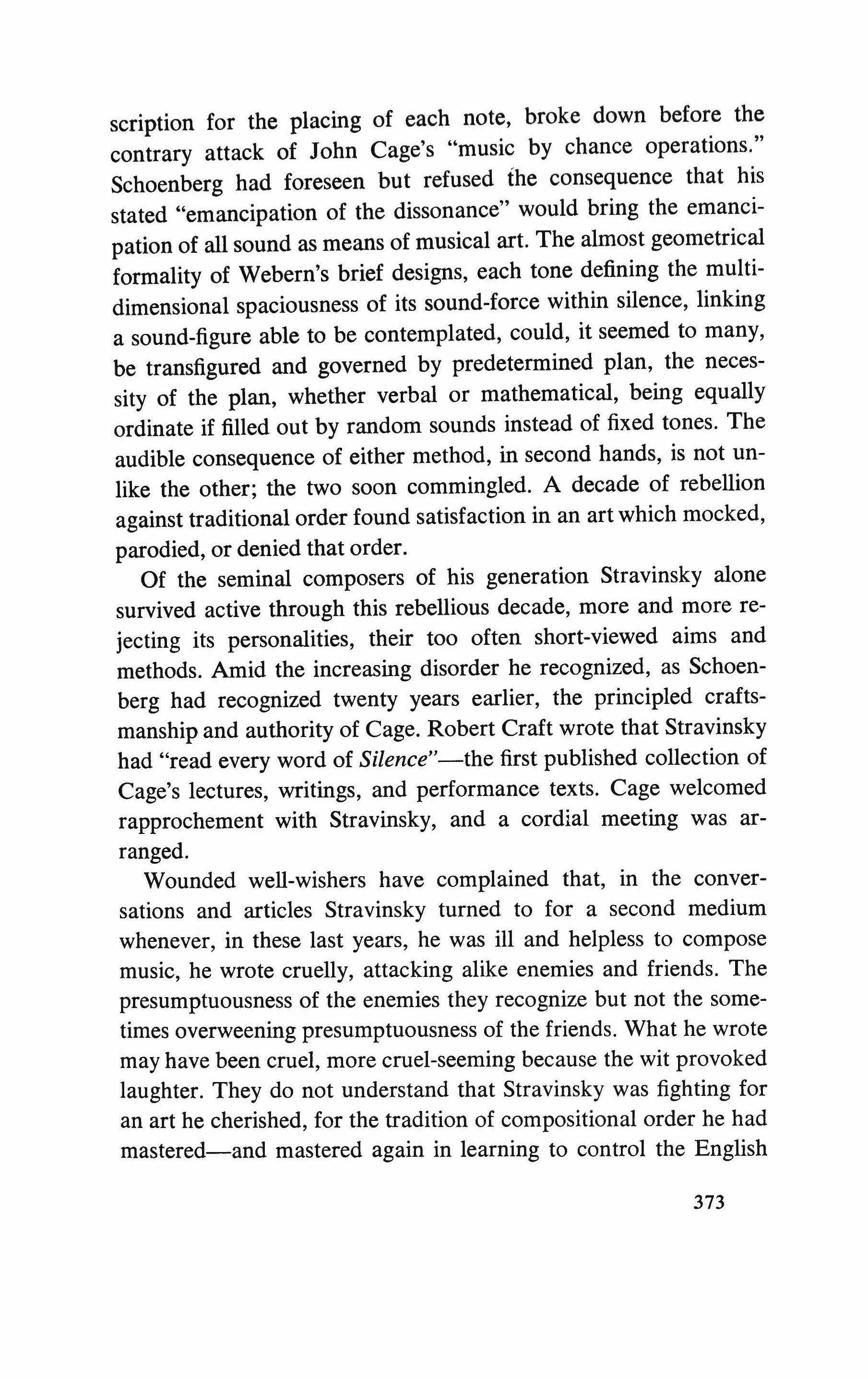
scription for the placing of each note, broke down before the contrary attack of John Cage's "music by chance operations." Schoenberg had foreseen but refused the consequence that his stated "emancipation of the dissonance" would bring the emancipation of all sound as means of musical art. The almost geometrical formality of Webern's brief designs, each tone defining the multidimensional spaciousness of its sound-force within silence, linking a sound-figure able to be contemplated, could, it seemed to many, be transfigured and governed by predetermined plan, the necessity of the plan, whether verbal or mathematical, being equally ordinate if filled out by random sounds instead of fixed tones. The audible consequence of either method, in second hands, is not unlike the other; the two soon commingled. A decade of rebellion against traditional order found satisfaction in an art which mocked, parodied, or denied that order.
Of the seminal composers of his generation Stravinsky alone survived active through this rebellious decade, more and more rejecting its personalities, their too often short-viewed aims and methods. Amid the increasing disorder he recognized, as Schoenberg had recognized twenty years earlier, the principled craftsmanship and authority of Cage. Robert Craft wrote that Stravinsky had "read every word of Silence"-the first published collection of Cage's lectures, writings, and performance texts. Cage welcomed rapprochement with Stravinsky, and a cordial meeting was arranged.
Wounded well-wishers have complained that, in the conversations and articles Stravinsky turned to for a second medium whenever, in these last years, he was ill and helpless to compose music, he wrote cruelly, attacking alike enemies and friends. The presumptuousness of the enemies they recognize but not the sometimes overweening presumptuousness of the friends. What he wrote may have been cruel, more cruel-seeming because the wit provoked laughter. They do not understand that Stravinsky was fighting for an art he cherished, for the tradition of compositional order he had mastered-and mastered again in learning to control the English
373
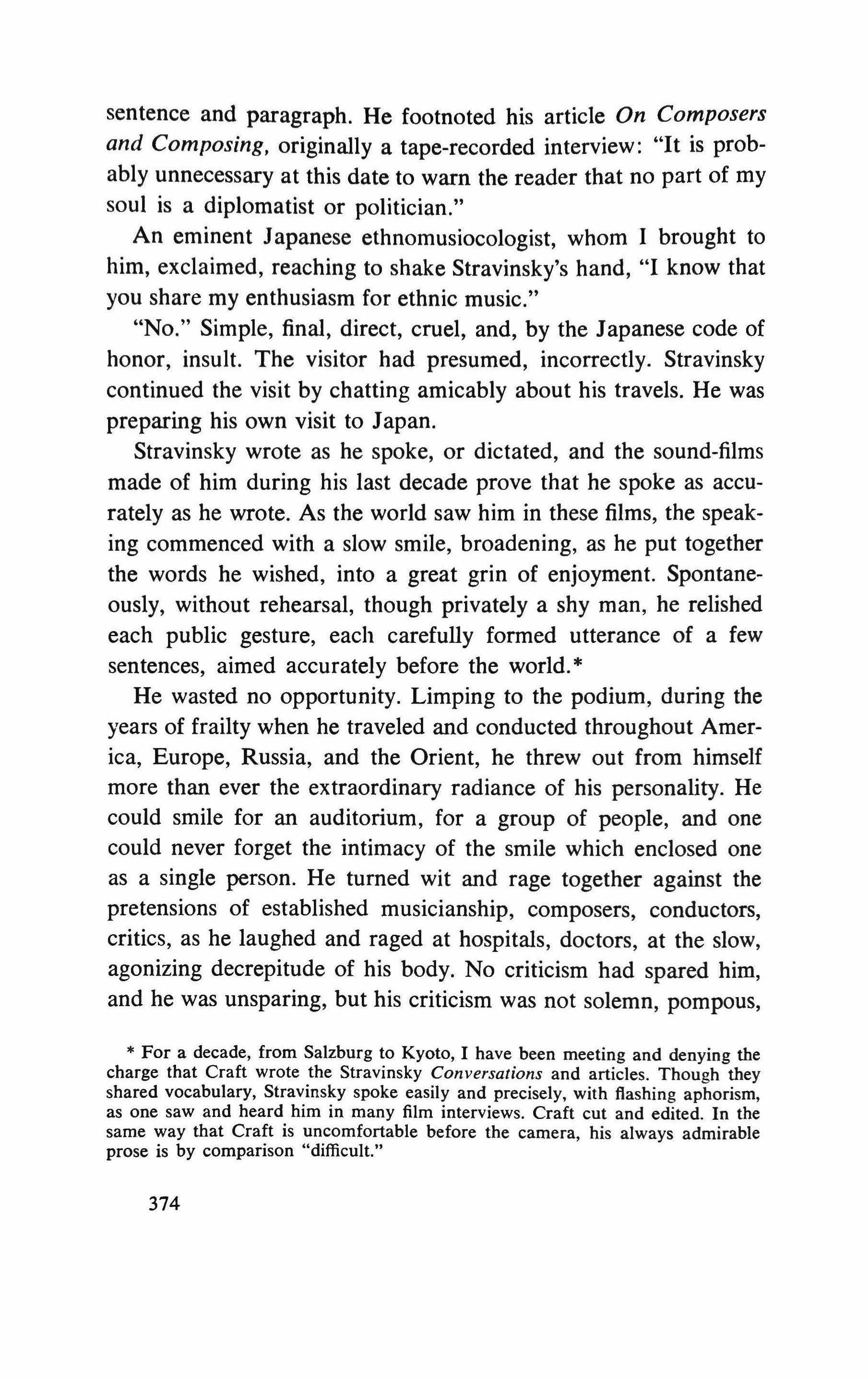
sentence and paragraph. He footnoted his article On Composers and Composing, originally a tape-recorded interview: "It is probably unnecessary at this date to warn the reader that no part of my soul is a diplomatist or politician."
An eminent Japanese ethnomusiocologist, whom I brought to him, exclaimed, reaching to shake Stravinsky's hand, "I know that you share my enthusiasm for ethnic music."
"No." Simple, final, direct, cruel, and, by the Japanese code of honor, insult. The visitor had presumed, incorrectly. Stravinsky continued the visit by chatting amicably about his travels. He was preparing his own visit to Japan.
Stravinsky wrote as he spoke, or dictated, and the sound-films made of him during his last decade prove that he spoke as accurately as he wrote. As the world saw him in these films, the speaking commenced with a slow smile, broadening, as he put together the words he wished, into a great grin of enjoyment. Spontaneously, without rehearsal, though privately a shy man, he relished each public gesture, each carefully formed utterance of a few sentences, aimed accurately before the world. *
He wasted no opportunity. Limping to the podium, during the years of frailty when he traveled and conducted throughout America, Europe, Russia, and the Orient, he threw out from himself more than ever the extraordinary radiance of his personality. He could smile for an auditorium, for a group of people, and one could never forget the intimacy of the smile which enclosed one as a single person. He turned wit and rage together against the pretensions of established musicianship, composers, conductors, critics, as he laughed and raged at hospitals, doctors, at the slow, agonizing decrepitude of his body. No criticism had spared him, and he was unsparing, but his criticism was not solemn, pompous,
* For a decade, from Salzburg to Kyoto, I have been meeting and denying the charge that Craft wrote the Stravinsky Conversations and articles. Though they shared vocabulary, Stravinsky spoke easily and precisely. with flashing aphorism, as one saw and heard him in many film interviews. Craft cut and edited. In the same way that Craft is uncomfortable before the camera, his always admirable prose is by comparison "difficult."
374

or cynical. Formerly, when his ripostes had been spoken, few heard them; when the ripostes commenced appearing in print they hurt.
He had been cut off from his origins, from his Russian past, from the common use of his own language, even from the royalties which signified that the enormously popular early works belonged to him. All through his life he was to see these early works performed instead of his newer compositions because orchestras could perform them without payment. What local of a musicians' union has ever gone on strike to demand fees for composers!
He rewrote his old works in new versions to bring them again under copyright into his possession, but, except when he conducted, orchestra managements chose to perform the works which cost them nothing. Among the critics each new work suffered similar fate: good enough, perhaps, but not another Petrushka. Critics and colleagues decided and agreed that he was not the best conductor of his music. He recorded each new work as rapidly as opportunity permitted and instructed other conductors to take his versions for a model; in a late writing he withdrew this instruction. He countered the critics by criticizing them.
He persisted until he had made himself financially independent, until the public demand to hear his newer works and to see him at least occasionally conduct them, and the recording of his music made him a millionaire. Towards the end of his life, when he was often sick and helpless, attempt was made to take control of his money and the ownership of his manuscripts.
He was one of those rare fortunates whose leisure is in the pursuit of their art. He was happiest when he was composing music; conversing with friends or dictating sentences came second. He preferred composing to hearing or performing his completed compositions. He was devoted to his friends and as grateful for anything they did as he was sharp when anyone presumed against him. Shorter in height than most men and even women around him, the very small, narrow head not homely or ugly, decisively lipped and beaked but certainly not handsome, he had made of his youthful appearance the dandy of the Parisian sketches and 375
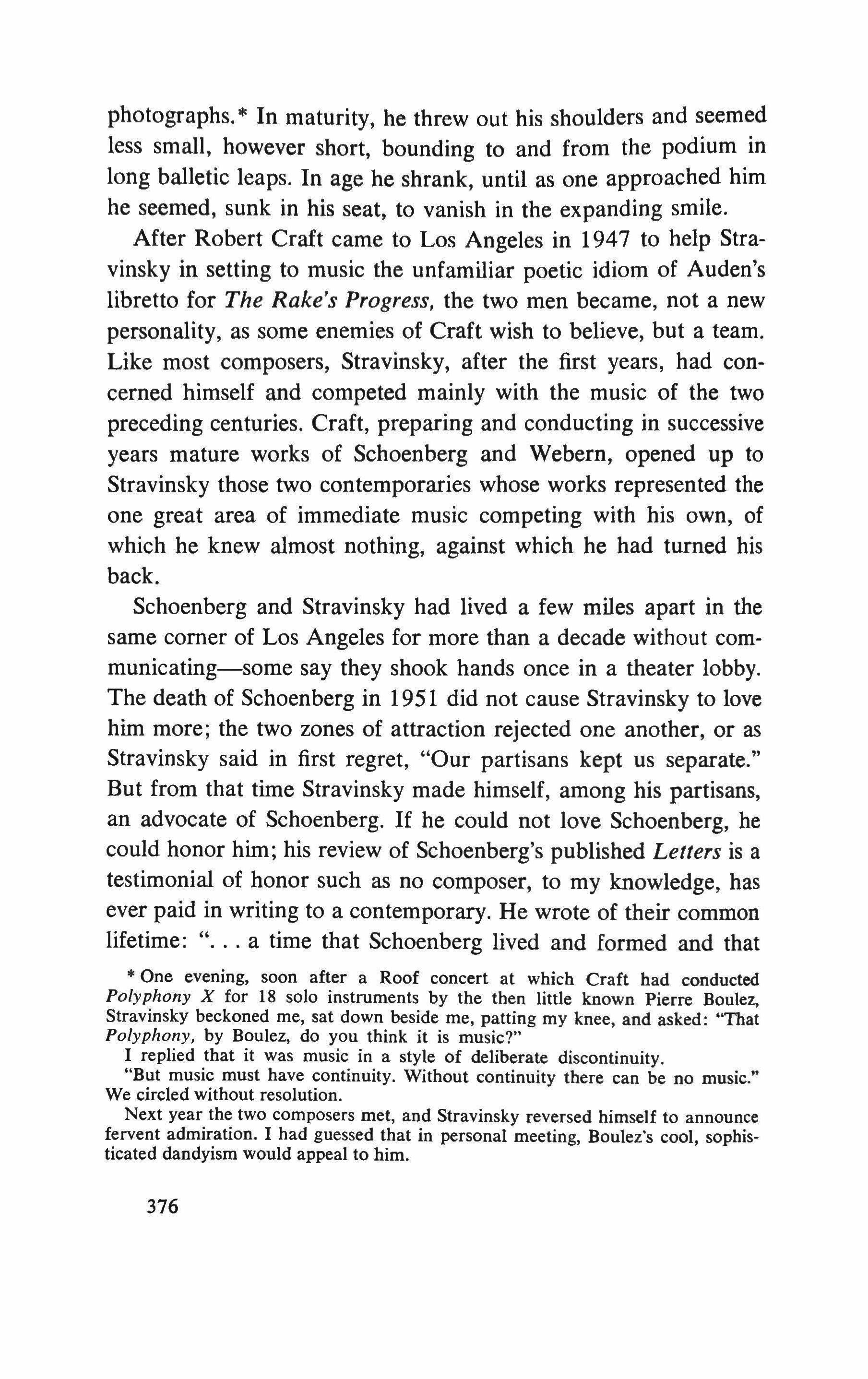
photographs. * In maturity, he threw out his shoulders and seemed less small, however short, bounding to and from the podium in long balletic leaps. In age he shrank, until as one approached him he seemed, sunk in his seat, to vanish in the expanding smile.
After Robert Craft came to Los Angeles in 1947 to help Stravinsky in setting to music the unfamiliar poetic idiom of Auden's libretto for The Rake's Progress, the two men became, not a new personality, as some enemies of Craft wish to believe, but a team. Like most composers, Stravinsky, after the first years, had concerned himself and competed mainly with the music of the two preceding centuries. Craft, preparing and conducting in successive years mature works of Schoenberg and Webern, opened up to Stravinsky those two contemporaries whose works represented the one great area of immediate music competing with his own, of which he knew almost nothing, against which he had turned his back.
Schoenberg and Stravinsky had lived a few miles apart in the same corner of Los Angeles for more than a decade without communicating-some say they shook hands once in a theater lobby. The death of Schoenberg in 1951 did not cause Stravinsky to love him more; the two zones of attraction rejected one another, or as Stravinsky said in first regret, "Our partisans kept us separate." But from that time Stravinsky made himself, among his partisans, an advocate of Schoenberg. If he could not love Schoenberg, he could honor him; his review of Schoenberg's published Letters is a testimonial of honor such as no composer, to my knowledge, has ever paid in writing to a contemporary. He wrote of their common lifetime: " a time that Schoenberg lived and formed and that
* One evening, soon after a Roof concert at which Craft had conducted Polyphony X for 18 solo instruments by the then little known Pierre Boulez, Stravinsky beckoned me, sat down beside me, patting my knee, and asked: "That Polyphony, by Boulez, do you think it is music?"
I replied that it was music in a style of deliberate discontinuity.
"But music must have continuity. Without continuity there can be no music." We circled without resolution.
Next year the two composers met, and Stravinsky reversed himself to announce fervent admiration. I had guessed that in personal meeting, Boulez's cool, sophisticated dandyism would appeal to him.
376

now to some extent-for centripetal as he was, other developments were and are possible-lives and finds its form in him." And again: " the lenses of Schoenberg's conscience were the most powerful of the musicians of that era, and not only in music."
I believe it was the bitterness of the letters resulting from the avoidance of Schoenberg's music that most shocked Stravinsky. He himself had known neglect, yet nothing to compare with this. "But the nadir comes in a letter the seventy-year-old master addressed to the Guggenheim Foundation asking for assistance so that he could finish Moses and Aron. Though even a few measures of this opera would have been worth a whole catalogue of music the Guggenheim Foundation did sponsor, Schoenberg's request was denied."
Gertrud Schoenberg told me that before the book of Schoenberg's Letters appeared the Guggenheim Foundation wrote her asking to buy this letter.
I myself, as a "scout" for the Pulitzer committee, recommended for the Pulitzer award Schoenberg's A Survivor from Warsaw in the year of its world premiere by the Albuquerque Symphony. The prize went instead to a long-forgotten chamber work. Such are the rewards of genius in our society.
Describing the association of Craft with Stravinsky one cannot speak of Craft as "alter ego" or "amanuensis"; it was in fact a partnership. They shared ability and talents, as they shared the concerts for which Craft prepared the orchestra, while Stravinsky chose which works of the program he would direct. We owe to this partnership the many late recordings. Though they disagreed in interpretation, Craft being a strict Stravinskyite and Stravinsky increasingly and lovingly free of his own strictures, the difference did not part them. In conversation derived from wide reading and a happy tending of dictionaries, encyclopedias, vocabulary-Stravinsky noted that during the period he read much more than in the past-they shared criticism and amplified their mutual interests.
When traveling, as Elliott Carter told me after joining them for 377
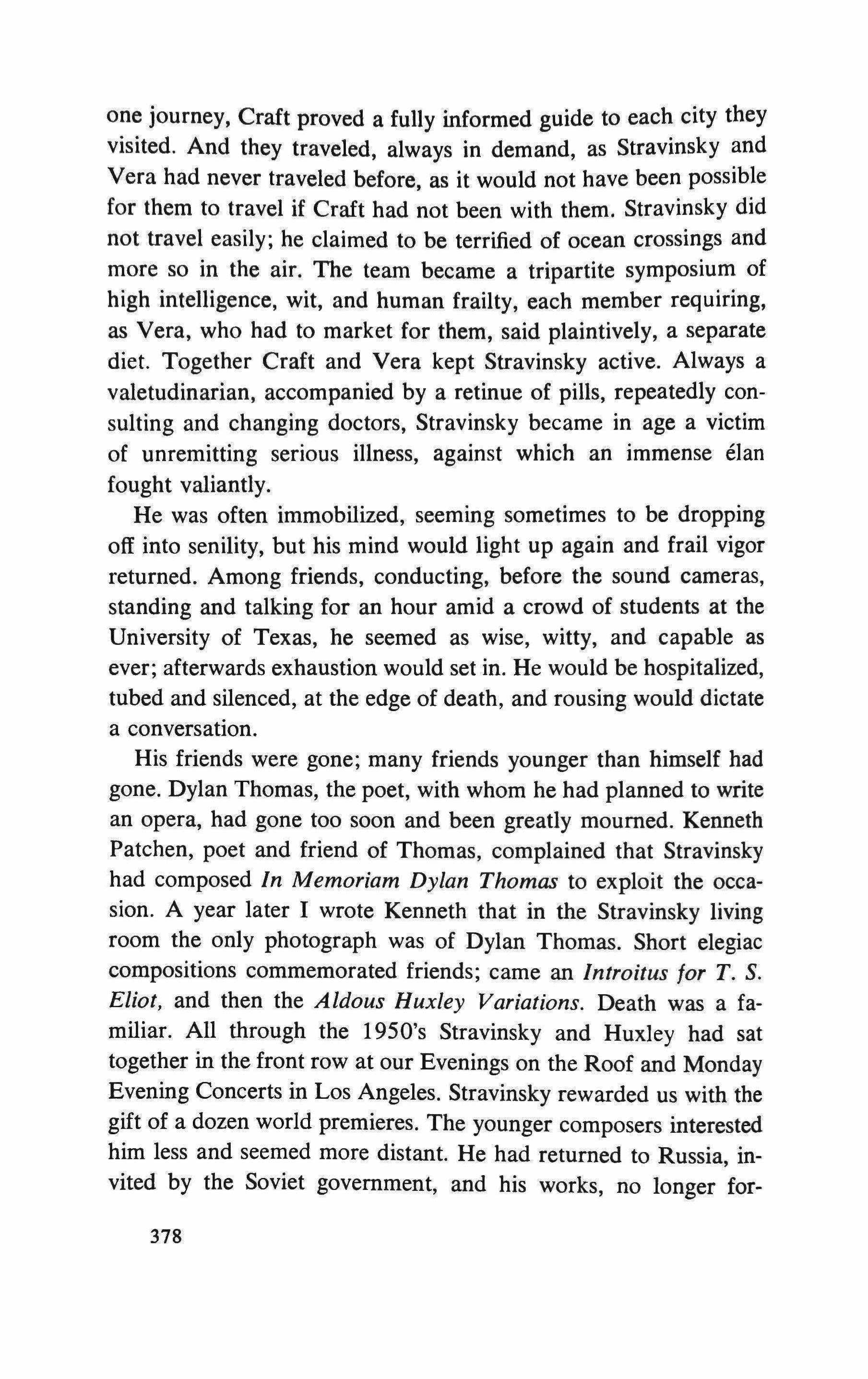
one journey, Craft proved a fully informed guide to each city they visited. And they traveled, always in demand, as Stravinsky and Vera had never traveled before, as it would not have been possible for them to travel if Craft had not been with them. Stravinsky did not travel easily; he claimed to be terrified of ocean crossings and more so in the air. The team became a tripartite symposium of high intelligence, wit, and human frailty, each member requiring, as Vera, who had to market for them, said plaintively, a separate diet. Together Craft and Vera kept Stravinsky active. Always a valetudinarian, accompanied by a retinue of pills, repeatedly consulting and changing doctors, Stravinsky became in age a victim of unremitting serious illness, against which an immense elan fought valiantly.
He was often immobilized, seeming sometimes to be dropping off into senility, but his mind would light up again and frail vigor returned. Among friends, conducting, before the sound cameras, standing and talking for an hour amid a crowd of students at the University of Texas, he seemed as wise, witty, and capable as ever; afterwards exhaustion would set in. He would be hospitalized, tubed and silenced, at the edge of death, and rousing would dictate a conversation.
His friends were gone; many friends younger than himself had gone. Dylan Thomas, the poet, with whom he had planned to write an opera, had gone too soon and been greatly mourned. Kenneth Patchen, poet and friend of Thomas, complained that Stravinsky had composed In Memoriam Dylan Thomas to exploit the occasion. A year later I wrote Kenneth that in the Stravinsky living room the only photograph was of Dylan Thomas. Short elegiac compositions commemorated friends; came an Introitus for T. S. Eliot, and then the Aldous Huxley Variations. Death was a familiar. All through the 1950's Stravinsky and Huxley had sat together in the front row at our Evenings on the Roof and Monday Evening Concerts in Los Angeles. Stravinsky rewarded us with the gift of a dozen world premieres. The younger composers interested him less and seemed more distant. He had returned to Russia, invited by the Soviet government, and his works, no longer for-
378

bidden, were now performed in his homeland. He wrote of his childhood.
The last paragraph of his unfinished last article surveyed the current scene: "We live in a very exhilarating time, a little short of a Golden Age, perhaps and ended quoting Jimmy Durante.
He was, like Haydn, an artist not separate from his time, who did not need to wait for posterity. "Posterity," Vera wrote, had "hung around his neck for so long that for three-quarters of his life he must have felt as burdened with it as a belled cat." And like the reviews of G.B.S., the "cruel" Conversations of Stravinsky will be rousing laughter-the vital laughter of an inexhaustible craftsman, an unyielding courage-long after the victims' pain has passed.
379
Balanchine ANNA KISSELGOFF &
JOHN E. MALMSTAD
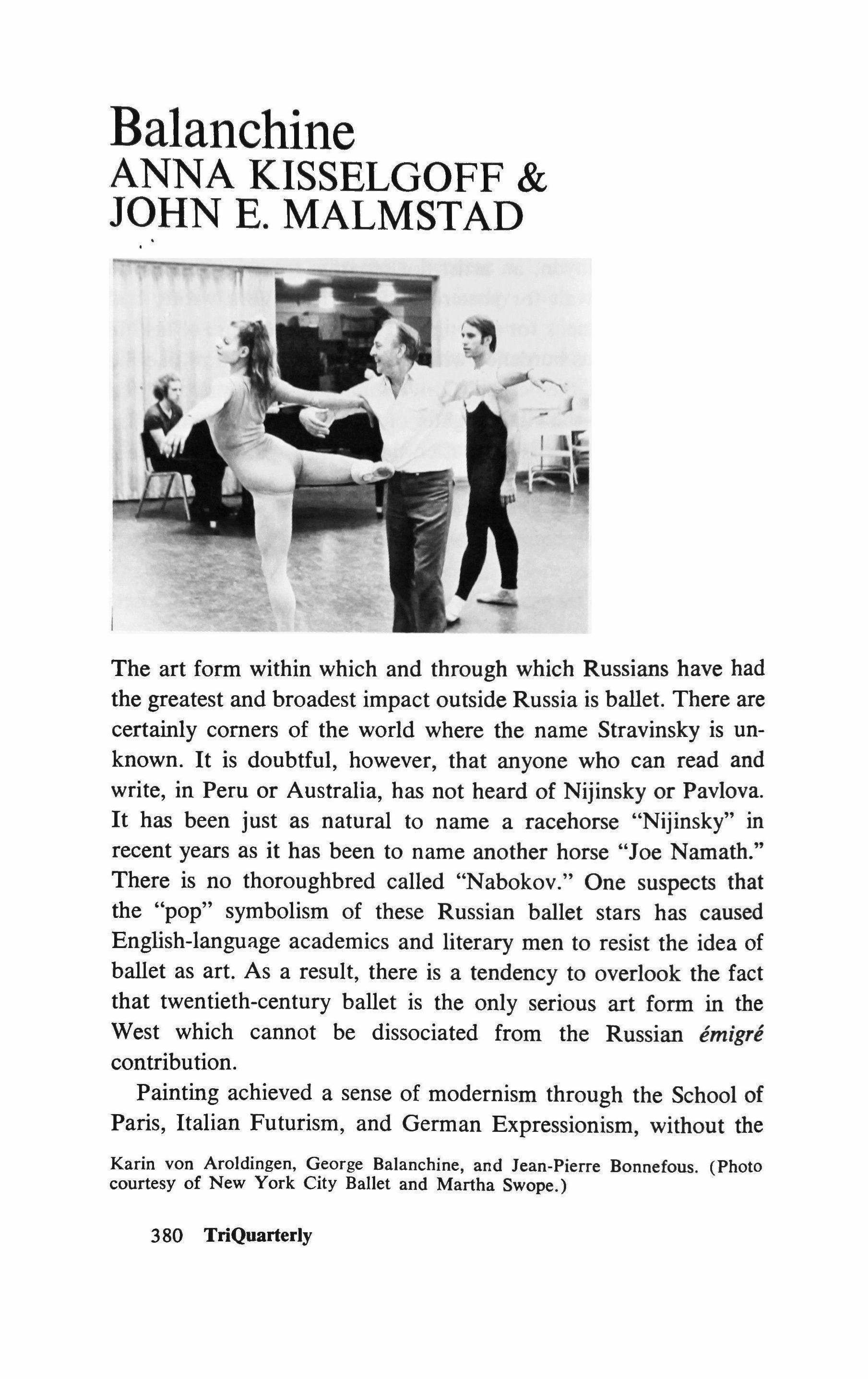
The art form within which and through which Russians have had the greatest and broadest impact outside Russia is ballet. There are certainly comers of the world where the name Stravinsky is unknown. It is doubtful, however, that anyone who can read and write, in Peru or Australia, has not heard of Nijinsky or Pavlova. It has been just as natural to name a racehorse "Nijinsky" in recent years as it has been to name another horse "Joe Namath." There is no thoroughbred called "Nabokov." One suspects that the "pop" symbolism of these Russian ballet stars has caused English-language academics and literary men to resist the idea of ballet as art. As a result, there is a tendency to overlook the fact that twentieth-century ballet is the only serious art form in the West which cannot be dissociated from the Russian emigre contribution.
Painting achieved a sense of modernism through the School of Paris, Italian Futurism, and German Expressionism, without the Karin von Aroldingen, George Balanchine, and Jean-Pierre Bonnefous. (Photo courtesy of New York City Ballet and Martha Swope.)
380 TrlQuarterly
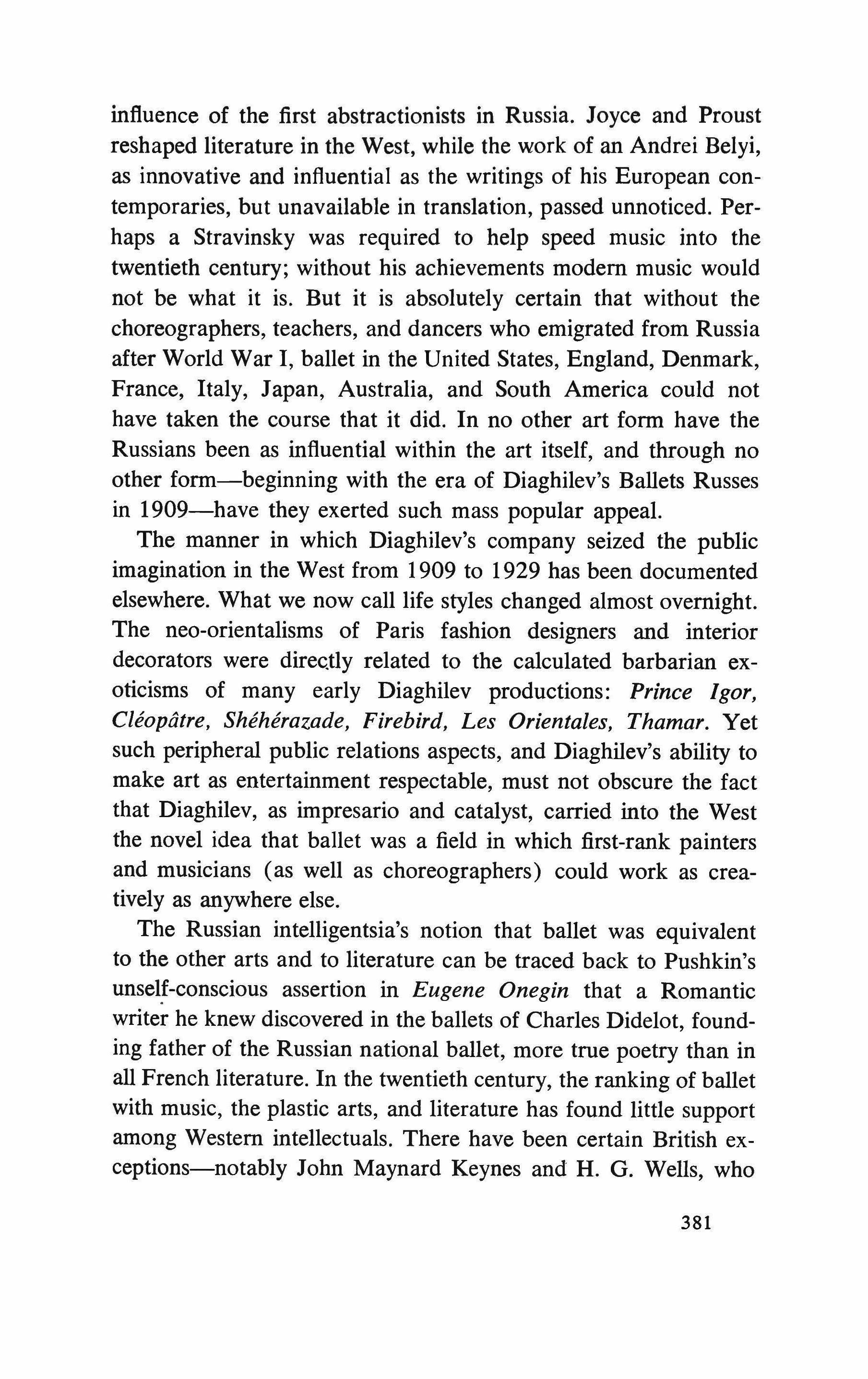
influence of the first abstractionists in Russia. Joyce and Proust reshaped literature in the West, while the work of an Andrei Belyi, as innovative and influential as the writings of his European contemporaries, but unavailable in translation, passed unnoticed. Perhaps a Stravinsky was required to help speed music into the twentieth century; without his achievements modem music would not be what it is. But it is absolutely certain that without the choreographers, teachers, and dancers who emigrated from Russia after World War I, ballet in the United States, England, Denmark, France, Italy, Japan, Australia, and South America could not have taken the course that it did. In no other art form have the Russians been as influential within the art itself, and through no other form-beginning with the era of Diaghilev's Ballets Russes in 1909-have they exerted such mass popular appeal.
The manner in which Diaghilev's company seized the public imagination in the West from 1909 to 1929 has been documented elsewhere. What we now call life styles changed almost overnight. The neo-orientalisms of Paris fashion designers and interior decorators were direc.tly related to the calculated barbarian exoticisms of many early Diaghilev productions: Prince Igor, Cleoptitre, Sheherazade, Firebird, Les Orientales, Thamar. Yet such peripheral public relations aspects, and Diaghilev's ability to make art as entertainment respectable, must not obscure the fact that Diaghilev, as impresario and catalyst, carried into the West the novel idea that ballet was a field in which first-rank painters and musicians (as well as choreographers) could work as creatively as anywhere else.
The Russian intelligentsia's notion that ballet was equivalent to the other arts and to literature can be traced back to Pushkin's unself-conscious assertion in Eugene Onegin that a Romantic writer he knew discovered in the ballets of Charles Didelot, founding father of the Russian national ballet, more true poetry than in all French literature. In the twentieth century, the ranking of ballet with music, the plastic arts, and literature has found little support among Western intellectuals. There have been certain British exceptions-notably John Maynard Keynes and H. G. Wells, who
381
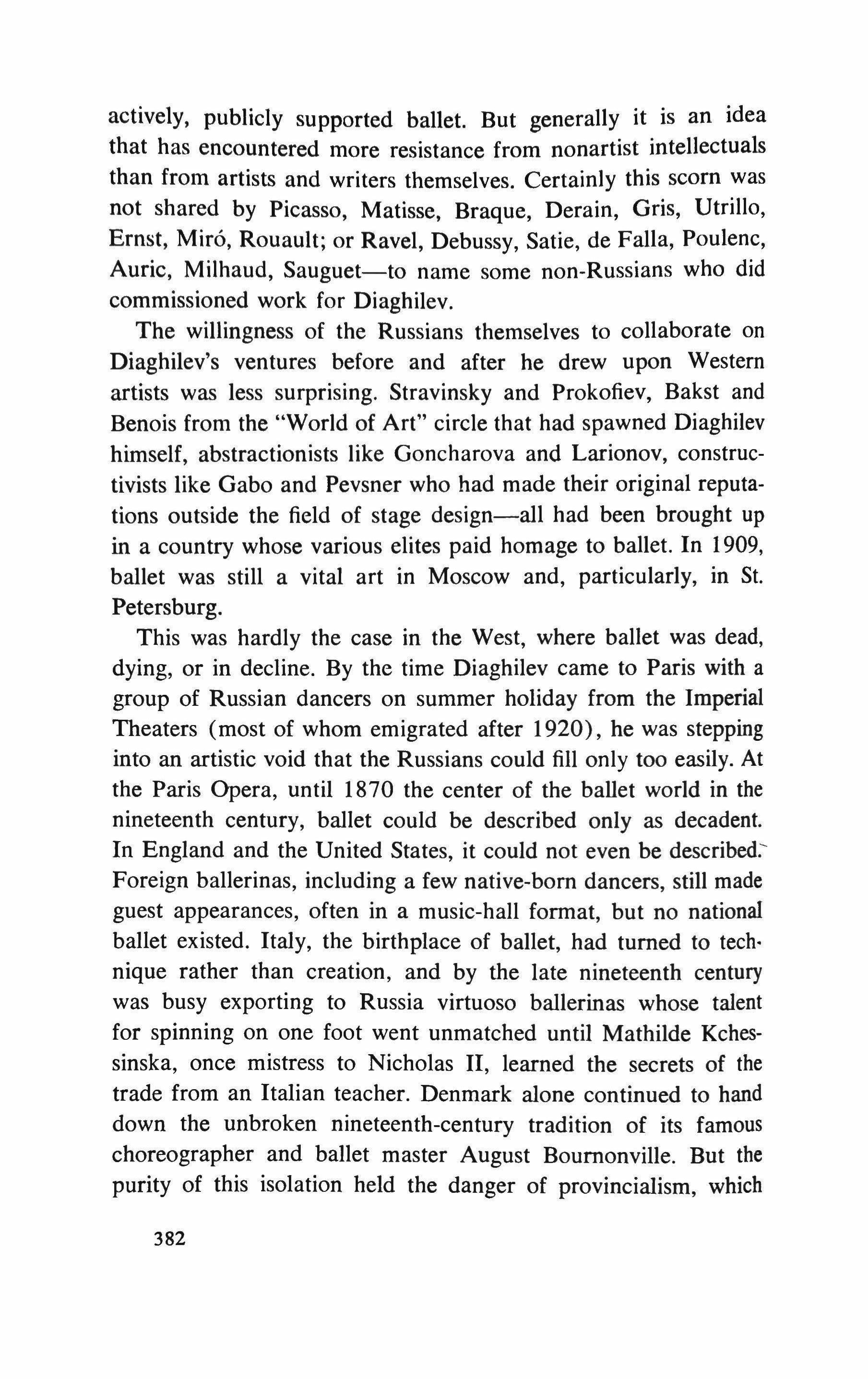
actively, publicly supported ballet. But generally it is an idea that has encountered more resistance from nonartist intellectuals than from artists and writers themselves. Certainly this scorn was not shared by Picasso, Matisse, Braque, Derain, Gris, Utrillo, Ernst, Mira, Rouault; or Ravel, Debussy, Satie, de Falla, Poulenc, Auric, Milhaud, Sauguet-to name some non-Russians who did commissioned work for Diaghilev.
The willingness of the Russians themselves to collaborate on Diaghilev's ventures before and after he drew upon Western artists was less surprising. Stravinsky and Prokofiev, Bakst and Benois from the "World of Art" circle that had spawned Diaghilev himself, abstractionists like Goncharova and Larionov, constructivists like Gabo and Pevsner who had made their original reputations outside the field of stage design-all had been brought up in a country whose various elites paid homage to ballet. In 1909, ballet was still a vital art in Moscow and, particularly, in St. Petersburg.
This was hardly the case in the West, where ballet was dead, dying, or in decline. By the time Diaghilev came to Paris with a group of Russian dancers on summer holiday from the Imperial Theaters (most of whom emigrated after 1920), he was stepping into an artistic void that the Russians could fill only too easily. At the Paris Opera, until 1870 the center of the ballet world in the nineteenth century, ballet could be described only as decadent. In England and the United States, it could not even be described.' Foreign ballerinas, including a few native-born dancers, still made guest appearances, often in a music-hall format, but no national ballet existed. Italy, the birthplace of ballet, had turned to technique rather than creation, and by the late nineteenth century was busy exporting to Russia virtuoso ballerinas whose talent for spinning on one foot went unmatched until Mathilde Kchessinska, once mistress to Nicholas II, learned the secrets of the trade from an Italian teacher. Denmark alone continued to hand down the unbroken nineteenth-century tradition of its famous choreographer and ballet master August Bournonville. But the purity of this isolation held the danger of provincialism, which
382
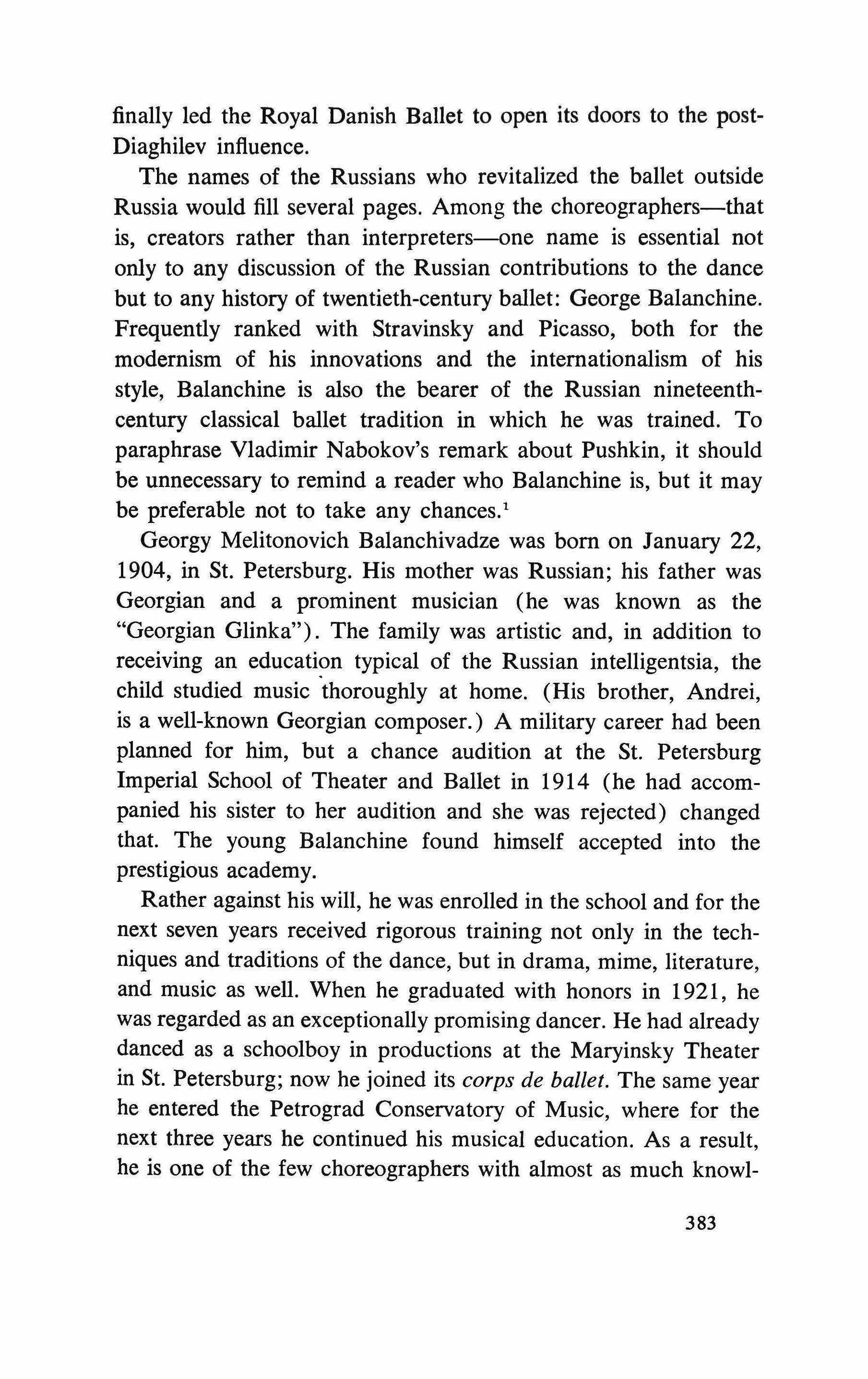
finally led the Royal Danish Ballet to open its doors to the postDiaghilev influence.
The names of the Russians who revitalized the ballet outside Russia would fill several pages. Among the choreographers-that is, creators rather than interpreters-one name is essential not only to any discussion of the Russian contributions to the dance but to any history of twentieth-century ballet: George Balanchine. Frequently ranked with Stravinsky and Picasso, both for the modernism of his innovations and the internationalism of his style, Balanchine is also the bearer of the Russian nineteenthcentury classical ballet tradition in which he was trained. To paraphrase Vladimir Nabokov's remark about Pushkin, it should be unnecessary to remind a reader who Balanchine is, but it may be preferable not to take any chances.'
Georgy Melitonovich Balanchivadze was born on January 22, 1904, in St. Petersburg. His mother was Russian; his father was Georgian and a prominent musician (he was known as the "Georgian Glinka"). The family was artistic and, in addition to receiving an education typical of the Russian intelligentsia, the child studied music 'thoroughly at home. (His brother, Andrei, is a well-known Georgian composer.) A military career had been planned for him, but a chance audition at the S1. Petersburg Imperial School of Theater and Ballet in 1914 (he had accompanied his sister to her audition and she was rejected) changed that. The young Balanchine found himself accepted into the prestigious academy.
Rather against his will, he was enrolled in the school and for the next seven years received rigorous training not only in the techniques and traditions of the dance, but in drama, mime, literature, and music as well. When he graduated with honors in 1921, he was regarded as an exceptionally promising dancer, He had already danced as a schoolboy in productions at the Maryinsky Theater in S1. Petersburg; now he joined its corps de ballet. The same year he entered the Petrograd Conservatory of Music, where for the next three years he continued his musical education. As a result, he is one of the few choreographers with almost as much knowl-
383
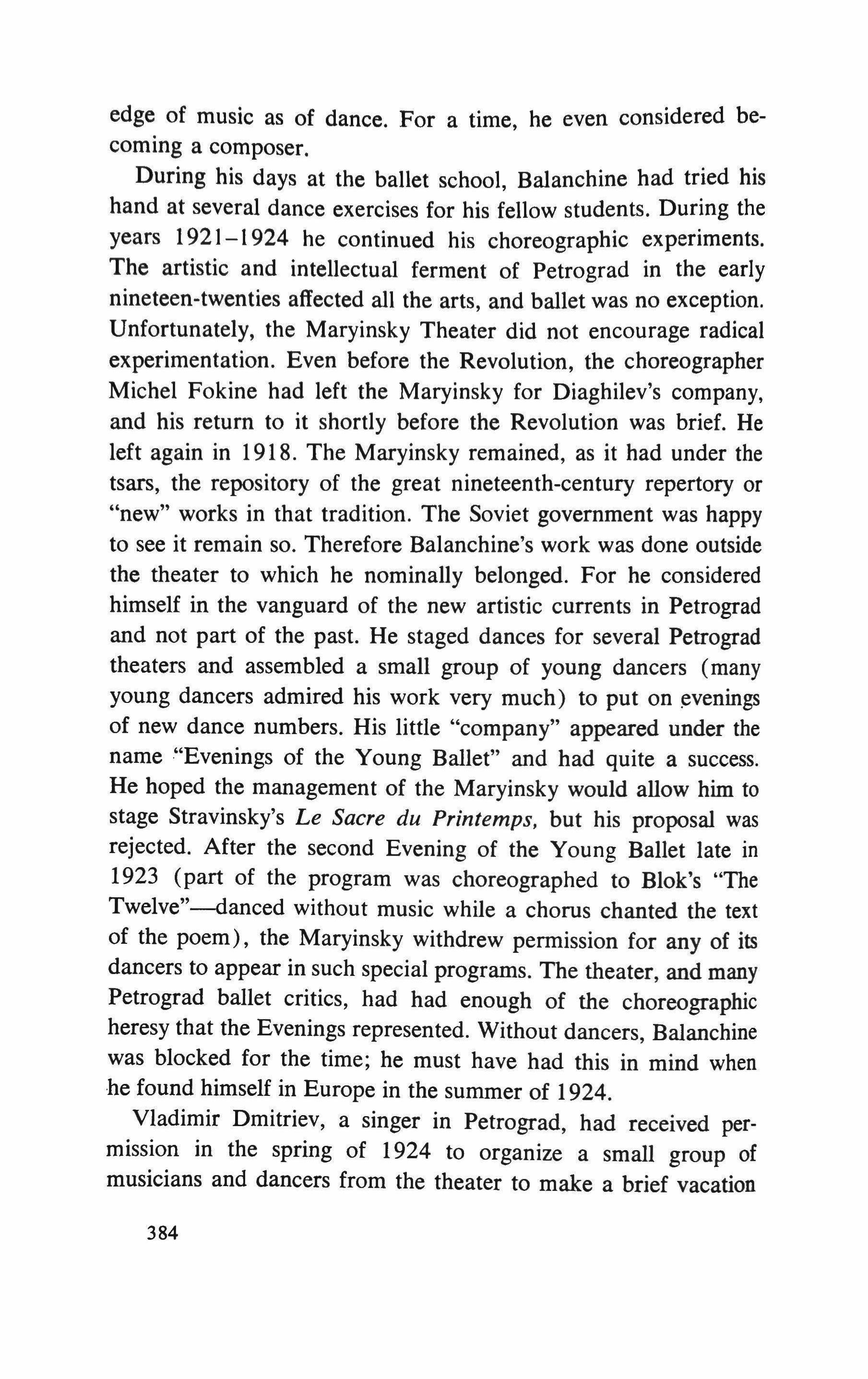
edge of music as of dance. For a time, he even considered becoming a composer.
During his days at the ballet school, Balanchine had tried his hand at several dance exercises for his fellow students. During the years 1921-1924 he continued his choreographic experiments. The artistic and intellectual ferment of Petrograd in the early nineteen-twenties affected all the arts, and ballet was no exception. Unfortunately, the Maryinsky Theater did not encourage radical experimentation. Even before the Revolution, the choreographer Michel Fokine had left the Maryinsky for Diaghilev's company, and his return to it shortly before the Revolution was brief. He left again in 1918. The Maryinsky remained, as it had under the tsars, the repository of the great nineteenth-century repertory or "new" works in that tradition. The Soviet government was happy to see it remain so. Therefore Balanchine's work was done outside the theater to which he nominally belonged. For he considered himself in the vanguard of the new artistic currents in Petrograd and not part of the past. He staged dances for several Petrograd theaters and assembled a small group of young dancers (many young dancers admired his work very much) to put on evenings of new dance numbers. His little "company" appeared under the name "Evenings of the Young Ballet" and had quite a success. He hoped the management of the Maryinsky would allow him to stage Stravinsky's Le Sacre du Printemps, but his proposal was rejected. After the second Evening of the Young Ballet late in 1923 (part of the program was choreographed to Blok's "The Twelve"-danced without music while a chorus chanted the text of the poem), the Maryinsky withdrew permission for any of its dancers to appear in such special programs. The theater, and many Petrograd ballet critics, had had enough of the choreographic heresy that the Evenings represented. Without dancers, Balanchine was blocked for the time; he must have had this in mind when he found himself in Europe in the summer of 1924.
Vladimir Dmitriev, a singer in Petrograd, had received permission in the spring of 1924 to organize a small group of musicians and dancers from the theater to make a brief vacation
384
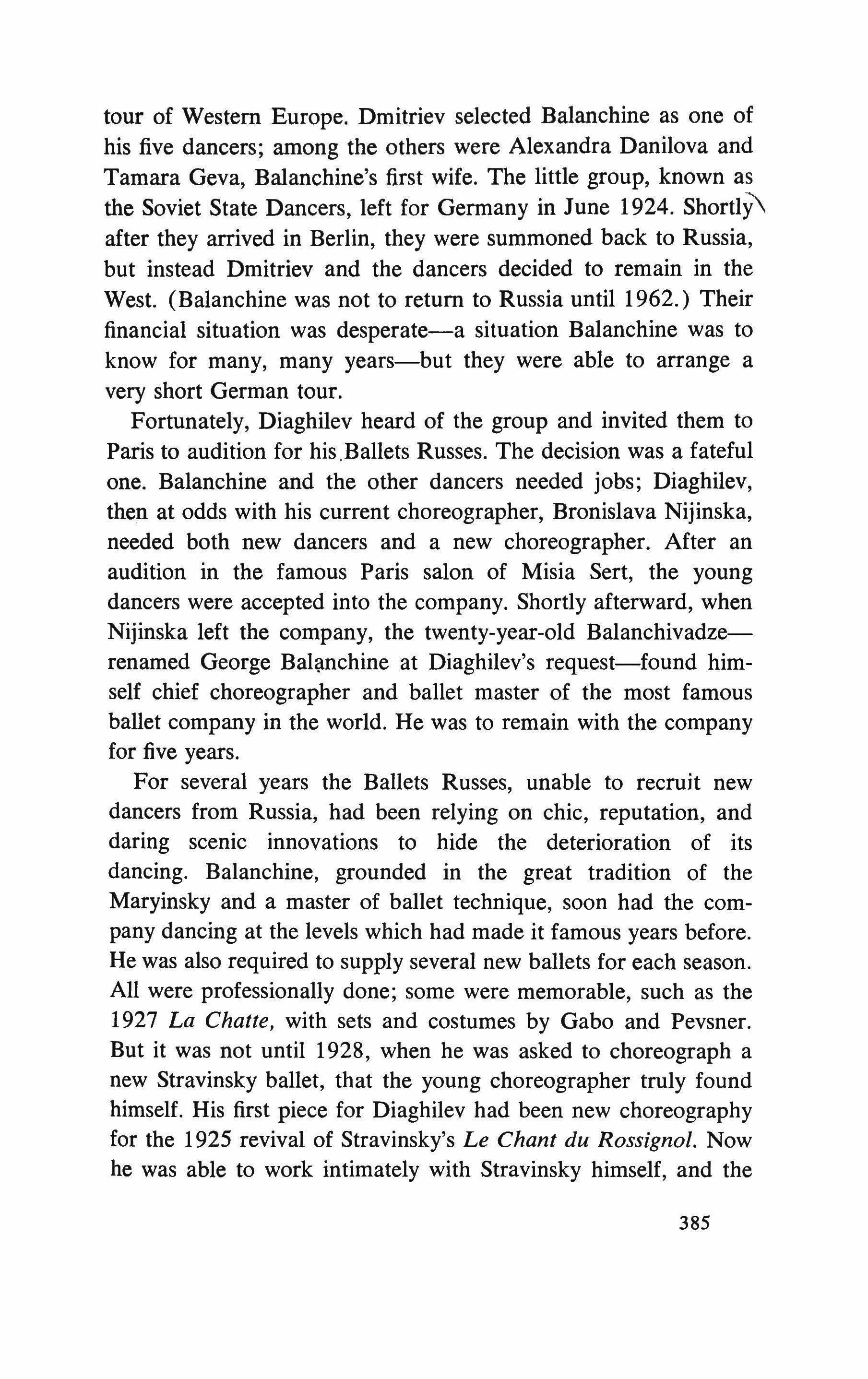
tour of Western Europe. Dmitriev selected Balanchine as one of his five dancers; among the others were Alexandra Danilova and Tamara Geva, Balanchine's first wife. The little group, known as the Soviet State Dancers, left for Germany in June 1924. Shortly'. after they arrived in Berlin, they were summoned back to Russia, but instead Dmitriev and the dancers decided to remain in the West. (Balanchine was not to return to Russia until 1962.) Their financial situation was desperate-a situation Balanchine was to know for many, many years-but they were able to arrange a very short German tour.
Fortunately, Diaghilev heard of the group and invited them to Paris to audition for his .Ballets Russes. The decision was a fateful one. Balanchine and the other dancers needed jobs; Diaghilev, then at odds with his current choreographer, Bronislava Nijinska, needed both new dancers and a new choreographer. After an audition in the famous Paris salon of Misia Sert, the young dancers were accepted into the company. Shortly afterward, when Nijinska left the company, the twenty-year-old Balanchivadzerenamed George Balanchine at Diaghilev's request-found himself chief choreographer and ballet master of the most famous ballet company in the world. He was to remain with the company for five years.
For several years the Ballets Russes, unable to recruit new dancers from Russia, had been relying on chic, reputation, and daring scenic innovations to hide the deterioration of its dancing. Balanchine, grounded in the great tradition of the Maryinsky and a master of ballet technique, soon had the company dancing at the levels which had made it famous years before. He was also required to supply several new ballets for each season. All were professionally done; some were memorable, such as the 1927 La Chatte, with sets and costumes by Gabo and Pevsner. But it was not until 1928, when he was asked to choreograph a new Stravinsky ballet, that the young choreographer truly found himself. His first piece for Diaghilev had been new choreography for the 1925 revival of Stravinsky's Le Chant du Rossignol. Now he was able to work intimately with Stravinsky himself, and the
385
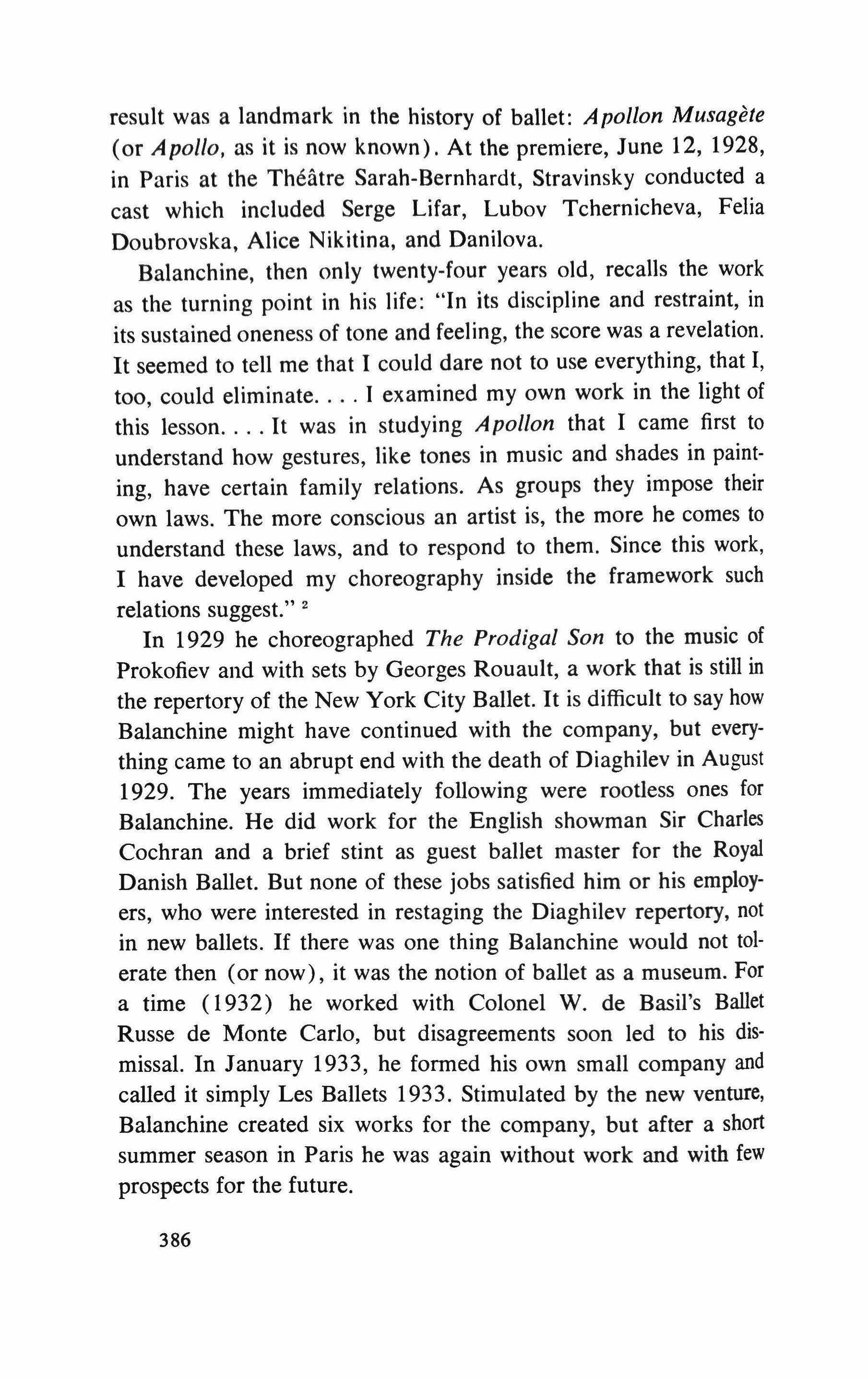
result was a landmark in the history of ballet: Apollon Musagete (or Apollo, as it is now known). At the premiere, June 12,1928, in Paris at the Theatre Sarah-Bernhardt, Stravinsky conducted a cast which included Serge Lifar, Lubov Tchernicheva, Felia Doubrovska, Alice Nikitina, and Danilova.
Balanchine, then only twenty-four years old, recalls the work as the turning point in his life: "In its discipline and restraint, in its sustained oneness of tone and feeling, the score was a revelation. It seemed to tell me that I could dare not to use everything, that I, too, could eliminate I examined my own work in the light of this lesson It was in studying Apollon that I came first to understand how gestures, like tones in music and shades in painting, have certain family relations. As groups they impose their own laws. The more conscious an artist is, the more he comes to understand these laws, and to respond to them. Since this work, I have developed my choreography inside the framework such relations suggest." 2
In 1929 he choreographed The Prodigal Son to the music of Prokofiev and with sets by Georges Rouault, a work that is still in the repertory of the New York City Ballet. It is difficult to say how Balanchine might have continued with the company, but everything came to an abrupt end with the death of Diaghilev in August 1929. The years immediately following were rootless ones for Balanchine. He did work for the English showman Sir Charles Cochran and a brief stint as guest ballet master for the Royal Danish Ballet. But none of these jobs satisfied him or his employers, who were interested in restaging the Diaghilev repertory, not in new ballets. If there was one thing Balanchine would not tolerate then (or now), it was the notion of ballet as a museum. For a time (1932) he worked with Colonel W. de Basil's Ballet Russe de Monte Carlo, but disagreements soon led to his dismissal. In January 1933, he formed his own small company and called it simply Les Ballets 1933. Stimulated by the new venture, Balanchine created six works for the company, but after a short summer season in Paris he was again without work and with few prospects for the future.
386

At this moment he met a young American, Lincoln Kirstein, a young Harvard intellectual with whom ballet had become an obsession. Excited by Apollo, which he had seen in the late twenties, Kirstein was determined that Balanchine was the man to bring to America if his plans to create a new American ballet company with its own classic repertory were to be realized. Fortunately, Balanchine had nothing to keep him in Europe, and he accepted Kirstein's offer, arriving in New York City on October 18, 1933. The first fruit of the Balanchine-Kirstein collaboration involved, quite logically, the founding of a ballet school to train American dancers for the future company. On January 1, 1934, the School of American Ballet opened its doors in New York City in a studio which Isadora Duncan had once used. There were soon twentyfive dancers in the School and with them Balanchine staged his first American ballet, Serenade, one of his most enduring works. By late 1934 Balanchine and Kirstein decided that the school's pupils were ready to perform publicly and the American Ballet was formed. The company' was essentially only a performing group from the school, and while it put on several programs it could not fully occupy Balanchine's time. It was far from being the permanent ballet company he and Kirstein, his patron, had in mind.
In 1935 Balanchine was invited to become ballet master of the ballet company of the Metropolitan Opera. He accepted and stayed longer than most people predicted, since there were serious disagreements between him and the management. He finally left angrily in 1938, but not until he had organized several successful programs. The most famous was the Stravinsky Festival in the spring of 1937, which featured a revival of Apollo and two new ballets, Le Baiser de la Fee and leu de Cartes (A Card Game: Ballet in Three Deals). By 1938 the financial situation of the American Ballet (supported by Kirstein and his friends) was desperate, and the little company closed. The school remained open, however. For about the next ten years Balanchine spent much of his time doing work on Broadway and in Hollywood (connoisseurs of his work will stay up to all hours to catch the television "late show" of the water ballet Balanchine did for his
387

wife Vera Zorina in The Goldwyn Follies). He worked on his first musical comedy in 1936 when he did the famous "Slaughter on Tenth Avenue" ballet for On Your Toes. This was a first in another way, too: for the first time in Broadway history a printed program read, not "dances by ," but "choreography by " In 1941 the American Ballet was revived for a special four-month tour of South America. Balanchine once again rose to the occasion and created two new ballets, both still in the repertory: Ballet Imperial to Tchaikovsky's Second Piano Concerto and Concerto Barocco to the music of Bach. When the company returned to the United States it was again forced to disband. In 1944 Balanchine began work with Ballet Russe de Monte Carlo, an association that lasted for two years.
By this time Lincoln Kirstein had returned from military service with plans for a new ballet company, Ballet Society. Finances dictated that there be only four programs a year for a subscription audience, but once again Balanchine had a company of his own. The first "season" opened on November 20, 1946, in the auditorium of the Central High School of Needle Trades in New York City. It featured the premiere of yet another seminal Balanchine ballet, The Four Temperaments, danced to a specially commissioned score of Hindemith. In 1947 the Paris Opera invited Balanchine to be its guest ballet master. He accepted the offer, returned to Paris, and there choreographed Le Palais de Cristal (now known as Symphony in C) to the music of Bizet. Fortunately for the history of American ballet he was not invited to stay permanently.
Balanchine and Kirstein wanted new works for their Ballet Society. Both had long wanted Stravinsky to compose another "Greek" ballet, to be paired with the earlier Apollo. Stravinsky responded with the beautiful Orpheus, which premiered on April 28, 1949, in New York City, with the composer conducting. Ballet Society had booked itself for four performances into the New York City Center, and on the night of the Orpheus premiere Morton Baum, chairman of the City Center Finance Committee, was standing in the rear of the theater. Then came one of those
388
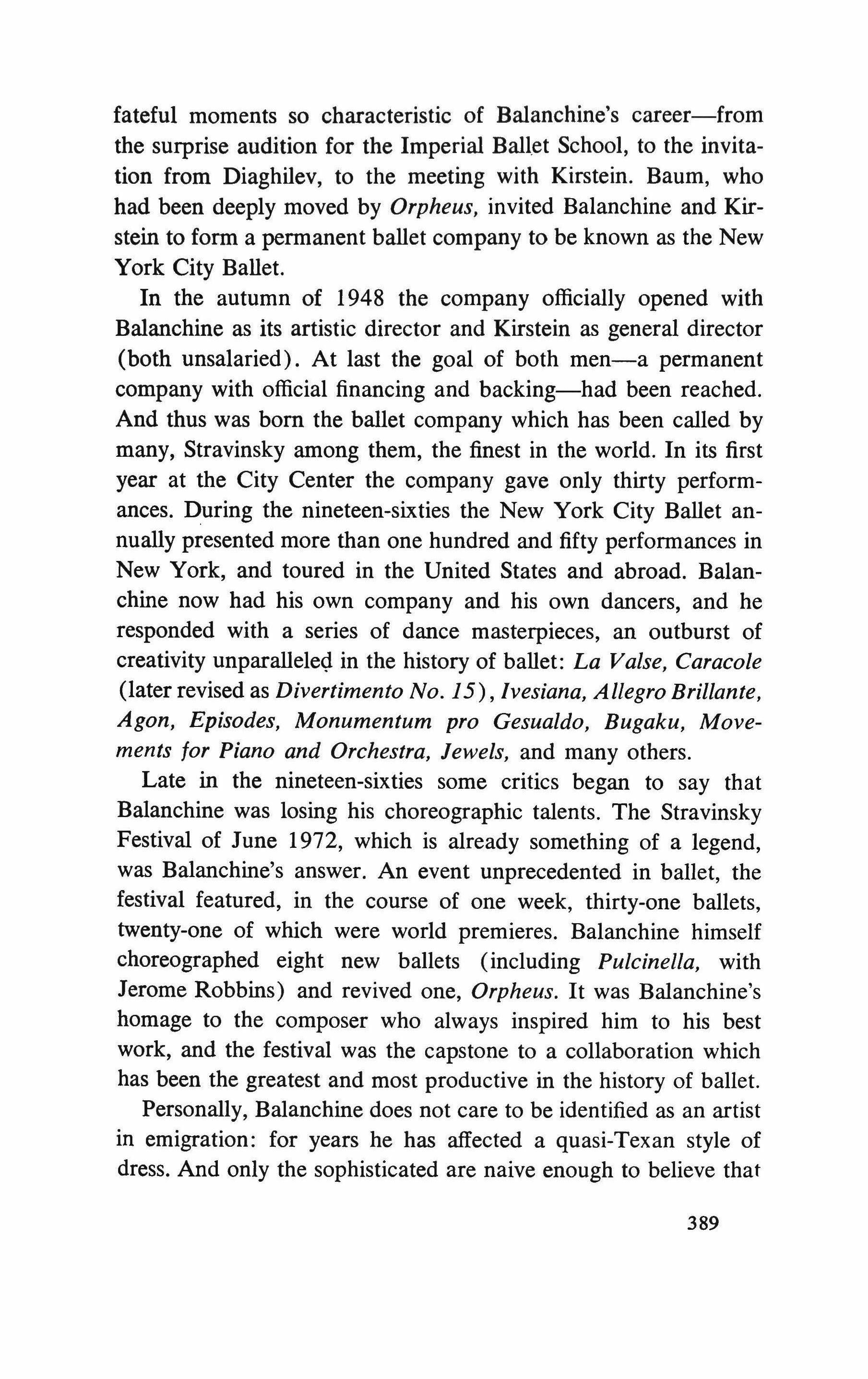
fateful moments so characteristic of Balanchine's career-from the surprise audition for the Imperial Ballet School, to the invitation from Diaghilev, to the meeting with Kirstein. Baum, who had been deeply moved by Orpheus, invited Balanchine and Kirstein to form a permanent ballet company to be known as the New York City Ballet.
In the autumn of 1948 the company officially opened with Balanchine as its artistic director and Kirstein as general director (both unsalaried). At last the goal of both men-a permanent company with official financing and backing-had been reached. And thus was born the ballet company which has been called by many, Stravinsky among them, the finest in the world. In its first year at the City Center the company gave only thirty performances. During the nineteen-sixties the New York City Ballet annually presented more than one hundred and fifty performances in New York, and toured in the United States and abroad. Balanchine now had his own company and his own dancers, and he responded with a series of dance masterpieces, an outburst of creativity unparalleled in the history of ballet: La Valse, Caracole (later revised as Divertimento No. 15), /vesiana, Allegro Brillante, Agon, Episodes, Monumentum pro Gesualdo, Bugaku, Movements for Piano and Orchestra, Jewels, and many others.
Late in the nineteen-sixties some critics began to say that Balanchine was losing his choreographic talents. The Stravinsky Festival of June 1972, which is already something of a legend, was Balanchine's answer. An event unprecedented in ballet, the festival featured, in the course of one week, thirty-one ballets, twenty-one of which were world premieres. Balanchine himself choreographed eight new ballets (including Pulcinella, with Jerome Robbins) and revived one, Orpheus. It was Balanchine's homage to the composer who always inspired him to his best work, and the festival was the capstone to a collaboration which has been the greatest and most productive in the history of ballet.
Personally, Balanchine does not care to be identified as an artist in emigration: for years he has affected a quasi-Texan style of dress. And only the sophisticated are naive enough to believe that
389
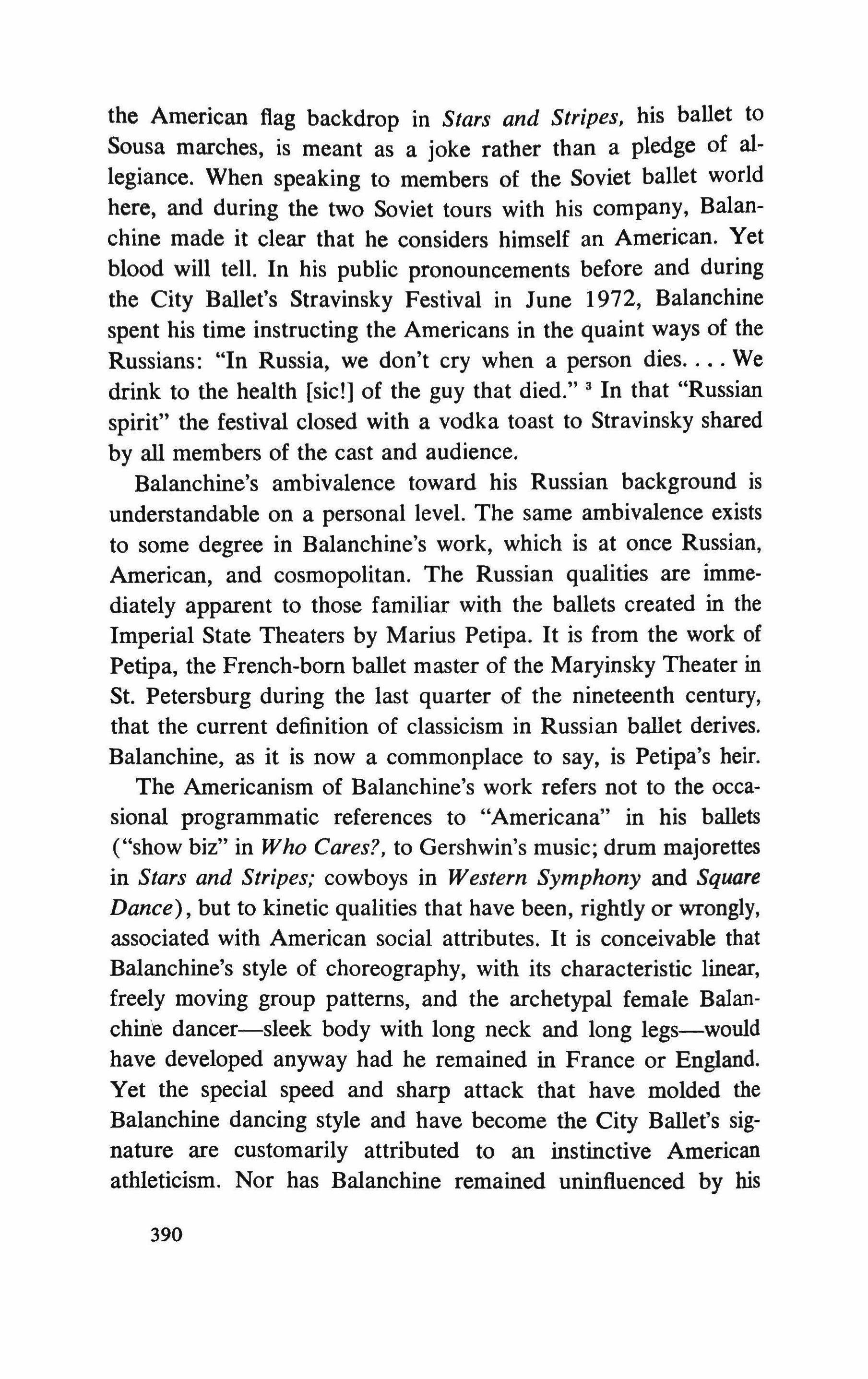
the American flag backdrop in Stars and Stripes, his ballet to Sousa marches, is meant as a joke rather than a pledge of allegiance. When speaking to members of the Soviet ballet world here, and during the two Soviet tours with his company, Balanchine made it clear that he considers himself an American. Yet blood will tell. In his public pronouncements before and during the City Ballet's Stravinsky Festival in June 1972, Balanchine spent his time instructing the Americans in the quaint ways of the Russians: "In Russia, we don't cry when a person dies We drink to the health [sic!] of the guy that died." 3 In that "Russian spirit" the festival closed with a vodka toast to Stravinsky shared by all members of the cast and audience.
Balanchine's ambivalence toward his Russian background is understandable on a personal level. The same ambivalence exists to some degree in Balanchine's work, which is at once Russian, American, and cosmopolitan. The Russian qualities are immediately apparent to those familiar with the ballets created in the Imperial State Theaters by Marius Petipa. It is from the work of Petipa, the French-born ballet master of the Maryinsky Theater in St. Petersburg during the last quarter of the nineteenth century, that the current definition of classicism in Russian ballet derives.
Balanchine, as it is now a commonplace to say, is Petipa's heir.
The Americanism of Balanchine's work refers not to the occasional programmatic references to "Americana" in his ballets ("show biz" in Who Cares?, to Gershwin's music; drum majorettes in Stars and Stripes; cowboys in Western Symphony and Square Dance), but to kinetic qualities that have been, rightly or wrongly, associated with American social attributes. It is conceivable that Balanchine's style of choreography, with its characteristic linear, freely moving group patterns, and the archetypal female Balanchine dancer-sleek body with long neck and long legs-would have developed anyway had he remained in France or England. Yet the special speed and sharp attack that have molded the Balanchine dancing style and have become the City Ballet's signature are customarily attributed to an instinctive American athleticism. Nor has Balanchine remained uninfluenced by his
390
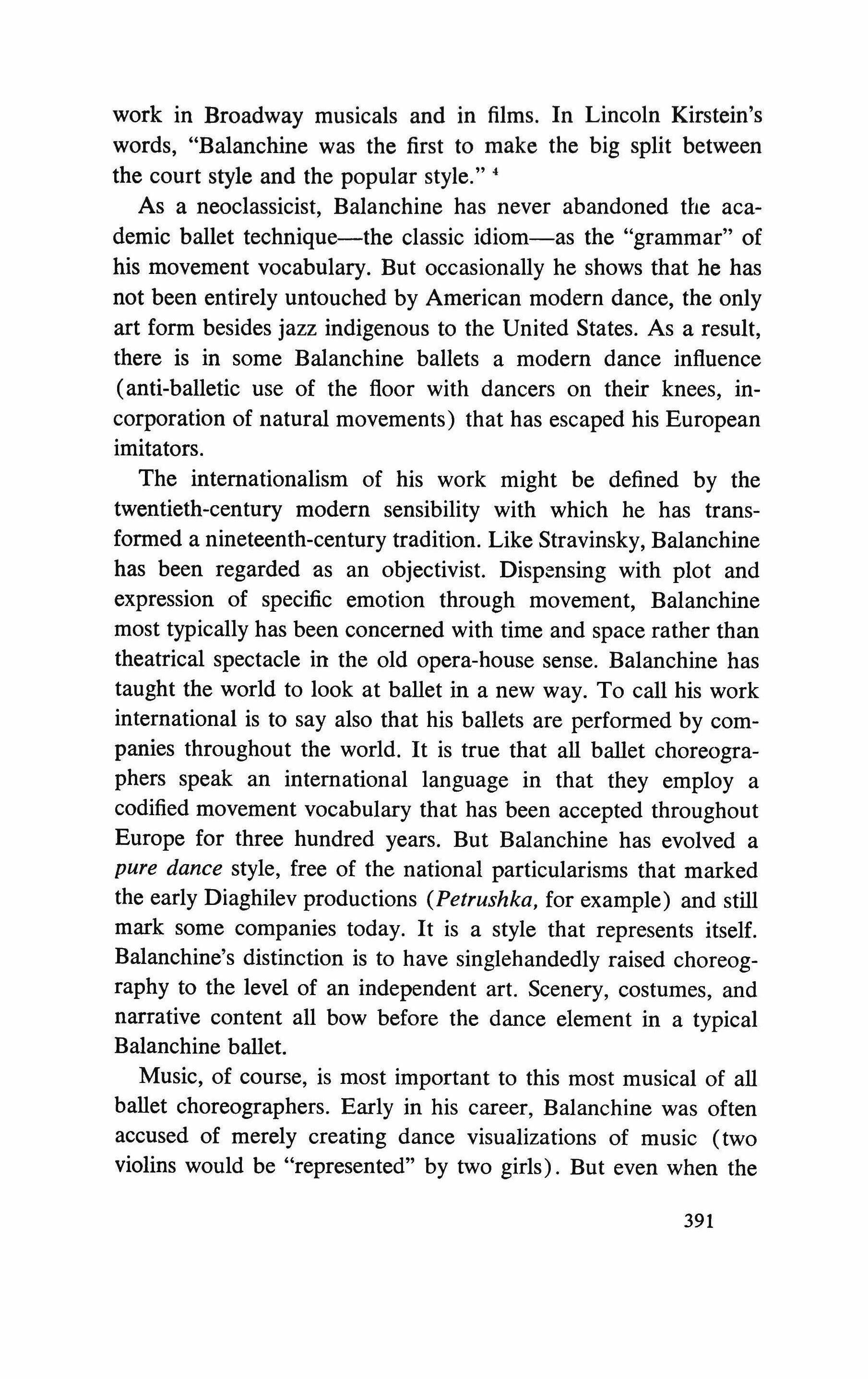
work in Broadway musicals and in films. In Lincoln Kirstein's words, "Balanchine was the first to make the big split between the court style and the popular style." 4
As a neoclassicist, Balanchine has never abandoned the academic ballet technique-the classic idiom-as the "grammar" of his movement vocabulary. But occasionally he shows that he has not been entirely untouched by American modern dance, the only art form besides jazz indigenous to the United States. As a result, there is in some Balanchine ballets a modern dance influence (anti-balletic use of the floor with dancers on their knees, incorporation of natural movements) that has escaped his European imitators.
The internationalism of his work might be defined by the twentieth-century modern sensibility with which he has transformed a nineteenth-century tradition. Like Stravinsky, Balanchine has been regarded as an objectivist. Dispensing with plot and expression of specific emotion through movement, Balanchine most typically has been concerned with time and space rather than theatrical spectacle in the old opera-house sense. Balanchine has taught the world to look at ballet in a new way. To call his work international is to say also that his ballets are performed by companies throughout the world. It is true that all ballet choreographers speak an international language in that they employ a codified movement vocabulary that has been accepted throughout Europe for three hundred years. But Balanchine has evolved a pure dance style, free of the national particularisms that marked the early Diaghilev productions (Petrushka, for example) and still mark some companies today. It is a style that represents itself. Balanchine's distinction is to have singlehandedly raised choreography to the level of an independent art. Scenery, costumes, and narrative content all bow before the dance element in a typical Balanchine ballet.
Music, of course, is most important to this most musical of all ballet choreographers. Early in his career, Balanchine was often accused of merely creating dance visualizations of music (two violins would be "represented" by two girls). But even when the 391
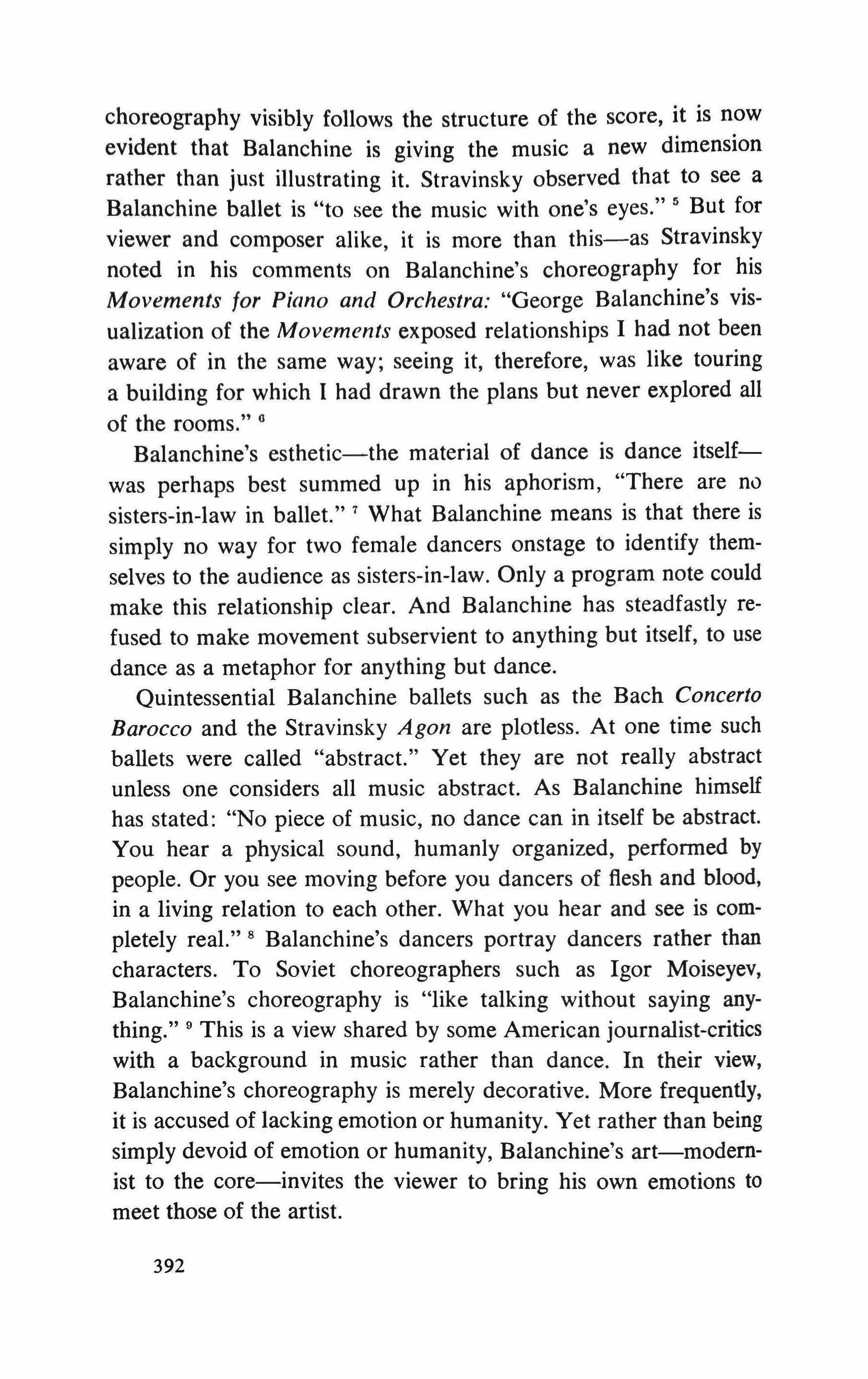
choreography visibly follows the structure of the score, it is now evident that Balanchine is giving the music a new dimension rather than just illustrating it. Stravinsky observed that to see a Balanchine ballet is "to see the music with one's eyes." 5 But for viewer and composer alike, it is more than this-as Stravinsky noted in his comments on Balanchine's choreography for his Movements for Piano and Orchestra: "George Balanchine's visualization of the Movements exposed relationships I had not been aware of in the same way; seeing it, therefore, was like touring a building for which I had drawn the plans but never explored all of the rooms." 6
Balanchine's esthetic-the material of dance is dance itselfwas perhaps best summed up in his aphorism, "There are no sisters-in-law in ballet." 7 What Balanchine means is that there is simply no way for two female dancers onstage to identify themselves to the audience as sisters-in-law. Only a program note could make this relationship clear. And Balanchine has steadfastly refused to make movement subservient to anything but itself, to use dance as a metaphor for anything but dance.
Quintessential Balanchine ballets such as the Bach Concerto Barocco and the Stravinsky Agon are plotless. At one time such ballets were called "abstract." Yet they are not really abstract unless one considers all music abstract. As Balanchine himself has stated: "No piece of music, no dance can in itself be abstract. You hear a physical sound, humanly organized, performed by people. Or you see moving before you dancers of flesh and blood, in a living relation to each other. What you hear and see is completely real." 8 Balanchine's dancers portray dancers rather than characters. To Soviet choreographers such as Igor Moiseyev, Balanchine's choreography is "like talking without saying anything."
9 This is a view shared by some American journalist-critics with a background in music rather than dance. In their view, Balanchine's choreography is merely decorative. More frequently, it is accused of lacking emotion or humanity. Yet rather than being simply devoid of emotion or humanity, Balanchine's art-modernist to the core-invites the viewer to bring his own emotions to meet those of the artist.
392
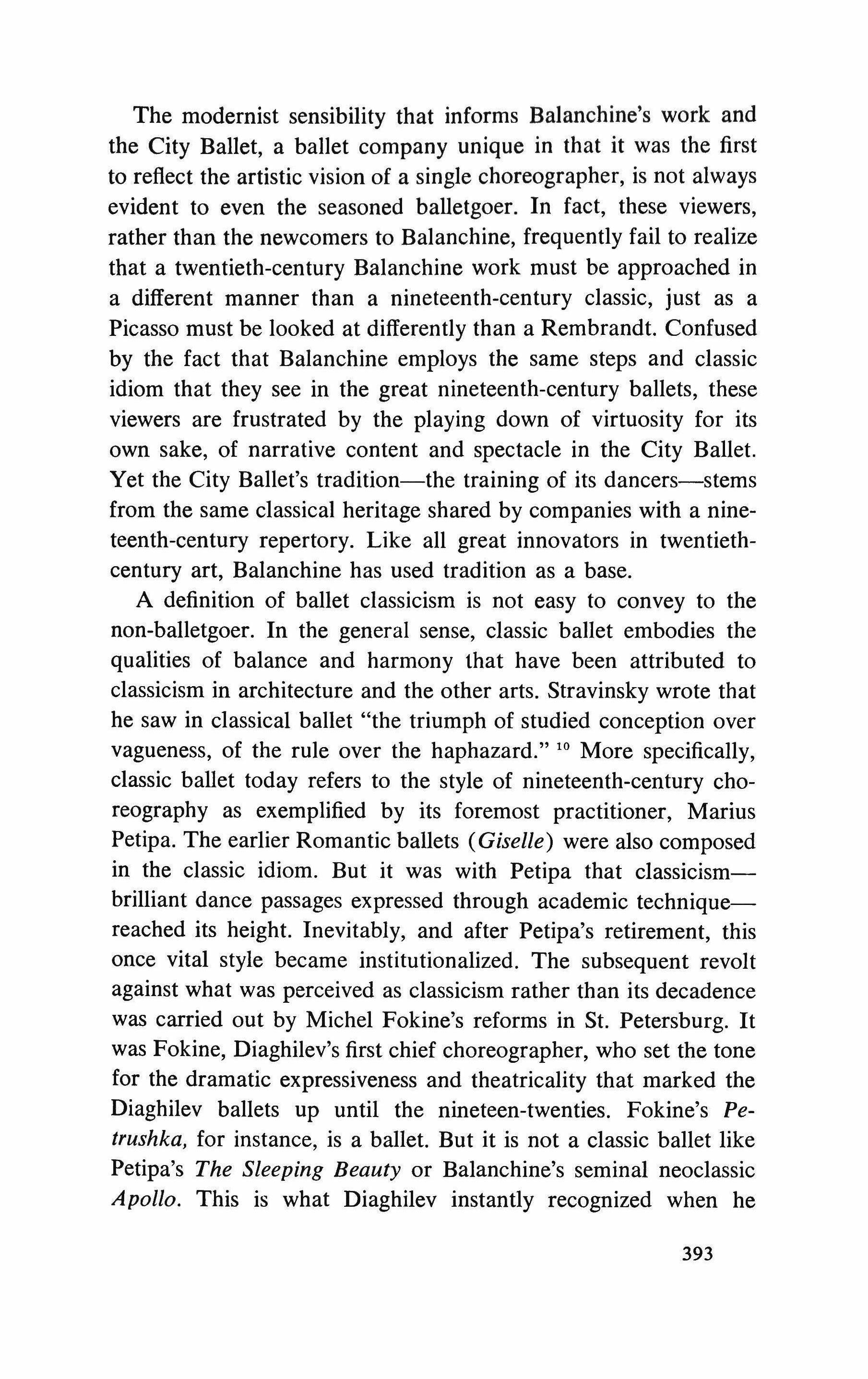
The modernist sensibility that informs Balanchine's work and the City Ballet, a ballet company unique in that it was the first to reflect the artistic vision of a single choreographer, is not always evident to even the seasoned balletgoer. In fact, these viewers, rather than the newcomers to Balanchine, frequently fail to realize that a twentieth-century Balanchine work must be approached in a different manner than a nineteenth-century classic, just as a Picasso must be looked at differently than a Rembrandt. Confused by the fact that Balanchine employs the same steps and classic idiom that they see in the great nineteenth-century ballets, these viewers are frustrated by the playing down of virtuosity for its own sake, of narrative content and spectacle in the City Ballet. Yet the City Ballet's tradition-the training of its dancers-stems from the same classical heritage shared by companies with a nineteenth-century repertory. Like all great innovators in twentiethcentury art, Balanchine has used tradition as a base.
A definition of ballet classicism is not easy to convey to the non-balletgoer. In the general sense, classic ballet embodies the qualities of balance and harmony that have been attributed to classicism in architecture and the other arts. Stravinsky wrote that he saw in classical ballet "the triumph of studied conception over vagueness, of the rule over the haphazard." 10 More specifically, classic ballet today refers to the style of nineteenth-century choreography as exemplified by its foremost practitioner, Marius Petipa. The earlier Romantic ballets (Giselle) were also composed in the classic idiom. But it was with Petipa that classicismbrilliant dance passages expressed through academic techniquereached its height. Inevitably, and after Petipa's retirement, this once vital style became institutionalized. The subsequent revolt against what was perceived as classicism rather than its decadence was carried out by Michel Fokine's reforms in St. Petersburg. It was Fokine, Diaghilev's first chief choreographer, who set the tone for the dramatic expressiveness and theatricality that marked the Diaghilev ballets up until the nineteen-twenties. Fokine's Petrushka, for instance, is a ballet. But it is not a classic ballet like Petipa's The Sleeping Beauty or Balanchine's seminal neoclassic Apollo. This is what Diaghilev instantly recognized when he
393

watched the young Balanchine creating Apollo in 1928. According to Nicholas Nabokov, Diaghilev's reaction to Balanchine was the following: "What he is doing is magnificent. It is pure classicism such as we have not seen since Petipa's." 11
Significantly, some of Balanchine's most revealing comments about himself are found in a discussion of Petipa with Lincoln Kirstein in Saratoga Springs, New York, in 1967. This brief but remarkable interview (never published in English) was contributed especially for a collection of articles about Petipa by choreographers in the East and West. Entitled Marius Petipa, the volume was published by "Iskusstvo" in Leningrad in 1971.
Calling Petipa "my spiritual father," Balanchine praises this "greatest master of them all" for his "combination of elegance and high professionalism." These are, in fact, the qualities that admirers of Balanchine would attribute to him as well. What Balanchine says of Petipa could be said of Balanchine himself. Petipa, says Balanchine, was a tireless worker. He did not wait for success or the whim of inspiration to create a ballet, just "as a chef does not wait to be pushed by his appetite into preparing a culinary masterpiece." Petipa was attracted to the very essence of dance: movement, steps, and the combinations of these steps. He used the individual capacities of his dancers and extended the vocabulary of ballet technique in trying to extend these dancers' capacities.
The above self-definition of Balanchine, through Petipa, concludes with the following pertinent statements: "The language of classic dance is unchanging, universal and eternal. Perhaps thanks to our efforts and the fact that the viewer now accepts what he previously rejected, that language has become more flexible and extensive but its base remains unchanged I personally believe that innovation is rarely new; usually it is merely the transformation of the old. Tradition is stronger than its negation. It can absorb the new with amazing speed."
If this sounds familiar it is not because the ideas are derivative; rather they are representative of the attitude of several generations of modern artists. This viewpoint received its most perfect critical expression in T. S. Eliot's seminal essay, "Tradition and the In-
394
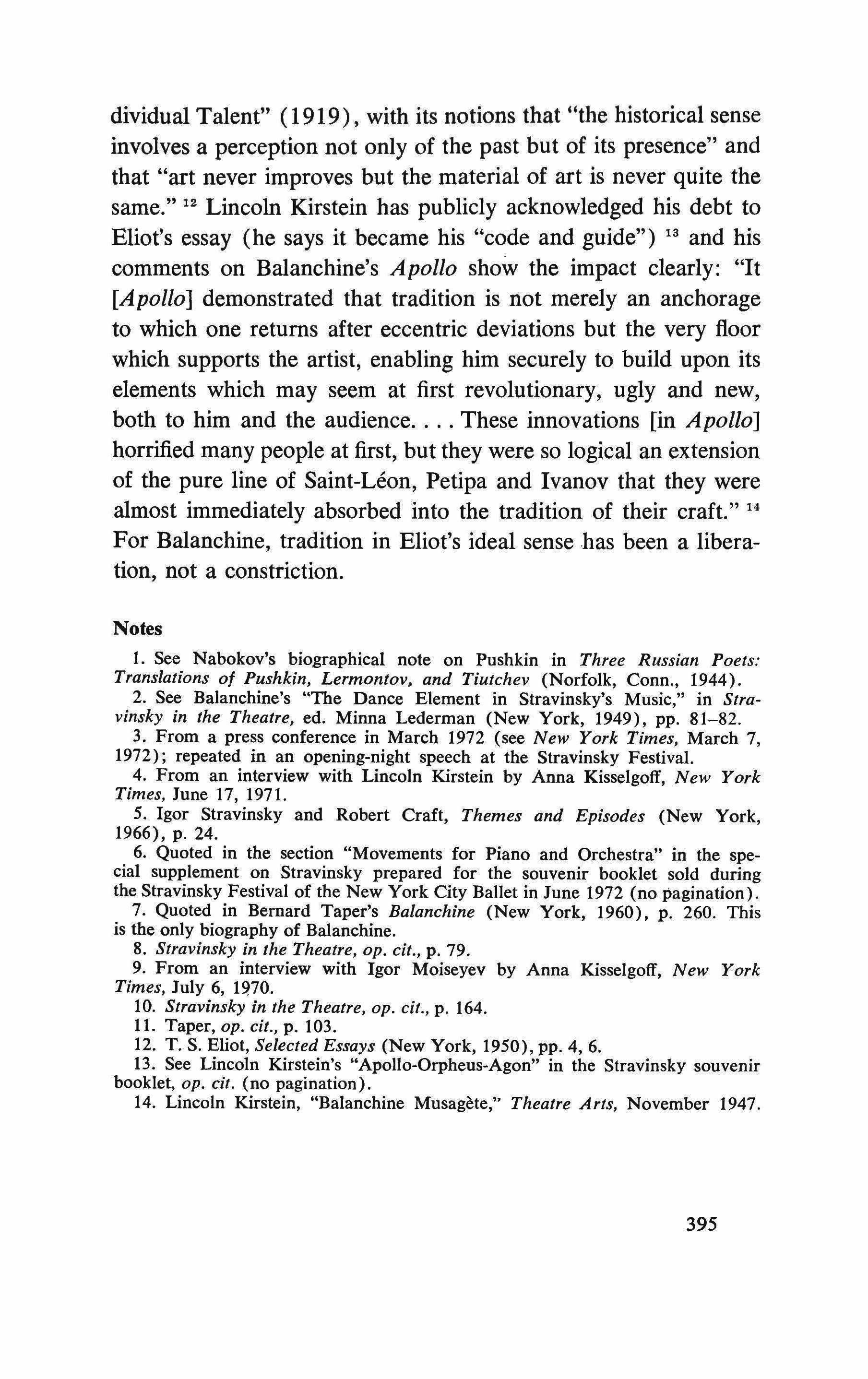
dividual Talent" (1919), with its notions that "the historical sense involves a perception not only of the past but of its presence" and that "art never improves but the material of art is never quite the same." 12 Lincoln Kirstein has publicly acknowledged his debt to Eliot's essay (he says it became his "code and guide") 13 and his comments on Balanchine's Apollo show the impact clearly: "It [Apollo] demonstrated that tradition is not merely an anchorage to which one returns after eccentric deviations but the very floor which supports the artist, enabling him securely to build upon its elements which may seem at first revolutionary, ugly and new, both to him and the audience These innovations [in Apollo] horrified many people at first, but they were so logical an extension of the pure line of Saint-Leon, Petipa and Ivanov that they were almost immediately absorbed into the tradition of their craft." 14 For Balanchine, tradition in Eliot's ideal sense has been a liberation, not a constriction.
Notes
1. See Nabokov's biographical note on Pushkin in Three Russian Poets: Translations of Pushkin, Lermontov, and Tiutchev (Norfolk, Conn., 1944).
2. See Balanchine's "The Dance Element in Stravinsky's Music," in Stravinsky in the Theatre, ed. Minna Lederman (New York, 1949), pp. 81-82.
3. From a press conference in March 1972 (see New York Times, March 7, 1972); repeated in an opening-night speech at the Stravinsky Festival.
4. From an interview with Lincoln Kirstein by Anna Kisselgoff, New York Times, June 17, 1971.
5. Igor Stravinsky and Robert Craft, Themes and Episodes (New York, 1966), p. 24.
6. Quoted in the section "Movements for Piano and Orchestra" in the special supplement on Stravinsky prepared for the souvenir booklet sold during the Stravinsky Festival of the New York City Ballet in June 1972 (no pagination).
7. Quoted in Bernard Taper's Balanchine (New York, 1960), p. 260. This is the only biography of Balanchine.
8. Stravinsky in the Theatre, op. cit., p. 79.
9. From an interview with Igor Moiseyev by Anna Kisselgoff, New York Times, July 6, 1970.
10. Stravinsky in the Theatre, op. cit., p. 164.
11. Taper, op. cit., p. 103.
12. T. S. Eliot, Selected Essays (New York, 1950), pp. 4, 6.
13. See Lincoln Kirstein's "Apollo-Orpheus-Agon" in the Stravinsky souvenir booklet, op. cit. (no pagination).
14. Lincoln Kirstein, "Balanchine Musagete," Theatre Arts, November 1947.
395
Mozart: theme and variations VLADIMIR MARKOV
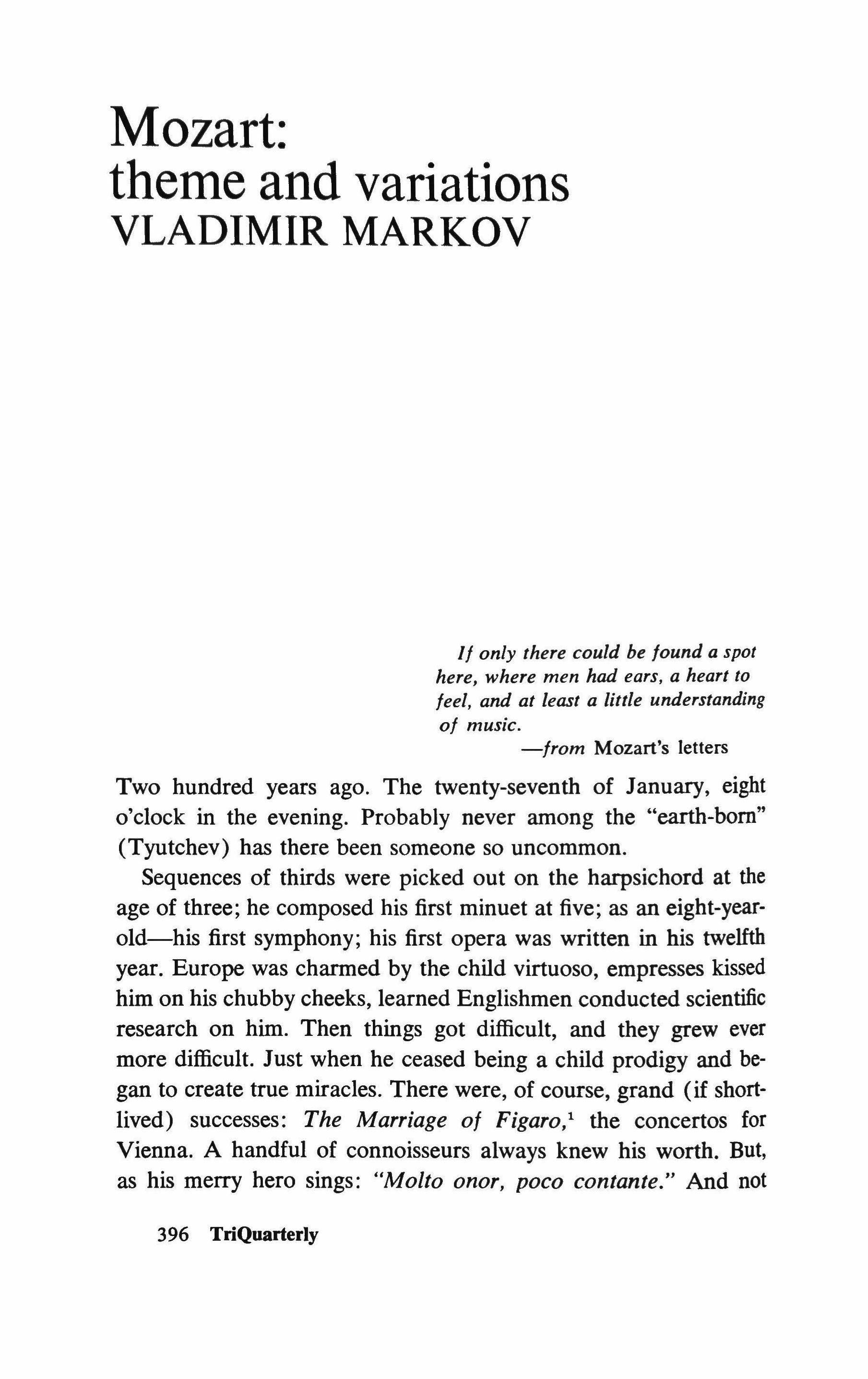
If only there could be found a spot here, where men had ears, a heart to feel, and at least a little understanding of music.
-from Mozart's letters
Two hundred years ago. The twenty-seventh of January, eight o'clock in the evening. Probably never among the "earth-born" (Tyutchev) has there been someone so uncommon.
Sequences of thirds were picked out on the harpsichord at the age of three; he composed his first minuet at five; as an eight-yearold-his first symphony; his first opera was written in his twelfth year. Europe was charmed by the child virtuoso, empresses kissed him on his chubby cheeks, learned Englishmen conducted scientific research on him. Then things got difficult, and they grew ever more difficult. Just when he ceased being a child prodigy and began to create true miracles. There were, of course, grand (if shortlived) successes: The Marriage of Figaro? the concertos for Vienna. A handful of connoisseurs always knew his worth. But, as his merry hero sings: "Molto onor, poco contante." And not 396 TriQuarterIy

always was there even much honor. It seemed that fate and men conspired to strike him down again and again. Metaphorical blows there were a-plenty; one was literal, when Count Arco kicked his behind down some stairs. Nor was this proud man and lover of the good life made for humiliation and poverty. Over a year before the end, he had come to wait for death. He died a beggar, in debt, a spiritual wreck, all his strength expended-feverishly, hurriedly finishing the composing of what he still could. He was buried in a common grave for paupers. No one has yet been able to find this grave.
Soon after his death, he became really famous. True, for his first love, Aloysia, Mozart remained merely "a nice little fellow." But his wife, Aloysia's sister, soon realized that Mozart was a great man (incidentally, she was a sweet but limited creature, who in her own way loved Mozart very much). She squandered his manuscripts, destroyed a great many letters, and crossed out lines in others: the nineteenth century was just beginning and had its own conception of morality and its own opinion about the relationship of that morality to greatness.
The nineteenth century revered Mozart. Whether it understood him is another question. He and Raphael were always referred to as the summit of perfection (only in our time has a different painter been found whose name goes incomparably better with Mozart's-Watteau). Schumann called Mendelssohn the Mozart of the nineteenth century (the way Ostrovsky is dubbed the Russian Moliere). Not that the century really knew Mozart well: only an insignificant portion of his works were performed, the "unquestionably great" works-that is, three of the forty symphonies, one or two of the more than twenty remarkable concertos for pianoforte. His operas were staged at times in an altogether outrageous manner: at the beginning of the century The Magic Flute was performed in Paris with music from various works, not only by Mozart, but by Haydn too. Tamino sang the Queen of the Night's first aria, and the Queen herself, on the other hand, sang Donna Anna's vengeance aria from Don Giovanni. Finally a shepherd (where did he come from?) and a totally unidentifiable
397

Mona sang a duet (!) to the music of Don Giovanni's "champagne" aria. In time this sort of thing came to an end, as a growing academic conscientiousness took over. They even began to attach the real finale to Don Giovanni-with no letup, it's true, in the complaining and lamenting that it "lowered the dramatic quality." The "amoral" and "preposterous" Cost fan tutte was barred from the stage. In short: there was no love for Mozart. And all through the nineteenth century there could be heard the strumming of thousands of poor little girls, whose feet did not reach the pedals, and who with no enthusiasm banged out the Sonata K. 545, secretly hating this Mozart, since at the mention of his name their music teachers invariably produced some sound resembling an exclamation point and an expression of sedate, stupid rapture.
There's no point in painting the picture too black. Many great composers were drawn to Mozart, among them such opposites as Chopin and Brahms, Wagner and Tchaikovsky, Rossini and Richard Strauss. And not only composers: Stendhal, Balzac, Ingres, Delacroix. Goethe understood Mozart, the way he understood everything; it was he who said that only Mozart could compose the music for his Faust. Let us not forget that Pushkin's tragedy and the story by Eduard Morike were written in the nineteenth century.
An unexpected discovery of Mozart is occurring in our time. A shift is taking place within the Bach-Mozart-Beethoven triad. The nineteenth century put Beethoven in first place; at the beginning of the twentieth century there was a tendency to reserve this place for Bach; and now Mozart is mentioned more and more as number one. But the triad itself is "eternal"; one can hardly speak seriously about a fourth candidate for this company. Perhaps it is still too early to analyze the meaning of the shift. Although it is possible to assert that if you are searching for man in music, then your composer is Beethoven; if music for you is a means of communion with God, you will hardly bypass Bach; but if you want music from music, then the name Mozart acquires for you a special significance.
This authentic musicality was our first and most important discovery in Mozart. We are speaking here, of course, not about "art
398

for art's sake," not about mathematics, not about abstraction, but about limits correctly divined. Musical meaning does not coincide with a "resume of content," whether of plots (in opera), or of "ideology" (in symphonies). From the point of view of "content," COSl fan tutte is an absurd anecdote, The Magic Flute a hodgepodge. But as soon as their music reaches you The musical meaning of Mozart is harbored not only in the change of keys and their selection, the type of modulations and so on, but in peculiar "nooks," which more often than not do not coincide with the main incidents of the plot. An example might be the Count asking the Countess' forgiveness in The Marriage of Figaro, or Fiordiligi's part in the farewell quartet. These "nooks" are especially numerous in Donna Anna's role.
The second thing that we discovered in Mozart is his true humanity. This does not contradict the fact that we linked the human with Beethoven. In Beethoven, man is a rebel and is alone, the favored hero of the Faustian age, Man with a capital M, the master of nature, which has a "proud sound," and so forth. In Mozart there is everything valuable that has been accumulated by the human community, man in his modest and disciplined communication with his own kind-of which life has actually consisted (not "ought to consist") from time immemorial. From this point of view there is no music more humane and more human. A French traveler through the jungles of the Amazon played for the most savage people on earth records of boogie-woogie and military marches, and did not make the slightest impression on them. A Mozart symphony "did not cover their faces with a mask of fear it revealed the inmost recesses of their hearts." We needed two hundred years to figure out Mozart. In spite of the established conception of the unclouded Olympian quality of Mozart, in our time drama was discovered in him (how could it have been missed earlier?). In this, our opinion coincided with that of his contemporaries, who considered his music passionate and melancholy. When the shadows were found, the light also began to sparkle in a new way. Here is one of the explanations of our gravitation toward Mozart, a gravitation toward the opposite: our horror has patches
399

of light, his light has dark "nooks." Verbal labels reveal little, and in the majority of cases one cannot even say whether he is joyful or sad: at times the one and the other are in inseparable conjunction. At any rate, the common misunderstanding-that Mozart is typical rococo-has come to an end. Goethe's words about Mozart's "demonic spirit" no longer sound like a paradox.
Even in high school one learns that it is more difficult to depict the "positive characters" than the "negative characters" (of course it is the "positive" Chatsky that is mentioned). God knows how much Soviet critics have written about the "problem of the positive hero," but the problem is still there-and not only because they were talking through their hats. Mozart solves the problem with the greatest of ease, both on the everyday level (the finale of The Marriage of Figaro, with its triumph of decency), and on the more elevated (The Magic Flute). In the latter, with a stunning escape from stereotype, good is entrusted to the villain's voice, the bass; and evil, to the coloratura soprano-which makes everything sparkle with new colors. It is interesting that up close even Mozart's religious beliefs turn out to be deeper than those of the romantics: they pondered faith, he had faith. These religious beliefs are unconscious, but profound and firm (just like Pushkin's), and all his work is an unending paean to the Creator. It is enough to listen carefully to the orchestral introductions to almost all his concertos: there is pure joy in them. Joy, precisely, and not gaiety; the joy of the acceptance of life. Now Beethoven's Freude, as we all know, is not joy at all, but the pseudonym of Freiheit, which has brought precious little joy to the world.
Attentive listening also reveals in Mozart a great novelty of musical language, surprises at every turn. Not for nothing did his contemporaries consider him a "modernist." Critics of those days called Mozart a "musical Daedalus," constructing "labyrinths without entrances," saw in him "an inclination toward the unusual," found that he "goes too far" and that he "leads the listener between overhanging cliffs into a prickly forest where flowers are found only rarely." They often lamented that Mozart's music was oversaturated (as if he were Richard Strauss), and Emperor Joseph II complained that in The Marriage of Figaro Mozart
400

drowns out the singers with his orchestra (as if he were Wagner). A feeling of modernity is not lost even to our ears. It's not even a question of dissonances and chromaticism. Try listening to the finale of the "Jupiter" without thinking about fugue, or about development-listening to pure sound: in places it is pure Hindemith. And the minuet from the G-minor Symphony that everyone knows: as on the canvases of Picasso, behind the first minuet there appears a second, one of a "different color" (hysterical, piercing), one that does not coincide with the outlines of the first.
The growth of interest in Mozart, and especially the flooding of the market with diverse records, has also revealed a generic variety that is comparable with no one else's. In this respect, how monotonous in comparison with him are the public's favoritesVerdi, Chopin, Tchaikovsky. Even a great lover of Mozart, who knows his Don Giovanni down to its last Italian comma, can for years on end discover in Mozart's boundless oeuvre masterpieces that were previously unknown to him: now a pianoforte quartet, now a concert aria, now a motet, now a German dance.
Finally, one more interesting fact is being discovered: rarely is there anything in the music that has come after Mozart which is not already there in Mozart. In the overture to The Magic Flute, specialists find the whole history of music from Bach to Debussy. But one need not be a specialist to discern Chopin, Schumann, and others in individual passages. All of Beethoven may be found, even the Beethoven of the last quartets. Mozart's admirers may rightfully insist that other music (both before and after) need not even have existed.
Many fine books about Mozart have appeared in our time. Their value lies not only in biographical research or analysis of his works. Their authors more (Blom, Einstein) or less (Sitwell, Gheen) professionally attempt to transmit a general impression of Mozart's music, but mainly they attempt to pay mankind's overdue debt and to make him a declaration of love. But not one book succeeds in re-creating a living image of Mozart the man. This image must be sought on the pages of the few memoirs and, still better, in his remarkable letters. These letters deserve a place among the major works of literature. In them there are keen portraits, word-play
401

that approaches metalogicallanguage (zaum'), a plentiful supply of that laughter we know from Cost fan tutte and the horn concertos. Like Pushkin in his poetic epistles, Mozart transforms himself depending on who his addressee is: deferential with his father C'Mon (res cher Pere'"); indecent and "futuristic" in letters to his Augsburg lady cousin; playing the blissful, silly fool in letters to his wife, letters full of that charming banality without which there is no mutual connubial happiness. As a true artist he views the world straight on, distinctly, and he expresses it without moralizing, with a Hemingway-like laconicism: "I saw them hanging four lads in the cathedral square. They do it here the way they do it in Lyon." As a true artist, he is not inclined to exaggerate the significance of this world: "I didn't go to look at the hot-air balloon. First of all, I can picture very well to myself what it is." And besides, as a true artist, he takes note of the eternal and so very contemporary situation: "No one any longer knows or values moderation and truth. In order to achieve success, you either have to write so simply that any cabby can whistle the melody, or else so incomprehensibly that it is liked precisely because any other rational being cannot possibly understand it."
It is interesting that Mozart was not an intellectual, in contrast to many of his colleagues (both then and later). One could count on the fingers of one's hands the number of books he read. On the other hand, he liked to dance, to dress up, to possess fine things. He loved to play billiards, to drink grog. Despite a life that turned out unhappily and absurdly, any chip on the shoulder (so familiar to us) is absent. He is simply and healthily sure of his genius, without Beethoven's aggressiveness ("Prince Kaunitz told the Archbishop that people like me are born only once every hundred years").
Faith in himself, faith in God, a wonderful family. He could have repeated after Goethe: "Vom Vater hab' ich die Statur Vom Miitterchen die froh' Natur." * Everything started out so well: they loved and respected each other, a great success, firm founda-
"From my father I have my stature from my mother my cheerful nature." EDITOR.
402
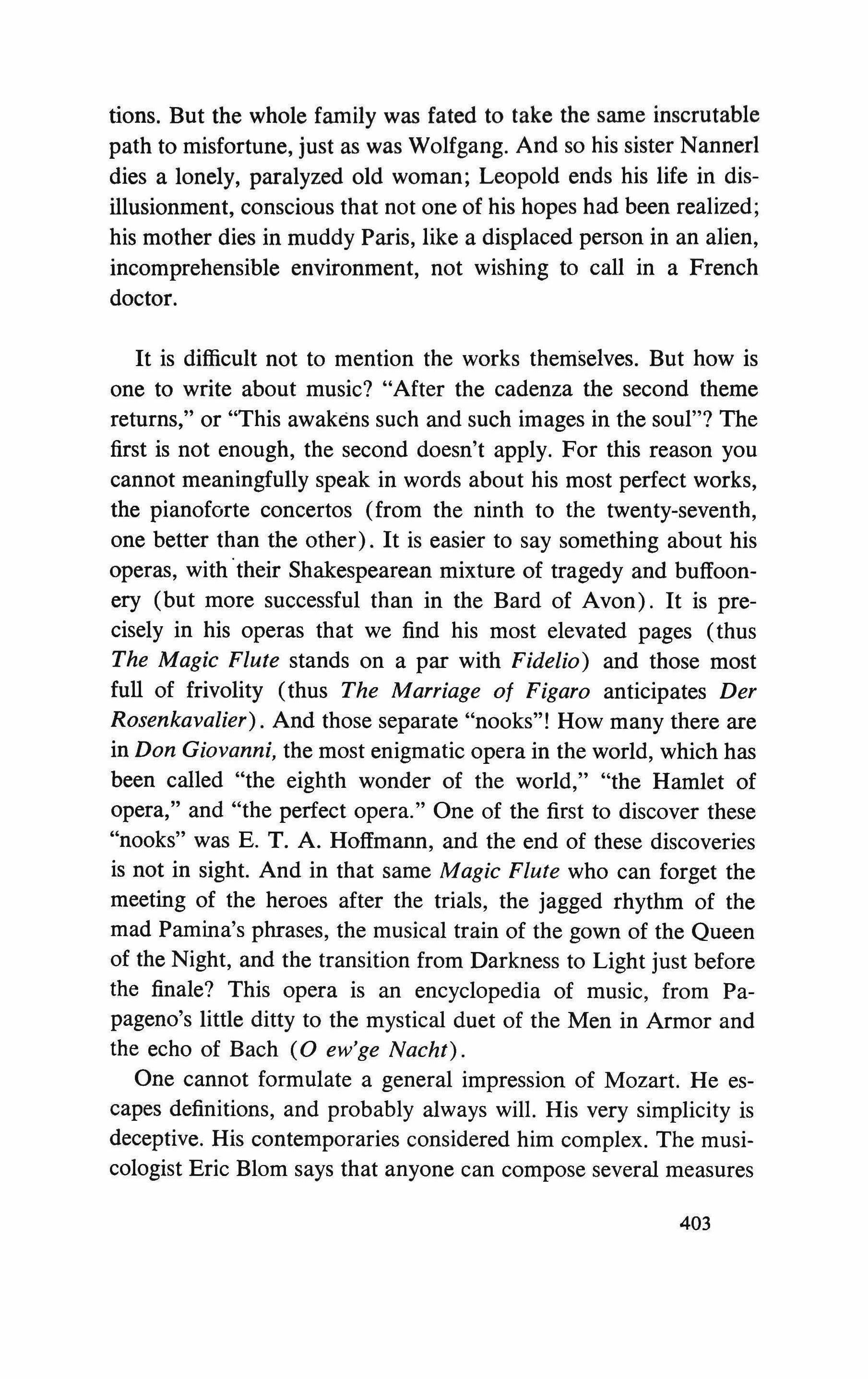
tions. But the whole family was fated to take the same inscrutable path to misfortune, just as was Wolfgang. And so his sister Nannerl dies a lonely, paralyzed old woman; Leopold ends his life in disillusionment, conscious that not one of his hopes had been realized; his mother dies in muddy Paris, like a displaced person in an alien, incomprehensible environment, not wishing to call in a French doctor.
It is difficult not to mention the works themselves. But how is one to write about music? "After the cadenza the second theme returns," or "This awakens such and such images in the soul"? The first is not enough, the second doesn't apply. For this reason you cannot meaningfully speak in words about his most perfect works, the pianoforte concertos (from the ninth to the twenty-seventh, one better than the other). It is easier to say something about his operas, with 'their Shakespearean mixture of tragedy and buffoonery (but more successful than in the Bard of Avon). It is precisely in his operas that we find his most elevated pages (thus The Magic Flute stands on a par with Fidelio) and those most full of frivolity (thus The Marriage of Figaro anticipates Der Rosenkavalier). And those separate "nooks"! How many there are in Don Giovanni, the most enigmatic opera in the world, which has been called "the eighth wonder of the world," "the Hamlet of opera," and "the perfect opera." One of the first to discover these "nooks" was E. T. A. Hoffmann, and the end of these discoveries is not in sight. And in that same Magic Flute who can forget the meeting of the heroes after the trials, the jagged rhythm of the mad Pamina's phrases, the musical train of the gown of the Queen of the Night, and the transition from Darkness to Light just before the finale? This opera is an encyclopedia of music, from Papageno's little ditty to the mystical duet of the Men in Armor and the echo of Bach (0 ew'ge Nacht)
One cannot formulate a general impression of Mozart. He escapes definitions, and probably always will. His very simplicity is deceptive. His contemporaries considered him complex. The musicologist Eric Blom says that anyone can compose several measures 403

of a Mozart-like melody, but let him try to develop it. And indeed, compare the "Lacrimosas" in the Requiems of Verdi and Mozart. The first begins more beautifully, melodically more substantially, and more opulently, but after several measures, Verdi no longer knows what to do with the melody; it is precisely in the development that Mozart shows what he is capable of. In general, his simplicity often only accompanies the complexity (again, as in Pushkin). He writes about his concertos: "Here and there are spots which afford pleasure only to the connoisseurs, but even a nonconnoisseur will be pleased without knowing why."
Mozart wrote subtle quartets and pretty little waltzes for dancing parties in an equally beautiful way; for a church organ, and for a mechanical clock or something called a glass harmonica. He once wrote for an orchestra consisting of two flutes, five trumpets, and four drums. The most interesting thing is that what we call "hack work" never resulted; it is all first-rate music. He would write to order, would follow the fashion, would not express his heart (his most radiant works were written in the most difficult times), would borrow from himself and from others, would entertain-the one thing he did not do, it appears, was to write "for eternity."
One can say that Beethoven's music is music of birth and of conception (this is especially clear at the beginning of the Seventh and Ninth symphonies), and that Schubert's music is music of pure motion (most evident in his C-Major Symphony). What about Mozart's music? "Flawless" is a word that conveys nothing. It would be incorrect to speak of "perfection." One can speak of an "aristocratic quality," "purity," and so on, and be immediately refuted. The critic Turner calls him an "enigma," and the pianist Schnabel, "the most inaccessible of the great masters." He's considered a classicist, but he's also called a romantic (Graf). For many, Mozart is full of light; others insist that at the core of his music there is death (Gheon).
His death mask was not preserved (Constanze said: "Thank God, that hideous thing got broken," and she swept up the pieces).
404
His portraits, like his works, do not resemble each other. No one knows where he is buried, and no one knows how he played the cadenzas in his concertos. Nor does anyone really know in general how to play him. In the well-known G-Minor Symphony, if tragedy is emphasized, things go wrong; if it is not emphasized, things are wrong again. The Requiem is to be explained neither by tradition, nor by Catholicism, nor by theatricality, nor by Romanesque architecture. Nor by the fact that the degree of Mozart's authorship is undetermined. Nor can it be explained by freemasonry: when the mezzo-soprano begins Judex ergo cum sedebit-what does it have to do with freemasonry? It's simply chills up and down the spine. One thing is clear: despite all obstacles, mankind has stumbled upon Mozart and now will not let go, no matter how fashions may change. All we can do is to delve deeper into what has been found, to unearth the riches. In the same way they will some day stumble upon Pushkin. The Russians have him; beyond the borders of Russia almost no one knows him. With Mozart it is the reverse: Europe and America have found him, Russia still has not.
He and Mozart adore Moscow. -Mandelstam
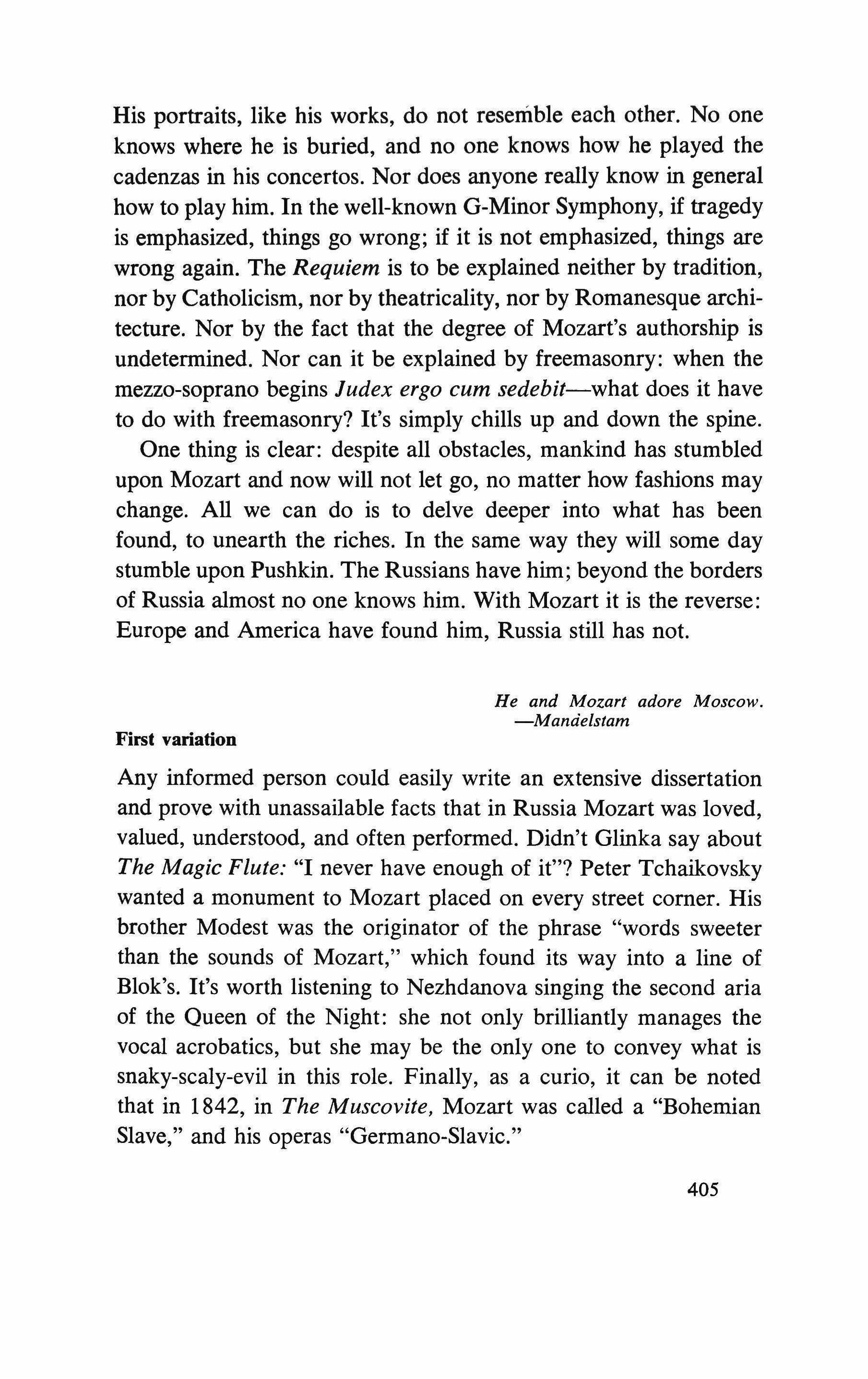
First variation
Any informed person could easily write an extensive dissertation and prove with unassailable facts that in Russia Mozart was loved, valued, understood, and often performed. Didn't Glinka say about The Magic Flute: "I never have enough of it"? Peter Tchaikovsky wanted a monument to Mozart placed on every street corner. His brother Modest was the originator of the phrase "words sweeter than the sounds of Mozart," which found its way into a line of Blok's. It's worth listening to Nezhdanova singing the second aria of the Queen of the Night: she not only brilliantly manages the vocal acrobatics, but she may be the only one to convey what is snaky-scaly-evil in this role. Finally, as a curio, it can be noted that in 1842, in The Muscovite, Mozart was called a "Bohemian Slave," and his operas "Germano-Slavic."
405
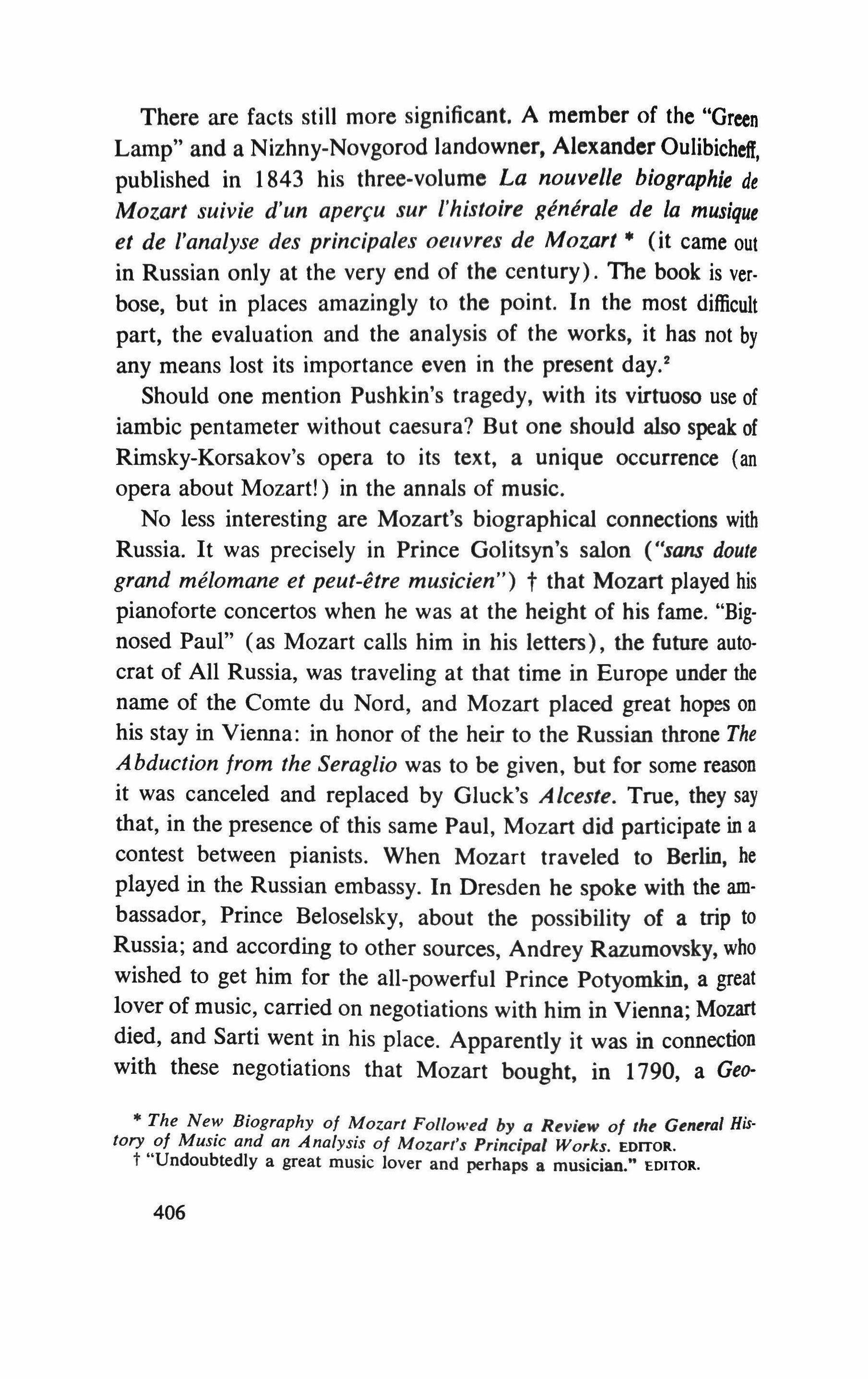
There are facts still more significant. A member of the "Green Lamp" and a Nizhny-Novgorod landowner, Alexander Oulibicheff, published in 1843 his three-volume La nouvelle biographie de Mozart suivie d'un apercu sur l'histoire generale de la musique et de l'analyse des principales oeuvres de Mozart." (it came out in Russian only at the very end of the century). The book is verbose, but in places amazingly to the point. In the most difficult part, the evaluation and the analysis of the works, it has not by any means lost its importance even in the present day.'
Should one mention Pushkin's tragedy, with its virtuoso use of iambic pentameter without caesura? But one should also speak of Rimsky-Korsakov's opera to its text, a unique occurrence (an opera about Mozart!) in the annals of music.
No less interesting are Mozart's biographical connections with Russia. It was precisely in Prince Golitsyn's salon ("sans douu grand melomane et peut-etre musicien") t that Mozart played his pianoforte concertos when he was at the height of his fame. "Bignosed Paul" (as Mozart calls him in his letters), the future autocrat of All Russia, was traveling at that time in Europe under the name of the Comte du Nord, and Mozart placed great hopes on his stay in Vienna: in honor of the heir to the Russian throne The Abduction from the Seraglio was to be given, but for some reason it was canceled and replaced by Gluck's Alceste. True, they say that, in the presence of this same Paul, Mozart did participate in a contest between pianists. When Mozart traveled to Berlin, he played in the Russian embassy. In Dresden he spoke with the ambassador, Prince Beloselsky, about the possibility of a trip to Russia; and according to other sources, Andrey Razumovsky, who wished to get him for the all-powerful Prince Potyomkin, a great lover of music, carried on negotiations with him in Vienna; Mozart died, and Sarti went in his place. Apparently it was in connection with these negotiations that Mozart bought, in 1790, a Geo-
The New Biography of Mozart Followed by Q Review 01 the G�n�ral History 01 Music and an Analysis 01 Mozart's Principal Works. EDITOR. t "Undoubtedly a great music lover and perhaps a musician." EDITOR. 406

graphisches und topographisches Reisebucb durch aile Staaten der osterreichischen Monarchie nebst der Reiseroute nach Petersburg durch Polen:" Another curious fact: Nannerl's notebook, with Wolfgang's first minuets, somehow found its way into the possession of a Russian lady of the high nobility, who returned the notebook to Salzburg one hundred years after brother and sister played from it. All these are interesting and at times convincing facts. Undoubtedly one could add much more to them. And still
And still one is rather uncomfortable saying, "Mozart is loved and understood in Russia." Deep down, one feels that this is not so. And almost anyone of the foregoing statements needs correction.
Glinka, for instance, stubbornly disputed that Mozart's Don Giovanni was a great work. Tchaikovsky was in raptures over Mozart, but wasn't it only because he saw in him the ideal counterbalance to the "Moussorgskianism" he hated? In his inner musical nature there is no composer who is more a diametrical opposite of Mozart than Tchaikovsky. Tchaikovsky is convincing only psychologically, and at times he is not responsive to the logic of musical development. In his two deliberate imitations of Mozartthe "Pastorale" in The Queen of Spades, and the "Variations on a Rococo Theme"-if Mozart is present, then it is only the one invented by the nineteenth century, whom those piano-playing little girls so rightly hated. If Tchaikovsky understood his beloved Mozart in just the way he expressed it in these two works, we are justified in concluding that he loved not Mozart but someone else invented during "sleepless nights" (Apukhtin). Both of these compositions are imitations of little interest, imitations of some abstract Zopjmusik. At any rate, Tchaikovsky did not succeed in perceiving Mozart creatively (that is, in grasping for himself the underlying principle, and not simply copying the style). On the other hand, a composer who was infinitely distant from Mozart
* Geographical and Topographical Travel Book Through A II the States of the Austrian Monarchy and Also the Route to Petersburg Through Poland.
407
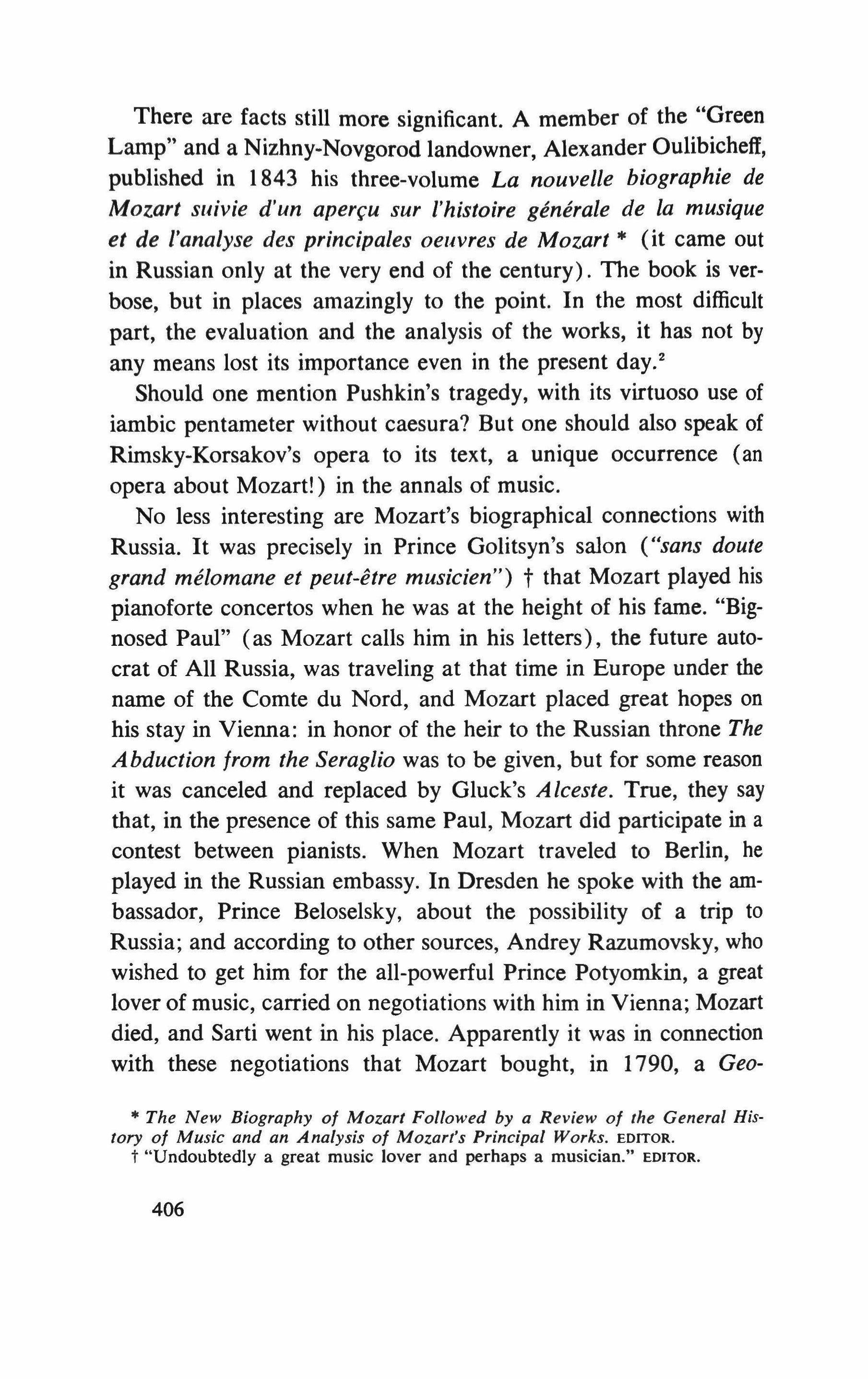
There are facts still more significant. A member of the "Green Lamp" and a Nizhny-Novgorod landowner, Alexander Oulibicheff, published in 1843 his three-volume La nouvelle biographie de Mozart suivie d'un apercu sur l'histoire generale de la musique et de l'analyse des principales oeuvres de Mozart * (it came out in Russian only at the very end of the century). The book is verbose, but in places amazingly to the point. In the most difficult part, the evaluation and the analysis of the works, it has not by any means lost its importance even in the present day.'
Should one mention Pushkin's tragedy, with its virtuoso use of iambic pentameter without caesura? But one should also speak of Rimsky-Korsakov's opera to its text, a unique occurrence (an opera about Mozart!) in the annals of music.
No less interesting are Mozart's biographical connections with Russia. It was precisely in Prince Golitsyn's salon ("sans doute grand melomane et peut-etre musicien") t that Mozart played his pianoforte concertos when he was at the height of his fame. "Bignosed Paul" (as Mozart calls him in his letters), the future autocrat of All Russia, was traveling at that time in Europe under the name of the Comte du Nord, and Mozart placed great hopes on his stay in Vienna: in honor of the heir to the Russian throne The Abduction from the Seraglio was to be given, but for some reason it was canceled and replaced by Gluck's Alceste. True, they say that, in the presence of this same Paul, Mozart did participate in a contest between pianists. When Mozart traveled to Berlin, he played in the Russian embassy. In Dresden he spoke with the ambassador, Prince Beloselsky, about the possibility of a trip to Russia; and according to other sources, Andrey Razumovsky, who wished to get him for the all-powerful Prince Potyomkin, a great lover of music, carried on negotiations with him in Vienna; Mozart died, and Sarti went in his place. Apparently it was in connection with these negotiations that Mozart bought, in 1790, a Geo-
• The New Biography of Mozart Followed by a Review of the General History of Music and an Analysis of Mozart's Principal Works. EDITOR. t "Undoubtedly a great music lover and perhaps a musician." EDITOR.
406
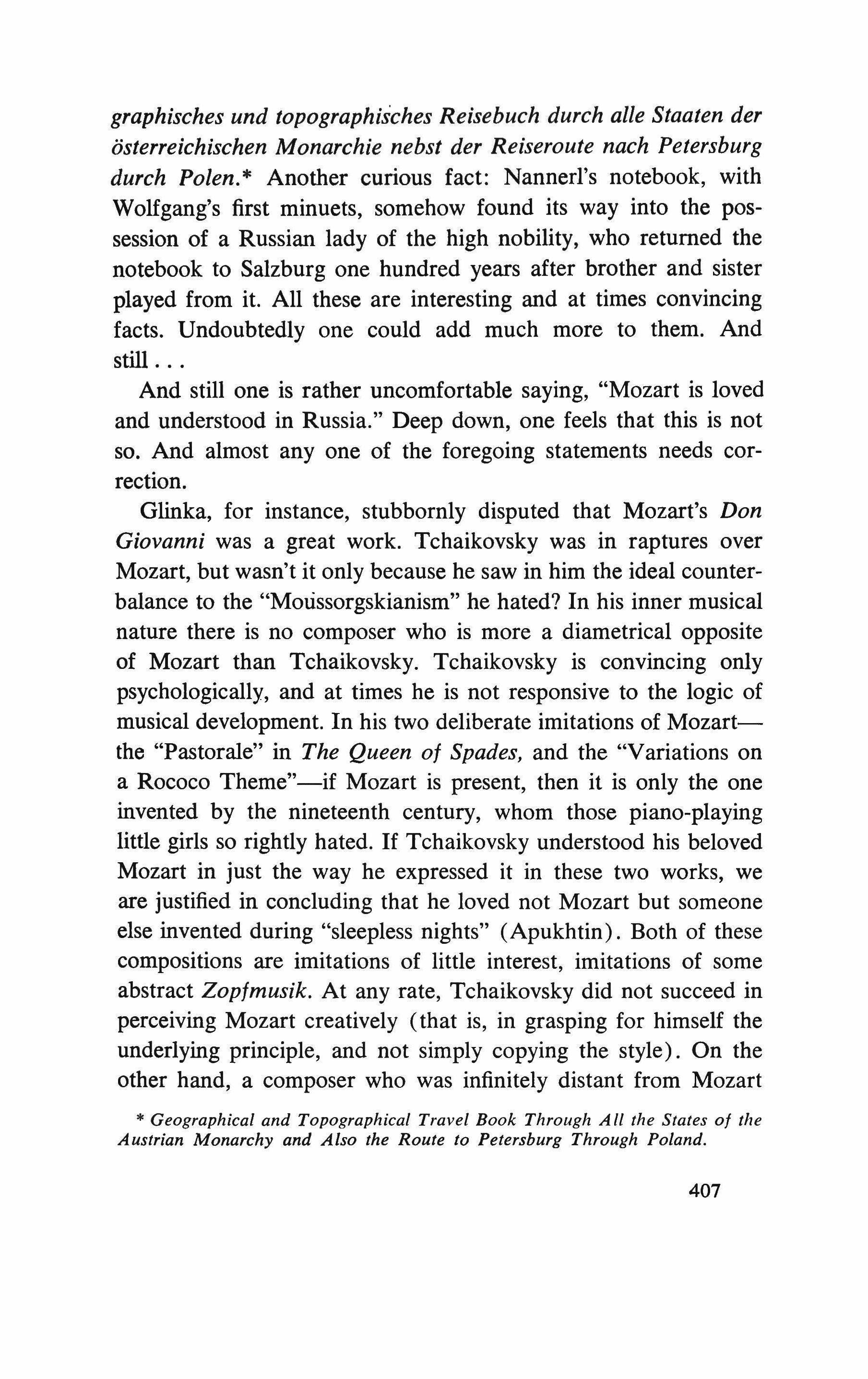
graphisches und topographisches Reisebuch durch aile Staaten der osterreichlschen Monarchie nebst der Reiseroute nach Petersburg durch Polen. * Another curious fact: Nannerl's notebook, with Wolfgang's first minuets, somehow found its way into the possession of a Russian lady of the high nobility, who returned the notebook to Salzburg one hundred years after brother and sister played from it. All these are interesting and at times convincing facts. Undoubtedly one could add much more to them. And still
And still one is rather uncomfortable saying, "Mozart is loved and understood in Russia." Deep down, one feels that this is not so. And almost anyone of the foregoing statements needs correction.
Glinka, for instance, stubbornly disputed that Mozart's Don Giovanni was a great work. Tchaikovsky was in raptures over Mozart, but wasn't it only because he saw in him the ideal counterbalance to the "Moiissorgskianism" he hated? In his inner musical nature there is no composer who is more a diametrical opposite of Mozart than Tchaikovsky. Tchaikovsky is convincing only psychologically, and at times he is not responsive to the logic of musical development. In his two deliberate imitations of Mozartthe "Pastorale" in The Queen of Spades, and the "Variations on a Rococo Theme"-if Mozart is present, then it is only the one invented by the nineteenth century, whom those piano-playing little girls so rightly hated. If Tchaikovsky understood his beloved Mozart in just the way he expressed it in these two works, we are justified in concluding that he loved not Mozart but someone else invented during "sleepless nights" (Apukhtin). Both of these compositions are imitations of little interest, imitations of some abstract Zopjmusik. At any rate, Tchaikovsky did not succeed in perceiving Mozart creatively (that is, in grasping for himself the underlying principle, and not simply copying the style). On the other hand, a composer who was infinitely distant from Mozart
Geographical and Topographical Travel Book Through A II the States of the Austrian Monarchy and Also the Route to Petersburg Through Poland.
407

in his personal make-up, Richard Wagner, took the principle of his music drama from The Marriage of Figaro, as he states in one of his letters.
Not a single Russian singer built a reputation on Mozart, even though Russia had its own small Wagnerian pleiade. Listen to how crudely and stylistically wrong Chaliapin is in his interpretation of Leporello's catalogue aria (although he has no difficulty at all with Rossini's Don Basilio). And in general Mozart was performed in Russia rather little, rather seldom, rather pedantically and as if the musicians were duty-bound.
Oulibicheff is one of those exceptions which confirm the rule. Much more influential and much more truly expressing the general Russian point of view of music, Stasov, for instance, called the overture to The Magic Flute "an exceedingly dry and boring balancing act, with a theme that goes over and over the same ground in a very ridiculous fashion." (Oulibicheff devotes a separate chapter to it and calls it "the crown of all instrumental music, nunc et in saecula.")
Recalling the fruitful activity of the Mozart Society in Paris, Pablo Casals' festival in Perpignan, the famous productions of the operas of Mozart in the little English town of Glyndebourne, the innumerable "opera workshops" of American young people, which put on even La Finta Semplice--one must admit that the Russians have never done, and are not doing, anything like it.
Nor has the situation changed in recent years. Mozart is almost never presented on stage. Only occasionally are his operas heard in concert performance. For The Marriage of Figaro, Leningrad music lovers were indebted to the visiting conductor Fritz Stiedry, without whom no one would even have thought of producing this opera. Only a small selection of the symphonies and concertos of Mozart are performed, and, more often than not, uninterestingly. It is hardly by chance that the most widely known piece of Mozart's in Russia now is the little lullaby "Schlafe, mein Prinzchen, schlaf ein," which wasn't even composed by Mozart but by the little-known and forgotten composer Bernhard Flies. Is it worth adding that in the Great Soviet Encyclopedia Mozart is
408
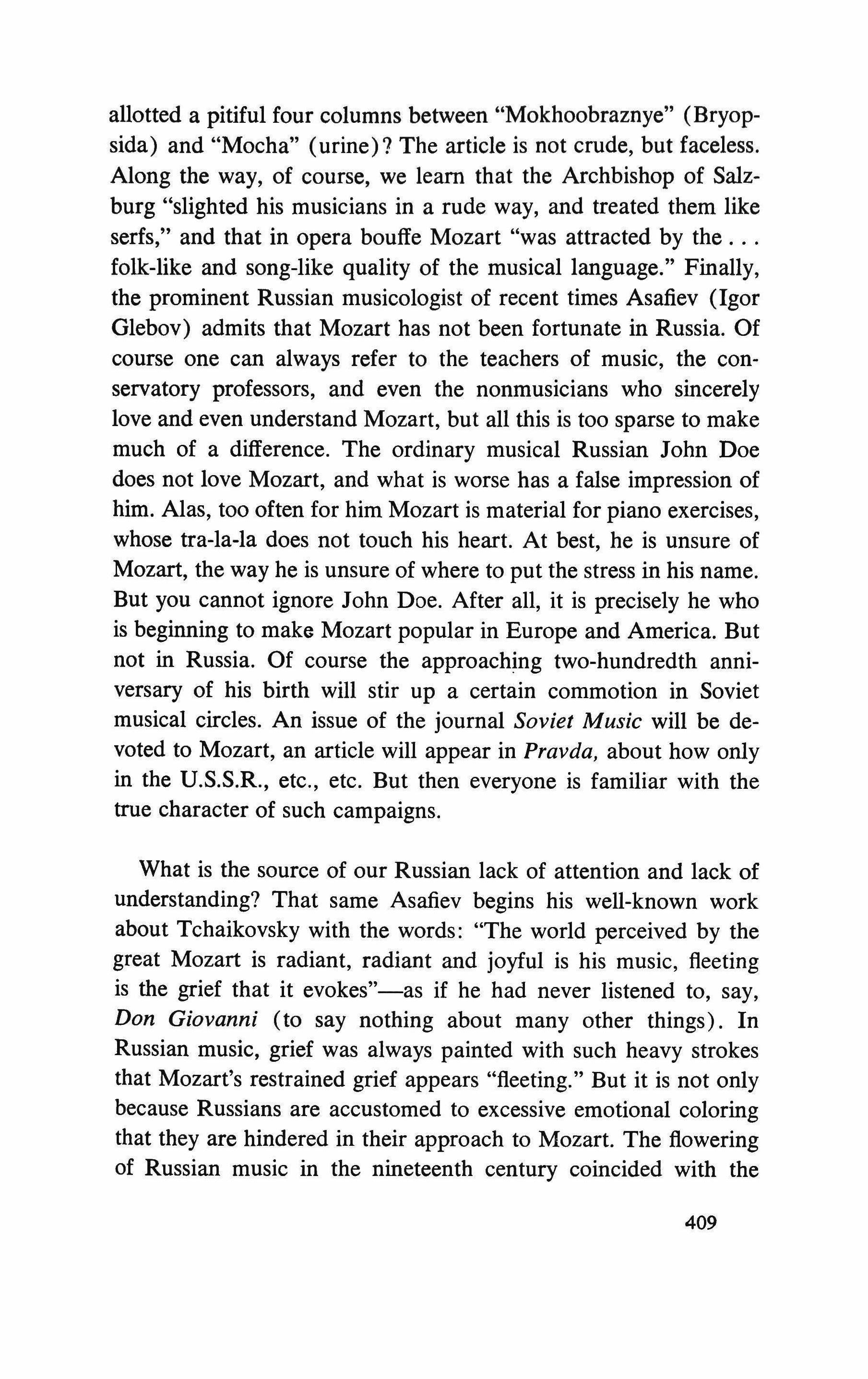
allotted a pitiful four columns between "Mokhoobraznye" (Bryopsida) and "Mocha" (urine)? The article is not crude, but faceless. Along the way, of course, we learn that the Archbishop of Salzburg "slighted his musicians in a rude way, and treated them like serfs," and that in opera bouffe Mozart "was attracted by the folk-like and song-like quality of the musical language." Finally, the prominent Russian musicologist of recent times Asafiev (Igor Glebov) admits that Mozart has not been fortunate in Russia. Of course one can always refer to the teachers of music, the conservatory professors, and even the nonmusicians who sincerely love and even understand Mozart, but all this is too sparse to make much of a difference. The ordinary musical Russian John Doe does not love Mozart, and what is worse has a false impression of him. Alas, too often for him Mozart is material for piano exercises, whose tra-la-la does not touch his heart. At best, he is unsure of Mozart, the way he is unsure of where to put the stress in his name. But you cannot ignore John Doe. After all, it is precisely he who is beginning to make Mozart popular in Europe and America. But not in Russia. Of course the approaching two-hundredth anniversary of his birth will stir up a certain commotion in Soviet musical circles. An issue of the journal Soviet Music will be devoted to Mozart, an article will appear in Pravda, about how only in the U.S.S.R., etc., etc. But then everyone is familiar with the true character of such campaigns.
What is the source of our Russian lack of attention and lack of understanding? That same Asafiev begins his well-known work about Tchaikovsky with the words: "The world perceived by the great Mozart is radiant, radiant and joyful is his music, fleeting is the grief that it evokes"-as if he had never listened to, say, Don Giovanni (to say nothing about many other things). In Russian music, grief was always painted with such heavy strokes that Mozart's restrained grief appears "fleeting." But it is not only because Russians are accustomed to excessive emotional coloring that they are hindered in their approach to Mozart. The flowering of Russian music in the nineteenth century coincided with the 409
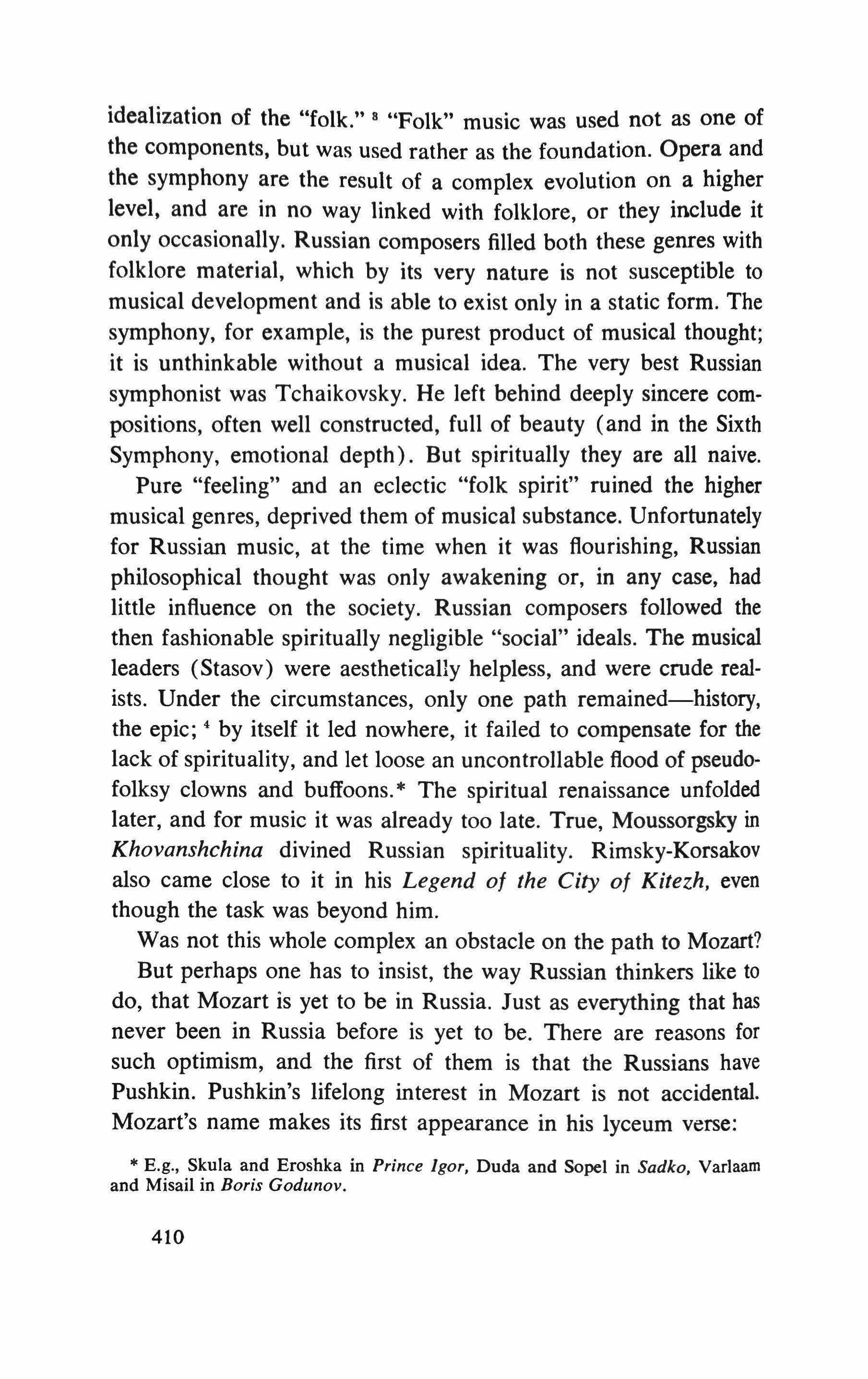
idealization of the "folk." 8 "Folk" music was used not as one of the components, but was used rather as the foundation. Opera and the symphony are the result of a complex evolution on a higher level, and are in no way linked with folklore, or they include it only occasionally. Russian composers filled both these genres with folklore material, which by its very nature is not susceptible to musical development and is able to exist only in a static form. The symphony, for example, is the purest product of musical thought; it is unthinkable without a musical idea. The very best Russian symphonist was Tchaikovsky. He left behind deeply sincere compositions, often well constructed, full of beauty (and in the Sixth Symphony, emotional depth). But spiritually they are all naive.
Pure "feeling" and an eclectic "folk spirit" ruined the higher musical genres, deprived them of musical substance. Unfortunately for Russian music, at the time when it was flourishing, Russian philosophical thought was only awakening or, in any case, had little influence on the society. Russian composers followed the then fashionable spiritually negligible "social" ideals. The musical leaders (Stasov) were aesthetically helpless, and were crude realists. Under the circumstances, only one path remained-history, the epic; 4 by itself it led nowhere, it failed to compensate for the lack of spirituality, and let loose an uncontrollable flood of pseudofolksy clowns and buffoons. * The spiritual renaissance unfolded later, and for music it was already too late. True, Moussorgsky in Khovanshchina divined Russian spirituality. Rimsky-Korsakov also came close to it in his Legend of the City of Kitezh, even though the task was beyond him.
Was not this whole complex an obstacle on the path to Mozart?
But perhaps one has to insist, the way Russian thinkers like to do, that Mozart is yet to be in Russia. Just as everything that has never been in Russia before is yet to be. There are reasons for such optimism, and the first of them is that the Russians have Pushkin. Pushkin's lifelong interest in Mozart is not accidental. Mozart's name makes its first appearance in his lyceum verse:
'" E.g., Skula and Eroshka in Prince Igor, Duda and Sopel in Sadko, Varlaam and Misail in Boris Godunov.
410

Or on the resonant plano At your dextrous hands Mozart is brought to life. ("To My Sister," 1814)
And later, in his tragedy, Pushkin, through Salieri, provides a most precise evaluation of the music of Mozart:
What depth. What audacity and what just proportion!
(Let us note the sequence in which these qualities are placed.) Nor let us forget the epigraph to "The Stone Guest."
Much more important is the general similarity between Mozart's character and Pushkin's. One can enumerate endlessly the qualities of Pushkin's muse that are kindred to Mozart's: universality, sense of measure, and so forth. Pushkin lived in the eighteenth century for only half a year, but this half year turns out to have been decisive. "Byronism" and "nationality" do not change the picture: they are a tribute to the times. This is why Pushkin, despite forced proofs to the contrary, establishes neither a tradition nor a school; rather, he contains within himself everything that came before and will come after. Exactly like Mozart. The fact that Pushkin wrote "Czar Saltan" does not make him "national," but also makes him national. Likewise Mozart just incidentally created German opera. Generally, the universality of Pushkin is not a Russian characteristic; it is the basic quality of men of eighteenth-century culture, and Dostoevsky, in his Pushkin speech, was mistaken.
In Pushkin's verse there are the same "nooks," the specks that are decisive, just as in Mozart. Such are "indifferent nature" and "empty heavens." With the same aristocratic elegance, Pushkin expressed truths that seemed to be known to all, self-evident, but in essentials he is just as enigmatic as Mozart. The writer Gheen finds in Mozart "joyful sorrow" (ct. Pushkin's "my sorrow is radiant"). As noted above, Pushkin and Mozart resemble each other in the character of their religious beliefs. And is not Pushkin's "rabble" the gemeine Pobel of The Magic Flute? By the way, speaking of the rabble, both of them suffered from the conde-
411

scending patronage of their crowned masters, who considered themselves connoisseurs. Both of them were better subjects than those others were masters. The biographical parallels can be extended. The most interesting of them: both were drawn to death in the last year of their lives. Even in their habits and characters, they had something in common: both liked to gesticulate and to play the fool.
But Pushkin is not the only token of the future acceptance of Mozart by the Russians. In his inner musical nature, Glinka is closer than any other Russian composer to the author of the Don Giovanni whose worth he did not appreciate. The "national" tendency here too mixed up all the cards, pushing Glinka externally, "ideologically" along the path common to his epoch Similarly Pushkin did not appreciate Racine, who was in his blood, but was fascinated with the infinitely distant Byron (and Glinka, with Berlioz). The Stasov school contributed to the perversion of Glinka's image, and in the general chorus that is still heard today there was drowned the just observation by the critic Laroche that Glinka had an "impeccably graceful, crystalclear style that made him the Russian Mozart." One can find that same humanity in Glinka, the same universality, and even the same "nooks" as in Mozart. But in comparing them it is better to begin with the art songs or the instrumental chamber music, and not with the Kamarinskaya. In the art songs, by the way, the polarity between Glinka and Tchaikovsky is immediately revealed. Although both have an inclination to a personal "vulnerability," Glinka always knows when to stop; he instinctively subjects his emotions (qualitatively similar to Tchaikovsky's) to music.
If one attempts to express in one word what unites Pushkin and Glinka with Mozart, there comes to mind the hackneyed word "classicism"-the classicism of artistic nature, and not of school or movement; inner rather than formal.
412
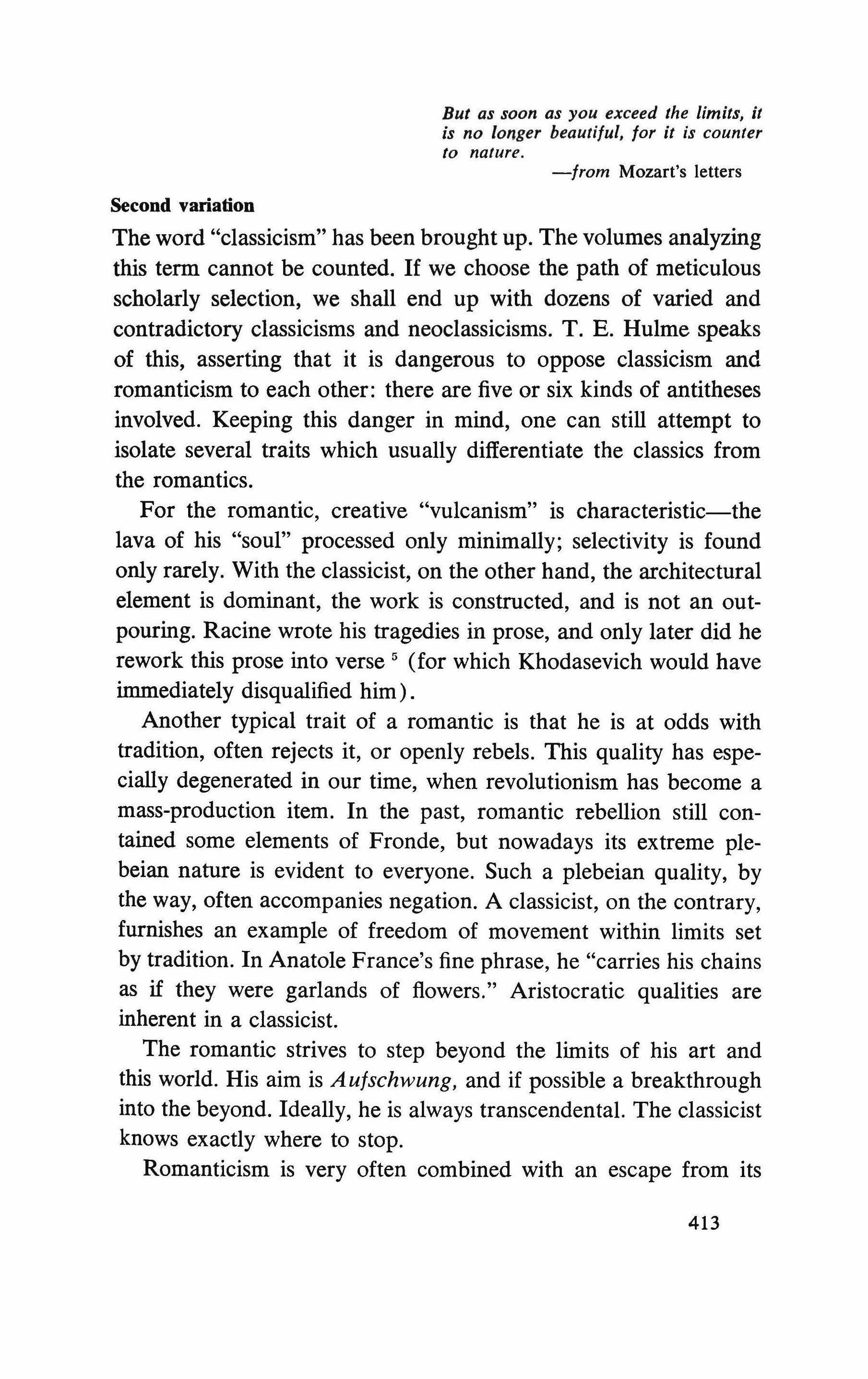
But as soon as you exceed the limits, it is no longer beautiful, for it is counter to nature.
-from Mozart's letters
Second variation
The word "classicism" has been brought up. The volumes analyzing this term cannot be counted. If we choose the path of meticulous scholarly selection, we shall end up with dozens of varied and contradictory classicisms and neoclassicisms. T. E. Hulme speaks of this, asserting that it is dangerous to oppose classicism and romanticism to each other: there are five or six kinds of antitheses involved. Keeping this danger in mind, one can still attempt to isolate several traits which usually differentiate the classics from the romantics.
For the romantic, creative "vulcanism" is characteristic-the lava of his "soul" processed only minimally; selectivity is found only rarely. With the classicist, on the other hand, the architectural element is dominant, the work is constructed, and is not an outpouring. Racine wrote his tragedies in prose, and only later did he rework this prose into verse 5 (for which Khodasevich would have immediately disqualified him).
Another typical trait of a romantic is that he is at odds with tradition, often rejects it, or openly rebels. This quality has especially degenerated in our time, when revolutionism has become a mass-production item. In the past, romantic rebellion still contained some elements of Fronde, but nowadays its extreme plebeian nature is evident to everyone. Such a plebeian quality, by the way, often accompanies negation. A classicist, on the contrary, furnishes an example of freedom of movement within limits set by tradition. In Anatole France's fine phrase, he "carries his chains as if they were garlands of flowers." Aristocratic qualities are inherent in a classicist.
The romantic strives to step beyond the limits of his art and this world. His aim is Aujschwung, and if possible a breakthrough into the beyond. Ideally, he is always transcendental. The classicist knows exactly where to stop.
Romanticism is very often combined with an escape from its 413

surroundings, and with an extreme individualism. This escapism can be expressed in different ways. At times its tendency is toward populism-a pastoral, Karataev-like tendency toward a fusion with the folk and, through them, with nature. (It is indicative that Mozart was not interested in folk music at all.) At times the romantic flees into the past, historical or mythical. And lastly, after Ludwig Tieck, it became fashionable to escape into art. In this instance, a romantic often appears in the toga of neoclassicism (such was Stefan George). A classicist is part of human society. He is social, and as a rule has good manners. Let us recall the famous incident when Goethe moved aside with a bow and gave way to the emperor's retinue, while Beethoven, without being deflected, barged right through a crowd of dukes. Beethoven was a true romantic, and the paradox of his last years, when he embraced mankind in his Ninth Symphony and reached the limits of loneliness in his quartets, is not accidental. A similar picture is presented by the contrast between the sociable Pushkin and the socially unbearable Lermontov.
Of course all these traits determine nothing, and they cannot be used as a yardstick or as litmus paper. This is only an attempt to establish the most general tendencies, which are far from being binding. Classicists can have a romantic profile (Brahms), and, vice versa (Alfred de Vigny). Besides, many traits that are usually associated, say, with romanticism are not its monopoly. One should not, for instance, classify as romanticism everything that is dramatic and emotional by nature (and this is usually done). Such an individual quality as melancholy, or reverie, is for some reason always perceived as romantic. An inclination toward the unusual is also not always a sign of romanticism, and nowadays more than one critic classifies Shakespeare with the classicists (had Voltaire but known!), which is quite convincing. On the other hand, such a "classical" trait as economy of artistic means can be found in romantics (Schumann, the late Lermontov), although it "becomes" a classicist incomparably better. Of course it is typical of Mozart that he considered the monologue of the Ghost of Hamlet's Father much too long, and in response to the emperor he proudly retorted that in The Abduction from the Seraglio
414
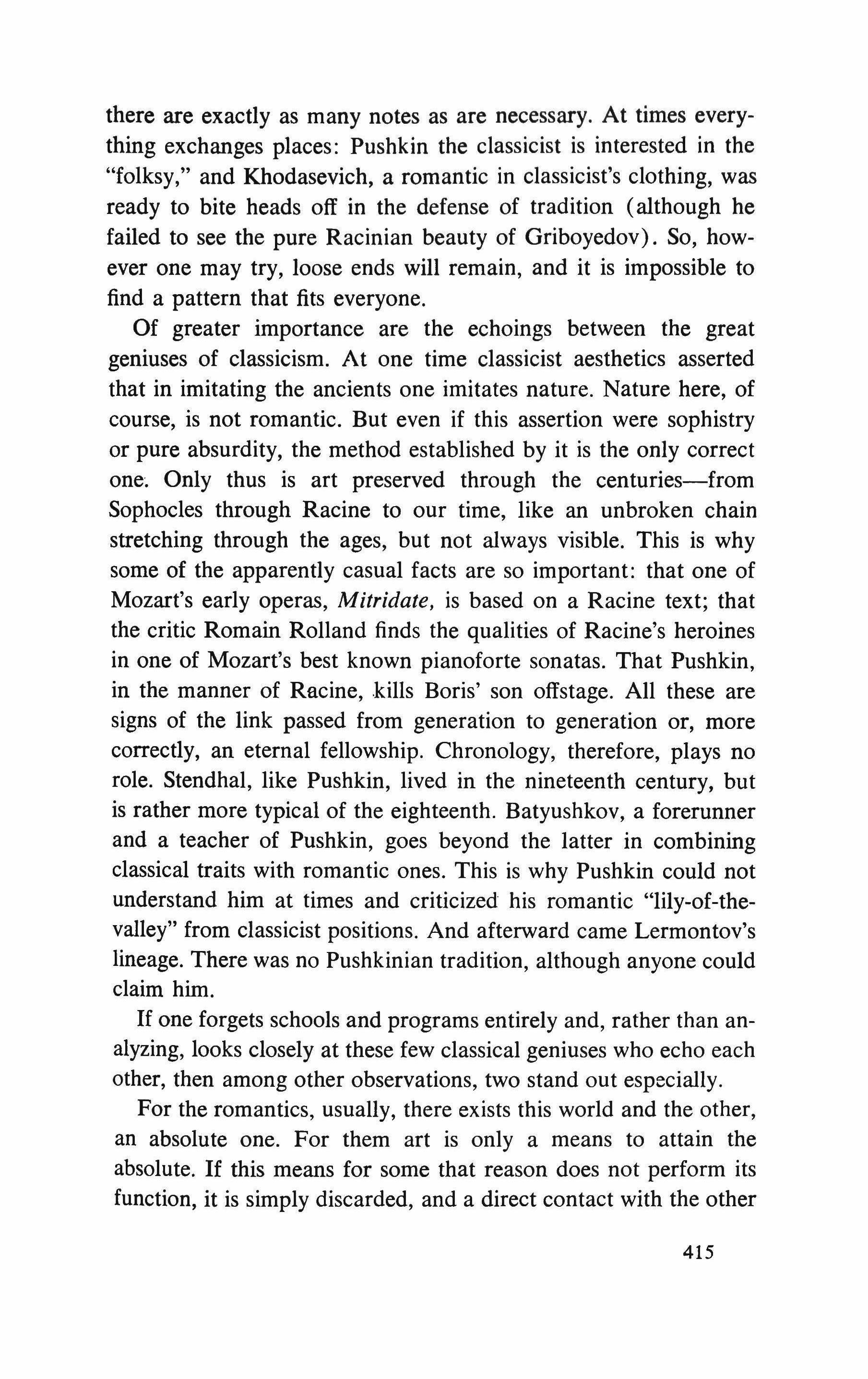
there are exactly as many notes as are necessary. At times everything exchanges places: Pushkin the classicist is interested in the "folksy," and Khodasevich, a romantic in classicist's clothing, was ready to bite heads off in the defense of tradition (although he failed to see the pure Racinian beauty of Griboyedov). So, however one may try, loose ends will remain, and it is impossible to find a pattern that fits everyone.
Of greater importance are the echoings between the great geniuses of classicism. At one time classicist aesthetics asserted that in imitating the ancients one imitates nature. Nature here, of course, is not romantic. But even if this assertion were sophistry or pure absurdity, the method established by it is the only correct one. Only thus is art preserved through the centuries-from Sophocles through Racine to our time, like an unbroken chain stretching through the ages, but not always visible. This is why some of the apparently casual facts are so important: that one of Mozart's early operas, Mitridate, is based on a Racine text; that the critic Romain Rolland finds the qualities of Racine's heroines in one of Mozart's best known pianoforte sonatas. That Pushkin, in the manner of Racine, kills Boris' son offstage. All these are signs of the link passed from generation to generation or, more correctly, an eternal fellowship. Chronology, therefore, plays no role. Stendhal, like Pushkin, lived in the nineteenth century, but is rather more typical of the eighteenth. Batyushkov, a forerunner and a teacher of Pushkin, goes beyond the latter in combining classical traits with romantic ones. This is why Pushkin could not understand him at times and criticized his romantic "lily-of-thevalley" from classicist positions. And afterward came Lermontov's lineage. There was no Pushkinian tradition, although anyone could claim him.
If one forgets schools and programs entirely and, rather than analyzing, looks closely at these few classical geniuses who echo each other, then among other observations, two stand out especially.
For the romantics, usually, there exists this world and the other, an absolute one. For them art is only a means to attain the absolute. If this means for some that reason does not perform its function, it is simply discarded, and a direct contact with the other
415

world is established: philosophical, religious, mystical-through thought, prayer, revelation. But romantics who lack the strength and daring construct a peculiar, artificial world of "art for art's sake," where the shortcomings of this world are minimized and the disturbing truths of the other world are removed. A classicist also has a third world, and it is also to some extent the world of art, but never is it art for art's sake. The tendency here is in general not a problem: this art may be for God, for men, for oneself. It is important that it stays within its limits, which are precisely known. The third world is where true artists abide-some always, others whenever they can manage to. It is not a matter of what an artist expresses or depicts (God, our world, his "soul"), but where he abides while doing this. If he does not rise above the facts and emotions of our world, the result is what we call, or must call, "realism" (Gorky, Tchaikovsky); if he crosses into the beyond, we have pure romanticism (early Blok). Classicists live in the third world, where the images of our world acquire an ideal state, and the images of the other world acquire substantiality, and both of these attain form or (what is the same thing) are filled with beauty. The limits of this third world are beautifully sensed not only by Mozart, Racine, and Pushkin, but also by Dante (recall Pushkin's praise of the plan of the Inferno), Milton, and Shakespeare (with a few exceptions). Byron does not have this sense, neither does Khlebnikov; Blok senses these limits poorly. Beethoven often manages to remain in this world, but at times slips into "realism" (the Sixth Symphony) or crosses the limits of this world (the Ninth Symphony). Breaking through the limits in either direction is a transgression. Mozart knew this very well and often ridiculed "depiction" in music 6 (Fiordiligi's aria "Come scoglio"), and this is the reason he didn't go to see the balloon. Nor did he make an attempt to reach into the beyond, and there is great wisdom in this, which is the reason his divertimentos (to the accompaniment of which the guests of the Archbishop of Salzburg rattled their knives and forks) contain more genuine music than certain acknowledged masterpieces which never disappear from concert programs.
416
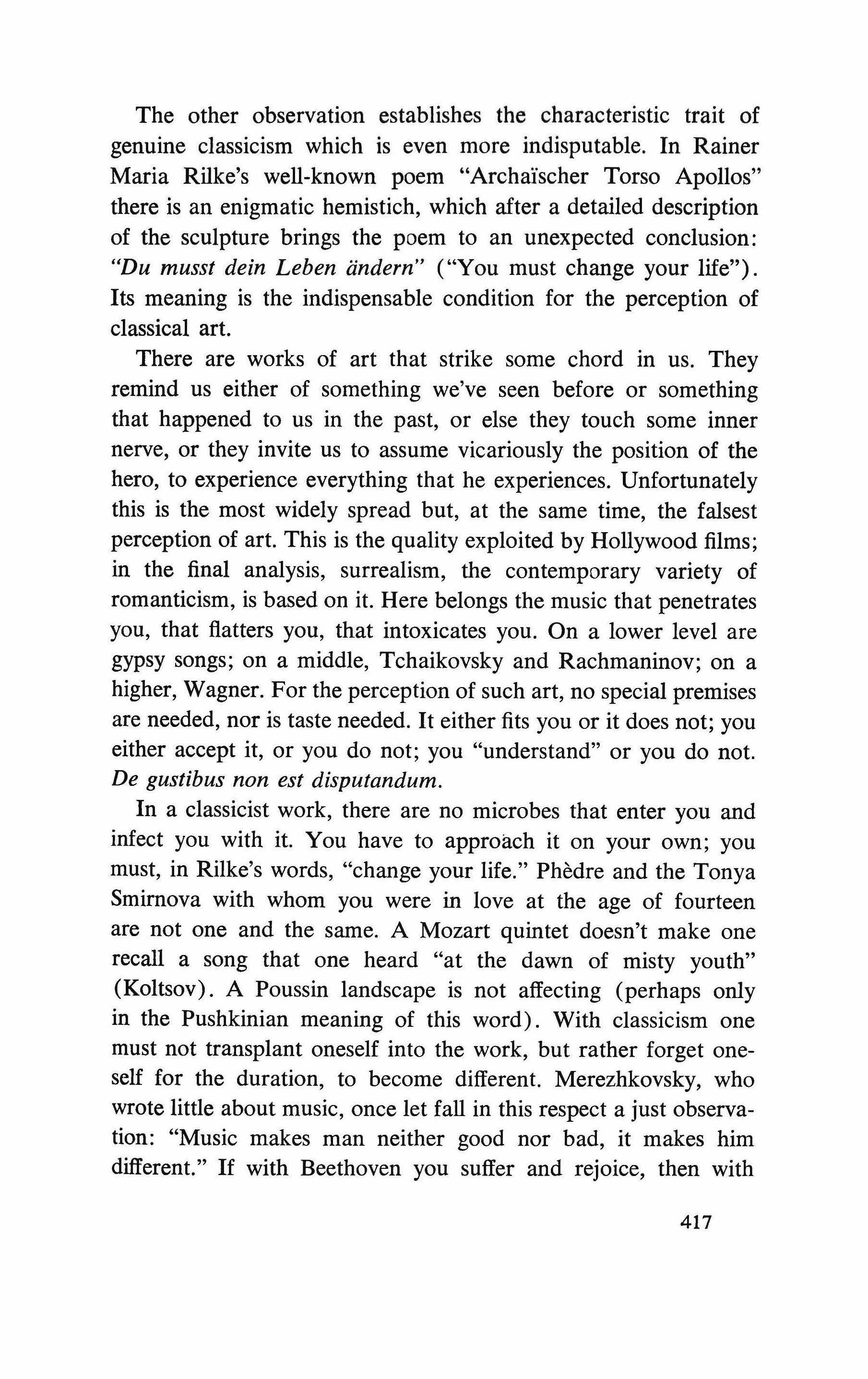
The other observation establishes the characteristic trait of genuine classicism which is even more indisputable. In Rainer Maria Rilke's well-known poem "Archaischer Torso Apollos" there is an enigmatic hemistich, which after a detailed description of the sculpture brings the poem to an unexpected conclusion: "Du musst dein Leben iindern" ("You must change your life"). Its meaning is the indispensable condition for the perception of classical art.
There are works of art that strike some chord in us. They remind us either of something we've seen before or something that happened to us in the past, or else they touch some inner nerve, or they invite us to assume vicariously the position of the hero, to experience everything that he experiences. Unfortunately this is the most widely spread but, at the same time, the falsest perception of art. This is the quality exploited by Hollywood films; in the final analysis, surrealism, the contemporary variety of romanticism, is based on it. Here belongs the music that penetrates you, that flatters you, that intoxicates you. On a lower level are gypsy songs; on a middle, Tchaikovsky and Rachmaninov; on a higher, Wagner. For the perception of such art, no special premises are needed, nor is taste needed. It either fits you or it does not; you either accept it, or you do not; you "understand" or you do not. De gustibus non est disputandum.
In a classicist work, there are no microbes that enter you and infect you with it. You have to approach it on your own; you must, in Rilke's words, "change your life." Phedre and the Tonya Smirnova with whom you were in love at the age of fourteen are not one and the same. A Mozart quintet doesn't make one recall a song that one heard "at the dawn of misty youth" (Koltsov). A Poussin landscape is not affecting (perhaps only in the Pushkinian meaning of this word). With classicism one must not transplant oneself into the work, but rather forget oneself for the duration, to become different. Merezhkovsky, who wrote little about music, once let fall in this respect a just observation: "Music makes man neither good nor bad, it makes him different." If with Beethoven you suffer and rejoice, then with 417

Mozart you feel a communion with another, better world-this is the source of that extraordinary joy his music brings. Classicism cannot be for the masses, its demands are too great. If it is difficult to partake of it, then it is more difficult to create it. Rather, one cannot create it if one is not born a classicist. And we are all born romantics. However, we have a duty at least to school ourselves to appreciate classicism, for in its highest manifestations it is more valuable than romanticism.
But we love our romanticism, our innate laziness pushes us toward it, we are more comfortable with it. Classicism repulses us with its dryness, its "intellectuality," 7 while romanticism attracts, infatuates, and entices (you can't help recalling that "attraction" is "a kind of malady" [Griboyedov]) with "comprehensible" joy and "familiar" sadness," in other words that which we classify as "emotion," as "feeling."
We have hardly touched on what is called realism. It is a contradictory term which often expresses nothing. Poetry, for instance, is more realistic than prose in the sense that in every epoch it searches for a more truthful correspondence between art and its time (to write nowadays "like Pushkin" would not be an anachronism, it would be a lie). In prose (in speaking of realism, one usually speaks of prose), the depiction of external reality is considered realism. (Although what do we know about so-called "external reality," and why is the truthful portrait of the "soul" not realism? However, it is usually called romanticism.) Close up, realism in its best examples turns out to be nothing but romanticism which some simple-minded "leading" critic of the past just couldn't figure out. Thus Gogol (long listed among the realists, contrary to common sense), the Rousseauist Tolstoy, Dostoevsky, Flaubert with his roots in "The Temptation of St. Anthony," Balzac, and Dickens turn out to be romantics. Realism generally, of whatever variety it is, cannot be opposed to romanticism (in that case it would become classicism); realism is the direct development of romanticism, along the line "depictionrefiection-expression." Only it is not the inner or the beyond, as in the pure romantics, that is depicted (photographed), but the
418
external and the this-worldly. The frequent coincidence of romantic and realistic traits is therefore not something extraordinary, but an entirely legitimate phenomenon (Gorky). And a romantic is often a simple photographer of the "soul," that is "phenomenal" and not noumenal-which according to his title he is supposed to be. If we tum to realism in its worst examples, we shall find simply a depiction of the familiar in substitution for genuine, unique truth; it is outside art, for it is outside the idea. Such, for instance, is the painting of the Peredvizhniki ("Wanderers").
Contemporary mass culture, which holds us all captive, is the consequence of the romanticism that so luxuriantly blossomed forth more than a century ago and that has become so commonplace in our time. Only the genuine classicism of the masterpieces of human art can withstand it. But we have lost the ability to arrive at a true overall evaluation. In the realm of aesthetics one ought to restore order, not so much in matters of philosophy as in matters of taste. It is on the best examples that taste must be trained for a long time if this ability is to be regained. So-called good taste does exist, and about it est disputandum. It must be developed by listening, reading, looking, "changing one's life." And then there will appear not only the general ability to evaluate genuine masterpieces, but there will also be the possibility of creating new classicist works (and not only "neoclassicist" ones). Mozart is the best means to the achievement of this ideal.

Death, the true goal of our existence, the best friend of mankind. The image of it does not frighten me, but soothes and calms me.
For me everything is cold; as cold as ice. -from Mozart's letters Third variation
The most persistent of man's dreams is the fulfillment of his wishes. The Good Fairy, Mephistopheles, even Czar Dodon: "Your first whim I shall fulfill, as if it were my own."
419
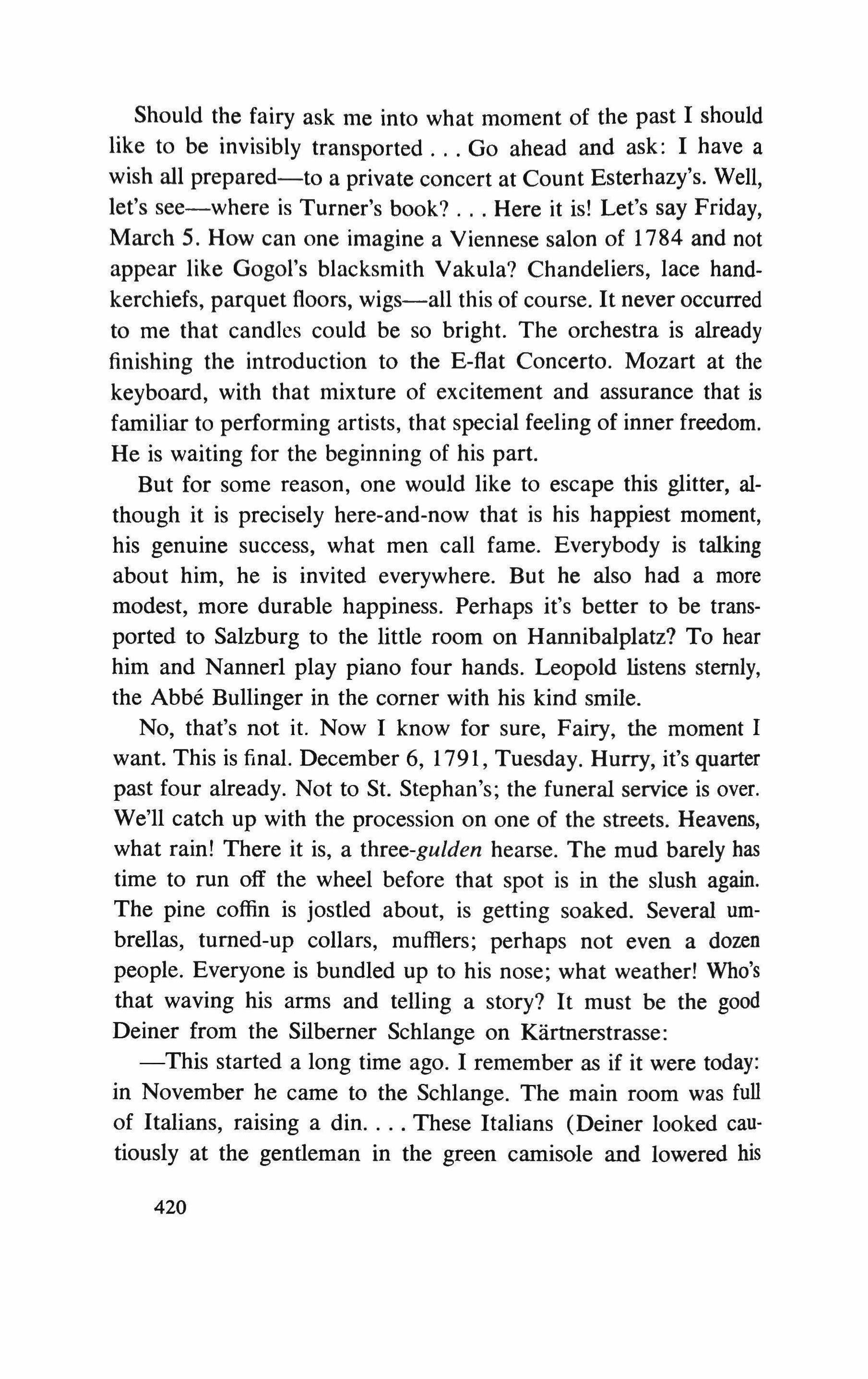
Should the fairy ask me into what moment of the past I should like to be invisibly transported Go ahead and ask: I have a wish all prepared-to a private concert at Count Esterhazy's. Well, let's see-where is Turner's book? Here it is! Let's say Friday, March 5. How can one imagine a Viennese salon of 1784 and not appear like Gogol's blacksmith Vakula? Chandeliers, lace handkerchiefs, parquet floors, wigs-all this of course. It never occurred to me that candles could be so bright. The orchestra is already finishing the introduction to the E-flat Concerto. Mozart at the keyboard, with that mixture of excitement and assurance that is familiar to performing artists, that special feeling of inner freedom. He is waiting for the beginning of his part.
But for some reason, one would like to escape this glitter, although it is precisely here-and-now that is his happiest moment, his genuine success, what men call fame. Everybody is talking about him, he is invited everywhere. But he also had a more modest, more durable happiness. Perhaps it's better to be transported to Salzburg to the little room on Hannibalplatz? To hear him and Nannerl play piano four hands. Leopold listens sternly, the Abbe Bullinger in the corner with his kind smile. No, that's not it. Now I know for sure, Fairy, the moment I want. This is final. December 6, 1791, Tuesday. Hurry, it's quarter past four already. Not to St. Stephan's; the funeral service is over. We'll catch up with the procession on one of the streets. Heavens, what rain! There it is, a three-gulden hearse. The mud barely has time to run off the wheel before that spot is in the slush again. The pine coffin is jostled about, is getting soaked. Several umbrellas, turned-up collars, mufflers; perhaps not even a dozen people. Everyone is bundled up to his nose; what weather! Who's that waving his arms and telling a story? It must be the good Deiner from the Silberner Schlange on Kartnerstrasse:
-This started a long time ago. I remember as if it were today: in November he came to the Schlange. The main room was full of Italians, raising a din These Italians (Deiner looked cautiously at the gentleman in the green camisole and lowered his
420

voice), he was fed up with these Italians. He asked that he be taken to a room to be alone They wanted to give him beer right away. He said he didn't want any. Give me wine. They bring him wine. He doesn't drink the wine. Then our waiter comes running to me, says: Mozart's in a private room, asks for wine, doesn't drink it. I went in, and I see: he's sitting, his wig disheveled, pale. In that room there are trees all over the wall. And he's looking at those trees, and doesn't seem to see them. Griissgott, I say. He answers: Griissgott. I'm not feeling well, he says, And then: have my wine, Joseph, he says. He always called me "Don Primus" for a joke, but now-Joseph. I say to him: You drank too much in Bohemia, Maestro, and now you've gone and ruined your stomach. And he says: My stomach is better than you think. I, says he, have learned to swallow much worse. There's something cold coming over me, he says. The music will soon be over. He makes me drink his wine. Then, he says: Come to our place in the morning, we have no firewood. I come the next morning, and he's already taken to his bed. Nothing today, Joseph, he says. Today, he says, we have to do with doctors and apothecaries. Who else is out in all this dampness? His brother-in-law Lange ---open face, kind eyes. It was he who painted Mozart's portrait. Another brother-in-law, Hofer. Kapellmeister Roser, musicians, the singers from The Magic Flute that is filling the theater to capacity every night. And there goes Siissmayr, Mozart's devoted student. Mozart taught him, one pauper the other, without pay. Until the last moment, Slissmayr was sitting on his parti-colored quilt, and he listened to how the Requiem was to be finished. I hear his thoughts: I'll have to finish the "Hosanna" all by myself and I remember the accompanying figures in the "Agnus Dei" well, but the chorus melody he never sang very clearly In general, in certain places, I'll have to use the earlier material: toward the end, for instance. On the other hand, what he said about the "Lacrimosa" I remember to the last detail. And again the voice of the chatterbox Deiner: --Sophie Haibel, his sister-in-law, said: before he died, he was 421

annoyed by the canary, but he didn't let them take it away. Then suddenly he says: I have the taste of death on my tongue. That's what he said: on his tongue. And just before he died, he puffed out his cheeks as if for a trumpet: he kept thinking about his Requiem. Constanze couldn't stand this Requiem, once she even hid it. Yes When he was dying, outside there was a horrible storm, worse than now. He died sometime after midnight. I was the one who wrapped him in his death shroud. It's supposed to be a black one for them, the Masons
Why didn't it occur to me earlier that the man in the green camisole was Salieri? There's no doubt-Antonio Salieri. Let me take a look at his face: big watery eyes, large hooked nose, a contemptuous mouth. After Pushkin I imagined him different. Why did you come to his funeral, Salieri? You never stopped plotting against him, not only in Vienna but even in Prague. Oh, yes, you did stop intriguing after your so-called voluntary retirement. Proud man! You did not want to be dismissed by the new emperor and hastened to forestall him. You have changed completely since then: Remember, at the premiere of the Flute, to which Mozart invited you, you kept whispering "Bravo" to him after every number. Only there's this stupid rumor about poisoning which this idiot Constanze Mozart started. When Schwanenberg brought this gossip to you, you flared up and said: "Fools! How did he earn the honor?" Still this rumor keeps bothering you. That's why you came to the funeral-in this weather. So you'd be seen.
I'm putting you in my private hell, Salieri, together with the Duchesse de Chabot who made Mozart wait for two hours in a cold room, together with the Count Arco, who threw him out. The Emperor Joseph II is also there (what salary did you pay him, Your Majesty? Your favorite composer was Salieri, by the way). And of course Hieronymus Colloredo, the Archbishop of Salzburg, is also there. Oh, not only the acquaintances of Mozart are in this hell. There, for instance, is Benckendorff, with his august sovereign, Nicholas I.
Salieri went up to the tall gentleman who was walking along 422

under an umbrella all by himself: "It is a great loss for music, for all of us, Herr Baron, isn't it? However, had he lived any longer, all we composers would soon be without a roof over our heads."
Baron van Swieten, the imperial librarian and a music lover He was the only one to subsidize Mozart's concert when no one else wanted to listen to him any more. This man is a riddle to me. After all, he loved Mozart's music. Mozart directed his house concerts right up to the end. It was for him that he completed the unnecessary reorchestration of Handel's oratories, for which posterity so reproached Mozart. And for all this, Mozart got not a kreutzer. But wasn't the baron aware of his circumstances? What is he thinking about now? About how this morning he sternly counseled Constanze, stupefied with grief, to have her husband buried at the lowest possible cost, in view of the difficult financial situation of the family? He will take care of everything personally. It will cost 11 gulden, 36 kreutzer, including the hearse Despite her state (entirely understandable, of course), her eyes swollen from weeping, Madame Mozart is an attractive woman. She's not beautiful, but very feminine
Deiner continues his story to the chilled musicians (the singers have already left the procession: they can't afford a cold, they have to sing tonight): -Yes, Frau Constanze stayed at home. She's completely undone. Sees nothing, hears nothing. At first, she seemed to have lost her mind: threw herself onto her husband's bed-wanted to "catch the infection" and die herself. Herr Baron van Swieten advised her not to attend the funeral. She couldn't have anyway, unless we all took turns carrying her. She and her husband were like children. Once I dropped in late at night; there they were dancing around the stove in the dark. It's cold, they said. I brought them some firewood What a storm, gentlemen. Rain and snow together. My feet are wet through already. If it's this muddy here, outside the Stubentor it will be up to our knees. We'll not be able to pass unless we take a boat. It would be better if we all stopped by the Silberner Schlange, it's not far. We'll
423
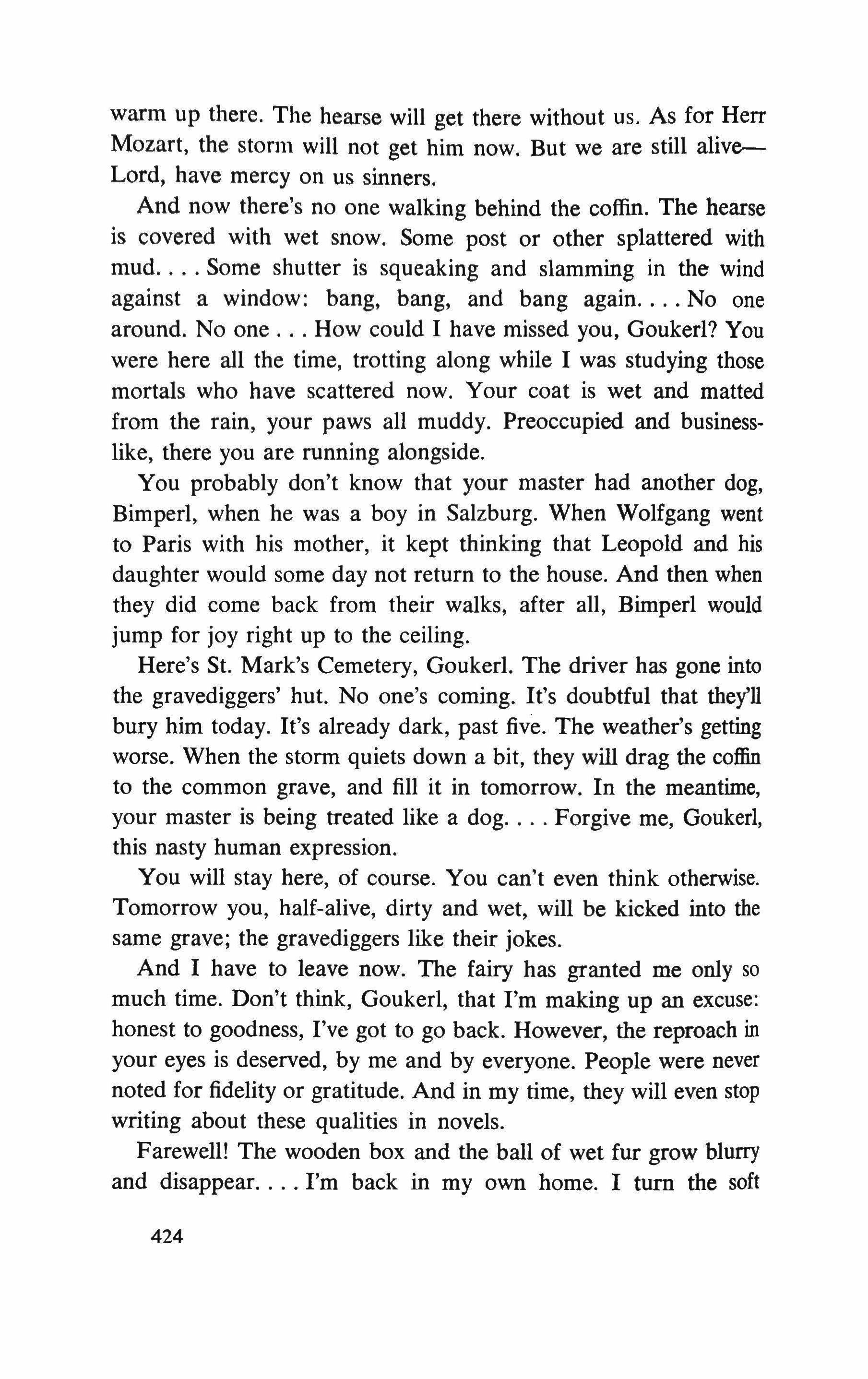
warm up there. The hearse will get there without us. As for Herr Mozart, the storm will not get him now. But we are still aliveLord, have mercy on us sinners.
And now there's no one walking behind the coffin. The hearse is covered with wet snow. Some post or other splattered with mud Some shutter is squeaking and slamming in the wind against a window: bang, bang, and bang again No one around. No one How could I have missed you, Goukerl? You were here all the time, trotting along while I was studying those mortals who have scattered now. Your coat is wet and matted from the rain, your paws all muddy. Preoccupied and businesslike, there you are running alongside.
You probably don't know that your master had another dog, Bimperl, when he was a boy in Salzburg. When Wolfgang went to Paris with his mother, it kept thinking that Leopold and his daughter would some day not return to the house. And then when they did come back from their walks, after all, Bimperl would jump for joy right up to the ceiling.
Here's St. Mark's Cemetery, Goukerl. The driver has gone into the gravediggers' hut. No one's coming. It's doubtful that they'll bury him today. It's already dark, past five. The weather's getting worse. When the storm quiets down a bit, they will drag the coffin to the common grave, and fill it in tomorrow. In the meantime, your master is being treated like a dog Forgive me, Goukerl, this nasty human expression.
You will stay here, of course. You can't even think otherwise. Tomorrow you, half-alive, dirty and wet, will be kicked into the same grave; the gravediggers like their jokes.
And I have to leave now. The fairy has granted me only so much time. Don't think, Goukerl, that I'm making up an excuse: honest to goodness, I've got to go back. However, the reproach in your eyes is deserved, by me and by everyone. People were never noted for fidelity or gratitude. And in my time, they will even stop writing about these qualities in novels.
Farewell! The wooden box and the ball of wet fur grow blurry and disappear I'm back in my own home. I turn the soft
424
lights on, put on a record, start it going, press the button. Sit down in a comfortable chair, stretch out my legs. The sweet sounds of Mozart fill the room.
1956
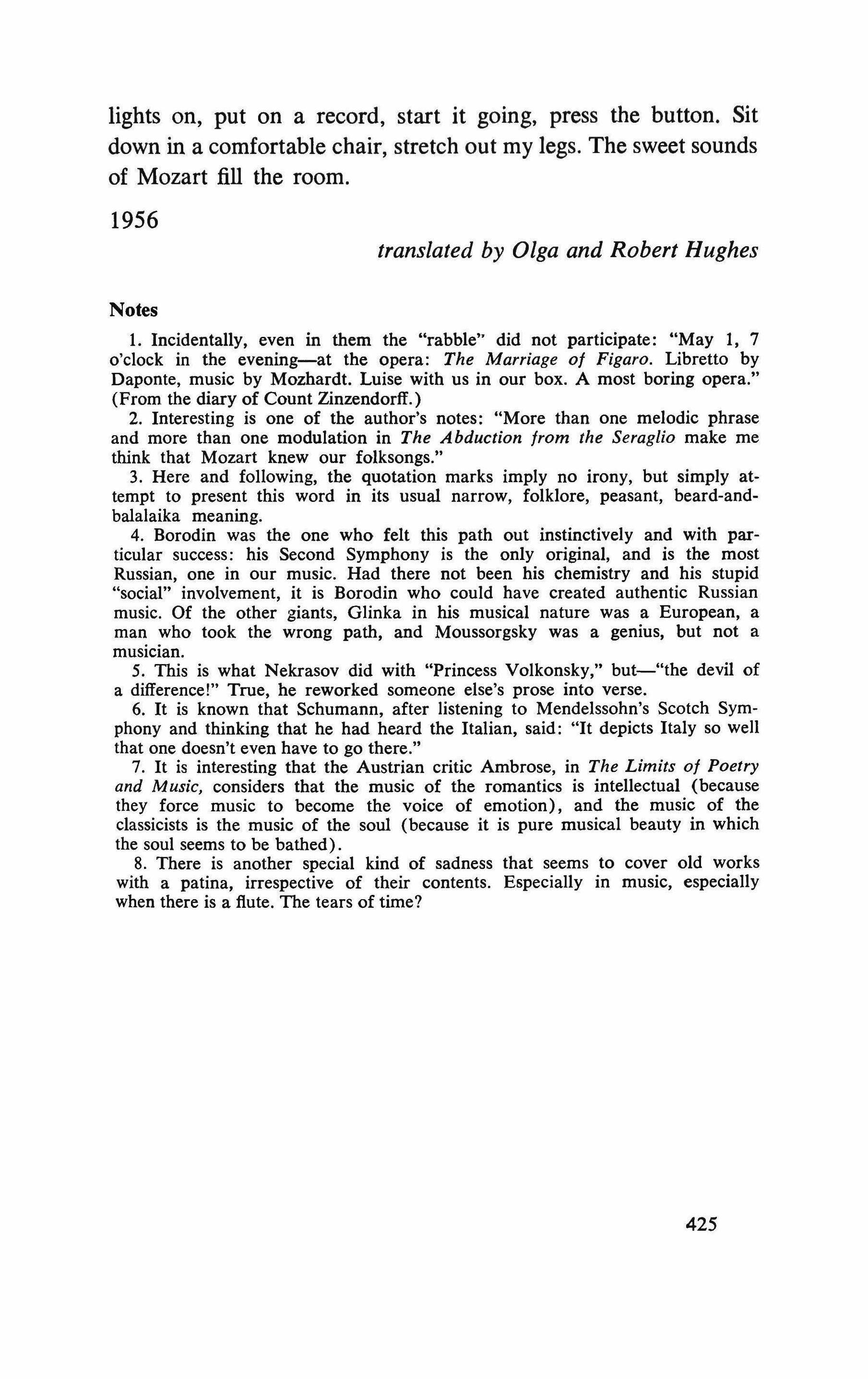
translated by Olga and Robert Hughes
Notes
1. Incidentally, even in them the "rabble" did not participate: "May I, 7 o'clock in the evening-at the opera: The Marriage of Figaro. Libretto by Daponte, music by Mozhardt. Luise with us in our box. A most boring opera." (From the diary of Count Zinzendorff.)
2. Interesting is one of the author's notes: "More than one melodic phrase and more than one modulation in The Abduction from the Seraglio make me think that Mozart knew our folksongs."
3. Here and following, the quotation marks imply no irony, but simply attempt to present this word in its usual narrow, folklore, peasant, beard-andbalalaika meaning.
4. Borodin was the one who felt this path out instinctively and with particular success: his Second Symphony is the only original, and is the most Russian, one in our music. Had there not been his chemistry and his stupid "social" involvement, it is Borodin who could have created authentic Russian music. Of the other giants, Glinka in his musical nature was a European, a man who took the wrong path, and Moussorgsky was a genius, but not a musician.
5. This is what Nekrasov did with "Princess Volkonsky," but-"the devil of a difference!" True, he reworked someone else's prose into verse.
6. It is known that Schumann, after listening to Mendelssohn's Scotch Symphony and thinking that he had heard the Italian, said: "It depicts Italy so well that one doesn't even have to go there."
7. It is interesting that the Austrian critic Ambrose, in The Limits of Poetry and Music, considers that the music of the romantics is intellectual (because they force music to become the voice of emotion), and the music of the classicists is the music of the soul (because it is pure musical beauty in which the soul seems to be bathed).
8. There is another special kind of sadness that seems to cover old works with a patina, irrespective of their contents. Especially in music, especially when there is a flute. The tears of time?
425
TWO POEMS BY NIKOLAI MORSHEN
translated by Richard Wilbur

1
A star in the sky. How many words and tears, What promises, what wishes made upon it, How many heart-cries! For what endless years! What dashings-off of verse and rhyme and sonnet!
Yet to the clear mind, too, it signs from heaven: The Magi followed it with reverence; So did the navigators Einstein, even, Could not without some fixed stars make sense.
Ah, to select a theme that once for all Would captivate all men without exceptionSaint, atheist, hero, coward, freeman, thrallAnd then to realize one's high conception On the night's canvas with a dot, just one.
What artist would not own himself outdone?
2
Nights rolled upon the river's face, Volcanoes flared and overflowed, And ferns which towered into space With paleozoic flashes glowed
When, with his Slavic eye, there crept A saurian from paludal slimeMy reptile ancestor-and stepped On the dry land for the first time.
426 TriQuarterly

He did not then, of course, predict The spate of future generation, Of linked phenomena in strict And inextinguishable relation Or me, in that concatenation, In whose world Planck and Blok connect!
But I what breed am I, what kind? What are my past, my destiny? How should that far one be divined Whose modest forebear I shall be, Whose world's pure miracle to me, Whose deeds, the manner of whose mind?
Hundreds of years will pass, perhaps Millions, and then he will be there, Remembering us across that lapse, Our strange third partner, and our heir.
And then what magic time will do! All distances will coalesce, And all awareness flow into The heaven of his consciousness.
From grey mist will materialize His predecessors, one and all, Whatever their degree or size, No matter how obscure or small, And to that joyous herd, that throng Bound from creation and before, You too shall certainly belong, o my reptilian ancestor.
427
TEN POEMS BY ANATOLY STEIGER
translated by Paul Schmidt
1
Until the sun sinks into a green Smoke and twilight starts to spread We speak of nothing but summer.
Yet autumn will soon tell us The truth, in a cold voice.

2
We believe in books, in music and poems, We believe in the dreams we dream, We believe in words (even words
Spoken to console us
From the window of a railway car)
3
The dull rattle of shutters being lowered So the cottage looks like someone blind, And then, like a shot point-blankThe roar of a motor in the garden out in front.
And an endlessly accompanying glance: Hopeless, melancholy, spaniel-eyed.
4
It must be an eternal arrangement: Some people dissemble and lie, While others help them do it (Always seeing through it)And it's called love
428 TriQuarterly
s Friendship
I Where is he now, I wonder? And what's his life like?
Don't let me sit by the door
Expecting a sudden knock: He will never come back.
Was it to hurt me, or himself?
(Or maybe he was lucky.)
II One dream remains-the thought of peace.
-Don't need friendship, all words are empty, And that word's the emptiest of all.
(For friendship you need to have two. I was one, the other was air: you.)
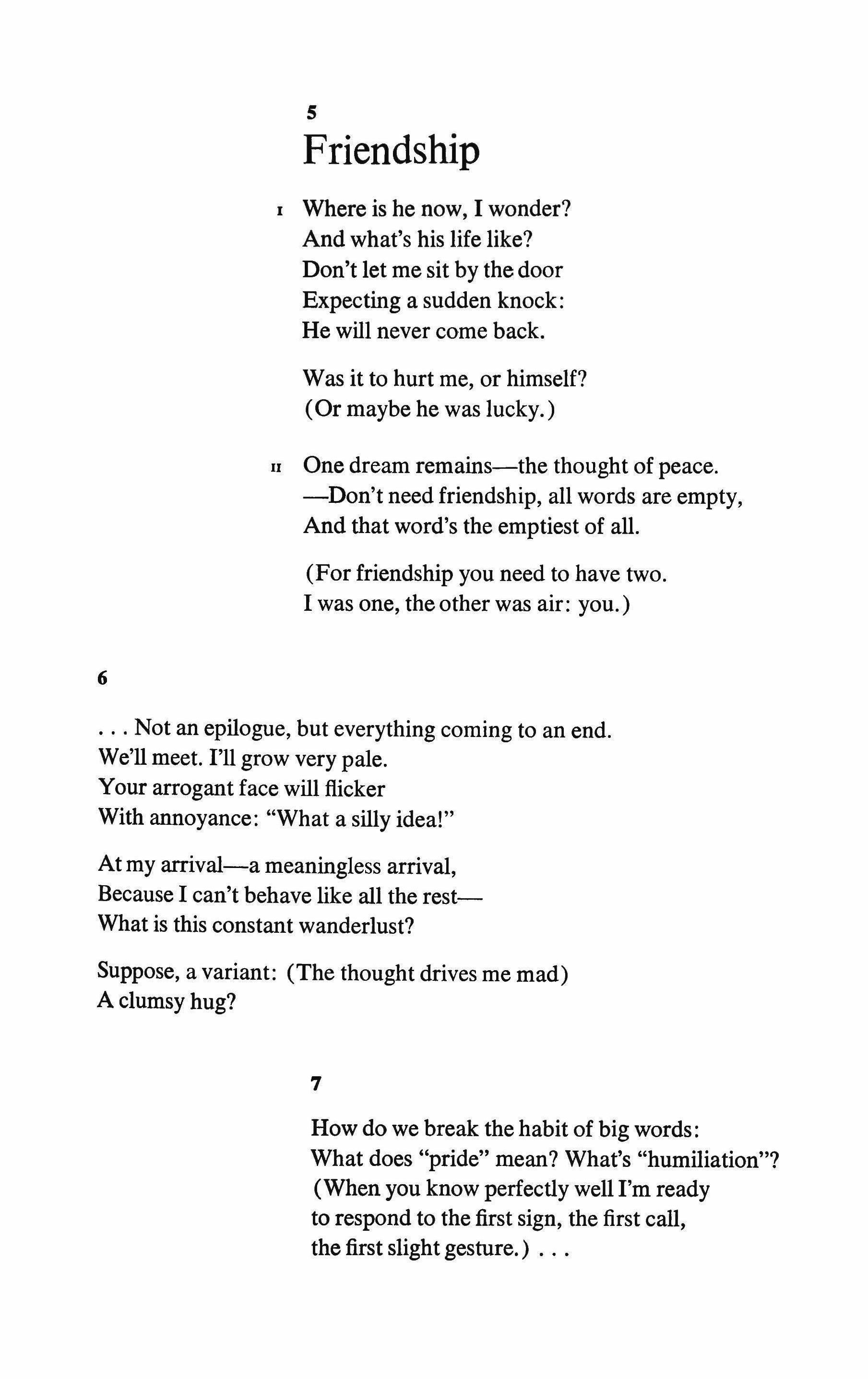
6
Not an epilogue, but everything coming to an end. We'll meet. I'll grow very pale. Your arrogant face will flicker
With annoyance: "What a silly idea!"
At my arrival-a meaningless arrival, Because I can't behave like all the restWhat is this constant wanderlust?
Suppose, a variant: (The thought drives me mad) A clumsy hug?
7
How do we break the habit of big words: What does "pride" mean? What's "humiliation"? (When you know perfectly well I'm ready to respond to the first sign, the first call, the first slight gesture.)
How can I shout, to be heard in that prison, Beyond those ramparts, through those walls, That not everyone has betrayed him, That he is not abandoned, alone in the world?
I dreamed that I broke in to see you, Sat on your bed and held you in my arms. (Though he's long lost the habit, surely, Of tenderness and soft, familiar words. )
Yet friendship exists, it really exists, And tenderness of male for male as well
It is not obligation, but particular nobility To say so, with unwavering eyes.

9
Nobody waits at the foot of the stairs any more Or takes our hand crossing a street, the way they did When we were young. Nobody tells us about the mean Ant and the Grasshopper. Or teaches us to believe in God.
Nowadays nobody thinks of us at allThey all have enough just thinking of themselves, So we have to live as they do--but alone (Impotent, dishonest, and inept.) 10
They will not ask us: have you sinned? They'll ask us only: did you love? With heads hanging, Bitterly, we'll say: yes Oh, yes, We loved Again and again
8
430
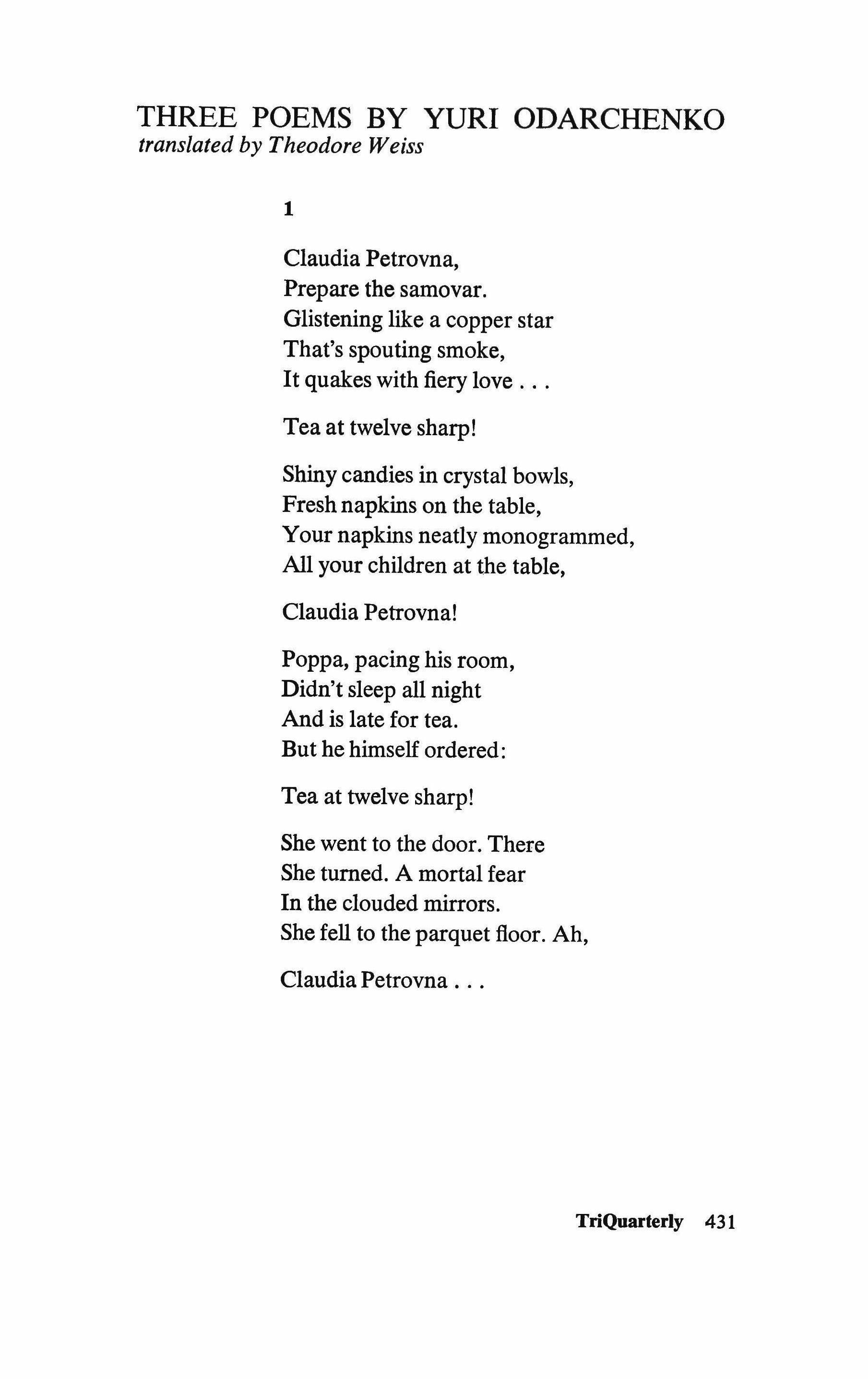
THREE POEMS BY YURI ODARCHENKO
translated by Theodore Weiss
1
Claudia Petrovna, Prepare the samovar.
Glistening like a copper star That's spouting smoke, It quakes with fiery love
Tea at twelve sharp!
Shiny candies in crystal bowls, Fresh napkins on the table, Your napkins neatly monogrammed, All your children at the table,
Claudia Petrovna!
Poppa, pacing his room, Didn't sleep all night And is late for tea.
But he himself ordered:
Tea at twelve sharp!
She went to the door. There She turned. A mortal fear In the clouded mirrors. She fell to the parquet floor. Ah, Claudia Petrovna
TriQuarterly 431
Only for you my tea roses, Only of you my random dreams, You with your hovering smile, You with arms rounding like swans.
Your hair is silk spinning, Your voice a sleighbell all silver,
And the eyes in your taking face Are two green tsetse flies.

3
The path I'm following Is a surefire road to hell.
But from there, by a velvet ladder, Warbling blithesome ditties, I'll return to earth
Tucked out as a tomcat on the roof.
And I'll live with a little girl In her little pink, prim bedroom, And I'll be purring softly again But about what nobody'll know.
432
THREE POEMS BY IGOR CHINNOV
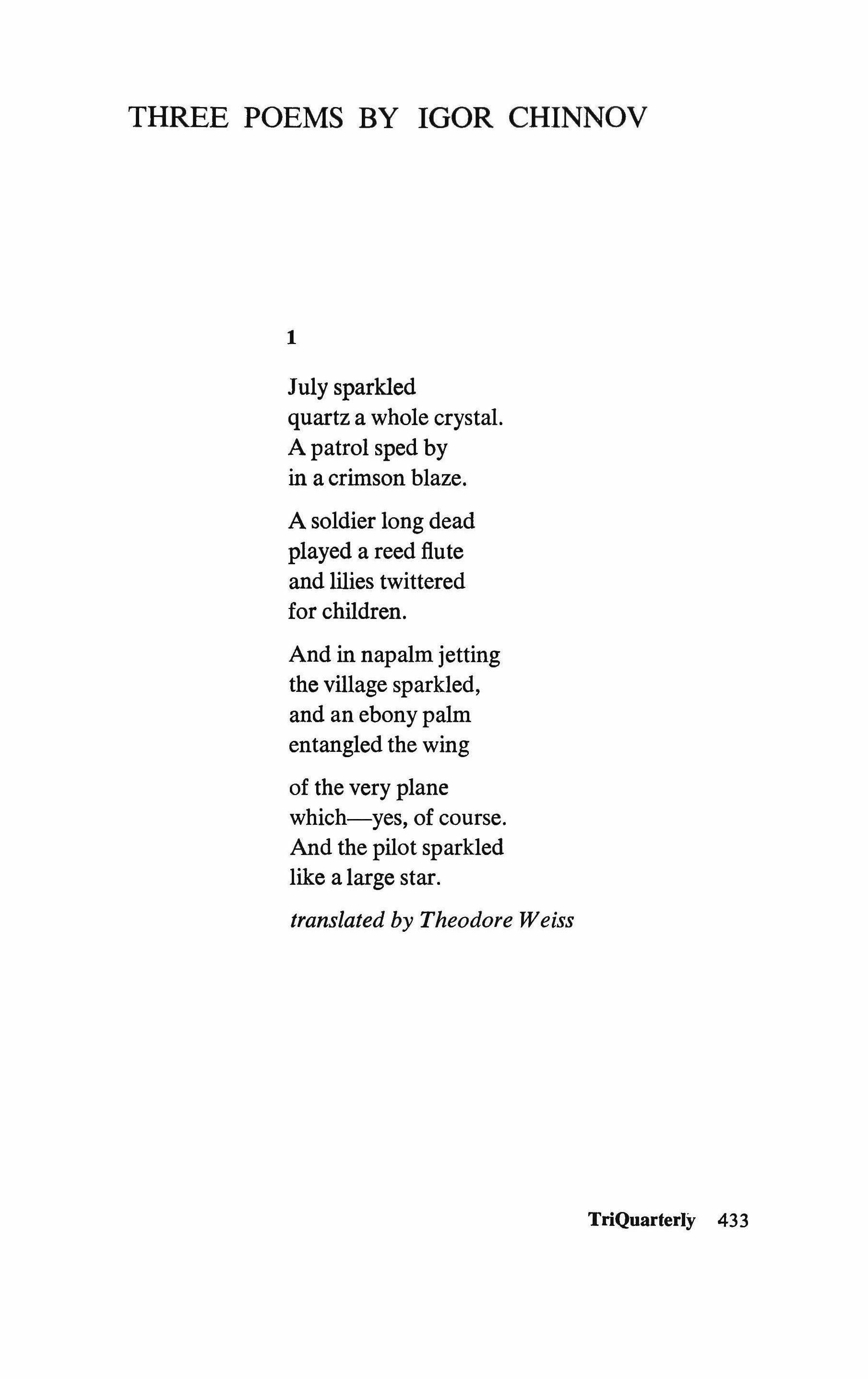
1
July sparkled quartz a whole crystal. A patrol sped by in a crimson blaze.
A soldier long dead played a reed flute and lilies twittered for children.
And in napalm jetting the village sparkled, and an ebony palm entangled the wing of the very plane which-yes, of course. And the pilot sparkled like a large star. translated by Theodore Weiss
TriQuarterly 433

Pithecanthropi in the Pinakotek. Orangutans in the Orangerie. Pterodactyl's spirit revived in man. Look: a gibbon in a helicopter. And yonder in reactors, isotopes Of uranium, of helium. A new experiment. Look: Acropolis, pithecanthropus, A flying saurian, a mindless robot.
Reactors, robots. Do not tease Gorillas, mandrills, crocodiles .: Pluto, Urania. We are in the shadow Of their terrifying realms, their hostile realms.
And soon, in an astronaut's rocket The ravening troglodyte shall set forth. And soon the pathfinders shall behold The plesiosaur, the brontosaur. Uranus, plutonium. And the troglodytes. And the thermosaurian tomorrow.
translated
by L. Pi Izhorsky 3
All this bedraggled struggle
Better to buy a cloud-pink palazzo or a palazzo cloud itself.
Worries? What use are they except to barter for a comet, for Cassiopeia at the corner store.
Or, for less than the price of a lottery ticket, to win a good, golden hunk of immortality. O.K.?
translated
by Theodore Weiss
2
Grasse diary
GALINA
KUZNETSOVA
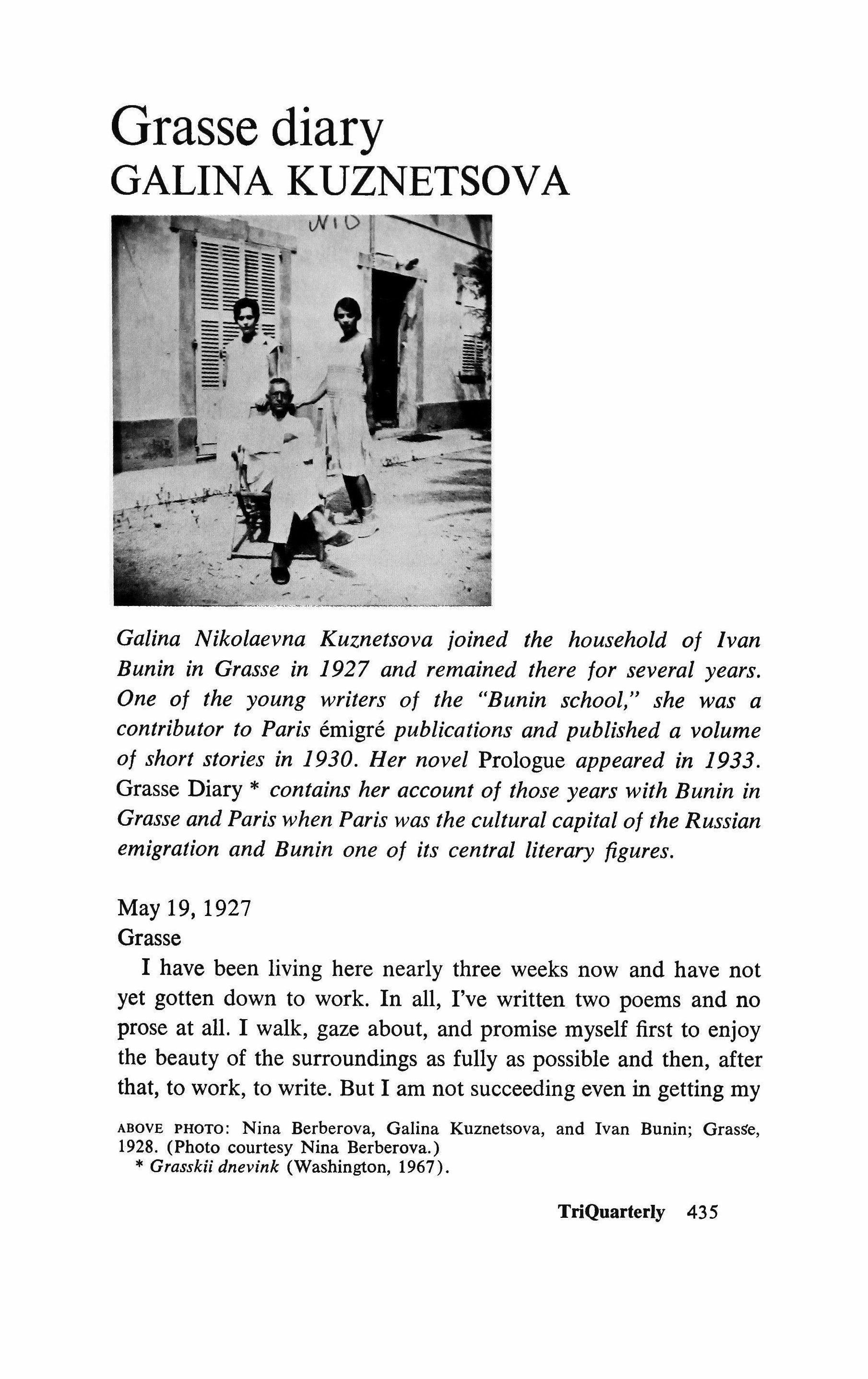
Galina Nikolaevna Kuznetsova joined the household of Ivan Bunin in Grasse in 1927 and remained there for several years. One of the young writers of the "Bunin school," she was a contributor to Paris emigre publications and published a volume of short stories in 1930. Her novel Prologue appeared in 1933. Grasse Diary * contains her account of those years with Bunin in Grasse and Paris when Paris was the cultural capital of the Russian emigration and Bunin one of its central literary figures.
May 19,1927
Grasse
I have been living here nearly three weeks now and have not yet gotten down to work. In all, I've written two poems and no prose at all. I walk, gaze about, and promise myself first to enjoy the beauty of the surroundings as fully as possible and then, after that, to work, to write. But I am not succeeding even in getting my
ABOVE PHOTO: Nina Berberova, Galina Kuznetsova, and Ivan Bunin; Grasse, 1928. (Photo courtesy Nina Berberova.) * Grasskii dnevink (Washington, 1967).
TriQuarterly 435

fill of enjoyment. The deserted gardens, lying in terraces around our villa, lure me, for the most part platonically. I run there for a quarter of an hour, cast a glance around, and then hurry back to the house. However, I often walk in the open patio before the villa; I gaze and can't get enough of the valley, gently blue, which lies far below, by the sea. On the horizon are mountains, those wild Maures in which Maupassant roamed.
In the morning I cut roses-the fences are entwined with them -and expel the green beetles which are eating the heart of the flower. This last was taught me by Fondaminsky,' in whom there is a pleasant fondness for flowers, rare in a man. Usually I go on to fill all the pitchers in the house with flowers, which I. A. [Bunin] calls "occupying oneself with esthetics." He himself loves flowers, but from a distance. He says that on the table they bother him and that in general one should keep flowers only in those houses where there are many rooms and a whole staff of servants. This is a small example of his tendency always to exaggerate everything, a feature which is derived from his passionate, brusque nature. However, he does love fragrant flowers. Once he even asked me to cut a bouquet of heliotrope for him and place it in his study.
Bushes of this heliotrope grow under the windows of the villa Montfleury, which is located below our window and is at present empty. There on one of the terraces is an empty stone cistern. On the bottom of it, among branches and trash, lies a small skeleton of a cat, washed clean by rains. Obviously, it jumped in and couldn't climb back out. And although it must have died slowly and painfully, there is nevertheless in its little skeleton, in the tiny yellow bones of its hind paws, neatly folded under, a profound touching repose. It lies so quietly, and I involuntarily fall to thinking about death: what is this thing of which we are all so terrified? Perhaps the answer is in these clean little bones lying in the shade of a broad fig branch. It is as if they were a symbol of total peace, which was promised to every being on earth. However, I. A. warned me not to speak of cats in the presence
436
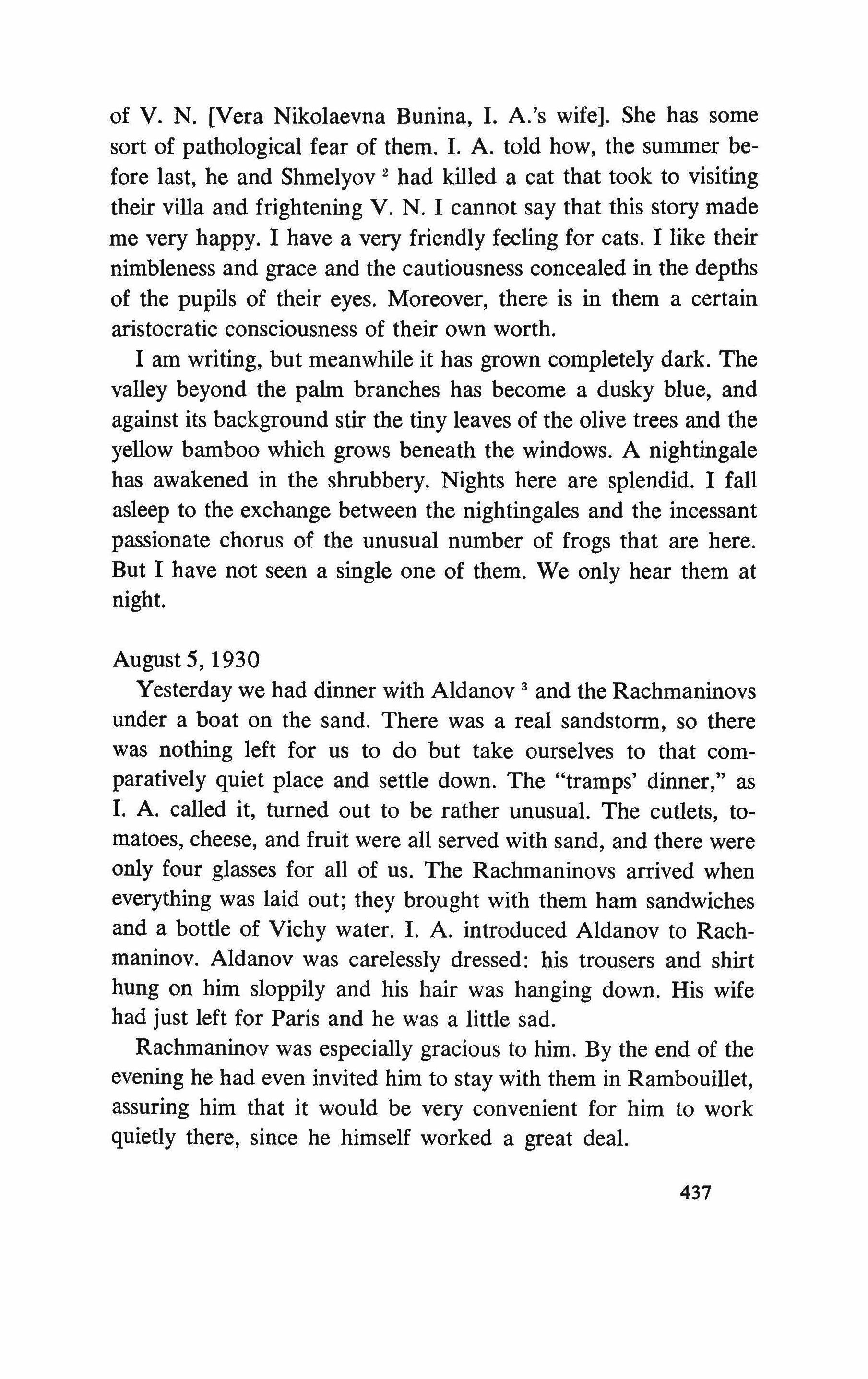
of V. N. [Vera Nikolaevna Bunina, I. A.'s wife]. She has some sort of pathological fear of them. I. A. told how, the summer before last, he and Shmelyov 2 had killed a cat that took to visiting their villa and frightening V. N. I cannot say that this story made me very happy. I have a very friendly feeling for cats. I like their nimbleness and grace and the cautiousness concealed in the depths of the pupils of their eyes. Moreover, there is in them a certain aristocratic consciousness of their own worth.
I am writing, but meanwhile it has grown completely dark. The valley beyond the palm branches has become a dusky blue, and against its background stir the tiny leaves of the olive trees and the yellow bamboo which grows beneath the windows. A nightingale has awakened in the shrubbery. Nights here are splendid. I fall asleep to the exchange between the nightingales and the incessant passionate chorus of the unusual number of frogs that are here. But I have not seen a single one of them. We only hear them at night.
August 5, 1930
Yesterday we had dinner with Aldanov 3 and the Rachmaninovs under a boat on the sand. There was a real sandstorm, so there was nothing left for us to do but take ourselves to that comparatively quiet place and settle down. The "tramps' dinner," as I. A. called it, turned out to be rather unusual. The cutlets, tomatoes, cheese, and fruit were all served with sand, and there were only four glasses for all of us. The Rachmaninovs arrived when everything was laid out; they brought with them ham sandwiches and a bottle of Vichy water. I. A. introduced Aldanov to Rachmaninov. Aldanov was carelessly dressed: his trousers and shirt hung on him sloppily and his hair was hanging down. His wife had just left for Paris and he was a little sad.
Rachmaninov was especially gracious to him. By the end of the evening he had even invited him to stay with them in Rambouillet, assuring him that it would be very convenient for him to work quietly there, since he himself worked a great deal.
437

We were all invited to lunch the next day at Aldanov's in Juanles-Pins. (When saying good-bye, he managed to whisper to me: "Be sure to bring the camera-you won't forget?")
Undated
First we had a swim at a small beach-the water was transparent, clean, delightful-then we went in the direction of Aldanov's villa. The Rachmaninovs overtook us in their car. V. N. and I. A. got in with them, and Tanya 4 got out and joined us. We went on, leisurely, on foot.
In Aldanov's living room, a round table already laden with hors d'oeuvres awaited us. We sat down: around one side, I. A., Aldanov, and Rachmaninov, closing the other, I, L.,s Tanya, and V. N. beside Rachmaninov, closing the circle. A pleasant breeze drifted through the half-open doors. Out of respect for the "celebrities" we were separated from the rest of the pension guests, who dined in the next room. Rachmaninov was very charming, gracious, and lively. He constantly turned to pass things to us, started conversations, and helped V. N. to serve the fish and chicken from a large platter.
After the roast, we were served dessert and coffee, the doors were closed, and we were left alone. Rachmaninov, who had drunk little and eaten very moderately, allowing himself only one extra cup of coffee, began to tell of his visit to Tolstoy. He spoke in a barely audible voice, almost a whisper, breathily, pronouncing "I" like "r."
"It is not a pleasant memory It happened in 1900. They had told Tolstoy that there is this certain young man who has stopped working, has been drinking for three years, and has despaired of himself; and yet he's talented and ought to be encouraged. I played Beethoven. There is a certain little piece with a leitmotif expressing the grief of young lovers who are being separated." I finished and everyone was in raptures, but they were afraid to clap because they were waiting to see how Tolstoy would react. And he sat apart from everyone, his arms folded severely, and was silent. Everyone was quiet, seeing that he was not pleased.
438
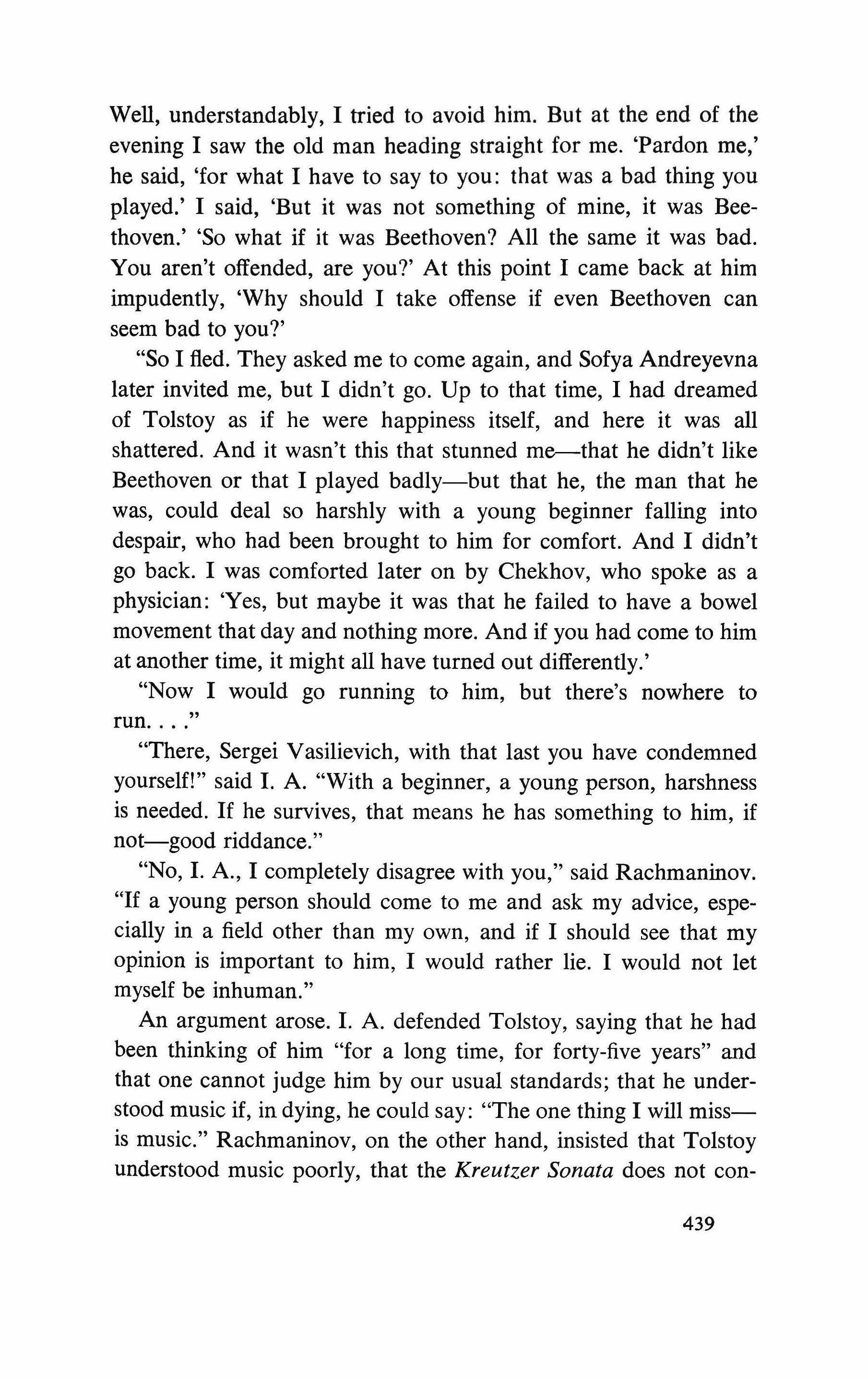
Well, understandably, I tried to avoid him. But at the end of the evening I saw the old man heading straight for me. 'Pardon me,' he said, 'for what I have to say to you: that was a bad thing you played.' I said, 'But it was not something of mine, it was Beethoven.' 'So what if it was Beethoven? All the same it was bad. You aren't offended, are you?' At this point I came back at him impudently, 'Why should I take offense if even Beethoven can seem bad to you?'
"So I fled. They asked me to come again, and Sofya Andreyevna later invited me, but I didn't go. Up to that time, I had dreamed of Tolstoy as if he were happiness itself, and here it was all shattered. And it wasn't this that stunned me-that he didn't like Beethoven or that I played badly-but that he, the man that he was, could deal so harshly with a young beginner falling into despair, who had been brought to him for comfort. And I didn't go back. I was comforted later on by Chekhov, who spoke as a physician: 'Yes, but maybe it was that he failed to have a bowel movement that day and nothing more. And if you had come to him at another time, it might all have turned out differently.'
"Now I would go running to him, but there's nowhere to run
"There, Sergei Vasilievich, with that last you have condemned yourself!" said I. A. "With a beginner, a young person, harshness is needed. If he survives, that means he has something to him, if not-good riddance."
"No, I. A., I completely disagree with you," said Rachmaninov. "If a young person should come to me and ask my advice, especially in a field other than my own, and if I should see that my opinion is important to him, I would rather lie. I would not let myself be inhuman."
An argument arose. I. A. defended Tolstoy, saying that he had been thinking of him "for a long time, for forty-five years" and that one cannot judge him by our usual standards; that he understood music if, in dying, he could say: "The one thing I will missis music." Rachmaninov, on the other hand, insisted that Tolstoy understood music poorly, that the Kreutzer Sonata does not con439
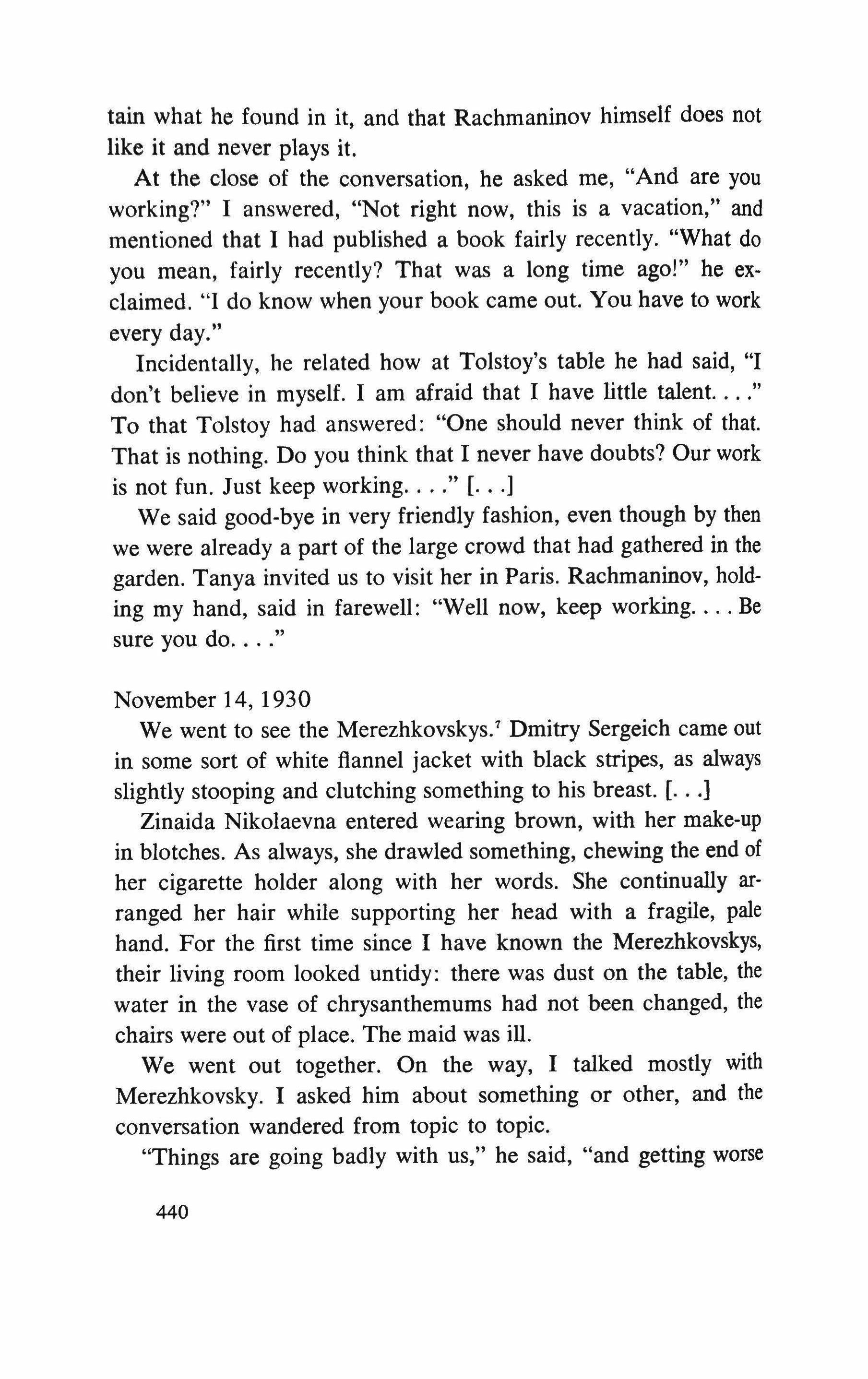
tain what he found in it, and that Rachmaninov himself does not like it and never plays it.
At the close of the conversation, he asked me, "And are you working?" I answered, "Not right now, this is a vacation," and mentioned that I had published a book fairly recently. "What do you mean, fairly recently? That was a long time ago!" he exclaimed. "I do know when your book came out. You have to work every day."
Incidentally, he related how at Tolstoy's table he had said, "I don't believe in myself. I am afraid that I have little talent. " To that Tolstoy had answered: "One should never think of that. That is nothing. Do you think that I never have doubts? Our work is not fun. Just keep working [ J
We said good-bye in very friendly fashion, even though by then we were already a part of the large crowd that had gathered in the garden. Tanya invited us to visit her in Paris. Rachmaninov, holding my hand, said in farewell: "Well now, keep working Be sure you do
November 14,1930
We went to see the Merezhkovskys.' Dmitry Sergeich came out in some sort of white flannel jacket with black stripes, as always slightly stooping and clutching something to his breast. [ J
Zinaida Nikolaevna entered wearing brown, with her make-up in blotches. As always, she drawled something, chewing the end of her cigarette holder along with her words. She continually arranged her hair while supporting her head with a fragile, pale hand. For the first time since I have known the Merezhkovskys, their living room looked untidy: there was dust on the table, the water in the vase of chrysanthemums had not been changed, the chairs were out of place. The maid was ill.
We went out together. On the way, I talked mostly with Merezhkovsky. I asked him about something or other, and the conversation wandered from topic to topic.
"Things are going badly with us," he said, "and getting worse
440
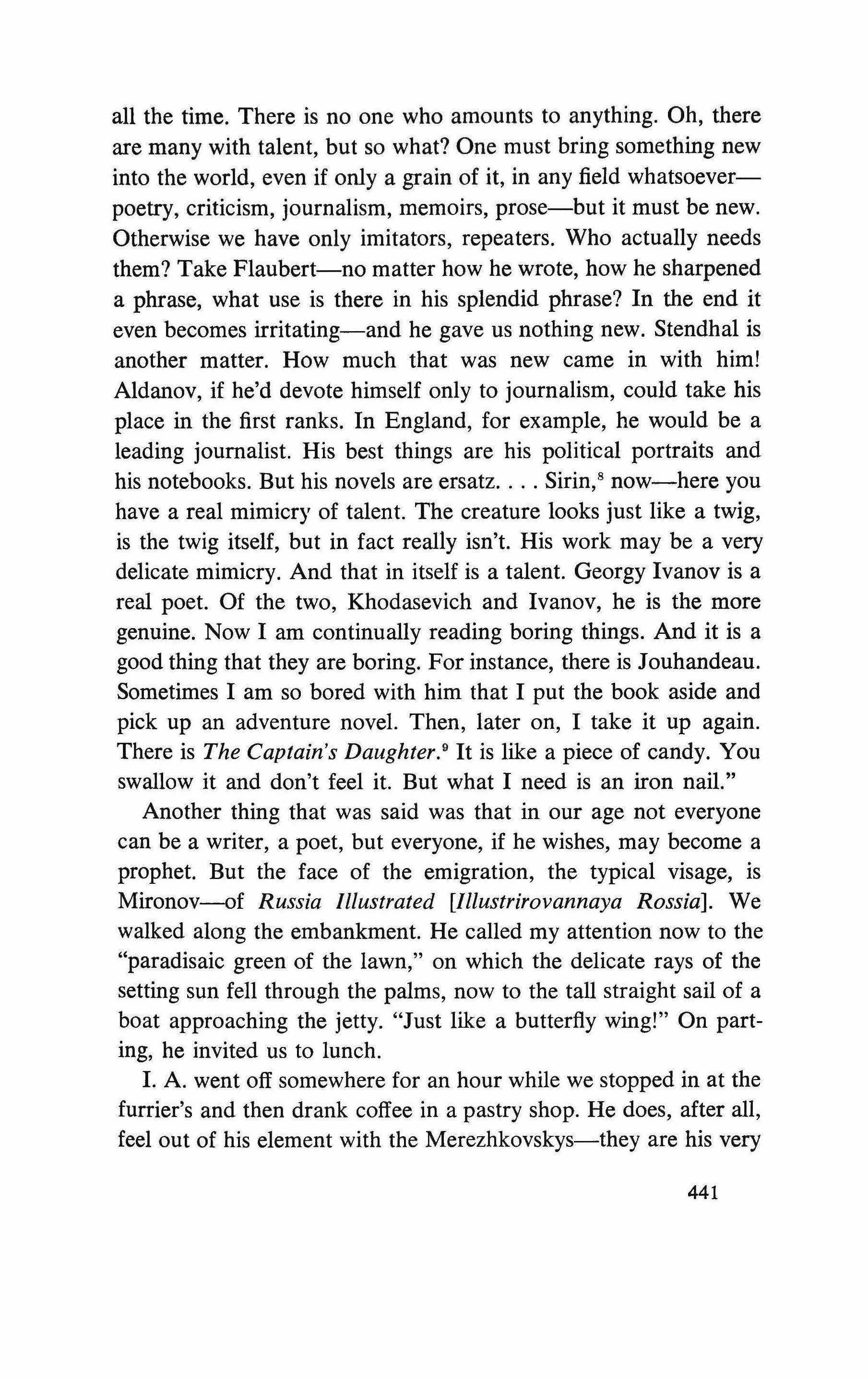
all the time. There is no one who amounts to anything. Oh, there are many with talent, but so what? One must bring something new into the world, even if only a grain of it, in any field whatsoeverpoetry, criticism, journalism, memoirs, prose-but it must be new. Otherwise we have only imitators, repeaters. Who actually needs them? Take Flaubert-no matter how he wrote, how he sharpened a phrase, what use is there in his splendid phrase? In the end it even becomes irritating-and he gave us nothing new. Stendhal is another matter. How much that was new came in with him! Aldanov, if he'd devote himself only to journalism, could take his place in the first ranks. In England, for example, he would be a leading journalist. His best things are his political portraits and his notebooks. But his novels are ersatz Sirin," now-here you have a real mimicry of talent. The creature looks just like a twig, is the twig itself, but in fact really isn't. His work may be a very delicate mimicry. And that in itself is a talent. Georgy Ivanov is a real poet. Of the two, Khodasevich and Ivanov, he is the more genuine. Now I am continually reading boring things. And it is a good thing that they are boring. For instance, there is Jouhandeau. Sometimes I am so bored with him that I put the book aside and pick up an adventure novel. Then, later on, I take it up again. There is The Captain's Daughter? It is like a piece of candy. You swallow it and don't feel it. But what I need is an iron nail."
Another thing that was said was that in our age not everyone can be a writer, a poet, but everyone, if he wishes, may become a prophet. But the face of the emigration, the typical visage, is Mironov-of Russia Illustrated [Illustrirovannaya Rossia]. We walked along the embankment. He called my attention now to the "paradisaic green of the lawn," on which the delicate rays of the setting sun fell through the palms, now to the tall straight sail of a boat approaching the jetty. "Just like a butterfly wing!" On parting, he invited us to lunch.
I. A. went off somewhere for an hour while we stopped in at the furrier's and then drank coffee in a pastry shop. He does, after all, feel out of his element with the Merezhkovskys-they are his very
441

opposite in everything. Later he said that, though Merezhkovsky played the charmer with me, much of what he said was said for the sake of paradox.
December 19, 1930
The other evening we were sitting in I. A:s study and the conversation turned to Dostoevsky. I. A., who had undertaken to reread The Possessed. said: "So once again, for the umpteenth time, I decided to reread it, I approached it with an open mind. After all, the whole world is ecstatic about it, so I obviously had missed something. Well, I've gotten halfway through, and again it's the same thing. I feel that I'm being made a fool of, that I'm being taken for a dunce. And it doesn't move me at all. Endless talk and every minute 'everyone is expecting something' and everyone knows everyone else and they are all constantly gathering in one place and there is always one and the same heroine. And already two hundred pages, and still no one is possessed. No, it's bad! It's irritating!"
"What are you trying to say?" asked V. N.
"I am trying to say that clearly it is not I who am mistaken but the 'world'; that we are dealing here with a case of mass hypnosis. But not only do they not dare say that the king is naked, but they do not dare confess it even to themselves."
"Do you mean to say that Dostoevsky is a bad writer?" shouted Z.
"Yes, I do mean to say that. And you had better listen to me. I understand something in this matter."
"But how can you say such a thing? The fact that he doesn't like descriptions of nature-but that isn't his concern; that he hurries-that's because he had no time to polish, you know how he wrote."
"And I insist that he could write no other way and that he polished as much as he could and could go no further. Get what I'm saying: everything in him is so finished and polished that you cannot unravel one loop from that lacework. He could write no other way."
442

Z. jumped up and began to shout outraged refutations. V. N. said that Dostoevsky had explained to her much in I. A. himself and in the whole life of our household. I. A. stood his ground with unusual firmness and claimed as proof the fact that, no matter how many times he read Dostoevsky, a year later he remembered nothing.
A terrific uproar ensued. Roshchin 10 alone took no part in it. Resting his elbow on the table, he gazed at the illustration for some novel in the newspaper.
The argument of course led nowhere. Afterward, V. N. and Z. went upstairs, and the three of us remained below.
"And you, Captain, what do you think of Dostoevsky?" asked I. A. in the playful tone he and Roshchin always used with one another.
"It's of no concern to me let him write as he pleases," replied the captain in a bass voice, matching I. A.'s. "What's it to me? Let him." We laughed.
November 3, 1932
An evening in Cannes. To the right against the sky stands out the huge flat stage set of the city and the mountains, cut out of dark, blue-grey paper. In this stage piece, now and then gleams an opening-a church tower, for example. Above all this is the golden sky. The sun has already set. The water is calm, smooth; freshness wafts from it. To the left, lights have come on around the bay, and the steel-blue water comes up to those sparkling palaces, the big hotels. We are talking about the Nobel prize.
I. A.: "No, precisely because we are so poor and because this money would save us, it won't happen. Things don't happen that way. It will go quite naturally to Valery and it will change nothing much in his life. He already has a fine, cheap prewar apartment, cabinets of golden polished wood, in which there are heaps of splendid linen. In all respects it fits him (he's written some kind of cerebral, high-flown nonsense), but Mauriac, for example, it doesn't fit. But then, who would think of giving the prize to Mauriac?"
443

It was All Saints' Day. In the bus, people were standing in the aisles-I sat beside the driver. The grey ribbon of highway ran toward me, disappearing under the bus. Lit by brilliant sun, the road stretched under an awning of plane tree leaves, glowing through and through with all shades of yellow and brown. We stopped often. On the road before the Cannes cemetery, flowers were being sold everywhere. A crowd in black walked with armloads of tuberoses.
I. A. was depressed. Last night he had reread the first chapters which he had written of the continuation of The Life of Arseniev, At first he was rather satisfied with them, especially with the part about his growing intimacy with Lika. But then suddenly he lost his liking for it all.
Looking at him, I keep thinking how mysterious it is. Why couldn't he have written these chapters last year, for example? After all, the continuation was known to him all along. Why did he have to agonize for three years before sitting down to write what he had known beforehand-since, according to V. N., it all had really occurred in his own life? Indeed, it is a puzzle. Hadn't it ripened? Had he himself not been ready, not humbled sufficiently to describe what he calls that "insignificant life," that ordinary life? I look at him and keep thinking of this. Now that he has overcome the difficult barrier of introduction, he very quickly writes page after page, then polishes and adds after it has been typed up.
November 6
The business of awarding the prize is coming closer. The morning newspapers are becoming nerve-wracking. We await the French morning papers now in trembling. I. A. opens them first. I can imagine his agitation. If only that blow would fall as quickly as possible. Last year it was done earlier than expected. This afternoon an imprudent (and perhaps thoughtless) telegram from Berlin, congratulations in advance, upset the whole house. We talked about it during our evening walk. In this situation I. A. behaves, as he himself said, naturally. There is no
444

excessive nervousness--during the Gorgulov business 11 he was just as excited, and he bought even more newspapers. But of course he is restless nonetheless, especially after the unexpected and persistent appearance of Merezhkovsky's name in print.
But all the same, even today he wrote all day.
November 8
Awaiting the news of the prize has become painful. A clipping with a portrait of Merezhkovsky sent by some Argus of the press produced a depressing effect.
November 11
The prize went to an Englishman-Galsworthy. I felt a genuine relief, knowing that that secret torture of waiting, to which the whole house had been subjected during the last week, has ended. Now it is possible to occupy ourselves with the usual affairs, no longer to be anxious, to stop waiting for something, something which will not come to us Russians anyhow. Yes, in general, all that is from the Evil One, that anxiety about the prize, dragging on for two years now. Proof of that is the fact that literally the whole house, and I. A., it seems, more than anyone else, was relieved at the news of the awarding of the prize. With a sort of good-natured, relieved face, I. A. reviled the Swedes. We talked for five minutes in the dining room, and then he went to his study to write.
November 22
I. A. is writing three to four typewritten pages a day. He first writes by hand, and then before dinner gives them to V. N. to type. After that he makes his corrections and gives them to me to recopy on loose-leaf bond paper.
In the evening he goes walking with me and talks about what he has written. He writes literally all day, eats very little for breakfast, and drinks tea and coffee incessantly. This regime has been going on for a month, if not a month and a half. Needless to say, he is totally absorbed in his writing. Nothing around him
445
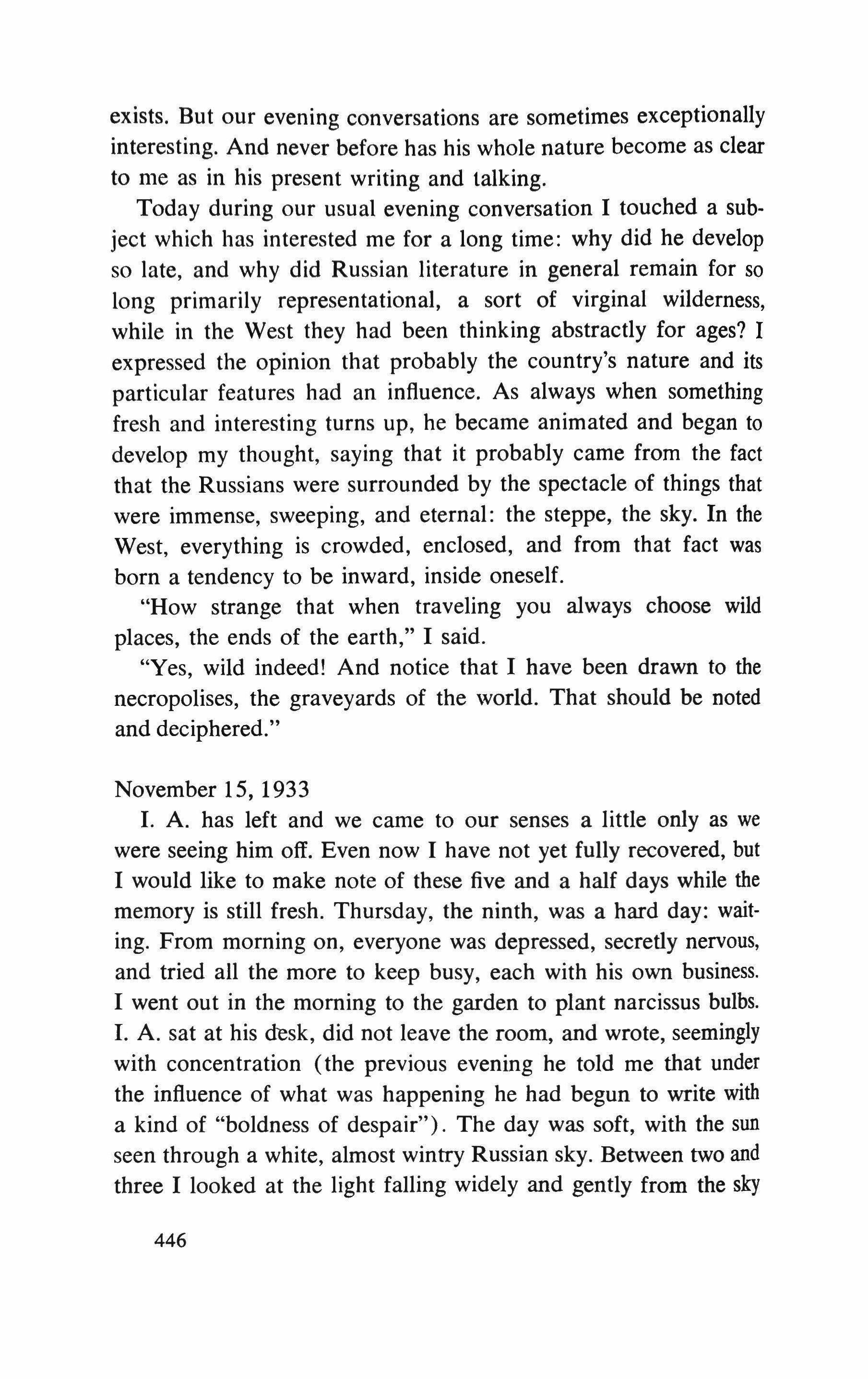
exists. But our evening conversations are sometimes exceptionally interesting. And never before has his whole nature become as clear to me as in his present writing and talking.
Today during our usual evening conversation I touched a subject which has interested me for a long time: why did he develop so late, and why did Russian literature in general remain for so long primarily representational, a sort of virginal wilderness, while in the West they had been thinking abstractly for ages? I expressed the opinion that probably the country's nature and its particular features had an influence. As always when something fresh and interesting turns up, he became animated and began to develop my thought, saying that it probably came from the fact that the Russians were surrounded by the spectacle of things that were immense, sweeping, and eternal: the steppe, the sky. In the West, everything is crowded, enclosed, and from that fact was born a tendency to be inward, inside oneself.
"How strange that when traveling you always choose wild places, the ends of the earth," I said.
"Yes, wild indeed! And notice that I have been drawn to the necropolises, the graveyards of the world. That should be noted and deciphered."
November 15, 1933
I. A. has left and we came to our senses a little only as we were seeing him off. Even now I have not yet fully recovered, but I would like to make note of these five and a half days while the memory is still fresh. Thursday, the ninth, was a hard day: waiting. From morning on, everyone was depressed, secretly nervous, and tried all the more to keep busy, each with his own business. I went out in the morning to the garden to plant narcissus bulbs. I. A. sat at his desk, did not leave the room, and wrote, seemingly with concentration (the previous evening he told me that under the influence of what was happening he had begun to write with a kind of "boldness of despair"). The day was soft, with the sun seen through a white, almost wintry Russian sky. Between two and three I looked at the light falling widely and gently from the sky
446
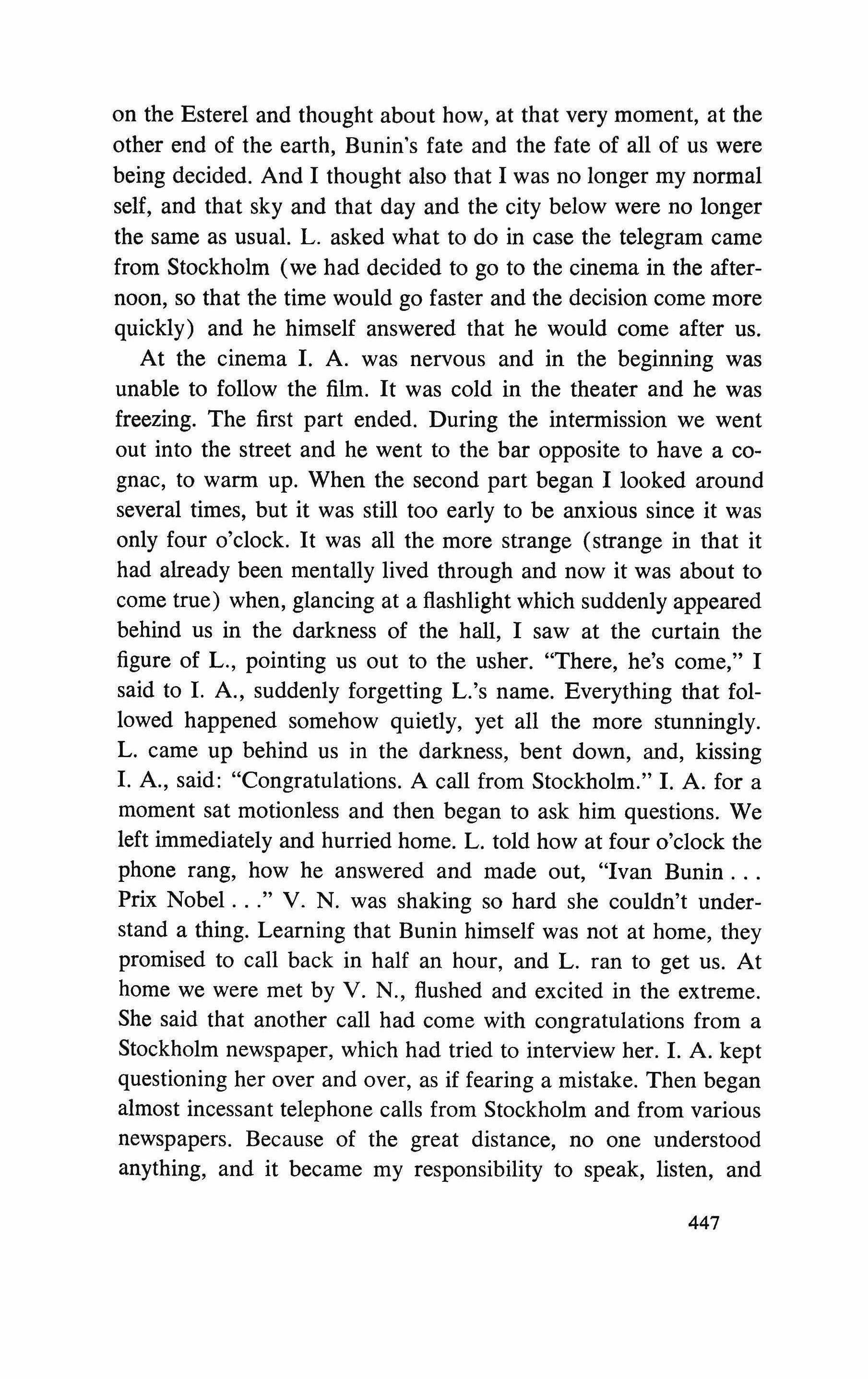
on the Esterel and thought about how, at that very moment, at the other end of the earth, Bunin's fate and the fate of all of us were being decided. And I thought also that I was no longer my normal self, and that sky and that day and the city below were no longer the same as usual. L. asked what to do in case the telegram came from Stockholm (we had decided to go to the cinema in the afternoon, so that the time would go faster and the decision come more quickly) and he himself answered that he would come after us.
At the cinema I. A. was nervous and in the beginning was unable to follow the film. It was cold in the theater and he was freezing. The first part ended. During the intermission we went out into the street and he went to the bar opposite to have a cognac, to warm up. When the second part began I looked around several times, but it was still too early to be anxious since it was only four o'clock. It was all the more strange (strange in that it had already been mentally lived through and now it was about to come true) when, glancing at a flashlight which suddenly appeared behind us in the darkness of the hall, I saw at the curtain the figure of L., pointing us out to the usher. "There, he's come," I said to I. A., suddenly forgetting L.'s name. Everything that followed happened somehow quietly, yet all the more stunningly. L. came up behind us in the darkness, bent down, and, kissing I. A., said: "Congratulations. A call from Stockholm." I. A. for a moment sat motionless and then began to ask him questions. We left immediately and hurried home. L. told how at four o'clock the phone rang, how he answered and made out, "Ivan Bunin Prix Nobel V. N. was shaking so hard she couldn't understand a thing. Learning that Bunin himself was not at home, they promised to call back in half an hour, and L. ran to get us. At home we were met by V. N., flushed and excited in the extreme. She said that another call had come with congratulations from a Stockholm newspaper, which had tried to interview her. I. A. kept questioning her over and over, as if fearing a mistake. Then began almost incessant telephone calls from Stockholm and from various newspapers. Because of the great distance, no one understood anything, and it became my responsibility to speak, listen, and 447
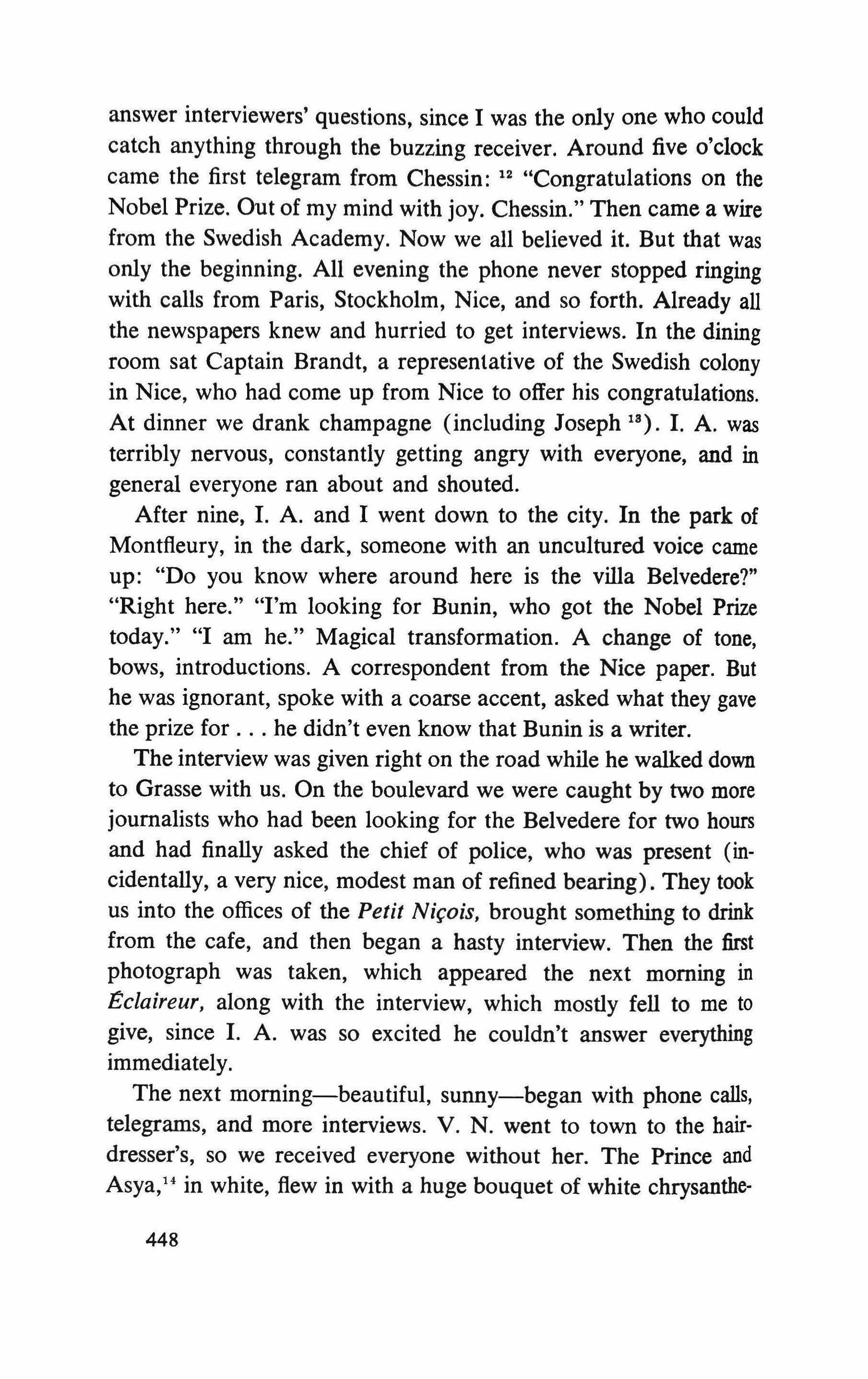
answer interviewers' questions, since I was the only one who could catch anything through the buzzing receiver. Around five o'clock came the first telegram from Chessin: 12 "Congratulations on the Nobel Prize. Out of my mind with joy. Chessin." Then came a wire from the Swedish Academy. Now we all believed it. But that was only the beginning. All evening the phone never stopped ringing with calls from Paris, Stockholm, Nice, and so forth. Already all the newspapers knew and hurried to get interviews. In the dining room sat Captain Brandt, a representative of the Swedish colony in Nice, who had come up from Nice to offer his congratulations. At dinner we drank champagne (including Joseph 18). I. A. was terribly nervous, constantly getting angry with everyone, and in general everyone ran about and shouted.
After nine, I. A. and I went down to the city. In the park of Montfleury, in the dark, someone with an uncultured voice came up: "Do you know where around here is the villa Belvedere?" "Right here." "I'm looking for Bunin, who got the Nobel Prize today." "I am he." Magical transformation. A change of tone, bows, introductions. A correspondent from the Nice paper. But he was ignorant, spoke with a coarse accent, asked what they gave the prize for he didn't even know that Bunin is a writer.
The interview was given right on the road while he walked down to Grasse with us. On the boulevard we were caught by two more journalists who had been looking for the Belvedere for two hours and had finally asked the chief of police, who was present (incidentally, a very nice, modest man of refined bearing). They took us into the offices of the Petit Nicols, brought something to drink from the cafe, and then began a hasty interview. Then the first photograph was taken, which appeared the next morning in Eclaireur, along with the interview, which mostly fell to me to give, since I. A. was so excited he couldn't answer everything immediately.
The next morning-beautiful, sunny-began with phone calls, telegrams, and more interviews. V. N. went to town to the hairdresser's, so we received everyone without her. The Prince and Asya," in white, flew in with a huge bouquet of white chrysanthe-
448
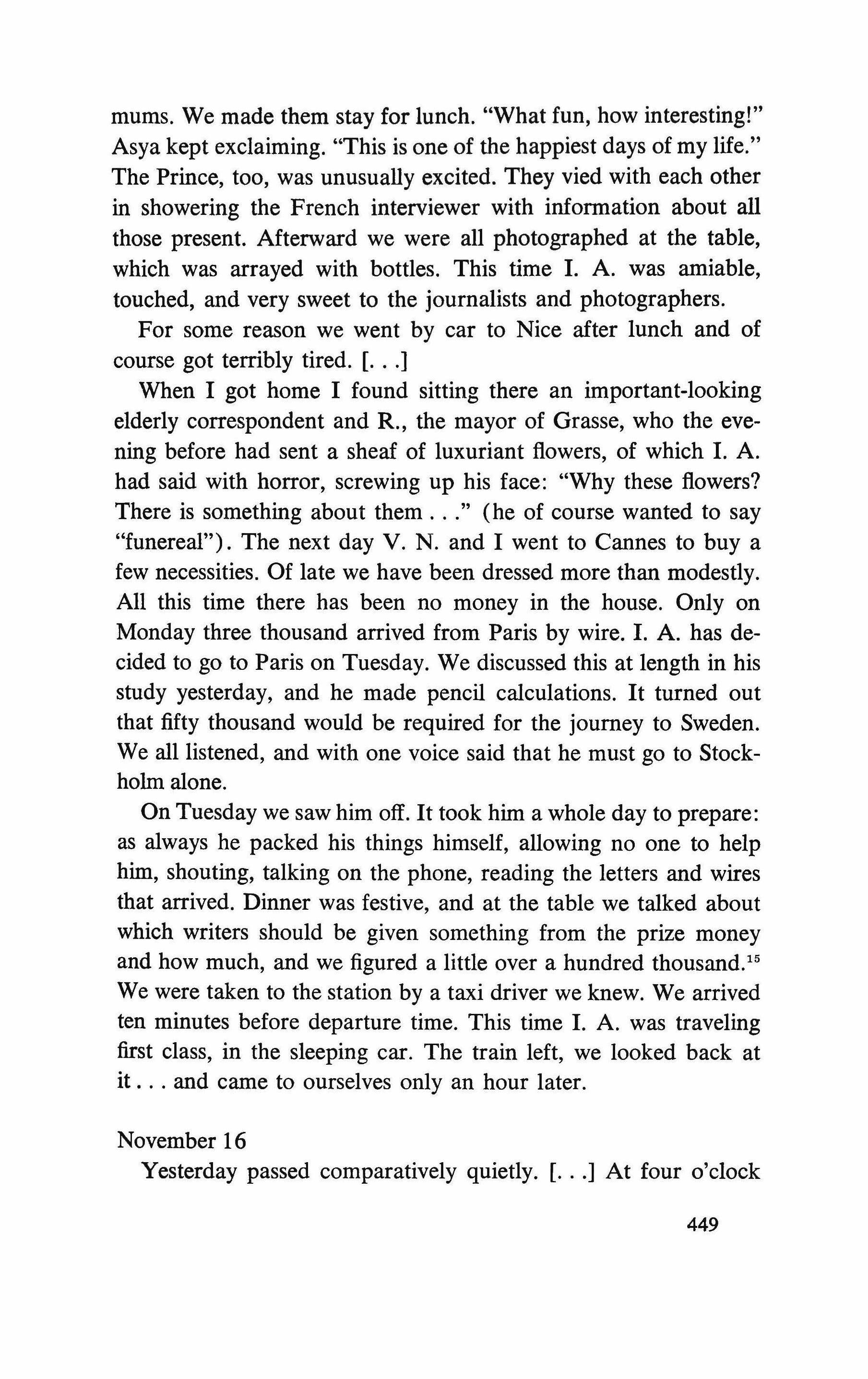
mums. We made them stay for lunch. "What fun, how interesting!" Asya kept exclaiming. "This is one of the happiest days of my life." The Prince, too, was unusually excited. They vied with each other in showering the French interviewer with information about all those present. Afterward we were all photographed at the table, which was arrayed with bottles. This time I. A. was amiable, touched, and very sweet to the journalists and photographers. For some reason we went by car to Nice after lunch and of course got terribly tired. [ ]
When I got home I found sitting there an important-looking elderly correspondent and R, the mayor of Grasse, who the evening before had sent a sheaf of luxuriant flowers, of which I. A. had said with horror, screwing up his face: "Why these flowers? There is something about them (he of course wanted to say "funereal"). The next day V. N. and I went to Cannes to buy a few necessities. Of late we have been dressed more than modestly. All this time there has been no money in the house. Only on Monday three thousand arrived from Paris by wire. I. A. has decided to go to Paris on Tuesday. We discussed this at length in his study yesterday, and he made pencil calculations. It turned out that fifty thousand would be required for the journey to Sweden. We all listened, and with one voice said that he must go to Stockholm alone.
On Tuesday we saw him off. It took him a whole day to prepare: as always he packed his things himself, allowing no one to help him, shouting, talking on the phone, reading the letters and wires that arrived. Dinner was festive, and at the table we talked about which writers should be given something from the prize money and how much, and we figured a little over a hundred thousand." We were taken to the station by a taxi driver we knew. We arrived ten minutes before departure time. This time I. A. was traveling first class, in the sleeping car. The train left, we looked back at it and came to ourselves only an hour later.
November 16
Yesterday passed comparatively quietly. [ ] At four o'clock 449
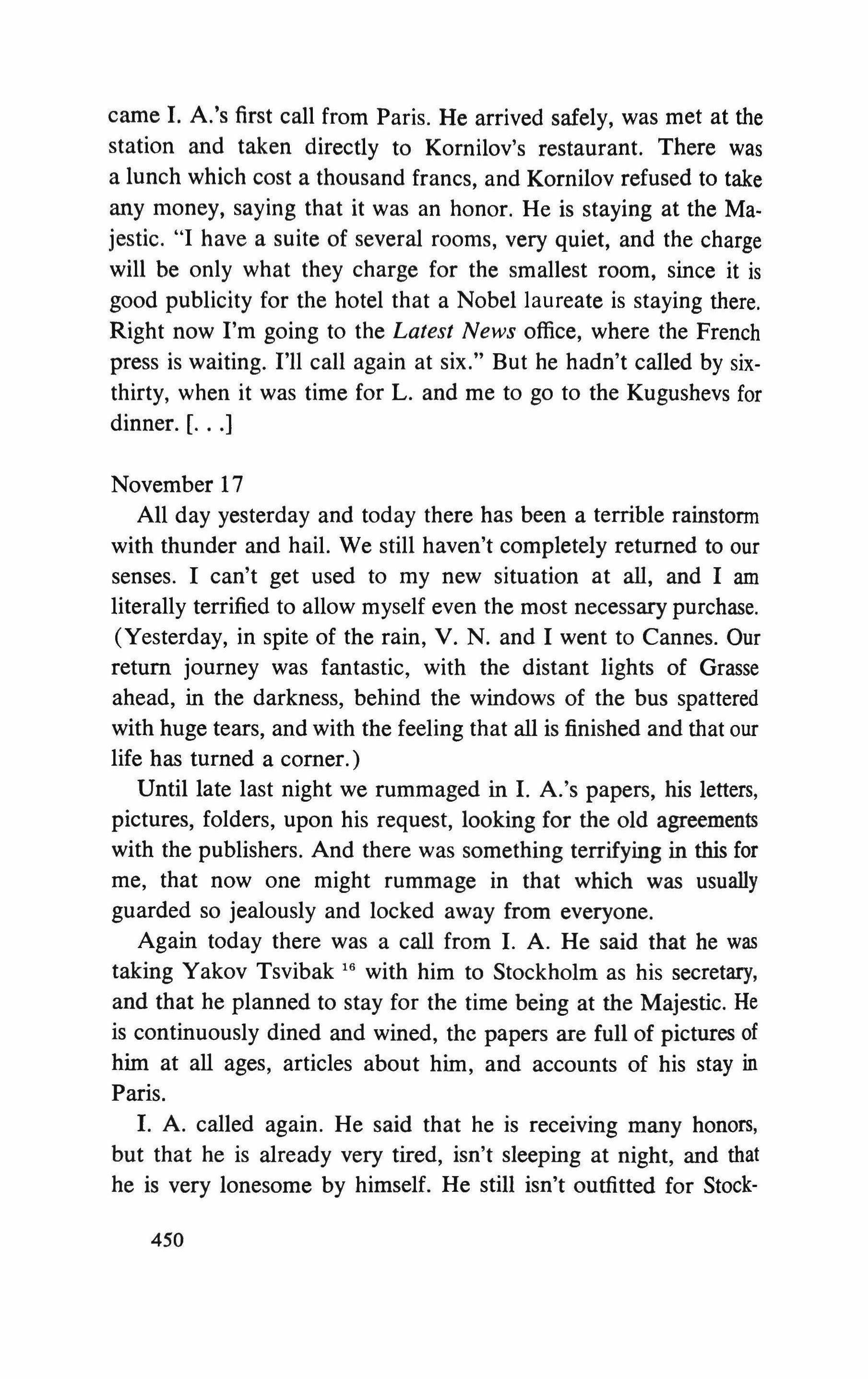
came I. A.'s first call from Paris. He arrived safely, was met at the station and taken directly to Kornilov's restaurant. There was a lunch which cost a thousand francs, and Kornilov refused to take any money, saying that it was an honor. He is staying at the Majestic. "I have a suite of several rooms, very quiet, and the charge will be only what they charge for the smallest room, since it is good publicity for the hotel that a Nobel laureate is staying there. Right now I'm going to the Latest News office, where the French press is waiting. I'll call again at six." But he hadn't called by sixthirty, when it was time for L. and me to go to the Kugushevs for dinner. [ J
November 17
All day yesterday and today there has been a terrible rainstorm with thunder and hail. We still haven't completely returned to our senses. I can't get used to my new situation at all, and I am literally terrified to allow myself even the most necessary purchase. (Yesterday, in spite of the rain, V. N. and I went to Cannes. OUf return journey was fantastic, with the distant lights of Grasse ahead, in the darkness, behind the windows of the bus spattered with huge tears, and with the feeling that all is finished and that our life has turned a corner.)
Until late last night we rummaged in I. A.'s papers, his letters, pictures, folders, upon his request, looking for the old agreements with the publishers. And there was something terrifying in this for me, that now one might rummage in that which was usually guarded so jealously and locked away from everyone.
Again today there was a call from I. A. He said that he was taking Yakov Tsvibak 16 with him to Stockholm as his secretary, and that he planned to stay for the time being at the Majestic. He is continuously dined and wined, the papers are full of pictures of him at all ages, articles about him, and accounts of his stay in Paris.
I. A. called again. He said that he is receiving many honors, but that he is already very tired, isn't sleeping at night, and that he is very lonesome by himself. He still isn't outfitted for Stock-
450

holm, but the tailor who will make him tails, an overcoat, and so forth, has been in to see him. We must come to Paris in about a week for the big banquet in his honor. He has already been filmed and has spoken over the radio.
November 28
Paris
The first evening is more or less quiet. I am alone. I went with I. A. to the "Moscow," where they treated us to caviar, sturgeon, shashlik, old Armagnac, and pineapples. They accepted no money, as is the custom now in Russian restaurants when Bunin is there. He gave the waiters a tip of one hundred and fifty francs. Now it is almost midnight. V. N. is, as usual, not home yet. She will probably return sometime after midnight. She is running about to see her acquaintances. It is late. The dusky old corridors of the Majestic are lit dimly. I never thought that I would stay here. But everything, as it comes true, is not the way you imagine it. On the ninth of November our life was fundamentally changed, not "magically," as some of our acquaintances are now saying but, all the same, changed. I don't know what will happen now. I. A. insists that I go with them to Stockholm, but I am hesitating. I'm at the end of my rope, worn to a frazzle, I sleep badly, and I keep thinking how good it would be to get a rest somewhere far from everyone and everything Besides that, I suffer from seeing all the blunders committed on all sides and blamed on Bunin, who is very little at fault for them, and up to now I do not rejoice at the change in our life.
December 1
Despite his fatigue, I. A is nevertheless pleased and touched at the homage. He is trying not to drink, to save himself for Sweden. He himself took the trouble about my passport, but everything was arranged by Gustav Nobel. Yasha, "Ie magnifique," as Melita 17 calls him, takes on more and more the look of a commander. Sometimes his gestures are almost those of a general. He has a great influence on I. A, and for good reason. [ ]
451

December 3
The send-off. Train bleu. Ten o'clock in the evening. A mob at the station.
In the evening after dinner in the dining car I stood in the corridor and gazed out the window. Night, an unknown country, already Belgium-a moonlit night, the gleam of a river beneath some pointed black cliffs. The train swayed. I stood, looked, thinking all the while. It seemed to be the first time this month that I have been alone for a few minutes. I've still not fully understood that the magic circle of our life has been broken, that we have left Grasse and are going to Sweden, where we never expected to be.
Night. I cannot sleep. I stood in the corridor with I. A., looking out the window. Our car is now the last one. The whiteness of snow, roads, tall gloomy trees, which are quite different from the ones in the south. Later: lights, factories, towers, and all this is alive with a strange, sinister life; something is flaming, something seems to be poured. Germany works even at night. At about one, we crossed the German border. Three Germans looked us over, looked to see what newspapers we had, but learning that I. A. is a Nobelpreistriiger, they bowed and left. I. A. ordered a bottle of Riesling from the conductor and we drank it in his compartment. He was in high spirits and said that in the olden days he had always traveled this way.
December 6
Stockholm
The morning was grey and uninviting, with darkness and lights in the fir forests. At the last station before Stockholm, a nice young journalist hopped on and went with us to Stockholm. He asked questions and made notes with excessive, youthful earnestness, trying to maintain his dignity. At the station in Stockholm, we were met by a crowd of Russians and Swedes. Some Russian made a speech, proffered "bread and salt" on a silver platter with an embroidered towel, which someone deftly picked up right away. Several pictures were taken, bulbs flashed, while all around it seemed still dark. We left the station, and at the exit were met by a
452
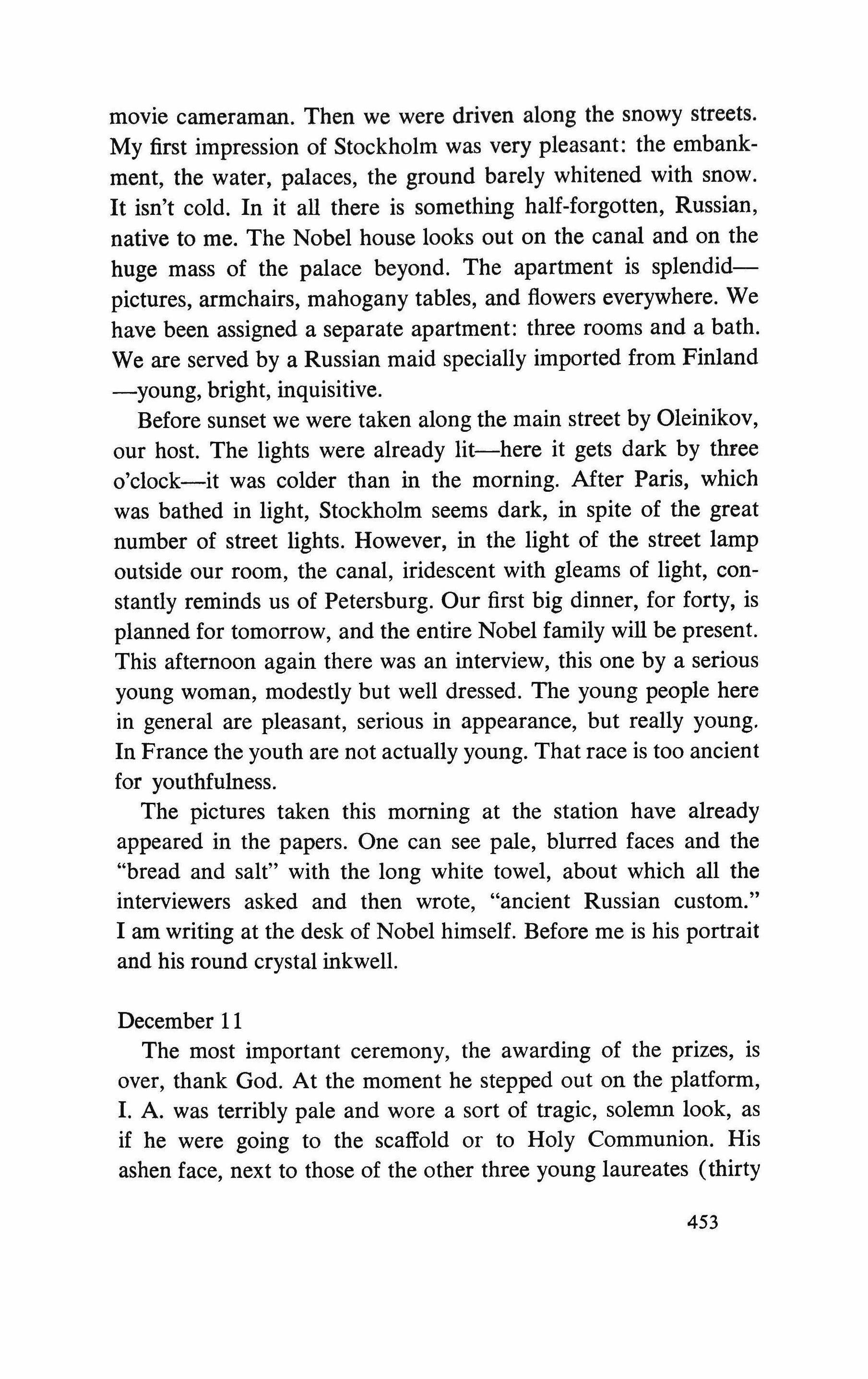
movie cameraman. Then we were driven along the snowy streets. My first impression of Stockholm was very pleasant: the embankment, the water, palaces, the ground barely whitened with snow. It isn't cold. In it all there is something half-forgotten, Russian, native to me. The Nobel house looks out on the canal and on the huge mass of the palace beyond. The apartment is splendidpictures, armchairs, mahogany tables, and flowers everywhere. We have been assigned a separate apartment: three rooms and a bath. We are served by a Russian maid specially imported from Finland -young, bright, inquisitive.
Before sunset we were taken along the main street by Oleinikov, our host. The lights were already lit-here it gets dark by three o'clock-it was colder than in the morning. After Paris, which was bathed in light, Stockholm seems dark, in spite of the great number of street lights. However, in the light of the street lamp outside our room, the canal, iridescent with gleams of light, constantly reminds us of Petersburg. Our first big dinner, for forty, is planned for tomorrow, and the entire Nobel family will be present. This afternoon again there was an interview, this one by a serious young woman, modestly but well dressed. The young people here in general are pleasant, serious in appearance, but really young. In France the youth are not actually young. That race is too ancient for youthfulness.
The pictures taken this morning at the station have already appeared in the papers. One can see pale, blurred faces and the "bread and salt" with the long white towel, about which all the interviewers asked and then wrote, "ancient Russian custom." I am writing at the desk of Nobel himself. Before me is his portrait and his round crystal inkwell.
December 11
The most important ceremony, the awarding of the prizes, is over, thank God. At the moment he stepped out on the platform, I. A. was terribly pale and wore a sort of tragic, solemn look, as if he were going to the scaffold or to Holy Communion. His ashen face, next to those of the other three young laureates (thirty 453

to thirty-five years old), attracted attention. Going up to the rostrum, from which members of the Academy had to deliver their lectures, he bowed low with marked dignity.
The ceremony of the entrance of the King and the royal family (before the entrance of the laureates) was very impressive and was accompanied by light music coming from somewhere in the ceiling. The hall was decorated only with Swedish flags, yellow and blue, in deference to Bunin, who has no flag. When the heralds signaled the entrance of the laureates with trumpet flourishes from the podium, the entire hall, including the King and royal family, rose to its feet. It seems this is the only occasion in the world when a king rises before anyone.
The first two, a physicist and a chemist, received the prize happily and simply. An ambassador accepted the prize for the third, absent, laureate. When Bunin's turn came, he rose and advanced from his place slowly, solemnly, as if on stage. Pictures were taken at the moment of handing him the medal and folder, and today all the papers have a splendid big photograph of that moment.
In the evening there was a banquet in the large hall of the Grand Hotel, where a fountain splashed in the middle. The hall is in ancient Swedish style, decorated with the same yellow-and-blue flags. In the center was the head table, at which the laureates were seated among the members of the royal family. (The head of V. N., with her heavy, glittering black necklace, was visible between the two heavy chandeliers at the center of the table.)
It was rather a torture to sit at table during the banquet. I was at the table closest to the head table. On both sides of me were important personages I did not know, and besides I was nervous for I. A.: in this huge, stiffly formal hall, before the court, he had to give a speech in a language that was not his own. I looked toward him several times. He was sitting with Princess Ingridlarge, beautiful, in a pale blue gown trimmed with sable.
The speeches began early. I. A. did not speak until very late, however, after the serving of the dessert (a very beautiful ceremony: a long line of waiters came bearing aloft silver platters on
454
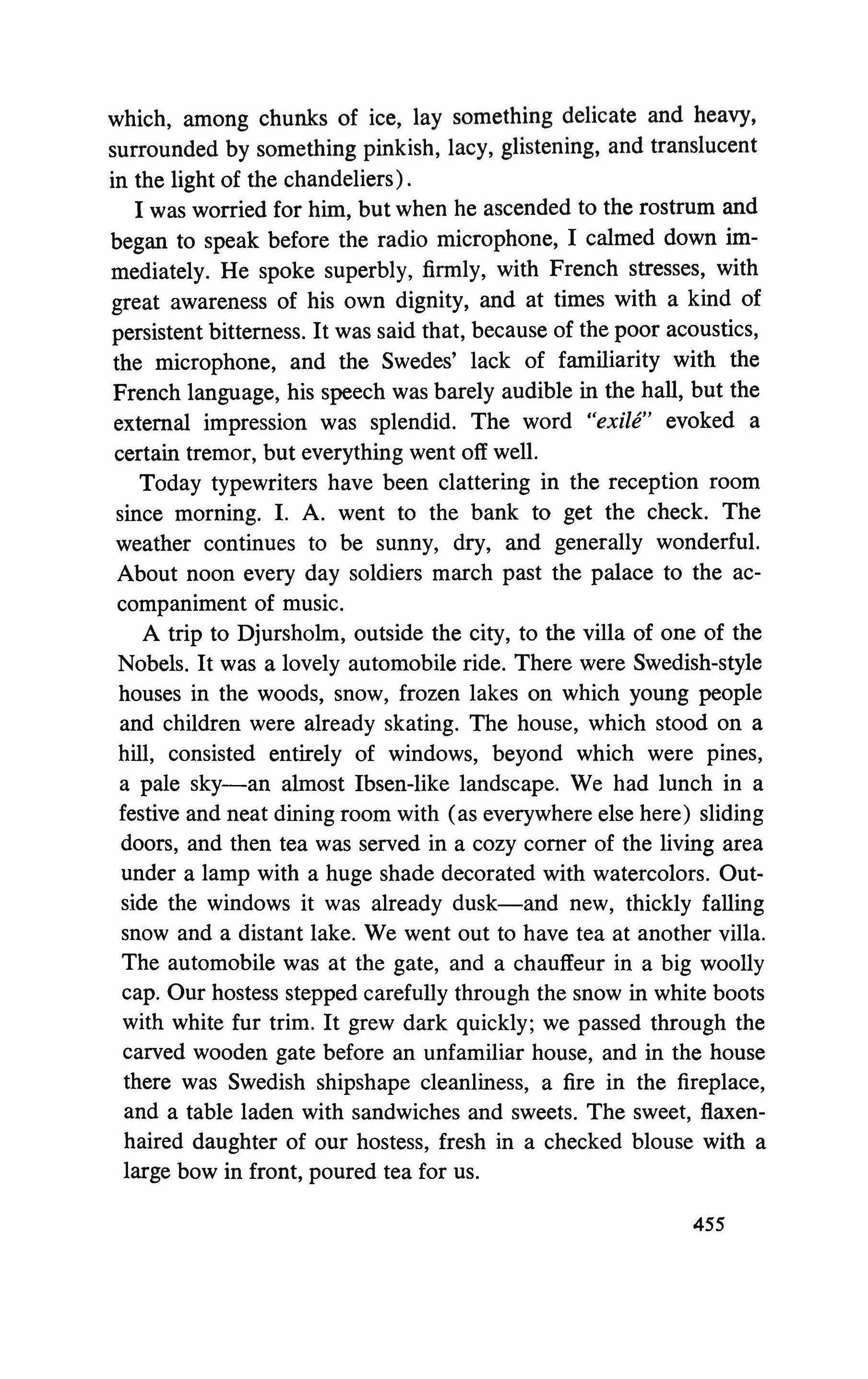
which, among chunks of ice, lay something delicate and heavy, surrounded by something pinkish, lacy, glistening, and translucent in the light of the chandeliers)
I was worried for him, but when he ascended to the rostrum and began to speak before the radio microphone, I calmed down immediately. He spoke superbly, firmly, with French stresses, with great awareness of his own dignity, and at times with a kind of persistent bitterness. It was said that, because of the poor acoustics, the microphone, and the Swedes' lack of familiarity with the French language, his speech was barely audible in the hall, but the external impression was splendid. The word "exile" evoked a certain tremor, but everything went off well.
Today typewriters have been clattering in the reception room since morning. I. A. went to the bank to get the check. The weather continues to be sunny, dry, and generally wonderful. About noon every day soldiers march past the palace to the accompaniment of music.
A trip to Djursholm, outside the city, to the villa of one of the Nobels. It was a lovely automobile ride. There were Swedish-style houses in the woods, snow, frozen lakes on which young people and children were already skating. The house, which stood on a hill, consisted entirely of windows, beyond which were pines, a pale sky-an almost Ibsen-like landscape. We had lunch in a festive and neat dining room with (as everywhere else here) sliding doors, and then tea was served in a cozy comer of the living area under a lamp with a huge shade decorated with watercolors. Outside the windows it was already dusk-and new, thickly falling snow and a distant lake. We went out to have tea at another villa. The automobile was at the gate, and a chauffeur in a big woolly cap. Our hostess stepped carefully through the snow in white boots with white fur trim. It grew dark quickly; we passed through the carved wooden gate before an unfamiliar house, and in the house there was Swedish shipshape cleanliness, a fire in the fireplace, and a table laden with sandwiches and sweets. The sweet, fiaxenhaired daughter of our hostess, fresh in a checked blouse with a large bow in front, poured tea for us.
455

At the marketplace this morning: fish, apples, flowers in glass boxes making one think of aquariums, wrapped from the cold in newspapers and warmed by kerosene lamps. There was a great number of wild ducks on the unfrozen spots in the canal by the bridges. We walked for a long time in the old city, which seemed to me like Gogol's Petersburg, with yellow buildings and street lamps on the walls. The cold of the snow underfoot made itself felt even through overshoes. How unaccustomed to it we have become!
December 18
I am in the salon of the ferry carrying us across to the German shore. Again it is quiet, grey, with the vibration of the engine underfoot and throughout one's body. I went walking on the spar deck: fresh air, gulls, The night was rather unpleasant, as nights on trains often are, and through my sleep came those strange, triple, glassy sounds which reached me through that snowy night on the last crossing before Stockholm. It seemed to me that they were some kind of warning signals. How excited I was then by that new country which I was to see. Alas! I saw it from the window of an automobile and did not really have time to enjoy it, for enjoying means to walk, look, listen, feel deeply and fully, and when was there time for all that? Dinners, dinners, formal teas, luncheons, stiffness, tension for days on end.
Yesterday Chessin showed us the city: in two automobiles we toured the best quarters of Stockholm and the local Bois de Boulogne. Real snow lay there. On the fiords people were skating, and the sky between the firs, oaks, and birches was amazingly soft, of a liquid, delicate blue. There were houses shingled in the local style, somber, dark red, some with pillars resembling the Russian style. How I would have liked to feel all that more completely, to live for a while in its midst!
We lunched in an old cellar-tavern in the old city, the "Golden World." There were candles in the windows, a Christmas tree at the end of the long, narrow hall, birch logs burning upright in the fireplace. Women in creamy rose-colored headpieces waited on 456
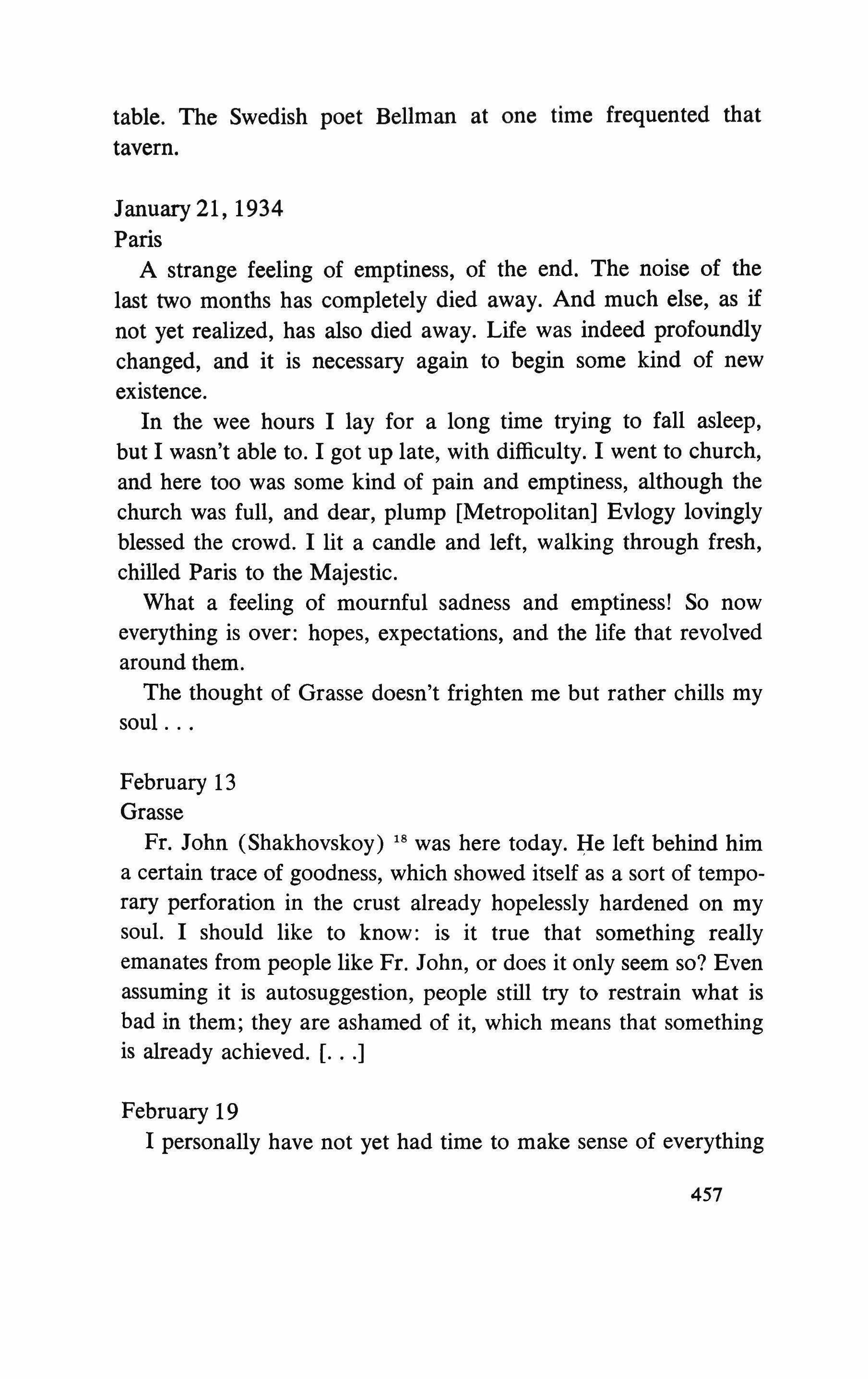
table. The Swedish poet Bellman at one time frequented that tavern.
January 21, 1934
Paris
A strange feeling of emptiness, of the end. The noise of the last two months has completely died away. And much else, as if not yet realized, has also died away. Life was indeed profoundly changed, and it is necessary again to begin some kind of new existence.
In the wee hours I lay for a long time trying to fall asleep, but I wasn't able to. I got up late, with difficulty. I went to church, and here too was some kind of pain and emptiness, although the church was full, and dear, plump [Metropolitan] Evlogy lovingly blessed the crowd. I lit a candle and left, walking through fresh, chilled Paris to the Majestic.
What a feeling of mournful sadness and emptiness! So now everything is over: hopes, expectations, and the life that revolved around them.
The thought of Grasse doesn't frighten me but rather chills my soul
February 13 Grasse
Fr. John (Shakhovskoy) 18 was here today. He left behind him a certain trace of goodness, which showed itself as a sort of temporary perforation in the crust already hopelessly hardened on my soul. I should like to know: is it true that something really emanates from people like Fr. John, or does it only seem so? Even assuming it is autosuggestion, people still try to restrain what is bad in them; they are ashamed of it, which means that something is already achieved. [ ]
February 19
I personally have not yet had time to make sense of everything
457

that has happened in these three months. Thus, from time to time some face or other that I had not thought of for all this while appears before me, or a place, or the atmosphere of some particular moment. To my surprise, I have spoken little of this even with I. A., although obviously for him it is as pleasant to remember all that happened as it was unpleasant for him to live through it. Going to Nice not long ago, he took a taxi and stopped at the Hotel Angleterre-to check in with his "old man," as he now calls the King of Sweden. Yet clearly he got little enjoyment from his brief fame in Sweden, 1� and indeed, it all passed with such stunning speed that it seems as if it were all a dream. And all the more so, since we live as we did before, and conversations go on as before about how money is scarce and we have to economize.
When I now look back on and remember these three months, I see that I. A. in reality received the prize all alone, that he somehow instantly withdrew into himself as soon as the telegram confirmed the message of the garbled voices on the telephone from Stockholm. Then, on some pretext, he left the house, went to the cathedral, walked for a long while in the garden of Montfleury, and, in his own words, adopted a "severe" attitude toward what was happening. Because of that he immediately became "severe" toward us, too, although inwardly he was, as he said, radiant and joyful.
But after having left for Paris, he did not retain that radiance. Those who met him there carried him off from the station to lunch in one of the most expensive Russian restaurants, and afterward, for about two weeks, bedlam continued. When we arrived, he was beside himself, perceiving nothing clearly and having wrong reactions to everything. On the journey he came to himself briefly. He reminded me of his former self when, standing on the rear platform of the Nord-Express, we looked at the snow of the receding track and talked of what had been and what would be. In Hamburg he lay the whole day in bed, sleeping off his Parisian fatigue. In Stockholm he behaved like an enfant terrible the entire time except in company, at banquets and in drawing rooms, where he was charming and irresistible, according to general
458
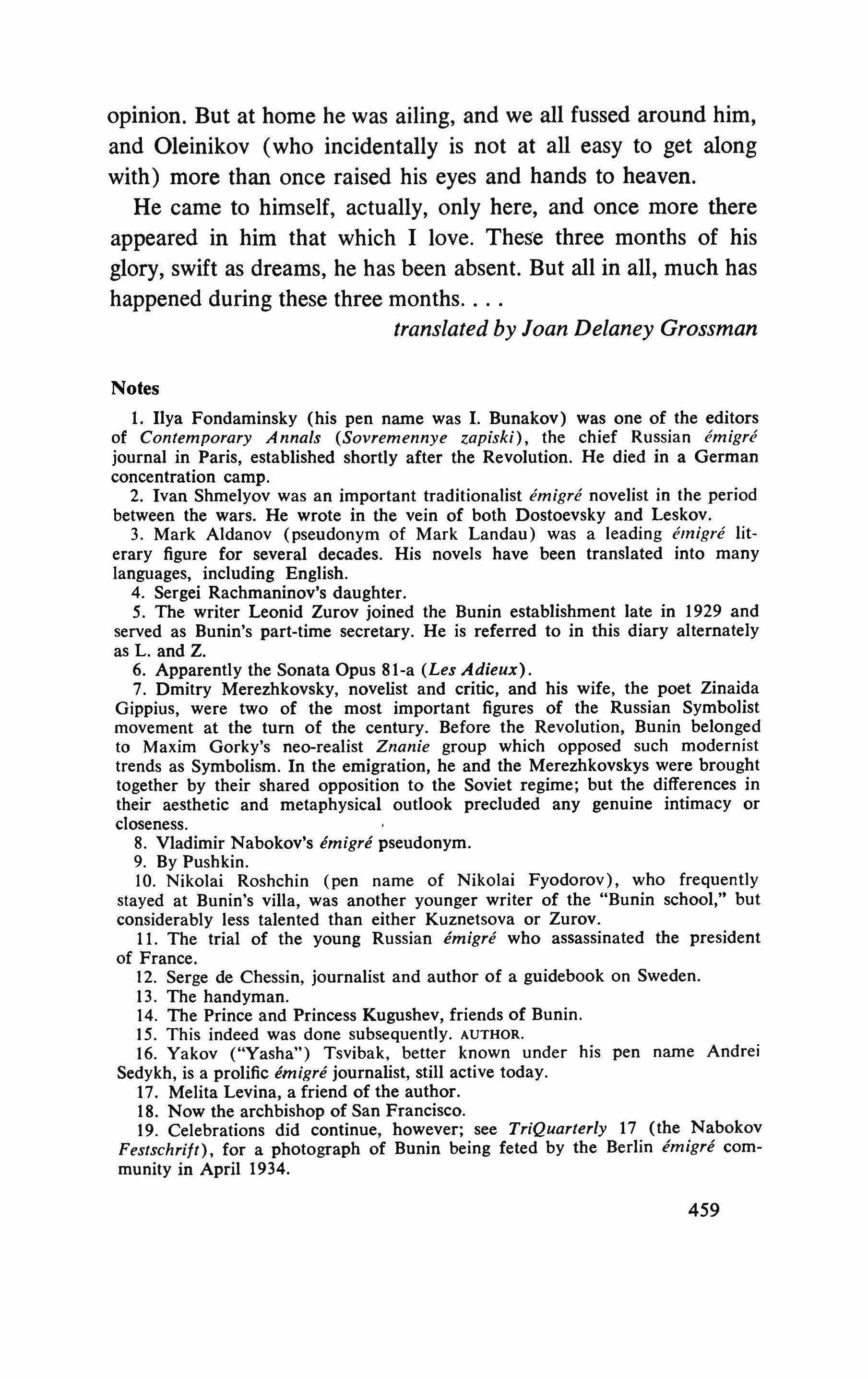
opinion. But at home he was ailing, and we all fussed around him, and Oleinikov (who incidentally is not at all easy to get along with) more than once raised his eyes and hands to heaven. He came to himself, actually, only here, and once more there appeared in him that which I love. These three months of his glory, swift as dreams, he has been absent. But all in all, much has happened during these three months translated by Joan Delaney Grossman
Notes
1. Ilya Fondaminsky (his pen name was I. Bunakov) was one of the editors of Contemporary Annals (Sovremennye zapiski), the chief Russian emigre journal in Paris, established shortly after the Revolution. He died in a German concentration camp.
2. Ivan Shmelyov was an important traditionalist emigre novelist in the period between the wars. He wrote in the vein of both Dostoevsky and Leskov.
3. Mark Aldanov (pseudonym of Mark Landau) was a leading emigre literary figure for several decades. His novels have been translated into many languages, including English.
4. Sergei Rachmaninov's daughter.
5. The writer Leonid Zurov joined the Bunin establishment late in 1929 and served as Bunin's part-time secretary. He is referred to in this diary alternately as L. and Z.
6. Apparently the Sonata Opus 81-a tLes Adieux).
7. Dmitry Merezhkovsky, novelist and critic, and his wife, the poet Zinaida Gippius, were two of the most important figures of the Russian Symbolist movement at the turn of the century. Before the Revolution, Bunin belonged to Maxim Gorky's neo-realist Znanie group which opposed such modernist trends as Symbolism. In the emigration, he and the Merezhkovskys were brought together by their shared opposition to the Soviet regime; but the differences in their aesthetic and metaphysical outlook precluded any genuine intimacy or closeness.
8. Vladimir Nabokov's emigre pseudonym.
9. By Pushkin.
10. Nikolai Roshchin (pen name of Nikolai Fyodorov), who frequently stayed at Bunin's villa, was another younger writer of the "Bunin school," but considerably less talented than either Kuznetsova or Zurov.
11. The trial of the young Russian emigre who assassinated the president of France.
12. Serge de Chessin, journalist and author of a guidebook on Sweden.
13. The handyman.
14. The Prince and Princess Kugushev, friends of Bunin.
15. This indeed was done subsequently. AUTHOR.
16. Yakov ("Yasha") Tsvibak, better known under his pen name Andrei Sedykh, is a prolific emigre journalist, still active today.
17. Melita Levina, a friend of the author.
18. Now the archbishop of San Francisco.
19. Celebrations did continue, however; see TriQuarterly 17 (the Nabokov Festschrift), for a photograph of Bunin being feted by the Berlin emigre community in April 1934.
459
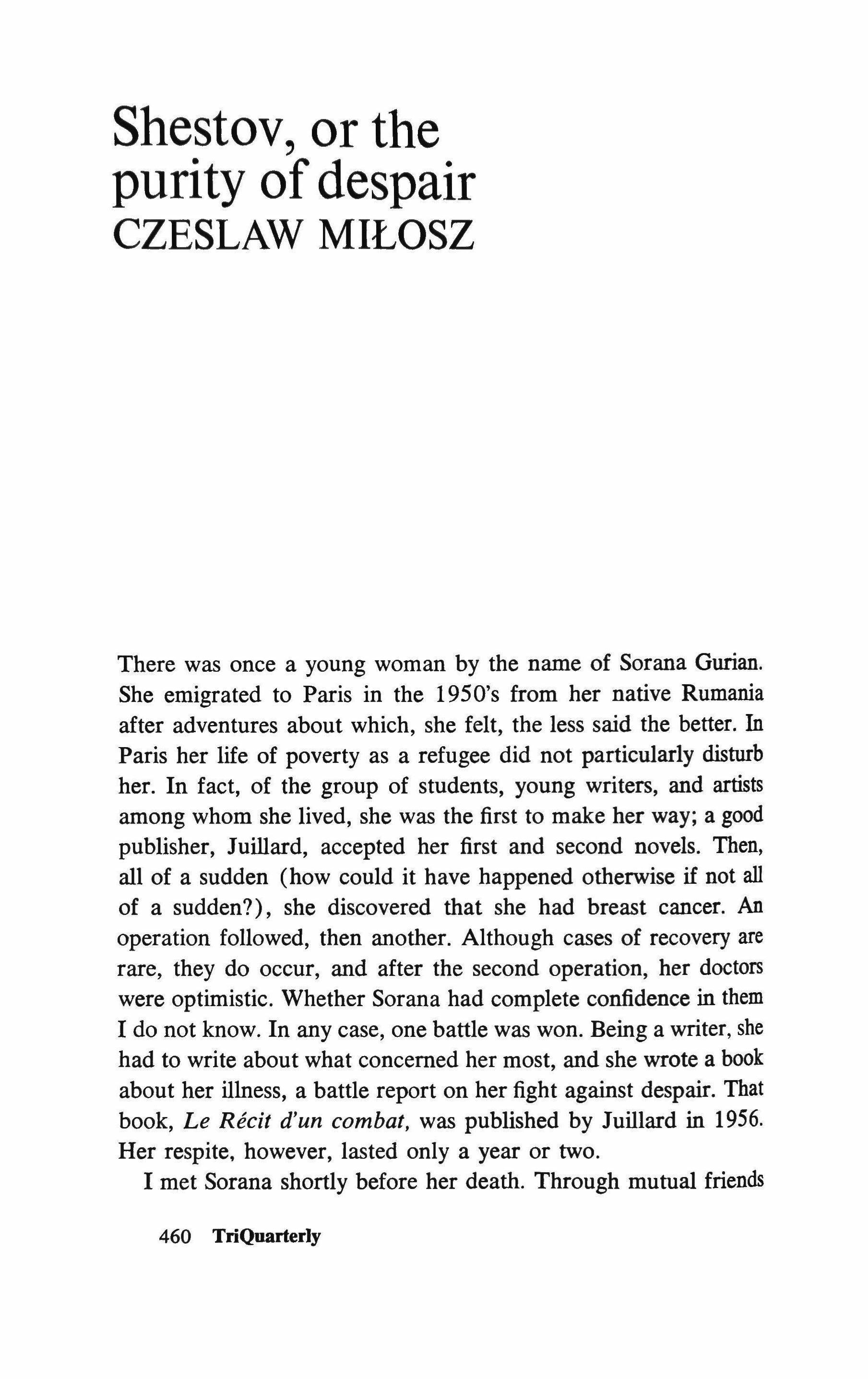
Shestov, or the purity ofdespair CZESLAW
MILOSZ
There was once a young woman by the name of Sorana Gurian. She emigrated to Paris in the 1950's from her native Rumania after adventures about which, she felt, the less said the better. In Paris her life of poverty as a refugee did not particularly disturb her. In fact, of the group of students, young writers, and artists among whom she lived, she was the first to make her way; a good publisher, Juillard, accepted her first and second novels. Then, all of a sudden (how could it have happened otherwise if not all of a sudden?), she discovered that she had breast cancer. An operation followed, then another. Although cases of recovery are rare, they do occur, and after the second operation, her doctors were optimistic. Whether Sorana had complete confidence in them I do not know. In any case, one battle was won. Being a writer, she had to write about what concerned her most, and she wrote a book about her illness, a battle report on her fight against despair. That book, Le Recit d'un combat, was published by Juillard in 1956. Her respite. however, lasted only a year or two.
I met Sorana shortly before her death. Through mutual friends
460 TriQuarterJy
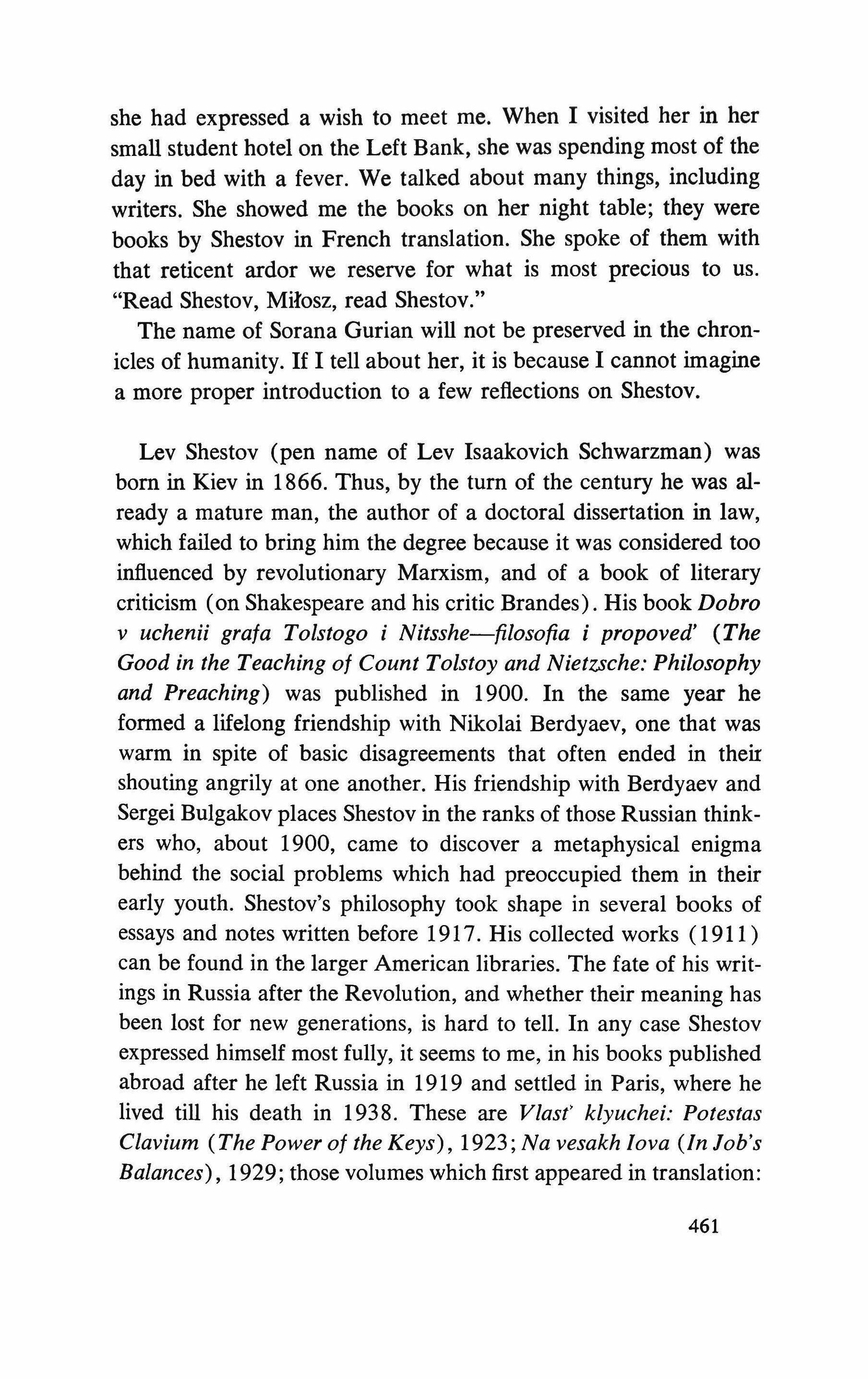
she had expressed a wish to meet me. When I visited her in her small student hotel on the Left Bank, she was spending most of the day in bed with a fever. We talked about many things, including writers. She showed me the books on her night table; they were books by Shestov in French translation. She spoke of them with that reticent ardor we reserve for what is most precious to us.
"Read Shestov, Milosz, read Shestov."
The name of Sorana Gurian will not be preserved in the chronicles of humanity. If I tell about her, it is because I cannot imagine a more proper introduction to a few reflections on Shestov.
Lev Shestov (pen name of Lev Isaakovich Schwarzman) was born in Kiev in 1866. Thus, by the tum of the century he was already a mature man, the author of a doctoral dissertation in law, which failed to bring him the degree because it was considered too influenced by revolutionary Marxism, and of a book of literary criticism (on Shakespeare and his critic Brandes). His book Dobro v uchenii graia Toistogo i Nitsshe-filosofia i propoved' (The Good in the Teaching of Count Tolstoy and Nietzsche: Philosophy and Preaching) was published in 1900. In the same year he formed a lifelong friendship with Nikolai Berdyaev, one that was warm in spite of basic disagreements that often ended in their shouting angrily at one another. His friendship with Berdyaev and Sergei Bulgakov places Shestov in the ranks of those Russian thinkers who, about 1900, came to discover a metaphysical enigma behind the social problems which had preoccupied them in their early youth. Shestov's philosophy took shape in several books of essays and notes written before 1917. His collected works (1911) can be found in the larger American libraries. The fate of his writings in Russia after the Revolution, and whether their meaning has been lost for new generations, is hard to tell. In any case Shestov expressed himself most fully, it seems to me, in his books published abroad after he left Russia in 1919 and settled in Paris, where he lived till his death in 1938. These are Vlast' klyuchei: Potestas Clavium (The Power of the Keys), 1923; Na vesakh lova (In Job's Balances), 1929; those volumes which first appeared in translation: 461

Kierkegaard et la phllosophie existentielle, 1938 (Russian edition, 1939); Athenes et Ierusalem: un essai de philosophie religieuse, 1938 (Russian edition, 1951); and those posthumously published in book form: Tol'ko veroi: Sola Fide (By Faith Alone), 1966, and Umozrenie i otkrovenie: religioznaya filosofia Vladimira Solovieva i drugie stat'i (Speculation and Revelation: The Religious Philosophy of V. Soloviev and Other Essays), 1964.1
Shestov has been translated into many languages. Yet in his lifetime he never attained the fame surrounding the name of his friend Berdyaev. He remained a writer for the few, and if by disciples we mean those who "sit at the feet of the master," he had only one, the French poet Benjamine Fondane, a Rumanian Jew later killed by the Nazis. But Shestov was an active force in European letters, and his influence reached deeper than one might surmise from the number of copies of his works sold. Though the quarrel about existentialism that raged in Paris after 1945 seems to us today somewhat stale, it had serious consequences. In The Myth of Sisyphus-a youthful and not very good book, but most typical of that period-Albert Camus considers Kierkegaard, Shestov, Heidegger, Jaspers, and Husserl to be the philosophers most important to the new "man of the absurd." For the moment it is enough to say that, though Shestov has often been compared with Kierkegaard, he discovered the Danish author only late in his life and that his close personal friendship with Husserl consisted of philosophical opposition-which did not prevent him from calling Husser! his second master after Dostoevsky.
I am not going to pretend that I have "read through" Shestov. If one is asked whether one has read Pascal, the answer should always be in the negative, no matter how many times one has looked at his pages. In the case of Shestov, however, there are obstacles other than density. His oeuvre is, as Camus defined it, of "admirable monotony." Shestov hammers at one theme again and again, and after a while we learn that it will emerge, inevitably, in every essay; we also know that when the theme emerges, his voice will change in tone and sustain with its usual sarcasm
462

the inevitable conclusion. His voice when he enters an argument is that of a priest angry at the sight of holy vessels being desecrated. Convinced that he will not be applauded because his message seems bizarre to his contemporaries, he does nothing to diminish our resistance, which is provoked most of all by what Levy-Bruhl, in a polemic with him, called "hogging the covers." Shestov was often reproached for finding in Shakespeare, in Dostoevsky, and in Nietzsche much that is not there at all, and for too freely interpreting the opinions of his antagonists (numerous, for these included practically all the philosophers of the past three thousand years). He dismissed the reproach with a laugh: he was not such a genius, he would say, that he could create so many geniuses anew. Yet the reproach is not without validity.
He knew he was not understood, but probably he did not want to be overly clear. The difficulty in assimilating him is not caused by any deviousness on his part or by any levels of ironic meaning or aphoristic conciseness. He always develops a logical argument in well-balanced sentences which, especially in their original Russian, captivate the reader with their scornful vigor. Shestov is probably one of the most readable philosophic essayists of the century. The trouble lies in his opposition to those who separate the propositions of a given man from his personal tragedy-to those who, for instance, refuse to speak of Kierkegaard's sexual impotence or of Nietzsche's incurable disease. My guess is that Shestov, too, had his own drama, that of lacking the talent to become a poet, i.e. to approach the mystery of existence more directly than through mere concepts. And although he does not mix genres, or write "poetic prose," one feels that at a given moment he falls silent and leaves much unsaid because the border of the communicable has been crossed. That is why in self-defense he sometimes quotes Pascal: "Qu'on ne nous reproehe done plus Ie manque de clone, puisque nous en faisons profession"-"Then let people not blame us any more for our lack of clarity, since we practice this deliberately."
To associate Shestov with a transitory phase of existentialism would be to diminish his stature. Few writers of any time could
463
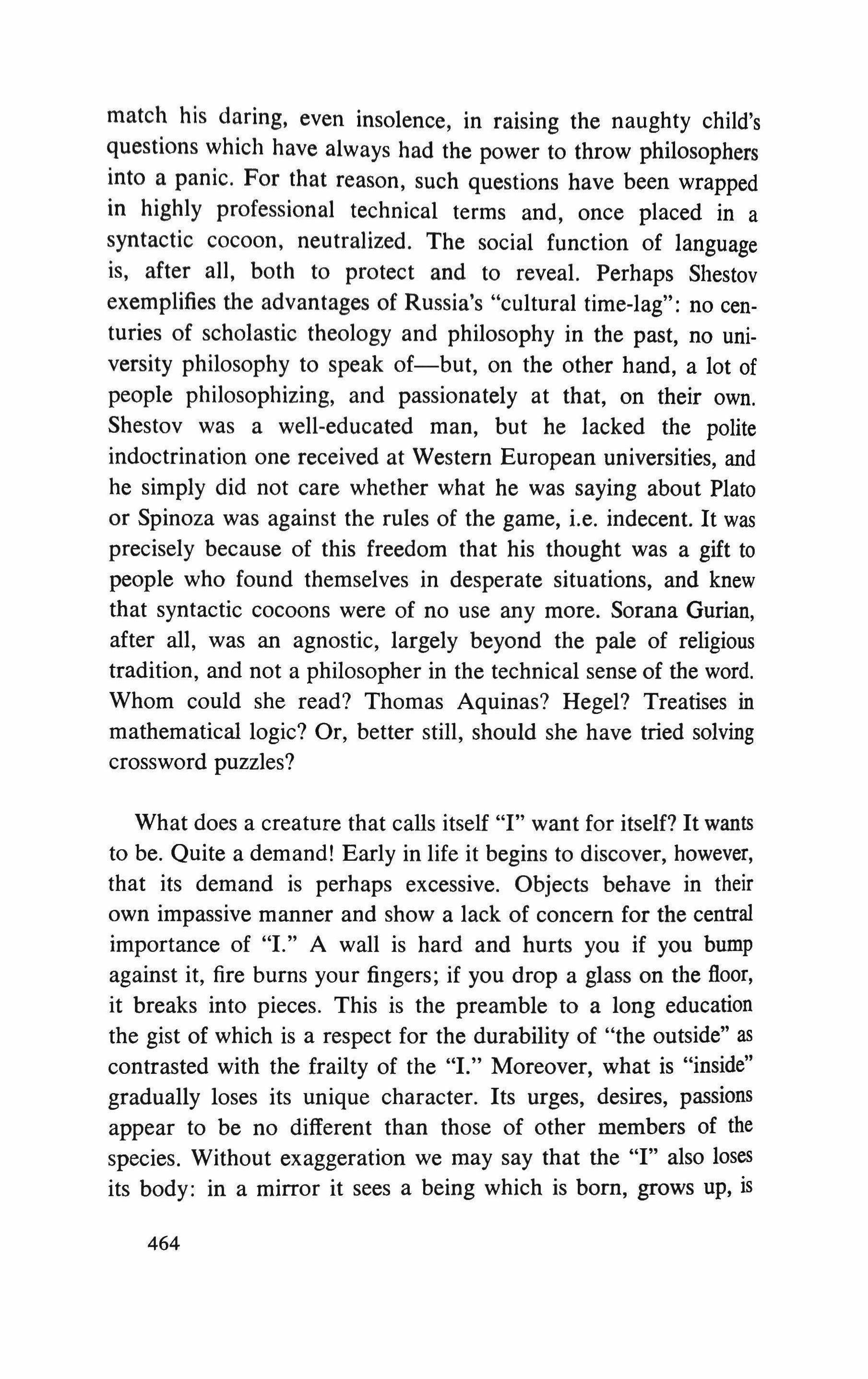
match his daring, even insolence, in raising the naughty child's questions which have always had the power to throw philosophers into a panic. For that reason, such questions have been wrapped in highly professional technical terms and, once placed in a syntactic cocoon, neutralized. The social function of language is, after all, both to protect and to reveal. Perhaps Shestov exemplifies the advantages of Russia's "cultural time-lag": no centuries of scholastic theology and philosophy in the past, no university philosophy to speak of-but, on the other hand, a lot of people philosophizing, and passionately at that, on their own. Shestov was a well-educated man, but he lacked the polite indoctrination one received at Western European universities, and he simply did not care whether what he was saying about Plato or Spinoza was against the rules of the game, i.e. indecent. It was precisely because of this freedom that his thought was a gift to people who found themselves in desperate situations, and knew that syntactic cocoons were of no use any more. Sorana Gurian, after all, was an agnostic, largely beyond the pale of religious tradition, and not a philosopher in the technical sense of the word. Whom could she read? Thomas Aquinas? Hegel? Treatises in mathematical logic? Or, better still, should she have tried solving crossword puzzles?
What does a creature that calls itself "I" want for itself? It wants to be. Quite a demand! Early in life it begins to discover, however, that its demand is perhaps excessive. Objects behave in their own impassive manner and show a lack of concern for the central importance of "I." A wall is hard and hurts you if you bump against it, fire burns your fingers; if you drop a glass on the floor, it breaks into pieces. This is the preamble to a long education the gist of which is a respect for the durability of "the outside" as contrasted with the frailty of the "I." Moreover, what is "inside" gradually loses its unique character. Its urges, desires, passions appear to be no different than those of other members of the species. Without exaggeration we may say that the "I" also loses its body: in a mirror it sees a being which is born, grows up, is
464

subject to the destructive action of time, and must die. If a doctor tells you that you are dying of a certain disease, then you are just another case, i.e. chance is a statistical regularity; it is just your bad luck that you are among such-and-such a number of cases occurring every year.
The "I" has to recognize that it is confronted with a world which follows its own laws, a world whose name is Necessity. This, according to Shestov, is precisely what lies at the foundations of traditional philosophy-first Greek, then every philosophy faithful to the Greeks. Only the necessary, the general, and the always valid will merit investigation and reflection. The contingent, the particular, and the momentary are spoilers of unity-a teaching that dates back to Anaximander. And later Greek thinkers exalted the all-embracing Oneness, and represented individual existence as a crack in the perfectly smooth surface of the One, a flaw for which the individual had to pay with his death. From a Shestovian perspective, Greek science and morality both follow the same path. The sum of the angles in a triangle equals two right angles; the general, eternal truth reigns high above breeding and dying mortals -just as eternal good does not change whether or not there is a living man to aspire to it.
The "I" is invaded by Necessity from the inside as well, but always feels it as an alien force. Nevertheless the "I" must accept the inevitable order of the world. The wisdom of centuries consists precisely in advising acquiescence and resignation. In simple language, "Grin and bear it"; in more sophisticated language, "Fata volentem ducunt, nolentem trahunt"-"The Fates lead the willing man, they drag the unwilling." Stoicism, whose very essence is to curb the shameful pretense of transitory individual existence in the name of universal order (or, if you prefer, Nature), was the final word of Graeco-Roman civilization. But, says Shestov, stoicism has survived under many disguises and is still with us.
Shestov simply refuses to play this game of chess, however, and overturns the table with a kick. For why should the "I" accept "wisdom," which obviously violates its most intense desire? Why respect "the immutable laws"? Whence comes the 465

certainty that what is presumably impossible is really impossible? And is a philosophy preoccupied with ho anthropos, with man in general, of any use to tis anthropos, a certain man who lives only once in space and time? Isn't there something horrible in Spinoza's advice to philosophers: "Non ridere, non fugere, neque detestari, sed intelligere"-"Not to laugh, not to weep, not to hate, but to understand"? On the contrary, says Shestov, a man should shout, scream, laugh, jeer, protest. In the Bible, Job wailed and screamed, to the indignation of his wise friends.
Shestov (and he was not the first, for Rozanov had already made the same suggestion) believed that Dostoevsky's most significant work was Notes from Underground, and considered the major novels that followed as commentaries and attempts to solve the riddle set forth in the Notes. He expressed this opinion in an essay written in 1921 for the hundredth anniversary of Dostoevsky's birth. Shestov believed that the true critique of pure reason was not Kant's achievement, but Dostoevsky'S and in the Notes specifically. He admired Dostoevsky'S philosophical genius without reservation-and accepted as true the disparaging rumors about his personal life, rumors spread mostly by Strakhov. It also suited his purpose to see such characters as the Underground Man, Svidrigailov, Ippolit in The Idiot, Stavrogin, and Ivan Karamazov as Dostoevsky'S true spokesmen, and even, to a large extent, autobiographical portraits; and to dismiss Father Zosima and Alyosha as lubok (cheap block prints). To Shestov peace of mind was suspect, for the earth we live on does not predispose us to it. He loved only those who, like Pascal, "cherchent en gemissant" who "seek while moaning." This approach to Dostoevsky should appeal to those critics who believe the Notes reveal much that this conservative publicist and orthodox Christian tried to stifle in himself. There is, however, one basic difference between Shestov and those who think of Dostoevsky as a humanist, often mentioning the vision of earthly paradise (modeled on Claude Lorrain's painting "Acis and Galatea" in the Dresden gallery) in his later writings. The vision, they believe, is proof that a young Fourierist was still alive in the conservative author of The Diary of a Writer.
466
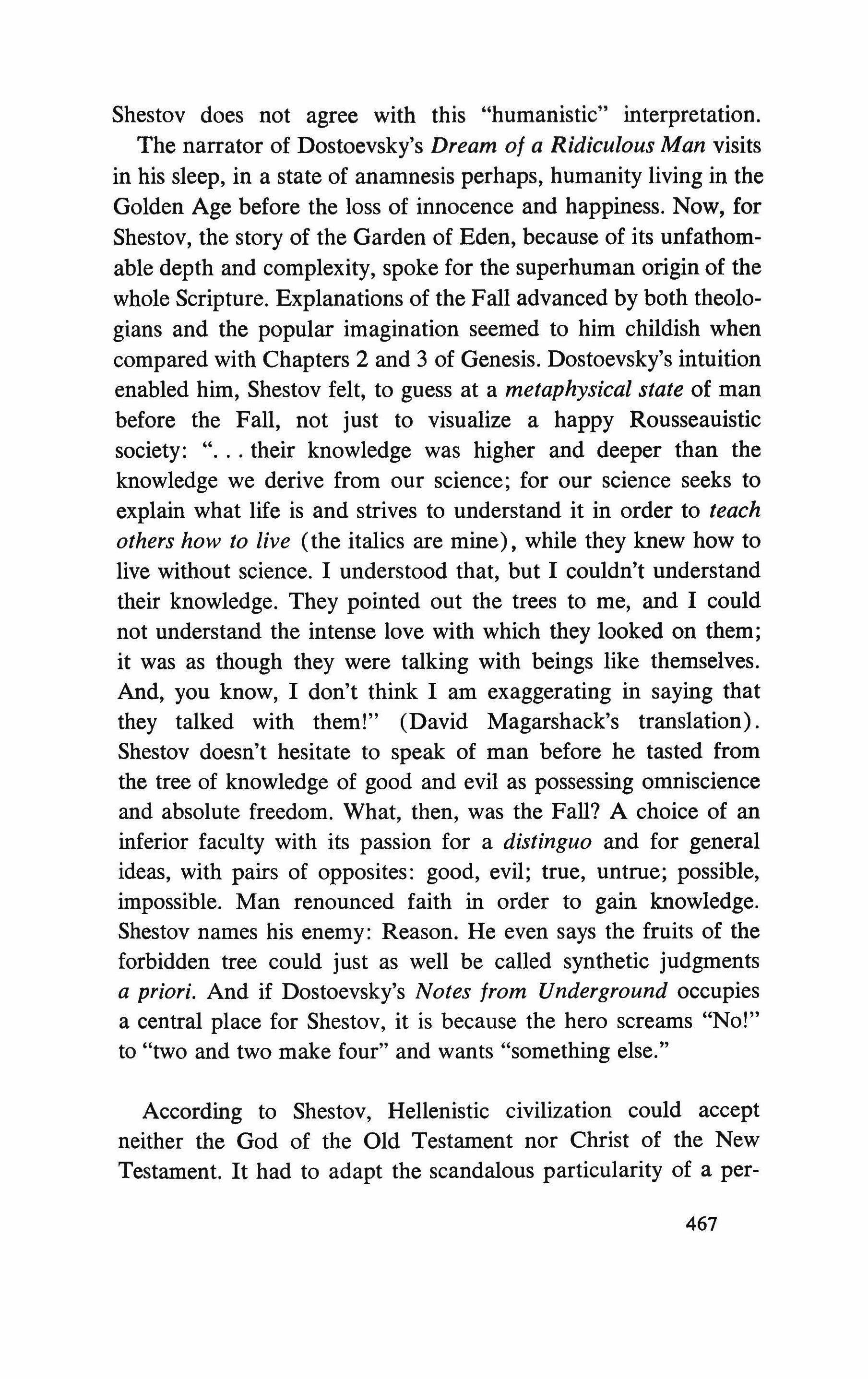
Shestov does not agree with this "humanistic" interpretation. The narrator of Dostoevsky's Dream of a Ridiculous Man visits in his sleep, in a state of anamnesis perhaps, humanity living in the Golden Age before the loss of innocence and happiness. Now, for Shestov, the story of the Garden of Eden, because of its unfathomable depth and complexity, spoke for the superhuman origin of the whole Scripture. Explanations of the Fall advanced by both theologians and the popular imagination seemed to him childish when compared with Chapters 2 and 3 of Genesis. Dostoevsky'S intuition enabled him, Shestov felt, to guess at a metaphysical state of man before the Fall, not just to visualize a happy Rousseauistic society: their knowledge was higher and deeper than the knowledge we derive from our science; for our science seeks to explain what life is and strives to understand it in order to teach others how to live (the italics are mine), while they knew how to live without science. I understood that, but I couldn't understand their knowledge. They pointed out the trees to me, and I could not understand the intense love with which they looked on them; it was as though they were talking with beings like themselves. And, you know, I don't think I am exaggerating in saying that they talked with them!" (David Magarshack's translation). Shestov doesn't hesitate to speak of man before he tasted from the tree of knowledge of good and evil as possessing omniscience and absolute freedom. What, then, was the Fall? A choice of an inferior faculty with its passion for a distinguo and for general ideas, with pairs of opposites: good, evil; true, untrue; possible, impossible. Man renounced faith in order to gain knowledge. Shestov names his enemy: Reason. He even says the fruits of the forbidden tree could just as well be called synthetic judgments a priori. And if Dostoevsky'S Notes from Underground occupies a central place for Shestov, it is because the hero screams "No!" to "two and two make four" and wants "something else."
According to Shestov, Hellenistic civilization could accept neither the God of the Old Testament nor Christ of the New Testament. It had to adapt the scandalous particularity of a per467

sonal God to its general ideas, shaped as they were through speculation. "The good is God," "Love is God"-to such equations the Hellenized citizens of the Roman Empire could give assent. But the equations are nonsensical, says Shestov, for here the abstract is put before the living. He reminds us with relish that Saint Augustine hated the Stoics as much as Dostoevsky hated the liberals; both the Stoics and the liberals recommended a morality of self-sufficing Reason.
The gnosis, when it absorbed Christian elements, was nothing more than an attempt to trim the Scriptures of their "capriciousness," of their anti-generality equated with untruth. The heresy of Marcion in the beginning of the second century, inspired by the gnosis, altogether rejects the Jehovah of the Old Testament as an evil demiurge, because his incomprehensible behavior seems offensive to an enlightened mind. But similar Hellenization of the Scriptures continued throughout the Middle Ages. Where the Scholastics affirmed that God created the universe by making use of some preexisting laws of nature (two and two make four, the principle of contradiction, etc., as eternal principles) they in fact put Necessity (universal laws) above the God of Genesis. They paved the way for the modern attitude that calls religion before the tribunal of Reason. The modern mind, Shestov affirms, is completely under the spell of formulas found in their most perfect form in two representative thinkers: Spinoza and Hegel. The latter said: "In philosophy religion receives its justification. Thinking is the absolute judge before whom the content of religion must justify and explain itself." And the reader who does not share Shestov's belief in the Garden of Eden should be aware of the basic issue; by voicing his disbelief he takes the side of knowledge against faith.
Shestov opposed Jerusalem to Athens in a most radical, uncompromising manner. Those names stood for faith versus reason, revelation versus speculation, the particular versus the general, a cry de profundis versus the ethics of, as Ivan Karamazov said, "accursed good and evil." Shestov liked to quote Tertullian: 468
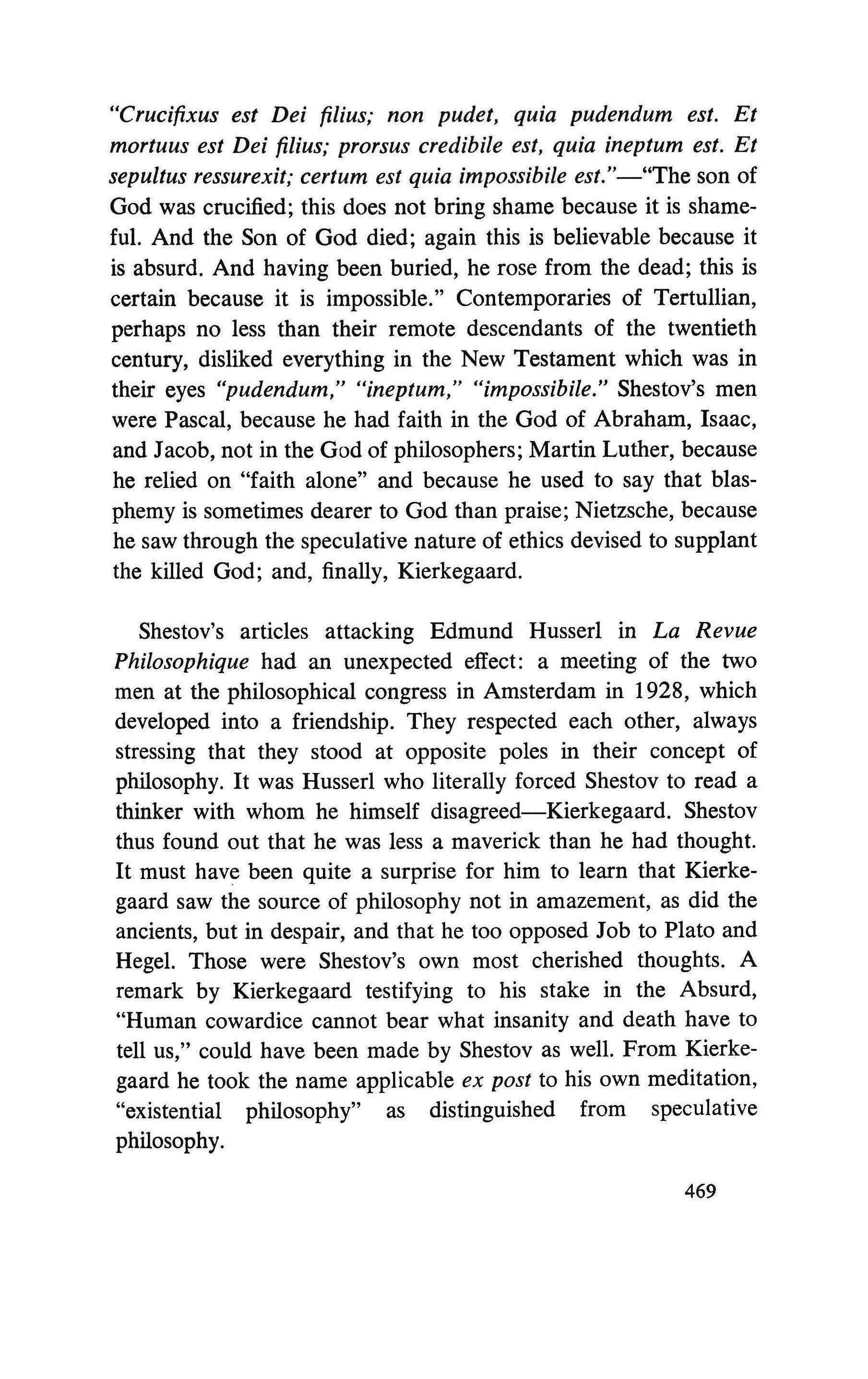
"Crucifixus est Dei filius; non pudet, quia pudendum est. Et mortuus est Dei filius; prorsus credibile est, quia ineptum est. Et sepultus ressurexit; certum est quia impossibile est."-"The son of God was crucified; this does not bring shame because it is shameful. And the Son of God died; again this is believable because it is absurd. And having been buried, he rose from the dead; this is certain because it is impossible." Contemporaries of Tertullian, perhaps no less than their remote descendants of the twentieth century, disliked everything in the New Testament which was in their eyes "pudendum," "ineptum," "impossibile," Shestov's men were Pascal, because he had faith in the God of Abraham, Isaac, and Jacob, not in the God of philosophers; Martin Luther, because he relied on "faith alone" and because he used to say that blasphemy is sometimes dearer to God than praise; Nietzsche, because he saw through the speculative nature of ethics devised to supplant the killed God; and, finally, Kierkegaard.
Shestov's articles attacking Edmund HusserI in La Revue Philosophique had an unexpected effect: a meeting of the two men at the philosophical congress in Amsterdam in 1928, which developed into a friendship. They respected each other, always stressing that they stood at opposite poles in their concept of philosophy. It was HusserI who literally forced Shestov to read a thinker with whom he himself disagreed-Kierkegaard. Shestov thus found out that he was less a maverick than he had thought. It must have been quite a surprise for him to learn that Kierkegaard saw the source of philosophy not in amazement, as did the ancients, but in despair, and that he too opposed Job to Plato and Hegel. Those were Shestov's own most cherished thoughts. A remark by Kierkegaard testifying to his stake in the Absurd, "Human cowardice cannot bear what insanity and death have to tell us," could have been made by Shestov as well. From Kierkegaard he took the name applicable ex post to his own meditation, "existential philosophy" as distinguished from speculative philosophy. 469

No wonder Camus, in The Myth of Sisyphus, when invoking the protagonists of the Absurd and of paradox, mentioned Kierkegaard and Shestov first of all. The similarities, however, between the Parisian existentialism of the 1940's and 1950's on the one hand, and Kierkegaard and Shestov· on the other, are superficial. Camus, it is true, was perhaps no less fascinated than was Shestov with Dostoevsky's Notes from Underground, even to the extent that his last book, The Fall, is essentially the Notes rewritten. Yet Shestov, convinced as he was that the Underground Man deserved salvation because of his longing after "something else," would not leave him a victim of his desperate, crazy, solitary ego. Certainly he was skeptical of the alternatives proposed by Dostoevsky-the peasant pilgrim Makar Dolgoruky, Father Zosima, Alyosha. Nevertheless, he was a man of the Scriptures. He would probably have accepted gladly the epithet Plato often hurled at his opponents in a dispute: Mysologos-a hater of reason -but only to stress the absurd of the human condition, which is masked by Reason. There was a way out: "The good is not God. We must seek that which is higher than the good. We must seek God." Which means that the despair that seizes us when we are faced with the Absurd leads us beyond good and evil to an act of faith. There is nothing impossible for God and for those who truly believe in him. An absurd affirmation: for who ever saw a mountain moved by prayer? But do we have a choice? The fruits of the tree of knowledge bring only death. It should be noted that Shestov was not a preacher; he tried only to present a dilemma in all its acuteness. Most definitely he was neither a moralist nor a theologian.
For Camus, despair was not a point of departure but a permanent state of existence not excluding happiness. He wanted us to believe that even Sisyphus could be happy. He was drawn thus by the French moralistic tradition toward some sort of accommodation with a world deprived of meaning. Perhaps it sounds strange, but his atheist's existentialism is less radical than Shestov's precisely because of that moralistic (Greek, after all) bent. Shestov's God seemed to Camus capricious, wicked, immoral and as such was
470

rejected. "His (God's) proof is in his inhumanity." For the humanist this was unacceptable. In The Myth of Sisyphus Camus defines the difference between his Parisian contemporaries' position and that of Shestov: "For Shestov reason is useless, but there is something beyond reason. For the absurd mind, reason is useless and there is nothing beyond reason." Camus preserved that complete bereavement till the end. In The Fall, his last book, the narrator and hero settles down in a bar near the port of Amsterdam, in an underground, private hell, where there is no aspiration and no promise.
Either-or. Shestov's categorical juxtaposition of faith and reason reminds us of the theory of two parallel truths, elaborated in the thirteenth century; but, in fact, he rejects the truth of reason completely; 2 the world of the "laws of Nature" is, as he says, a nightmare from which we should waken. His criticism is directed primarily against those who eschew the fundamental "either-or" and who, even though they pronounce themselves for faith, imperceptibly move to the side of their adversary. Thus the case of all devisers of theodicy: since the world created by God is not a very happy place, something should be done to lift from God the responsibility for evil-and thence the attempts at a "justification of God" accomplished by means of human reason. This aspect of Shestov's struggle is well represented by his essays on Vladimir Soloviev and Nikolai Berdyaev in his posthumous volume Umozrenie i otkrovenie. Let us concede that his severe, unornamented style makes Soloviev sound, by contrast, verbose, if not woolly, and Berdyaev, frequently, rhetorical. But Shestov argues well. Without detracting from Soloviev's imposing stature, he accuses him of nothing less than an unintentional falsity. He placed on his banner a philosophy of Revelation, but practiced, like Hegel, a dialectical philosophy." "The idea of a 'philosophy of Revelation' seduced Soloviev as if it were itself the Revelation and, without his noticing it, took the place of the Revelation, just as for Hegel the rational took the place of the real." What happened to Soloviev had happened before; when a mind intro-
471
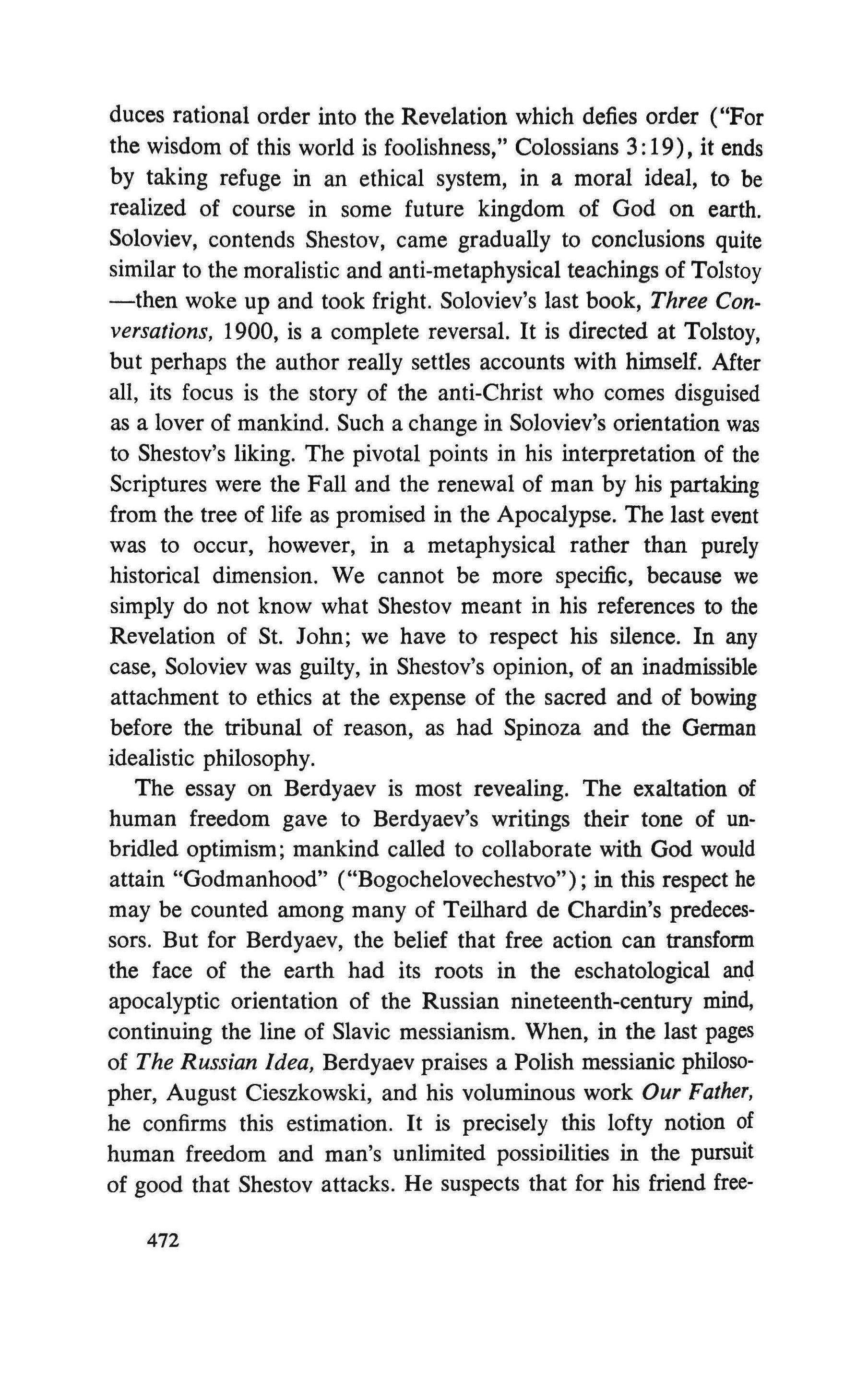
duces rational order into the Revelation which defies order ("For the wisdom of this world is foolishness," Colossians 3: 19), it ends by taking refuge in an ethical system, in a moral ideal, to be realized of course in some future kingdom of God on earth. Soloviev, contends Shestov, came gradually to conclusions quite similar to the moralistic and anti-metaphysical teachings of Tolstoy -then woke up and took fright. Soloviev's last book, Three Conversations, 1900, is a complete reversal. It is directed at Tolstoy, but perhaps the author really settles accounts with himself. After all, its focus is the story of the anti-Christ who comes disguised as a lover of mankind. Such a change in Soloviev's orientation was to Shestov's liking. The pivotal points in his interpretation of the Scriptures were the Fall and the renewal of man by his partaking from the tree of life as promised in the Apocalypse. The last event was to occur, however, in a metaphysical rather than purely historical dimension. We cannot be more specific, because we simply do not know what Shestov meant in his references to the Revelation of St. John; we have to respect his silence. In any case, Soloviev was guilty, in Shestov's opinion, of an inadmissible attachment to ethics at the expense of the sacred and of bowing before the tribunal of reason, as had Spinoza and the German idealistic philosophy.
The essay on Berdyaev is most revealing. The exaltation of human freedom gave to Berdyaev's writings their tone of unbridled optimism; mankind called to collaborate with God would attain "Godmanhood" ("Bogochelovechestvo"); in this respect he may be counted among many of Teilhard de Chardin's predecessors. But for Berdyaev, the belief that free action can transform the face of the earth had its roots in the eschatological and apocalyptic orientation of the Russian nineteenth-century mind, continuing the line of Slavic messianism. When, in the last pages of The Russian Idea, Berdyaev praises a Polish messianic philosopher, August Cieszkowski, and his voluminous work Our Father, he confirms this estimation. It is precisely this lofty notion of human freedom and man's unlimited possioilities in the pursuit of good that Shestov attacks. He suspects that for his friend free-
472

dom is an expedient means of explaining away the horror of existence. Evil in the world results from man's freedom; man could only have been created free-thus Berdyaev does not go beyond the Christian doctrine. Yes, but his teachers are German mysticsMeister Eckhart, Jakob Boehme, Angelus Silesius-who affirm that a sort of dialectical movement preceded the creation of the universe. The ideas of these mystics were to inspire the whole of German idealistic philosophy which Shestov belabors now in the persons of its precursors. According to the German mystics, man's freedom, i.e. the possibility of evil, which has existed since before the beginning of time, is due to the dark force of the preexisting Naught that limits the power of God. Indeed, above God the mystics put Deitas, an eternal law. But this is the gnosis!, exclaims Shestov. In striving to equate the good with God, Berdyaev made God depend on man in his struggle against a dark, preexisting nothingness to such an extent that man, absolutely necessary to God, began to play the central role. Why should "Godmanhood" succeed where God fails? Why not transform "Godmanhood" into "Mangodhood"? And that, Shestov feels, is what Berdyaev does in fact. His philosophy of freedom, presumably an existential philosophy, deals with an illusory, exaggerated freedom of the Pelagians and is not existential; the latter is a philosophy de profundis recognizable by its refusal to explain away suffering and death, no matter which "dynamic process" is supposed to achieve the victory of the good. When Ivan Karamazov says that the tear of a child outweighs all the possible harmony of the universe, he cannot and should not be answered with historical dynamism.
Perhaps Shestov in his polemic with Berdyaev "pulls the blanket to his side" a little. Yet if we compare his essay on Berdyaev with his essay on Hussed-his last, written in 1938 to honor the memory of his friend who had just died-we must conclude that, contrary to appearances, Shestov probably had more in common with Husserl than with Berdyaev-even though in the great "either-or" Husserl opted for science; i.e. he intended Reason to be an instrument for discovering absolute, eternal truths untouched by relativism, truths valid for gods, angels, and men, on earth and 473
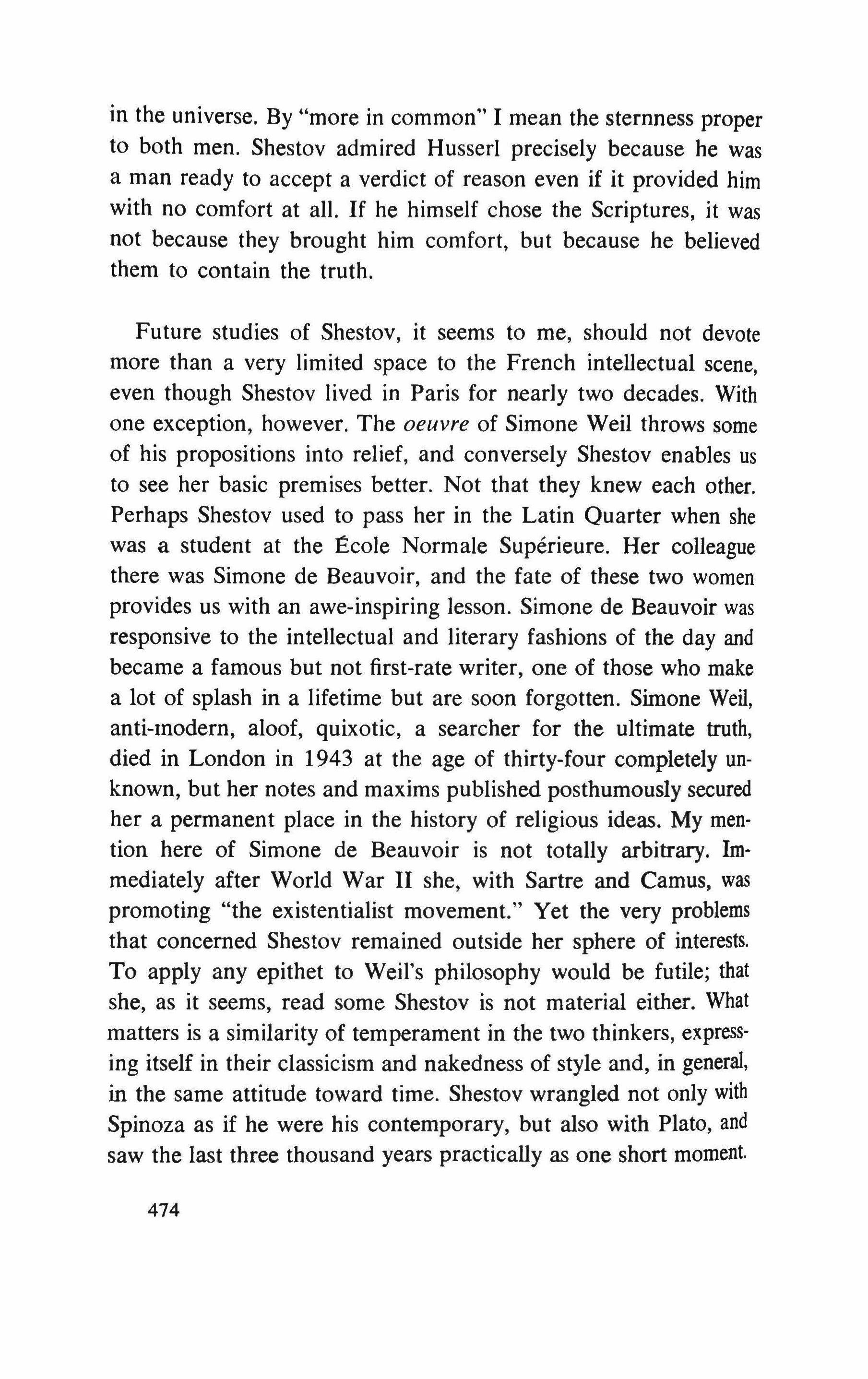
in the universe. By "more in common" I mean the sternness proper to both men. Shestov admired Husserl precisely because he was a man ready to accept a verdict of reason even if it provided him with no comfort at all. If he himself chose the Scriptures, it was not because they brought him comfort, but because he believed them to contain the truth.
Future studies of Shestov, it seems to me, should not devote more than a very limited space to the French intellectual scene, even though Shestov lived in Paris for nearly two decades. With one exception, however. The oeuvre of Simone Weil throws some of his propositions into relief, and conversely Shestov enables us to see her basic premises better. Not that they knew each other. Perhaps Shestov used to pass her in the Latin Quarter when she was a student at the Ecole Normale Superieure, Her colleague there was Simone de Beauvoir, and the fate of these two women provides us with an awe-inspiring lesson. Simone de Beauvoir was responsive to the intellectual and literary fashions of the day and became a famous but not first-rate writer, one of those who make a lot of splash in a lifetime but are soon forgotten. Simone Weil, anti-modern, aloof, quixotic, a searcher for the ultimate truth, died in London in 1943 at the age of thirty-four completely unknown, but her notes and maxims published posthumously secured her a permanent place in the history of religious ideas. My mention here of Simone de Beauvoir is not totally arbitrary. Immediately after World War II she, with Sartre and Camus, was promoting "the existentialist movement." Yet the very problems that concerned Shestov remained outside her sphere of interests. To apply any epithet to Weil's philosophy would be futile; that she, as it seems, read some Shestov is not material either. What matters is a similarity of temperament in the two thinkers, expressing itself in their classicism and nakedness of style and, in general, in the same attitude toward time. Shestov wrangled not only with Spinoza as if he were his contemporary, but also with Plato, and saw the last three thousand years practically as one short moment.
474
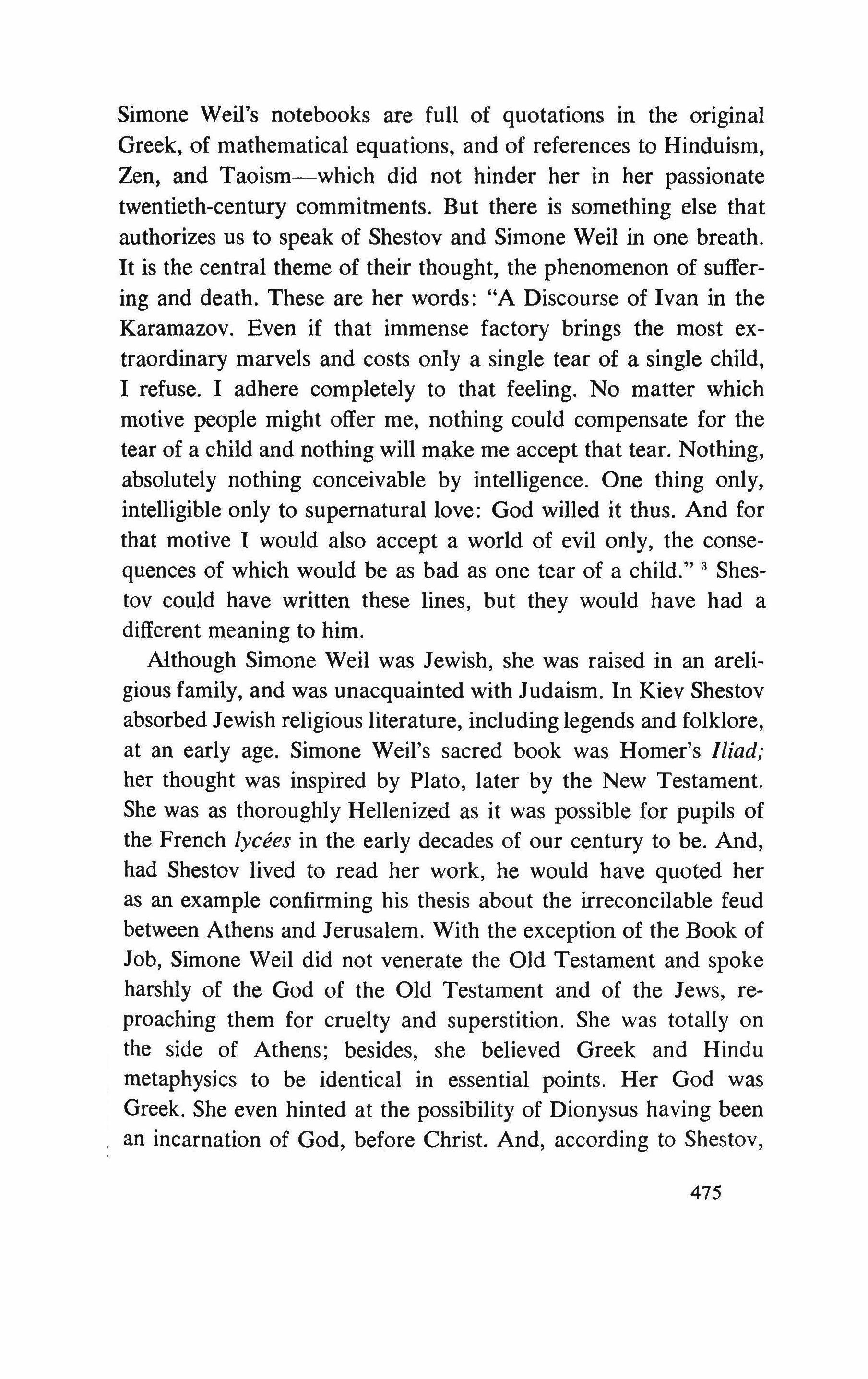
Simone Well's notebooks are full of quotations in the original Greek, of mathematical equations, and of references to Hinduism, Zen, and Taoism-which did not hinder her in her passionate twentieth-century commitments. But there is something else that authorizes us to speak of Shestov and Simone Weil in one breath. It is the central theme of their thought, the phenomenon of suffering and death. These are her words: "A Discourse of Ivan in the Karamazov. Even if that immense factory brings the most extraordinary marvels and costs only a single tear of a single child, I refuse. I adhere completely to that feeling. No matter which motive people might offer me, nothing could compensate for the tear of a child and nothing will make me accept that tear. Nothing, absolutely nothing conceivable by intelligence. One thing only, intelligible only to supernatural love: God willed it thus. And for that motive I would also accept a world of evil only, the consequences of which would be as bad as one tear of a child." 3 Shestov could have written these lines, but they would have had a different meaning to him.
Although Simone Weil was Jewish, she was raised in an areligious family, and was unacquainted with Judaism. In Kiev Shestov absorbed Jewish religious literature, including legends and folklore, at an early age. Simone Weil's sacred book was Homer's Iliad; her thought was inspired by Plato, later by the New Testament. She was as thoroughly Hellenized as it was possible for pupils of the French lycees in the early decades of our century to be. And, had Shestov lived to read her work, he would have quoted her as an example confirming his thesis about the irreconcilable feud between Athens and Jerusalem. With the exception of the Book of Job, Simone Weil did not venerate the Old Testament and spoke harshly of the God of the Old Testament and of the Jews, reproaching them for cruelty and superstition. She was totally on the side of Athens; besides, she believed Greek and Hindu metaphysics to be identical in essential points. Her God was Greek. She even hinted at the possibility of Dionysus having been an incarnation of God, before Christ. And, according to Shestov, 475
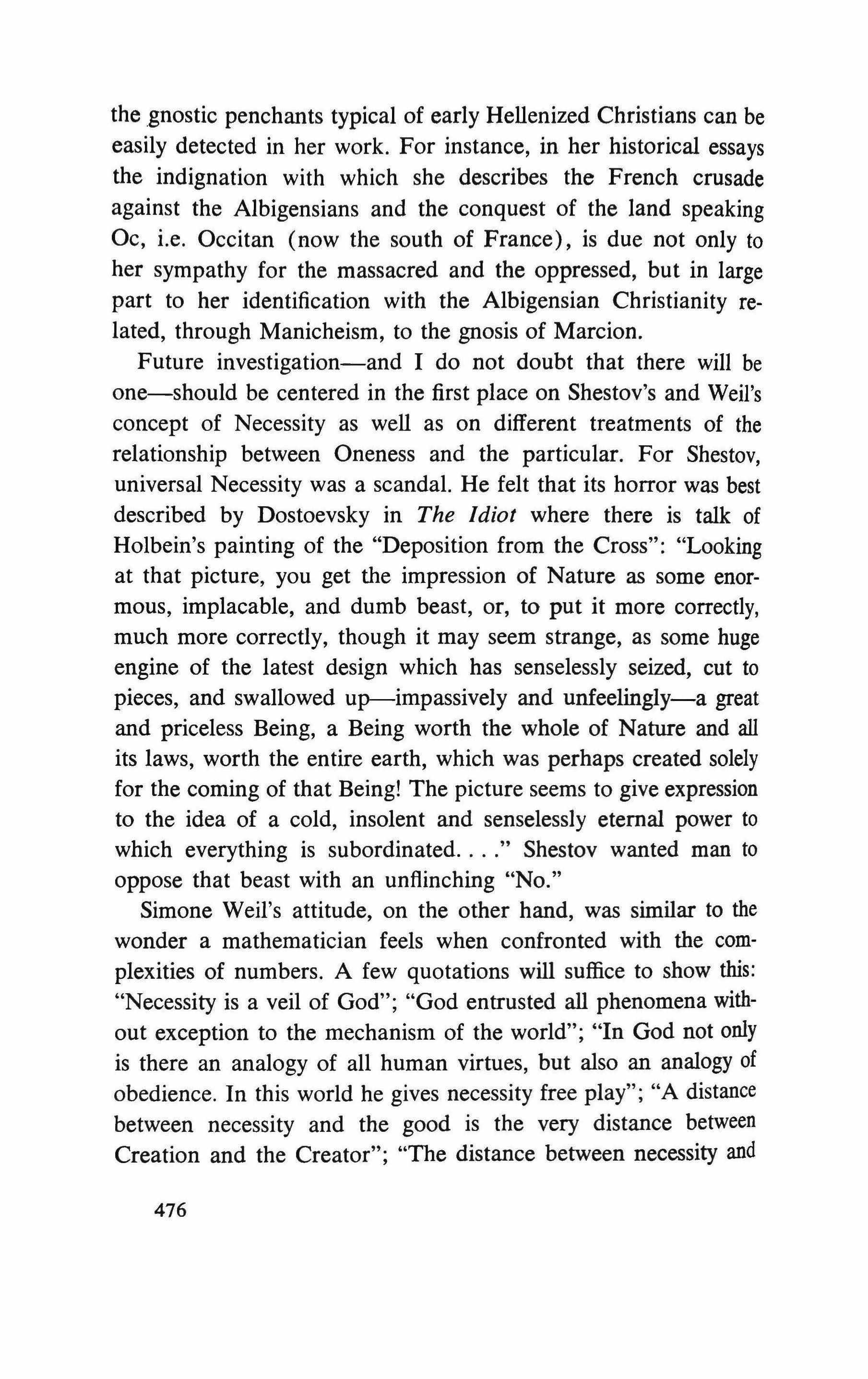
the gnostic penchants typical of early Hellenized Christians can be easily detected in her work. For instance, in her historical essays the indignation with which she describes the French crusade against the Albigensians and the conquest of the land speaking Oc, i.e. Occitan (now the south of France), is due not only to her sympathy for the massacred and the oppressed, but in large part to her identification with the Albigensian Christianity related, through Manicheism, to the gnosis of Marcion.
Future investigation-and I do not doubt that there will be one-should be centered in the first place on Shestov's and Weil's concept of Necessity as well as on different treatments of the relationship between Oneness and the particular. For Shestov, universal Necessity was a scandal. He felt that its horror was best described by Dostoevsky in The Idiot where there is talk of Holbein's painting of the "Deposition from the Cross": "Looking at that picture, you get the impression of Nature as some enormous, implacable, and dumb beast, or, to put it more correctly, much more correctly, though it may seem strange, as some huge engine of the latest design which has senselessly seized, cut to pieces, and swallowed up--impassively and unfeelingly-a great and priceless Being, a Being worth the whole of Nature and all its laws, worth the entire earth, which was perhaps created solely for the coming of that Being! The picture seems to give expression to the idea of a cold, insolent and senselessly eternal power to which everything is subordinated " Shestov wanted man to oppose that beast with an unflinching "No."
Simone Weirs attitude, on the other hand, was similar to the wonder a mathematician feels when confronted with the complexities of numbers. A few quotations will suffice to show this: "Necessity is a veil of God"; "God entrusted all phenomena without exception to the mechanism of the world"; "In God not only is there an analogy of all human virtues, but also an analogy of obedience. In this world he gives necessity free play"; "A distance between necessity and the good is the very distance between Creation and the Creator"; "The distance between necessity and
476
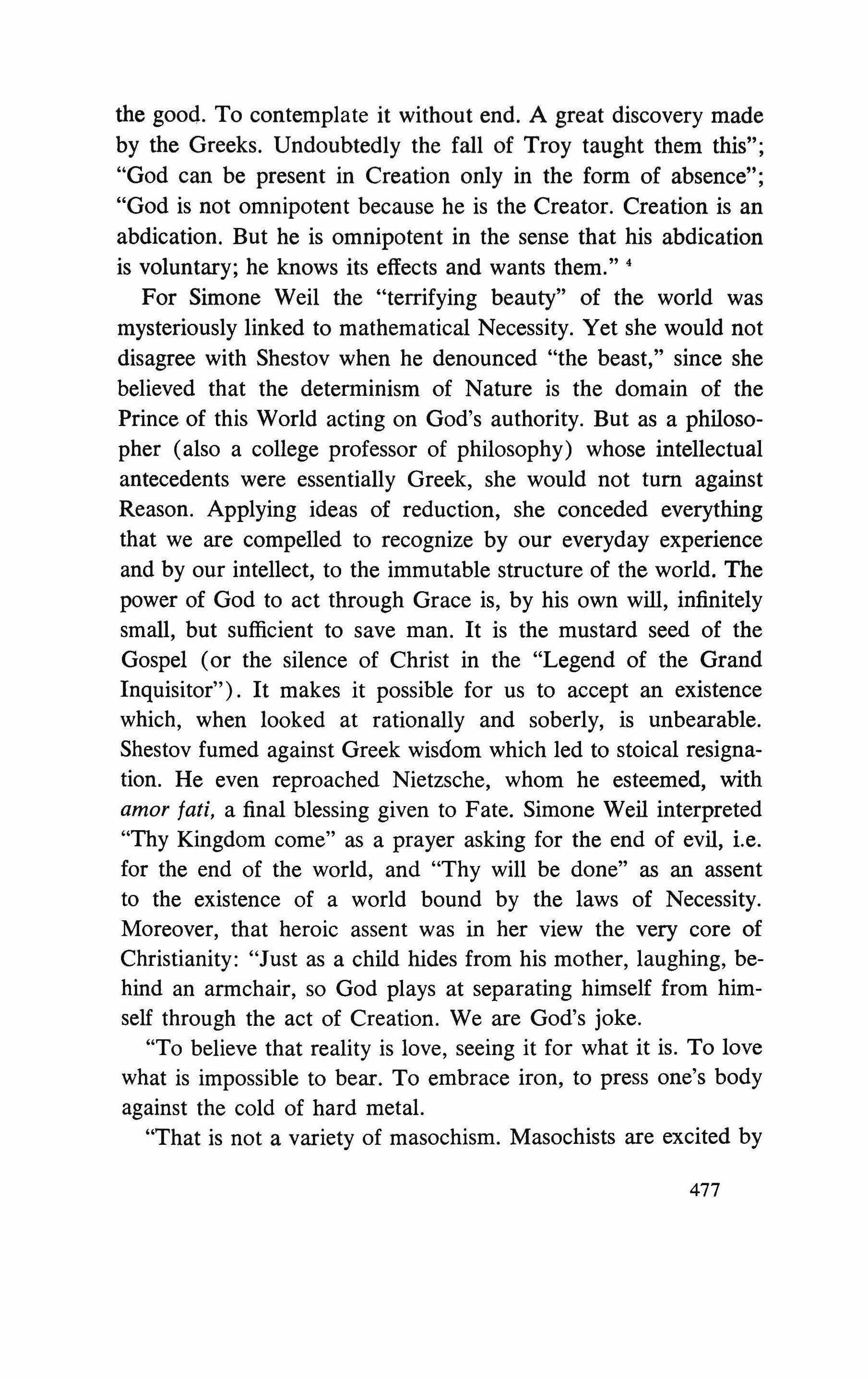
the good. To contemplate it without end. A great discovery made by the Greeks. Undoubtedly the fall of Troy taught them this"; "God can be present in Creation only in the form of absence"; "God is not omnipotent because he is the Creator. Creation is an abdication. But he is omnipotent in the sense that his abdication is voluntary; he knows its effects and wants them." 4
For Simone Weil the "terrifying beauty" of the world was mysteriously linked to mathematical Necessity. Yet she would not disagree with Shestov when he denounced "the beast," since she believed that the determinism of Nature is the domain of the Prince of this World acting on God's authority. But as a philosopher (also a college professor of philosophy) whose intellectual antecedents were essentially Greek, she would not turn against Reason. Applying ideas of reduction, she conceded everything that we are compelled to recognize by our everyday experience and by our intellect, to the immutable structure of the world. The power of God to act through Grace is, by his own will, infinitely small, but sufficient to save man. It is the mustard seed of the Gospel (or the silence of Christ in the "Legend of the Grand Inquisitor"). It makes it possible for us to accept an existence which, when looked at rationally and soberly, is unbearable. Shestov fumed against Greek wisdom which led to stoical resignation. He even reproached Nietzsche, whom he esteemed, with amor [ati, a final blessing given to Fate. Simone Weil interpreted "Thy Kingdom come" as a prayer asking for the end of evil, i.e. for the end of the world, and "Thy will be done" as an assent to the existence of a world bound by the laws of Necessity. Moreover, that heroic assent was in her view the very core of Christianity: "Just as a child hides from his mother, laughing, behind an armchair, so God plays at separating himself from himself through the act of Creation. We are God's joke.
"To believe that reality is love, seeing it for what it is. To love what is impossible to bear. To embrace iron, to press one's body against the cold of hard metal.
"That is not a variety of masochism. Masochists are excited by
477
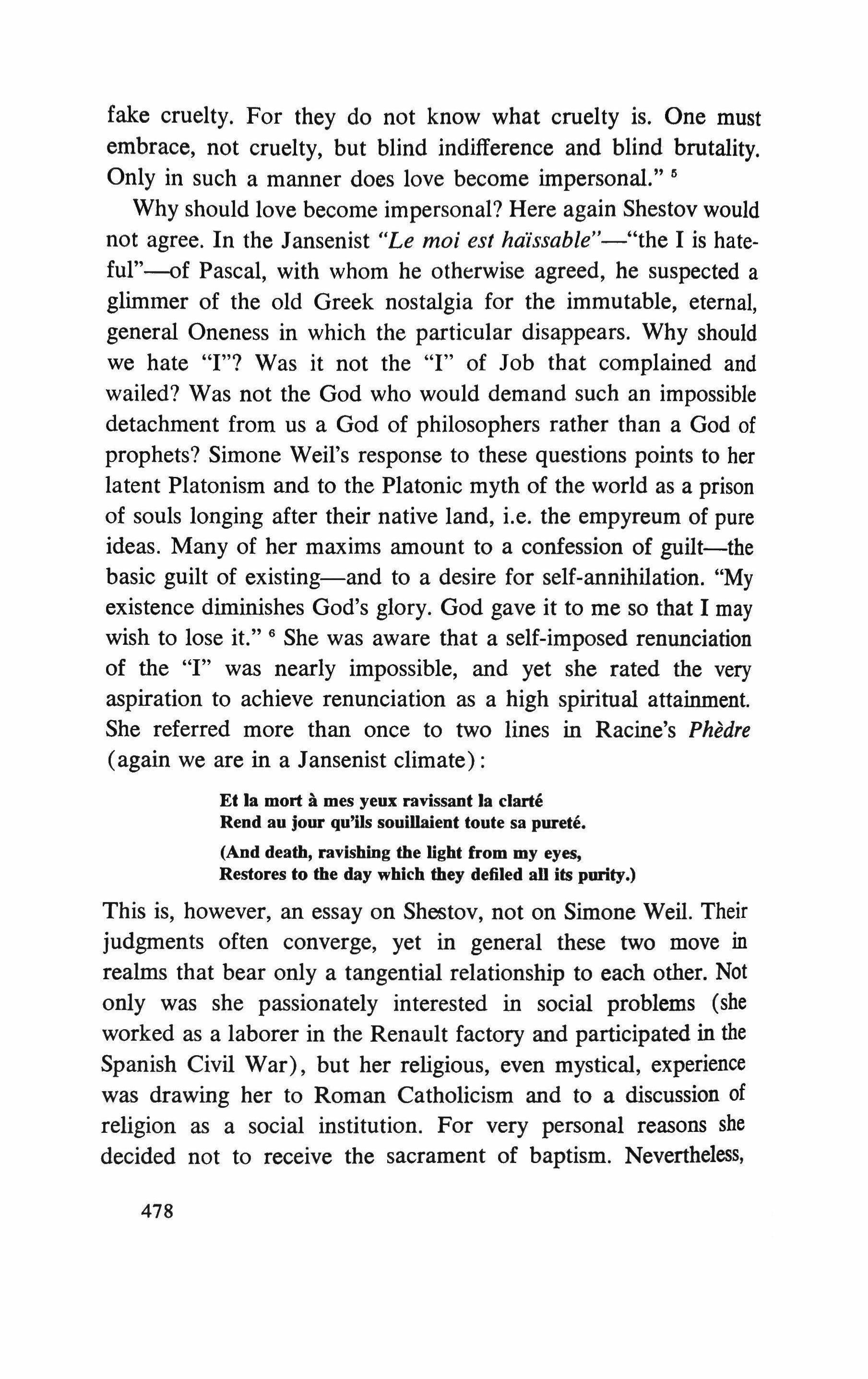
fake cruelty. For they do not know what cruelty is. One must embrace, not cruelty, but blind indifference and blind brutality. Only in such a manner does love become impersonal." 6
Why should love become impersonal? Here again Shestov would not agree. In the Jansenist "Le moi est halssable"-"the I is hateful"-of Pascal, with whom he otherwise agreed, he suspected a glimmer of the old Greek nostalgia for the immutable, eternal, general Oneness in which the particular disappears. Why should we hate "I"? Was it not the "I" of Job that complained and wailed? Was not the God who would demand such an impossible detachment from us a God of philosophers rather than a God of prophets? Simone Weil's response to these questions points to her latent Platonism and to the Platonic myth of the world as a prison of souls longing after their native land, i.e. the empyreum of pure ideas. Many of her maxims amount to a confession of guilt-the basic guilt of existing-and to a desire for self-annihilation. "My existence diminishes God's glory. God gave it to me so that I may wish to lose it." 6 She was aware that a self-imposed renunciation of the "I" was nearly impossible, and yet she rated the very aspiration to achieve renunciation as a high spiritual attainment. She referred more than once to two lines in Racine's Phedre (again we are in a Jansenist climate) :
Et la mort a mes yeux ravissant la cIarte Rend au jour qu'i1s souillaient toute sa purete. (And death, ravishing the light from my eyes, Restores to the day which they defiled all its purity.)
This is, however, an essay on Shestov, not on Simone Weil. Their judgments often converge, yet in general these two move in realms that bear only a tangential relationship to each other. Not only was she passionately interested in social problems (she worked as a laborer in the Renault factory and participated in the Spanish Civil War), but her religious, even mystical, experience was drawing her to Roman Catholicism and to a discussion of religion as a social institution. For very personal reasons she decided not to receive the sacrament of baptism. Nevertheless,
478

Catholic theology and the history of the Roman Catholic Church occupy a prominent position in her writings. Shestov was dominated by a violent scorn for speculative philosophy because he believed that although it pretends to bring solace, in truth its consolations are illusory. Paradoxically he waged his war as an anti-rationalist using rational argument as his weapon. We know nothing about his confessional options and not much about the intensity of his personal faith.
What could Sorana Gurian, a young woman dying of cancer, get from her reading of Shestov? Not the promise of a miraculous cure. He did not maintain that you can knock down the wall of Necessity by beating your head against it. To the sober-minded who criticized the Absurd of Kierkegaard and his faith in the impossible, he used to reply that Kierkegaard knew perfectly well the weight of reality: Regina Olsen would not be restored to him. Yet there is a great difference between our looking at ourselves as ciphers on a statistical sheet and our grasping our destiny as something which is personal and unique. Simone Weil, though she advocated the voluntary renunciation of the "1," also considered the destruction of the "I" by an external force as a sign of utter misfortune: prisoners and prostitutes are compelled by others to visualize themselves as objects, i.e. statistical ciphers, interchangeable units. Shestov did not fight science. Yet in his rebellion against philosophy we may sense an implied rejection of the whole purely quantitative, scientific Weltanschauung. Such a scientific code of self-perception, imposed by education and the mass media, eats up our individual substance from the inside, so to speak.
To Sorana, the God of the Scriptures defended by the stem priest, Shestov, would probably not have meant an afterlife and a palm tree in Heaven. He must have appeared to her as he did to the Russian author, as pure anti-Necessity. The question was not the existence of Heaven and Hell, not even the "existence" of God himself. Above any notions, but revealed by his voice in the 479
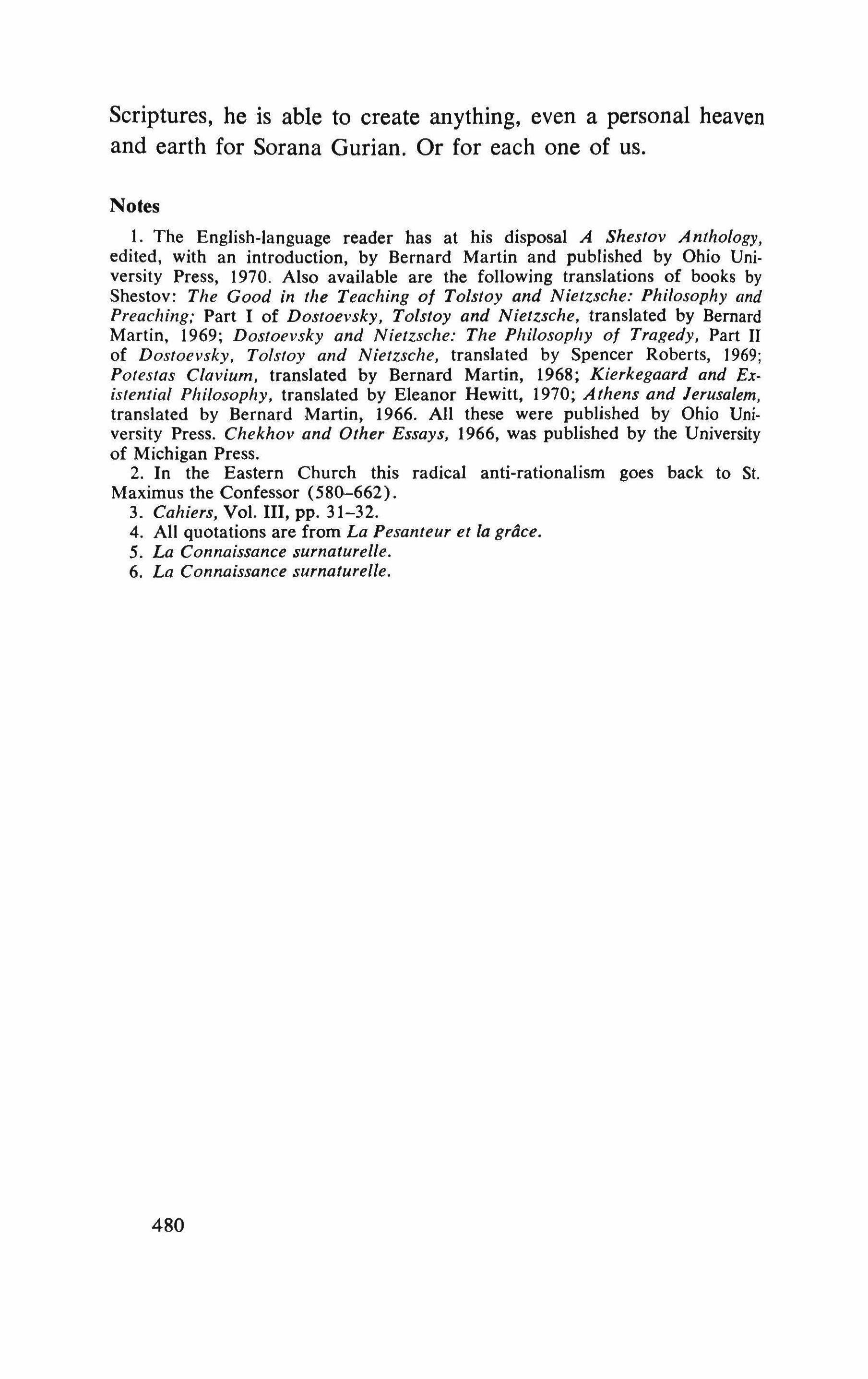
Scriptures, he is able to create anything, even a personal heaven and earth for Sorana Gurian. Or for each one of us.
Notes
1. The English-language reader has at his disposal A Shestov Anthology, edited, with an introduction, by Bernard Martin and published by Ohio University Press, 1970. Also available are the following translations of books by Shestov: The Good in the Teaching of Tolstoy and Nietzsche: Philosophy and Preaching; Part I of Dostoevsky, Tolstoy and Nietzsche, translated by Bernard Martin, 1969; Dostoevsky and Nietzsche: The Philosophy of Tragedy, Part II of Dostoevsky, Tolstoy and Nietzsche, translated by Spencer Roberts, 1969; Potestas Clavium, translated by Bernard Martin, 1968; Kierkegaard and Existential Philosophy, translated by Eleanor Hewitt, 1970; Athens and Jerusalem, translated by Bernard Martin, 1966. All these were published by Ohio University Press. Chekhov and Other Essays, 1966, was published by the University of Michigan Press.
2. In the Eastern Church this radical anti-rationalism goes back to st. Maximus the Confessor (580-662).
3. Cahiers, Vol. III, pp. 31-32.
4. All quotations are from La Pesanteur et la grace.
5. La Connaissance surnaturelle.
6. La Connaissance surnaturelle.
480
A note on Teffi
EDYTHE c. HABER

Nadezhda Aleksandrovna Teffi (1876-1952), best known as a writer of comic feuilletons and short stories, was, especially during the twenties and thirties, one of the best loved and most widely read of Russian emigre writers.
She was already popular in Russia, with a broad circle of readers, before emigrating in 1919. In addition to her stories, her many short, humorous plays enjoyed great success, while her poetry served to popularize (some say to vulgarize) the Symbolist movement. Before the October Revolution, Teffi's following was so wide that there were even Teffi candy and Teffi perfume.
After her emigration to Paris, Teffi occupied an important place in the emigre literary and journalistic community. Her [euilletons, which, during the twenties and thirties, appeared almost weekly in one or the other of the two Paris emigre newspapers, reached a very large and responsive audience. During the forties and early fifties (until her death in 1952), Teffi wrote less, because of old age and severe illness.
Her success as a writer of comic short stories is easily explained
TriQuarterly 481

and well deserved, but her popularity as a humorist has tended to obscure the fact that she also wrote a large body of serious and seriocomic prose. As Teffi herself has written, "I was born in St. Petersburg in the springtime and, as everyone knows, our Petersburg spring is extremely changeable: now the sun is shining, now it is raining. Therefore, like the pediment of a Greek theater, I also have two faces, one laughing and one weeping."
Looking at the whole of Teffi's works, what strikes one most is the fact that, despite her "two faces," there is only one set of eyes looking out at the world from both the comic and serious works. Indeed, if constancy of vision is one of the traits which distinguish serious writers from mere entertainers, Teffi certainly falls into the former category. A surprisingly consistent world-view emerges in all her work, written over a very long time span.
In spite of her reputation as a humorist, Teffi's vision is anything but sanguine. Life is repeatedly portrayed as painful, dreary, empty. The highest of earthly values, love and beauty, prove to be fragile and fleeting. In her comic works, people fill the gap created by the loss of these through a variety of ruses, of which fantasizing and artificial posing are the most common. Thus, in "Time," one sees how the formerly beautiful and beloved Maria Nikolaevna has been transformed by time into a powdered and rouged "lump of pink fat" with blue porcelain teeth. The setting of this story is an expensive Russian restaurant in Paris serving traditional Russian foods and patronized by aging exiled Russian aristocrats who bear noble Baltic-German names and cling to the values and mannerisms of their pre-Revolutionary youth, complete with social snobberies and infantile nicknames.
As Teffi once wrote, "You know, living in a joke is not so much comic as tragic."
482
Time NADEZHDA TEFFI
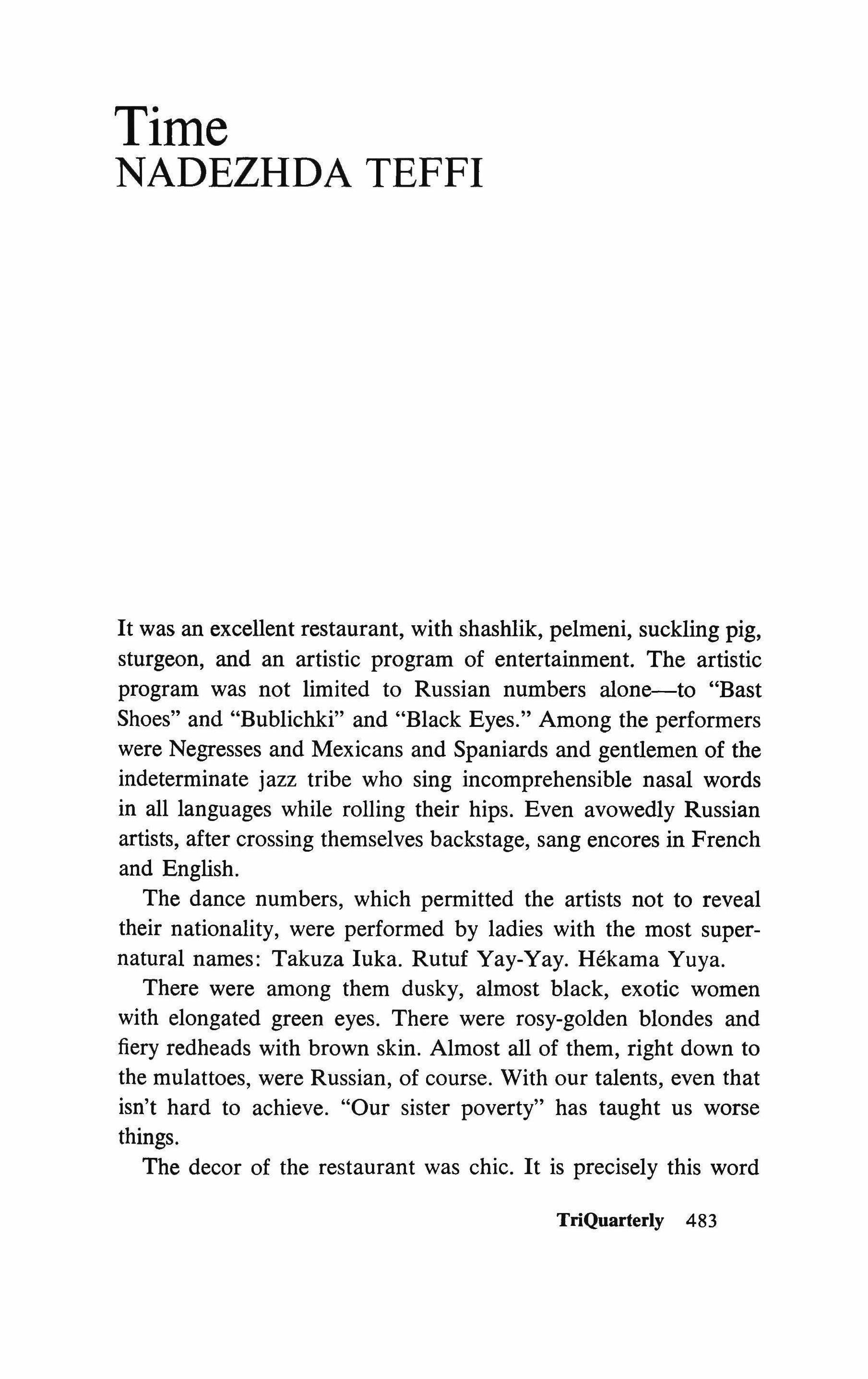
It was an excellent restaurant, with shashlik, pelmeni, suckling pig, sturgeon, and an artistic program of entertainment. The artistic program was not limited to Russian numbers alone-to "Bast Shoes" and "Bublichki" and "Black Eyes." Among the performers were Negresses and Mexicans and Spaniards and gentlemen of the indeterminate jazz tribe who sing incomprehensible nasal words in all languages while rolling their hips. Even avowedly Russian artists, after crossing themselves backstage, sang encores in French and English.
The dance numbers, which permitted the artists not to reveal their nationality, were performed by ladies with the most supernatural names: Takuza Iuka. Rutuf Yay-Yay. Hekama Yuya.
There were among them dusky, almost black, exotic women with elongated green eyes. There were rosy-golden blondes and fiery redheads with brown skin. Almost all of them, right down to the mulattoes, were Russian, of course. With our talents, even that isn't hard to achieve. "Our sister poverty" has taught us worse things.
The decor of the restaurant was chic. It is precisely this word
TriQuarterly 483

that defined it best of all. Not luxurious, not magnificent, not elegant, but-chic.
Little colored lampshades, little fountains, green aquaria with goldfish, set into the walls, carpets, the ceiling painted with incomprehensible things, among which one discerned now a bulging eye, now a lifted leg, now a pineapple, now a piece of nose with a monocle glued to it, now a lobster tail. It seemed to those sitting at the tables that all these things were falling on their heads, but apparently this was just what the artist had intended.
The help was courteous. They never said to late-comers: "Hold on. What are you shoving for when there ain't no seats? This ain't no streetcar."
The restaurant was frequented as much by foreigners as by Russians. One could often see some Frenchman or Englishman, who apparently had already been at this establishment, bring in some friends with him and, with the expression of a magician swallowing a piece of burning cotton, empty a glass of straight vodka into his mouth and then, his eyes bulging, stop it in his throat with a pirozhok, His friends would regard him as a courageous crank and, smiling suspiciously, would sniff at their glasses.
The French love to order pirozhki. For some reason they are amused by this word, which they always pronounce with the stress on the o. This is very strange and inexplicable. With all Russian words the French use the stress characteristic of their own language, on the last syllable. With all words except pirozhki, which of course requires that last-syllable stress.
Vava von Mersen, Musya Riewen, and Gogosya Livensky were sitting at a table. Gogosya moved in the highest circles, although only in their outer periphery; therefore, in spite of his sixty-five years, he still answered to the infantile nickname Gogosya.
Vava von Mersen, who had also long ago grown up to an elderly Varvara, had a head of tightly wound dry curls the color of tobacco, so thoroughly cured that, were one to cut them off and chop them up fine, they could be used to fill the pipe of some undemanding skipper of the merchant fleet.
484
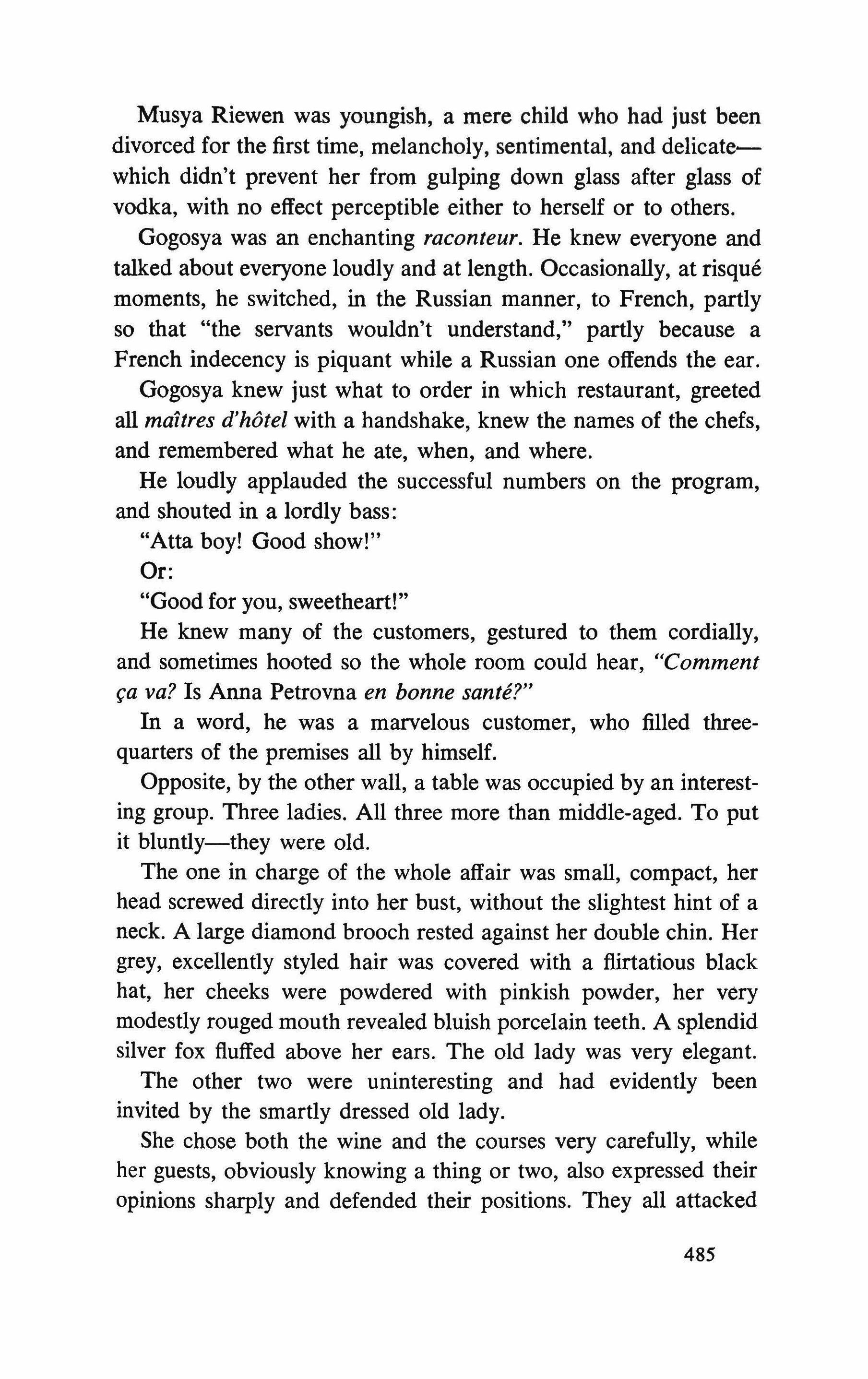
Musya Riewen was youngish, a mere child who had just been divorced for the first time, melancholy, sentimental, and delicatewhich didn't prevent her from gulping down glass after glass of vodka, with no effect perceptible either to herself or to others.
Gogosya was an enchanting raconteur. He knew everyone and talked about everyone loudly and at length. Occasionally, at risque moments, he switched, in the Russian manner, to French, partly so that "the servants wouldn't understand," partly because a French indecency is piquant while a Russian one offends the ear.
Gogosya knew just what to order in which restaurant, greeted all maitres d'h6tel with a handshake, knew the names of the chefs, and remembered what he ate, when, and where.
He loudly applauded the successful numbers on the program, and shouted in a lordly bass:
"Atta boy! Good show!"
Or:
"Good for you, sweetheart!"
He knew many of the customers, gestured to them cordially, and sometimes hooted so the whole room could hear, "Comment �a va? Is Anna Petrovna en bonne sante?"
In a word, he was a marvelous customer, who filled threequarters of the premises all by himself.
Opposite, by the other wall, a table was occupied by an interesting group. Three ladies. All three more than middle-aged. To put it bluntly-they were old.
The one in charge of the whole affair was small, compact, her head screwed directly into her bust, without the slightest hint of a neck. A large diamond brooch rested against her double chin. Her grey, excellently styled hair was covered with a flirtatious black hat, her cheeks were powdered with pinkish powder, her very modestly rouged mouth revealed bluish porcelain teeth. A splendid silver fox fluffed above her ears. The old lady was very elegant.
The other two were uninteresting and had evidently been invited by the smartly dressed old lady.
She chose both the wine and the courses very carefully, while her guests, obviously knowing a thing or two, also expressed their opinions sharply and defended their positions. They all attacked 485

their food convivially, with the fire of genuine temperament. They drank sensibly and with concentration. They quickly became flushed. The main old lady filled out all over, even turned slightly bluish, and her eyes bulged and became glassy. But all three were in a happily aroused state, like Africans who have just skinned an elephant, when their joy demands that they continue dancing but their full stomachs fling them to the ground.
"What amusing old ladies," said Vava von Mersen, directing her lorgnette toward the merry company.
"Yes," Gogosya ecstatically joined in. "That's a happy age. They don't have to watch their figures, they don't have to conquer anyone or please anyone. If you have money and a good stomach, it's the happiest age. And the most carefree. You don't have to plan your life any more. Everything's been accomplished."
"Look at that one, the main one," said Musya Riewen, contemptuously lowering the corners of her mouth. "A bouncy cow, that's all she is. And 1 can just see that's the way she's been all her life."
"Life's probably been very good to her," Gogosya said approvingly. "Live and let live. She's merry, healthy, rich. Maybe she wasn't even bad looking once. Now, of course, it's hard to tell. A lump of pink fat."
"I think she must have been stingy, greedy, and stupid," Vava von Mersen put in. "See how she eats and drinks. A sensual animal."
"But still, someone probably loved her, and even married her," Musya Riewen drawled pensively.
"Someone simply married her for her money. You're always imagining something romantic which just doesn't occur in real life."
Tyulya Rovtsyn interrupted the conversation. He was from the periphery of the same circles as Gogosya, and therefore to the age of sixty-three preserved the pet name of Tyulya. Tyulya was also sweet and pleasant, but poorer than Gogosya, and everything about him was played in a more minor key. After chatting for a few minutes, he got up, looked around, and approached the merry
486
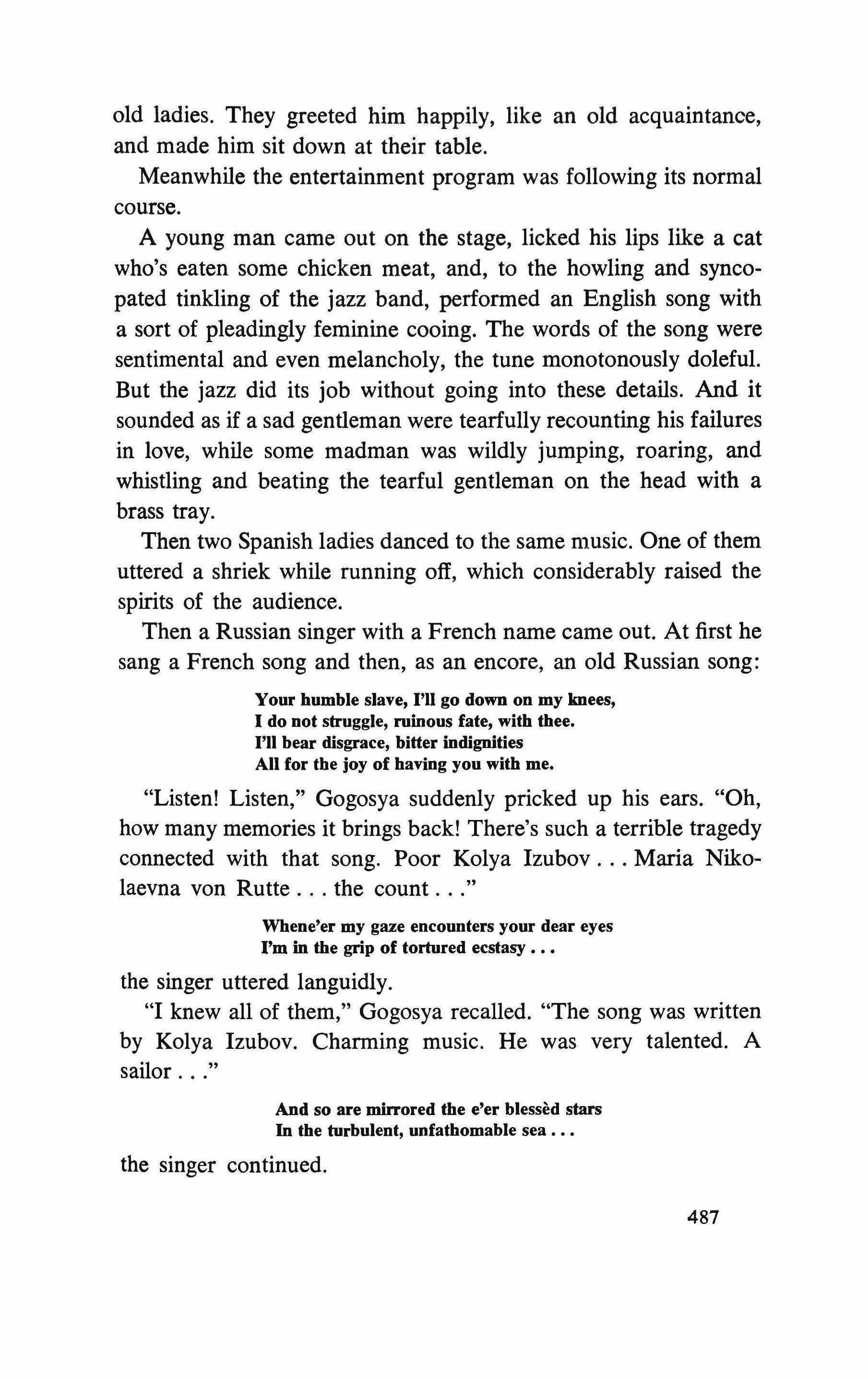
old ladies. They greeted him happily, like an old acquaintance, and made him sit down at their table.
Meanwhile the entertainment program was following its normal course.
A young man came out on the stage, licked his lips like a cat who's eaten some chicken meat, and, to the howling and syncopated tinkling of the jazz band, performed an English song with a sort of pleadingly feminine cooing. The words of the song were sentimental and even melancholy, the tune monotonously doleful. But the jazz did its job without going into these details. And it sounded as if a sad gentleman were tearfully recounting his failures in love, while some madman was wildly jumping, roaring, and whistling and beating the tearful gentleman on the head with a brass tray.
Then two Spanish ladies danced to the same music. One of them uttered a shriek while running off, which considerably raised the spirits of the audience.
Then a Russian singer with a French name came out. At first he sang a French song and then, as an encore, an old Russian song:
Your humble slave, I'll go down on my knees, I do not struggle, ruinous fate, with thee. I'll bear disgrace, bitter indignities
All for the joy of having you with me.
"Listen! Listen," Gogosya suddenly pricked up his ears. "Oh, how many memories it brings back! There's such a terrible tragedy connected with that song. Poor Kolya Izubov Maria Nikolaevna von Rutte the count
Whene'er my gaze encounters your dear eyes I'm in the grip of tortured ecstasy the singer uttered languidly.
"I knew all of them," Gogosya recalled. "The song was written by Kolya Izubov. Charming music. He was very talented. A sailor "
And so are mirrored the e'er blessed stars In the turbulent, unfathomable sea the singer continued.
487
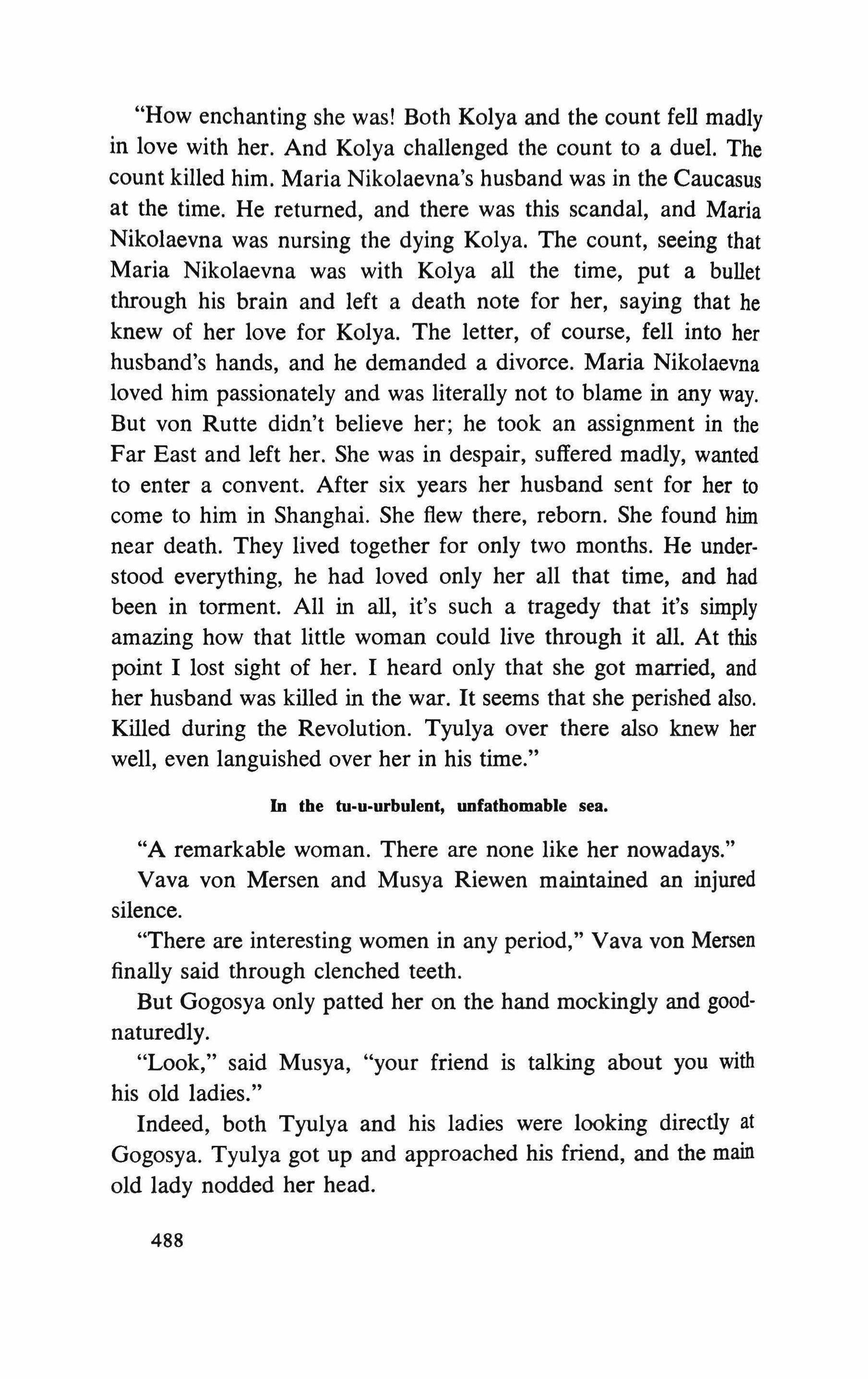
"How enchanting she was! Both Kolya and the count fell madly in love with her. And Kolya challenged the count to a duel. The count killed him. Maria Nikolaevna's husband was in the Caucasus at the time. He returned, and there was this scandal, and Maria Nikolaevna was nursing the dying Kolya. The count, seeing that Maria Nikolaevna was with Kolya all the time, put a bullet through his brain and left a death note for her, saying that he knew of her love for Kolya. The letter, of course, fell into her husband's hands, and he demanded a divorce. Maria Nikolaevna loved him passionately and was literally not to blame in any way. But von Rutte didn't believe her; he took an assignment in the Far East and left her. She was in despair, suffered madly, wanted to enter a convent. After six years her husband sent for her to come to him in Shanghai. She flew there, reborn. She found him near death. They lived together for only two months. He understood everything, he had loved only her all that time, and had been in torment. All in all, it's such a tragedy that it's simply amazing how that little woman could live through it all. At this point I lost sight of her. I heard only that she got married, and her husband was killed in the war. It seems that she perished also. Killed during the Revolution. Tyulya over there also knew her well, even languished over her in his time."
In the tu-u-urbulent, unfathomable sea.
"A remarkable woman. There are none like her nowadays."
Vava von Mersen and Musya Riewen maintained an injured silence.
"There are interesting women in any period," Vava von Mersen finally said through clenched teeth.
But Gogosya only patted her on the hand mockingly and goodnaturedly.
"Look," said Musya, "your friend is talking about you with his old ladies."
Indeed, both Tyulya and his ladies were looking directly at Gogosya. Tyulya got up and approached his friend, and the main old lady nodded her head.
488
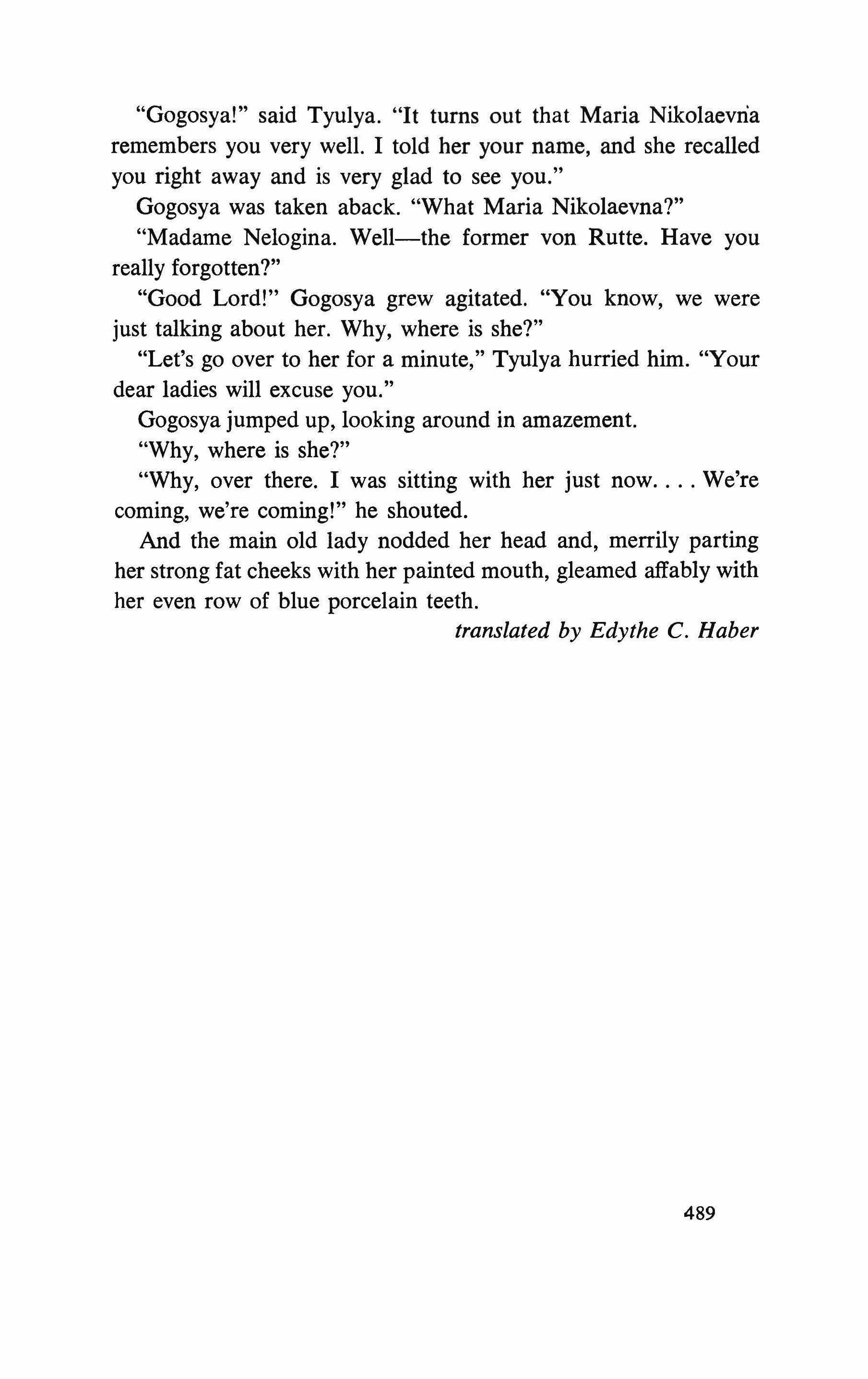
"Gogosya!" said Tyulya. "It turns out that Maria Nikolaevna remembers you very well. I told her your name, and she recalled you right away and is very glad to see you."
Gogosya was taken aback. "What Maria Nikolaevna?"
"Madame Nelogina. Well-the former von Rutte. Have you really forgotten?"
"Good Lord!" Gogosya grew agitated. "You know, we were just talking about her. Why, where is she?"
"Let's go over to her for a minute," Tyulya hurried him. "Your dear ladies will excuse you."
Gogosya jumped up, looking around in amazement.
"Why, where is she?"
"Why, over there. I was sitting with her just now We're coming, we're coming!" he shouted.
And the main old lady nodded her head and, merrily parting her strong fat cheeks with her painted mouth, gleamed affably with her even row of blue porcelain teeth.
translated by Edythe C Haber
489
v. S. Yanovsky: some thoughts
and rermmscences
HELENE ISWOLSKY

Though living in America, where most of his major works were published in Russian and English, V. S. Yanovsky is often mentioned, and likes to speak of himself, as belonging to the "Paris school" of Russian emigre writers. To be sure, he made his literary debut in the French capital, where I first met him, and though the style and content of his writings naturally developed and matured during the years, certain aspects of these works still reflect the moods of the 1930's, when the "Paris school" came to life. It was composed of young men and women who had been uprooted from their native land in their teens. Unlike the older members of the Russian emigration, they had but few memories of a secure life at home. They had left Russia when it was tom by war and revolution, and after that, life had meant long journeys, poverty, endless hardships and struggles. Then, just as they were gaining a foothold in the new land, their security and cultural growth were once more threatened. While their own country was barred to them by Stalinism, totalitarian doctrines acquired other monstrous forms (fascism and Hitlerism) raising the specter of
490 TriQuarterly

war. All this accounts for the note of gloom, for the extreme sensitivity and skepticism of the young Russian writers in Paris, many of them talented but suffering from a deep awareness of tragedy and loss.
And yet the French capital, with its intense cultural life and atmosphere, was exciting and stimulating. Here was the center of great modem literature, art, philosophy, and religious quest. It was the time of Gide, Bernanos, Valery, Joyce, and a galaxy of avant-garde painters and musicians. Paris had also become a refuge for many Russian intellectuals of the older generation, distinguished writers, poets, and literary critics, who contributed to the formation of the younger set. Russian emigre periodicals published, though sparingly, the works of this "junior class," which also brought out some books and collections of poems of its own.
Important, so far as spiritual values were concerned, were the circles connected with the religious thinker Nicholas Berdyaev and the great theologian, Father Sergei Bulgakov, who were both teaching in Paris. These circles followed the traditions of Russian Orthodoxy, at the same time renewing the approach to their faith. They were inspired by the religious thought expressed by Solovyov, Dostoevsky, Tolstoy, and Nicholas Federov; the latter, as yet little known abroad, was the promoter of a "restoration of kinship among mankind" and of "the common task" of Christians. He was, as Yanovsky has often acknowledged, one of the catalysts of his own religious outlook on man, society, and the world.
The Russian Orthodox renewal of the Paris days was broadened and stimulated by Berdyaev's friend and follower, Ilya BunakovFondaminsky, who sought to draw young writers out of their dark world of pessimism and agnosticism into the dimensions of a transcendent life. These young writers, as well as students, came to Fondaminsky's study circle, where they also met some of their seniors: the theologian and church historian, George Fedotov, and Mother Maria Skobtzov, a Russian nun who had started a home for the poorest Russian emigres. She was at the same time a promoter of Russian literature and philosophy. I was a participant at many of these meetings.
491

It was at Fondaminsky's study circle that I often met v. S. Yanovsky, who was studying at the Paris School of Medicine and had already published several books. Even then he was concerned, as in later years, with the relationship of flesh and soul, of matter and spirit, and with the meaning of the medical profession. We were all interested in the ecumenical dialogue and invited Catholics and Protestants to our meetings. When Yanovsky and I came to New York in the nineteen-forties, our discussion group came to life again. With a few other friends who remembered the Paris days, we founded a publication entitled The Third Hour, to which Yanovsky contributed a series of essays. We also started ecumenical meetings, which still continue today. Both the publications and the meetings were inspired by our experience of the Paris days: the quest for humanism, social justice, and the transfiguration of a grossly material world through transcendent philosophy as well as action.
And such are the themes of Yanovsky's writings. In his books the reader finds, side by side, the stark reality of our times and the expectation of the parousia-the hope that one may defeat a mechanized and automatic civilization by a loving and gentle relationship in the name of "the common task." This lends Yanovsky's writings their seriousness of purpose and depth in his never-ending search for truth.
492
Struggle for perfection
v. s. YANOVSKY
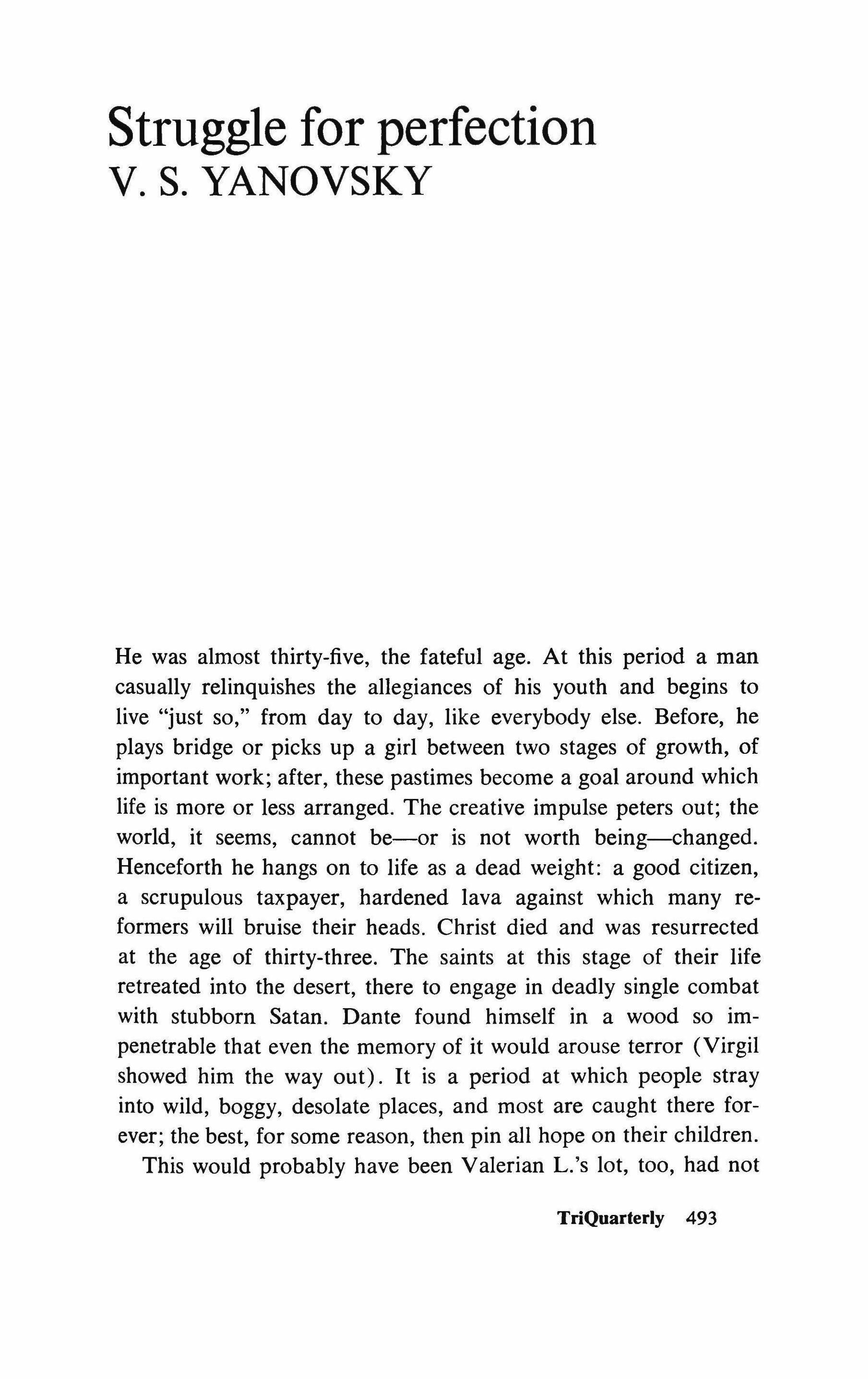
He was almost thirty-five, the fateful age. At this period a man casually relinquishes the allegiances of his youth and begins to live "just so," from day to day, like everybody else. Before, he plays bridge or picks up a girl between two stages of growth, of important work; after, these pastimes become a goal around which life is more or less arranged. The creative impulse peters out; the world, it seems, cannot be-or is not worth being-changed. Henceforth he hangs on to life as a dead weight: a good citizen, a scrupulous taxpayer, hardened lava against which many reformers will bruise their heads. Christ died and was resurrected at the age of thirty-three. The saints at this stage of their life retreated into the desert, there to engage in deadly single combat with stubborn Satan. Dante found himself in a wood so impenetrable that even the memory of it would arouse terror (Virgil showed him the way out). It is a period at which people stray into wild, boggy, desolate places, and most are caught there forever; the best, for some reason, then pin all hope on their children. This would probably have been Valerian L.'s lot, too, had not
TriQuarterly 493
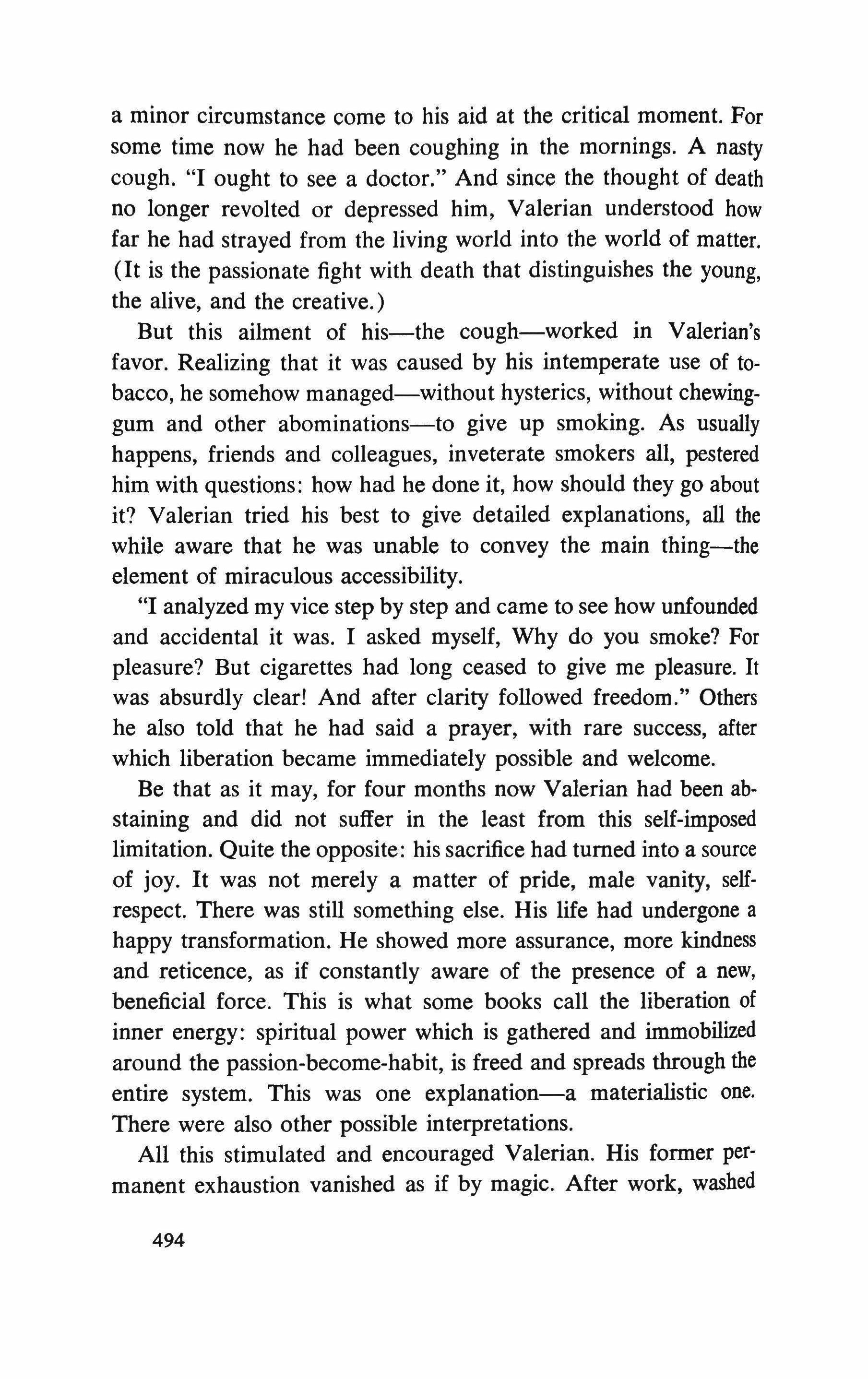
a minor circumstance come to his aid at the critical moment. For some time now he had been coughing in the mornings. A nasty cough. "I ought to see a doctor." And since the thought of death no longer revolted or depressed him, Valerian understood how far he had strayed from the living world into the world of matter. (It is the passionate fight with death that distinguishes the young, the alive, and the creative.)
But this ailment of his-the cough-worked in Valerian's favor. Realizing that it was caused by his intemperate use of tobacco, he somehow managed-without hysterics, without chewinggum and other abominations-to give up smoking. As usually happens, friends and colleagues, inveterate smokers all, pestered him with questions: how had he done it, how should they go about it? Valerian tried his best to give detailed explanations, all the while aware that he was unable to convey the main thing-the element of miraculous accessibility.
"I analyzed my vice step by step and came to see how unfounded and accidental it was. I asked myself, Why do you smoke? For pleasure? But cigarettes had long ceased to give me pleasure. It was absurdly clear! And after clarity followed freedom." Others he also told that he had said a prayer, with rare success, after which liberation became immediately possible and welcome.
Be that as it may, for four months now Valerian had been abstaining and did not suffer in the least from this self-imposed limitation. Quite the opposite: his sacrifice had turned into a source of joy. It was not merely a matter of pride, male vanity, selfrespect. There was still something else. His life had undergone a happy transformation. He showed more assurance, more kindness and reticence, as if constantly aware of the presence of a new, beneficial force. This is what some books call the liberation of inner energy: spiritual power which is gathered and immobilized around the passion-become-habit, is freed and spreads through the entire system. This was one explanation-a materialistic one. There were also other possible interpretations.
All this stimulated and encouraged Valerian. His former permanent exhaustion vanished as if by magic. After work, washed
494
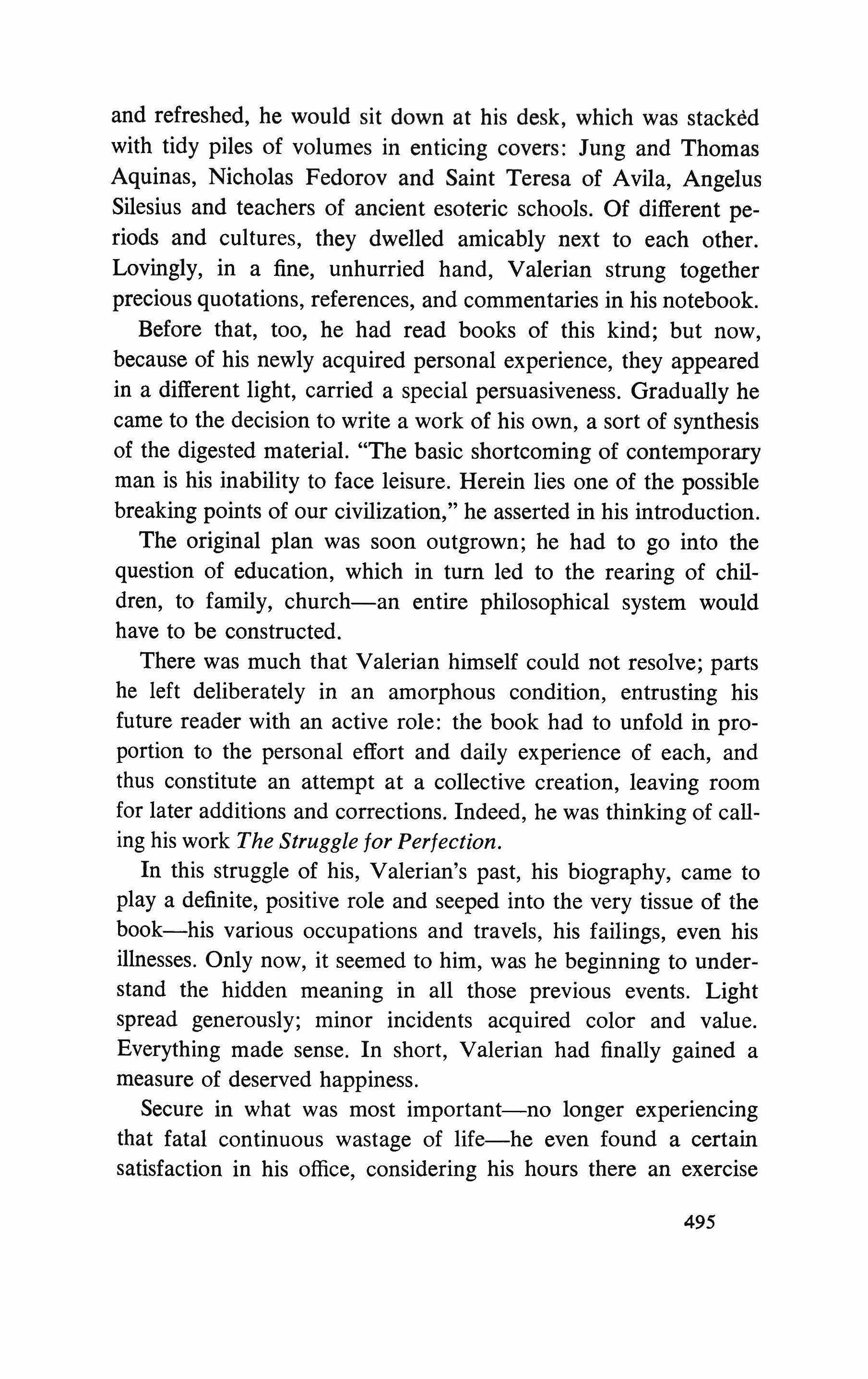
and refreshed, he would sit down at his desk, which was stacked with tidy piles of volumes in enticing covers: Jung and Thomas Aquinas, Nicholas Fedorov and Saint Teresa of Avila, Angelus Silesius and teachers of ancient esoteric schools. Of different periods and cultures, they dwelled amicably next to each other. Lovingly, in a fine, unhurried hand, Valerian strung together precious quotations, references, and commentaries in his notebook.
Before that, too, he had read books of this kind; but now, because of his newly acquired personal experience, they appeared in a different light, carried a special persuasiveness. Gradually he came to the decision to write a work of his own, a sort of synthesis of the digested material. "The basic shortcoming of contemporary man is his inability to face leisure. Herein lies one of the possible breaking points of our civilization," he asserted in his introduction.
The original plan was soon outgrown; he had to go into the question of education, which in turn led to the rearing of children, to family, church-an entire philosophical system would have to be constructed.
There was much that Valerian himself could not resolve; parts he left deliberately in an amorphous condition, entrusting his future reader with an active role: the book had to unfold in proportion to the personal effort and daily experience of each, and thus constitute an attempt at a collective creation, leaving room for later additions and corrections. Indeed, he was thinking of calling his work The Struggle for Perfection.
In this struggle of his, Valerian's past, his biography, came to playa definite, positive role and seeped into the very tissue of the book-his various occupations and travels, his failings, even his illnesses. Only now, it seemed to him, was he beginning to understand the hidden meaning in all those previous events. Light spread generously; minor incidents acquired color and value. Everything made sense. In short, Valerian had finally gained a measure of deserved happiness.
Secure in what was most important-no longer experiencing that fatal continuous wastage of life-he even found a certain satisfaction in his office, considering his hours there an exercise
495

in developing inner strength, discipline, patience. Knowing that he himself was engaged in a difficult, important task, Valerian began to treat everyone around him as a potential ally. His faith in his own indisputable worth reassured him, and the strength he thus gained was of the kind that one is never tempted to abuse. (So will accomplished athletes move peaceably through crowds of pugnacious adolescents and aggressive, embittered breadwinners.) Ahead he discerned vast horizons: powerful mysteries would unveil themselves in proportion to his spiritual growth, and he would learn to use them for the good of all. He began to pray regularly, at the same time controlling his breathing according to a special method. His prayer-that of a happy creaturewas exclusively one of thanks, since the joy of fruitful activity had been granted him.
Unfortunately, events in the outside world, as if conspiring against him, tried hard to break in upon Valerian's bliss and undermine his inner balance. Because of his work and personal connections, he was obliged to follow the political news closely; besides, he thought it immoral to escape from reality, to shut oneself up-in a box or in a monastery. And so those harsh, contradictory pieces of information, those editorials and headlines, increasingly disturbed Valerian and took up more and more of his time and emotions. Yet even at the height of one or another political crisis, he would be able to check himself and, feeling his own fullness again, draw on those new, genuine values within him. Ever stronger grew his conviction that he could see a beacon, that he possessed a compass, a criterion, and could distinguish good from evil, the open road from the dead-end, while those around him lacked that instrument and scurried about, blinded by passions and fear.
So it also seemed to him that evening at the meeting of the emigres. Amid general confusion, irritating false predictions, and panicky rumors, he was the only one to preserve some serenity. Wishing to justify himself, he said he did not believe there would be a world war. It would all blow over again, as so many times before. Therefore one ought not to abandon one's accustomed
496

work and thoughts. "It's so difficult to go back to it again!" For some reason his speech aroused the scorn of all those present. They accused him of delusions of grandeur, of cutting himself off from sacred, concrete reality, and, finally, of lacking the most elementary Christian compassion for other people. Somewhere, distinctly as always at night, a clock struck the hour. The room was stuffy and full of smoke; they kept drinking warmed-over tea. Anyway, all agreed on one point: this war would be a just one, heroic and meaningful. If the German barbarians threatened humanity, one had to finish them off, once and for all. To this each added personal misgivings, rumors about new weapons of mass destruction, secrets from general staffs.
The three left together: Valerian, Professor K., and a young physician. In a dark square, the huge, bright blotch of a freshly pasted poster stood out against a sad, autumnal fence. Several people were already trying to decipher the text, while excitedly yet softly exchanging views. Matches were struck; the wind immediately blew them out, but not before it had been possible to tear from the night, here the design of the state emblem, there disconnected, ambiguous, disturbing words. Someone produced a flashlight. Amid stunned silence, first one then another read aloud the puzzling phrases in officialdom's drab language. General mobilization.
"This is war," Valerian said, bewildered.
And those who for years had been predicting the catastrophe and who, just now, had debated for an entire evening the intricacies of battles, blockades, and sagacious strategies all at once went limp as if turned into mollusks. The miracle had not occurred. Suddenly everyone became aware of the hostile silence of the night and, beyond it, of yet another silence that carried with it the icy breath of interplanetary voids.
Professor K. had recently published a book on the conquest of Turkestan which had been well received. Therefore he considered himself a military expert. Although of marked civilian appearance, he had taken to using expressions such as "lines of communication," "tetes de pont," "breakthrough." Now, however, not quite
497
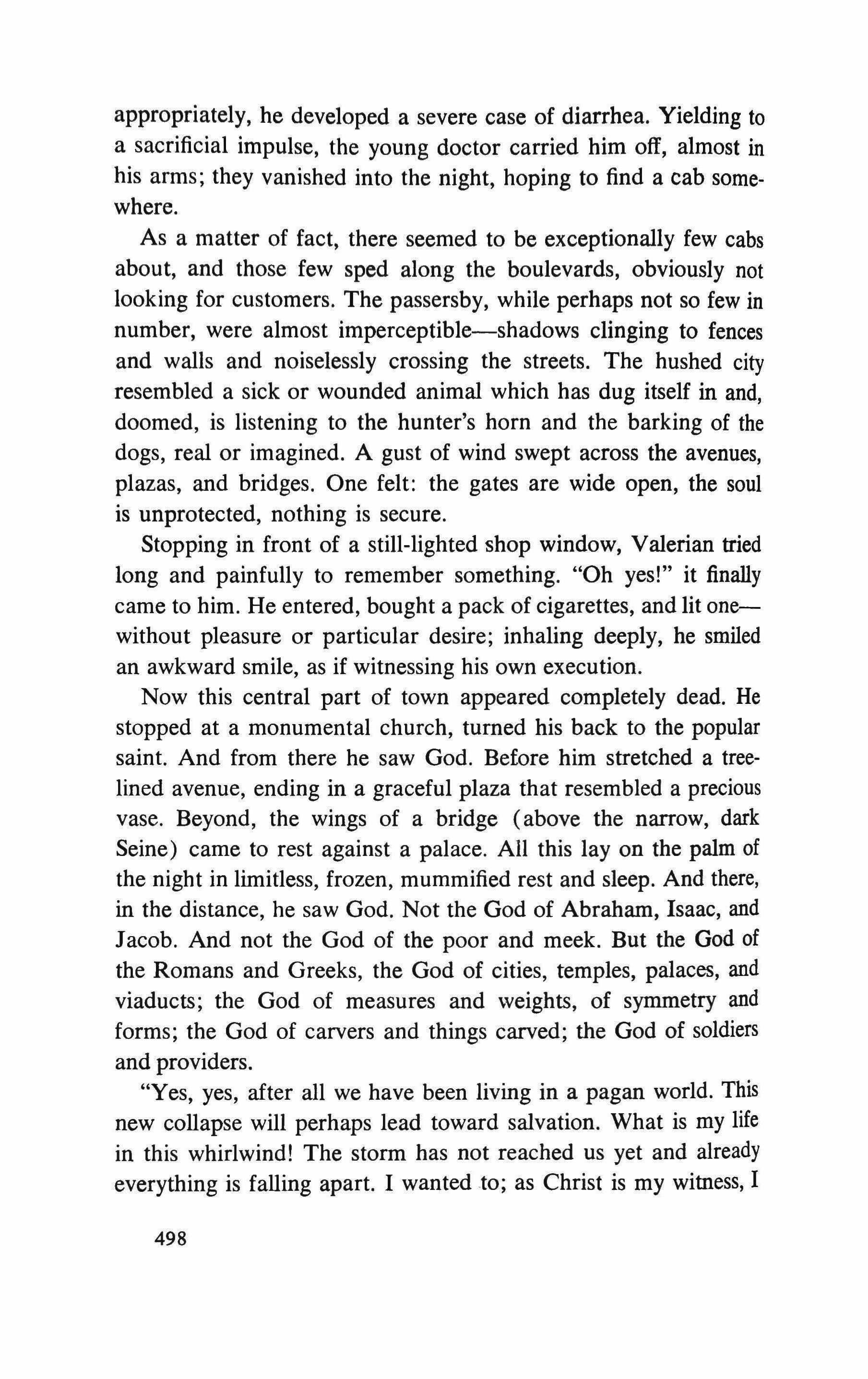
appropriately, he developed a severe case of diarrhea. Yielding to a sacrificial impulse, the young doctor carried him off, almost in his arms; they vanished into the night, hoping to find a cab somewhere.
As a matter of fact, there seemed to be exceptionally few cabs about, and those few sped along the boulevards, obviously not looking for customers. The passersby, while perhaps not so few in number, were almost imperceptible-shadows clinging to fences and walls and noiselessly crossing the streets. The hushed city resembled a sick or wounded animal which has dug itself in and, doomed, is listening to the hunter's horn and the barking of the dogs, real or imagined. A gust of wind swept across the avenues, plazas, and bridges. One felt: the gates are wide open, the soul is unprotected, nothing is secure.
Stopping in front of a still-lighted shop window, Valerian tried long and painfully to remember something. "Oh yes!" it finally came to him. He entered, bought a pack of cigarettes, and lit onewithout pleasure or particular desire; inhaling deeply, he smiled an awkward smile, as if witnessing his own execution.
Now this central part of town appeared completely dead. He stopped at a monumental church, turned his back to the popular saint. And from there he saw God. Before him stretched a treelined avenue, ending in a graceful plaza that resembled a precious vase. Beyond, the wings of a bridge (above the narrow, dark Seine) came to rest against a palace. All this lay on the palm of the night in limitless, frozen, mummified rest and sleep. And there, in the distance, he saw God. Not the God of Abraham, Isaac, and Jacob. And not the God of the poor and meek. But the God of the Romans and Greeks, the God of cities, temples, palaces, and viaducts; the God of measures and weights, of symmetry and forms; the God of carvers and things carved; the God of soldiers and providers.
"Yes, yes, after all we have been living in a pagan world. This new collapse will perhaps lead toward salvation. What is my life in this whirlwind! The storm has not reached us yet and already everything is falling apart. I wanted to; as Christ is my witness, I
498

tried," he declared solemnly. "But now everything is shaking and there is no stable point left. Why," Valerian decided all of a sudden, "it would even be a sin to look for one."
Greedily, hastily he smoked one cigarette after another, while a stream of joy spread through his body. "Against the Germans it will be tough, of course. If I'm lucky they'll send me to Austria or some such nation. It would be good to get to Hungary: the Tokay and the girls there are first class."
His very walk changed: liberated from an age-old burden, erect, putting all his muscles into play, he advanced with athletically soft steps, casting keen, brutal glances to all sides, as if already considering as his home any place where he would make a fire. He eyed the people who passed him under the lights. Womenlegs, hips; men-potential resistance. The elderly (and some occasional children) he contemptuously dismissed.
A feeling of lightness and tangible happiness invaded Valerian: how many complex adventures the future held in store for him! (A bear or an elephant probably experiences the same joy when his trainer takes the roller skates off him.) "I wanted to; as Christ is my witness, I tried," he still repeated mechanically from time to time.
The sky slowly brightened. Above, in the transparent, icy dome, innocent white clouds rushed about. There were no bombs yet, no searchlights or shell bursts, but the clouds were already scurrying in fright, circling aimlessly, pitifully around and around-perhaps for the reason that the wind, shifting at dawn, was striking at once from opposite directions.
translated by Isabella Levitin
499
from the novel American experience
v. s. YANOVSKY

The operation
The operation had been set for March third: at the doctor's apartment, under local anesthesia Sabina was to leave directly for home and stay in bed. Should she start hemorrhaging or should her temperature rise, they were to call some other doctor, preferably a competent one, or go straight to a hospital, but give away nothing.
"Yeu see," Sabina explained on the eve of the operation, "before the law I am as responsible as he is. Therefore we must keep quiet, whatever complications there are."
Bob thought, it would be enough to make the surgeons alone responsible, to put an end to the whole racket.
And the day came. At three o'clock in the afternoon Bob was impatiently pacing up and down a side street off Second Avenue. Wind, bitter cold. The sun shone more lazily than in February, dimly illuminating a fantastic landscape: a frost-burned citydull houses, flat roofs, factory smokestacks, and a man waiting for his beloved at the doorway of a dubious specialist.
500 TriQuarterly

Frozen and in despair, Bob prayed: "Make it fast. Let her come now and let it be finished!"
There she was, Sabina! In her short fur coat and the fur hood, looking like a child, like a schoolgirl: waiting for her at home would be her parents, cocoa, and David Copperfield.
Bob disappeared into the entrance hall, let her go past him, and then caught up with her and firmly grasped her arm; without stopping she walked on, swiftly and impassively.
They climbed the dark, neutral, untended staircase to the top floor of the squalid, seemingly deserted house. In New York there are many such houses: without a past, without a future, houses which do not arouse curiosity about their tenants.
Doctor Spart opened the door himself, cast a hostile look at Bob, murmured something in answer to their greeting, and led them through a long corridor, several large, bare rooms, and a few that were furnished but obviously not in use They ended up in a large, freshly whitewashed office with a gynecological table in the center and glass cabinets along the walls.
"Did you take a bath?" Spart asked. Bob answered, pulling himself up as before a commanding officer:
"Yes, Sir, she did."
"Get undressed!" And then: "It is understood, in case of complications you won't look for me; you won't find me anyhow Without wasting time you take her to a hospital. Right?"
"Yes," Bob agreed. "But I wanted to ask, couldn't she rest here for a couple of hours instead of going right away?
"No," Spart said, "she has to go home while the anesthetic is still working. Get undressed!"
He was heavyset, shaggy, grey, with an unshaven face that looked swollen from sleep. He went about distributing instruments, cotton, syringes-some to the right, some to the left, in accordance with what was obviously a definite, established routine.
"They were sterilized at the hospital," he explained. "It will be all right. Still, I don't understand why people refuse to have children."
Odd sounds-as of a grown person jumping on one bare foot?
501

-could be heard from behind the door. The doctor hurriedly ran out. "Lie down there. I won't be a minute," he said.
Sabina obediently lay down: in her sweater, half naked. And now she looked at Bob, for the first time all day, perhaps for the first time in many weeks-as if the scales had fallen from her eyes! He stood at the head of the table, a concentrated smile on his face; listening, it seemed, to an ever-growing, dull, accustomed pain. Close above her Sabina saw his eyes-the same as they used to be in moments of intense happiness. He had grey-blue eyes which, under the influence of a strong emotion, would change their shade brusquely, turn a deep blue. She recognized them and the feeling which they always aroused in her; there, before her, was what she needed most in life-generously gathered and offered! "Bob." He noticed the change in her expression, bent even closer, and began to whisper, rapidly, insistently:
"Remember, there is no inertia, no predestination, no fate. A Christian can begin allover at any moment, turn back, rectify, salvage. You can still jump off this wretched table-a free act of your great soul-the bridge is not yet burned!"
She did not listen and frowned in annoyance: why these speeches? His eyes were more convincing; they explained it better. How clumsy and childish he still was. But most of all he was hers -her own, her love.
"Let's go," exclaimed Sabina, suddenly coming to her senses. Holding his breath, his face distorted, he lifted her off the table, and, confusing the different garments, helped her dress.
"We are leaving," Bob said roughly as the doctor came back into the room. "I can take care of your expenses. Do you understand? We are leaving, there will be no operation!" he shouted angrily, for Spart did not answer.
"I understand," the doctor finally said and broke into an unexpected smile. But there was no one to appreciate this miracle: scrambling into their coats as they ran, pushing open the wrong doors, Bob and Sabina rushed out.
"This way, this way," Spart howled, protecting the inhabited rooms of his apartment from intrusion, "to the right. "
502

A misunderstanding
The slamming of the door told Spart how relieved they were to escape from his house.
Whistling something familiar and old-fashioned, he painstakingly cleared up the office, putting things back in their place and locking some of the instruments into a secret safe. For a man with such an oddly blown-up body, he moved quickly and lightly. He washed his hands for a long time under the faucet, only to wipe them dry with a torn, greasy towel. Then he went out, locking the office door. As he passed one of the rooms, he stopped and carefully looked in. There, curled up on her bed, the crumpled end of a blanket pressed to her bosom, lay his wife. As usual, she was gently rocking an imaginary creature to sleep. In her derangement, this piece of blanket represented her husband, although at the same time he was also high in a corner near the ceiling, to which spot she sent smiles and glances-a grey-haired, disheveled, unwashed, wrinkled woman with the happy eyes of a bride. Making kissing sounds, giggling bashfully, smiling coquettishly, wiggling her withered little body-this was how she flirted with her chosen one.
In silence Doctor Spart observed her from the threshold. It came to him for the first time in all the years of her derangement: there was a logic to his wife's illness! He, her husband, had not justified her love, hopes, expectations She had gone into another world, carrying along the ideal mate in her arms. He smiled. Such theories reassured him-regardless of the implications. He remembered another abortion-hers-in Europe. They were very young then, students. Although aware of all the difficulties, he wanted the child but she decided it was too soon. How far away it all was-and how near: alive still, painful. It happened in Vienna, before the war. But it could have been yesterday and in Shanghai. "If only we had had the wisdom and faith to run, to behave like this silly couple," he thought. (So will a dilettante chess player blame one move for the loss of a game-but give the move back to him and he will make a similar mistake right away!) "Yes, but events would have developed differently," Spart told
503

himself, "perhaps still not successfully, but at least unsuccessful in another way. For there could be nothing worse than my life. There simply has been no life."
The doctor moved on to his large, unaired, gloomy study filled to overflowing with a collection of seemingly superfluous objects. He felt a familiar pain in his heart and sat down on the sofa, pressing his hand to his chest. "This is how I am going to die some day," flashed through his mind. "Here. Alone. I shall be lying on this sofa or I shall slide down onto the rug. A day or two, perhaps more, will go by before anyone notices, knocks, breaks in the door. Police, witnesses One sees such pictures in the paper: overcome by fumes suicide coronary. Yes, that's how it will be. Not today, of course," he decided from habit, "but soon, very soon." He was massaging his chest with a sticky, bloated hand. The thought of death no longer frightened or outraged him. But he did like his quiet comfort, his peace. The room -unmade bed, dust, smells--only seemed to be in disorder; in fact he could immediately find anything he needed. And then, abruptly, he would be expected to move on from here, board a train in the middle of the night, jostle, with many changes, going somewhere-in the cold, with all the discomforts of travel: muddy coffee, hot dogs, rude conductors, arguments with customs officials This was how death now appeared to him: a questionable, difficult journey, fourth class, with an expired passport.
"They are fools, these children," he again remembered his runaway patients. "They will be sorry. But still and all-there ought to be more such fools."
Doctor Spart had studied in Vienna. He had wanted to practice surgery but slid gradually into doing abortions. Why? Any "honest" practice would have brought him no less! At the hearing his honorable colleagues denounced him, put him to shame. Honorable They did the same things but kept up appearances. Idealists! He, Spart, at least treated patients for free sometimes, at his own risk. But they would sell themselves for five dollars; they injected vitamins and hormones, cut out appendixes and
504

tonsils. Racketeers! One sort of racket is legal and the other not. That's all. But Brutus is an honorable man.
At the time, the board formally acquitted Spart. Laws. Bastards. There was not much reason for living. And it was not even worthwhile dying. "But this woman! One could love her! And the Negro. He had something in him. As if, bleeding from a cut artery, plugging it with a finger, he was continuing some deadly struggle. Stupid, but there is something attractive in stupidity. My handicap is rather the lack of stupidity. I believe it's the first time something like this has happened to me," Spart thought, and smiled again. "As long as they don't regret it and come back tomorrow."
For Spart, nighttime was painful. He went to bed early, at seven or so. He would awake around eleven, lie in the dark, listen to his heart and to himself, thinking his mirthless thoughts; would switch on the light, leaf through a book, play chess with an imaginary friend, walk about the apartment, bring his wife water or an apple, again stretch out on the sofa to remember and curse invisible foes and detractors. Toward morning he would sink into a fitful, unhealthy sleep.
His yellow, puffed face resting high on a pillow, Spart was just about to reach for a second phenobarbital when there was a shrill ring, followed by loud thumping. Spart clutched the ends of his bathrobe together with shaking hands and rushed toward the door, turning on every light along the way. Uncertain of his voice, he opened the door without a word and saw Robert Caster standing on the threshold.
"Doctor," Bob said, out of breath, "please, doctor-a hemorrhage."
Spart led his visitor to a chair, sat him down, and asked him to explain coherently what had happened
Suddenly, for no apparent reason, Sabina had felt ill; Bob had been trying some home remedies when he saw that she was lying in a pool of blood. "Save her," Bob implored. "Use all that life and science have taught you. After all, it cannot have been an accident that we came to you!"
505

"You want me to treat your wife?"
"She is not yet my wife."
"That makes no difference. But do I understand you correctly: you did not come back for an abortion?"
"Of course not! We must save them."
"Wait for me," the doctor said softly. "Give me five minutes," and, throwing off his robe, he began to dress. Grey, large, barrelchested, he looked impressive, and even his beard-those straggly, disheveled strands-was no longer repulsive or frightening. His entire air-strict, prophetic-inspired confidence. "I am coming," he muttered. "What is five minutes? 1 have been waiting for you all my life-and you cannot wait five minutes! 1 will deliver this baby! 1 will pull him out with pincers! I'll be his godfather, do you understand? You can't stop me, young man!" He took a threatening step toward Bob. "If you only knew what sometimes happens in life, young man and he burst into tears: awkwardly, grimacing helplessly.
translated
by Isabella Levitin in collaboration with the author
506
Alla Ktorova: a new face
OLGA HUGHES

AlIa Ktorova belongs to the generation of writers now associated with the early post-Stalinist years, but her literary biography is considerably different from that of her more illustrious contemporaries. With the remarkable exception of Alexander Solzhenitsyn, success generally came to the younger prose writers of that generation more slowly than it did to the poets. Unlike the poets, they could not recite their works before the thousands in Mayakovsky Square; new prose works are disseminated through underground channels in the Soviet Union and are thus at a disadvantage in comparison to verse. In addition, Alla Ktorova started publishing only in the sixties, and, what is more important, not in Russia, but in the West. The situation of Russian letters being what it is, contemporary Russian literature is rarely judged on its purely literary merits, and even the best known and most established writers lose the greater part of their appeal for a Western reader as soon as they find themselves in the West. In Alla Ktorova's case there are two more reasons for her work being very little known in the West: she is not overly concerned with politics (as
TriQuarterly 507
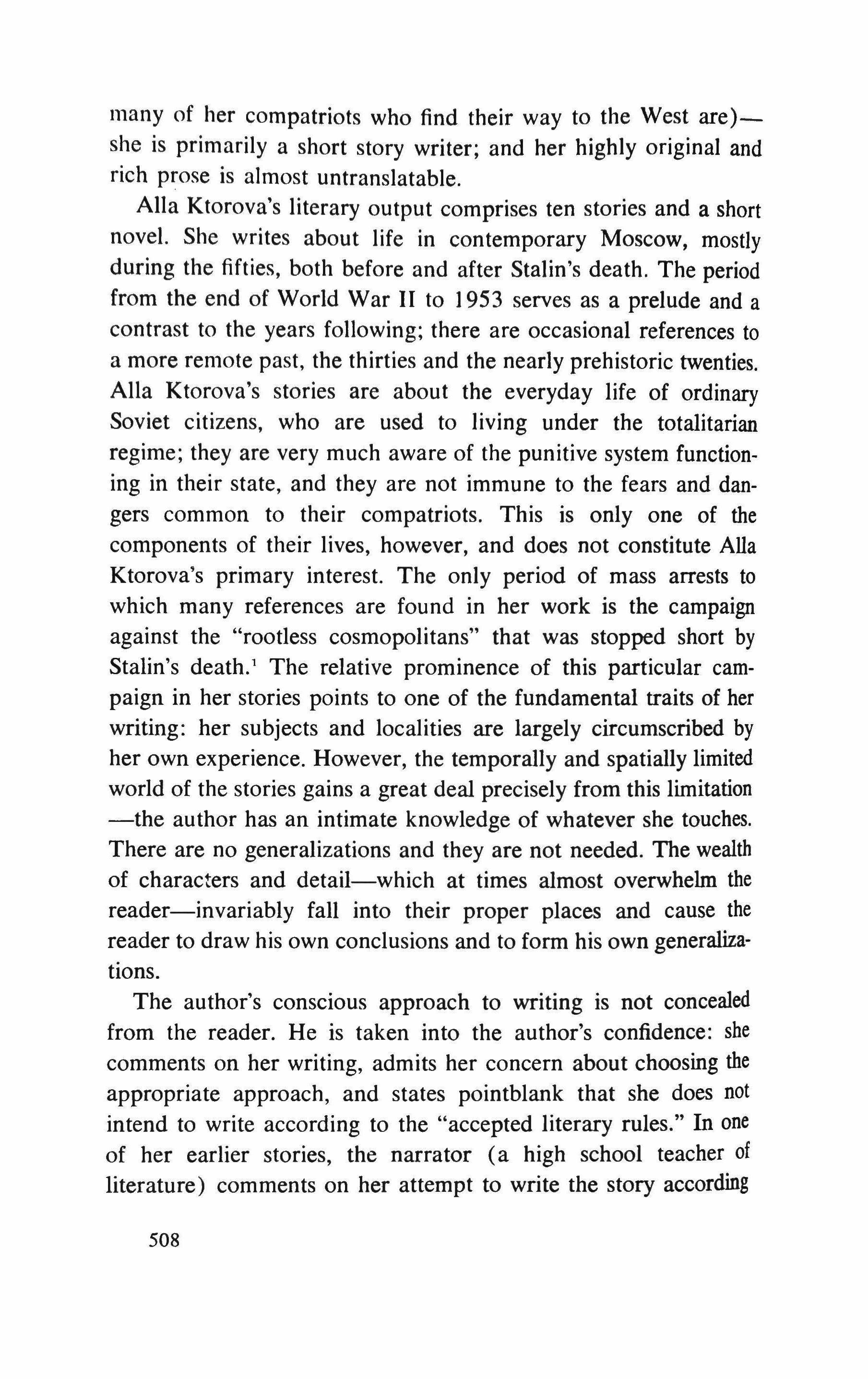
many of her compatriots who find their way to the West are)she is primarily a short story writer; and her highly original and rich prose is almost untranslatable.
Alia Ktorova's literary output comprises ten stories and a short novel. She writes about life in contemporary Moscow, mostly during the fifties, both before and after Stalin's death. The period from the end of World War II to 1953 serves as a prelude and a contrast to the years following; there are occasional references to a more remote past, the thirties and the nearly prehistoric twenties.
Alia Ktorova's stories are about the everyday life of ordinary Soviet citizens, who are used to living under the totalitarian regime; they are very much aware of the punitive system functioning in their state, and they are not immune to the fears and dangers common to their compatriots. This is only one of the components of their lives, however, and does not constitute Alla Ktorova's primary interest. The only period of mass arrests to which many references are found in her work is the campaign against the "rootless cosmopolitans" that was stopped short by Stalin's death.' The relative prominence of this particular campaign in her stories points to one of the fundamental traits of her writing: her subjects and localities are largely circumscribed by her own experience. However, the temporally and spatially limited world of the stories gains a great deal precisely from this limitation -the author has an intimate knowledge of whatever she touches. There are no generalizations and they are not needed. The wealth of characters and detail-which at times almost overwhelm the reader-invariably fall into their proper places and cause the reader to draw his own conclusions and to form his own generalizations.
The author's conscious approach to writing is not concealed from the reader. He is taken into the author's confidence: she comments on her writing, admits her concern about choosing the appropriate approach, and states pointblank that she does not intend to write according to the "accepted literary rules." In one of her earlier stories, the narrator (a high school teacher of literature) comments on her attempt to write the story according
508
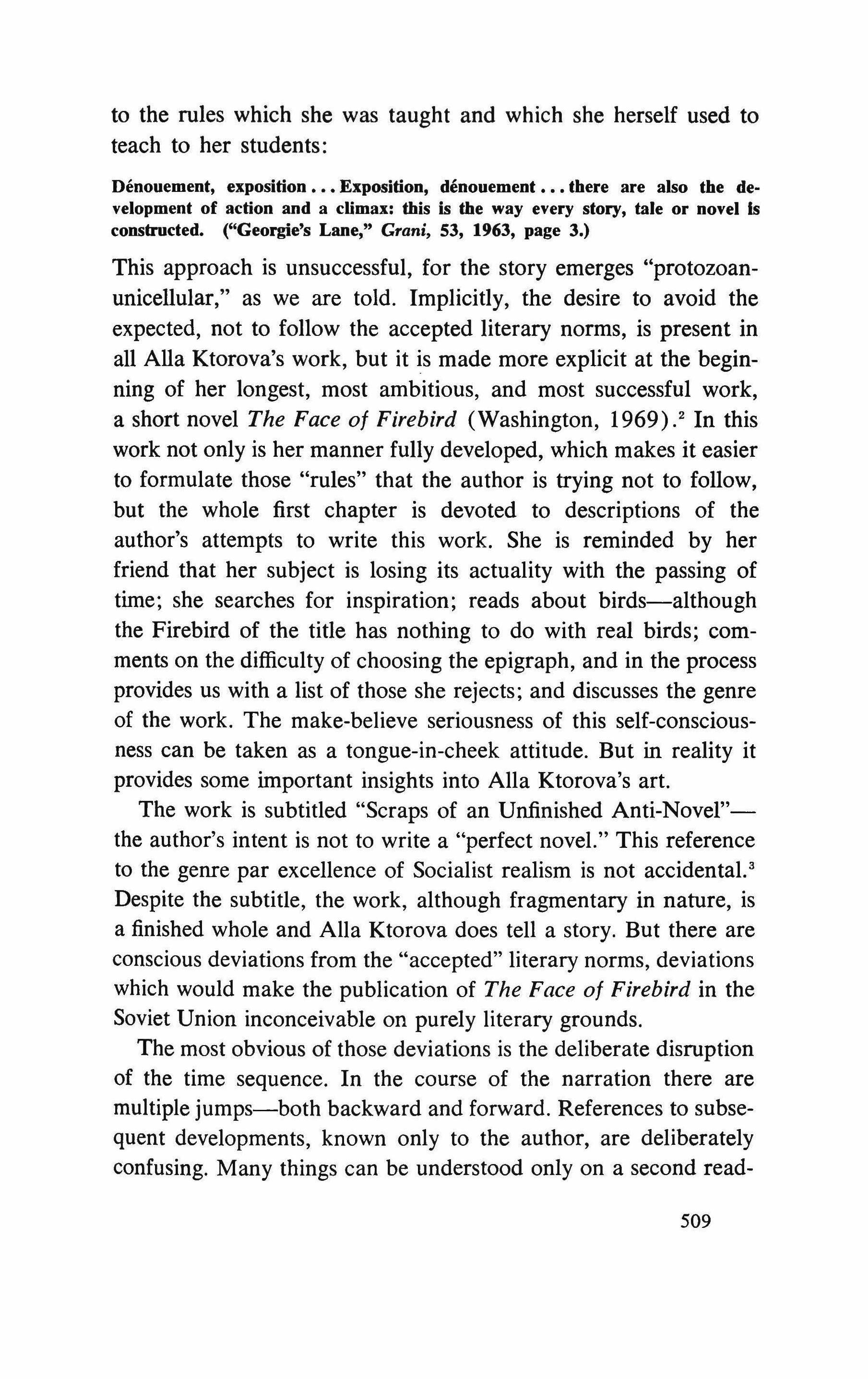
to the rules which she was taught and which she herself used to teach to her students:
Denouement, exposition
Exposition, denouement there are also the development of action and a cUmax: this is the way every story, tale or novel Is constructed. ("Georgie's Lane," Grani, 53, 1963, page 3.)
This approach is unsuccessful, for the story emerges "protozoanunicellular," as we are told. Implicitly, the desire to avoid the expected, not to follow the accepted literary norms, is present in all Alla Ktorova's work, but it is made more explicit at the beginning of her longest, most ambitious, and most successful work, a short novel The Face of Firebird (Washington, 1969).2 In this work not only is her manner fully developed, which makes it easier to formulate those "rules" that the author is trying not to follow, but the whole first chapter is devoted to descriptions of the author's attempts to write this work. She is reminded by her friend that her subject is losing its actuality with the passing of time; she searches for inspiration; reads about birds-although the Firebird of the title has nothing to do with real birds; comments on the difficulty of choosing the epigraph, and in the process provides us with a list of those she rejects; and discusses the genre of the work. The make-believe seriousness of this self-consciousness can be taken as a tongue-in-cheek attitude. But in reality it provides some important insights into AlIa Ktorova's art.
The work is subtitled "Scraps of an Unfinished Anti-Novel"the author's intent is not to write a "perfect novel." This reference to the genre par excellence of Socialist realism is not accidental. 3 Despite the subtitle, the work, although fragmentary in nature, is a finished whole and Alla Ktorova does tell a story. But there are conscious deviations from the "accepted" literary norms, deviations which would make the publication of The Face of Firebird in the Soviet Union inconceivable on purely literary grounds.
The most obvious of those deviations is the deliberate disruption of the time sequence. In the course of the narration there are multiple jumps-both backward and forward. References to subsequent developments, known only to the author, are deliberately confusing. Many things can be understood only on a second read509
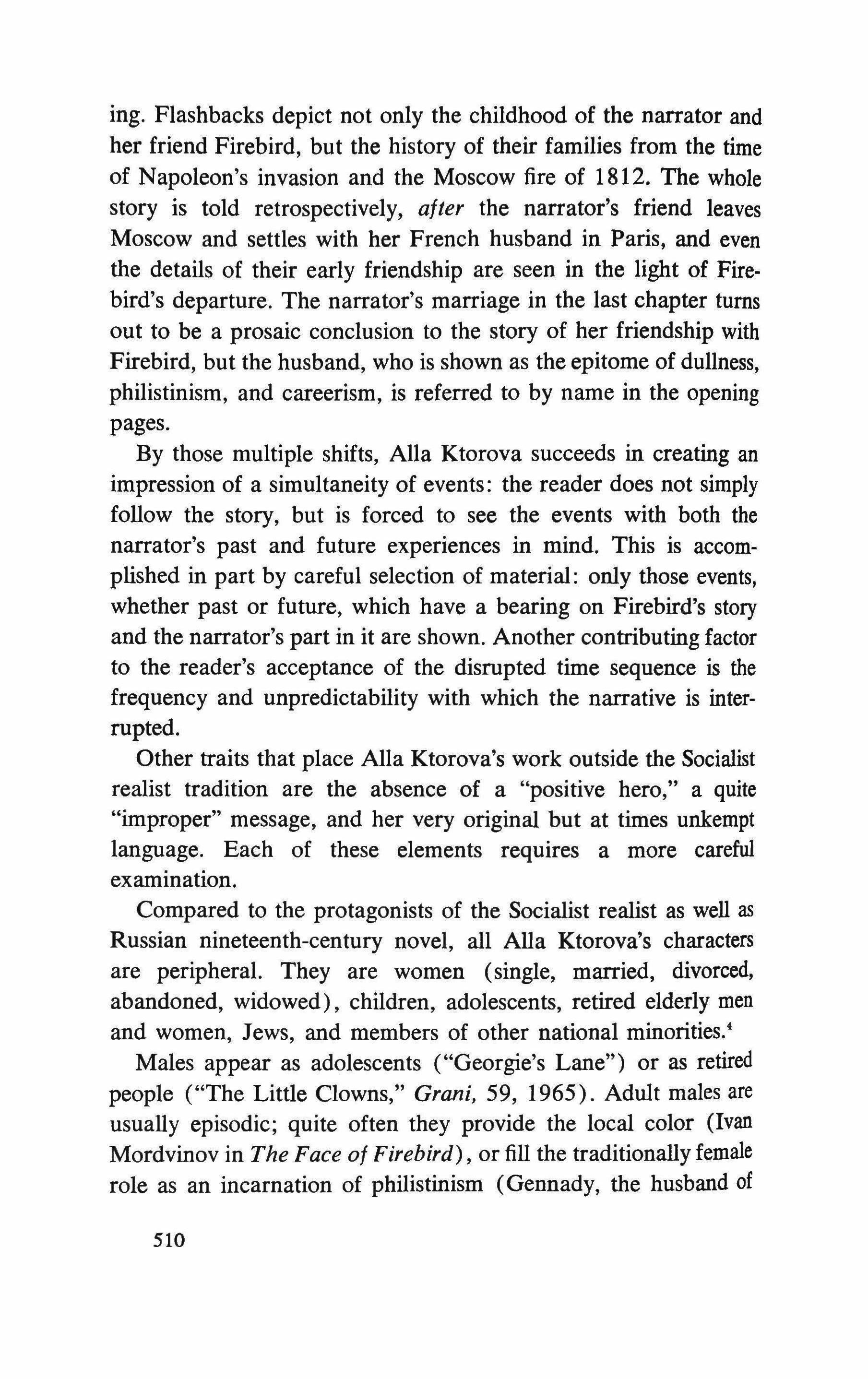
ing. Flashbacks depict not only the childhood of the narrator and her friend Firebird, but the history of their families from the time of Napoleon's invasion and the Moscow fire of 1812. The whole story is told retrospectively, after the narrator's friend leaves Moscow and settles with her French husband in Paris, and even the details of their early friendship are seen in the light of Firebird's departure. The narrator's marriage in the last chapter turns out to be a prosaic conclusion to the story of her friendship with Firebird, but the husband, who is shown as the epitome of dullness, philistinism, and careerism, is referred to by name in the opening pages.
By those multiple shifts, AlIa Ktorova succeeds in creating an impression of a simultaneity of events: the reader does not simply follow the story, but is forced to see the events with both the narrator's past and future experiences in mind. This is accomplished in part by careful selection of material: only those events, whether past or future, which have a bearing on Firebird's story and the narrator's part in it are shown. Another contributing factor to the reader's acceptance of the disrupted time sequence is the frequency and unpredictability with which the narrative is interrupted.
Other traits that place AlIa Ktorova's work outside the Socialist realist tradition are the absence of a "positive hero," a quite "improper" message, and her very original but at times unkempt language. Each of these elements requires a more careful examination.
Compared to the protagonists of the Socialist realist as well as Russian nineteenth-century novel, all Alla Ktorova's characters are peripheral. They are women (single, married, divorced, abandoned, widowed), children, adolescents, retired elderly men and women, Jews, and members of other national minorities.'
Males appear as adolescents ("Georgie's Lane") or as retired people ("The Little Clowns," Grani, 59, 1965). Adult males are usually episodic; quite often they provide the local color (Ivan Mordvinov in The Face of Firebird), or fill the traditionally female role as an incarnation of philistinism (Gennady, the husband of
510
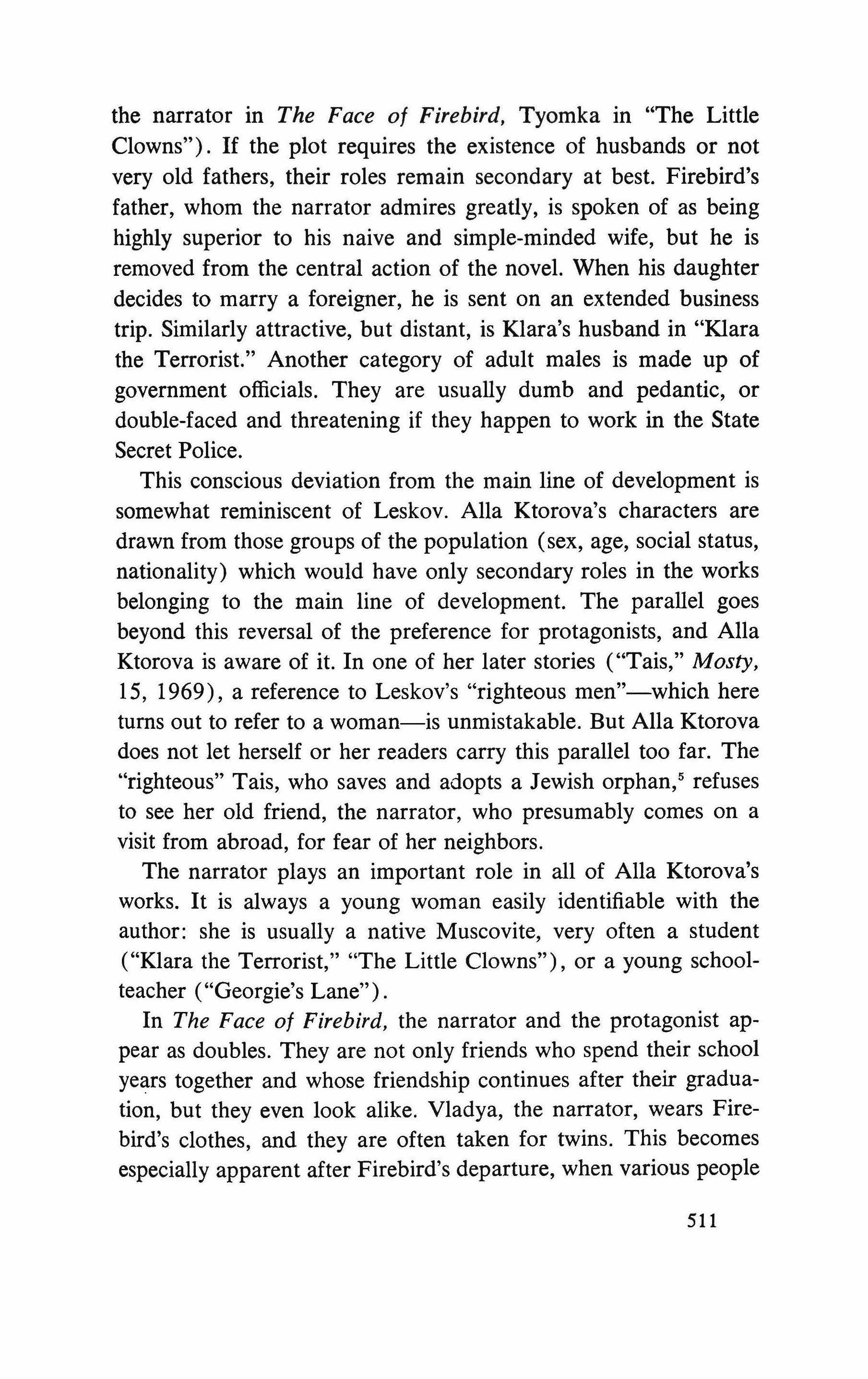
the narrator in The Face of Firebird, Tyomka in "The Little Clowns"). If the plot requires the existence of husbands or not very old fathers, their roles remain secondary at best. Firebird's father, whom the narrator admires greatly, is spoken of as being highly superior to his naive and simple-minded wife, but he is removed from the central action of the novel. When his daughter decides to marry a foreigner, he is sent on an extended business trip. Similarly attractive, but distant, is Klara's husband in "Klara the Terrorist." Another category of adult males is made up of government officials. They are usually dumb and pedantic, or double-faced and threatening if they happen to work in the State Secret Police.
This conscious deviation from the main line of development is somewhat reminiscent of Leskov. Alla Ktorova's characters are drawn from those groups of the population (sex, age, social status, nationality) which would have only secondary roles in the works belonging to the main line of development. The parallel goes beyond this reversal of the preference for protagonists, and Alla Ktorova is aware of it. In one of her later stories ("Tais," Mosty, 15, 1969), a reference to Leskov's "righteous men"-which here turns out to refer to a woman-is unmistakable. But Alla Ktorova does not let herself or her readers carry this parallel too far. The "righteous" Tais, who saves and adopts a Jewish orphan," refuses to see her old friend, the narrator, who presumably comes on a visit from abroad, for fear of her neighbors.
The narrator plays an important role in all of Alla Ktorova's works. It is always a young woman easily identifiable with the author: she is usually a native Muscovite, very often a student ("Klara the Terrorist," "The Little Clowns"), or a young schoolteacher ("Georgie's Lane").
In The Face of Firebird, the narrator and the protagonist appear as doubles. They are not only friends who spend their school years together and whose friendship continues after their graduation, but they even look alike. Vladya, the narrator, wears Firebird's clothes, and they are often taken for twins. This becomes especially apparent after Firebird's departure, when various people 511

mistake Vladya, the narrator, for Nika, the Firebird. It can be conjectured that some autobiographical material was used for both Firebird and Vladya (AHa Ktorova worked as an interpreter and married an American tourist; moreover, her first name is Victoria, which brings her even closer to Firebird, whose Christian nameNika-is the Greek version of victory), which would justify this partial identification. The same device is used in one of the stories ("The Little Clowns"), where the narrator at one point merges with the central character. This merging, or rather splitting the autobiographical character in two, gives the author a possibility of utilizing both the first- and the third-person narration.
A multitude of episodic characters in AHa Ktorova's stories helps create an "atmosphere" of the surrounding life. Some friends and neighbors in the communal apartments materialize only in order to listen to the main characters talk, or to provide the support for the "accepted" view with a few words, or to enable the author to contrast the "uneducated" vs. "educated" manner of speech. Those characters are usually given names, and some colorful details about them are included. One character is brought in only to tell the narrator of the increasing danger of Firebird's situation: he identifies himself by name and whispers his warning, after which he disappears never to appear again.
It is not unexpected that as a consequence of the near-banishment of males from AlIa Ktorova's world, love interest is also either absent from her stories or comes in only peripherally. This should be added to the "deviations" from the traditional novel. Firebird and Vladya are "in love with love," and that does not require the presence of significant male characters. We are not led to believe, however, that love does not exist in the lives of the characters---only that, in the period of their lives on which the author chooses to concentrate, it does not occupy an important place. In most of Alla Ktorova's stories the place of prominence is given to friendship between young females, one of whom is invariably the narrator. In some of the stories, the narrator's friend and protagonist is an older woman ("Tais," "The Abominable Snowman").
512

The central episode in The Face of Firebird (if there is such a thing as a central episode here) is Firebird's departure from Moscow. She marries a Frenchman with whom she is supposedly madly in love. It is her love that helps her to overcome all the difficulties placed in her way by Soviet bureaucracy. But her French husband is no more than a deus ex machina. He appears in the flesh only at the airport just before Nika boards a plane for Paris.
Some time after the dramatic events of Firebird's marriage and departure from Russia, the narrator marries also. If Firebird's marriage was right out of a fairy tale (marrying a foreigner, a Frenchman, and leaving with him for Paris!), Vladya's is robbed of all excitement and romance. She decides to marry because her aunt and her friends think that she should (a highly improbable development, given Vladya's character, ability, and achievement). The man she marries is looking for a wife because he has reached that age and position in life when he can not only afford to marry, but when married status as such can bring certain advantages, particularly the possibility of being allowed to travel abroad. The husband is shown as a careerist and an opportunist. This marriage is provided with all the stock disadvantages, the foremost of them being the mother-in-law who comes from the provinces for extended visits.
Not long after her wedding, Vladya collects her belongings and goes back to her aunt; but at the very end of the novel there is a tentative, projected reconciliation with her husband. The author's view penetrates the future: she will not only return to her husband, but is seen in her later role of a well-to-do, overdressed, and overfed woman (it is clear that the dull husband proved to be a success in this respect), who is overprotective of her small child. This is only a projected conclusion, for actually we don't know what happens to the narrator and the protagonist in the end, but Alla Ktorova likes to point out different possibilities.
AHa Ktorova is a pastmaster at depicting the nuances of the change from adolescence to young adulthood, the process which is often accompanied by an increased attachment to material
513
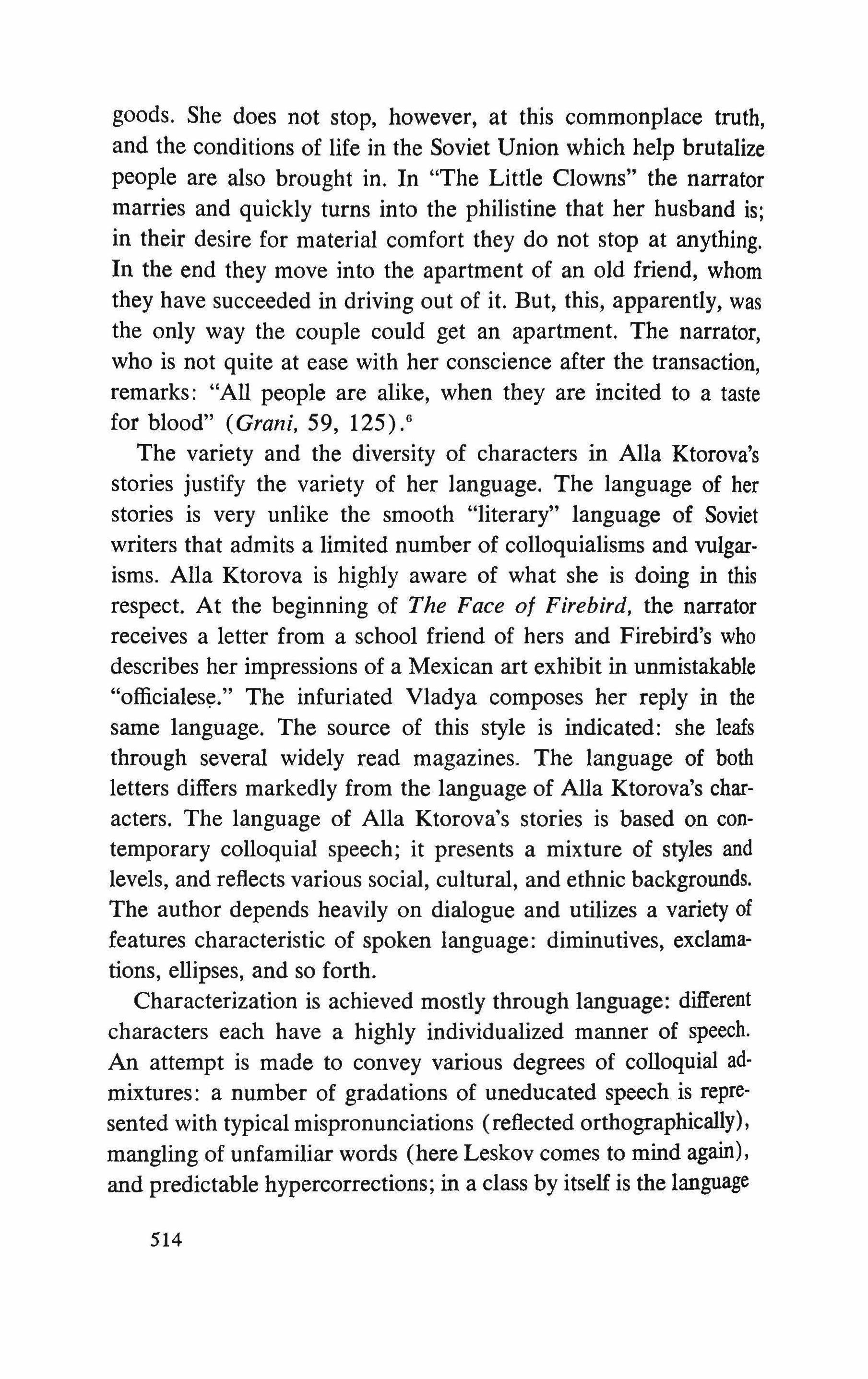
goods. She does not stop, however, at this commonplace truth, and the conditions of life in the Soviet Union which help brutalize people are also brought in. In "The Little Clowns" the narrator marries and quickly turns into the philistine that her husband is; in their desire for material comfort they do not stop at anything. In the end they move into the apartment of an old friend, whom they have succeeded in driving out of it. But, this, apparently, was the only way the couple could get an apartment. The narrator, who is not quite at ease with her conscience after the transaction, remarks: "All people are alike, when they are incited to a taste for blood" (Grani, 59, 125).6
The variety and the diversity of characters in Alla Ktorova's stories justify the variety of her language. The language of her stories is very unlike the smooth "literary" language of Soviet writers that admits a limited number of colloquialisms and vulgarisms. AlIa Ktorova is highly aware of what she is doing in this respect. At the beginning of The Face of Firebird, the narrator receives a letter from a school friend of hers and Firebird's who describes her impressions of a Mexican art exhibit in unmistakable "officialese." The infuriated Vladya composes her reply in the same language. The source of this style is indicated: she leafs through several widely read magazines. The language of both letters differs markedly from the language of Alla Ktorova's characters. The language of AHa Ktorova's stories is based on contemporary colloquial speech; it presents a mixture of styles and levels, and reflects various social, cultural, and ethnic backgrounds. The author depends heavily on dialogue and utilizes a variety of features characteristic of spoken language: diminutives, exclamations, ellipses, and so forth.
Characterization is achieved mostly through language: different characters each have a highly individualized manner of speech. An attempt is made to convey various degrees of colloquial admixtures: a number of gradations of uneducated speech is represented with typical mispronunciations (reflected orthographically), mangling of unfamiliar words (here Leskov comes to mind again), and predictable hypercorrections; in a class by itself is the language
514

of uneducated Jews. In all these categories, a very clear distinction between the generations is made: the incorrect usage is typical of the old and the uneducated, and it either upsets or amuses their children (the mother in "Klara the Terrorist" mixes up the grammatical cases, and one of her daughters patiently corrects her through the years without any visible results). Another widely represented subdivision is the contemporary slang, which is used mostly by the young. Needless to say, most of these distinctions are lost in translation. Another feature of contemporary spoken Russian-the use of generally accepted and understood abbreviations (usually for various government offices and institutions) is also well represented. The degree of its acceptance in the language is demonstrated by the fact that many of the abbreviations are inflected.
One of the sources of the exceptional variety of AlIa Ktorova's language is her use of names. The form of address in Russian (the use of patronymics and the variety of diminutives) can convey the minute nuances of the relationship between the speakers. Here Alla Ktorova displays an astounding virtuosity: in her stories, names are made to reflect upon the social origin and education of the speaker (Evdeniya Yuryevna), and even on the political climate of the times.' In translation, this variety of names, although serving a definite purpose in the original, can only confuse the reader. The narrator's name is "Vladilena" (a contraction of Vladimir Lenin), but she is more often addressed as "Vladya," "Vladenka," and at times "Vladka" or "Vlad." At one point her name and patronymic-"Vladilena Mikhailovna"-are used. In the case of the protagonist of The Face of Firebird, the use of various forms of her name goes beyond the mere display of the author's virtuosity.
In general, Alla Ktorova's stories abound in literary references and quotations ("The Little Clowns" especially). This is also true of The Face of Firebird. Some of the quotations are identified; others are easily identifiable. There are many which provide only a glimpse, or a hint, of a certain literary association. There are many quotations from popular songs, both Soviet and pre-Revolu515
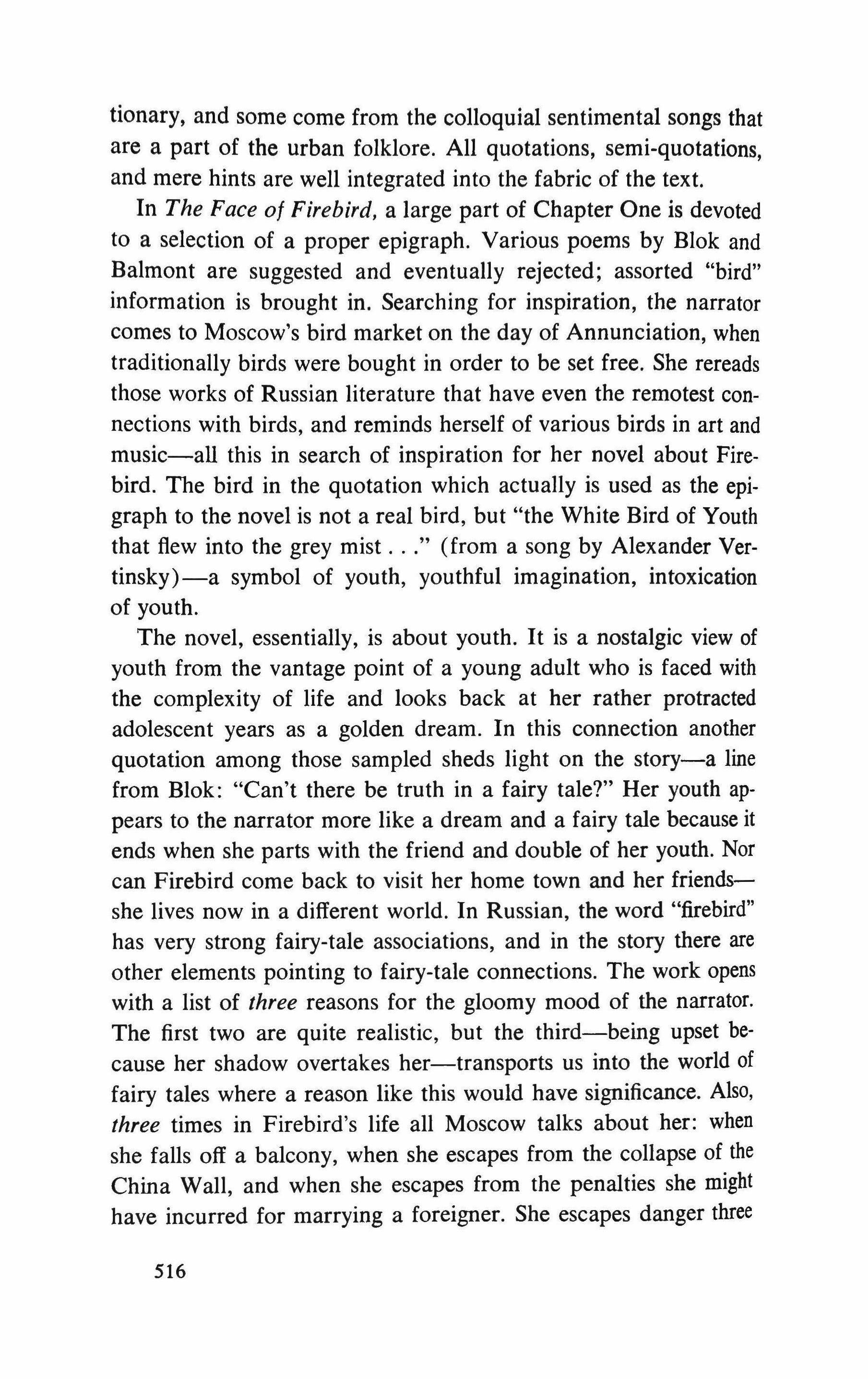
tionary, and some come from the colloquial sentimental songs that are a part of the urban folklore. All quotations, semi-quotations, and mere hints are well integrated into the fabric of the text.
In The Face of Firebird, a large part of Chapter One is devoted to a selection of a proper epigraph. Various poems by Blok and Balmont are suggested and eventually rejected; assorted "bird" information is brought in. Searching for inspiration, the narrator comes to Moscow's bird market on the day of Annunciation, when traditionally birds were bought in order to be set free. She rereads those works of Russian literature that have even the remotest connections with birds, and reminds herself of various birds in art and music-all this in search of inspiration for her novel about Firebird. The bird in the quotation which actually is used as the epigraph to the novel is not a real bird, but "the White Bird of Youth that flew into the grey mist (from a song by Alexander Vertinsky)-a symbol of youth, youthful imagination, intoxication of youth.
The novel, essentially, is about youth. It is a nostalgic view of youth from the vantage point of a young adult who is faced with the complexity of life and looks back at her rather protracted adolescent years as a golden dream. In this connection another quotation among those sampled sheds light on the story-a line from Blok: "Can't there be truth in a fairy tale?" Her youth appears to the narrator more like a dream and a fairy tale because it ends when she parts with the friend and double of her youth. Nor can Firebird come back to visit her home town and her friendsshe lives now in a different world. In Russian, the word "firebird" has very strong fairy-tale associations, and in the story there are other elements pointing to fairy-tale connections. The work opens with a list of three reasons for the gloomy mood of the narrator. The first two are quite realistic, but the third-being upset because her shadow overtakes her-transports us into the world of fairy tales where a reason like this would have significance. Also, three times in Firebird's life all Moscow talks about her: when she falls off a balcony, when she escapes from the collapse of the China Wall, and when she escapes from the penalties she might have incurred for marrying a foreigner. She escapes danger three
516

times and proves to be victorious, as could have been predicted-by her name.
Alla Ktorova's characters are neither "building socialism" nor are they moving toward a "bright future." If anything is idealized in The Face of Firebird, it is the protagonist's and the narrator's youth-viewed retrospectively. Both the present and the future do not seem to have much excitement in store: the life of an adult is filled with responsibilities; whether happy or unhappy, successful or not, it is different from the exhilarating and intoxicating adolescent years of Firebird and Vladya. The narrator's gloomy mood at the beginning of the novel is largely due to her longing for her past. Her love for Moscow-its history, architecture, people-and her thoughts about her Moscow forebears serve as a strong connecting link between the past and the present in the novel. As a child she was discovering Moscow, unconsciously assembling piece by piece her Moscow which now, as an adult, she loves, and she is conscious of this love.
The reader learns many diverse facts and details of the everyday existence of Alla Ktorova's characters, among them a search for "living space" in overcrowded Moscow; a detailed description of new transistor radios made in the U.S.S.R. and said to be better than the foreign ones; doubts of the girl at the loan desk of the Lenin Library whether the books by Bruno Jasienski can be given out to someone without a special authorization; and the relations between neighbors in a communal apartment. Such seemingly unpretentious descriptions tell the reader a lot about the reality of life in present-day Russia. The class distinctions in a "classless society" are conveyed by humorous genre scenes: the Zharovs' maid is very much opposed to Firebird's new friendship with Vladya, a child of lower social standing; Aunt Dashonka and her friends pronounce judgment on the intelligentsia's strange habit of not going to the public baths. The author does not write all this off as the "survivals of the past," for in the closing chapter, the projected view of the narrator shows her preventing her own child from playing with the children of a lower social rank.
Almost casually, the narrator's past and the misfortunes of her family are recounted: the father, a class-conscious worker and a
517

Proletarian poet, "disappeared" in the thirties; the mother died soon after; the younger boy was sent to a state children's home; the daughter-the narrator-was taken in by her father's cousin, the young childless widow Dashonka. As usual, Alla Ktorova does not elaborate; the information is conveyed without emphasis or overstatement.
Sometime in the late fifties, the narrator and her aunt move to a new apartment. The description of the housewarming party includes the chatter of Vladya's friends from which the reader learns that the apartment was a part of reparations paid during Khrushchev's de-Stalinization program to the families of the "illegally repressed." Typically understated, it is a savage passage: most of Vladya's friends are in the same situation-they are comparing notes and rejoicing because justice has been done to them and because their living conditions have improved considerably. But there is something spine-chilling about this scene of the happy chatter of a group of young people on the graves of their fathers: the natural egotism of youth appears here as truly cynical and brutal. Vladya's father actually returns from the labor camp. The daughter does not recognize the father; he tries to take the situation lightly, attempts to joke, but breaks down. This highly emotional scene is saved from becoming sentimental by a comic touch -the inclusion of sincere, but almost ridiculously "colloquial," remarks of the aunt and her friend.
A description of the simple comforts of Vladya's new apartment (it is always warm, and they share it only with one other person) merges imperceptibly into a comment on her pleasure in her new furniture: "I love to sit at home alone and listen to occasional creaks of my new furniture: Czechoslovak couch-bed, Finnish desk (The Face of Firebird, p. 18). Do the "occasional creaks" reflect upon the quality of the furniture? Does the fact that it is not made in the U.S.S.R. convey something about the domestic production of furniture or Soviet trade relations? Or is the country of its origin mentioned simply in order to add to the precision of the description? One thing is clear: by not sparing Vladya, AlIa Ktorova confirms the nearly universal rule that the desire for a reasonably comfortable existence easily turns into a
518

materialistic attachment to creature comforts and an appetite for acquisition. A description of Vladya's new living quarters becomes a comment on the human condition in general.
The story of Firebird's marriage and departure-besides reminding the reader of the well-known facts that, under Stalin, marriage to a foreigner was considered treason and that, in postStalinist times, exit visas are not granted automatically-brings in some highly instructive information. Of her friends, it is only Vladya and her mother's friend Syusya who bravely continue to see Firebird after her plan to marry a Frenchman is revealed. Her other intellectual friends have reasons to fear for their own safety. Vladya remains steadfast in her devotion to Firebird, although she is called in to the State Secret Police and not too subtly reminded that her father was only recently rehabilitated. The interior decorator Syusya by chance happens to be working in the apartment of a relative of some highly placed official and uses this opportunity to plead her friend's cause. But it is the help of Vladya's picturesque nonintellectual friends that proves to be decisive. The jobs of Frau Olga, Tolka the Hero, and Ivan Mordvinov place them close to those in power: Frau Olga works in an Intourist hotel, Tolka the Hero is a chauffeur for some official in the State Secret Police, Ivan works on a special farm that supplies fresh produce to the summerhouses of the top state officials. The implication is that all three are trusted by the state. They not only have access to those who can help Firebird, but are very conscious of their power and speak of it in terms of "human rights."
Despite the general fragmentation, there are never any loose ends in AlIa Ktorova's stories: the long and numerous digressions do not prevent the author from returning to the temporarily abandoned line. The result of interrelating various episodes, characters, and above all the narrator's past and present can be compared to an intricately woven braid, where the bright golden thread of past youth and friendship is just as noticeable as the dark grey of the present of adult chores, responsibilities, and relationships. There is also a multi-colored thread of the author's sparkling humor and sharp observation of detail, and an ironic one-whatever color the reader chooses to assign to it. The ostensibly isolated
519

segments of various threads fall into a pattern-it is not accidental that the pointillist technique in painting is mentioned early in the novel.
AHa Ktorova's work deserves more attention from the Western reader (Russian emigre critics have praised it unanimously); it is tempting to conjecture what direction her writing will take in the future. The possibilities are many, but fortune-telling is a precarious occupation. It is better to end with a wish of success to a very promising writer. As for prediction, we should not worry; we have a pledge in Alla Ktorova's "literary face," which like the face of Firebird has many expressions-some foreseeable, others quite unexpected.
Notes
I. The story "Klara the Terrorist" (published in the Russian-language magazine Tire New Review [New York], 63, 1961) has the protagonist appear in two chronologically and psychologically well-defined periods-before and after her arrest and labor-camp term in the early fifties.
All the stories of Alia Ktorova were published in Russian. As far as I know, only one, "My Sister's Applegarth," appeared in English translation, in the collection Russia's Other Writers (New York, 1971).
2. This article is primarily devoted to that work; whenever other stories are referred to, the source is given in the text.
3. This subtitle is hardly acceptable to any orthodox and cliche-ridden mind: in a recent catalogue of the very publishing house from which Alia Ktorova's novel appeared, it was listed as "Sketches of an Unfinished Novel." If accidental, the change demonstrated an automatic translation into more acceptable terms. Ocherki ("sketches") for obryvki ("scraps") perhaps was looked upon as a "correction" of a "misprint."
4. Here Alia Ktorova also surprises her readers. because it is not the Jewish intellectuals that attract her attention (although, to be sure, one can find some in her stories), but the older and the uneducated ones, the more picturesque types. The most striking among them is the protagonist of "The Abominable Snowman" (Grani, 67, 1968)-a Jewess who is a kindhearted thief and blackmarketeer.
5. This is reciprocated by the Jewish protagonist of "The Abominable Snowman," who adopts a not very attractive Russian boy and showers him, and eventually his family, with her love.
6. "My Sister'S Applegarth" (originally in Grani, 55, 1964) explores various "Iegal"-and rather unexpected-ways of procuring an apartment, or, more properly, "living space."
7. The protagonist of "The Abominable Snowman" changes her name during Stalin's anti-Semitic campaign of the early fifties from Fruma Moiseevna to Grunya Alekseevna. The two components of the new name by themselves are very Russian, the first name having a definite "folksy" ring. But the combination (a diminutive followed by a patronymic) betrays both her Jewish origin and her lack of education.
520
The face of Firebird: scraps of an unfinished anti-novel ALLA KTOROVA
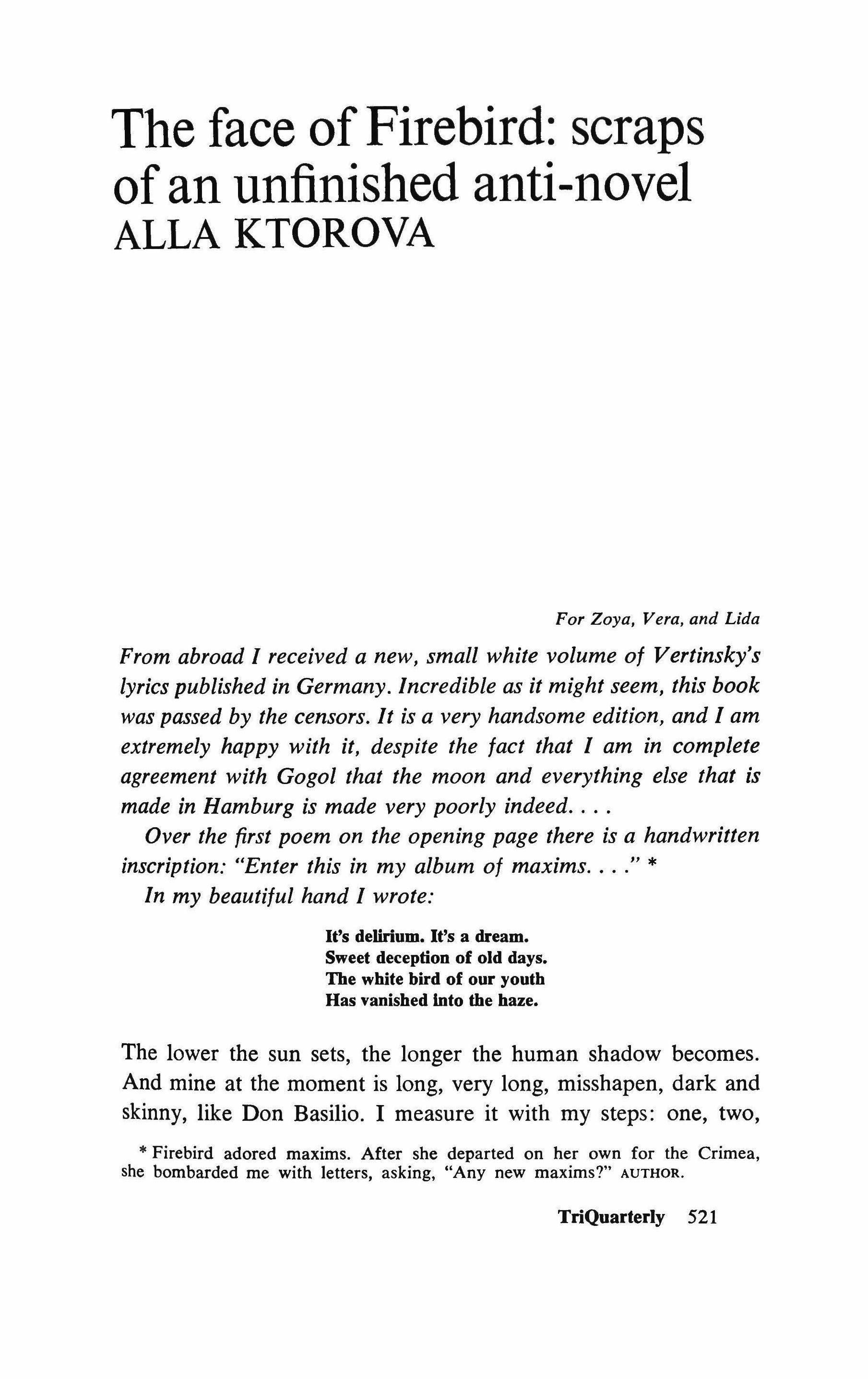
For Zoya, Vera, and Lida
From abroad I received a new, small white volume of Vertinsky's lyrics published in Germany. Incredible as it might seem, this book was passed by the censors. It is a very handsome edition, and I am extremely happy with it, despite the fact that I am in complete agreement with Gogol that the moon and everything else that is made in Hamburg is made very poorly indeed
Over the first poem on the opening page there is a handwritten inscription: "Enter this in my album of maxims *
In my beautiful hand I wrote:
It's delirium. It's a dream. Sweet deception of old days. The white bird of our youth Has vanished Into the haze.
The lower the sun sets, the longer the human shadow becomes. And mine at the moment is long, very long, misshapen, dark and skinny, like Don Basilio. I measure it with my steps: one, two,
* Firebird adored maxims. After she departed on her own for the Crimea, she bombarded me with letters, asking, "Any new maxims?" AUTHOR.
TriQuarterly 521
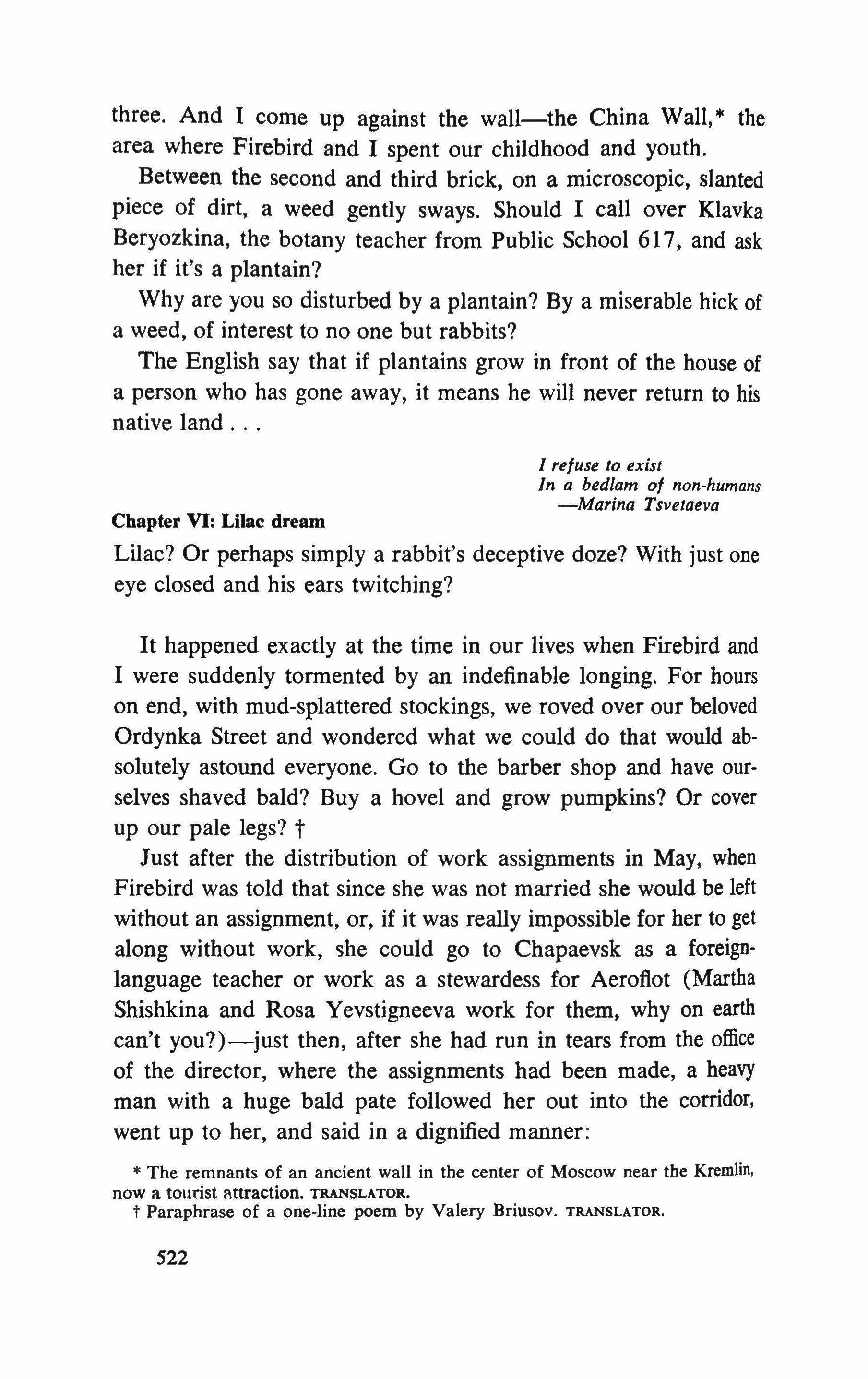
three. And I come up against the wall-the China Wall, '" the area where Firebird and I spent our childhood and youth.
Between the second and third brick, on a microscopic, slanted piece of dirt, a weed gently sways. Should I call over Klavka Beryozkina, the botany teacher from Public School 617, and ask her if it's a plantain?
Why are you so disturbed by a plantain? By a miserable hick of a weed, of interest to no one but rabbits?
The English say that if plantains grow in front of the house of a person who has gone away, it means he will never return to his native land
I refuse to exist In a bedlam of non-humans =-Marina Tsvetaeva Chapter VI: Lilac dream
Lilac? Or perhaps simply a rabbit's deceptive doze? With just one eye closed and his ears twitching?
It happened exactly at the time in our lives when Firebird and I were suddenly tormented by an indefinable longing. For hours on end, with mud-splattered stockings, we roved over our beloved Ordynka Street and wondered what we could do that would absolutely astound everyone. Go to the barber shop and have ourselves shaved bald? Buy a hovel and grow pumpkins? Or cover up our pale legs? t
Just after the distribution of work assignments in May, when Firebird was told that since she was not married she would be left without an assignment, or, if it was really impossible for her to get along without work, she could go to Chapaevsk as a foreignlanguage teacher or work as a stewardess for Aeroflot (Martha Shishkina and Rosa Yevstigneeva work for them, why on earth can't you?)-just then, after she had run in tears from the office of the director, where the assignments had been made, a heavy man with a huge bald pate followed her out into the corridor, went up to her, and said in a dignified manner:
* The remnants of an ancient wall in the center of Moscow near the Kremlin, now a tourist attraction. TRANSLATOR..
t Paraphrase of a one-line poem by Valery Briusov. TRANSLATOR..
522

"Strogov is my name, Vasily Alexandrovich Strogov. I represent the National Committee on Foreign Cultural Relations. Don't be upset, comrade. Don't sign up for Chapaevsk or anywhere else. You'll be all right. They only threaten to take you to court. There is no such law. Come to work in our organization. I like your face."
Firebird gleefully beat her wings.
"But why didn't you say it in front of the commission-that you would be glad to take me?"
"Oh, you child. As if such a thing were possible. It would only make a mess of everything. They would say she did not distinguish herself in the Communist Youth League, that she did not carry out any social work. They would say, we have married women, women who are more deserving and are left without an assignment, and you are asking us for her. It would do no good. Do not tell anyone, and toward the end of August come to see me and we'll formalize it."
Thus Nika Zharova, * who was nicknamed Firebird, started to work as an interpreter of English, French, and German in one of the most interesting institutions in Moscow.
This was the happiest period in her life. Whether for better or for worse I do not know, but it was this period that brought so much commotion into our lives that for a while we lost anything resembling peace of mind.
First of all there occurred certain most interesting events, followed by new thoughts and, most important of all, by concerns of an extremely serious nature.
Firebird was furiously busy at work, starting early in the morning.
"Zagorsk, Zagorsk, I have been on the phone half an hour."
"Father Alexei?" she shouted joyously into the receiver, when she was finally connected with Zagorsk, "This is Nika Zharova. From Yes, yes."
I was sitting in the corner, as a person who had come to see "Zhar" means "fire" in Russian; "Zhar-ptitsa" is the firebird of Russian folklore. TRANSLATOR.
523
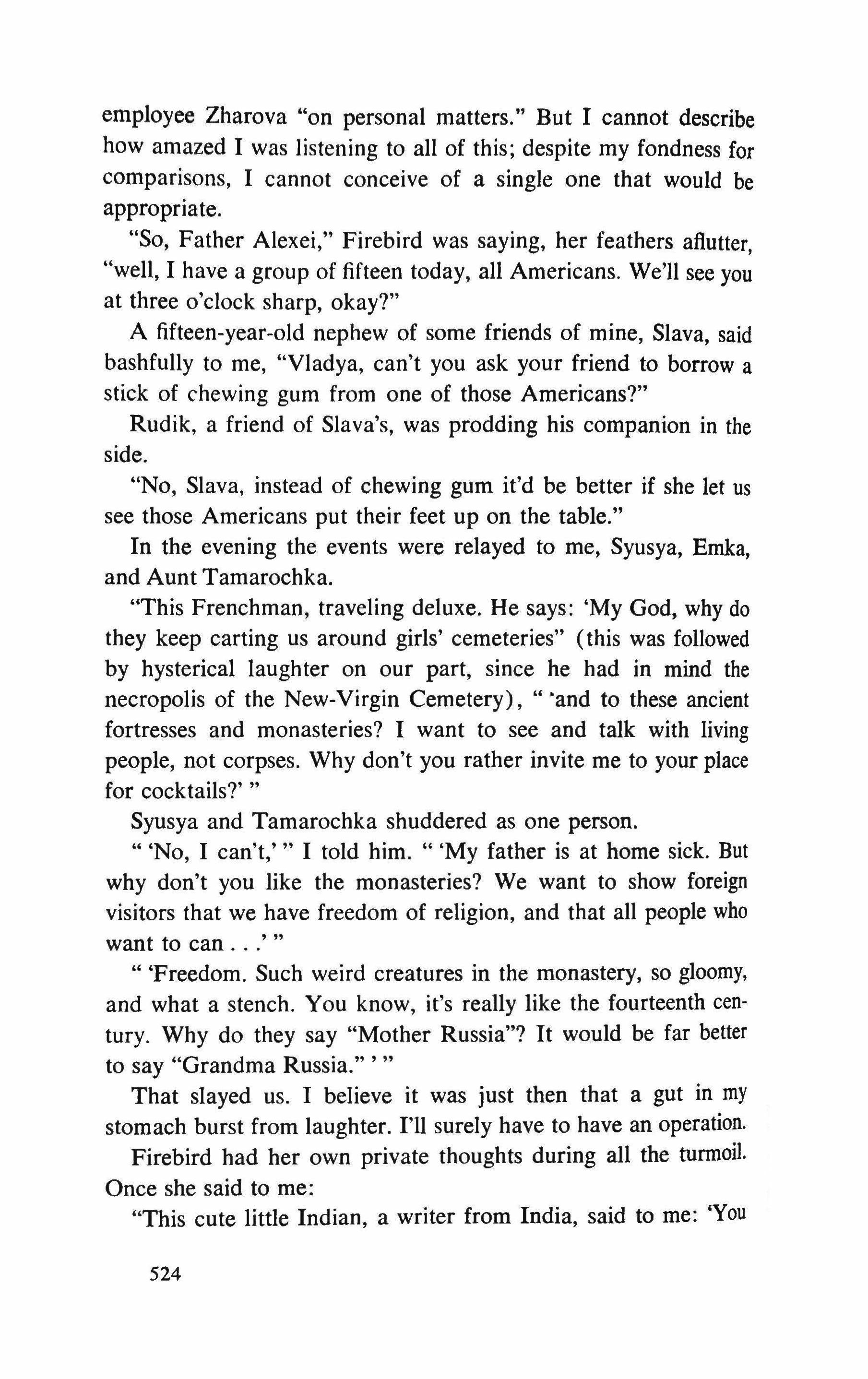
employee Zharova "on personal matters." But I cannot describe how amazed I was listening to all of this; despite my fondness for comparisons, I cannot conceive of a single one that would be appropriate.
"So, Father Alexei," Firebird was saying, her feathers aflutter, "well, I have a group of fifteen today, all Americans. We'll see you at three o'clock sharp, okay?"
A fifteen-year-old nephew of some friends of mine, Slava, said bashfully to me, "Vladya, can't you ask your friend to borrow a stick of chewing gum from one of those Americans?"
Rudik, a friend of Slava's, was prodding his companion in the side.
"No, Slava, instead of chewing gum it'd be better if she let us see those Americans put their feet up on the table."
In the evening the events were relayed to me, Syusya, Emka, and Aunt Tamarochka.
"This Frenchman, traveling deluxe. He says: 'My God, why do they keep carting us around girls' cemeteries" (this was followed by hysterical laughter on our part, since he had in mind the necropolis of the New-Virgin Cemetery), ""and to these ancient fortresses and monasteries? I want to see and talk with living people, not corpses. Why don't you rather invite me to your place for cocktails?'
Syusya and Tamarochka shuddered as one person.
"'No, I can't,''' I told him 'My father is at home sick. But why don't you like the monasteries? We want to show foreign visitors that we have freedom of religion, and that all people who want to can .'
'Freedom. Such weird creatures in the monastery, so gloomy, and what a stench. You know, it's really like the fourteenth century. Why do they say "Mother Russia"? It would be far better to say "Grandma Russia."
That slayed us. I believe it was just then that a gut in my stomach burst from laughter. I'll surely have to have an operation.
Firebird had her own private thoughts during all the turmoil. Once she said to me:
"This cute little
Indian, a writer from India, said to me: 'You
524
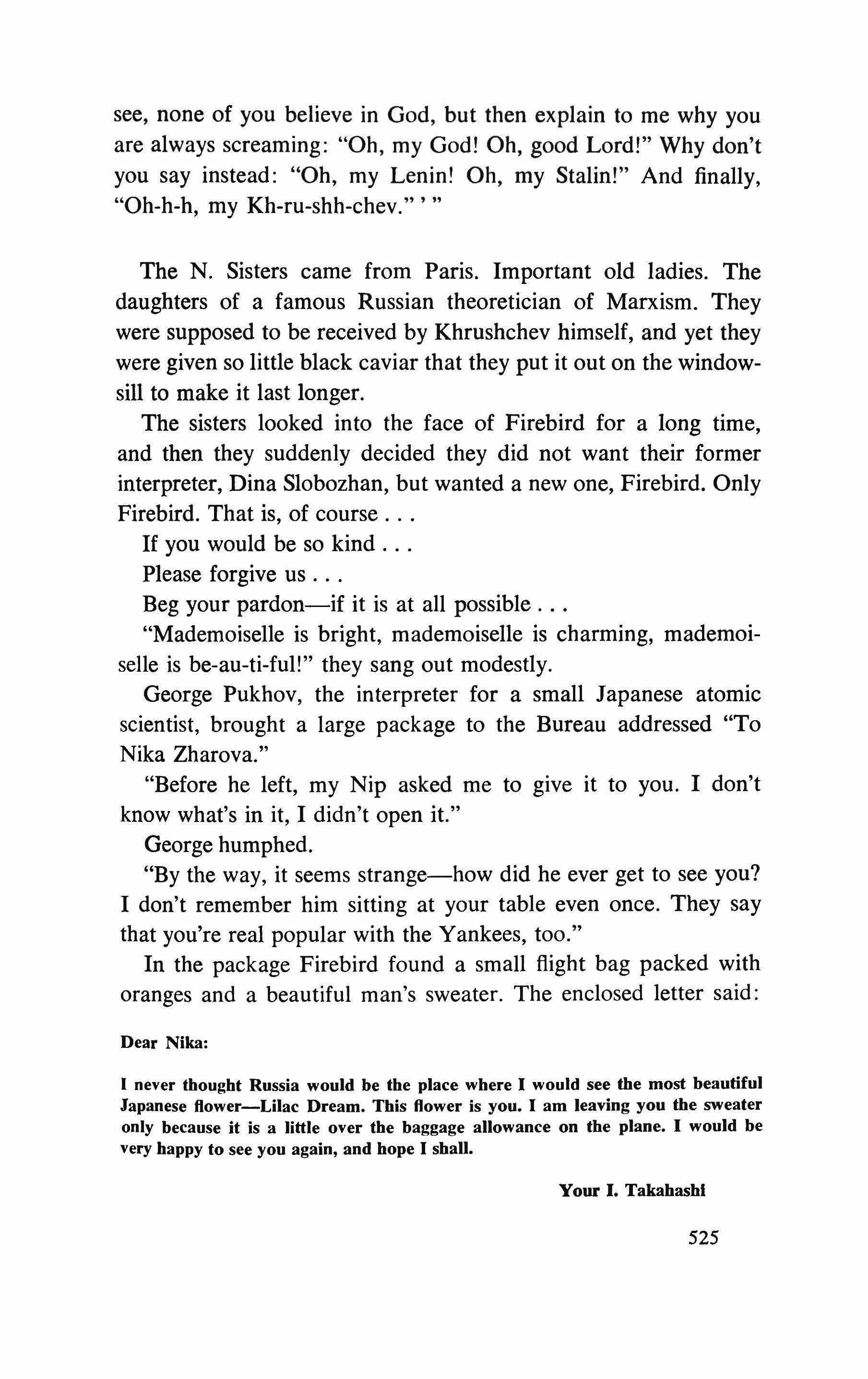
see, none of you believe in God, but then explain to me why you are always screaming: "Oh, my God! Oh, good Lord!" Why don't you say instead: "Oh, my Lenin! Oh, my Stalin!" And finally, "Oh-h-h, my Kh-ru-shh-chev."
The N. Sisters came from Paris. Important old ladies. The daughters of a famous Russian theoretician of Marxism. They were supposed to be received by Khrushchev himself, and yet they were given so little black caviar that they put it out on the windowsill to make it last longer.
The sisters looked into the face of Firebird for a long time, and then they suddenly decided they did not want their former interpreter, Dina Slobozhan, but wanted a new one, Firebird. Only Firebird. That is, of course
If you would be so kind
Please forgive us
Beg your pardon-if it is at all possible "Mademoiselle is bright, mademoiselle is charming, mademoiselle is be-au-ti-ful!" they sang out modestly.
George Pukhov, the interpreter for a small Japanese atomic scientist, brought a large package to the Bureau addressed "To Nika Zharova."
"Before he left, my Nip asked me to give it to you. I don't know what's in it, I didn't open it."
George humphed.
"By the way, it seems strange-how did he ever get to see you? I don't remember him sitting at your table even once. They say that you're real popular with the Yankees, too."
In the package Firebird found a small flight bag packed with oranges and a beautiful man's sweater. The enclosed letter said:
Dear Nika:
I never thought Russia would be tbe place wbere I would see tbe most beautiful Japanese flower-Lilac Dream. Tbis flower is you. I am leaving you tbe sweater only because it is a little over tbe baggage allowance on tbe plane. I would be very bappy to see you again, and bope I sball.
Your I. Takabasbl
525
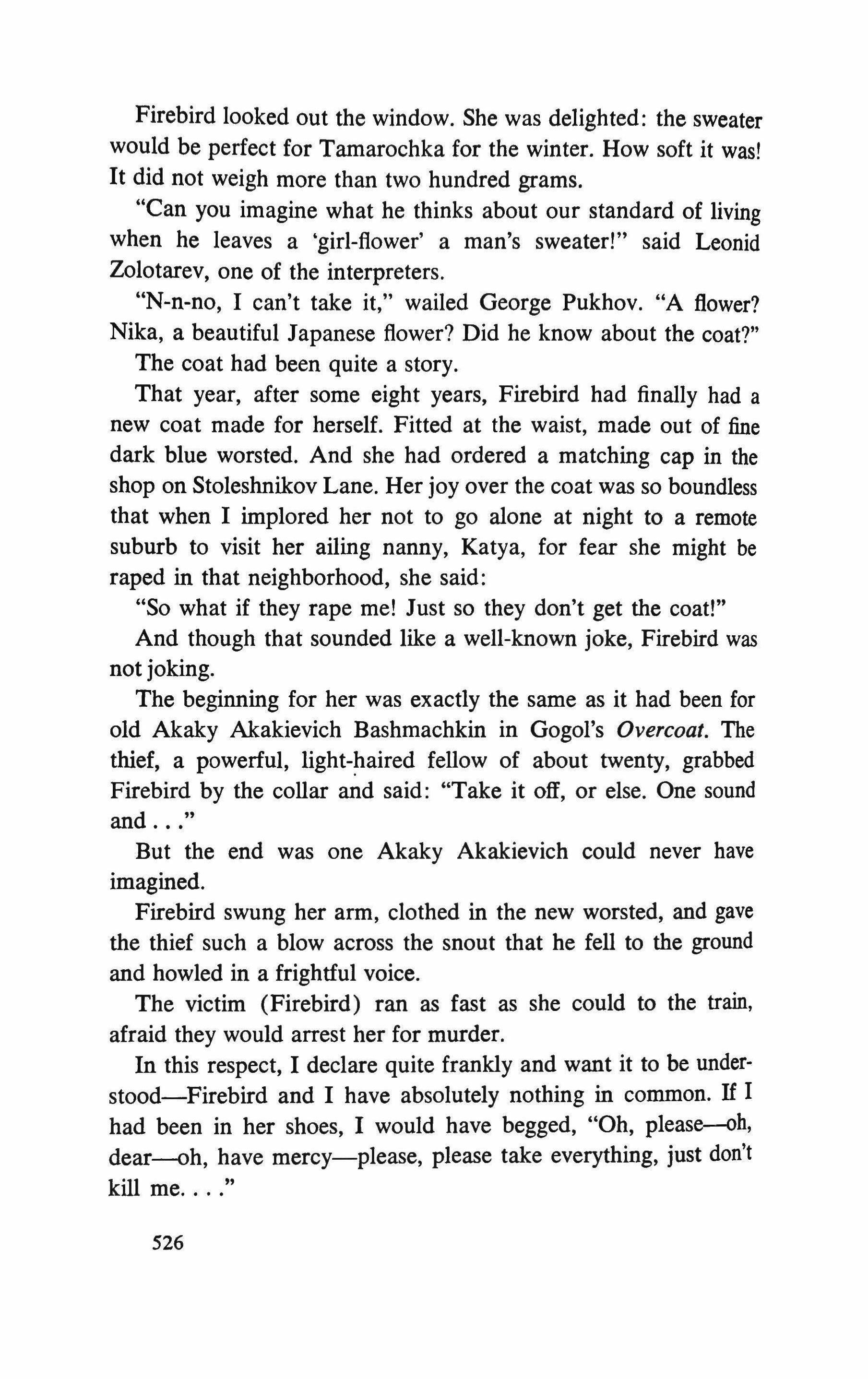
Firebird looked out the window. She was delighted: the sweater would be perfect for Tamarochka for the winter. How soft it was! It did not weigh more than two hundred grams.
"Can you imagine what he thinks about our standard of living when he leaves a 'girl-flower' a man's sweater!" said Leonid Zolotarev, one of the interpreters.
"N-n-no, I can't take it," wailed George Pukhov. "A flower? Nika, a beautiful Japanese flower? Did he know about the coat?"
The coat had been quite a story.
That year, after some eight years, Firebird had finally had a new coat made for herself. Fitted at the waist, made out of fine dark blue worsted. And she had ordered a matching cap in the shop on Stoleshnikov Lane. Her joy over the coat was so boundless that when I implored her not to go alone at night to a remote suburb to visit her ailing nanny, Katya, for fear she might be raped in that neighborhood, she said:
"So what if they rape me! Just so they don't get the coat!"
And though that sounded like a well-known joke, Firebird was not joking.
The beginning for her was exactly the same as it had been for old Akaky Akakievich Bashmachkin in Gogol's Overcoat. The thief, a powerful, light-haired fellow of about twenty, grabbed Firebird by the collar and said: "Take it off, or else. One sound and
But the end was one Akaky Akakievich could never have imagined.
Firebird swung her arm, clothed in the new worsted, and gave the thief such a blow across the snout that he fell to the ground and howled in a frightful voice.
The victim (Firebird) ran as fast as she could to the train, afraid they would arrest her for murder.
In this respect, I declare quite frankly and want it to be understood-Firebird and I have absolutely nothing in common. If I had been in her shoes, I would have begged, "Oh, please--ob, dear--oh, have mercy-please, please take everything, just don't kill me "
526

When she heard this story, Anna Davydovna, the mother of our Emka, shook her head bitterly for a long while: first forward and backward, then backward and forward, then left to right and right to left.
"Well, Nika, I see you'll never get married."
"Why is that?"
"It just is," was Anna Davydovna's retort. "That's what it comes to. If a young girl can knock a sturdy man off his feet, it means she has a heavy hand. And only old maids have heavy hands. Just mark my words, none of you-not you, with all your looks, not Vladya, still less my Emka-none of you will ever get married."
"Why do you bring up Vladya?"
"Why? We invited her over a few days ago. There were a lot of young men here. We asked her over on purpose, of course, so that she could meet some people. She had hardly opened the door when she started yelling so that the entire hallway heard her: 'Where are my prospective husbands? Where are they?'
Nonetheless, despite her heavy hand, the opposite sex besieged Firebird from all sides.
A beanpole of a Czech waited for her after work and chased after her to the trolley·
"Comrade, dear comrade
Undoubtedly he wanted to accompany her home and along the way declare his love to "Comrade Firebird."
Vasily Alexandrovich Strogov, her boss, addressed himself to a group of Hungarians that had crowded around Firebird's table: "Friends, you can go to the other interpreters. It makes absolutely no difference who serves you."
"No, no, it absolutely does make a difference," said the tallest, most handsome of the group, who also spoke the best Russian, as he stepped forward.
"Neki j6 arca-NEKI JO AReA-this is why it makes a difference."
In Hungarian this means "What an attractive face!"
In order to round out this theme, it must be added that after
527

every "gift" left for Firebird Uolie Madame perfume, lipstick with pop-out mirrors, one-size-fits-all stockings, and so forth), after every letter with a foreign postmark, addressed to the charming interpreter, Miss Jarson, and after every occasion when more than "ordinary interest" was shown, she was immediately called in to see the Boss-Puppet. *
"Well, then. And what are his political views?"
"He had a very, very high opinion of the new houses on Kaluzhskaya Street."
"He did?"
"He had high praise for the milk-vending machine on Chekhov Street and the packaged crisp-fried potatoes."
"Hmmm. So? What's your personal opinion?"
"A highly refined person in every respect."
The last comment of Firebird was jotted down by the BossPuppet in some kind of notebook. She put her signature under it. And the book was passed higher up-from one Boss-Puppet to another, according to the chain of command.
All these talks with Puppets naturally were to be kept in strict confidence, but both she and the other interpreters discussed them in great detail, not only with each other but even with outsiders-such as myself, for example.
They made fun of the Puppets, for whom, lethargically doing their duty, they described, both aloud and in writing, their conversations with foreigners, each fibbing as best he could.
Moreover, it was obligatory for them to give an account of themselves and answer the following questions in writing:
1. Who are your friends? Their names?
2. What do you like, what are your interests?
3. What is your purpose in life?
4. How do you reply to foreigners when they inquire how you feel about your country?
Firebird and I worked together on answers to these intellectual questions, Here are our answers:
* Ironical nickname for bureaucrats, from Mayakovsky's play The Bathhouse. TRANSLATOR.
528
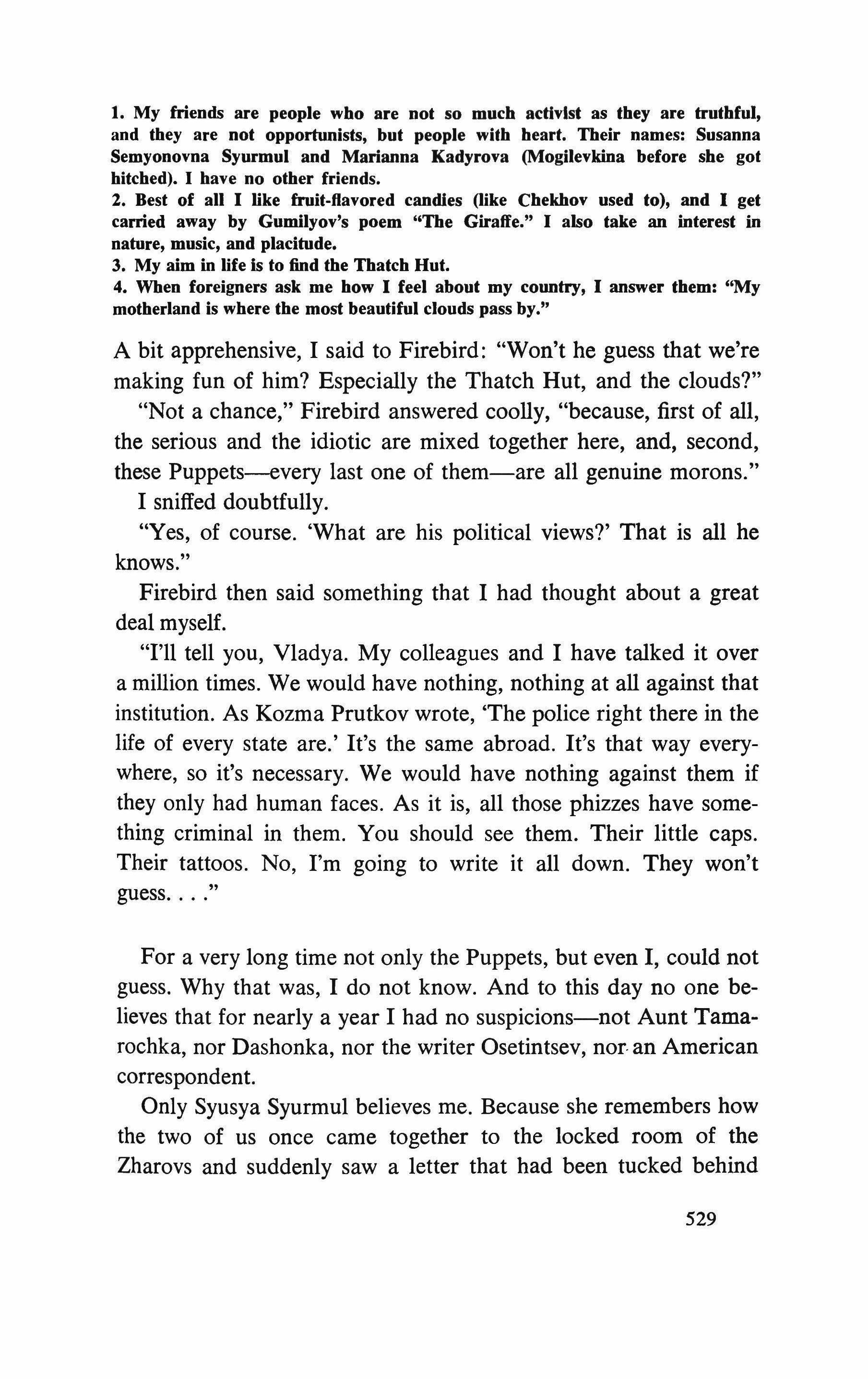
1. My friends are people who are not so much activist as they are truthful, and they are not opportunists, but people with heart. Their names: Susanna Semyonovna Syurmul and Marianna Kadyrova (Mogilevkina before she got hitched). I have no other friends.
2. Best of all I like fruit-flavored candies (like Chekhov used to), and I get carried away by Gumilyov's poem "The Giraffe." I also take an interest in nature, music, and placitude.
3. My aim in life is to find the Thatch Hut.
4. When foreigners ask me how I feel about my country, I answer them: "My motherland is where the most beautiful clouds pass by."
A bit apprehensive, I said to Firebird: "Won't he guess that we're making fun of him?
Especially the Thatch Hut, and the clouds?"
"Not a chance," Firebird answered coolly, "because, first of all, the serious and the idiotic are mixed together here, and, second, these Puppets-every last one of them-are all genuine morons."
I sniffed doubtfully.
"Yes, of course. 'What are his political views?' That is all he knows."
Firebird then said something that I had thought about a great deal myself.
"I'll tell you, Vladya. My colleagues and I have talked it over a million times. We would have nothing, nothing at all against that institution. As Kozma Prutkov wrote, 'The police right there in the life of every state are.' It's the same abroad. It's that way everywhere, so it's necessary. We would have nothing against them if they only had human faces. As it is, all those phizzes have something criminal in them. You should see them. Their little caps. Their tattoos. No, I'm going to write it all down. They won't guess
For a very long time not only the Puppets, but even I, could not guess. Why that was, I do not know. And to this day no one believes that for nearly a year I had no suspicions-not Aunt Tamarochka, nor Dashonka, nor the writer Osetintsev, nor· an American correspondent.
Only Syusya Syurmul believes me. Because she remembers how the two of us once came together to the locked room of the Zharovs and suddenly saw a letter that had been tucked behind 529
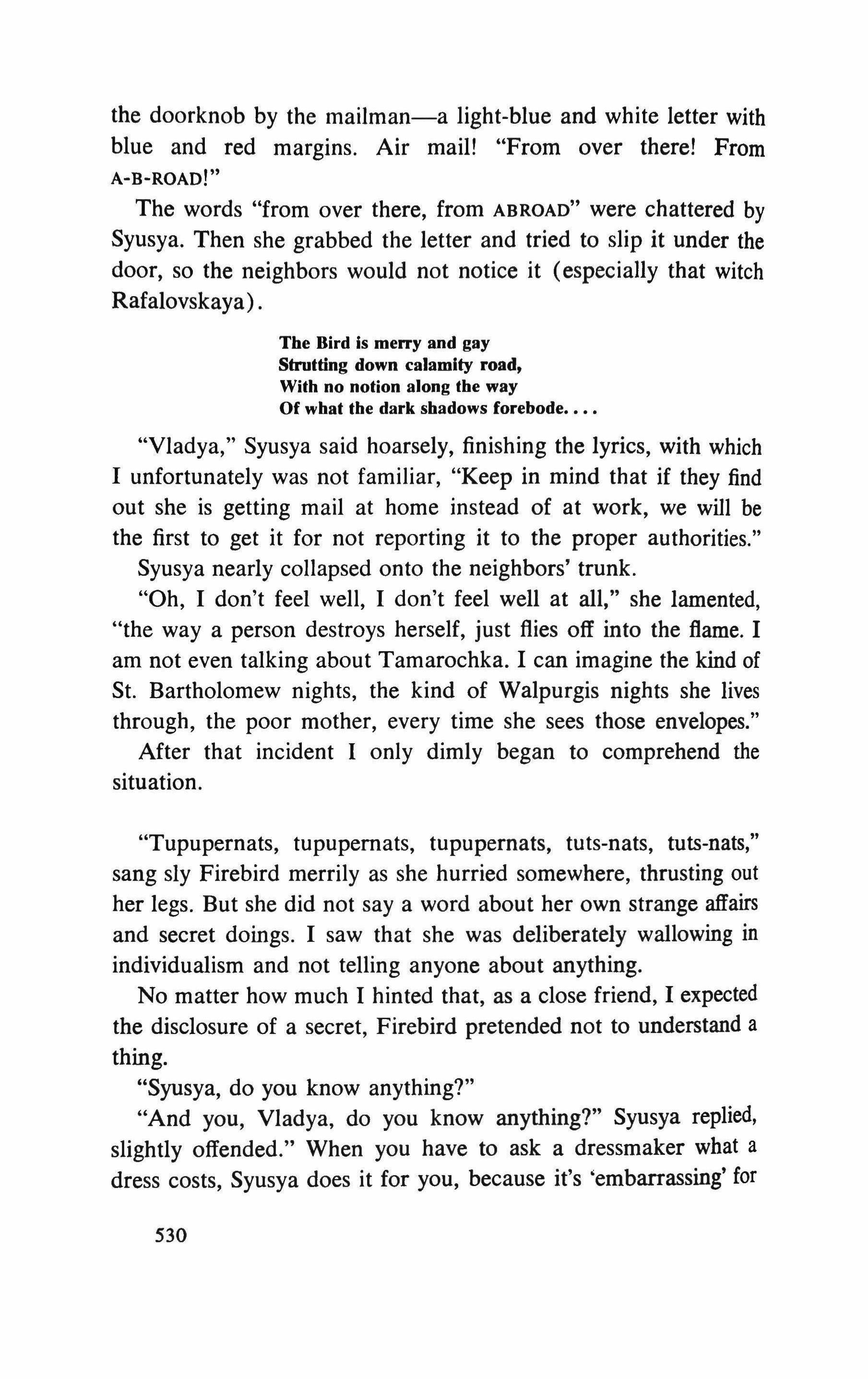
the doorknob by the mailman-a light-blue and white letter with blue and red margins. Air mail! "From over there! From A-B-ROAD!"
The words "from over there, from ABROAD" were chattered by Syusya. Then she grabbed the letter and tried to slip it under the door, so the neighbors would not notice it (especially that witch Rafalovskaya)
The Bird is merry and gay Strutting down calamity road, With no notion along the way Of what the dark shadows forebode
"Vladya," Syusya said hoarsely, finishing the lyrics, with which I unfortunately was not familiar, "Keep in mind that if they find out she is getting mail at home instead of at work, we will be the first to get it for not reporting it to the proper authorities."
Syusya nearly collapsed onto the neighbors' trunk.
"Oh, I don't feel well, I don't feel well at all," she lamented, "the way a person destroys herself, just flies off into the flame. I am not even talking about Tamarochka. I can imagine the kind of St. Bartholomew nights, the kind of Walpurgis nights she lives through, the poor mother, every time she sees those envelopes."
After that incident I only dimly began to comprehend the situation.
"Tupupernats, tupupernats, tupupernats, tuts-nats, tuts-nats," sang sly Firebird merrily as she hurried somewhere, thrusting out her legs. But she did not say a word about her own strange affairs and secret doings. I saw that she was deliberately wallowing in individualism and not telling anyone about anything.
No matter how much I hinted that, as a close friend, I expected the disclosure of a secret, Firebird pretended not to understand a thing.
"Syusya, do you know anything?"
"And you, Vladya, do you know anything?" Syusya replied, slightly offended." When you have to ask a dressmaker what a dress costs, Syusya does it for you, because it's 'embarrassing' for
530

you. When you have to ask that highway robber Soloukhin to come and repair the meter, your fool Syusya does that too, because she's bolder. But when it comes to something important, when the advice of an experienced person who's been through hell and high water is really needed "
"But at least you tried asking her about it?"
"Well, yes. Yes, I tried."
"And what happened?"
"Nothing. A Mona Lisa smile, and she's quiet as a chicken with its head cut off."
In those terrible, muddled days, a new entry appeared in the Firebird's album of maxims:
I refuse to exist In a bedlam Of non-humans.
(From the poetry of Marina Tsvetaeva)
All her friends, to say nothing of mere acquaintances, abandoned Firebird. They were frightened.
Emka Kukui moaned over the telephone:
"Vladya, really, now! I would do anything on earth for her, anything at all. But I'm afraid. Really, with that fifth question * of mine, can I afford to get mixed up in something like this? Mother's going out of her mind from fright. Merely because we're friends. You know, Uncle Senya was just rehabilitated."
I bumped into Klavka Beryozkina in the self-service cafeteria at the Hotel Moscow. Wiggling her tray and her behind, she tried to slip into the dining room, feigning not to notice me.
"Klavka! Aren't you ashamed?"
The tea on her tray started to splash violently onto the neighboring table.
"Now listen, Vladya. Dad isn't retired yet, he still works at the police department." Klavka started nervously rubbing the amber necklace which she wore around her neck to prevent goiter and * "Fifth question" on official forms refers to nationality. Emka Kukui is Jewish. TRANSLATOR 531
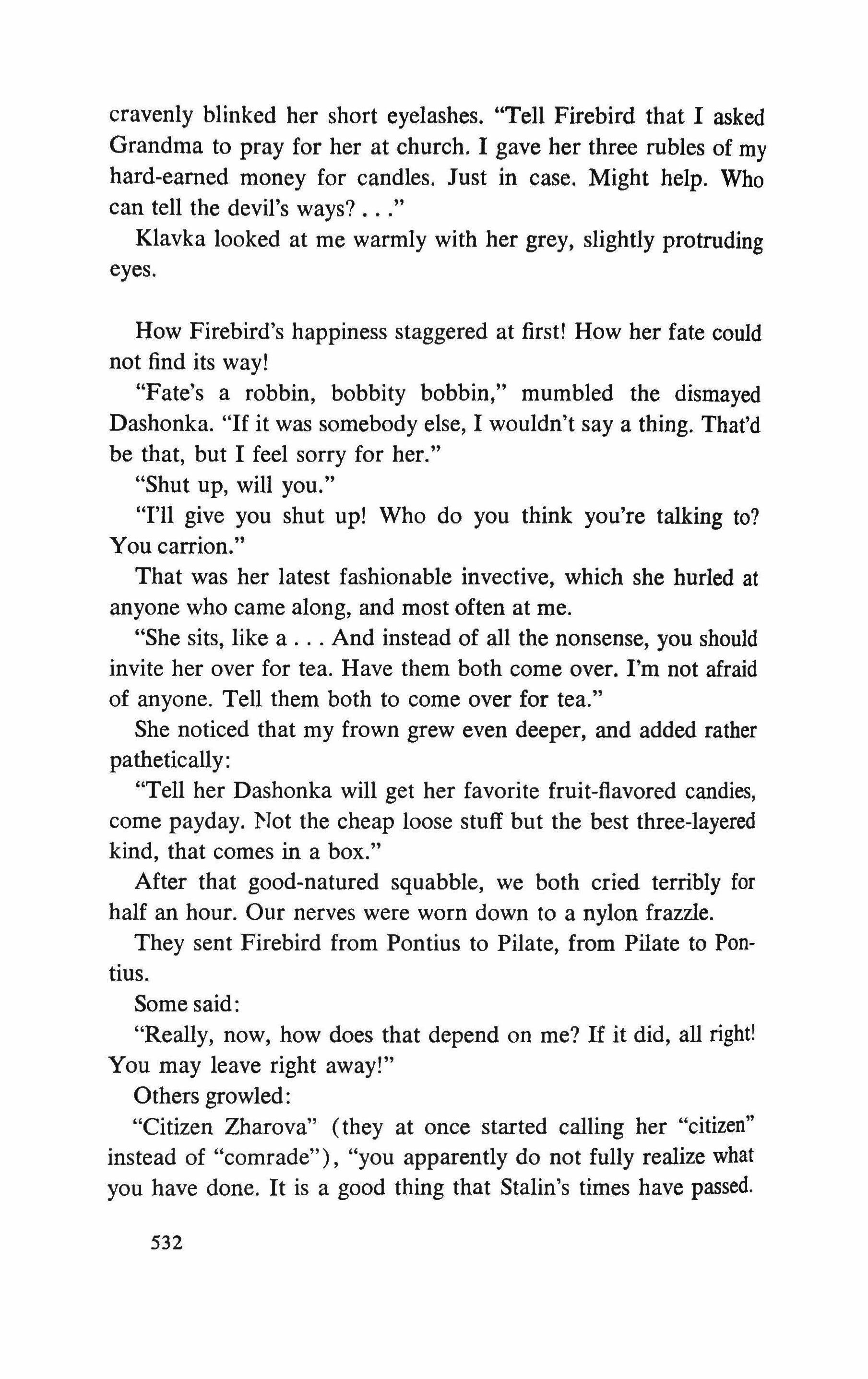
cravenly blinked her short eyelashes. "Tell Firebird that I asked Grandma to pray for her at church. I gave her three rubles of my hard-earned money for candles. Just in case. Might help. Who can tell the devil's ways?
Klavka looked at me warmly with her grey, slightly protruding eyes.
How Firebird's happiness staggered at first! How her fate could not find its way!
"Fate's a robbin, bobbity bobbin," mumbled the dismayed Dashonka. "If it was somebody else, I wouldn't say a thing. That'd be that, but I feel sorry for her."
"Shut up, will you."
"I'll give you shut up! Who do you think you're talking to? You carrion."
That was her latest fashionable invective, which she hurled at anyone who came along, and most often at me.
"She sits, like a And instead of all the nonsense, you should invite her over for tea. Have them both come over. I'm not afraid of anyone. Tell them both to come over for tea."
She noticed that my frown grew even deeper, and added rather pathetically:
"Tell her Dashonka will get her favorite fruit-flavored candies, come payday. Not the cheap loose stuff but the best three-layered kind, that comes in a box."
After that good-natured squabble, we both cried terribly for half an hour. Our nerves were worn down to a nylon frazzle.
They sent Firebird from Pontius to Pilate, from Pilate to Pontius.
Some said:
"Really, now, how does that depend on me? If it did, all right! You may leave right away!"
Others growled:
"Citizen Zharova" (they at once started calling her "citizen" instead of "comrade"), "you apparently do not fully realize what you have done. It is a good thing that Stalin's times have passed.
532
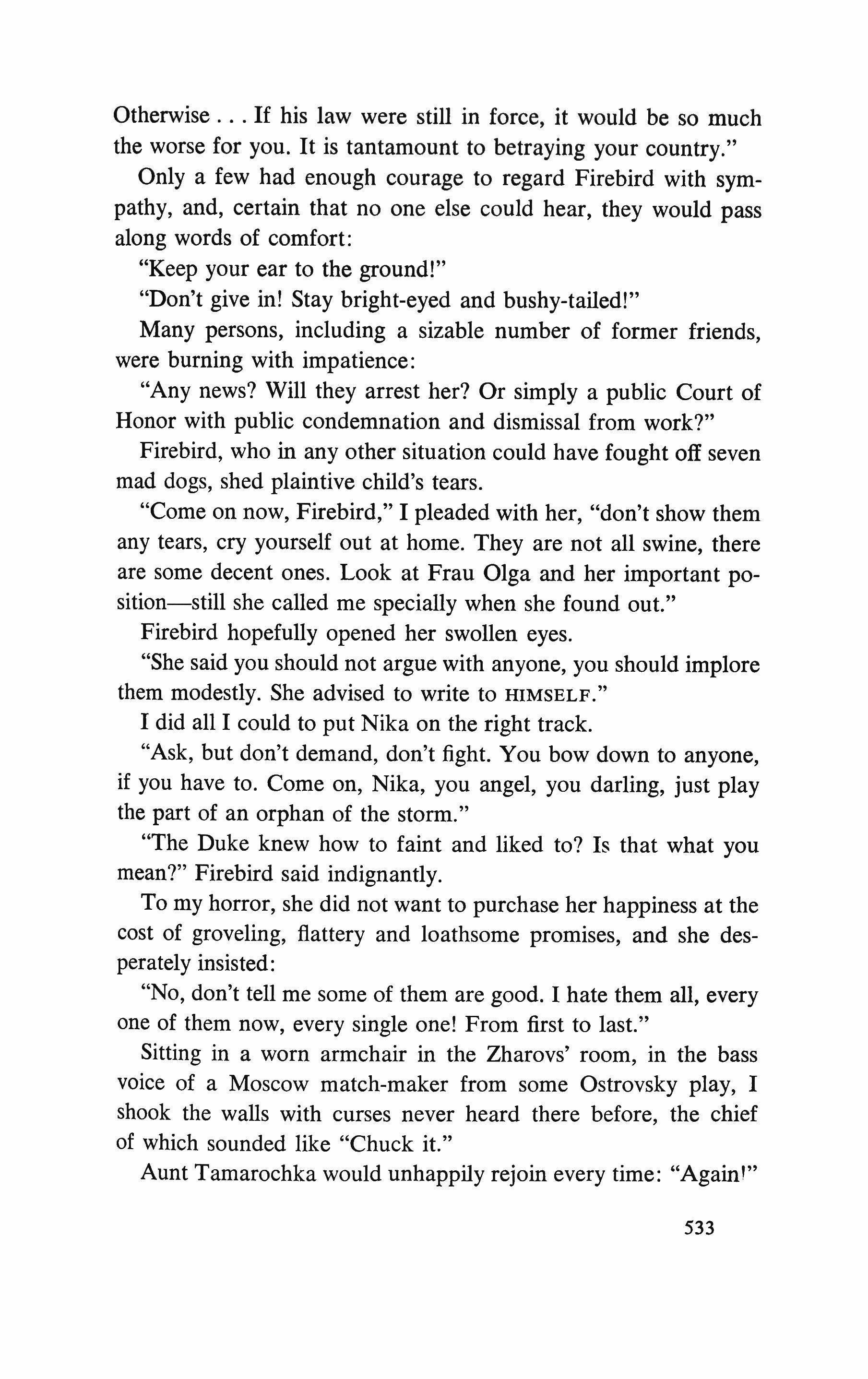
Otherwise If his law were still in force, it would be so much the worse for you. It is tantamount to betraying your country."
Only a few had enough courage to regard Firebird with sympathy, and, certain that no one else could hear, they would pass along words of comfort:
"Keep your ear to the ground!"
"Don't give in! Stay bright-eyed and bushy-tailed!"
Many persons, including a sizable number of former friends, were burning with impatience:
"Any news? Will they arrest her? Or simply a public Court of Honor with public condemnation and dismissal from work?"
Firebird, who in any other situation could have fought off seven mad dogs, shed plaintive child's tears.
"Come on now, Firebird," I pleaded with her, "don't show them any tears, cry yourself out at home. They are not all swine, there are some decent ones. Look at Frau Olga and her important position-still she called me specially when she found out."
Firebird hopefully opened her swollen eyes.
"She said you should not argue with anyone, you should implore them modestly. She advised to write to HIMSELF."
I did all I could to put Nika on the right track.
"Ask, but don't demand, don't fight. You bow down to anyone, if you have to. Come on, Nika, you angel, you darling, just play the part of an orphan of the storm."
"The Duke knew how to faint and liked to? Is that what you mean?" Firebird said indignantly.
To my horror, she did not want to purchase her happiness at the cost of groveling, flattery and loathsome promises, and she desperately insisted:
"No, don't tell me some of them are good. I hate them all, every one of them now, every single one! From first to last."
Sitting in a worn armchair in the Zharovs' room, in the bass voice of a Moscow match-maker from some Ostrovsky play, I shook the walls with curses never heard there before, the chief of which sounded like "Chuck it."
Aunt Tamarochka would unhappily rejoin every time: "Again!"
533

And Syusya Syurmul gently calmed her: "Tamarochka, dear! What can you expect from the granddaughter of a coachman?"
I have to express my admiration for Aunt Tamarochka and Syusya Syurmul. For Aunt Tamarochka because, despite the very definite expectations of Firebird and myself, she behaved like a human being instead of like a philistine. She astounded us all, and most of all her own daughter, Firebird.
We expected tears, wailing, hysteria, something on the order of, "I said so, oh, if I hadn't said so! But it was I " and so forth, but all she did was learn and repeatedly sing the last lines from an old Vertinsky record ("In a Small, Dusty Town"):
Tatata-tatatata-tatata-tatatata Driven through the city first, Lying stimy in the hearse
Syusya told me in secret that Aunt Tamarochka had said to her: "Tell my family that under no circumstances do I want to be cremated. I'm afraid. I want to be next to my mother in Pyatnitsky Cemetery."
The sacrifice that Syusya made during those three horrible months was evident by the fact that she stopped using mascara; she was afraid that it would run because of the tears which never ceased flowing, and so would bum her eyes.
"Oh, I don't feel well, I don't feel well at all," she lamented melancholically when I remained alone with her. "Vladya, what should we do? Who do we run to? How do we save them?"
Firebird's father at that time was on an extended business trip.
Although to this day not a single one of us really knows where salvation came from, I am sure half the credit must go to the interior decorator, Syusya.
"Oh, Tamarochka," she said, as she carefully pressed her outspread hands to her chest, "you know I am only an interior decorator and deal mostly with women. Oh, Tamarochka! But I'll
534
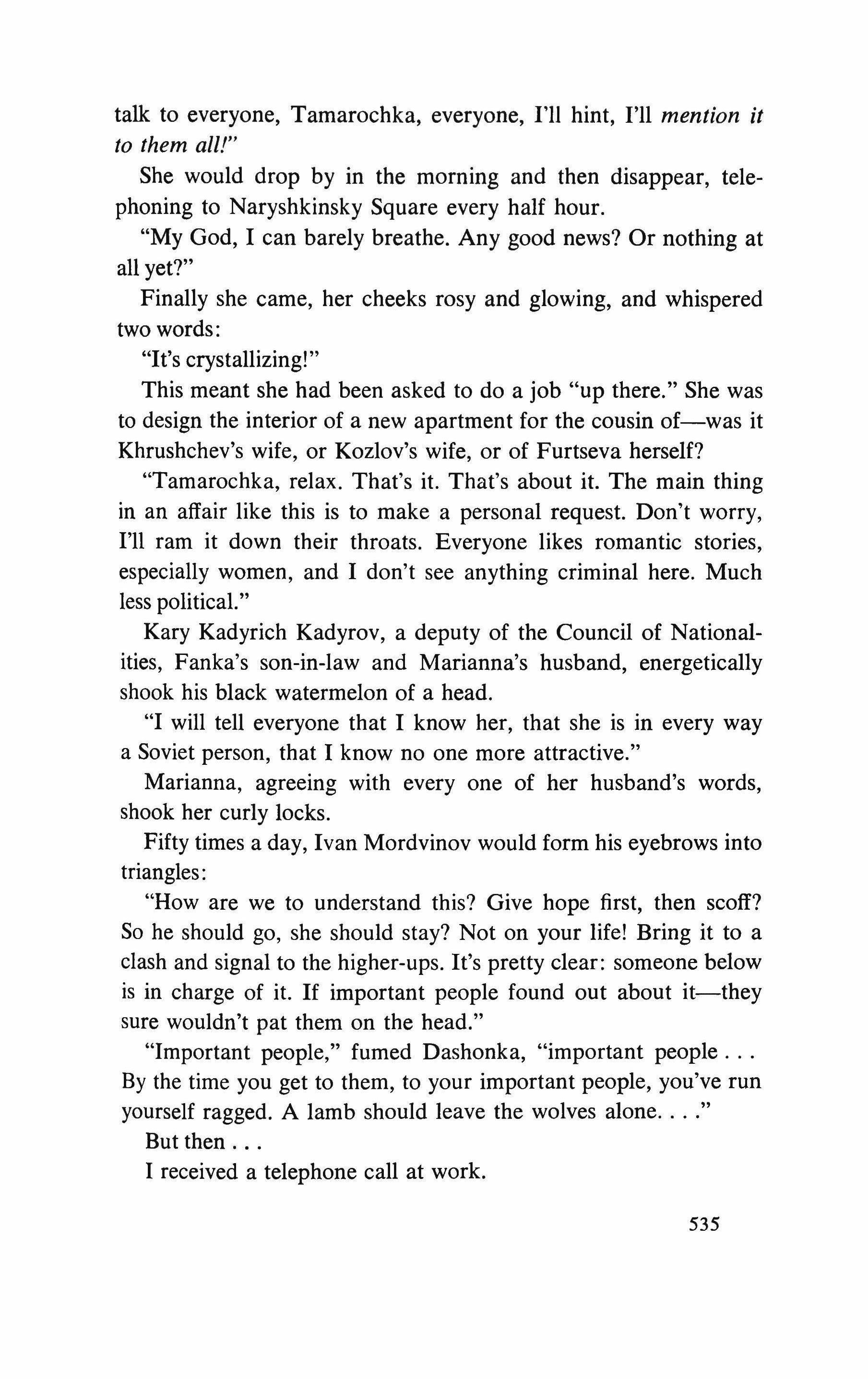
talk to everyone, Tamarochka, everyone, I'll hint, I'll mention it to them all!"
She would drop by in the morning and then disappear, telephoning to Naryshkinsky Square every half hour.
"My God, I can barely breathe. Any good news? Or nothing at all yet?"
Finally she came, her cheeks rosy and glowing, and whispered two words:
"It's crystallizing!"
This meant she had been asked to do a job "up there." She was to design the interior of a new apartment for the cousin of-was it Khrushchev's wife, or Kozlov's wife, or of Furtseva herself?
"Tamarochka, relax. That's it. That's about it. The main thing in an affair like this is to make a personal request. Don't worry, I'll ram it down their throats. Everyone likes romantic stories, especially women, and I don't see anything criminal here. Much less political."
Kary Kadyrich Kadyrov, a deputy of the Council of Nationalities, Fanka's son-in-law and Marianna's husband, energetically shook his black watermelon of a head.
"I will tell everyone that I know her, that she is in every way a Soviet person, that I know no one more attractive."
Marianna, agreeing with everyone of her husband's words, shook her curly locks.
Fifty times a day, Ivan Mordvinov would form his eyebrows into triangles:
"How are we to understand this? Give hope first, then scoff? So he should go, she should stay? Not on your life! Bring it to a clash and signal to the higher-ups. It's pretty clear: someone below is in charge of it. If important people found out about it-they sure wouldn't pat them on the head."
"Important people," fumed Dashonka, "important people By the time you get to them, to your important people, you've run yourself ragged. A lamb should leave the wolves alone
But then
I received a telephone call at work.
535

"It's me," announced the baritone voice of Frau Olga. "When you come to see me I'll give you such good news you'll die, you'll pass out, and you'll wake up in tears. I said I'd do it for her if it kills me. Because she's such an awfully sweet child
"Oh, Frau Olga, darling, please, right now
"Not on the telephone. Come over."
"Well, at least give me a hint, at least.
"Come over!" she bellowed mercilessly over the phone.
And when I saw her personally she reported exactly the same news that Tolka the Hero had brought to the Zharovs' apartment:
"Don't cry, you little fools. Everything'll be okay." He took off his boots, went to the door, closed the safety lock with both paws as quietly as possible and whispered:
"They had me and Olga Ivanovna in. They asked for an objective evaluation of Nika's character."
"Well?"
"I said okay, and I mean okay. We gave such a favorable evaluation-she'd never guess
"Do you think something will come of it?"
"How else? Yesterday I saw Nikolai Konstantinov, an operative. He said this case is already causing some commotion. I had said that the main thing was to make more noise. So it was. Yesterday there was a reception at the Indian Embassy. People sitting around, eating, drinking. The daughter of the ambassador, a cute young Indian girl, got up, went to Khrushchev himself, and bluntly asked him right in front of everyone about this case. Why, she asked, don't you let them? You'll see. Any day now."
That winter was not at all what we had expected. They say that when there is a hot summer there will be a cold winter, and when there is a cold winter, expect a hot summer. Everything was just the opposite. I cannot recall such a hot summer, or such a mild winter.
Who is there, in the crimson beret? * Who is it, wearing the pea-colored overcoat? It is I.
* A fragment of a line from Pushkin's Eugene Onegin. TRANSLATOR. 536
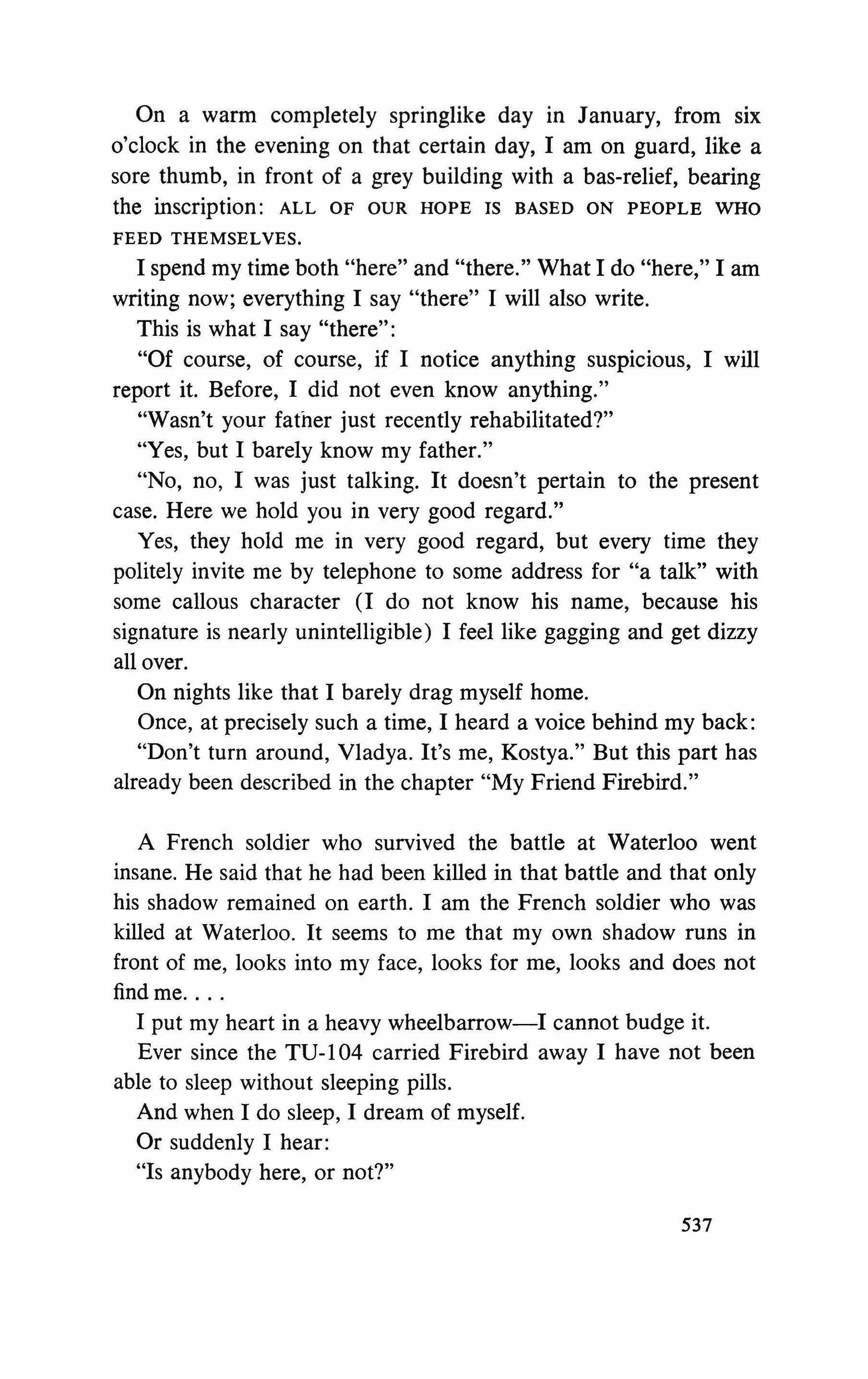
On a warm completely springlike day in January, from six o'clock in the evening on that certain day, I am on guard, like a sore thumb, in front of a grey building with a bas-relief, bearing the inscription: ALL OF OUR HOPE IS BASED ON PEOPLE WHO FEED THEMSELVES.
I spend my time both "here" and "there." What I do "here," I am writing now; everything I say "there" I will also write.
This is what I say "there":
"Of course, of course, if I notice anything suspicious, I will report it. Before, I did not even know anything."
"Wasn't your father just recently rehabilitated?"
"Yes, but I barely know my father."
"No, no, I was just talking. It doesn't pertain to the present case. Here we hold you in very good regard."
Yes, they hold me in very good regard, but every time they politely invite me by telephone to some address for "a talk" with some callous character (I do not know his name, because his signature is nearly unintelligible) I feel like gagging and get dizzy all over.
On nights like that I barely drag myself home.
Once, at precisely such a time, I heard a voice behind my back:
"Don't turn around, Vladya. It's me, Kostya." But this part has already been described in the chapter "My Friend Firebird."
A French soldier who survived the battle at Waterloo went insane. He said that he had been killed in that battle and that only his shadow remained on earth. I am the French soldier who was killed at Waterloo. It seems to me that my own shadow runs in front of me, looks into my face, looks for me, looks and does not find me
I put my heart in a heavy wheelbarrow-I cannot budge it.
Ever since the TU-I04 carried Firebird away I have not been able to sleep without sleeping pills.
And when I do sleep, I dream of myself.
Or suddenly I hear:
"Is anybody here, or not?"
537

Into the window crawls the peasant who haunted Anna Karenina in her dreams.
I scream loudly.
"I won't touch you, I won't. Call your hubby, mum, call Yakov Mikhailovich, my axle's broken
I see myself married to my grandfather, the Moscow cabby, Yakov Mikhailovich Kolotushkin.
But why do I converse with my nocturnal visitor in English?
Then suddenly I hear someone saying:
"In the Colorado River Valley, in the distant, strange, weird valley of the Colorado River How the hell did you get there?
You are afraid of me, you are bored The deep red canyon, on its bottom the slow-flowing grey Colorado River
"Remember, Vladya, that pretty friend you had? You always were together, like Orestes and Pylades, like Siamese twins. With that strange male * name."
"Nika Zharova?"
"Yes, yes. Where is she now?"
How can I tell myoId friend, the film director, Efrim Borisovich Geller, all that happened to Firebird without his running to the other side of the street in fright and without his looking as though he were about to faint from astonishment-because he had heard about the whole saga but had no idea that it had happened to her?
So I start to spin a comical story for him, knowing that he likes and collects them.
"First of all, the girl with the man's name-that's nobody but me," I jabber in a lively way. "Marianna came to see me yesterday, do you remember, from our old apartment? Her husband, Kary Kadyrich, was with her. For a long while he looked over Nika's photos, which she sent to me, and then he said-no, first he clacked with his tongue, Uzbeks always clack with their tongues, and he said right in front of his wife: 'No, I guess I've really be-
* Nika and Vladya are most common as boys' names in Russian. TRANSLATOR. 538

come Russified. If I still were a true Easterner, I'd never have given away such a beauty to another country.'
When I drop by at Firebird's old place of work, from a distance I notice that old goose, the cleaning woman, Auntie Mashacertainly a person who's gotten out of touch.
"Oh-h-h-h, damnation," cackles old Masha, "I thought you were somebody else. I almost had a fit. Oh-h-h."
"Why, what happened?"
"I thought you was her. I thought she came back."
"Who?"
"Nika. Nika Zharova. The Firebird. Who else?"
We take a seat on the wooden bench in the hallway.
"Aunt Masha, I've brought you some pastry. Want an eclair?"
"I can't, it's Lent."
"Well, anyway, take it. God will forgive."
"Well, all right. When I'm in Zagorsk, I'll atone for it."
I always come to see Auntie Masha to squeeze the latest news and gossip out of her. Every time, I bring her either a jar of pickled chanterelles, or some gherkins, the pimply kind, or a small package of cocoa, which she adores.
These gifts, these edible bribes, always make her talkative.
"How about Strogov? Did he blame her? Abuse her? Threaten her? I suppose he fears for his own position now?"
"No, Vladya, here's how it was," Auntie Masha mumbles with evident relish, "I dunno about when he was alone, but in front of others he didn't abuse her. They told him not to."
"Who told him?"
"Come on," says old Masha, "as though you don't know who gives orders here to do things and not to do things."
"That's right."
"It's right, but it isn't right. So he didn't abuse her, but he said: 'What did I see in her that time at the distribution of assignments? I don't know myself. There'd been girls a thousand times purtier, says he. As for love
What is this love business? She 539

simply decided that she'd be better off there than here, she simply decided to get herself a good setup. That's all.' "
"Really?"
"Yes, so he doesn't abuse her, but here's what I'll tell you. When all of us first heard about it we was scared out of our wits. We had a general closed meeting concerning this business: all of us, Strogov and two other men in plainclothes. The younger of the two of them said: 'It's not her who is at fault, comrades, but all of us. How did we let it get by?'
"Really?"
"The absolute truth-I'm not lying. After the meeting, Strogov says to me: 'Auntie Masha, you must be watchful too! When there's nothing to do, you should watch your co-workers, watch who has long talks with which foreigners, who has long chats with who else and who does what else with whom.' But I don't give a hoot for what he says ."
Auntie Masha tells me all I need to know.
"Yes, Strogov was worried at first. The first days. But later He got the word. Took it easier. And how did she manage to get together with him? he wondered. Not even very good at French, English is her main language. And in any case, no good could come of it. As though there aren't enough examples ."
"That's true," I drawled, "but they certainly won't pat him on the head for it; it did, after all, happen in his office, so he must worry about his job."
"No. Why should he worry? He covered himself-he wrote an explanatory letter, and we all signed it. ."
Since childhood I have hated my birthday, the anniversary of my birth. I am glad when myoid friends forget it, and I don't tell it to my new friends. I never thought about my years before, and I did not fear them.
Now I go up to the chest of drawers, look into Dashonka's old, "most exact" mirror, peer into a face that is far from what it used to be, and I shudder at the thought that a "round number" is approaching and that I will soon be thirty.
540
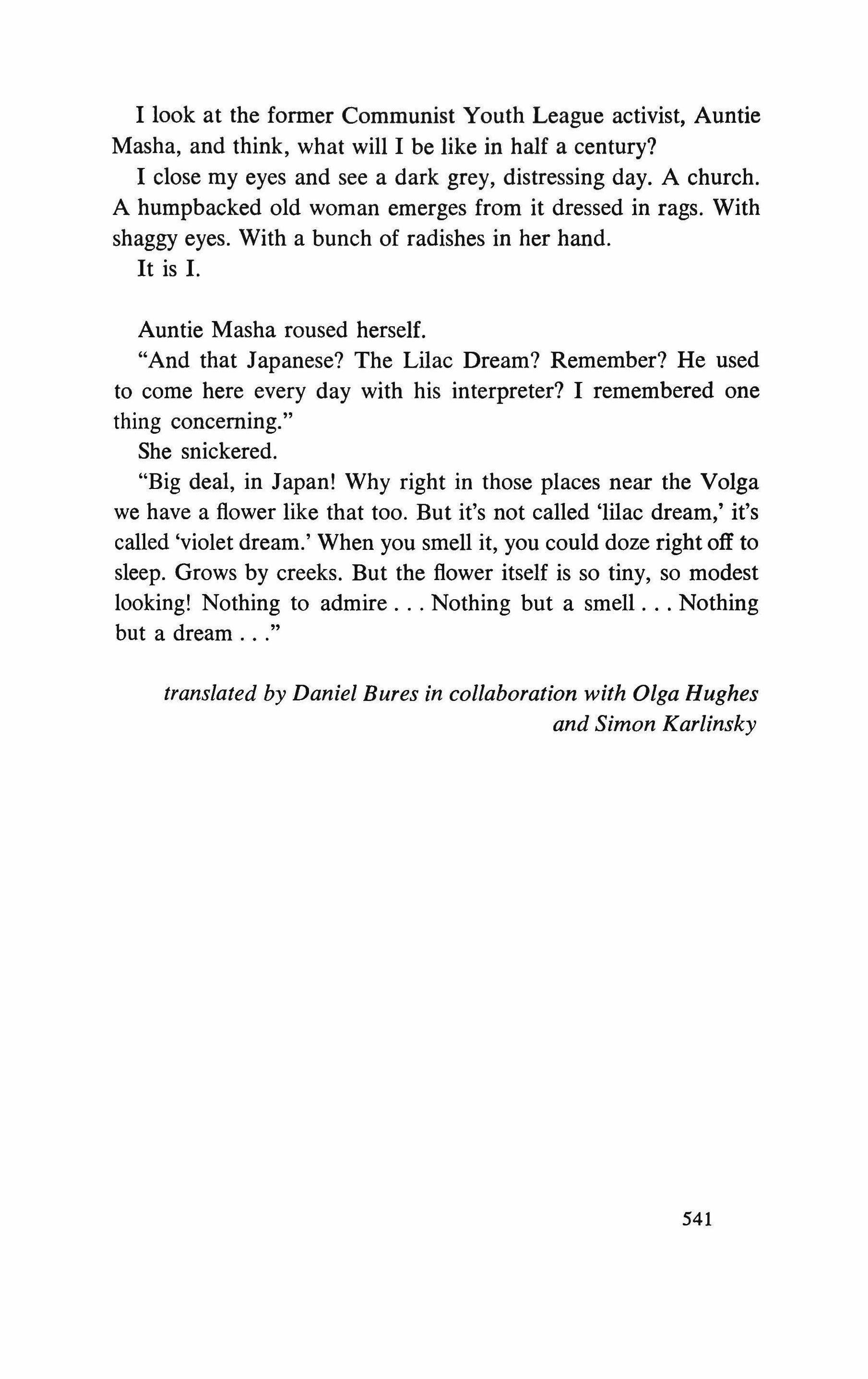
I look at the former Communist Youth League activist, Auntie Masha, and think, what will I be like in half a century?
I close my eyes and see a dark grey, distressing day. A church. A humpbacked old woman emerges from it dressed in rags. With shaggy eyes. With a bunch of radishes in her hand. It is I.
Auntie Masha roused herself.
"And that Japanese? The Lilac Dream? Remember? He used to come here every day with his interpreter? I remembered one thing concerning."
She snickered.
"Big deal, in Japan! Why right in those places near the Volga we have a flower like that too. But it's not called 'lilac dream,' it's called 'violet dream.' When you smell it, you could doze right off to sleep. Grows by creeks. But the flower itself is so tiny, so modest looking! Nothing to admire Nothing but a smell Nothing but a dream
translated by Daniel Bures in collaboration with Olga Hughes and Simon Karlinsky
541
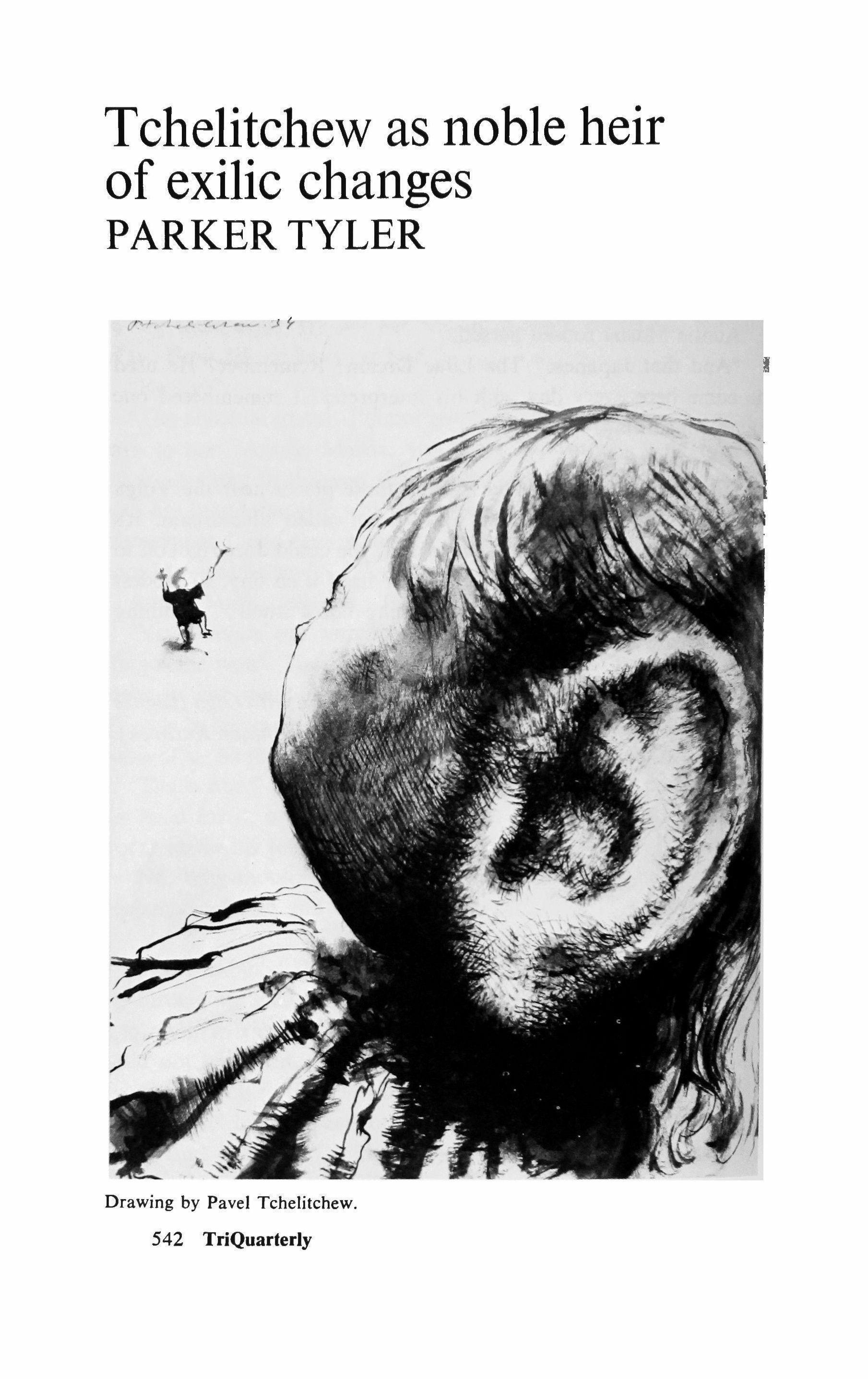
Tchelitchew as noble heir of exilic changes
PARKER TYLER
542 TriQuarterly
Drawing by Pavel Tchelitchew.

The Roman poet Ovid, after enjoying fame and favor under Augustus, was exiled by that emperor in 9 A.D. for setting an "immoral" example. There is an excellent novel about his last years, God Was Born in Exile by Vintila Horia, himself a Rumanian exile living in Madrid. * It is the most beautiful novel that I know about the life of an exile. Imagined in the first person, it has Ovid recording at the beginning of his seventh year at Tomi, a Roman outpost in Dacia (modern Rumania): "I shall die among the Getae-this I know. A few years ago, the idea filled me with horror. I used to imagine my bodiless spirit wandering in these regions, in company with Medea's; but I know now that our souls have a different destiny and do not follow the wanderings of our earthly bodies." Then (despondently?) he adds, "How vague and uncertain all this is!" Perhaps a little of the blood of the Getae flowed in the veins of Pavel Tchelitchew, a Russian who had Turkish and German ancestors and who died in 1957 after a career in the West as an artist in exile.
The plight of the involuntary exile and that of the voluntary expatriate are similarly fraught with ironies and changes of fortune. One may inquire: Why, in Horia's novel, are the terms "vague and uncertain" used about a religious conversion that evokes the convert's transcendental destiny? Does something immitigably perilous modify an exile's most sublime moral conclusions? Yearning toward an otherworldly fate, a life after death in the midst of worldly uncertainty, is indeed typical of exiles-at least in their most difficult or tragic moments. One might even speculate upon an exile syndrome based on Adam's and Eve's dilemma after their expulsion from Eden. Horia relates that Ovid, shortly before his death, makes a long journey to a kind of Paradise, a sacred place; the conversion he experiences there is significant, if not altogether satisfying. To the inconsolable exile, it is not just a place in the world but the world itself, a physical ontology, that becomes a condition of permanent estrangement: a condition from which only death, as a continuation of his purely spiritual
* Translated from the French by A. Lytton Sills (New York, 1961).
543
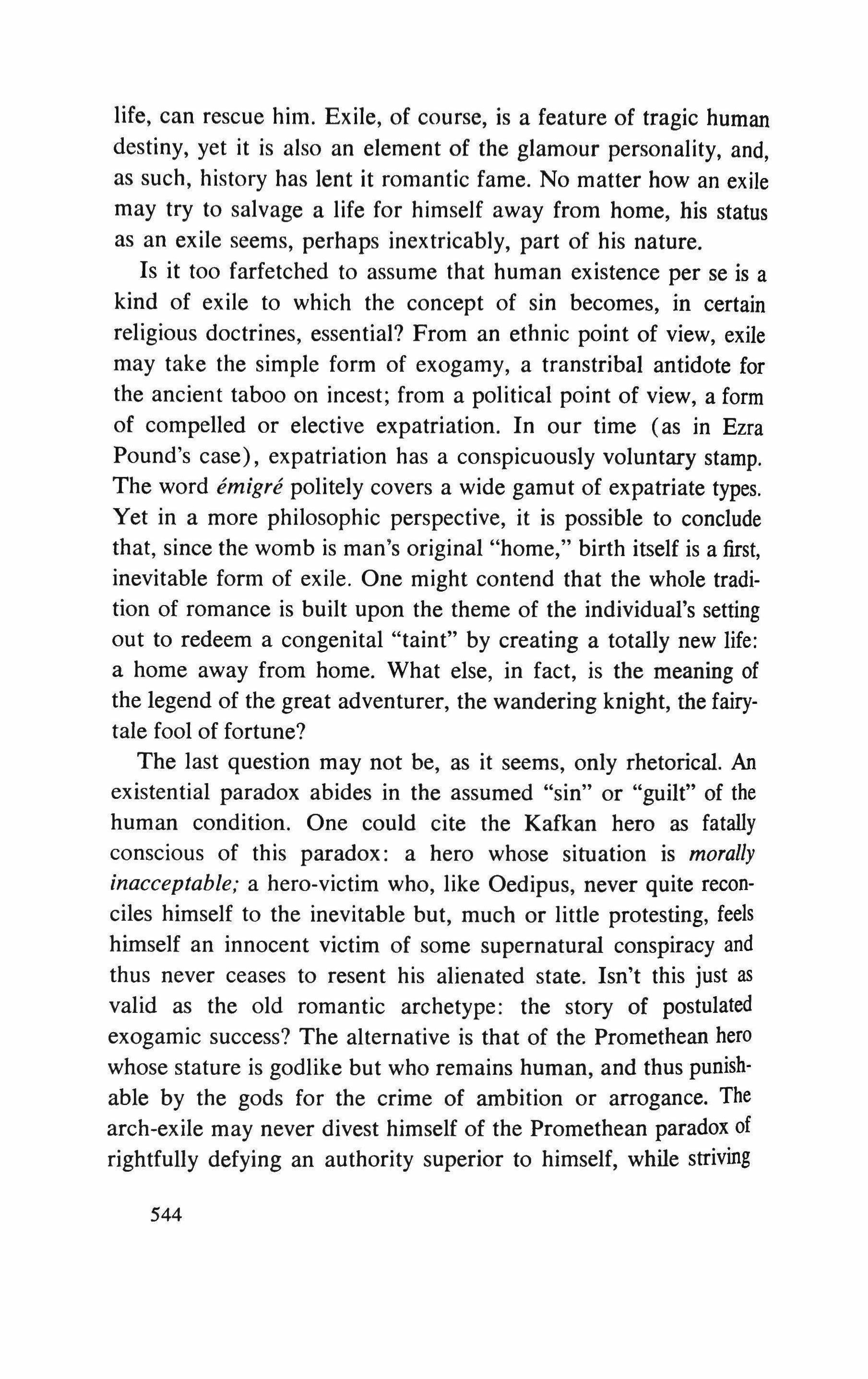
life, can rescue him. Exile, of course, is a feature of tragic human destiny, yet it is also an element of the glamour personality, and, as such, history has lent it romantic fame. No matter how an exile may try to salvage a life for himself away from home, his status as an exile seems, perhaps inextricably, part of his nature.
Is it too farfetched to assume that human existence per se is a kind of exile to which the concept of sin becomes, in certain religious doctrines, essential? From an ethnic point of view, exile may take the simple form of exogamy, a transtribal antidote for the ancient taboo on incest; from a political point of view, a form of compelled or elective expatriation. In our time (as in Ezra Pound's case), expatriation has a conspicuously voluntary stamp. The word emigre politely covers a wide gamut of expatriate types. Yet in a more philosophic perspective, it is possible to conclude that, since the womb is man's original "home," birth itself is a first, inevitable form of exile. One might contend that the whole tradition of romance is built upon the theme of the individual's setting out to redeem a congenital "taint" by creating a totally new life: a home away from home. What else, in fact, is the meaning of the legend of the great adventurer, the wandering knight, the fairytale fool of fortune?
The last question may not be, as it seems, only rhetorical. An existential paradox abides in the assumed "sin" or "guilt" of the human condition. One could cite the Kafkan hero as fatally conscious of this paradox: a hero whose situation is morally inacceptable; a hero-victim who, like Oedipus, never quite reconciles himself to the inevitable but, much or little protesting, feels himself an innocent victim of some supernatural conspiracy and thus never ceases to resent his alienated state. Isn't this just as valid as the old romantic archetype: the story of postulated exogamic success? The alternative is that of the Promethean hero whose stature is godlike but who remains human, and thus punishable by the gods for the crime of ambition or arrogance. The arch-exile may never divest himself of the Promethean paradox of rightfully defying an authority superior to himself, while striving 544

to deserve (even as Oedipus) the ultimate reward of human success.
To view the emigre Pavel Tchelitchew in this larger light is to see him as arch-exile and instinctive mystic who, aristocratic to the point of arrogance, could never rid himself of a sense of guilt, one who somehow deserved the misfortunes-self-exaggerated as a rule-that began with the total expropriation of his hereditary wealth by the Soviet authorities. At that moment in August 1918 -a month before his twentieth birthday-Tchelitchew became homeless and indigent on his native soil and set off on his lifetime adventure as a more or less rootless wanderer-with his sole wealth, at first, the potential of his artistic genius. To the end, he felt profoundly insecure. His high-keyed temperament, his established homosexuality, his instinct to dramatize and mythify himself, and his tendency to fuse the crudest superstition with an intellectual affinity for mysticism, did not prepare him for the struggles, the "bad luck," that lay ahead. Many times he greeted a bad turn of fortune with the esoteric cry of Karma's nemesis: "I don't know what it is it must be something I did!" He was a man who, though eminently practical in some ways, was actually as "pragmatic" as those medieval magicians who were retained to manufacture gold but at times were, mysteriously, half-killed by "the Devil." Skeptics assume that their punishment, to account for failure in their task, was self-inflicted. Still, alchemy may be construed as a superhuman pretension, and the Devil (even as a hired confederate) a suitable symbol for God's anger.
Knowing Tchelitchew thoroughly, one is tempted to say that he evoked his own vengeful Devil, that he suffered from a moral masochism. Such would be a logical fate for paranoid aristocrats who must earn their own living, whatever the living might be. If others of the Russian nobility escaped paranoia in exile, it may have been because they chose anonymity or else became grocers, farmers, and cabdrivers. Pursuing a painter's career in Europe and the United States, Tchelitchew persevered, fearing fate and courting fortune with equal diligence, gradually making a name
545

for himself. In time, however, the psychology of bad luck-since he believed that he was never quite successful enough-overcame everything. The character of his end was as if predestined. In 1956, at the age of fifty-nine, he personally organized a financially successful exhibit of his paintings, his last, in Paris. The physical strain was too much. Soon after returning to his home near Rome, he caught pneumonia, ignored the mild symptoms, and on Christmas Eve suffered a heart attack. In acute danger he was hospitalized. Although he survived the double pneumonia, he died six months later of heart damage.
The fatal show of 1956, of whose success he instantly boasted in letters to friends, had been a sellout. Among the buyers were four or five titled persons whose status as his collectors (they were also friends) harmonized with his own status as a conscious member of Russia's oldest nobility, one of the boyar lines whose political power had been crushed by Ivan the Terrible. Tchelitchew was always intensely aware of his once-rightful patrimony. It both haunted and consoled him. When the Soviet regime expropriated his family's holdings, it was actually ratifying the much older expropriation.
A complex irony infuses the remark made in a New York theater box, in the late thirties, by the Grand Duchess Marie (a Romanov) to an old friend of Tchelitchew's, Mme. Zossia Kochansky. Nodding toward the Russian artist, who occupied an orchestra seat, the Grand Duchess said, "There is someone who is nobler than we are." The irony was pointed because the title-less Tchelitchews, at the time of the Romanovs' downfall, could trace their German origin back to the thirteenth century, whereas the reigning boyar line of Romanovs traced itself only to the fourteenth century. As for being "German," the Romanovs (something the Grand Duchess probably had in mind when she nodded toward Tchelitchew) connected themselves with the German house of Brunswick only later, in the eighteenth century, through Ivan VI, son of the Duke of Brunswick.
According to the Collection of Data for the History of the Tchelitchew Family (1893), the thirteenth-century origin of the
546

Tchelitchews was a German named Wilchen, last descendant of King Otton, Kurfurst of Llineberg, a city which eventually became capital of the duchy of Brunswick-Llineberg. So it appears that those Romanov "foreigners" who took up the tsarist rule of Russia were joined, by a circuitous route, to the Tchelitchews themselves. Simultaneously, in 1917-1918, both families were expropriated and either killed or dispersed. One of Pavel Tchelitchew's brothers, Mikhail, died in the Battle of the Don while serving in the White Army. After the final rout of that army (whose uniform Pavel also wore at the time), the young artist was able to escape to Constantinople on a French warship. The escape was arranged through the personal offices of the French admiral-to-be, J. F. Darlan, then quartered in Russia.
Much later in his life, to his intimates, Tchelitchew would portray his conquest of Darlan, whom he had approached as an utter stranger, as real sexual seduction. This reinforced his notion that exile from his native land was not only an act of choice but a hero's ingenious strategy. How much objective danger Tchelitchew might have run into, had he chosen to stay in Russia, must remain an open question. His three half sisters-Natalya, Varvara, and Manya (Marya)-elected to stay; only his sister Choura (Alexandra) chose to go into exile with him. Choura came to Europe as an army nurse with the last remnant of the White Army to escape Russia by ship. Eventually she arrived in Paris, where in 1923 brother and sister were reunited for the first time since their separation in Kiev, the city to which most of the family had fled after having been expelled from their estates. Nietzsche declared, "I chose exile in order to be able to speak the truth." Was Tchelitchew, by instinct of the same conviction, also choosing moral enfranchisement? We may think so if a philosophic level of thought be equated with the passionate drive of this artist's mystical impulse. Though for twenty-two years 1 was his personal friend, 1 never heard Tchelitchew argue the logic of his exile as either elective or imposed. If he had any rationale, it was an irrationale. As a calamity, it was a figment of fate to which he had to submit. Yet it held, undoubtedly, the brilliant mirage of
547
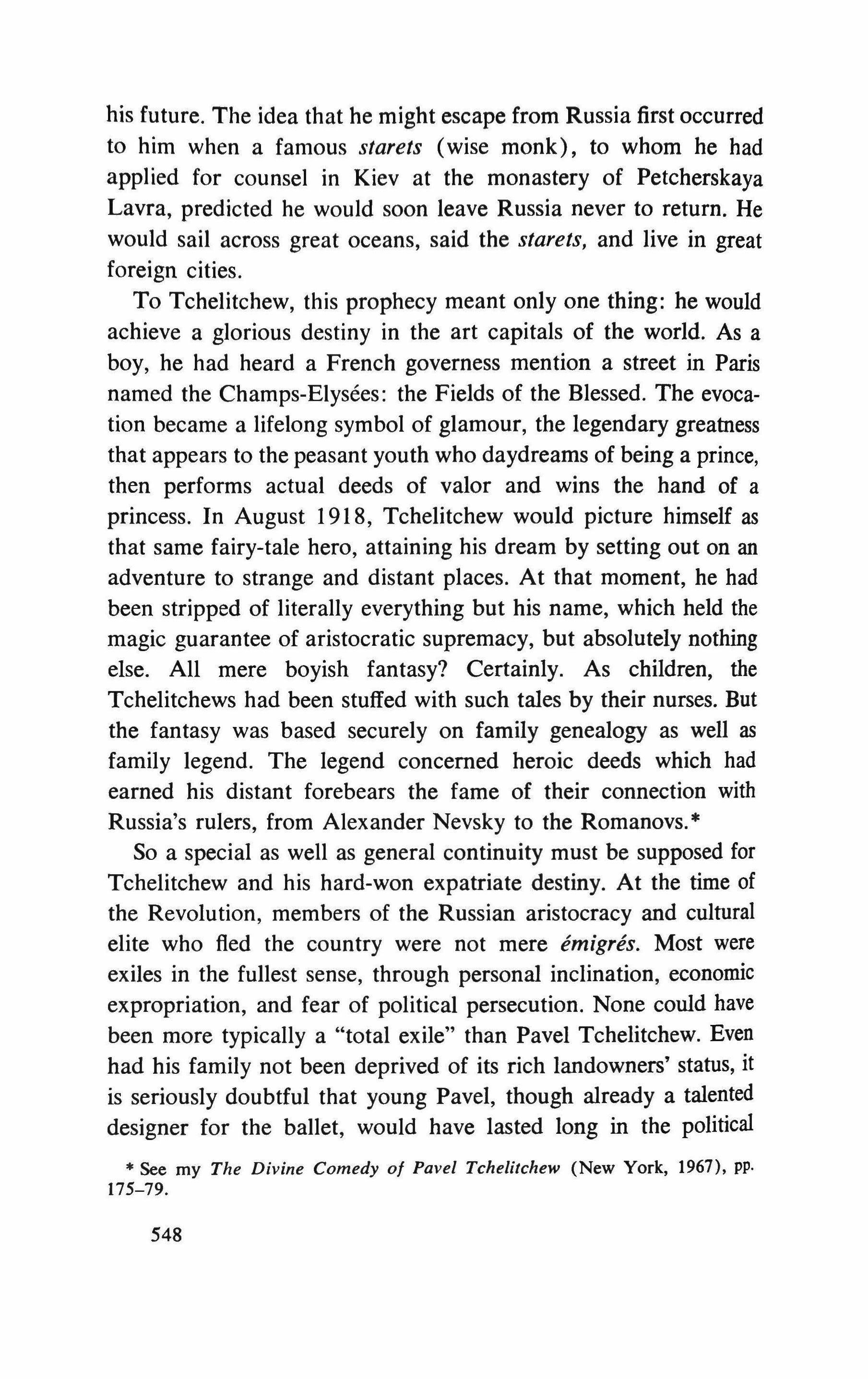
his future. The idea that he might escape from Russia first occurred to him when a famous starets (wise monk), to whom he had applied for counsel in Kiev at the monastery of Petcherskaya Lavra, predicted he would soon leave Russia never to return. He would sail across great oceans, said the starets, and live in great foreign cities.
To Tchelitchew, this prophecy meant only one thing: he would achieve a glorious destiny in the art capitals of the world. As a boy, he had heard a French governess mention a street in Paris named the Champs-Elysees: the Fields of the Blessed. The evocation became a lifelong symbol of glamour, the legendary greatness that appears to the peasant youth who daydreams of being a prince, then performs actual deeds of valor and wins the hand of a princess. In August 1918, Tchelitchew would picture himself as that same fairy-tale hero, attaining his dream by setting out on an adventure to strange and distant places. At that moment, he had been stripped of literally everything but his name, which held the magic guarantee of aristocratic supremacy, but absolutely nothing else. All mere boyish fantasy? Certainly. As children, the Tchelitchews had been stuffed with such tales by their nurses. But the fantasy was based securely on family genealogy as well as family legend. The legend concerned heroic deeds which had earned his distant forebears the fame of their connection with Russia's rulers, from Alexander Nevsky to the Romanovs. *
So a special as well as general continuity must be supposed for Tchelitchew and his hard-won expatriate destiny. At the time of the Revolution, members of the Russian aristocracy and cultural elite who fled the country were not mere emigres. Most were exiles in the fullest sense, through personal inclination, economic expropriation, and fear of political persecution. None could have been more typically a "total exile" than Pavel Tchelitchew. Even had his family not been deprived of its rich landowners' status, it is seriously doubtful that young Pavel, though already a talented designer for the ballet, would have lasted long in the political
* See my The Divine Comedy of Pavel Tchelitchew (New York, 1967), pp, 175-79.
548

climate of the new state. In September 1917, Konstantin Korovin, head designer at the Bolshoi Theatre, is supposed to have offered Tchelitchew a collaborative role on two forthcoming operas. The immature artist's first theater love had been the court ballet and grand opera. According to his own testimony, the operatic aria was dear to him from his earliest youth as an expanded trope of life style. As stylistic lodestone, the aria may be detected in many aspects of his art, both theatrical and nontheatrical, as well as in his personal manners. As a drawing-room figure he was a spotlightgrabber and spellbinder. In the purest aesthetic sense, then, this Russian artist was a tsarist exile. Until he came to Paris, following sojourns in Constantinople and Sofia, he was to do little work but design for the ballet and opera, an activity climaxed by the sets and costumes he designed for Le Coq d'Or at the Berlin State Opera.
Yet as the easel painter and stage designer he became in ensuing years, his particular life style is best illustrated by his relations with his successive leading patrons, to whom, for varying periods of time, he was very close. Throughout his life, Tchelitchew acted the court favorite, arrogating whenever he could the "royal" prerogative itself. If at times he put on aristocratic airs, as when, soon after coming to Berlin, he added a "von" and multiple consonants to his name, it was as much a professional device as anything else. The American pianist Allen Tanner, who preceded the poet Ford as the artist's lover, mentioned to me his awe at overhearing someone in the green room of the Russian Romantic Theatre (Berlin) asking for "Herr von Tchelistscheff." Tchelitchew had adapted the spelling of his name to the German penchant for consonantal density. On a photograph taken about 1921, his name appears incredibly as "Tschelischtscheff." * This meant not a taste for pomposity but rather, I think, protocol. A carping observer might too easily assume that Tchelitchew "playacted" the aristocrat. Granting that he was an inveterate self-dramatizer, it would be more accurate to say that he was the aristocrat and
But this monstrosity does convey the Russian pronunciation in German. EDITOR.
549

playacted the prima donna. Still he brought the same ferocity to his artistic labors that he brought to his awareness of his blood and education.
This was most conspicuous in regard to the friendships he later formed with two illustrious female patrons, Gertrude Stein and Edith Sitwell. Miss Stein, whom he met about two years after coming to Paris from Berlin in 1923, was, it is true, the nononsense type and herself a sort of empress. But for her benefit, Pavel was careful to cultivate a charming poor-young-genius-andromantic-exile role. For a few years, he and his companion, Tanner, were known to Miss Stein and her companion, Miss Toklas, as Hies en/ants de la maison." It was a position Tchelitchew guarded with hypersensitive pride, so that when young rivals began making irksome inroads with Miss Stein (who was just as heady and autocratic as himself), neither Tchelitchew's pride nor his tactic could prevent an ultimate break with her.
After all, there were limits to being the pampered favorite sitting at the feet of patrons who were great salonieres. In the Sofia and Berlin (pre-1924) phases of Tchelitchew's career, his patrons had been the musicologist Pierre Souvtchinsky and his mother, Anna Ivanovna. Though Mme. Souvtchinsky was extremely fond of Pavel, the exilic status of mother and son had made these patrons almost as poor as Tchelitchew himself. Still, he had casual clients and patrons and also the prospect of doing a ballet for Diaghilev, who had told him in Berlin that he ought to come to Paris-this ballet did not materialize until he did Ode for Diaghilev in 1928. There were limits, also, to mere affection and admiration, so that the hustling young artist found it expedient to gradually break off with the Souvtchinskys. It may be suspected that, in an even more devious sense, he did the same, about 1927, with Miss Stein. In 1960, a remark made to me by Alice B. Toklas is pretty good evidence that this was so. "Pavlik," she told me, "thought he would have trouble getting rid of Gertrude." Tchelitchew was worldly enough and shrewd enough to have manipulated Miss Stein had he really cared to remain her cherished protege. Yet the haughty impatience of this struggling artist could become a vice.
550

Besides, he was superb at reading very small signs. The fact was that both patron and favorite were keen evaluators of cultural and professional status. While Miss Stein at first "believed" in the painter as a new young genius (she bought the legendary Basket of Strawberries and other works), his stock was not rising rapidly enough in the art world to suit either of them.
Tchelitchew's pride was quite genuinely aristocratic: he could take offense very spontaneously; usually it happened that certain incidents would make the "offensiveness" mutual. Hence, exit Gertrude Stein from Tchelitchew's career; enter Edith Sitwell. If eventually Tchelitchew and Tanner had the Stein door politely shut in their faces, the artist gained his revenge when he suggested to the late Dame Edith (then Miss Sitwell, to whom in fact Miss Stein had introduced him), that she omit Miss Stein's poetry from a solo recital she was to give at Sylvia Beach's bookshop. Miss Stein attended but found that her poems were not among those read, though lately she had done the courtesies of the town to Miss Sitwell. She probably never forgave either Tchelitchew or his new patron, who chose to read mostly Shakespeare and her own work. Moreover, James Joyce, also present at the reading, witnessed the pointed snub.
The truth was that, for Tchelitchew, Edith Sitwell was far more malleable, more empathetic a patron than Gertrude Stein. He staunchly believed what may very well have been true, to some extent anyway: that Edith Sitwell quickly fell in love with "the Russian genius." Soon he began telling intimates that he had to avoid the lady's physical embraces. Seemingly, despite Tchelitchew's verbal indiscretions, Miss Sitwell always preserved a tactful and absolute silence about this aspect of their relationship. Lacking material witnesses, the case for Tchelitchew's allegation must remain open. Personally, however, I am inclined to believe that it was not without foundation.
The artist lived to actually regret having allowed Dame Edith to "triumph," as he would put it, in her "quarrel" over him with Miss Stein. But that was after his dramatic disillusionment with the English poet when she came to the United States in 1949 on
551

a recital tour. Tchelitchew, who had been carrying on an Olympian wartime correspondence with her (one they both considered equal to the correspondence between Michelangelo and Vittoria Colonna), had himself suggested and helped promote the visit, on which Miss Sitwell was accompanied by her brother, Sir Osbert. The tour was phenomenally successful, too successful, actually, for Tchelitchew, who had expected that his great spiritual affinity with Miss Sitwell, achieved through the exchange of hundreds of letters, would induce the lady to place him in the spotlight with her wherever she went, and that, at all events, she would devote considerable time to him.
Nothing of the sort happened-if only because Tchelitchew almost immediately, with a rigor that must have astonished and grieved his old friend, began showing unmistakable signs of displeasure with her. By this time, Tchelitchew had become an American citizen and doubtless added patriotic pride to personal pride. If Miss Sitwell represented British culture, Tchelitchew (at least in his own eyes) represented American culture. In my biography of the artist, I have tried to analyze the reasons for that curious anticlimax to a deep and prolonged friendship, during which Miss Sitwell had successfully championed the artist's London debut. Eventually, in the fifties in Europe, the technical rupture between them was mended, but as the two then hardly ever saw each other, and seldom corresponded, the reconciliation was formal, indeed somewhat hollow.
The mystery, finally, must lie with Tchelitchew's temperament, fully as egotistically arrogant as it was hypersensitive. During the months in 1949 when Miss Sitwell made her visit to the United States, Tchelitchew's displeasure took the shape of critical rebukes and hostile lectures addressed to his dear friend on occasions as public as large dinner parties. Lincoln Kirstein was present on two such occasions, both dinners given in the visitor's honor, and reported that at a farewell dinner the lady was reduced to bitter tears by Tchelitchew's frontal attack. He accused her of ungraciousness, of arrogance, and of "neglecting les jeunes," The poet Charles Henri Ford, who had supplanted Tanner in 1934 and persuaded
552

the artist to live in the United States (where he achieved his most potent fame) , was, of course, regarded by Tchelitchew as America's leading scion of les jeunes. At first suspicious of Ford, and cool to him, Miss Sitwell had been won over to him and his gifts with the aid of Tchelitchew's persuasions.
To be sure, this courtly aristocrat had a history of violent quarrels with all his intimates, male and female, with his lovers, and with his most loyal supporters. Less intimate with Igor Stravinsky, more so with George Balanchine-both on different occasions his collaborators in the theater-Tchelitchew momentarily could fall out even with those two, though his gesture might take the form of sudden illness or some other obscure cause for his refusal to further a theater project on which he had engaged, or was to engage. It should be borne in mind that the horde of Russian emigres to Europe and this country contained more than one who were very distinguished as artists in their own right. The only flaw in such compatriots, in Tchelitchew's eyes, might well be that, at a given moment, they showed themselves insufficiently "Tchelitchevian.
Actually Tchelitchew had developed to a high point the independent art of picking quarrels. One can only speculate on how spontaneously the various quarrels arose, and whether or not they were products of a cold strategy on the artist's part or issued from a dimly evil necessity of which he himself was the first victim. Sometimes, as with Balanchine, there was no question of a decisive break or flaring quarrel, but rather a circumstantial drifting apart. Was Tchelitchew increasingly possessed, perhaps partly owing to his superstitious nature, by exilic paranoia? Were even his loversthe tenderest and most physical and emotional relationshipsto be regarded as career assets or debits which he gauged tacitly in terms of stock-market quotations? Tchelitchew's life, adequately charted, reveals a disconcertingly repetitious pattern of the systematic breaking off of relationships, always marked by recurrent violent scenes. This was true of even his longest, doubtless most genuine and intimate attachment-to Ford, his domestic companion to the end in spite of Tchelitchew's frequent threats of
553
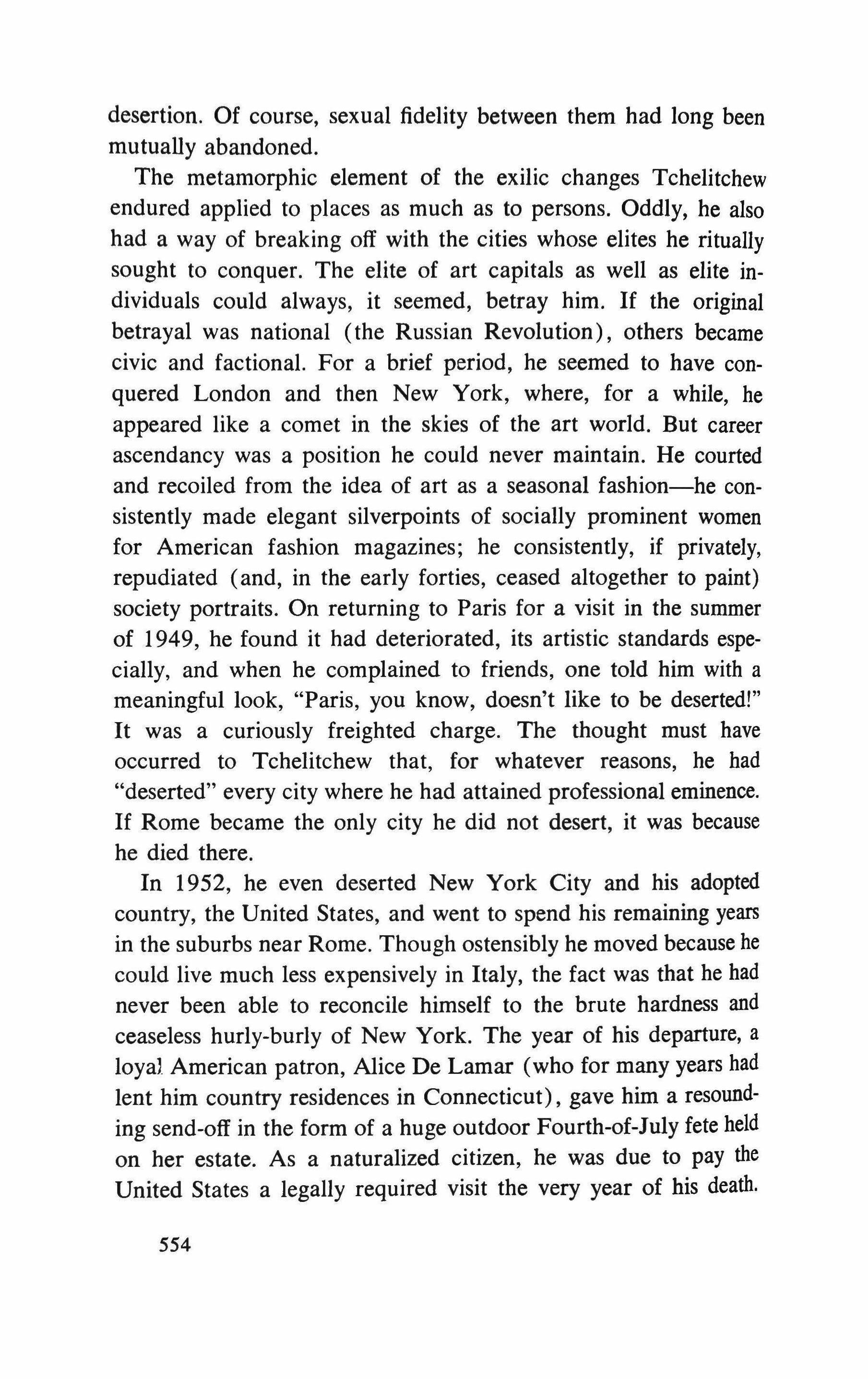
desertion. Of course, sexual fidelity between them had long been mutually abandoned.
The metamorphic element of the exilic changes Tchelitchew endured applied to places as much as to persons. Oddly, he also had a way of breaking off with the cities whose elites he ritually sought to conquer. The elite of art capitals as well as elite individuals could always, it seemed, betray him. If the original betrayal was national (the Russian Revolution), others became civic and factional. For a brief period, he seemed to have conquered London and then New York, where, for a while, he appeared like a comet in the skies of the art world. But career ascendancy was a position he could never maintain. He courted and recoiled from the idea of art as a seasonal fashion-he consistently made elegant silverpoints of socially prominent women for American fashion magazines; he consistently, if privately, repudiated (and, in the early forties, ceased altogether to paint) society portraits. On returning to Paris for a visit in the summer of 1949, he found it had deteriorated, its artistic standards especially, and when he complained to friends, one told him with a meaningful look, "Paris, you know, doesn't like to be deserted!" It was a curiously freighted charge. The thought must have occurred to Tchelitchew that, for whatever reasons, he had "deserted" every city where he had attained professional eminence. If Rome became the only city he did not desert, it was because he died there.
In 1952, he even deserted New York City and his adopted country, the United States, and went to spend his remaining years in the suburbs near Rome. Though ostensibly he moved because he could live much less expensively in Italy, the fact was that he had never been able to reconcile himself to the brute hardness and ceaseless hurly-burly of New York. The year of his departure, a loyal American patron, Alice De Lamar (who for many years had lent him country residences in Connecticut), gave him a resounding send-off in the form of a huge outdoor Fourth-of-July fete held on her estate. As a naturalized citizen, he was due to pay the United States a legally required visit the very year of his death.
554

Had he lived, he would have returned to this country only as a matter of form.
An extraordinary factor infused all these exilic changes, in which the involuntary exile so easily became the unstable, chameleon expatriate. Early on, as one arriving here "to conquer America," Tchelitchew had professed an outgoing, sincere Americanomania. The paradox of this deeply situated exile and deeply situated artist was that, despite his aristocratic arrogance, immitigable ego, and career mania, he seemed in chronic need of acolytes, lovers, and domestic slaves as well as powerful patrons-each of whom was supposed to obey a norm of "psychic" well-wishing. Certainly, he was increasingly subject to physical illness, whatever its causes or foundation, and this greatly increased his mental anxiety. In the main, I think, he suffered from an exilic insecurity whose only true remedy would have been the most financially rewarding, the most preeminent and indubitable, fame. Although at times he seemed to be on its threshold, this sort of renown never materialized. Invariably there was an ebb to each tide of success. The plateau of his career success probably extends from 1938, when he exhibited Phenomena (the first part of his "Divine Comedy") in Paris, London, and New York and designed Jouvet's brilliant Ondine in Paris, to his retrospective show in 1942 at the Museum of Modem Art in New York, which had acquired for its permanent collection his just-finished large painting, Hide and Seek (the Purgatory of his "Divine Comedy").
The latter work remains the only widely known monument to his fame. The rest is a distinguished exile's legend and a not always recognized place in art history. When he died, the celebrity requested by the London Times to write his obituary (a brief one) belonged to the world of theater arts and photography: the present Sir Cecil Beaton. Ever since he had been introduced to Tchelitchew by Edith Sitwell in London, Beaton (so he professed to me once) had been "awed" by the Russian exile's talent and glamour, but as it turned out it was Tchelitchew, not his elegistto-be, who would suffer from the struggle to live and win an international reputation.
555
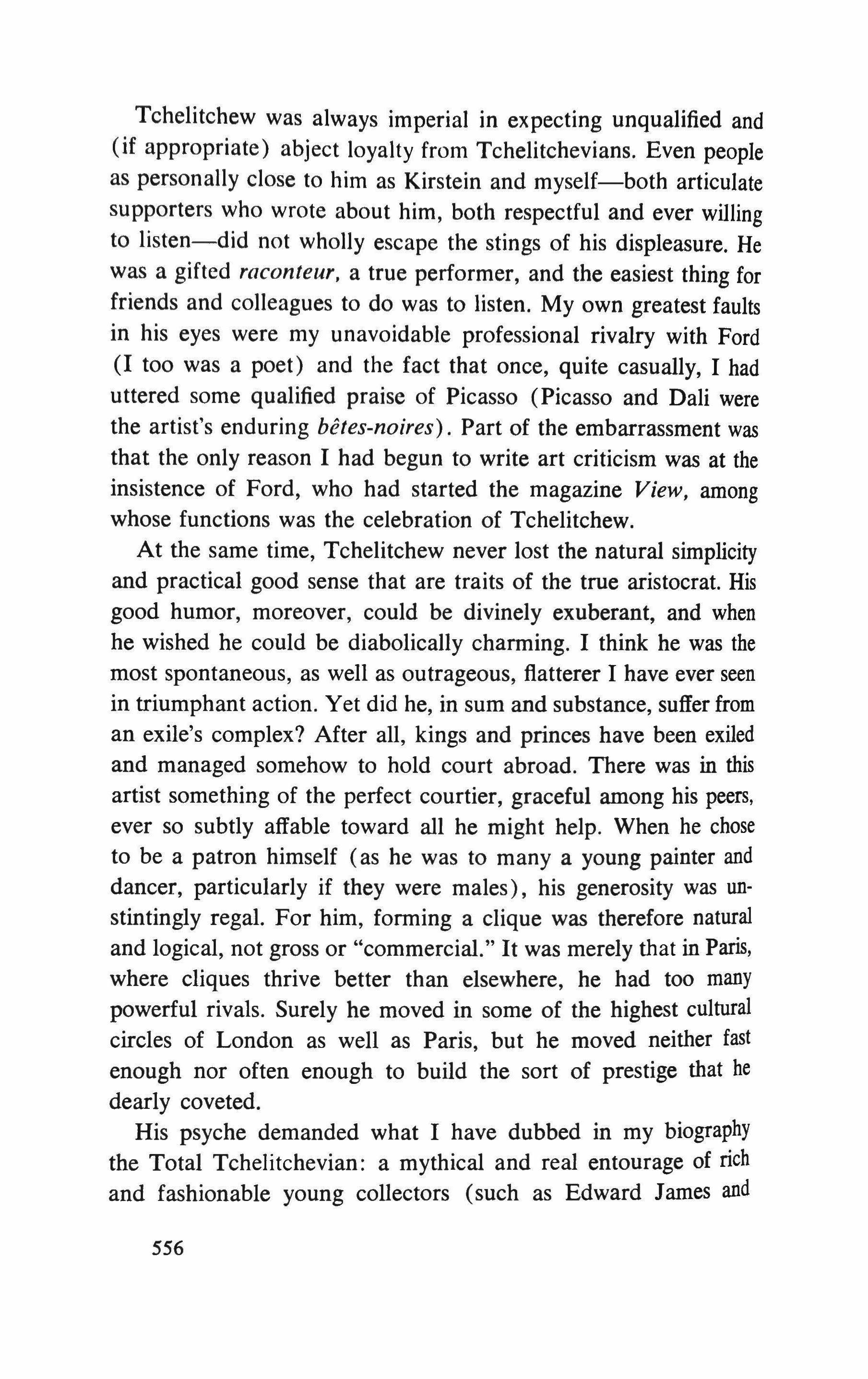
Tchelitchew was always imperial in expecting unqualified and (if appropriate) abject loyalty from Tchelitchevians. Even people as personally close to him as Kirstein and myself-both articulate supporters who wrote about him, both respectful and ever willing to listen-did not wholly escape the stings of his displeasure. He was a gifted raconteur, a true performer, and the easiest thing for friends and colleagues to do was to listen. My own greatest faults in his eyes were my unavoidable professional rivalry with Ford (I too was a poet) and the fact that once, quite casually, I had uttered some qualified praise of Picasso (Picasso and Dali were the artist's enduring betes-noires) Part of the embarrassment was that the only reason I had begun to write art criticism was at the insistence of Ford, who had started the magazine View, among whose functions was the celebration of Tchelitchew.
At the same time, Tchelitchew never lost the natural simplicity and practical good sense that are traits of the true aristocrat. His good humor, moreover, could be divinely exuberant, and when he wished he could be diabolically charming. I think he was the most spontaneous, as well as outrageous, flatterer I have ever seen in triumphant action. Yet did he, in sum and substance, suffer from an exile's complex? After all, kings and princes have been exiled and managed somehow to hold court abroad. There was in this artist something of the perfect courtier, graceful among his peers, ever so subtly affable toward all he might help. When he chose to be a patron himself (as he was to many a young painter and dancer, particularly if they were males), his generosity was unstintingly regal. For him, forming a clique was therefore natural and logical, not gross or "commercial." It was merely that in Paris, where cliques thrive better than elsewhere, he had too many powerful rivals. Surely he moved in some of the highest cultural circles of London as well as Paris, but he moved neither fast enough nor often enough to build the sort of prestige that he dearly coveted.
His psyche demanded what I have dubbed in my biography the Total Tchelitchevian: a mythical and real entourage of rich and fashionable young collectors (such as Edward James and 556

Peter Watson), a flock of wealthy dowagers who rated socially, distinguished colleagues, and professional admirers (such as art critics). At one time, two American art dealers of note, Julien Levy and R. Kirk Askew, Jr., were in turn Total Tchelitchevians and then, suddenly or gradually, tended to fade. At last, his health failed in the service of his exilic megalomania, a kind of neurosis which neither foreign citizenship (till the end of 1943 he had traveled everywhere on visas), love, friendship, nor the devotion of disciples and adherents could prestidigitate or reduce to insignificance.
World fame, absolute prestige, was therefore the only possible moral cure, and this remained, to the last, an intangible goal. While personally I think his artistic achievement great in its emotional depth and symbolic scope, the larger fact is that his legend survives as that of an exiled hero of ambiguous prestige, one victimized, with tragic hues, full of disturbing paradox. The "divine comedy" that was his life is impressively reflected in his art, whose final issue was that "celestial physiognomy" which joins his career permanently to the cryptic features of mysticism. A closed existential ecstasy may be every true exile's doom If Ovid, in Horia's novel, deliberately invented belief in God to escape that doom, Tchelitchew deliberately invented belief in a Paradise, whose necessary form was painting, to escape the same doom.
557
A note on Konstantin Korovin (1860-1939)
TATIANA KUSUBOVA
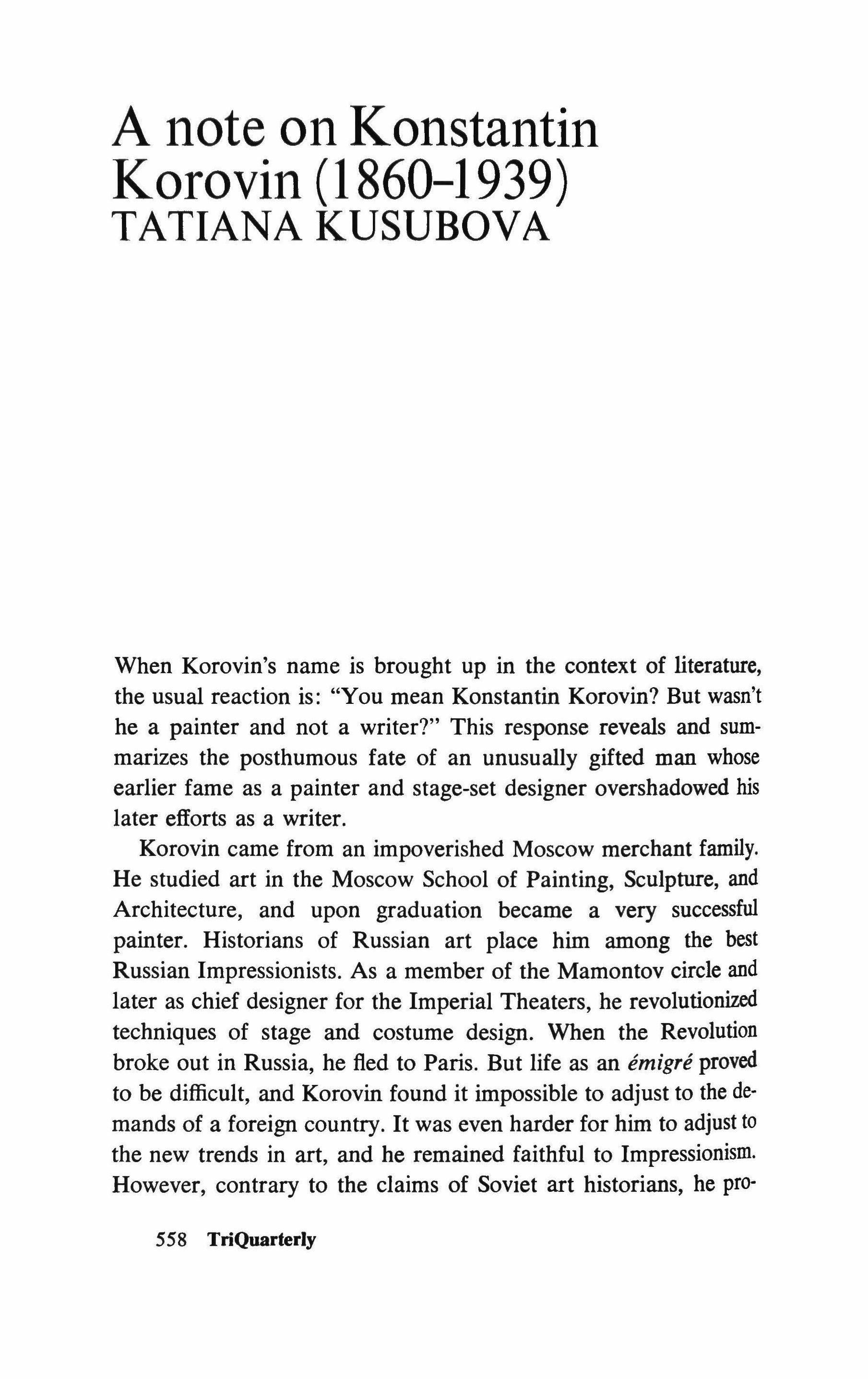
When Korovin's name is brought up in the context of literature, the usual reaction is: "You mean Konstantin Korovin? But wasn't he a painter and not a writer?" This response reveals and summarizes the posthumous fate of an unusually gifted man whose earlier fame as a painter and stage-set designer overshadowed his later efforts as a writer.
Korovin came from an impoverished Moscow merchant family. He studied art in the Moscow School of Painting, Sculpture, and Architecture, and upon graduation became a very successful painter. Historians of Russian art place him among the best Russian Impressionists. As a member of the Mamontov circle and later as chief designer for the Imperial Theaters, he revolutionized techniques of stage and costume design. When the Revolution broke out in Russia, he fled to Paris. But life as an emigre proved to be difficult, and Korovin found it impossible to adjust to the demands of a foreign country. It was even harder for him to adjust to the new trends in art, and he remained faithful to Impressionism. However, contrary to the claims of Soviet art historians, he pro-
558 TriQuarterly
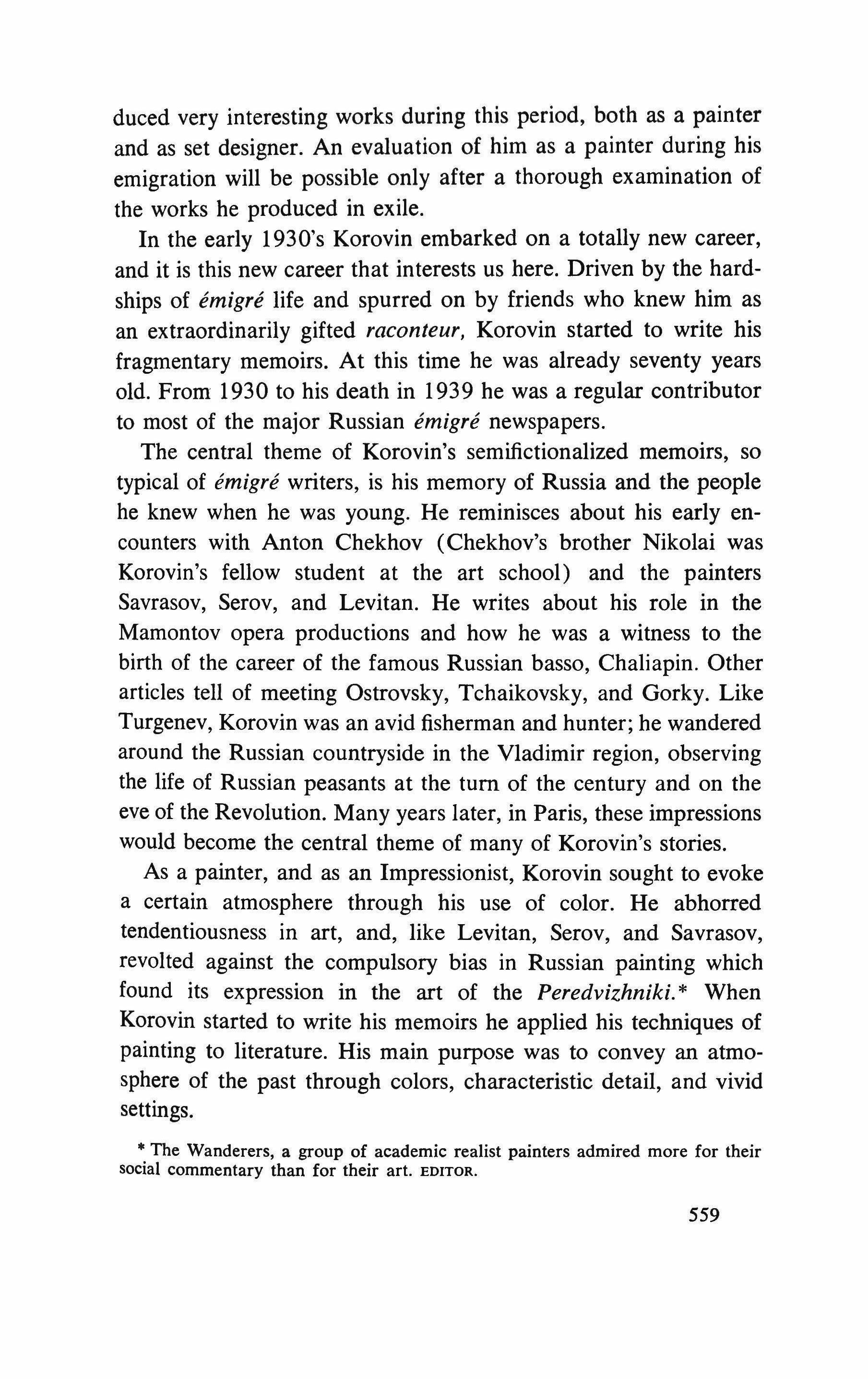
duced very interesting works during this period, both as a painter and as set designer. An evaluation of him as a painter during his emigration will be possible only after a thorough examination of the works he produced in exile.
In the early 1930's Korovin embarked on a totally new career, and it is this new career that interests us here. Driven by the hardships of emigre life and spurred on by friends who knew him as an extraordinarily gifted raconteur, Korovin started to write his fragmentary memoirs. At this time he was already seventy years old. From 1930 to his death in 1939 he was a regular contributor to most of the major Russian emigre newspapers.
The central theme of Korovin's semifictionalized memoirs, so typical of emigre writers, is his memory of Russia and the people he knew when he was young. He reminisces about his early encounters with Anton Chekhov (Chekhov's brother Nikolai was Korovin's fellow student at the art school) and the painters Savrasov, Serov, and Levitan. He writes about his role in the Mamontov opera productions and how he was a witness to the birth of the career of the famous Russian basso, Chaliapin. Other articles tell of meeting Ostrovsky, Tchaikovsky, and Gorky. Like Turgenev, Korovin was an avid fisherman and hunter; he wandered around the Russian countryside in the Vladimir region, observing the life of Russian peasants at the tum of the century and on the eve of the Revolution. Many years later, in Paris, these impressions would become the central theme of many of Korovin's stories.
As a painter, and as an Impressionist, Korovin sought to evoke a certain atmosphere through his use of color. He abhorred tendentiousness in art, and, like Levitan, Serov, and Savrasov, revolted against the compulsory bias in Russian painting which found its expression in the art of the Peredvizhniki. * When Korovin started to write his memoirs he applied his techniques of painting to literature. His main purpose was to convey an atmosphere of the past through colors, characteristic detail, and vivid settings.
• The Wanderers, a group of academic realist painters admired more for their social commentary than for their art. EDITOR.
559
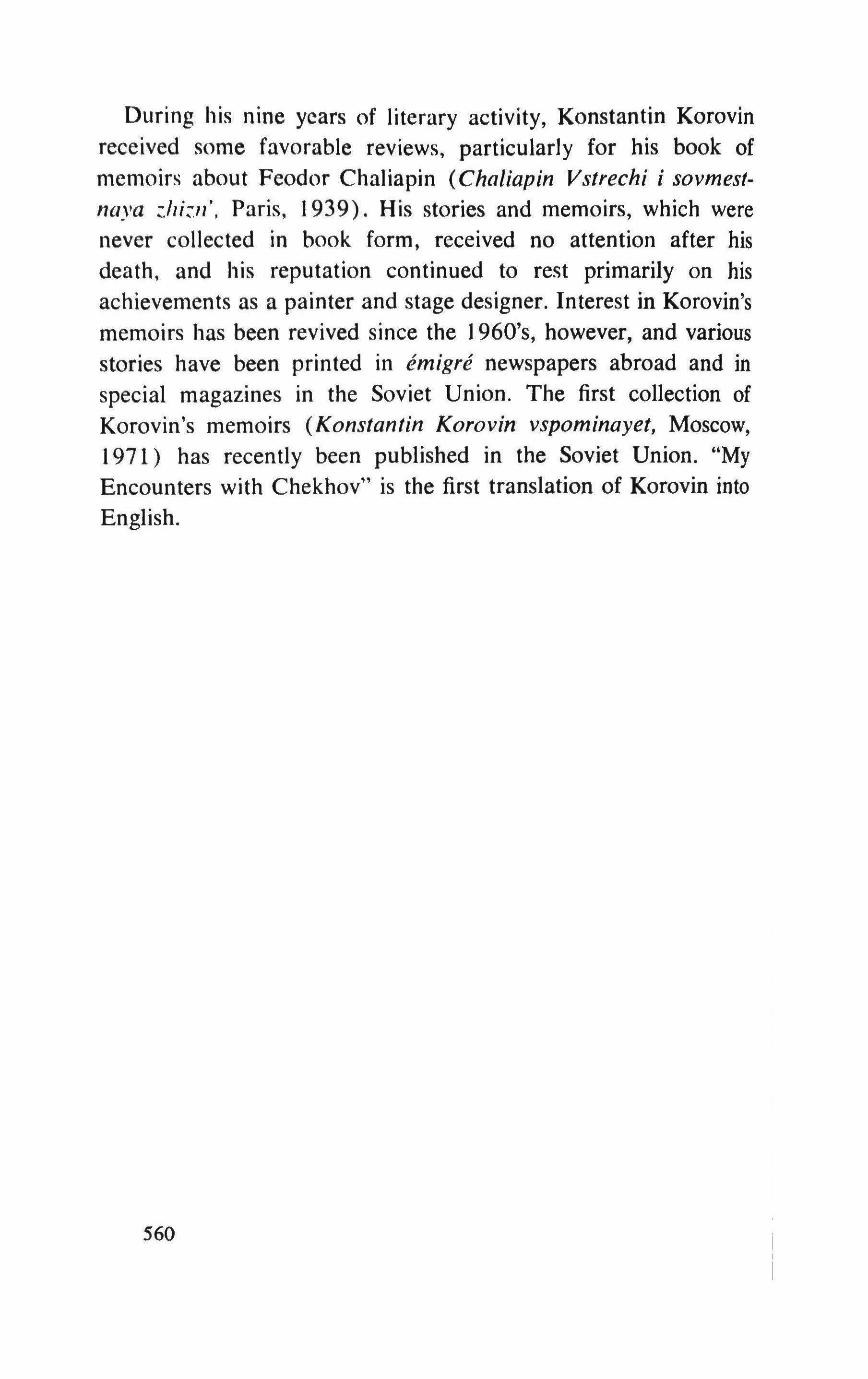
During his nine years of literary activity, Konstantin Korovin received some favorable reviews, particularly for his book of memoirs about Feodor Chaliapin (Chaltapin Vstrechi i sovmestnava zhizn', Paris, 1939). His stories and memoirs, which were never collected in book form, received no attention after his death, and his reputation continued to rest primarily on his achievements as a painter and stage designer. Interest in Korovin's memoirs has been revived since the 1960's, however, and various stories have been printed in emigre newspapers abroad and in special magazines in the Soviet Union. The first collection of Korovin's memoirs (Konstantin Korovin vspominayet, Moscow, 1971) has recently been published in the Soviet Union. "My Encounters with Chekhov" is the first translation of Korovin into English.
560
My encounters with Chekhov KONSTANTIN KOROVIN
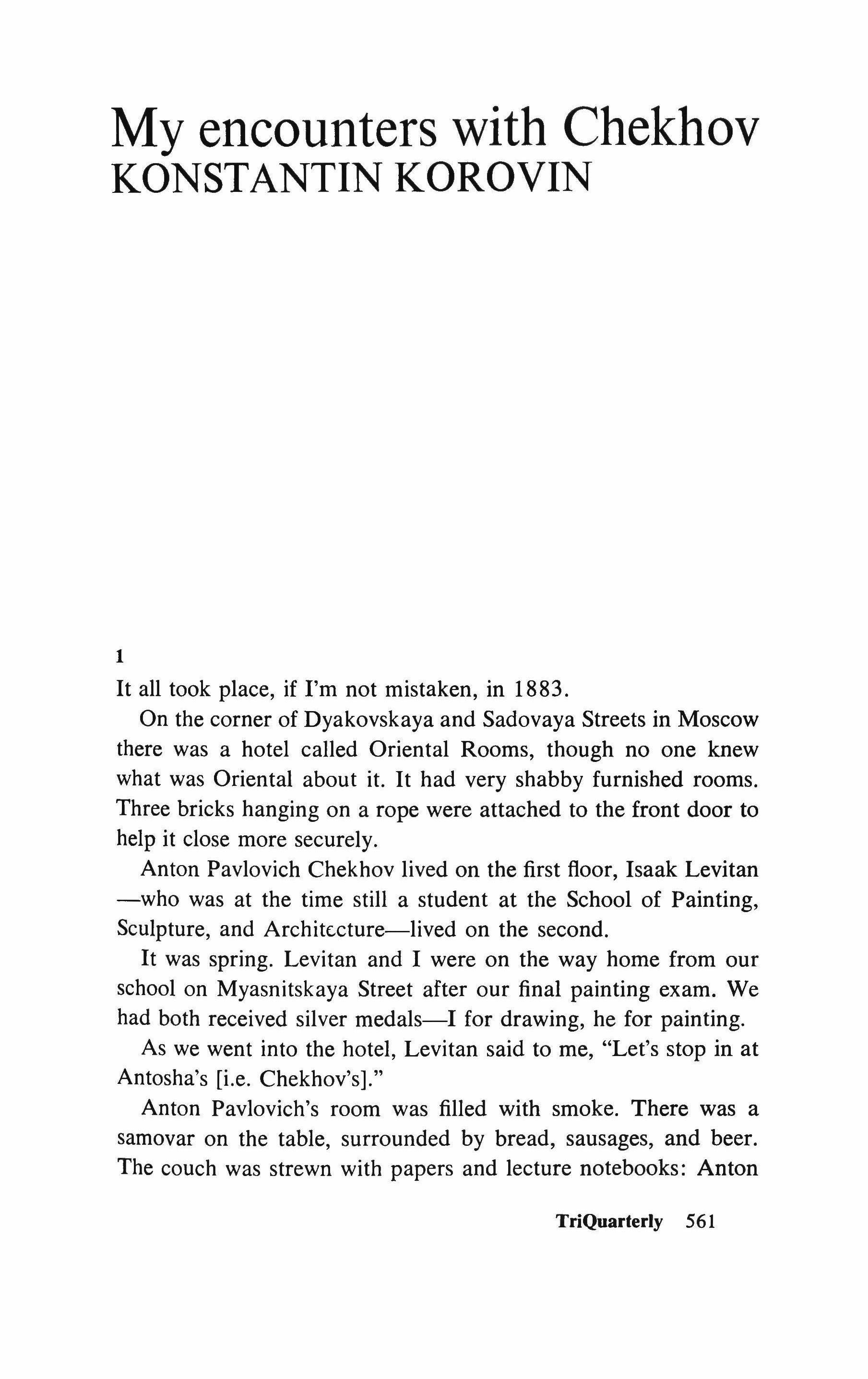
1
It all took place, if I'm not mistaken, in 1883.
On the corner of Dyakovskaya and Sadovaya Streets in Moscow there was a hotel called Oriental Rooms, though no one knew what was Oriental about it. It had very shabby furnished rooms. Three bricks hanging on a rope were attached to the front door to help it close more securely.
Anton Pavlovich Chekhov lived on the first floor, Isaak Levitan -who was at the time still a student at the School of Painting, Sculpture, and Architecture-s-lived on the second.
It was spring. Levitan and I were on the way home from our school on Myasnitskaya Street after our final painting exam. We had both received silver medals-I for drawing, he for painting.
As we went into the hotel, Levitan said to me, "Let's stop in at Antosha's [i.e. Chekhov's]."
Anton Pavlovich's room was filled with smoke. There was a samovar on the table, surrounded by bread, sausages, and beer. The couch was strewn with papers and lecture notebooks: Anton TriQuarterly 561
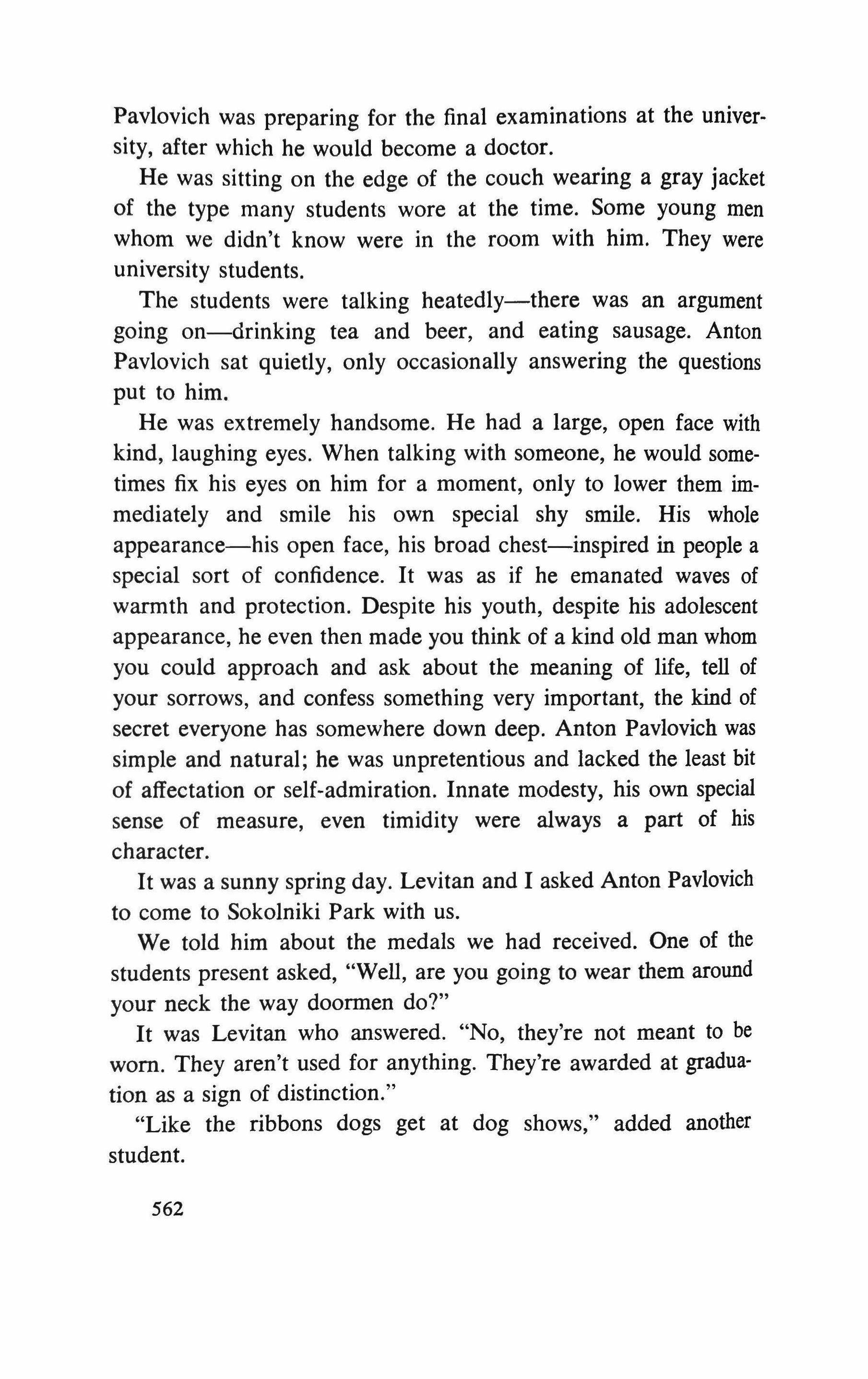
Pavlovich was preparing for the final examinations at the university, after which he would become a doctor.
He was sitting on the edge of the couch wearing a gray jacket of the type many students wore at the time. Some young men whom we didn't know were in the room with him. They were university students.
The students were talking heatedly-there was an argument going on-drinking tea and beer, and eating sausage. Anton Pavlovich sat quietly, only occasionally answering the questions put to him.
He was extremely handsome. He had a large, open face with kind, laughing eyes. When talking with someone, he would sometimes fix his eyes on him for a moment, only to lower them immediately and smile his own special shy smile. His whole appearance-his open face, his broad chest-inspired in people a special sort of confidence. It was as if he emanated waves of warmth and protection. Despite his youth, despite his adolescent appearance, he even then made you think of a kind old man whom you could approach and ask about the meaning of life, tell of your sorrows, and confess something very important, the kind of secret everyone has somewhere down deep. Anton Pavlovich was simple and natural; he was unpretentious and lacked the least bit of affectation or self-admiration. Innate modesty, his own special sense of measure, even timidity were always a part of his character.
It was a sunny spring day. Levitan and I asked Anton Pavlovich to come to Sokolniki Park with us.
We told him about the medals we had received. One of the students present asked, "Well, are you going to wear them around your neck the way doormen do?"
It was Levitan who answered. "No, they're not meant to be worn. They aren't used for anything. They're awarded at graduation as a sign of distinction."
"Like the ribbons dogs get at dog shows," added another student. 562

The students were different from Anton Pavlovich. They loved to argue, and they were in some peculiar way opposed to just about everything.
"If you have no convictions," said one student turning to Chekhov, "you can't be a writer."
"No one can say, 'I have no convictions,' said another. "I can't understand how anyone could not have convictions."
"I have no convictions," replied Chekhov.
"You claim to be a man without convictions, but how can you write a work of literature without any ideology? Don't you have an ideology?"
"I have no ideology and no convictions," answered Chekhov.
These students had an odd way of arguing. They were apparently displeased with Anton Pavlovich. It was clear that they could not fit him into the didactic turn of their outlook or into their moralizing ideology. They wanted to guide, to instruct, to lead, and to influence. They knew everything. They understood everything. And Anton Pavlovich was plainly bored by it all.
"Who needs your stories? Where do they lead? They don't oppose anything. They contain no ideas. The Russian Bulletin, say, would have no use for you. Your stories are entertaining and nothing else."
"Nothing else," answered Anton Pavlovich.
"And why, may 1 ask, do you sign your stories Chekhonte? What's the point of such an outlandish pen name?"
Chekhov laughed.
"And when you get to be a doctor," the student added, "you'll be ashamed of having written without ideology or protest."
"You're right," answered Chekhov, still laughing. Then he added, "Let's go to Sokolniki. It's a beautiful day. The violets will be in bloom by now. We can breathe fresh air and enjoy spring."
So off we went to Sokolniki.
At Red Gate we took a horse-drawn omnibus and rode past the train stations, past Red Pond and all the wooden houses with green and red iron roofs, out along the outskirts of Moscow.
563
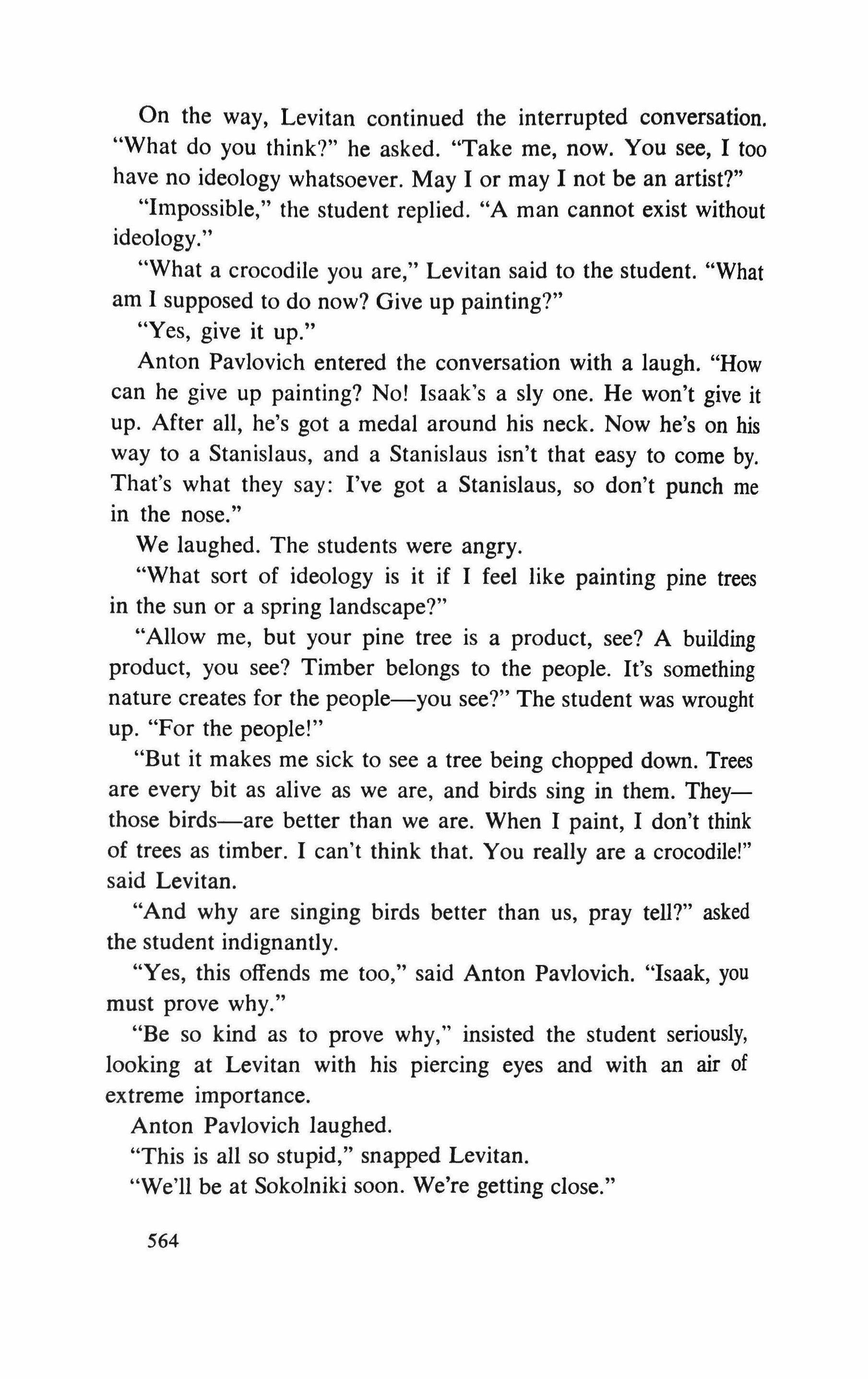
On the way, Levitan continued the interrupted conversation. "What do you think?" he asked. "Take me, now. You see, I too have no ideology whatsoever. May I or may I not be an artist?"
"Impossible," the student replied. "A man cannot exist without ideology. "
"What a crocodile you are," Levitan said to the student. "What am I supposed to do now? Give up painting?"
"Yes, give it up."
Anton Pavlovich entered the conversation with a laugh. "How can he give up painting? No! Isaak's a sly one. He won't give it up. After all, he's got a medal around his neck. Now he's on his way to a Stanislaus, and a Stanislaus isn't that easy to come by. That's what they say: I've got a Stanislaus, so don't punch me in the nose."
We laughed. The students were angry.
"What sort of ideology is it if I feel like painting pine trees in the sun or a spring landscape?"
"Allow me, but your pine tree is a product, see? A building product, you see? Timber belongs to the people. It's something nature creates for the people-you see?" The student was wrought up. "For the people!"
"But it makes me sick to see a tree being chopped down. Trees are every bit as alive as we are, and birds sing in them. Theythose birds-are better than we are. When I paint, I don't think of trees as timber. I can't think that. You really are a crocodile!" said Levitan.
"And why are singing birds better than us, pray tell?" asked the student indignantly.
"Yes, this offends me too," said Anton Pavlovich. "Isaak, you must prove why."
"Be so kind as to prove why," insisted the student seriously, looking at Levitan with his piercing eyes and with an air of extreme importance.
Anton Pavlovich laughed.
"This is all so stupid," snapped Levitan. "We'll be at Sokolniki soon. We're getting close." 564

A lower class woman who was sitting next to Levitan held out a red Easter egg to him, saying, "You're a handsome boy. [Levitan was very handsome.] Eat this egg. My father died forty days ago. Pray for him."
Levitan and Chekhov burst out laughing. Levitan took the egg and asked what her father's name was so he would know for whom to pray.
"Are you a priest, son? Is that what you are?"
The woman had had a few too many. "They are students, that's what they are. What a bunch. A book under their arm and that's all they own. I declare
We arrived at Sokolniki Circle.
Getting out of the omnibus, the woman who was sitting next to us turned to Levitan and said in farewell: "Pray for my father. His name was Nikita Nikitich. And when you graduate from the seminary, you will have beautiful hair. Come to Pechatniki. Everybody knows Anfisa Nikitishna. I'll give you a good meal. Even though you're scholars, you don't seem to get much to eat."
Anton Pavlovich laughed. The students were serious; they seemed depressed. It was as if Old Woman Woe were trailing at their heels. They were full of obsessive ideas. Something heavy and contrived was weighing down on them like some compulsory duty that had fettered their youth. They lacked simplicity and the ability to yield simply to life's moments. And that spring was so beautiful! Yet when Levitan referred to the beauty of the forest -"Look, how beautiful't-s-one of the students responded, "Nothing special. Nothing exciting. A forest, so what? What's so beautiful about it?"
"What would you know about it, you dodo!" Levitan replied. We walked along a path.
The forest was mysteriously beautiful. Highlighted by the rays of the vernal sun, the tops of the pine trees glittered with reddish sparks against the deep, dark blue sky. There was a constant whistling of thrushes and in the distance the cuckoos were mysteriously reckoning how many years each of us has left on this enigmatic earth of ours.
565

The students, with lap rugs around their shoulders, also became more lively and began singing:
Raise your glasses to the one Who wrote "What Is to Be Done." 1 Drink a toast to him and to his great ideal
Anton Pavlovich and Levitan walked side by side; the students were up ahead. At a distance their long hair-long hair was stylish at the time-was plainly visible against the background of the lap rugs.
"What's that flying over there?" one of them cried out, turning to Levitan.
"It's probably a falcon," answered Anton Pavlovich jokingly.
Actually it was a crow.
"I doubt that Sokolniki has any more falcons," added Chekhov. "I've never seen a falcon." Oh, my fair falcon! What are you thinking of, my falcons? Falcons and falcon hunts must have been popular throughout medieval Russia."
By this time we had come to the edge of the forest. There was a path for the railroad tracks in front of us, and some tables covered with tablecloths soon came into view. A large number of people were drinking tea, their samovars steaming. We too sat down at one of the tables. Drinking tea was the thing to do at Sokolniki. The hawkers came up to us immediately.
Their trays were covered with rolls, biscuits, sturgeon fillets, and smoked sausage.
"Take your pick, good people."
A group of extremely drunk merchants-they looked as if they came from the Okhotnyi Riad Market-had taken seats around a nearby table and were looking us over in a most unfriendly manner.
"You're students," said one of them who was very drunk, turning in our direction. "You're the ones who and if you dare And he showed us his fist.
Another tried to convince him not to bother us.
"Don't pick on them. What do you want? Maybe they're not even students. What do you want?"
566
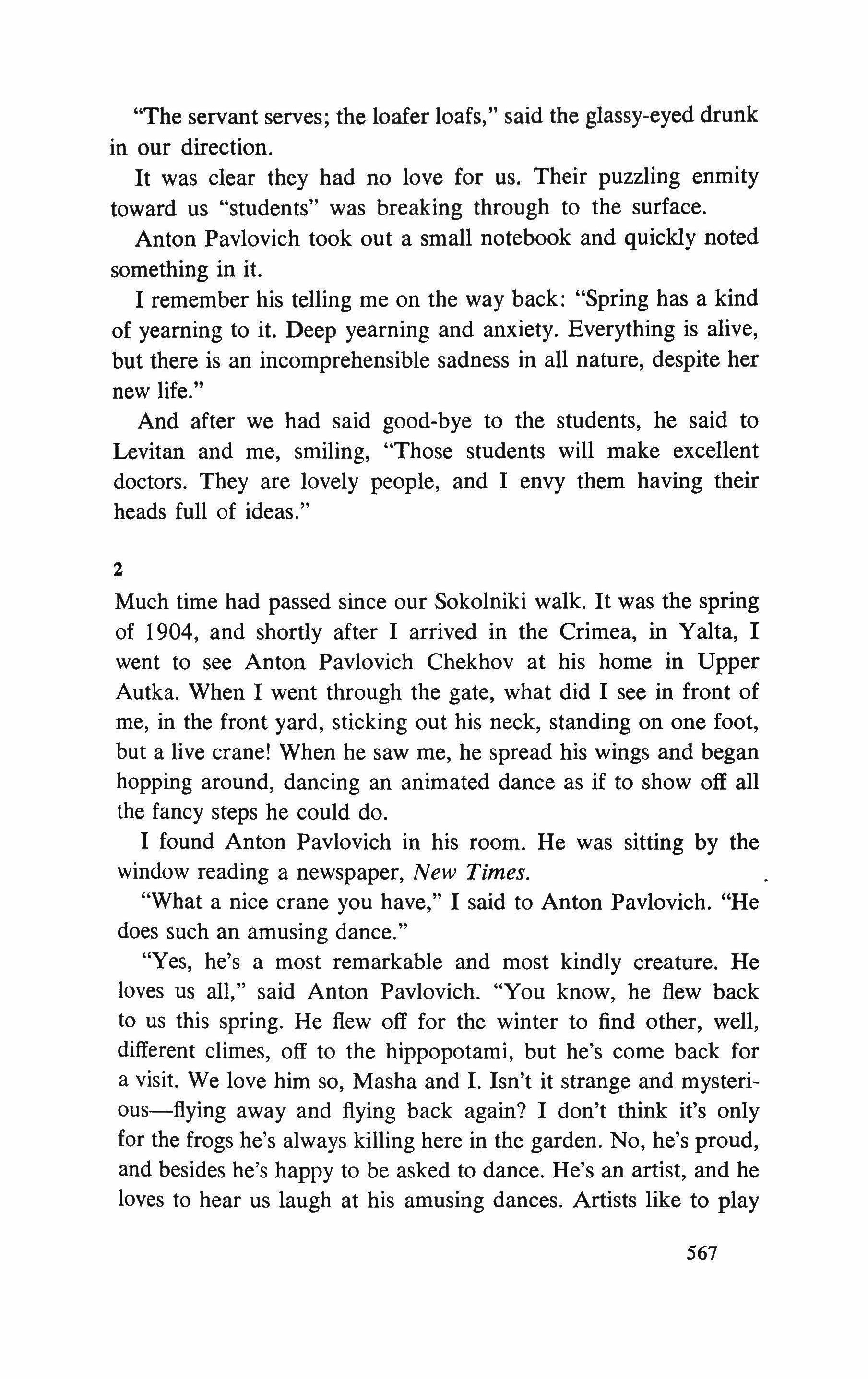
"The servant serves; the loafer loafs," said the glassy-eyed drunk in our direction.
It was clear they had no love for us. Their puzzling enmity toward us "students" was breaking through to the surface.
Anton Pavlovich took out a small notebook and quickly noted something in it.
I remember his telling me on the way back: "Spring has a kind of yearning to it. Deep yearning and anxiety. Everything is alive, but there is an incomprehensible sadness in all nature, despite her new life."
And after we had said good-bye to the students, he said to Levitan and me, smiling, "Those students will make excellent doctors. They are lovely people, and I envy them having their heads full of ideas."
2
Much time had passed since our Sokolniki walk. It was the spring of 1904, and shortly after I arrived in the Crimea, in Yalta, I went to see Anton Pavlovich Chekhov at his home in Upper Autka. When I went through the gate, what did I see in front of me, in the front yard, sticking out his neck, standing on one foot, but a live crane! When he saw me, he spread his wings and began hopping around, dancing an animated dance as if to show off all the fancy steps he could do.
I found Anton Pavlovich in his room. He was sitting by the window reading a newspaper, New Times.
"What a nice crane you have," I said to Anton Pavlovich. "He does such an amusing dance."
"Yes, he's a most remarkable and most kindly creature. He loves us all," said Anton Pavlovich. "You know, he flew back to us this spring. He flew off for the winter to find other, well, different climes, off to the hippopotami, but he's come back for a visit. We love him so, Masha and 1. Isn't it strange and mysterious-flying away and flying back again? I don't think it's only for the frogs he's always killing here in the garden. No, he's proud, and besides he's happy to be asked to dance. He's an artist, and he loves to hear us laugh at his amusing dances. Artists like to play 567
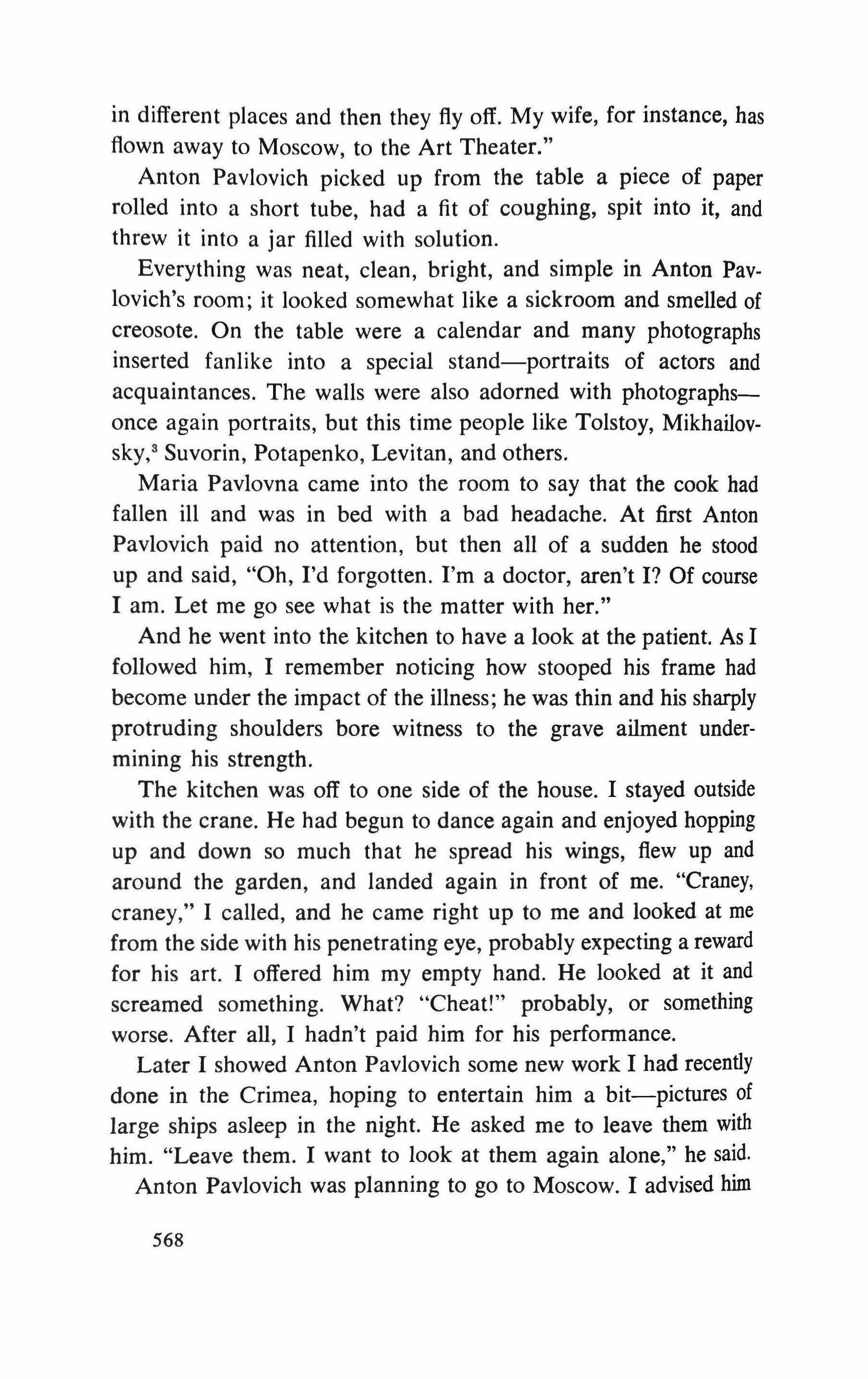
in different places and then they fly off. My wife, for instance, has flown away to Moscow, to the Art Theater."
Anton Pavlovich picked up from the table a piece of paper rolled into a short tube, had a fit of coughing, spit into it, and threw it into a jar filled with solution.
Everything was neat, clean, bright, and simple in Anton Pavlovich's room; it looked somewhat like a sickroom and smelled of creosote. On the table were a calendar and many photographs inserted fanlike into a special stand-portraits of actors and acquaintances. The walls were also adorned with photographsonce again portraits, but this time people like Tolstoy, Mikhailovsky," Suvorin, Potapenko, Levitan, and others.
Maria Pavlovna came into the room to say that the cook had fallen ill and was in bed with a bad headache. At first Anton Pavlovich paid no attention, but then all of a sudden he stood up and said, "Oh, I'd forgotten. I'm a doctor, aren't I? Of course I am. Let me go see what is the matter with her."
And he went into the kitchen to have a look at the patient. As 1 followed him, 1 remember noticing how stooped his frame had become under the impact of the illness; he was thin and his sharply protruding shoulders bore witness to the grave ailment undermining his strength.
The kitchen was off to one side of the house. 1 stayed outside with the crane. He had begun to dance again and enjoyed hopping up and down so much that he spread his wings, flew up and around the garden, and landed again in front of me. "Craney, craney," I called, and he came right up to me and looked at me from the side with his penetrating eye, probably expecting a reward for his art. I offered him my empty hand. He looked at it and screamed something. What? "Cheat!" probably, or something worse. After all, 1 hadn't paid him for his performance.
Later 1 showed Anton Pavlovich some new work 1 had recently done in the Crimea, hoping to entertain him a bit-pictures of large ships asleep in the night. He asked me to leave them with him. "Leave them. 1 want to look at them again alone," he said.
Anton Pavlovich was planning to go to Moscow. I advised him
568
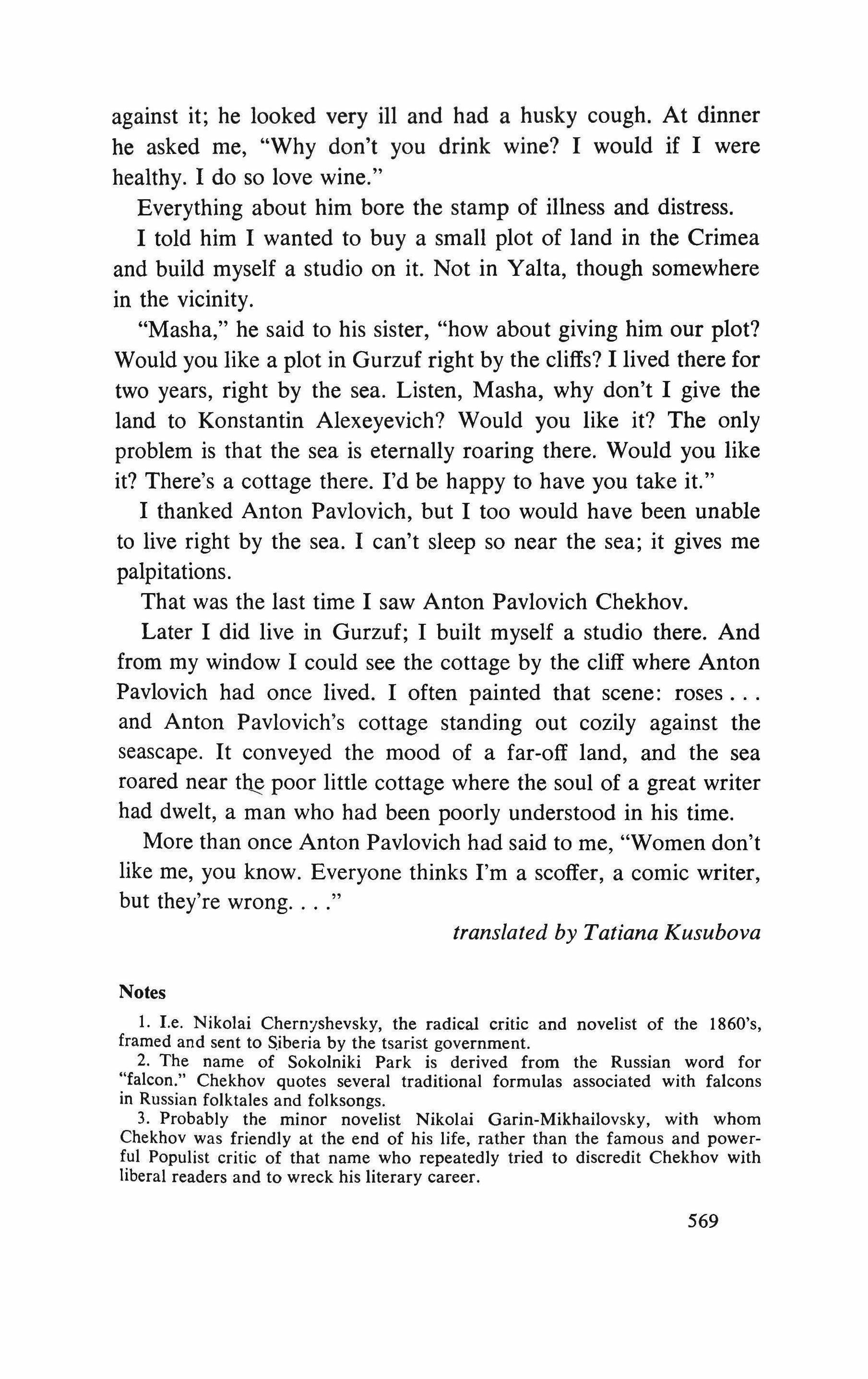
against it; he looked very ill and had a husky cough. At dinner he asked me, "Why don't you drink wine? I would if I were healthy. I do so love wine."
Everything about him bore the stamp of illness and distress. I told him I wanted to buy a small plot of land in the Crimea and build myself a studio on it. Not in Yalta, though somewhere in the vicinity.
"Masha," he said to his sister, "how about giving him our plot? Would you like a plot in Gurzuf right by the cliffs? I lived there for two years, right by the sea. Listen, Masha, why don't I give the land to Konstantin Alexeyevich? Would you like it? The only problem is that the sea is eternally roaring there. Would you like it? There's a cottage there. I'd be happy to have you take it."
I thanked Anton Pavlovich, but I too would have been unable to live right by the sea. I can't sleep so near the sea; it gives me palpitations.
That was the last time I saw Anton Pavlovich Chekhov. Later I did live in Gurzuf; I built myself a studio there. And from my window I could see the cottage by the cliff where Anton Pavlovich had once lived. I often painted that scene: roses and Anton Pavlovich's cottage standing out cozily against the seascape. It conveyed the mood of a far-off land, and the sea roared near the poor little cottage where the soul of a great writer had dwelt, a man who had been poorly understood in his time.
More than once Anton Pavlovich had said to me, "Women don't like me, you know. Everyone thinks I'm a scoffer, a comic writer, but they're wrong translated by Tatiana Kusubova
Notes
1. I.e. Nikolai Chernyshevsky, the radical critic and novelist of the 1860's, framed and sent to Siberia by the tsarist government.
2. The name of Sokolniki Park is derived from the Russian word for "falcon." Chekhov quotes several traditional formulas associated with falcons in Russian folktales and folksongs.
3. Probably the minor novelist Nikolai Garin-Mikhailovsky, with whom Chekhov was friendly at the end of his life, rather than the famous and powerful Populist critic of that name who repeatedly tried to discredit Chekhov with liberal readers and to wreck his literary career.
569
Andreenko's constructivist cubism
VALENTINE & JEAN CLAUDE MARCADE
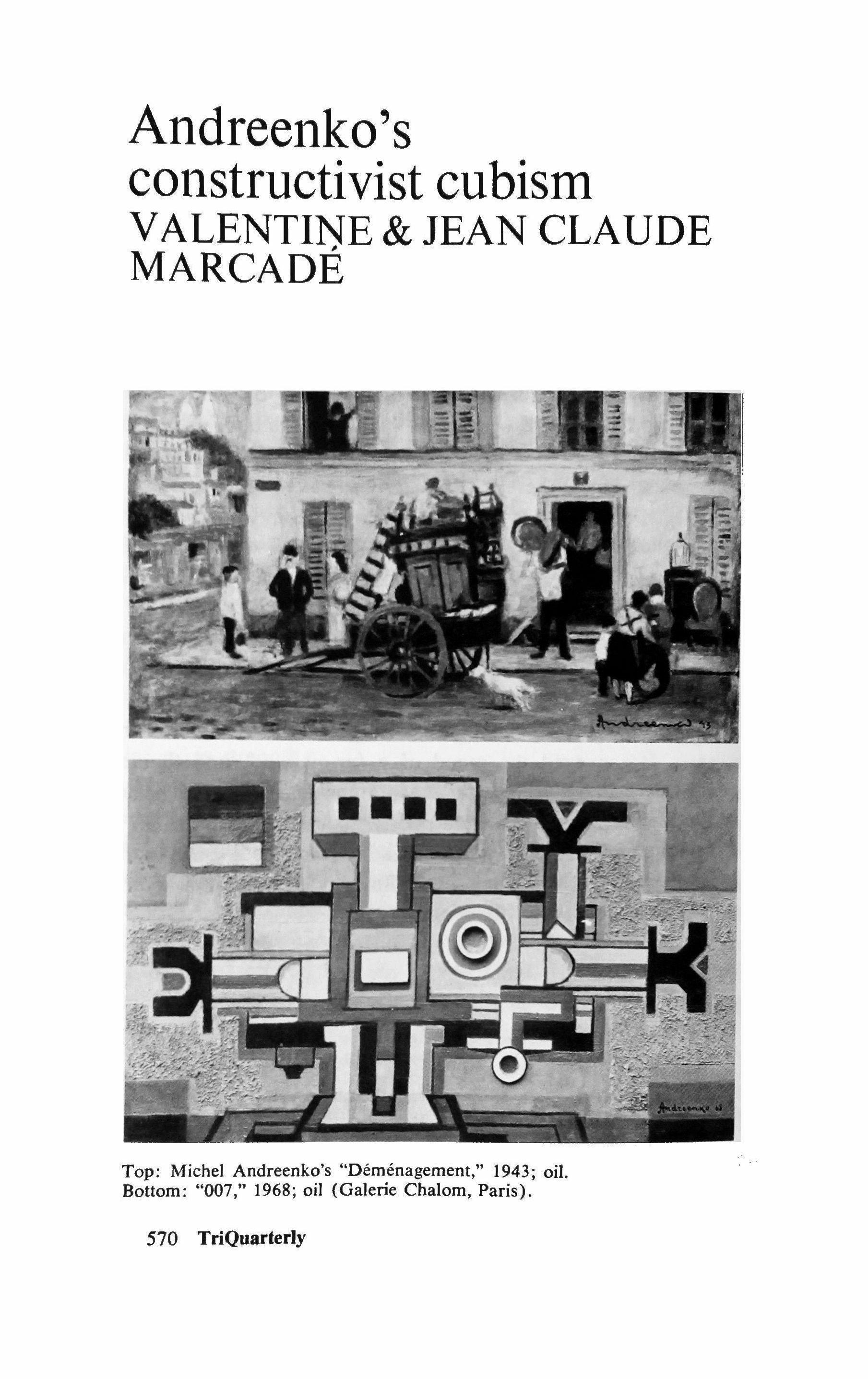
570 TriQuarterly
Top: Michel Andreenko's "Dernenagernent," 1943; oil.
Bottom: "007," 1968; oil (Galerie Chalom, Paris).

Mikhail Andreenko (Mikhail Fyodorovich Andreenko-Nechitailo) was born in Kherson in 1894. His family belonged to the Ukrainian gentry, and an atmosphere of art surrounded him in his childhood. His maternal uncle, Anatoly Maximovich, was a graduate of the Odessa Art School. His cousin thrice removed, the realist sculptor B. Edwards, was considered, despite his English origins, the Ukrainian counterpart of the popular Russian sculptor of the time, Mark Antokolsky.
There was considerable artistic activity in the city of Kherson as well. We should not forget that it was there that Meyerhold began his career as a stage director and that it was the home of the Burliuk brothers and through them the cradle of Russian Futurism. The local Society of the Amateurs of Art held annual art shows at which Andreenko exhibited his landscapes from 1910 to 1912. At that time he was already attracted to stage design, a field in which his talent was later to manifest itself most magically; the attraction was so strong that at one time he planned to devote himself totally to the theater.
After graduating from the gymnasium, Andreenko went to St. Petersburg, where he was enrolled simultaneously at the Law School of the University of St. Petersburg and at the art school of the Imperial Society for the Encouragement of the Arts, headed at the time by Nicholas Roerich. The artist himself says that his choice of the law school was accidental and that he had no interest in things judiciary. But one can see in this choice a subconscious gravitation toward the same order and organization that characterize his cubistic compositions of the nineteen-twenties, his representationallandscapes and his most recent constructivism. Another example of such subconscious influence of law studies on art is provided by Vasily Kandinsky, who likewise began as a prospective jurist. Andreenko did not follow a career in law, but he did obtain his diploma from the law school in 1917. He rarely attended lectures there, however, preferring his work at the art school, where his teachers were Roerich, Rylov, and Bilibin. In 1914, at the beginning of the war, his figurative work was shown at the exhibition organized by the art dealer Dobychina at her Bureau of the
571

Arts; the proceeds went to the St. Petersburg Artists' Field Hospital. He was also represented that same year at an international exhibition of graphics in Leipzig.
Beginning in 1915-1916, Andreenko exhibited his first cubistic works at Mme Dobychina's Bureau of the Arts, which was the first (and possibly the last) Russian art gallery of the Western marchand de tableaux type. A number of his cubistic-constructivist compositions date from that time. He supported himself by doing illustrations for newspapers and magazines (for the Voice of Life, among others). By helping with stage sets at Alexei Suvorin's theater, he was able to study the technique of stage design. But the events that ensued after the October Revolution forced him to leave St. Petersburg in 1918. He was asked to work as a stage designer at the Chamber Theater in Odessa, and was by this time eminently qualified to accept the offer. The Odessa Chamber Theater existed for less than a year, from the fall of 1918 to the spring of 1919. Its director was Konstantin Miklashevsky (later known as Mic, the author of the standard text on the commedia dell' arte).
It seems hard to imagine that at the height of the Revolutionwhen Odessa was divided into sectors occupied by various troops and by foreign interventionists, and when theatergoers walking along Langeron Street were checked by sentries-a theater could not only exist but offer such recherche fare as Electra by Hofmannsthal, Menechmae by Plautus (played in masks and in a painted architectural set), and Le Miracle de Theophile by Rutebeuf, translated by Alexander Blok and with golden sets that imitated the painters of the trecento. Andreenko's stage designs were distinguished by the schematic and constructivist character of the sets and by the vivid colors of the costumes. The specific character of each play was expressed laconically. This laconic manner was to remain a feature of his subsequent easel paintings as well.
In 1920, Andreenko left the Ukraine for good. He spent a few months in Bucharest, where he did the designs for Drigo's ballet Les Millions d'Arlequin, staged at the Royal Opera with choreography by Boris Romanov. He was offered a position as the 572
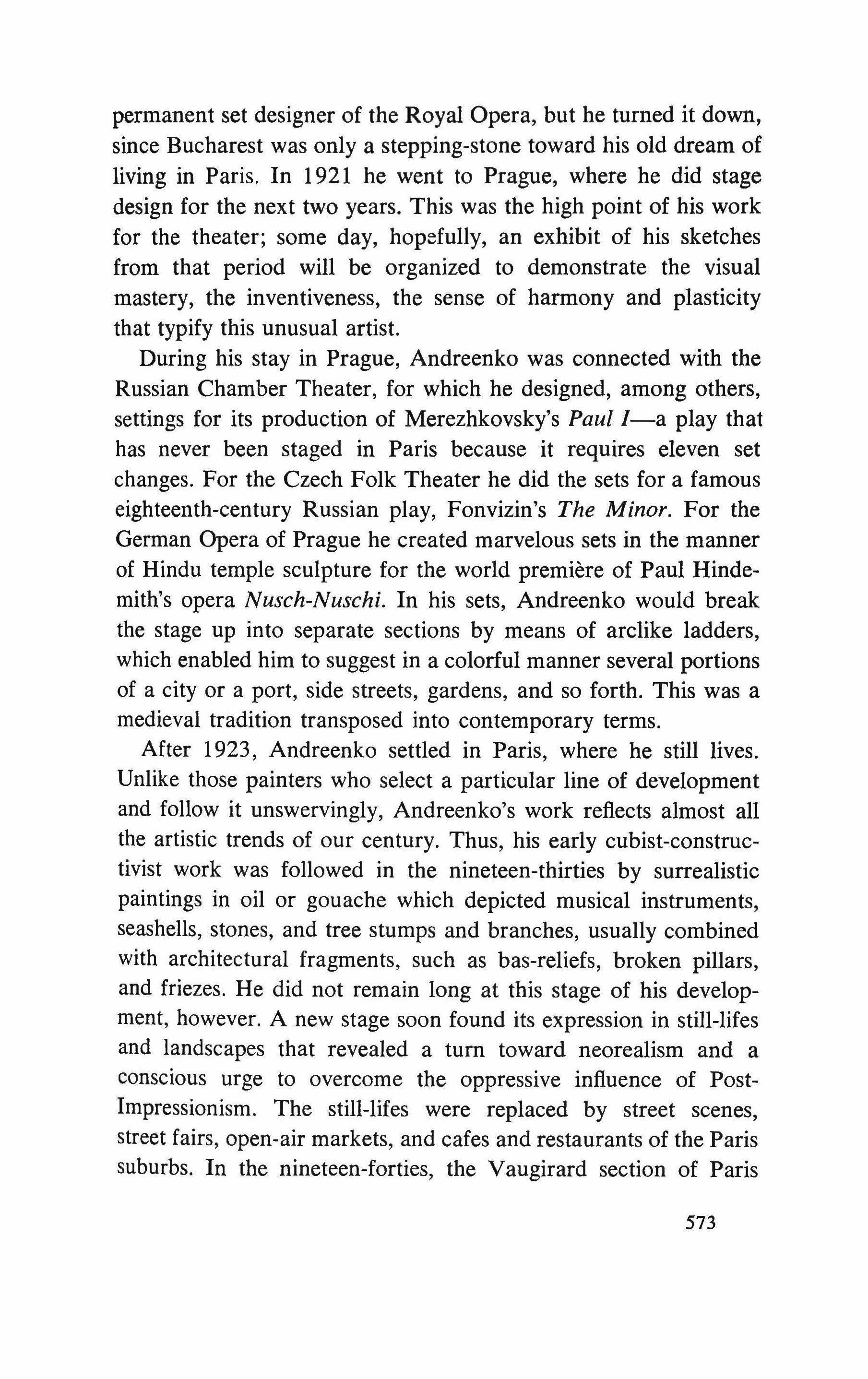
permanent set designer of the Royal Opera, but he turned it down, since Bucharest was only a stepping-stone toward his old dream of living in Paris. In 1921 he went to Prague, where he did stage design for the next two years. This was the high point of his work for the theater; some day, hopefully, an exhibit of his sketches from that period will be organized to demonstrate the visual mastery, the inventiveness, the sense of harmony and plasticity that typify this unusual artist.
During his stay in Prague, Andreenko was connected with the Russian Chamber Theater, for which he designed, among others, settings for its production of Merezhkovsky's Paul I-a play that has never been staged in Paris because it requires eleven set changes. For the Czech Folk Theater he did the sets for a famous eighteenth-century Russian play, Fonvizin's The Minor. For the German Opera of Prague he created marvelous sets in the manner of Hindu temple sculpture for the world premiere of Paul Hindemith's opera Nusch-Nuschi. In his sets, Andreenko would break the stage up into separate sections by means of arclike ladders, which enabled him to suggest in a colorful manner several portions of a city or a port, side streets, gardens, and so forth. This was a medieval tradition transposed into contemporary terms.
After 1923, Andreenko settled in Paris, where he still lives. Unlike those painters who select a particular line of development and follow it unswervingly, Andreenko's work reflects almost all the artistic trends of our century. Thus, his early cubist-constructivist work was followed in the nineteen-thirties by surrealistic paintings in oil or gouache which depicted musical instruments, seashells, stones, and tree stumps and branches, usually combined with architectural fragments, such as bas-reliefs, broken pillars, and friezes. He did not remain long at this stage of his development, however. A new stage soon found its expression in still-lifes and landscapes that revealed a turn toward neorealism and a conscious urge to overcome the oppressive influence of PostImpressionism. The still-lifes were replaced by street scenes, street fairs, open-air markets, and cafes and restaurants of the Paris suburbs. In the nineteen-forties, the Vaugirard section of Paris 573

(where Andreenko resides) bore little resemblance to its present self. Now, with its new buildings and noisy thoroughfares, its few languishing trees trying to grow amid the high-rise apartment houses, it has lost all its individuality. Many of Andreenko's landscapes show the old houses of this onetime suburb, houses that were doomed and have for the most part disappeared. For many years Andreenko was able to soak up the surrounding atmosphere and to translate into his art the charm and the poetry of the vanishing old Paris-its rickety houses, shady plane trees, artless shop windows, colorful shop signs, and dark, narrow alleys.
Guido Marinelli, in his introduction to the catalogue of the Andreenko retrospective which was held in January and February 1964 at the Houston-Brown Gallery, and which represented all the periods of his evolution, pointed out the sharp change in the painter's manner that came about in the nineteen-forties:
What bad been embryonic and bidden earlier blossomed forth luxuriantly between 1941 and 1956 into a primitivist realism witb a vividness and bumor reminiscent of the deliberate naivete of autbentic and colorful folk art, witb faces and situations transposed directly from a real street, with scenes of daily suburban life wbicb reflect a workaday atmospbere.1
Andreenko was to return to constructivist compositions only in 1958, and this time they led him directly to abstractionism.
Mikhail Andreenko bas followed a logical development that bas led him to abstraction-from expressionism and by way of cubism. Harmonious order, severit) of forms and a fine sensibility are all combined in bis work, whicb bas successfully bypassed all obstacles and scbools and was never bogged down in theories-this work that is in constant and close contact with the mystery of the world-be It a realworld or an imagined one, knowable or merely depicted on various planes. In its essence tbis work betrays a certain restlessness,"
This restlessness is not accidental. It reflects the restlessness of our time, transitory and unstable, which is the reason for frequent changes in artistic trends.
We are living [Andreenko says] in a period wben an artist's vision, surrounded by an endless stream of realistic pbotograpbic images, is undergoing constant cbange. Newspapers, magazines, posters, neon signs, television, cinema--tbe result of all this is tbat tbe depiction of the real world is deprived of its spirituality, becomes average, and ceases to appeal to the imagination. Whether be wants it or not, tbe artist's thinking bas to bead in the opposite direction, toward the ereation of invisible, nonexistent worlds or visions. In the civilizations of the past,
574
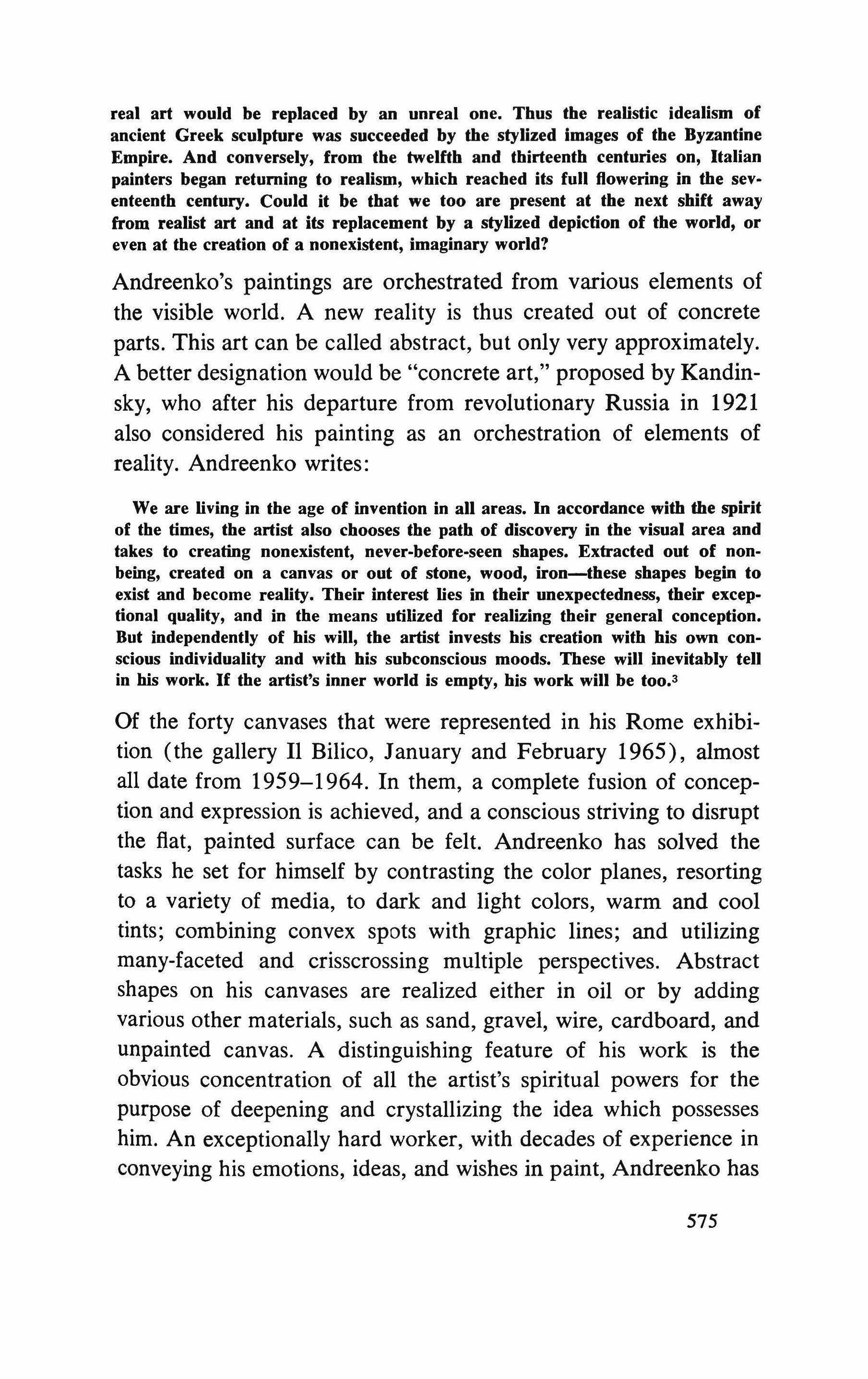
real art would be replaced by an unreal one. Tbus tbe realistic idealism of ancient Greek sculpture was succeeded by the stylized images of tbe Byzantine Empire. And conversely, from tbe twelftb and tbirteentb centuries on, Italian painters began returning to realism, wbicb reached its full flowering in the seventeentb century. Could it be that we too are present at tbe next sbift away from realist art and at its replacement by a stylized depiction of tbe world, or even at the creation of a nonexistent, imaginary world?
Andreenko's paintings are orchestrated from various elements of the visible world. A new reality is thus created out of concrete parts. This art can be called abstract, but only very approximately. A better designation would be "concrete art," proposed by Kandinsky, who after his departure from revolutionary Russia in 1921 also considered his painting as an orchestration of elements of reality. Andreenko writes:
We are living in the age of invention in all areas. In accordance with the spirit of tbe times, tbe artist also chooses tbe patb of discovery in tbe visual area and takes to creating nonexistent, never-before-seen sbapes. Extracted out of nonbeing, created on a canvas or out of stone, wood, iron-tbese sbapes begin to exist and become reality. Tbeir interest lies in tbeir unexpectedness, their exceptional quality, and in tbe means utilized for realizing tbeir general conception. But independently of bis will, tbe artist invests bis creation witb his own conscious individuality and witb bis subconscious moods. These will inevitably tell in his work. If the artist's inner world is empty, his work will be toO.3
Of the forty canvases that were represented in his Rome exhibition (the gallery II Bilico, January and February 1965), almost all date from 1959-1964. In them, a complete fusion of conception and expression is achieved, and a conscious striving to disrupt the fiat, painted surface can be felt. Andreenko has solved the tasks he set for himself by contrasting the color planes, resorting to a variety of media, to dark and light colors, warm and cool tints; combining convex spots with graphic lines; and utilizing many-faceted and crisscrossing multiple perspectives. Abstract shapes on his canvases are realized either in oil or by adding various other materials, such as sand, gravel, wire, cardboard, and unpainted canvas. A distinguishing feature of his work is the obvious concentration of all the artist's spiritual powers for the purpose of deepening and crystallizing the idea which possesses him. An exceptionally hard worker, with decades of experience in conveying his emotions, ideas, and wishes in paint, Andreenko has 575

by no means said his final word in painting. His ultimate recognition is assured not only by the exhibits in which he participates (in New York, London, Vienna, Wiesbaden, Berlin, Paris, Rome), but also by the acquisition of his work by major museums.'
Simultaneously with the constructivist compositions which he still produces today, Andreenko paints views of Venice, Verona, Ghent, Bruges, and other cities. Interestingly enough, he looks for the elements in the architecture of these cities which he has artistically transformed in his abstract paintings. He himself writes: "Abstract thinking was never alien to art. Music and architecture are essentially abstract. In the decorative arts, in sculpture and painting, abstract shapes are to be found among all nations." 5
When we speak of Andreenko's paintings, we should also mention his literary production. The artist has been publishing critical articles in Ukrainian emigre journals and newspapers since 1922, outlining his travel impressions or stating his aesthetic views. These articles bear testimony to his remarkable erudition and wide reading. Andreenko knows almost the entire body of Gogol's writings by heart, and he likes citing from memory pages and pages of Griboyedov and Tolstoy, usually accompanying his citations with apt and pointed comments. In a private letter about the dismal impressions made on him by the exhibit of minor mythological paintings of the grand siecle-the French seventeenth centuryAndreenko cited the passage from Hamlet about the actor who wept real tears while reciting his lines about Hecuba. "Apparently one of the secrets of art is to be able to weep real tears over what a later epoch would see as insignificant and unworthy of attention." 6
But the most absorbing part of Andreenko's activity as a writer are the stories he wrote in the nineteen-sixties. They are attractive because in them, using pen rather than brush, he draws verbal pictures of surrounding life, in a way continuing and extending the neorealistic period in his painting. They are also interesting because in their narrative manner, their sly humor, and their approach to reality they reflect the Ukrainian wit that has its origin in Gogol, Frequent digressions, side remarks, the desire to lead the
576
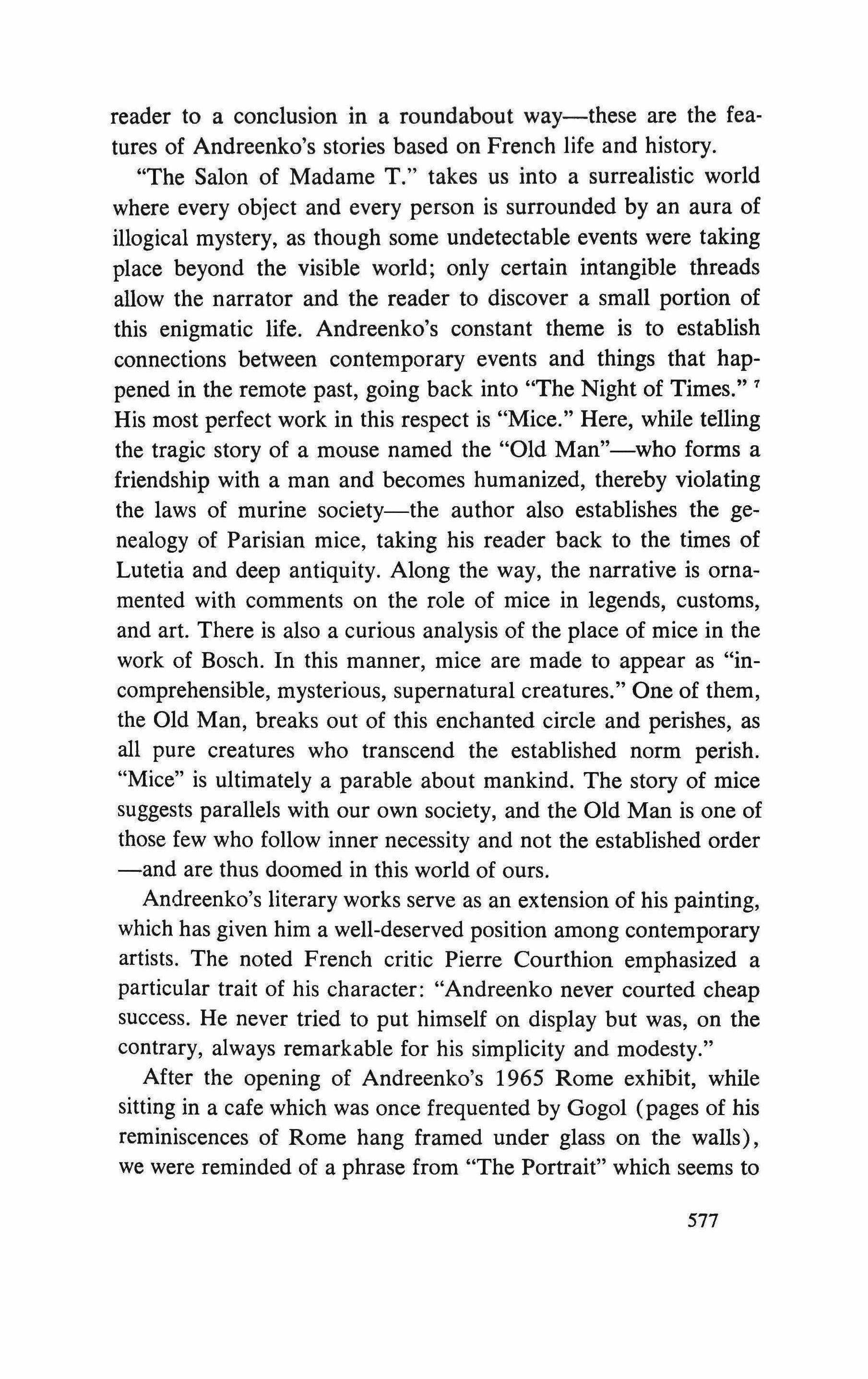
reader to a conclusion in a roundabout way-these are the features of Andreenko's stories based on French life and history.
"The Salon of Madame T." takes us into a surrealistic world where every object and every person is surrounded by an aura of illogical mystery, as though some undetectable events were taking place beyond the visible world; only certain intangible threads allow the narrator and the reader to discover a small portion of this enigmatic life. Andreenko's constant theme is to establish connections between contemporary events and things that happened in the remote past, going back into "The Night of Times." 7 His most perfect work in this respect is "Mice." Here, while telling the tragic story of a mouse named the "Old Man"-who forms a friendship with a man and becomes humanized, thereby violating the laws of murine society-the author also establishes the genealogy of Parisian mice, taking his reader back to the times of Lutetia and deep antiquity. Along the way, the narrative is ornamented with comments on the role of mice in legends, customs, and art. There is also a curious analysis of the place of mice in the work of Bosch. In this manner, mice are made to appear as "incomprehensible, mysterious, supernatural creatures." One of them, the Old Man, breaks out of this enchanted circle and perishes, as all pure creatures who transcend the established norm perish. "Mice" is ultimately a parable about mankind. The story of mice suggests parallels with our own society, and the Old Man is one of those few who follow inner necessity and not the established order -and are thus doomed in this world of ours.
Andreenko's literary works serve as an extension of his painting, which has given him a well-deserved position among contemporary artists. The noted French critic Pierre Courthion emphasized a particular trait of his character: "Andreenko never courted cheap success. He never tried to put himself on display but was, on the contrary, always remarkable for his simplicity and modesty."
After the opening of Andreenko's 1965 Rome exhibit, while sitting in a cafe which was once frequented by Gogol (pages of his reminiscences of Rome hang framed under glass on the walls), we were reminded of a phrase from "The Portrait" which seems to
577
convey Mikhail Andreenko's personality: who found rules and laws in his own heart, without the help of teachers or schools, who was absorbed only in his yearning for perfection and who followed, possibly for reasons not known to himself, the path his heart showed him."
translated by L. P. lthorsky

Notes
I. Guido Marinelli, in the catalogue of Andreenko's one-man show at the Houston-Brown Gallery. Paris, January 26-February 22, 1964.
2. Marcel Fryns, in La Galerie des Arts, March 1964.
J. "Notatki pro suchasne mistetstvo," Suchasnist' [West Germany], Vol. 4 ( 1966).
4. Victoria and Albert Museum, London; Naziona1bibliothek, Vienna; Musee d'Art Moderne de la Ville de Paris; Bibliotheque de l'Arsenal, Paris. See Volodymir Popovich, Mikhaylo Andrienko (Munich, 1969).
5. "Notatki pro ," op. cit.
6. From a private letter to Jean Claude Marcade.
7. "The Night of Times" is the title of his story dealing with the Albigenses.
578
Mice
MIKHAIL ANDREENKO
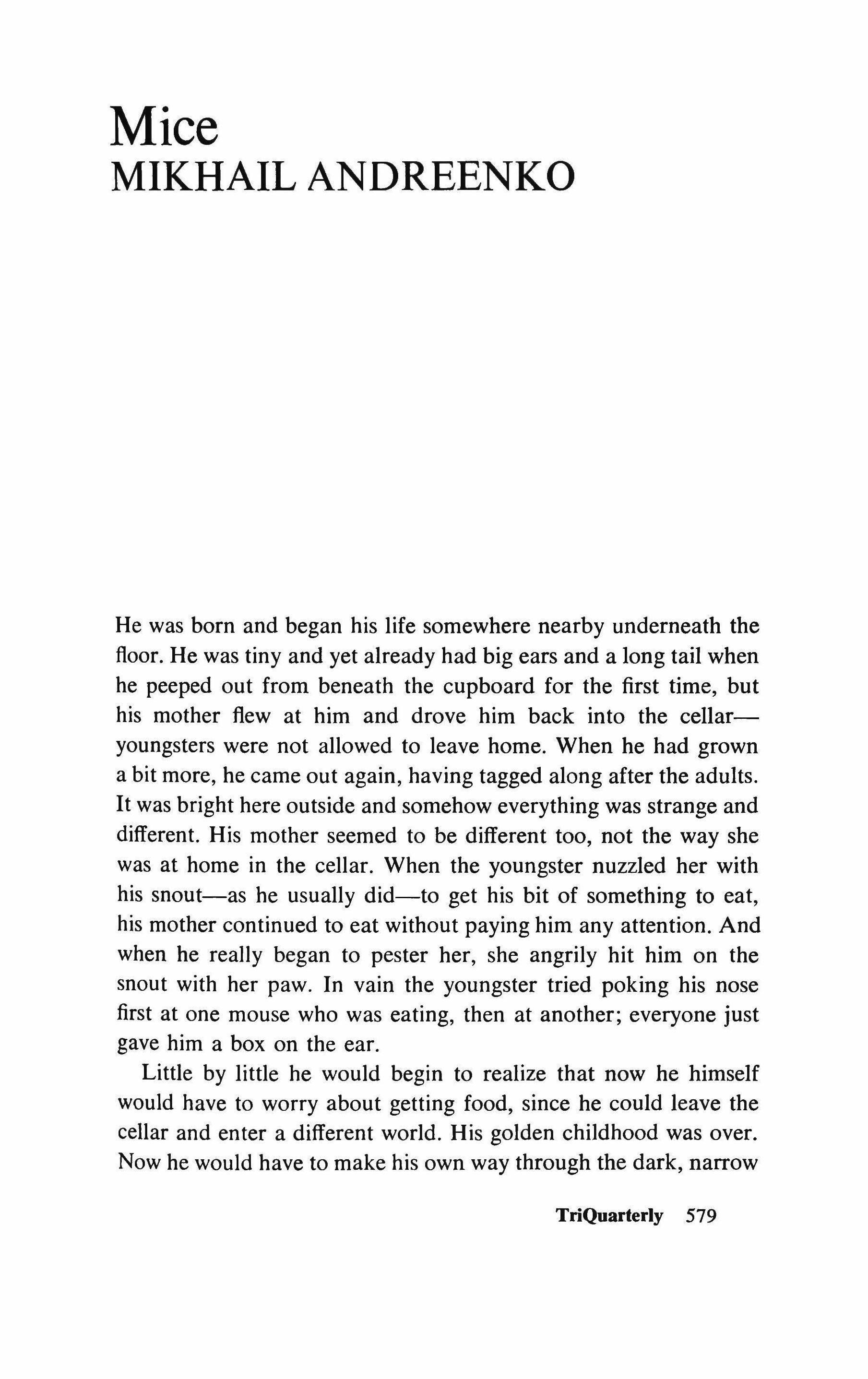
He was born and began his life somewhere nearby underneath the floor. He was tiny and yet already had big ears and a long tail when he peeped out from beneath the cupboard for the first time, but his mother flew at him and drove him back into the cellaryoungsters were not allowed to leave home. When he had grown a bit more, he came out again, having tagged along after the adults. It was bright here outside and somehow everything was strange and different. His mother seemed to be different too, not the way she was at home in the cellar. When the youngster nuzzled her with his snout-as he usually did-to get his bit of something to eat, his mother continued to eat without paying him any attention. And when he really began to pester her, she angrily hit him on the snout with her paw. In vain the youngster tried poking his nose first at one mouse who was eating, then at another; everyone just gave him a box on the ear.
Little by little he would begin to realize that now he himself would have to worry about getting food, since he could leave the cellar and enter a different world. His golden childhood was over. Now he would have to make his own way through the dark, narrow
TriQuarterly 579

maze of passageways, after peeping out of a mousehole to see whether there was any danger; climb up the chimney flue to the upper floors, clamber up to the kitchen shelves even when it would have seemed quite impossible, gnaw into packages of food, and join others in lifting and pushing saucepan lids. In short, he had to start living.
His mother took one further task upon herself. Flying at him as though she were attacking, she would teach the youngster to stand on his hind legs and face an attack by one of his own kind, or, if someone were to attack unexpectedly, to jump straight up without a running start, bounding off the floor like a rubber ball, so that the attacker met with empty space. This was what his mother taught him and she knew what she was doing.
It was in this way, no doubt, that the mouse of whom we shall be speaking spent his childhood and began his life. However, I did not distinguish him from the other mice when he was small. I only began to notice him later, when he had begun to age. His smooth contours had started to deteriorate and he had become somehow more angular; his excessively restless movements had disappeared; his fur had gotten shabby and lost its sheen; his tail had lost its fur and even seemed to be withering at the tip; his little beard had gone gray. It was only then that we got acquainted, and afterward we really became friendly. Informally I used to call my little friend the Old Man, and that is how I shall refer to him in these notes.
But first of all, to keep things in order, I'd better tell how the mice first appeared in my house. In the cabinet where I keep my work materials, the upper shelves are crammed with objects which long ago lost their original purpose but which I continued to use for other needs. Broken musical instruments, pieces of plaster-ofparis heads, a nineteenth-century wall clock with little flowers painted along the edge of the dial, and a number of other things. Amidst the junk there was also a rather large stuffed lizard, probably from the tropics.
It was in this cabinet that the rustling and noises at night began,
580
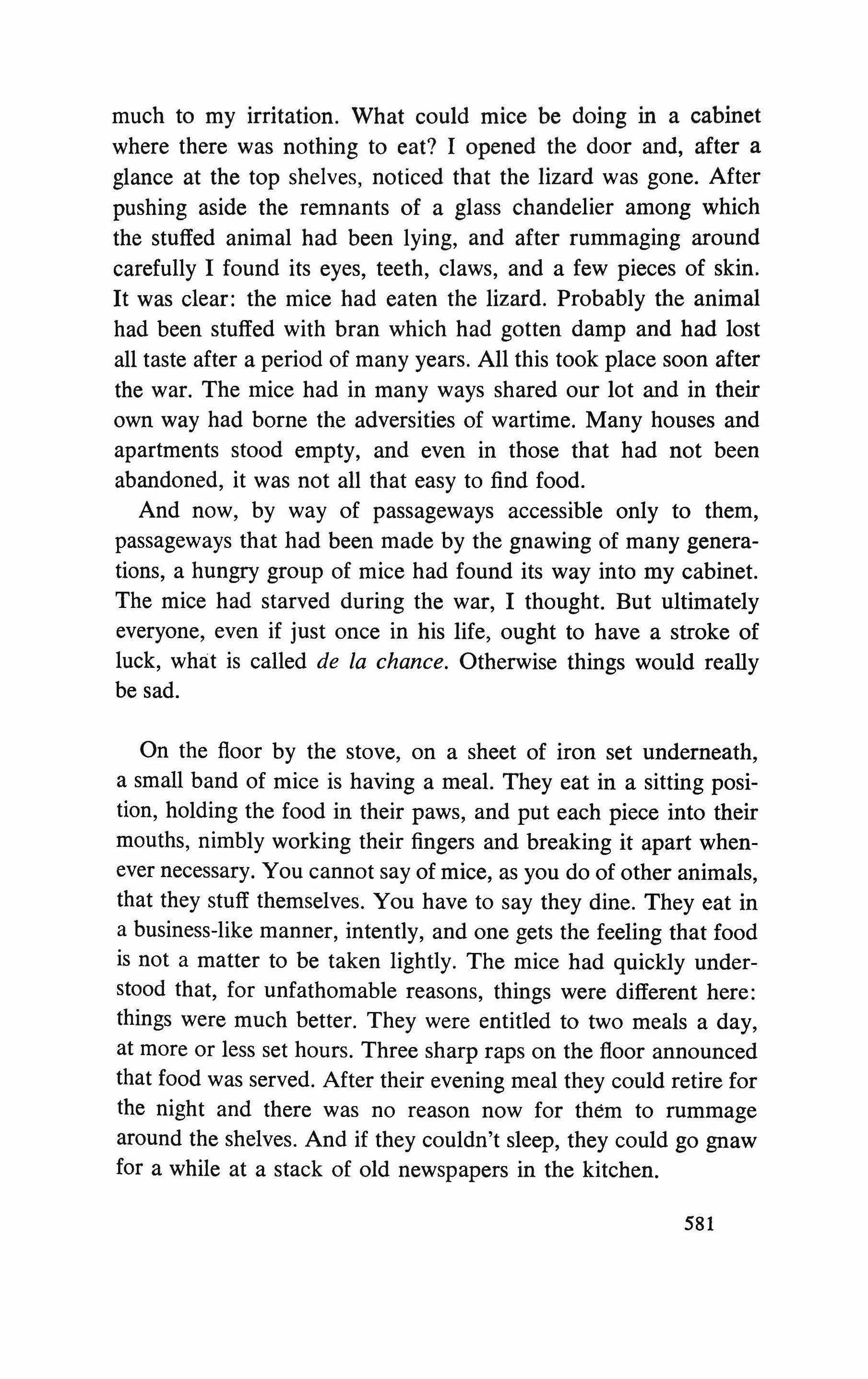
much to my irritation. What could mice be doing in a cabinet where there was nothing to eat? I opened the door and, after a glance at the top shelves, noticed that the lizard was gone. After pushing aside the remnants of a glass chandelier among which the stuffed animal had been lying, and after rummaging around carefully I found its eyes, teeth, claws, and a few pieces of skin. It was clear: the mice had eaten the lizard. Probably the animal had been stuffed with bran which had gotten damp and had lost all taste after a period of many years. All this took place soon after the war. The mice had in many ways shared our lot and in their own way had borne the adversities of wartime. Many houses and apartments stood empty, and even in those that had not been abandoned, it was not all that easy to find food.
And now, by way of passageways accessible only to them, passageways that had been made by the gnawing of many generations, a hungry group of mice had found its way into my cabinet. The mice had starved during the war, I thought. But ultimately everyone, even if just once in his life, ought to have a stroke of luck, what is called de fa chance. Otherwise things would really be sad.
On the floor by the stove, on a sheet of iron set underneath, a small band of mice is having a meal. They eat in a sitting position, holding the food in their paws, and put each piece into their mouths, nimbly working their fingers and breaking it apart whenever necessary. You cannot say of mice, as you do of other animals, that they stuff themselves. You have to say they dine. They eat in a business-like manner, intently, and one gets the feeling that food is not a matter to be taken lightly. The mice had quickly understood that, for unfathomable reasons, things were different here: things were much better. They were entitled to two meals a day, at more or less set hours. Three sharp raps on the floor announced that food was served. After their evening meal they could retire for the night and there was no reason now for them to rummage around the shelves. And if they couldn't sleep, they could go gnaw for a while at a stack of old newspapers in the kitchen.
581

The mice had apparently decided to settle down with me permanently. An emergency exit from the wall cabinet was constructed. A passage was made allowing them to cross my large dwelling to reach the kitchen without going outside. And there were other public works, all done intelligently and with a total grasp of topography. I tried plastering up the passage leading to the kitchen, but my work was undone that same night. I decided I could put up with it.
The mice also quickly realized that the giant was not at all as dangerous as he had seemed, since he lived at a completely different tempo. The giant had incalculable supplies of food at his disposal, moved immense, clumsy, preposterous objects from one place to another with ease, could instantly change darkness into light, and he often changed not only his skin, but his eyes too. Often a stifling smoke issued from his mouth. Immensely strong, he was exceedingly sluggish in all his movements. Time for him was measured in minutes, and not in fractions of a second, as it ought to be. And for that reason his reflexes too were interminably slow. In the time it took for him to bend down, open his fingers, and clench them again, one could easily manage to get to the cellar and be perfectly safe.
Therefore, some audacious souls soon turned up who would take a piece of bread from my hand. They would grab it and run off to eat it in peace, if the others didn't take it away. Customary law among mice allows this. At times, a frantic scramble for the piece of bread would start, then end in an amusing free-for-all. But once the object of the dispute had been eaten and was gone, there was no more reason to take offense and to quarrel and to hold a grudge and feel put out. In this respect mice are quite unlike us. I began to observe them more closely. They were not really as much alike as it seemed at first. Each had his own little biography, each his own idiosyncrasies.
One mouse caught my attention because it was afraid to touch cheese. It would circle a piece of cheese from every angle, twitch its whiskers, and back off. I noticed that the fur across its back had become worn and the trace of a scar was noticeable. It was ob-
582

vious-it had recently escaped after some incredible effort from a mousetrap that had had cheese as the bait. And ever since then the mouse had retained an insuperable fear of cheese.
A mouse used to come whose fur was much lighter in color than normal-it was the color of cafe au lait. I always supposed that there was a white mouse in its ancestry. Whether it was the mother, the father, the grandmother, or the grandfather, I would not venture to guess.
The noise in my house at night stopped. But I do remember a certain incident. One night I heard a rustling noise in a cabinet where there were some bundles of paper. I gave the cabinet a rap. The rustling stopped, but after a minute the noise started again. I rapped again. And so it went on. Annoyed, I got up on a chair and turned the bundles of paper over. The noise stopped, but after a minute began again. And then from somewhere there sounded a peculiar whistling squeal, and the noise in the cabinet ceased. One of the adults, probably the mother, had ordered the little mouse to cut it out.
I have pointed out this incident, one of many, to show that a mutual understanding had been established between us. We were beginning to get along, as they say.
But then events occurred which completely changed our neighborly relations. And it all came from a direction no one could have foreseen.
It is hard to explain how my friendship with the Old Man got started. It all came about gradually and of its own accord. The Old Man was the first to understand the signal-three short raps on the floor-which meant the food was served. He no longer ran away after snatching a piece of food from my hand, but approached calmly, took the food, and, without running off, would eat it at his leisure. If I didn't let go of the piece of bread right away, he would stand on his hind legs, push at my hand with his forepaws and try to free the bread with his teeth. If the game was protracted, he would get angry. He apparently did not understand such pranks and did not like them.
583

At such times I would examine his forepaws or, more exactly, his hands. His five long fingers, furless and supple jointed, could perform rather complex movements. Possessing a hand must, after all, mean something. Without it man would not have been able to accomplish all the things he has. Such a highly developed hand is granted also only to the monkey and, in part, to the squirrel. The Old Man had a hand developed to an incomparably greater degree than did the other mice. Most of them had short fingers.
If I was late with the food because of my work, the Old Man would climb up my leg to my knee and then stay for a minute to let me know he was there. Soon we began to eat our dinner together. He would climb up onto the chair next to mine, always somewhat ahead of time, and sit up on his hind legs, pressing his forepaws to his chest. It is possible that as a youngster he used to let his mother know that he was hungry by thus assuming the position in which mice eat.
In the course of living in close contact with man, his forebears had learned to eat everything that man eats, including salted fish. This distinguishes mice from all other animals. But mice seem to like bread and cereals more than anything else, and this betrays their distant origin in the fields.
The Old Man would eat absolutely everything that I did, but he always began with the tastiest item, bread. The sequence of courses after that did not matter: he was capable of concluding the meal with meat after having his dessert.
He was quick to comprehend things. Once, after I found him in the sink under the faucet, where he was apparently trying to catch the drops of water, I filled a cup with water, took it into the studio and put it on a table amidst glasses with various liquids. Somehow he immediately grasped that I had poured the water for him, and he came out of the kitchen into the studio, got up on the table, and began drinking. From that time on, that cup was his.
He preferred to approach me when he knew that I was likely to remain in the same place. He would come when I sat down before my easel, settle at first on the lower crossbar, and, constantly wetting his long fingers with saliva, carefully wash his head and
584
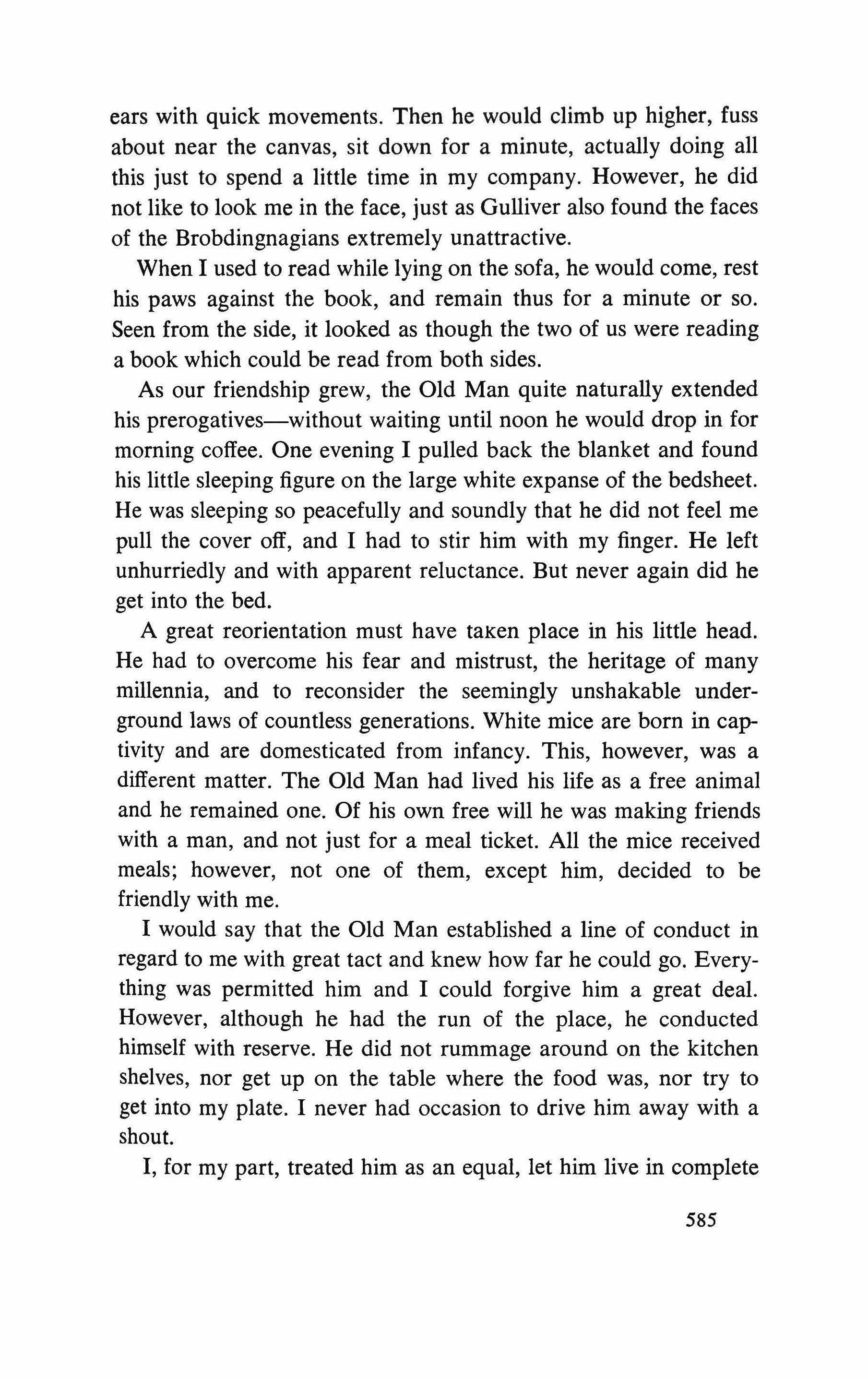
ears with quick movements. Then he would climb up higher, fuss about near the canvas, sit down for a minute, actually doing all this just to spend a little time in my company. However, he did not like to look me in the face, just as Gulliver also found the faces of the Brobdingnagians extremely unattractive.
When I used to read while lying on the sofa, he would come, rest his paws against the book, and remain thus for a minute or so. Seen from the side, it looked as though the two of us were reading a book which could be read from both sides.
As our friendship grew, the Old Man quite naturally extended his prerogatives-without waiting until noon he would drop in for morning coffee. One evening I pulled back the blanket and found his little sleeping figure on the large white expanse of the bedsheet. He was sleeping so peacefully and soundly that he did not feel me pull the cover off, and I had to stir him with my finger. He left unhurriedly and with apparent reluctance. But never again did he get into the bed.
A great reorientation must have taken place in his little head. He had to overcome his fear and mistrust, the heritage of many millennia, and to reconsider the seemingly unshakable underground laws of countless generations. White mice are born in captivity and are domesticated from infancy. This, however, was a different matter. The Old Man had lived his life as a free animal and he remained one. Of his own free will he was making friends with a man, and not just for a meal ticket. All the mice received meals; however, not one of them, except him, decided to be friendly with me.
I would say that the Old Man established a line of conduct in regard to me with great tact and knew how far he could go. Everything was permitted him and I could forgive him a great deal. However, although he had the run of the place, he conducted himself with reserve. He did not rummage around on the kitchen shelves, nor get up on the table where the food was, nor try to get into my plate. I never had occasion to drive him away with a shout.
I, for my part, treated him as an equal, let him live in complete
585
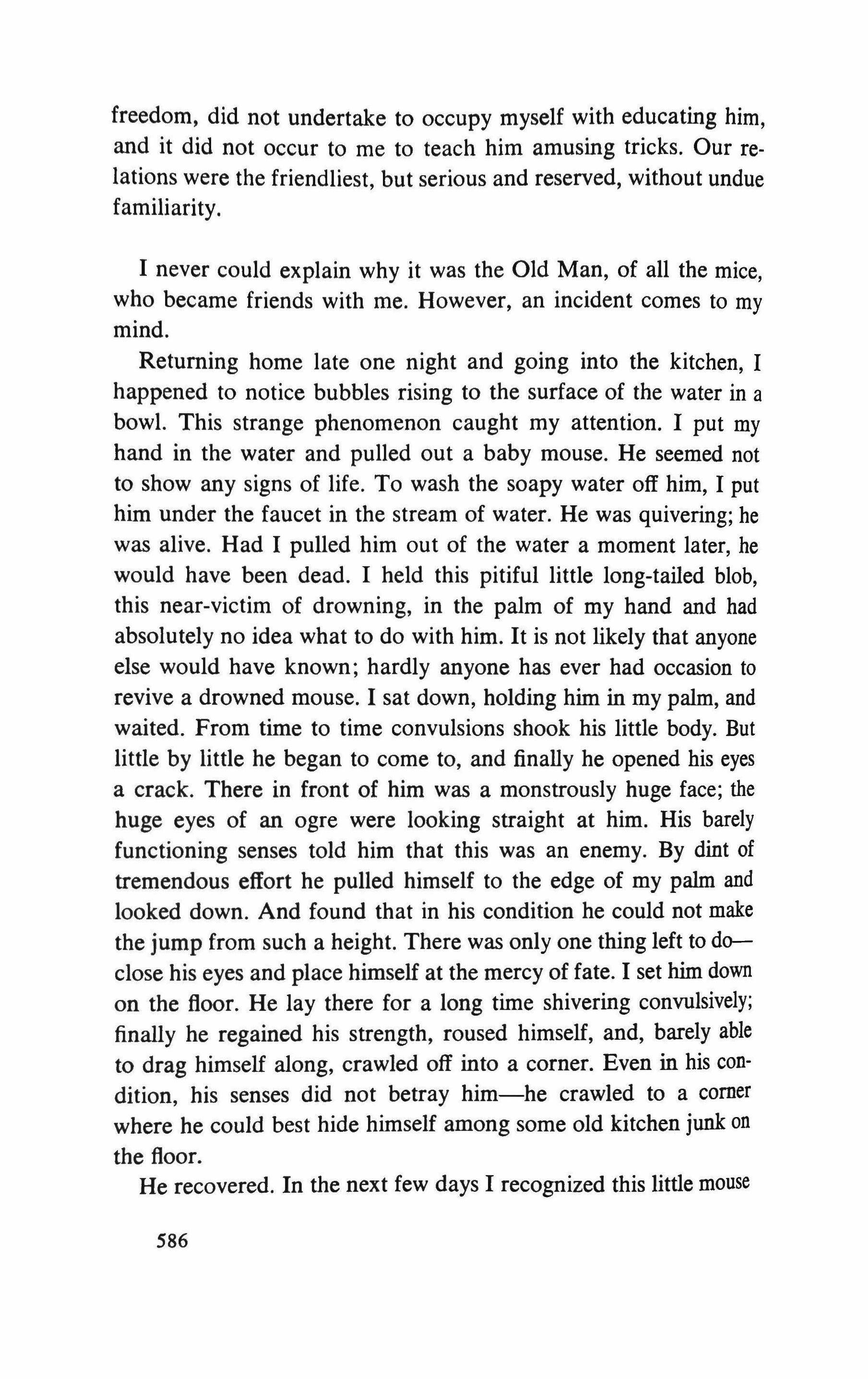
freedom, did not undertake to occupy myself with educating him, and it did not occur to me to teach him amusing tricks. Our relations were the friendliest, but serious and reserved, without undue familiarity.
I never could explain why it was the Old Man, of all the mice, who became friends with me. However, an incident comes to my mind.
Returning home late one night and going into the kitchen, I happened to notice bubbles rising to the surface of the water in a bowl. This strange phenomenon caught my attention. I put my hand in the water and pulled out a baby mouse. He seemed not to show any signs of life. To wash the soapy water off him, I put him under the faucet in the stream of water. He was quivering; he was alive. Had I pulled him out of the water a moment later, he would have been dead. I held this pitiful little long-tailed blob, this near-victim of drowning, in the palm of my hand and had absolutely no idea what to do with him. It is not likely that anyone else would have known; hardly anyone has ever had occasion to revive a drowned mouse. I sat down, holding him in my palm, and waited. From time to time convulsions shook his little body. But little by little he began to come to, and finally he opened his eyes a crack. There in front of him was a monstrously huge face; the huge eyes of an ogre were looking straight at him. His barely functioning senses told him that this was an enemy. By dint of tremendous effort he pulled himself to the edge of my palm and looked down. And found that in his condition he could not make the jump from such a height. There was only one thing left to doclose his eyes and place himself at the mercy of fate. I set him down on the floor. He lay there for a long time shivering convulsively; finally he regained his strength, roused himself, and, barely able to drag himself along, crawled off into a corner. Even in his condition, his senses did not betray him-he crawled to a comer where he could best hide himself among some old kitchen junk on the floor.
He recovered. In the next few days I recognized this little mouse
586
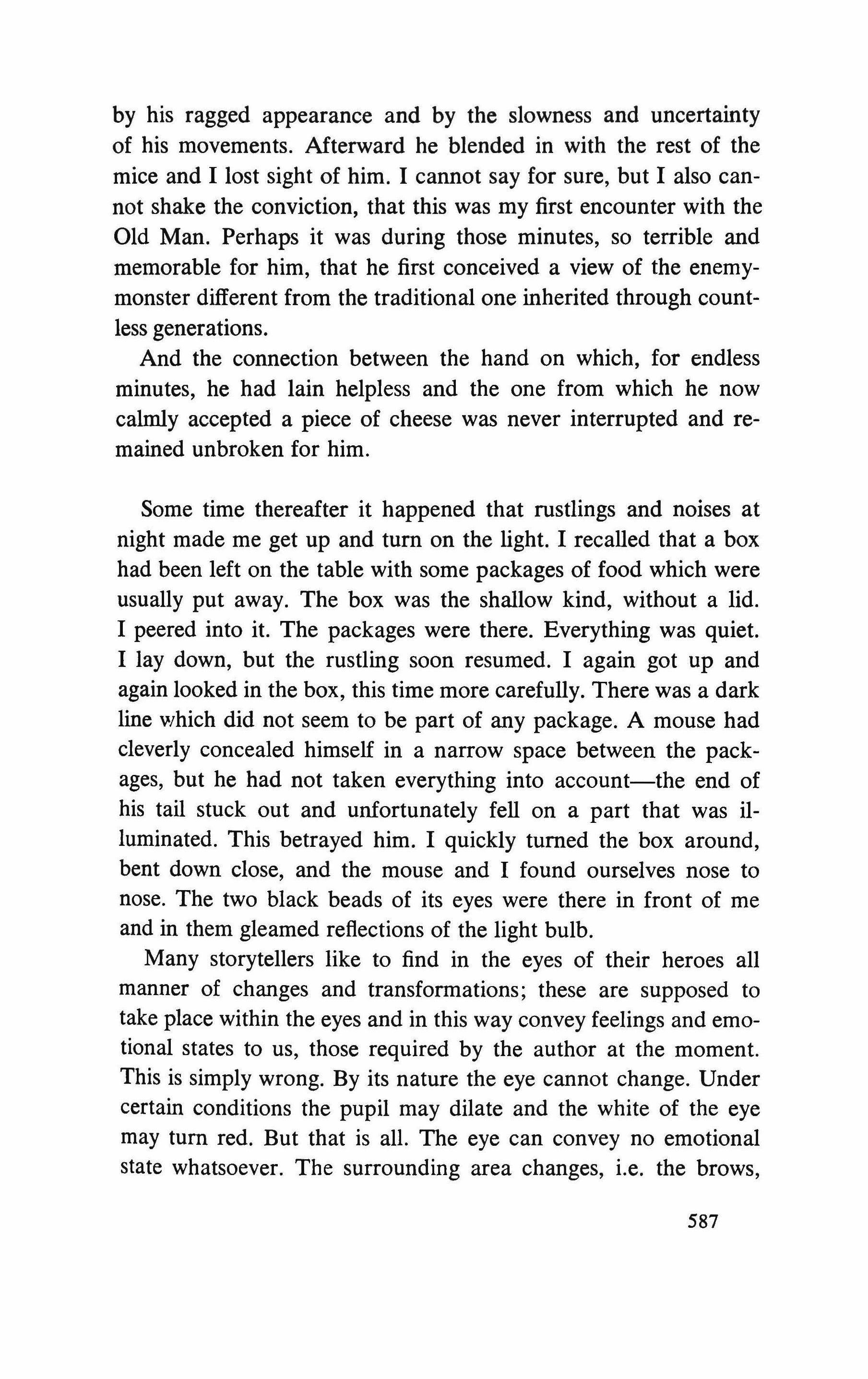
by his ragged appearance and by the slowness and uncertainty of his movements. Afterward he blended in with the rest of the mice and I lost sight of him. I cannot say for sure, but I also cannot shake the conviction, that this was my first encounter with the Old Man. Perhaps it was during those minutes, so terrible and memorable for him, that he first conceived a view of the enemymonster different from the traditional one inherited through countless generations.
And the connection between the hand on which, for endless minutes, he had lain helpless and the one from which he now calmly accepted a piece of cheese was never interrupted and remained unbroken for him.
Some time thereafter it happened that rustlings and noises at night made me get up and tum on the light. I recalled that a box had been left on the table with some packages of food which were usually put away. The box was the shallow kind, without a lid. I peered into it. The packages were there. Everything was quiet. I lay down, but the rustling soon resumed. I again got up and again looked in the box, this time more carefully. There was a dark line which did not seem to be part of any package. A mouse had cleverly concealed himself in a narrow space between the packages, but he had not taken everything into account-the end of his tail stuck out and unfortunately fell on a part that was illuminated. This betrayed him. I quickly turned the box around, bent down close, and the mouse and I found ourselves nose to nose. The two black beads of its eyes were there in front of me and in them gleamed reflections of the light bulb.
Many storytellers like to find in the eyes of their heroes all manner of changes and transformations; these are supposed to take place within the eyes and in this way convey feelings and emotional states to us, those required by the author at the moment. This is simply wrong. By its nature the eye cannot change. Under certain conditions the pupil may dilate and the white of the eye may tum red. But that is all. The eye can convey no emotional state whatsoever. The surrounding area changes, i.e. the brows, 587
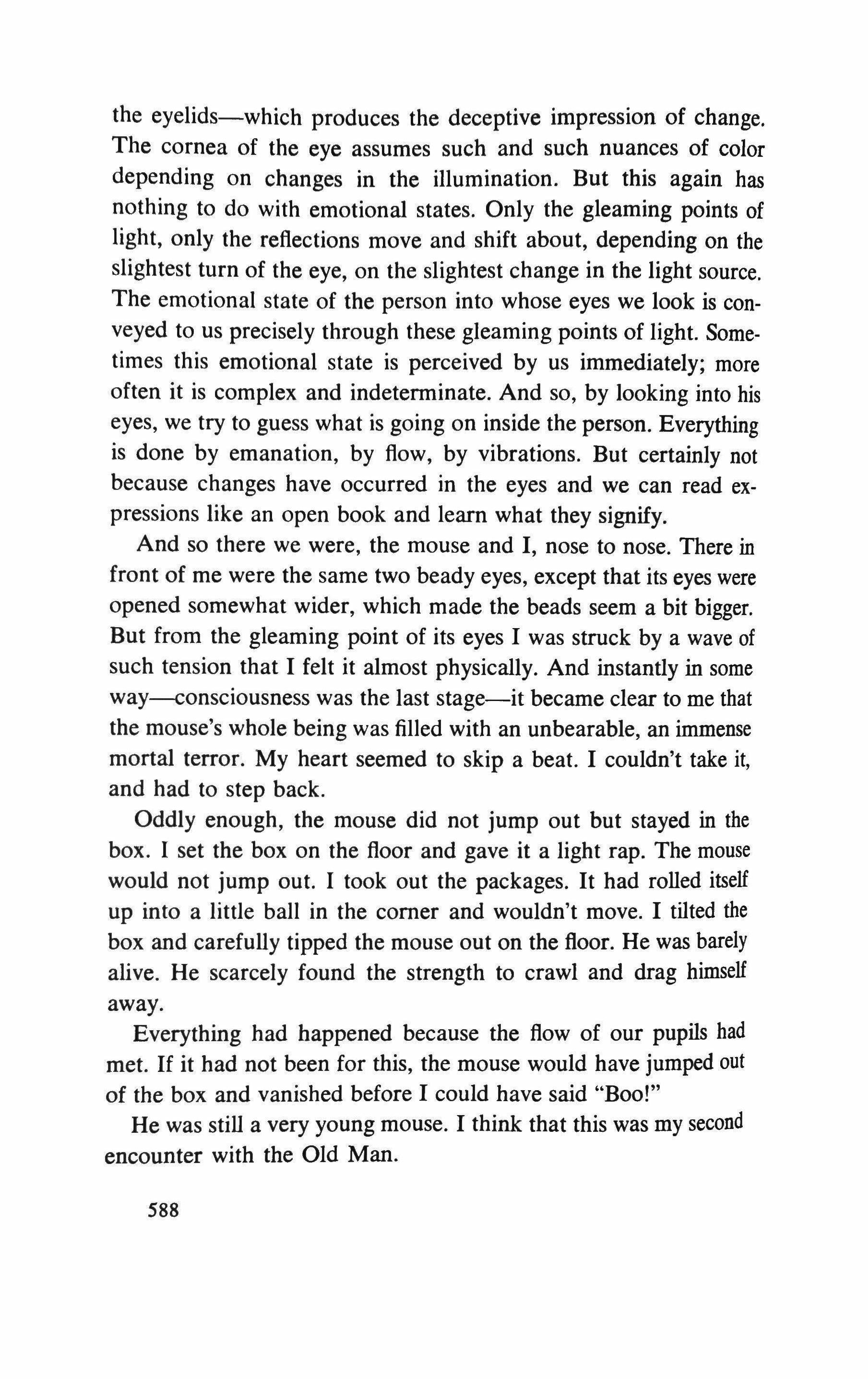
the eyelids-which produces the deceptive impression of change. The cornea of the eye assumes such and such nuances of color depending on changes in the illumination. But this again has nothing to do with emotional states. Only the gleaming points of light, only the reflections move and shift about, depending on the slightest turn of the eye, on the slightest change in the light source. The emotional state of the person into whose eyes we look is conveyed to us precisely through these gleaming points of light. Sometimes this emotional state is perceived by us immediately; more often it is complex and indeterminate. And so, by looking into his eyes, we try to guess what is going on inside the person. Everything is done by emanation, by flow, by vibrations. But certainly not because changes have occurred in the eyes and we can read expressions like an open book and learn what they signify.
And so there we were, the mouse and I, nose to nose. There in front of me were the same two beady eyes, except that its eyes were opened somewhat wider, which made the beads seem a bit bigger. But from the gleaming point of its eyes I was struck by a wave of such tension that I felt it almost physically. And instantly in some way-consciousness was the last stage-it became clear to me that the mouse's whole being was filled with an unbearable, an immense mortal terror. My heart seemed to skip a beat. I couldn't take it, and had to step back.
Oddly enough, the mouse did not jump out but stayed in the box. I set the box on the floor and gave it a light rap. The mouse would not jump out. I took out the packages. It had rolled itself up into a little ball in the comer and wouldn't move. I tilted the box and carefully tipped the mouse out on the floor. He was barely alive. He scarcely found the strength to crawl and drag himself away.
Everything had happened because the flow of our pupils had met. If it had not been for this, the mouse would have jumped out of the box and vanished before I could have said "Boo!"
He was still a very young mouse. I think that this was my second encounter with the Old Man. 588
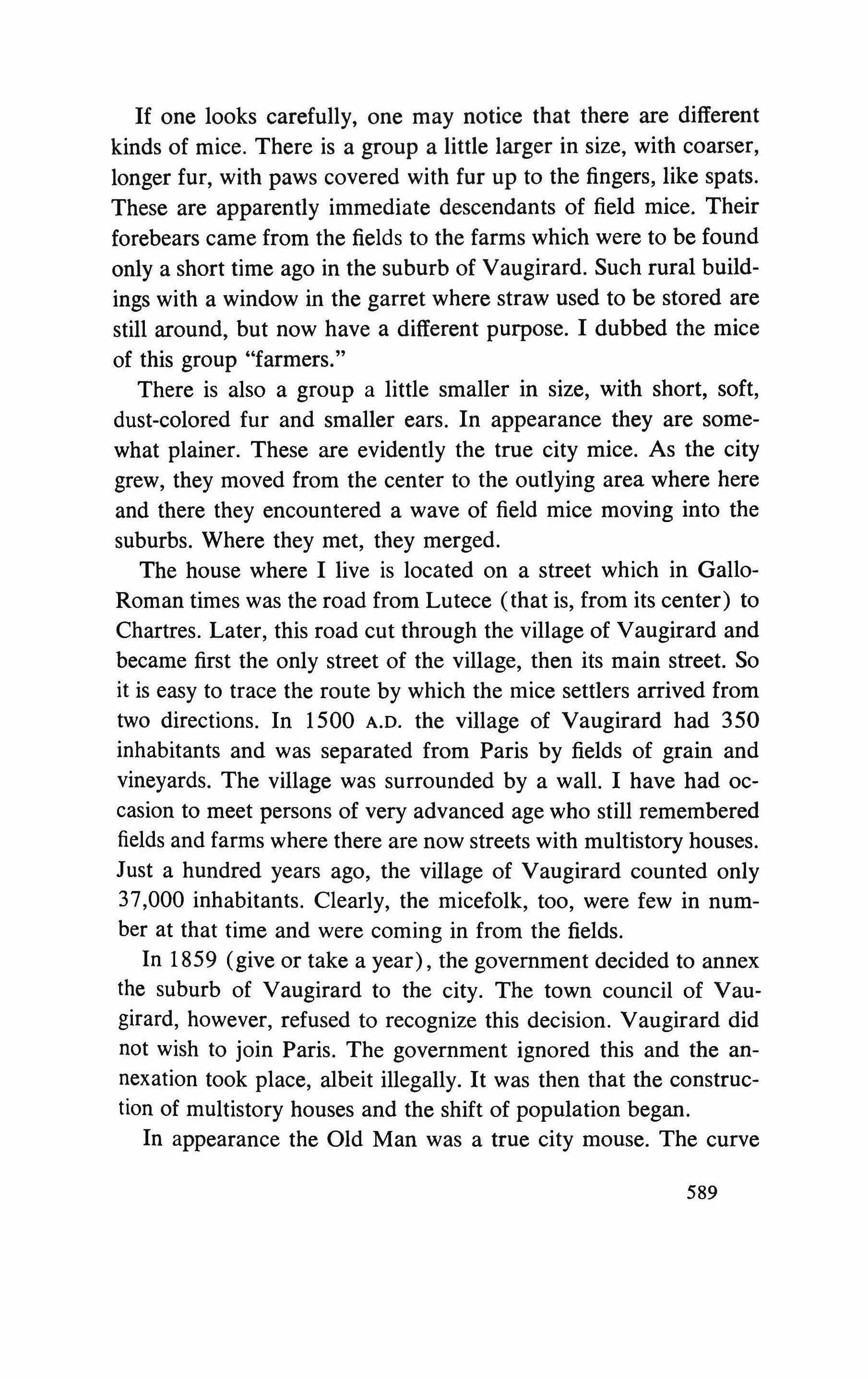
If one looks carefully, one may notice that there are different kinds of mice. There is a group a little larger in size, with coarser, longer fur, with paws covered with fur up to the fingers, like spats. These are apparently immediate descendants of field mice. Their forebears came from the fields to the farms which were to be found only a short time ago in the suburb of Vaugirard. Such rural buildings with a window in the garret where straw used to be stored are still around, but now have a different purpose. I dubbed the mice of this group "farmers."
There is also a group a little smaller in size, with short, soft, dust-colored fur and smaller ears. In appearance they are somewhat plainer. These are evidently the true city mice. As the city grew, they moved from the center to the outlying area where here and there they encountered a wave of field mice moving into the suburbs. Where they met, they merged.
The house where I live is located on a street which in GalloRoman times was the road from Lutece (that is, from its center) to Chartres. Later, this road cut through the village of Vaugirard and became first the only street of the village, then its main street. So it is easy to trace the route by which the mice settlers arrived from two directions. In 1500 A.D. the village of Vaugirard had 350 inhabitants and was separated from Paris by fields of grain and vineyards. The village was surrounded by a wall. I have had occasion to meet persons of very advanced age who still remembered fields and farms where there are now streets with multistory houses. Just a hundred years ago, the village of Vaugirard counted only 37,000 inhabitants. Clearly, the micefolk, too, were few in number at that time and were coming in from the fields.
In 1859 (give or take a year), the government decided to annex the suburb of Vaugirard to the city. The town council of Vaugirard, however, refused to recognize this decision. Vaugirard did not wish to join Paris. The government ignored this and the annexation took place, albeit illegally. It was then that the construction of multistory houses and the shift of population began.
In appearance the Old Man was a true city mouse. The curve
589

in the line from his forehead to his nose was very pronounced, which gave him an expression of shrewdness and cunning, whereas in other mice this curve is often hardly noticeable. Their snouts are cone-shaped, which gives them a simple-minded look. The fingers on their paws are short.
So one could consider the Old Man as belonging, in some tenuous sense, to a sort of aristocracy. His forebears had come to the city, perhaps in times immemorial, but settled in Vaugirard after its annexation, perhaps at the end of the last century.
If my conclusions seem unconvincing to anyone, or lacking in sufficient evidence despite the historical references I have presented, I would note that our own genealogical researches are conducted on far flimsier grounds, but they are nonetheless considered reliable.
In any case these comments point out how closely the fate of the mice was connected with the life of the city and how frequently it also depended on the decisions of town councils and on government decrees.
I once happened to see a mouse climb up on the windowsill and jump through the open window onto the roof of another building adjoining the house, not far below the window. The mouse ran along the roof and crawled into an inconspicuous crack formed between a weather-beaten sheet of iron and the wall of the neighboring building. At this point the mouse slips away from us and it is impossible to trace his path further. But let us nonetheless try to follow him a little way. Through the crack it is possible to get into a nearby room not used for residential or any other known purposes. Two or three stories down and it is only a stone's throw to the Soleil d'Or. The elongated roof of this graceless, seventeenth-century one-story building stretches out underneath my windows. At one time this was an auberge. A bas-relief, depicting the round solar face with wavelike rays, is even now to be seen over the gate of the house. This auberge, now no longer existing, is famous in the history of Vaugirard because it was here during the Revolution that the police broke in unexpectedly while a well-
590
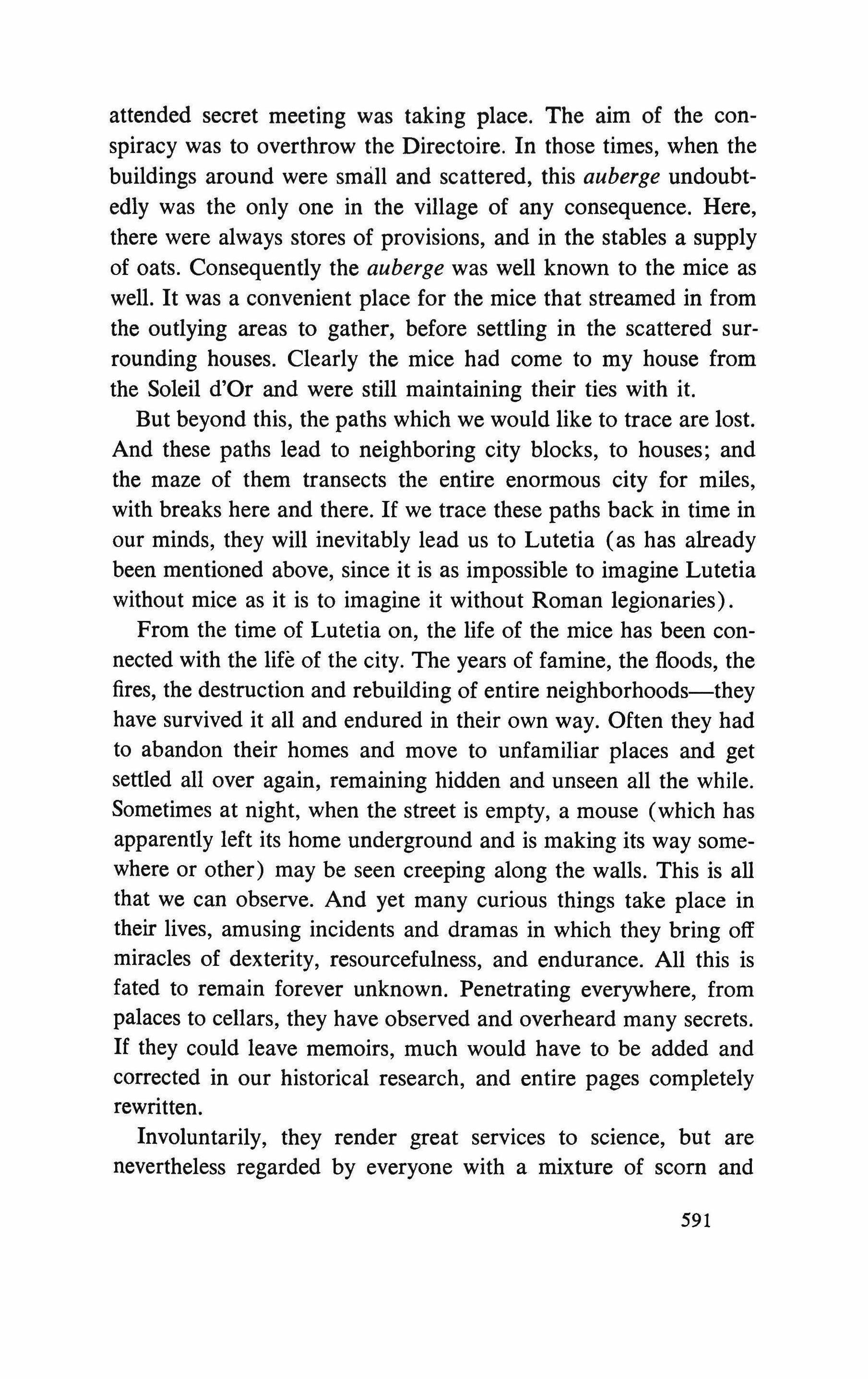
attended secret meeting was taking place. The aim of the conspiracy was to overthrow the Directoire. In those times, when the buildings around were small and scattered, this auberge undoubtedly was the only one in the village of any consequence. Here, there were always stores of provisions, and in the stables a supply of oats. Consequently the auberge was well known to the mice as well. It was a convenient place for the mice that streamed in from the outlying areas to gather, before settling in the scattered surrounding houses. Clearly the mice had come to my house from the Soleil d'Or and were still maintaining their ties with it.
But beyond this, the paths which we would like to trace are lost. And these paths lead to neighboring city blocks, to houses; and the maze of them transects the entire enormous city for miles, with breaks here and there. If we trace these paths back in time in our minds, they will inevitably lead us to Lutetia (as has already been mentioned above, since it is as impossible to imagine Lutetia without mice as it is to imagine it without Roman legionaries).
From the time of Lutetia on, the life of the mice has been connected with the life of the city. The years of famine, the floods, the fires, the destruction and rebuilding of entire neighborhoods-they have survived it all and endured in their own way. Often they had to abandon their homes and move to unfamiliar places and get settled all over again, remaining hidden and unseen all the while. Sometimes at night, when the street is empty, a mouse (which has apparently left its home underground and is making its way somewhere or other) may be seen creeping along the walls. This is all that we can observe. And yet many curious things take place in their lives, amusing incidents and dramas in which they bring off miracles of dexterity, resourcefulness, and endurance. All this is fated to remain forever unknown. Penetrating everywhere, from palaces to cellars, they have observed and overheard many secrets. If they could leave memoirs, much would have to be added and corrected in our historical research, and entire pages completely rewritten.
Involuntarily, they render great services to science, but are nevertheless regarded by everyone with a mixture of scorn and
591

contempt, and subjected to the cruelest of persecution. There are few living creatures that nature has put in such unfavorable and difficult conditions. The incomprehensible, cruel perversity of fate has condemned them to live and seek out a subsistence in the midst of their most powerful enemies, where they have to risk their lives for a drop of water, and has given them no means of defense other than quick thinking, agility, and resourcefulness. For us, notions of what is useful and harmful are the primary, almost the only, criteria, and therefore mice appear to us as harmful. Actually, their only fault is that they have to eat. However, the notions of what is useful and harmful that apply to the universe as a whole are infinitely broader than our own, do not coincide with our own, and indeed are often radically divergent.
The laws that apply to life in general are, on the whole, on the side of the mice, and they support and protect them whether we like it or not. And that is why mice survive.
Hearing a noise in the kitchen, I opened the door and pressed the light switch. Of course everything was quiet; there was nobody. But on the gas stove near one of the burners there was a small dark-colored something. I came closer. It was a baby mouse. He was so small that his eyes had not yet opened completely and could barely be discerned behind narrow slits. Apparently he had tagged along after the adults, who had then abandoned him when I opened the door; clearly he had no notion whatsoever of what was happening. That was why he was unafraid of me.
I broke off a bit of plumcake and put it in front of him. Small as the piece was, it was still the same size as the mouse. He moved back a little, then slowly approached the plumcake and clasped it with his paws as though he were embracing it; not knowing what to do with it, he poked his little muzzle into it a few times. He still did not know how to eat. On the evening of the following day, at approximately the same hour, the little mouse was sitting in the same place again and again was given a piece of plumcake. This went on for about three or four days. Then he stopped comingan awareness of danger had obviously awakened in him.
592
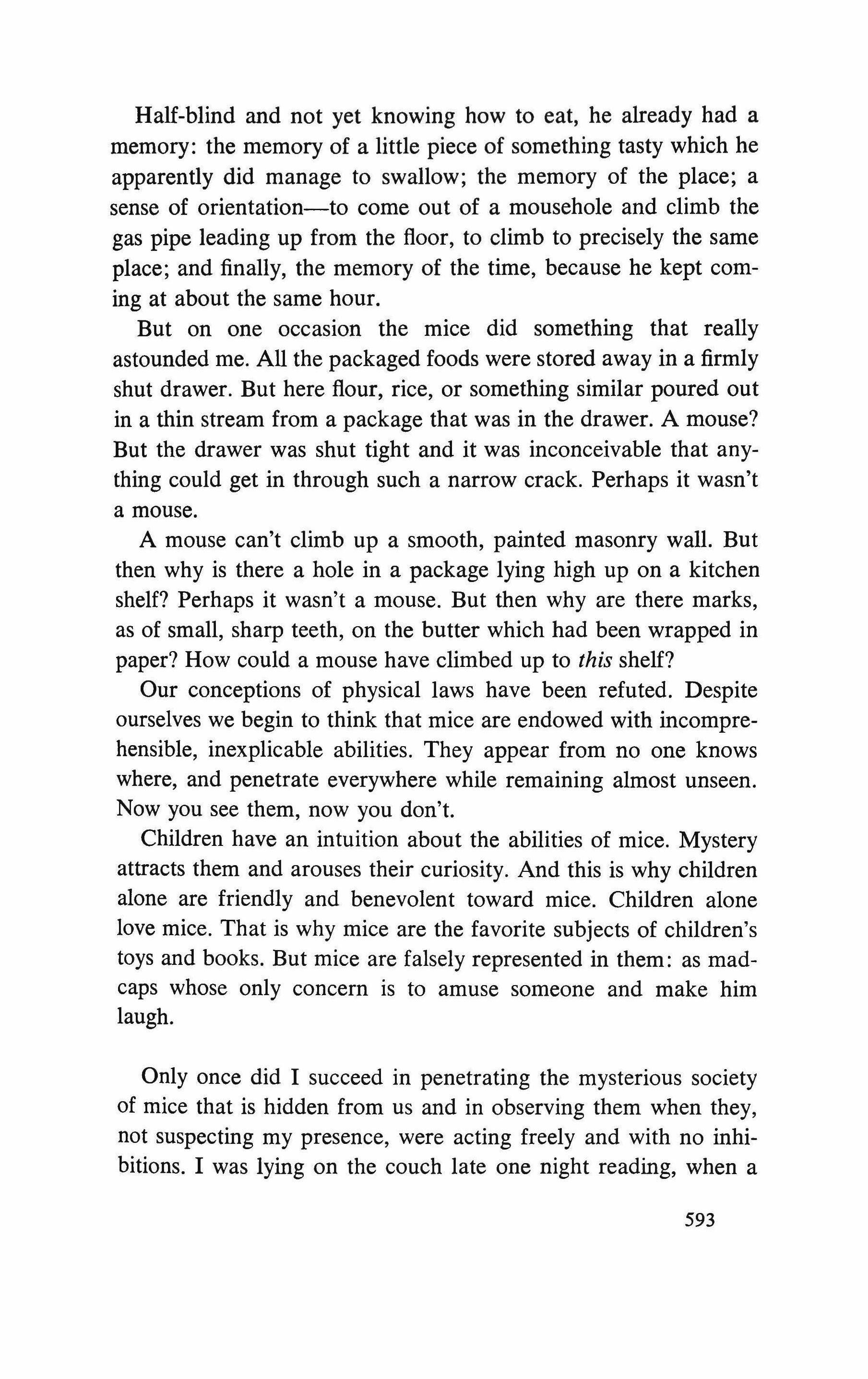
Half-blind and not yet knowing how to eat, he already had a memory: the memory of a little piece of something tasty which he apparently did manage to swallow; the memory of the place; a sense of orientation-to come out of a mousehole and climb the gas pipe leading up from the floor, to climb to precisely the same place; and finally, the memory of the time, because he kept coming at about the same hour.
But on one occasion the mice did something that really astounded me. All the packaged foods were stored away in a firmly shut drawer. But here flour, rice, or something similar poured out in a thin stream from a package that was in the drawer. A mouse? But the drawer was shut tight and it was inconceivable that anything could get in through such a narrow crack. Perhaps it wasn't a mouse.
A mouse can't climb up a smooth, painted masonry wall. But then why is there a hole in a package lying high up on a kitchen shelf? Perhaps it wasn't a mouse. But then why are there marks, as of small, sharp teeth, on the butter which had been wrapped in paper? How could a mouse have climbed up to this shelf?
Our conceptions of physical laws have been refuted. Despite ourselves we begin to think that mice are endowed with incomprehensible, inexplicable abilities. They appear from no one knows where, and penetrate everywhere while remaining almost unseen. Now you see them, now you don't.
Children have an intuition about the abilities of mice. Mystery attracts them and arouses their curiosity. And this is why children alone are friendly and benevolent toward mice. Children alone love mice. That is why mice are the favorite subjects of children's toys and books. But mice are falsely represented in them: as madcaps whose only concern is to amuse someone and make him laugh.
Only once did I succeed in penetrating the mysterious society of mice that is hidden from us and in observing them when they, not suspecting my presence, were acting freely and with no inhibitions. I was lying on the couch late one night reading, when a
593
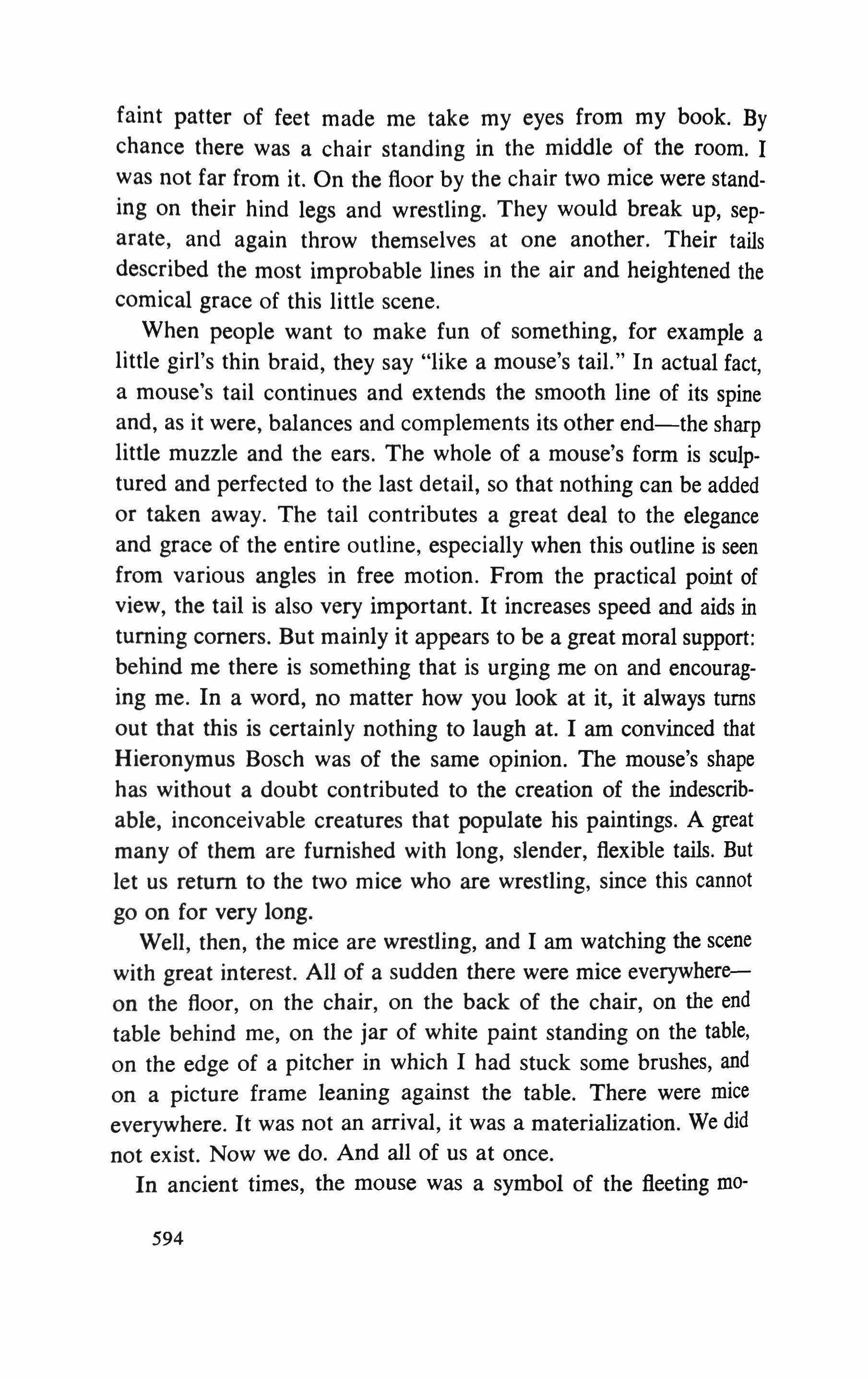
faint patter of feet made me take my eyes from my book. By chance there was a chair standing in the middle of the room. I was not far from it. On the floor by the chair two mice were standing on their hind legs and wrestling. They would break up, separate, and again throw themselves at one another. Their tails described the most improbable lines in the air and heightened the comical grace of this little scene.
When people want to make fun of something, for example a little girl's thin braid, they say "like a mouse's tail." In actual fact, a mouse's tail continues and extends the smooth line of its spine and, as it were, balances and complements its other end-the sharp little muzzle and the ears. The whole of a mouse's form is SCUlptured and perfected to the last detail, so that nothing can be added or taken away. The tail contributes a great deal to the elegance and grace of the entire outline, especially when this outline is seen from various angles in free motion. From the practical point of view, the tail is also very important. It increases speed and aids in turning corners. But mainly it appears to be a great moral support: behind me there is something that is urging me on and encouraging me. In a word, no matter how you look at it, it always turns out that this is certainly nothing to laugh at. I am convinced that Hieronymus Bosch was of the same opinion. The mouse's shape has without a doubt contributed to the creation of the indescribable, inconceivable creatures that populate his paintings. A great many of them are furnished with long, slender, flexible tails. But let us return to the two mice who are wrestling, since this cannot go on for very long.
Well, then, the mice are wrestling, and I am watching the scene with great interest. All of a sudden there were mice everywhereon the floor, on the chair, on the back of the chair, on the end table behind me, on the jar of white paint standing on the table, on the edge of a pitcher in which I had stuck some brushes, and on a picture frame leaning against the table. There were mice everywhere. It was not an arrival, it was a materialization. We did not exist. Now we do. And all of us at once.
In ancient times, the mouse was a symbol of the fleeting mo-
594
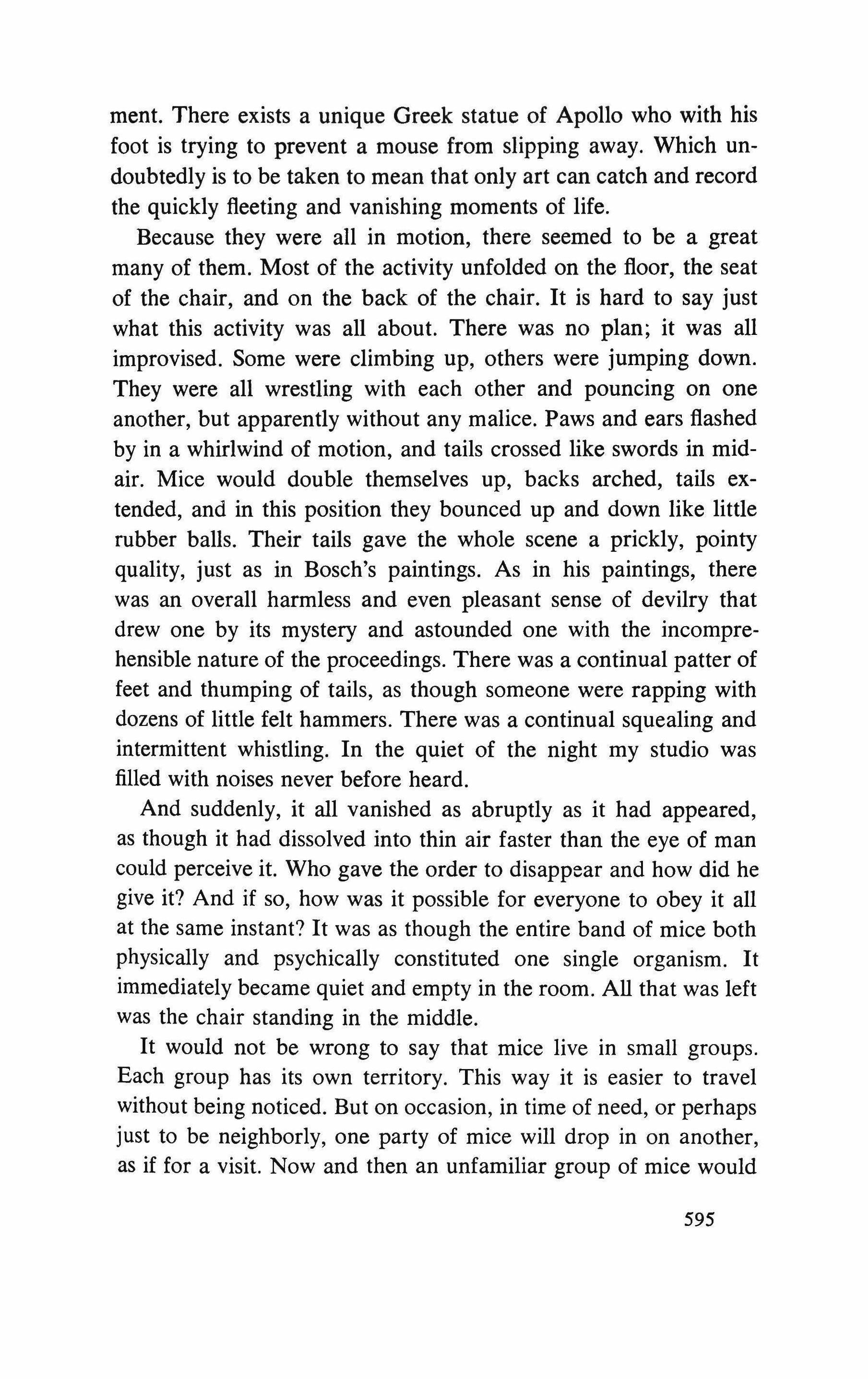
ment. There exists a unique Greek statue of Apollo who with his foot is trying to prevent a mouse from slipping away. Which undoubtedly is to be taken to mean that only art can catch and record the quickly fleeting and vanishing moments of life. Because they were all in motion, there seemed to be a great many of them. Most of the activity unfolded on the floor, the seat of the chair, and on the back of the chair. It is hard to say just what this activity was all about. There was no plan; it was all improvised. Some were climbing up, others were jumping down. They were all wrestling with each other and pouncing on one another, but apparently without any malice. Paws and ears flashed by in a whirlwind of motion, and tails crossed like swords in midair. Mice would double themselves up, backs arched, tails extended, and in this position they bounced up and down like little rubber balls. Their tails gave the whole scene a prickly, pointy quality, just as in Bosch's paintings. As in his paintings, there was an overall harmless and even pleasant sense of devilry that drew one by its mystery and astounded one with the incomprehensible nature of the proceedings. There was a continual patter of feet and thumping of tails, as though someone were rapping with dozens of little felt hammers. There was a continual squealing and intermittent whistling. In the quiet of the night my studio was filled with noises never before heard.
And suddenly, it all vanished as abruptly as it had appeared, as though it had dissolved into thin air faster than the eye of man could perceive it. Who gave the order to disappear and how did he give it? And if so, how was it possible for everyone to obey it all at the same instant? It was as though the entire band of mice both physically and psychically constituted one single organism. It immediately became quiet and empty in the room. All that was left was the chair standing in the middle.
It would not be wrong to say that mice live in small groups. Each group has its own territory. This way it is easier to travel without being noticed. But on occasion, in time of need, or perhaps just to be neighborly, one party of mice will drop in on another, as if for a visit. Now and then an unfamiliar group of mice would
595

come to dinner at my place, sometimes with their youngsters, but they never stayed. It is possible that what I had chanced to witness was a sort of grand reception. If that was the case, it must be said that it was a marvelously successful one.
But when they all vanished, I felt as though all I had seen was an apparition. The meaning of this word had always seemed obscure and vague to me. Now I knew what it meant.
I had watched the scene with rapt attention and profound interest. The whole became forever etched in my memory. But the moment the mice suddenly vanished, I felt a vague, disquieting, and oppressive doubt-had this really happened? Had I fallen victim to a delusion? Something extraordinary, even for me who had become accustomed to mice, had for a brief instant abruptly invaded my everyday life and had just as abruptly 'Vanished. Something that was not meant for the eye of man had for some unknown reason made a fleeting appearance, like a vision from some other world.
The first time the Old Man was attacked and knocked off his feet, I thought they were trying to take a piece of food away from him. But they were entirely too rude. Soon I began to notice an unfriendly, hostile attitude toward him on the part of all the mice. The Old Man began to keep to one half of the room, and became wary of entering the other half, where the passageway to the cellar was. Several times I saw him recoil from something or escape by climbing up something. More than once I had to take his side. Little by little, I became convinced that the Old Man was being persecuted at every opportunity.
Once I happened to look across the room and saw a mouse hidden behind some newspapers on the couch watching the Old Man who was sitting on a chair. Now the mouse, unnoticed, let himself down on the floor, stealthily crept up to the chair and, after climbing up the leg cautiously, concealed himself and waited. Finding the right moment, he lunged at the Old Man. But the Old Man, too, had instant reflexes. He pushed off with his paws, jumped straight up, as his mother had taught him, and grabbed
596
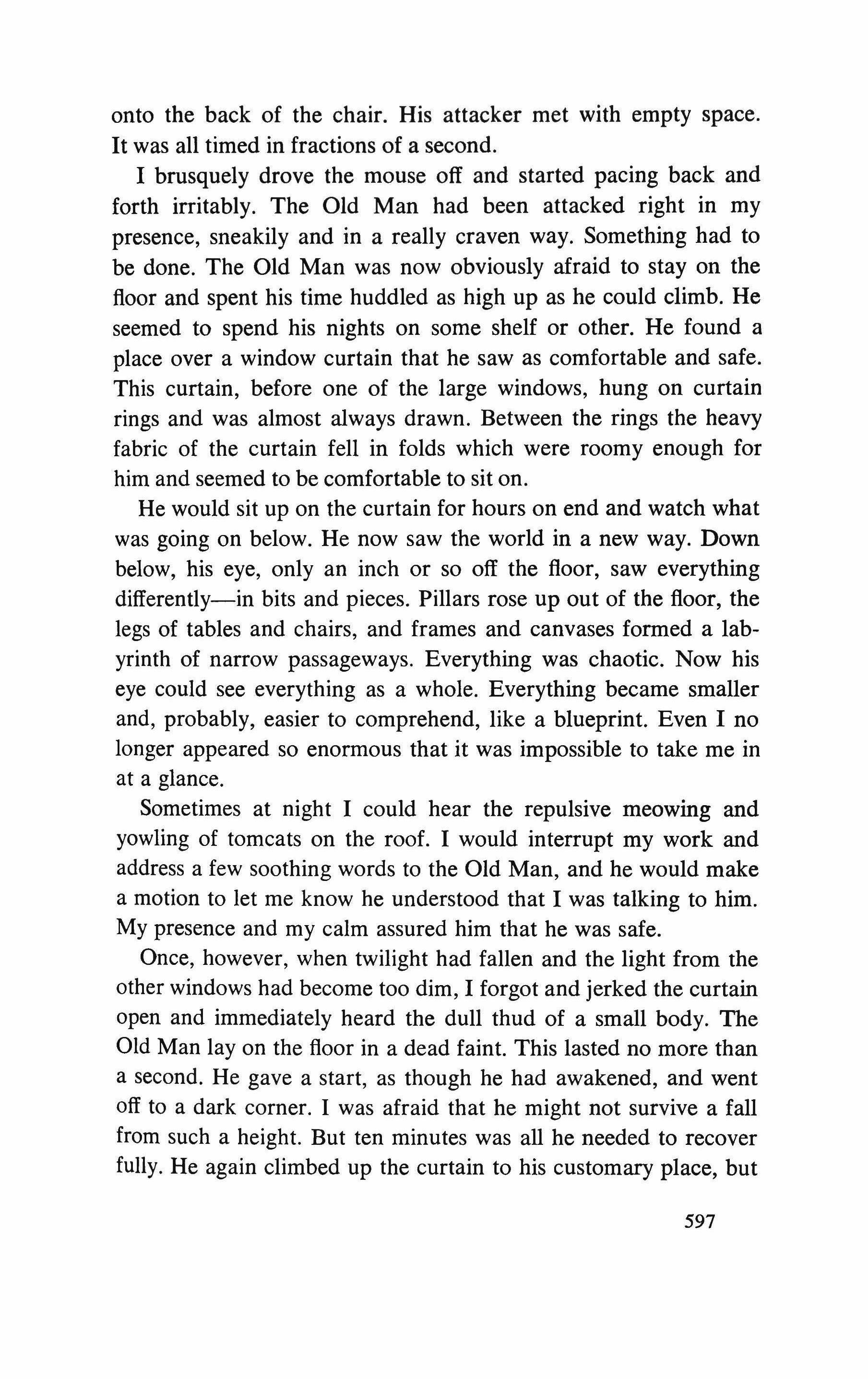
onto the back of the chair. His attacker met with empty space. It was all timed in fractions of a second.
I brusquely drove the mouse off and started pacing back and forth irritably. The Old Man had been attacked right in my presence, sneakily and in a really craven way. Something had to be done. The Old Man was now obviously afraid to stay on the floor and spent his time huddled as high up as he could climb. He seemed to spend his nights on some shelf or other. He found a place over a window curtain that he saw as comfortable and safe. This curtain, before one of the large windows, hung on curtain rings and was almost always drawn. Between the rings the heavy fabric of the curtain fell in folds which were roomy enough for him and seemed to be comfortable to sit on.
He would sit up on the curtain for hours on end and watch what was going on below. He now saw the world in a new way. Down below, his eye, only an inch or so off the floor, saw everything differently-in bits and pieces. Pillars rose up out of the floor, the legs of tables and chairs, and frames and canvases formed a labyrinth of narrow passageways. Everything was chaotic. Now his eye could see everything as a whole. Everything became smaller and, probably, easier to comprehend, like a blueprint. Even I no longer appeared so enormous that it was impossible to take me in at a glance.
Sometimes at night I could hear the repulsive meowing and yowling of tomcats on the roof. I would interrupt my work and address a few soothing words to the Old Man, and he would make a motion to let me know he understood that I was talking to him. My presence and my calm assured him that he was safe.
Once, however, when twilight had fallen and the light from the other windows had become too dim, I forgot and jerked the curtain open and immediately heard the dull thud of a small body. The Old Man lay on the floor in a dead faint. This lasted no more than a second. He gave a start, as though he had awakened, and went off to a dark corner. I was afraid that he might not survive a fall from such a height. But ten minutes was all he needed to recover fully. He again climbed up the curtain to his customary place, but
597
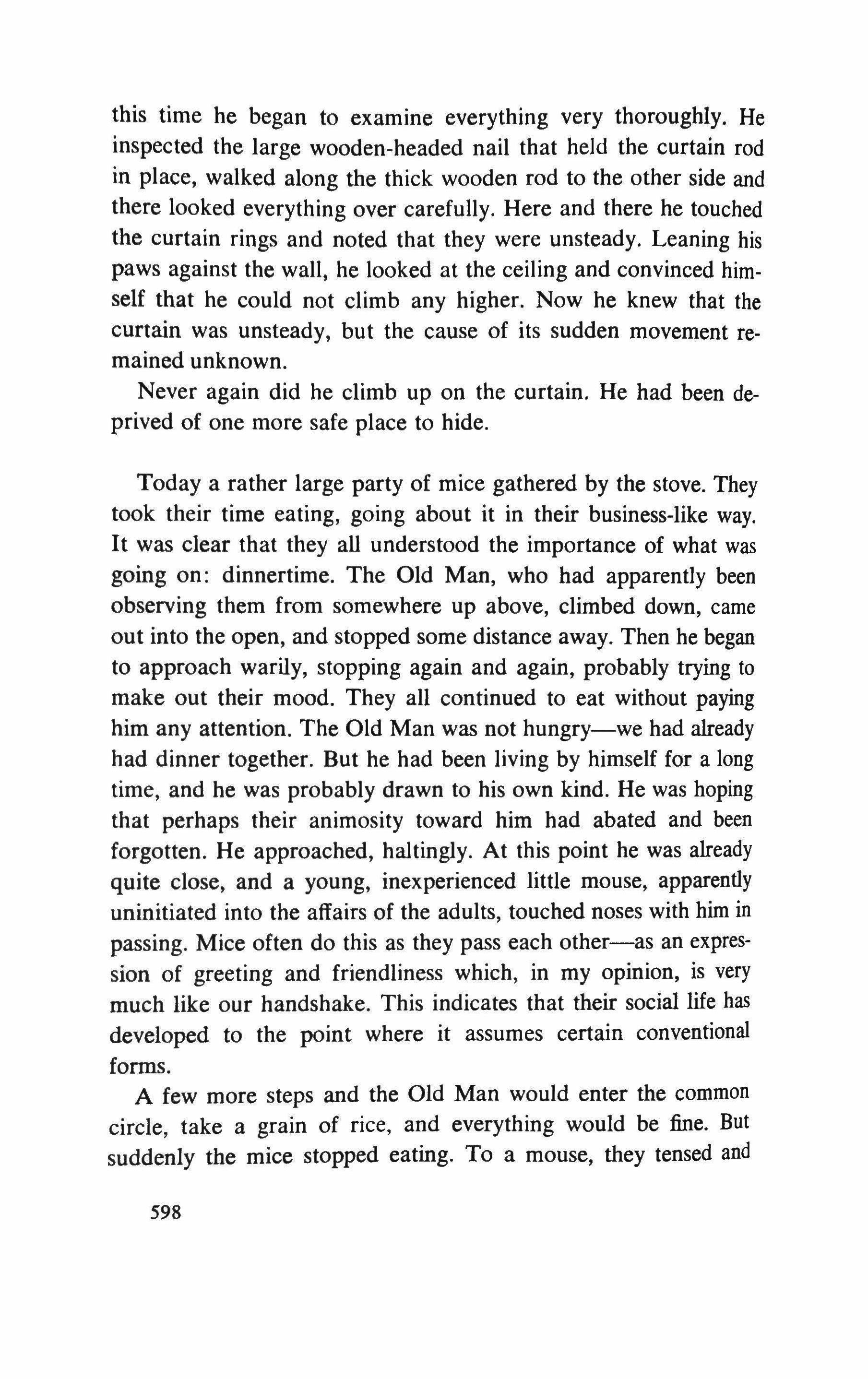
this time he began to examine everything very thoroughly. He inspected the large wooden-headed nail that held the curtain rod in place, walked along the thick wooden rod to the other side and there looked everything over carefully. Here and there he touched the curtain rings and noted that they were unsteady. Leaning his paws against the wall, he looked at the ceiling and convinced himself that he could not climb any higher. Now he knew that the curtain was unsteady, but the cause of its sudden movement remained unknown.
Never again did he climb up on the curtain. He had been deprived of one more safe place to hide.
Today a rather large party of mice gathered by the stove. They took their time eating, going about it in their business-like way. It was clear that they all understood the importance of what was going on: dinnertime. The Old Man, who had apparently been observing them from somewhere up above, climbed down, came out into the open, and stopped some distance away. Then he began to approach warily, stopping again and again, probably trying to make out their mood. They all continued to eat without paying him any attention. The Old Man was not hungry-we had already had dinner together. But he had been living by himself for a long time, and he was probably drawn to his own kind. He was hoping that perhaps their animosity toward him had abated and been forgotten. He approached, haltingly. At this point he was already quite close, and a young, inexperienced little mouse, apparently uninitiated into the affairs of the adults, touched noses with him in passing. Mice often do this as they pass each other-as an expression of greeting and friendliness which, in my opinion, is very much like our handshake. This indicates that their social life has developed to the point where it assumes certain conventional forms.
A few more steps and the Old Man would enter the common circle, take a grain of rice, and everything would be fine. But suddenly the mice stopped eating. To a mouse, they tensed and 598
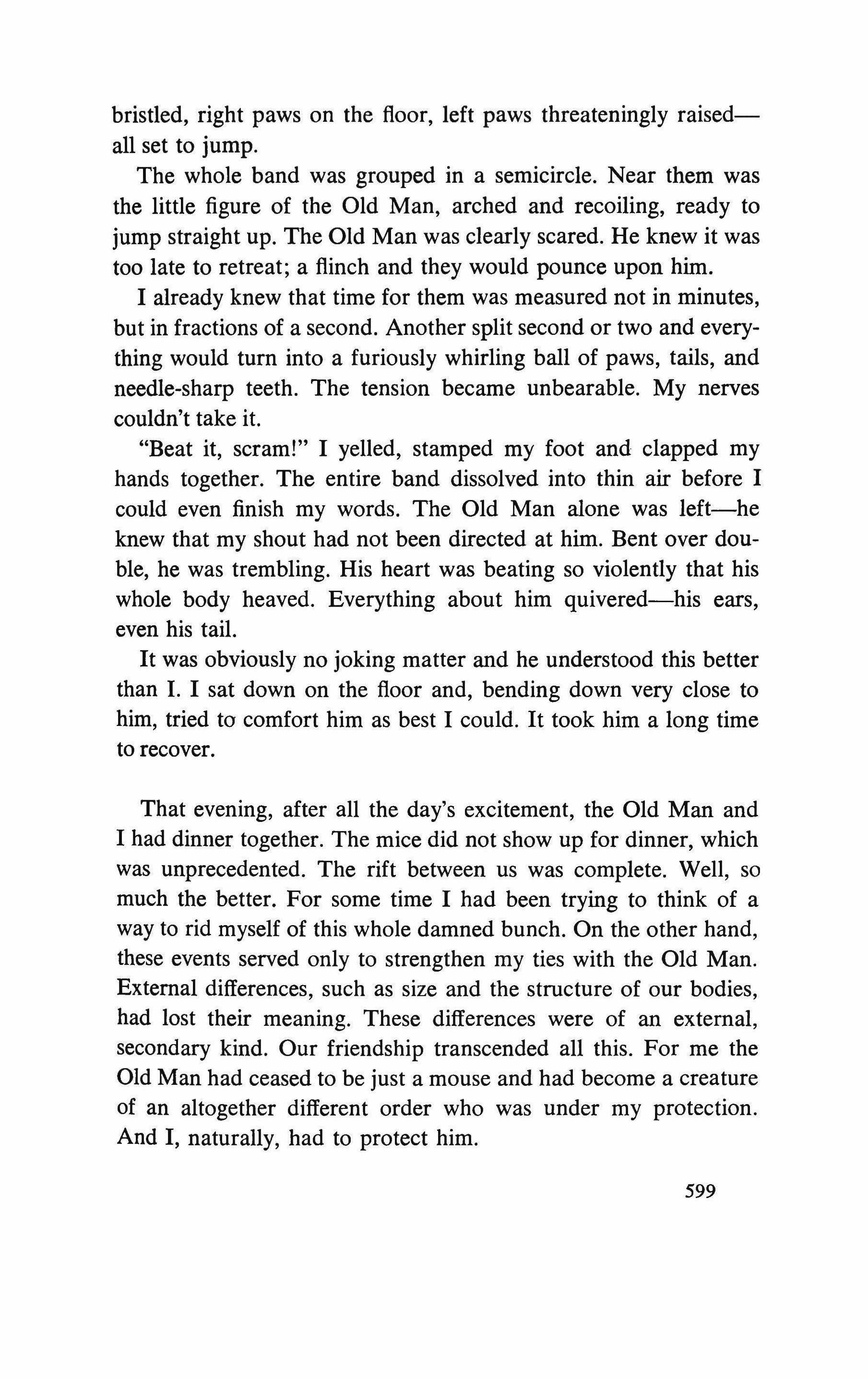
bristled, right paws on the floor, left paws threateningly raisedall set to jump.
The whole band was grouped in a semicircle. Near them was the little figure of the Old Man, arched and recoiling, ready to jump straight up. The Old Man was clearly scared. He knew it was too late to retreat; a flinch and they would pounce upon him.
I already knew that time for them was measured not in minutes, but in fractions of a second. Another split second or two and everything would turn into a furiously whirling ball of paws, tails, and needle-sharp teeth. The tension became unbearable. My nerves couldn't take it.
"Beat it, scram!" I yelled, stamped my foot and clapped my hands together. The entire band dissolved into thin air before I could even finish my words. The Old Man alone was left-he knew that my shout had not been directed at him. Bent over double, he was trembling. His heart was beating so violently that his whole body heaved. Everything about him quivered-his ears, even his tail.
It was obviously no joking matter and he understood this better than I. I sat down on the floor and, bending down very close to him, tried to comfort him as best I could. It took him a long time to recover.
That evening, after all the day's excitement, the Old Man and I had dinner together. The mice did not show up for dinner, which was unprecedented. The rift between us was complete. Well, so much the better. For some time I had been trying to think of a way to rid myself of this whole damned bunch. On the other hand, these events served only to strengthen my ties with the Old Man. External differences, such as size and the structure of our bodies, had lost their meaning. These differences were of an external, secondary kind. Our friendship transcended all this. For me the Old Man had ceased to be just a mouse and had become a creature of an altogether different order who was under my protection. And I, naturally, had to protect him.
599
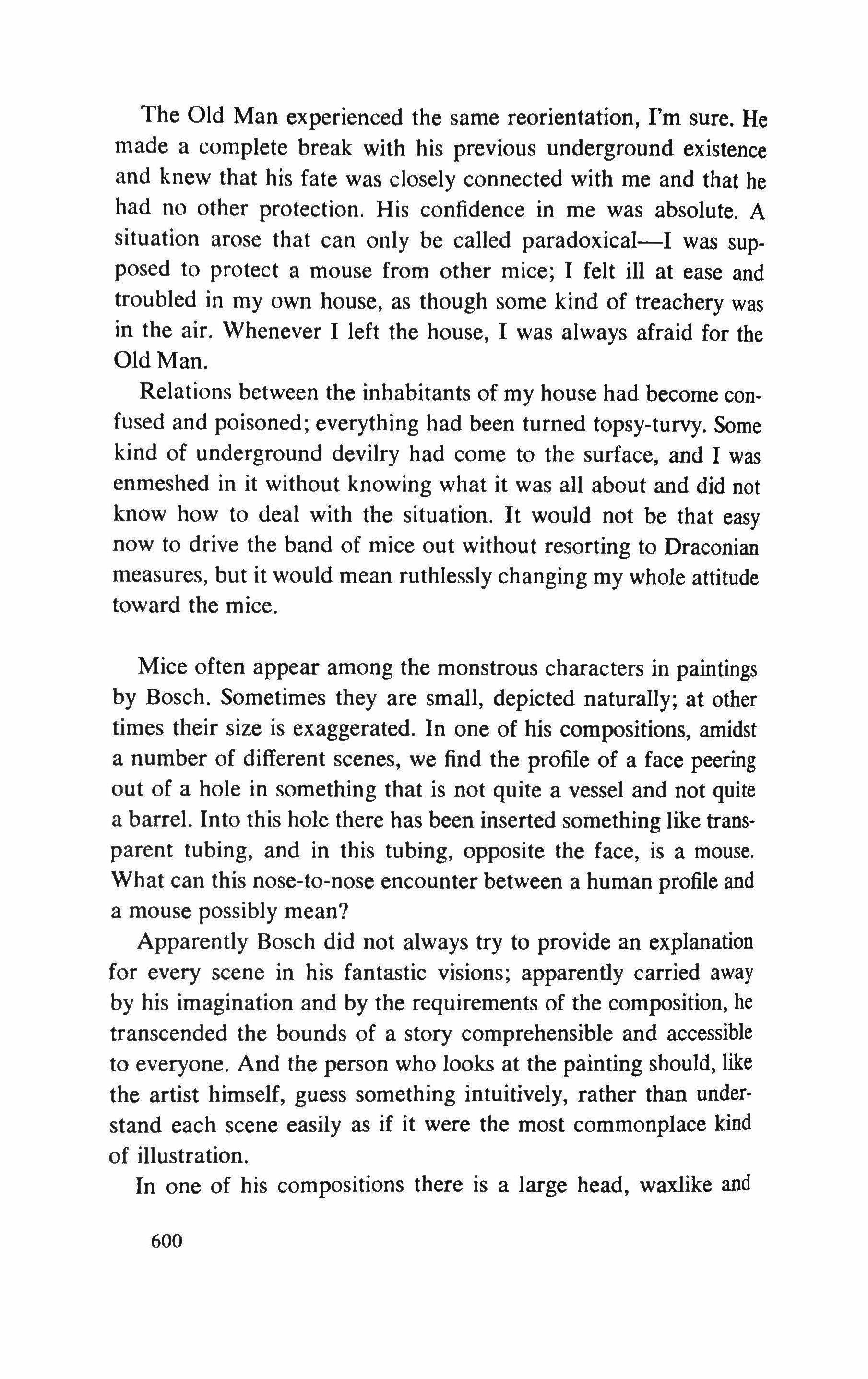
The Old Man experienced the same reorientation, I'm sure. He made a complete break with his previous underground existence and knew that his fate was closely connected with me and that he had no other protection. His confidence in me was absolute. A situation arose that can only be called paradoxical-I was supposed to protect a mouse from other mice; I felt ill at ease and troubled in my own house, as though some kind of treachery was in the air. Whenever I left the house, I was always afraid for the Old Man.
Relations between the inhabitants of my house had become confused and poisoned; everything had been turned topsy-turvy. Some kind of underground devilry had come to the surface, and I was enmeshed in it without knowing what it was all about and did not know how to deal with the situation. It would not be that easy now to drive the band of mice out without resorting to Draconian measures, but it would mean ruthlessly changing my whole attitude toward the mice.
Mice often appear among the monstrous characters in paintings by Bosch. Sometimes they are small, depicted naturally; at other times their size is exaggerated. In one of his compositions, amidst a number of different scenes, we find the profile of a face peering out of a hole in something that is not quite a vessel and not quite a barrel. Into this hole there has been inserted something like transparent tubing, and in this tubing, opposite the face, is a mouse. What can this nose-to-nose encounter between a human profile and a mouse possibly mean?
Apparently Bosch did not always try to provide an explanation for every scene in his fantastic visions; apparently carried away by his imagination and by the requirements of the composition, he transcended the bounds of a story comprehensible and accessible to everyone. And the person who looks at the painting should, like the artist himself, guess something intuitively, rather than understand each scene easily as if it were the most commonplace kind of illustration.
In one of his compositions there is a large head, waxlike and 600

lifeless. In place of the eyes there are two round empty holes. Money pours out of the nose into a washtub where some women are bathing. A mouse crawls into one of the empty eye sockets.
Elsewhere a woman is shown in bed. By the bed is an enormous mouse the size of a man. Another similar mouse has concealed itself at the foot of the bed. On the blanket there crawls a small mouse of natural size. Everything is permeated with the feeling of a monstrous, suffocating nightmare.
In one of his paintings, an improbable-looking, but manlike creature with the head of a mouse seizes by the throat an overturned naked figure which has already been run through with a sword. On the floor are some cards; wine spills out of a pitcher that has tipped over.
At the very bottom of another painting (probably by one of Bosch's disciples), one mouse has knocked a second mouse down and is sinking its teeth into its belly. Close by, apparently terrified by this scene, the skeleton of a third mouse is fleeing.
To the mind of the Middle Ages, the mouse without a doubt was to be classified with incomprehensible, mysterious, and supernatural creatures.
Many other things came to my mind. I recalled a ballad I had read in my childhood and had long since forgotten. As I now understand it, the ballad was undoubtedly based on an ancient legend. In a year of famine, a bishop is asked to distribute the stores of grain which he has at his disposal to the starving populace. The bishop refuses and adds that he would sooner give the grain to the mice. That night thousands of mice get into the tower where he dwells and tear him to pieces. "Thus was Bishop Gapon * punished." The mice, obviously, fulfill the preordained design of some higher justice. Here again they playa subordinate role and again they have connections with forces from beyond. Such, obviously, was the belief of the Middle Ages.
'" Andreenko somehow confuses Father Georgy Gapon (the priest who led the Bloody Sunday procession during the 1905 revolution) with Bishop Hatto of Metz (Gatton in Russian), who appears in Vasily Zhukovsky's adaptation of Robert Southey'S historical ballad about the bishop and the mice, the last line of which is quoted. EDITOR.
601

There exists a Russian block print called "How the Mice Buried the Cat," intended for peasants and undiscriminating amateurs. This print was certainly popular, since it has survived in a great many variants dating from about the end of the eighteenth to the middle of the nineteenth century. The print was usually stuck on the walls of huts and entertained one generation after another. Provided with a lengthy inscription which explains the proceedings, it depicts a deceased cat on a sledge or a cart, with a long procession of mice following behind. The point of the humor is clearly that the mice are interring the cat in accordance with the burial ritual. They look saddened, but deep down, of course, they are glad. The mice are staging a prank, but it is a sinister kind of prank just the same.
One would think the printmaker could have picked another subject-a wedding among mice, for example. But no, in the peasant mind the atmosphere of a funeral had some kind of link with the mysterious and incomprehensible and was thus better suited to their conception of mice.
Goethe would have agreed with this completely. In his memoirs he noted that his father, an art lover and a collector of paintings, commissioned an artist well known as a skillful painter of flowers to do a painting of a bouquet. The artist obliged. At the bottom of the canvas next to the vase he depicted a mouse. Goethe makes several remarks about all this. He doubts the appropriateness and possibility of such a combination-a mouse and flowers.
All this ran through my mind, and melancholy thoughts kept occurring to me now that hostility and malice had emerged from obscure comers and invaded my home. It seemed that some sinister prank was being played, one whose sense kept eluding me.
While I had found an explanation why the Old Man alone of all the mice had formed an attachment for me, the reason why he was being persecuted remained incomprehensible. Gradually, however, the explanation became apparent: the Old Man was being
602

persecuted for his friendship with me. But what actually was he guilty of?
In their struggle for survival, animals are at times merciless (just as we are) toward the weak and the aged. But here it was not a matter of survival. The mice were all fed to their heart's content. There was no cause for envy. Other mice used to come who were about the same age as the Old Man. No one persecuted them. Any of the mice could have climbed up on the chair that stood next to mine, where the Old Man had his dinner; any of them could have approached me as he did. But not one of them ever did. Let me say again that envy had nothing to do with it.
But are animals really so merciless toward the weak? A friend of mine told me that in 1914 during the war, when he was in the trenches near the Somme, he once noticed two rats. One was holding the other by the tail with its teeth, and in this manner they would make their way along the trench. After observing them a few times, he realized that one of the rats was blind. The other was leading it to a place where they could find water or food.
We are incapable of imagining a mode of thinking different from our own; we are convinced of the infallibility of our logic. Therefore, when we try to explain something that happens among animals, we impose both our thoughts and our feelings on them. But this doesn't really explain anything. The logic of mice can hardly be anything like ours and a mouse is not likely to construct syllogisms. If this is so, wouldn't it be better to abandon all futile musings and disquisitions and to conclude these notes with a simple narrative, as indeed they were begun?
That is what I have decided to do.
While I was putting some papers in order, I found a longforgotten notebook with these notes in a cabinet. To the notebook was appended a sheet of paper covered with minute handwriting which seemed to be a letter addressed to me. How did this sheet of paper come to be there? I won't try to give any explanations. This would introduce an element of improbability into these notes,
603

where there is not a word of fiction. Therefore, I won't insist on the authenticity of this letter. We may consider it apocryphal. But inasmuch as it does have a bearing on these notes, I will nonetheless cite it in its entirety. Here is the text of the letter:
Much of what is written down here is extremely hard to decipber. The sense of many of the concepts eludes us completely, for we simply do not bave tbem. What do such concepts as "friendship" and "trust" mean? Wbat are "friends"? We do not know. For us only tbe notion of "enemies" exists. There is us, and all others are "enemies." The same goes for tbe notion of "trust." With difficulty we have managed to grasp that tbis is the opposite of the concept of "utter distrust," wbicb is the only one we bave. But even if we did know wbat trust is, we can have no trust in you and none is possible. Trust in you is treacbery and a crime against our entire species. Getting food always involves great danger. Because of this we may even approach a man, if tbere sbould be one odd enougb to want this. But that is as far as it can be permitted to go. The Old Man approacbed you because you saved his life. But even those of your own species consider such behavior on your part to be contrary to all your laws. Why sbould sentimentality and affability be expected of us? Why should we forgive the Old Man bis feelings of gratitude and trust, when we don't even know what tbey are?
By your own admission tbe Old Man bas ceased to be a mouse for you and has become a creature of a different order. For us too. He voluntarily left our midst, ceased to be like us, and eo ipso became our enemy. We cannot conceive of any halfway, intermediate position.
The instance of you and the Old Man is a unique one and in itself cannot bave any significance. But this is not our way and it is not an example to be fol· lowed. There was no physical harm done to us, but I cannot hide the fact that the decline in morale was tremendous. It was all so incomprebensible, so disturbing. It sowed discord in our minds. It was a violation of concepts that had their beginnings in times immemorial, it contradicted wbat had been learned through the bitterest experience of innumerable generations, and it undermined tbe foundations and affected the very bases on wbich our totally closed society rests
And tbere was no reason for you and the Old Man to try to change anything in tbe existing order of tbings and to bridge the gulf between us witb a flimsy structure which must inevitably come tumbling down. Or was it tbat you wanted to make yourselves look ridiculous in front of everyone?
Not everytbing in your notes is all that bad. A few comments are weD taken. What you said about our tails is quite true. Your mention of the statue of ApoDo is quite appropriate and tbe explanation given is correct. The lines wbere you (for the first time) link the history of Parisian mice with tbe history of the city of Paris deserve attention. You are entirely correct, as we represent the underground population of tbe city and bave always represented it. Your notes were written before the first space flight. This must be the only reason wby you did not mention that we, mice, were the first astronauts.
P.S. As far as your allusions to our possible connection with occult and supernatural forces are concerned, I would note that peoples of past ages could attempt to venture Into this area. But you, with your limited present-day perspec·
604

tive, should not touch upon these questions, and you should not try to peer into such matters when you are in no position to see anything.
Acquaintances who used to visit me sometimes saw the mice having their dinner. At times I would call the Old Man and show him off. He would come and, even if he was not hungry, out of politeness take a piece of cake from my hand. He was not afraid of strangers when I was there. Sometimes I would tell my guests something about mice that I thought amusing. Soon, however, I began to feel uncomfortable and awkward. My words did not have the effect I was counting on. Even if I didn't see shoulders being shrugged, I could sense it. Such a lowly topic of conversation was of little interest to anyone. When the Old Man came down from above at my call, some of the ladies recoiled in fright as though expecting that the mouse was about to pounce on them and chew them up. On everyone's face I caught expressions ranging from bewilderment to disgust. Some advised me to buy a white mouse and keep it in a cage. One person told me an edifying story: "A mouse showed up at our place too. It happened to run into the lower shelf in the cupboard. Knowing that there was no way out, we slammed the door shut. It scratched at the door for a while, then stopped. We opened the door cautiously. It turned out that, in looking for a way out, the mouse had climbed into a glass vessel through its narrow opening; so we left it where it was."
Another acquaintance told me the same story time and time again, whenever we met. Once, a long time ago, mice had chewed the corner of one of his books. He didn't have any books now, but he was always worried that if he ever had any again, the mice might chew on them. For that reason he was hostile to mice.
People developed a condescending attitude toward me as a crank who "had to be treated with understanding." And indeed, it had come to the point where I even looked ridiculous to myself. It was becoming vexing and intolerable. I stopped introducing the Old Man to people who visited me, and if anyone began to talk about mice in a condescending tone, I would abruptly break
605
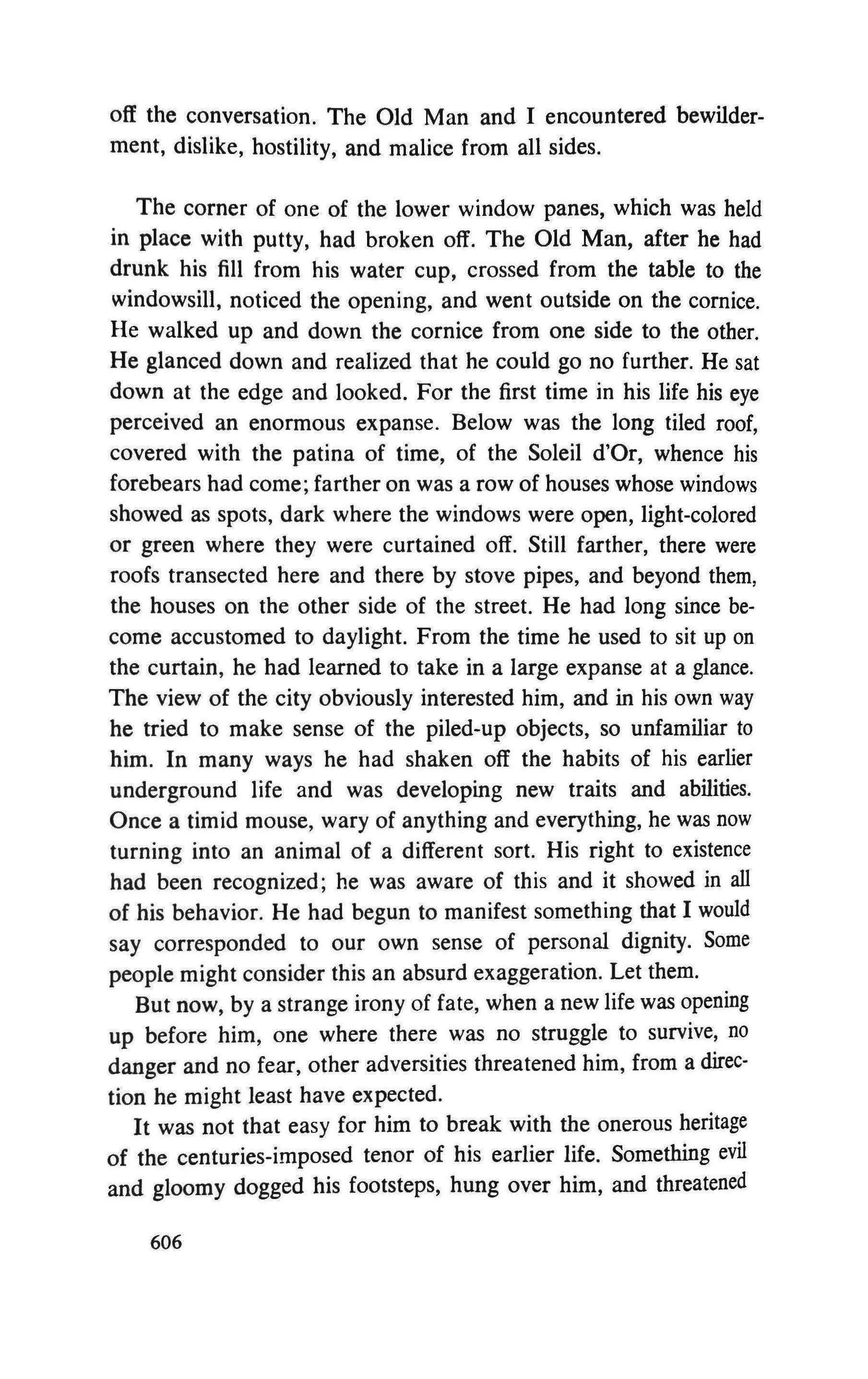
off the conversation. The Old Man and I encountered bewilderment, dislike, hostility, and malice from all sides.
The corner of one of the lower window panes, which was held in place with putty, had broken off. The Old Man, after he had drunk his fill from his water cup, crossed from the table to the windowsill, noticed the opening, and went outside on the cornice. He walked up and down the cornice from one side to the other. He glanced down and realized that he could go no further. He sat down at the edge and looked. For the first time in his life his eye perceived an enormous expanse. Below was the long tiled roof, covered with the patina of time, of the Soleil d'Or, whence his forebears had come; farther on was a row of houses whose windows showed as spots, dark where the windows were open, light-colored or green where they were curtained off. Still farther, there were roofs transected here and there by stove pipes, and beyond them, the houses on the other side of the street. He had long since become accustomed to daylight. From the time he used to sit up on the curtain, he had learned to take in a large expanse at a glance. The view of the city obviously interested him, and in his own way he tried to make sense of the piled-up objects, so unfamiliar to him. In many ways he had shaken off the habits of his earlier underground life and was developing new traits and abilities. Once a timid mouse, wary of anything and everything, he was now turning into an animal of a different sort. His right to existence had been recognized; he was aware of this and it showed in all of his behavior. He had begun to manifest something that I would say corresponded to our own sense of personal dignity. Some people might consider this an absurd exaggeration. Let them.
But now, by a strange irony of fate, when a new life was opening up before him, one where there was no struggle to survive, no danger and no fear, other adversities threatened him, from a direction he might least have expected.
It was not that easy for him to break with the onerous heritage of the centuries-imposed tenor of his earlier life. Something evil and gloomy dogged his footsteps, hung over him, and threatened
606

him. The Old Man sat there gazing at the city and his little figure looked strange against the incongruous background of fogenveloped houses. We remained this way for a long time, each engrossed in his own thoughts. How was I to know what was going on in his little brain? I could not know that I was seeing him for the last time.
Finally he crawled back in through the hole in the window, came down from the windowsill, and went off behind some canvases leaning up against the wall. I never saw him again.
When I returned home that evening and saw that the Old Man did not come to dinner, I rapped on the floor a few times to call him. He did not come and he never came again.
The other mice did not come to dinner in the days that followed. Now and then at night I would hear rustling noises in the comers. Soon I had to leave town. When I came back, the mice were gone.
translated by Barry Jordan
607
Exit smiling: an epilogue
ALFRED APPEL, JR.
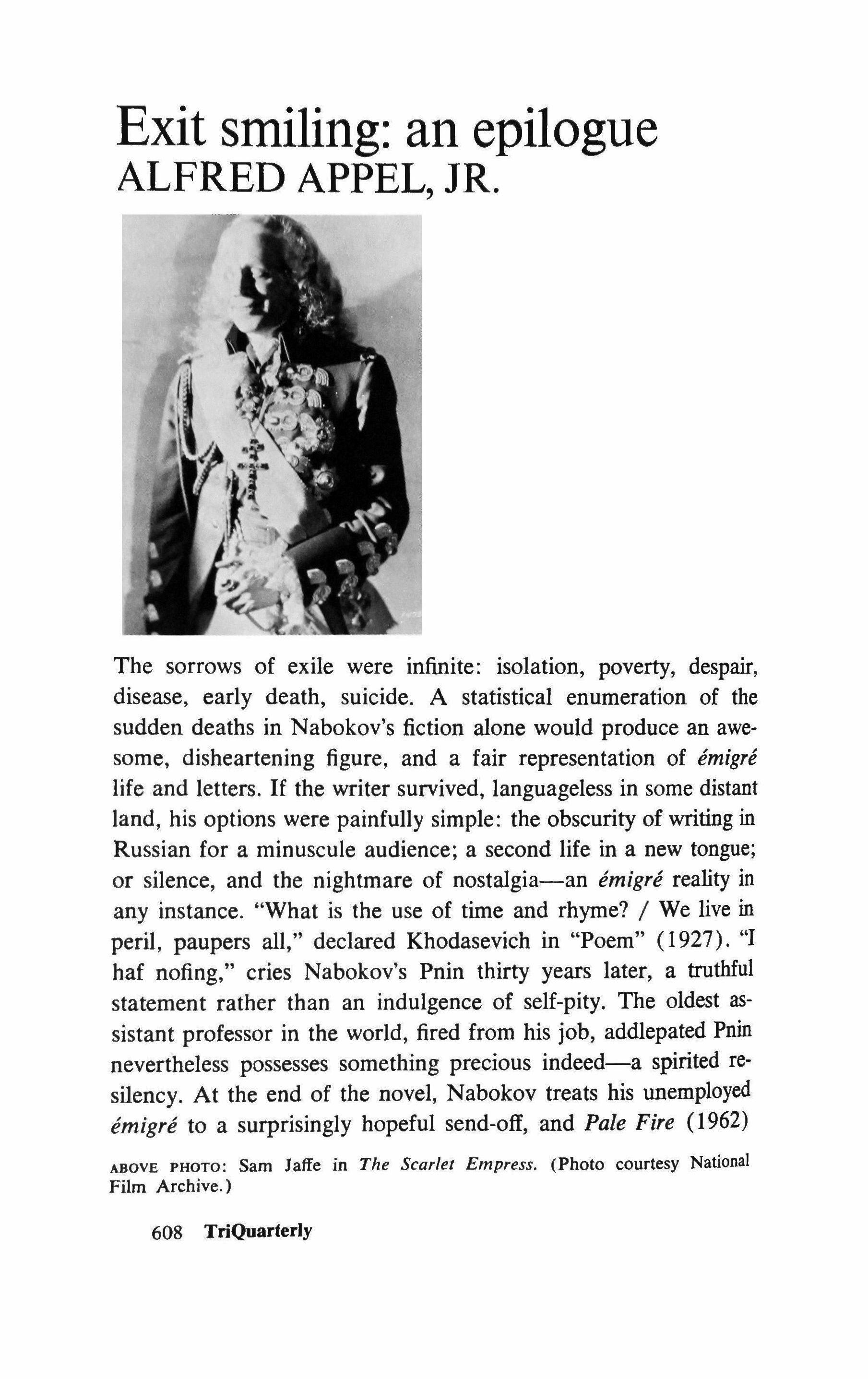
The sorrows of exile were infinite: isolation, poverty, despair, disease, early death, suicide. A statistical enumeration of the sudden deaths in Nabokov's fiction alone would produce an awesome, disheartening figure, and a fair representation of emigre life and letters. If the writer survived, languageless in some distant land, his options were painfully simple: the obscurity of writing in Russian for a minuscule audience; a second life in a new tongue; or silence, and the nightmare of nostalgia-an emigre reality in any instance. "What is the use of time and rhyme? / We live in peril, paupers all," declared Khodasevich in "Poem" (1927). "I haf nofing," cries Nabokov's Pnin thirty years later, a truthful statement rather than an indulgence of self-pity. The oldest assistant professor in the world, fired from his job, addlepated Pnin nevertheless possesses something precious indeed-a spirited resilency. At the end of the novel, Nabokov treats his unemployed emigre to a surprisingly hopeful send-off, and Pale Fire (1962)
ABOVE PHOTO: Sam Jaffe in The Scarlet Empress. (Photo courtesy National Film Archive.)
608 TriQuarterly
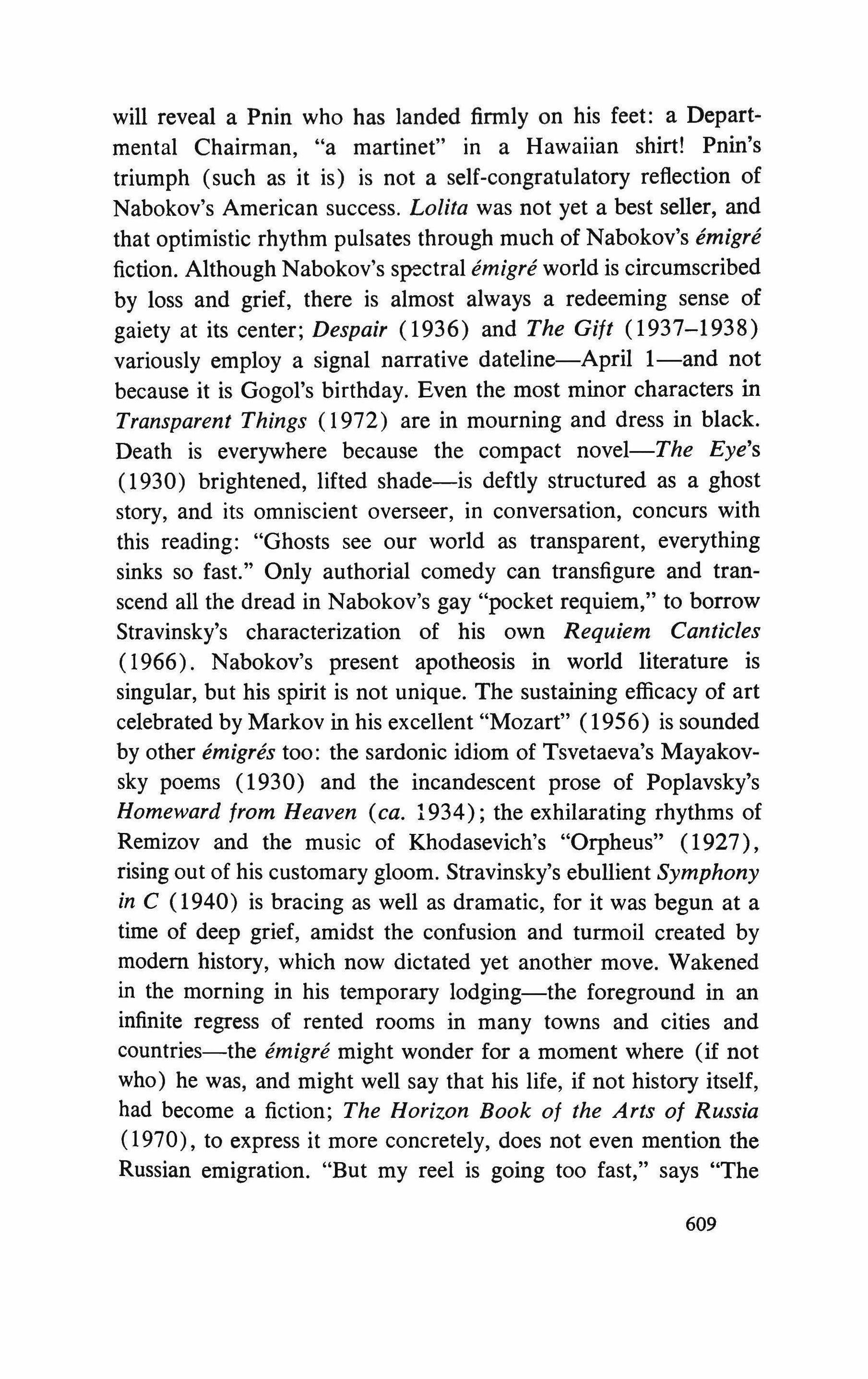
will reveal a Pnin who has landed firmly on his feet: a Departmental Chairman, "a martinet" in a Hawaiian shirt! Pnin's triumph (such as it is) is not a self-congratulatory reflection of Nabokov's American success. Lolita was not yet a best seller, and that optimistic rhythm pulsates through much of Nabokov's emigre fiction. Although Nabokov's spectral emigre world is circumscribed by loss and grief, there is almost always a redeeming sense of gaiety at its center; Despair (1936) and The Gift (1937-1938) variously employ a signal narrative dateline-April I-and not because it is Gogol's birthday. Even the most minor characters in Transparent Things (1972) are in mourning and dress in black. Death is everywhere because the compact novel-The Eye's (1930) brightened, lifted shade-is deftly structured as a ghost story, and its omniscient overseer, in conversation, concurs with this reading: "Ghosts see our world as transparent, everything sinks so fast." Only authorial comedy can transfigure and transcend all the dread in Nabokov's gay "pocket requiem," to borrow Stravinsky's characterization of his own Requiem Canticles (1966). Nabokov's present apotheosis in world literature is singular, but his spirit is not unique. The sustaining efficacy of art celebrated by Markov in his excellent "Mozart" (1956) is sounded by other emigres too: the sardonic idiom of Tsvetaeva's Mayakovsky poems (1930) and the incandescent prose of Poplavsky's Homeward from Heaven (ca. 1934); the exhilarating rhythms of Remizov and the music of Khodasevich's "Orpheus" (1927), rising out of his customary gloom. Stravinsky's ebullient Symphony in C (1940) is bracing as well as dramatic, for it was begun at a time of deep grief, amidst the confusion and turmoil created by modem history, which now dictated yet another move. Wakened in the morning in his temporary lodging-the foreground in an infinite regress of rented rooms in many towns and cities and countries-the emigre might wonder for a moment where (if not who) he was, and might well say that his life, if not history itself, had become a fiction; The Horizon Book of the Arts of Russia (1970), to express it more concretely, does not even mention the Russian emigration. "But my reel is going too fast," says "The
609

Assistant Producer" 's (1943) narrator at one point, busily recording and projecting history as "trashy entertainment"; "I want all your attention now, for it would be a pity to miss the subtleties of the situation." While Ada (1969) offers Nabokov's most ambitious, literally global translation of the theme, Pale Fire represents his most subtle and labyrinthine and personal "historical" situation; through Kinbote, Nabokov has cut the pages of Salus Rex by submitting its donnee and surviving sheets (1939) to comedy's hall of mirrors, thereby retrieving and reviving several shadows of the emigre work-in-progress literally sacrificed to history. "I do not believe that 'history' exists apart from the historian," says Nabokov, and in Pale Fire the illusory modes of memoir and historiography blend in King Charles II's Zemblan realm, Clio serving Nabokov as a zany assistant producer ("Nabokov's Dark Cinema" has been reopened, for the brief duration). "Opera bouffe!" exclaimed at least one dismayed reader, lost in Zembla's palace intrigue and extremist politics. Similar complaints, also predicated on an otiose belief in history, were made of Josef von Sternberg'S treatment of history as farce in The Scarlet Empress (1934), a film that surely learned something from the Marx Brothers' Duck Soup (1933). An intentionally illchosen wig and a bit of eye-rolling turn Grand Duke Peter (Sam Jaffe) into a veritable Harpo Marx, and Tsarina Dietrich looks considerably Greater than Russia's Catherine n. "Don't be silly! Don't be old-fashioned! This is the eighteenth century," exclaims Empress Elizabeth (Louise Dresser), exercising an extraordinary historical self-consciousness. "Get out!" she says later, "I have a war on my hands!" At his wedding, Peter chews up the sacramental wafer, another broadly "Nabokovian" reminder that the entire show is illusion, this history is fiction. The metaphor is more elaborate in Pale Fire. "We must wonder or remember," says Nabokov, contemplating history, "who exactly is telling the story," and Zembla's not altogether disinterested scholar has a penchant for young lads which affects and infects his pages. The Zemblan entries in Pale Fire's Index form a brilliant parody of chronicles (and their unreliable narrators), of neatly packaged "definitive"
610

histories and their trusting readers: "Uran [from uranist, or "homosexual," a nineteenth-century usage!-ED.] the Last, Emperor of Zembla, reigned 1798-1799; an incredibly brilliant, luxurious, and cruel monarch whose whistling whip made Zembla spin like a rainbow top; dispatched one night by a group of his sister's united favorites" (a heterosexual conspiracy?). Loaded adjectives continually fix the "truth," not without feline humor (Baron A. is succinctly immortalized as a "puny traitor"), and history's heterosexual figures are somehow less heroic than Uran the Last: the "bald spot" of stylish, womanizing Count Otar highlights his entry. A search for the buried "Crown Jewels" (q.v.) through the Index's cross-referenced entries reveals nothing, a dead end in a metagame; Alfin the Vague is Nabokov's summary monarch, and the Index self-consciously underscores its own fictiveness, as well as history's: O'Donnell, Sylvia, "was in the act of divorcing Lionel Lavender when last seen in this Index." Charles the Beloved's kingdom proper is staged as a technicolored costume extravaganza, as though anyone of the many movie versions of The Scarlet Pimpernel (1917, 1929, 1935, 1938, 1941, 1950)as various as history itself-or The Prisoner of Zenda (1927, 1937, 1952), the most famous of the Ruritanian romances of impersonation and escape, had been crossed with Laurel and Hardy's Fra Diavolo (1933) or Duck Soup, the Marxes' Ruritanian burlesque. Pale Fire's kingdom of Zembla recalls the fun-house palace of Duck Soup, with its ludicrous functionaries, uniformed guards, and mirror walls, as well as the sequence in A Night at the Opera (1935) in which Chico, Harpo, and Allan Jones (managed by Groucho) disguise themselves as the three identically bearded Russian aviators, Chicoski, Harpotski, and Baronoff. Witness Kinbote in Pale Fire, as King Charles, modestly "lectur[ing] under an assumed name and in a heavy make-up, with wig and false whiskers" (his real, immense, American-grown beard will earn him his obscene sobriquet, the Great Beaver), or the vision of him making his escape from Zembla, aided by a hundred loyalist "clowns" who, in a brilliant diversionary ploy, don red caps and sweaters identical to the king's, in their apprehension packing the 611
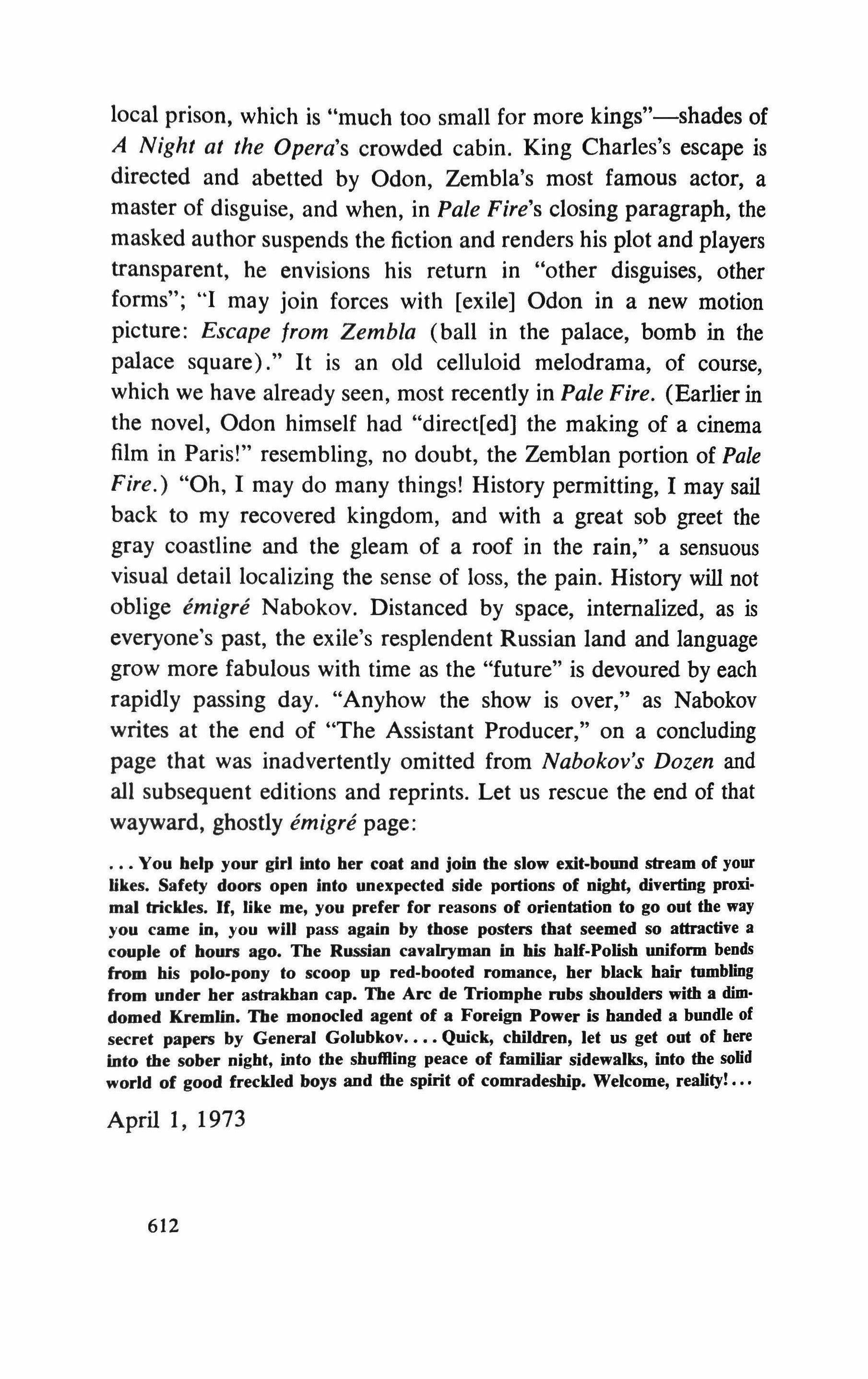
local prison, which is "much too small for more kings"-shades of A Night at the Opera's crowded cabin. King Charles's escape is directed and abetted by Odon, Zembla's most famous actor, a master of disguise, and when, in Pale Fire's closing paragraph, the masked author suspends the fiction and renders his plot and players transparent, he envisions his return in "other disguises, other forms"; "I may join forces with [exile] Odon in a new motion picture: Escape from Zembla (ball in the palace, bomb in the palace square)." It is an old celluloid melodrama, of course, which we have already seen, most recently in Pale Fire. (Earlier in the novel, Odon himself had "direct[ed] the making of a cinema film in Paris!" resembling, no doubt, the Zemblan portion of Pale Fire.) "Oh, I may do many things! History permitting, I may sail back to my recovered kingdom, and with a great sob greet the gray coastline and the gleam of a roof in the rain," a sensuous visual detail localizing the sense of loss, the pain. History will not oblige emigre Nabokov. Distanced by space, internalized, as is everyone's past, the exile's resplendent Russian land and language grow more fabulous with time as the "future" is devoured by each rapidly passing day. "Anyhow the show is over," as Nabokov writes at the end of "The Assistant Producer," on a concluding page that was inadvertently omitted from Nabokov's Dozen and all subsequent editions and reprints. Let us rescue the end of that wayward, ghostly emigre page:
You help your girl into her coat and join the slow exit-bound stream of your Ukes. Safety doors open into unexpected side portions of night, diverting proxi· mal trickles. If, Uke me, you prefer for reasons of orientation to go out the way you came in, you will pass again by those posters that seemed so attractive a couple of hours ago. The Russian cavalryman in his half·PoUsh uniform bends from his polo-pony to scoop up red-booted romance, her black hair tumbling from under her astrakhan cap. The Arc de Triomphe rubs shoulders with a dim· domed Kremlin. The monocled agent of a Foreign Power is handed a bundle of secret papers by General Golubkov Quick, children, let us get out of here into the sober night, into the shuffling peace of familiar sidewalks, into the solid world of good freckled boys and the spirit of comradeship. Welcome, reality!
April 1, 1973 612

Contributors
v. S. YANOVSKY is the author of Of Light and Sounding Brass (Vanguard Press) and The Dark Fields 01 Venus (Harcourt Brace Jovanovich) and of seven novels published in Russian. VLADIMffi MARKOV teaches Slavic Languages and Literatures at U.C.L.A. His most recent book is Russian Futurism: A History (University of California Press). He received the 1968 P.E.N. Club award for the best translation of the year for his Modern Russian Poetry (with Merrill Sparks), published by Macgibbon and Kee, London, and Bobbs-Merrill. JOAN
DELANEY GROSSMAN is an Assistant Professor of Slavic Languages and Literatures at the University of California, Berkeley. Her recent publications include "The Master and Margarita: The Reach Exceeds the Grasp," Slavic Review, March 1972. In 1971, she received an American Council of Learned Societies Fellowship to study the role of the journal Russian Thought in literary and cultural change between 1880 and 1917. BARRY JORDAN is a graduate student in Slavic Linguistics at the University of California, Berkeley. EDYTHE C. HABER is Assistant Professor of Russian at Tufts University. ROBERT P. HUGHES's article on Vladimir Nabokov appeared in TriQuarterly 17. He is an Associate Professor of Slavic Languages and Literatures, and of Comparative Literature at the University of California, Berkeley. SIMON KARLINSKY is the author of a critical biography of Marina Tsvetaeva (University of California Press), and editor and annotator of Letters of Anton Chekhov (Harper and Row). RON LOEWINSOHN teaches American Literature at the University of California, Berkeley. His most recent collections of poems include Meat Air: Poems 1957-1969 (Harcourt Brace) and The Leaves (Black Sparrow Press). ANNA KISSELGOFF is a dance critic for The New York Times. JOHN E. MALMSTAD, Assistant Professor of Russian Language and Literature at Columbia University, is the editor of The Variorum Edition of the Poetry of Andrei Belyi (Fink-Verlag) and the author of a forthcoming biography of M. A. Kuzmin.
ANTHONY OLCOTT is a graduate student in the Department of Slavic Languages and Literatures at Stanford. His publications include "The Artist's Special Intention: A Study of The Real Life of Sebastian Knight" (Russian TriQuarterly 3), and a collection (with Simon Karlinsky), Boris Poplavsky: Poetry and Prose, to be published by Fink-Verlag this year. RICHARD WILBUR was recently elected to the American Academy of Arts and

Letters. His Walking to Sleep (poems), The School for Wives (translations from Moliere), and Opposites (poems and drawings for children) have all been published by Harcourt Brace Jovanovich. ALEX M. SHANE has published articles and reviews in the Slavic and East European Journal, Slavic Review, Russian Literature TriQuarterly, and the Modern Language Journal. His The Life and Works of Evgenij Zamjatin was published by the University of California Press in 1968. He is Professor and Chairman of the Department of Slavic Languages and Literatures at the State University of New York at Albany. MIRRA GINSBURG is an editor and translator living in New York. Her recent works include Mikhail Bulgakov's Heart of a Dog (Grove), The Life of Monsieur de Moliere (Funk and WagnaIls), and Yevgeny Zamyatin's We (Viking Press). Her translation of Isaac Bashevis Singer's Altele appeared in TriQuarterly 18. BRANT BASSETI' is a graduate student in the Department of Slavic Languages and Literatures, University of California, Berkeley. L. P. IZHORSKY has spent some time in the Near East. His main occupation is travel. When last heard from, he was in Greece and, with the help of friends, hopes to move soon to an even more intriguing region. THEODORE WEISS has published six collections of poetry, most recently The World Before Us, Poems: 1950-1970 (Macmillan). His The Breath of Clowns and Kings: Shakespeare's Early Comedies and Histories was published by Chatto & Windus, London, and by Atheneum. He is completing a new book of poems, Open Season. CHARTY BASSETf is a graduate student in Russian Literature at the University of California, Berkeley. ALFRED APPEL, JR.'s books include The Annotated Lolita (a McGraw-Hill paperback) and a previous TriQuarterly co-editorship, Nabokov (available as a Clarion paperback). His contribution to this issue is an excerpt from his forthcoming book, Nabokov's Dark Cinema. A Guggenheim Fellow for 1972-73, he is presently on leave from Northwestern University, writing a study of Nabokov and, for relaxation, I Love You, Too: The American Film Noir, 1941-1958. ELIZABETH SHEPARD is a Research Associate at the Center for Slavic and East European Studies, University of California, Berkeley. PARKER TYLER is a poet and critic whose work includes The Divine Comedy of Pavel Tchelitchew (Fleet), for which he received grants from the Chapelbrook, Ford, Ingram-Merrill, and Guggenheim Foundations, and a recent volume of verse, The Will of Eros:

Selected Poems 1930-1970 (Black Sparrow Press). The Shadow of an Airplane Climbs the Empire State Building: A World Theory of Film was published by Doubleday. TATIANA KUSUBOVA is a graduate student at the University of California, Berkeley, completing a dissertation on Konstantin Korovin as writer. She spent 1971-72 in France collecting biographical data on Korovin on a grant from the University of California. OLGA HUGHES is an Associate Professor of Slavic Languages and Literatures at the University of California, Berkeley. She is author of "Pasternak and Cvetaeva: History of a Friendship" (Books Abroad) and a forthcoming book on Pasternak to be published this year by Princeton University Press. PETER YATES and his wife Frances founded the Evenings on the Roof chamber concerts in their Los Angeles home in April 1939-now the Monday Evening concerts. Mr. Yates began writing about music in 1940 for Arts and Architecture and continued his monthly column under that title for 27 years. He has published two books, An Amateur at the Keyboard and Twentieth Century Music. He became, in 1968, Professor and Chairman of the Music Department, State University College, Buffalo, N.Y. VALENTINE MARCADE is the author of a recent book on Russian twentieth century painting. JEAN-CLAUDE MARCADE is a Russian Art History and Literature scholar. The Marcades live in Paris. CZESLAW MILOSZ' most recent publications are his autobiography, Native Realm (Doubleday) and History of Polish Literature (Macmillan). He is a poet and translator and Professor of Slavic Languages and Literatures, University of California, Berkeley. PAUL SCHMIDT's volume of translations of Arthur Rimbaud will appear this year. Mr. Schmidt is currently teaching Russian Literature at the University of Texas, Austin, and completing a doctoral dissertation on Soviet Theatre in the 1920's. HELENE ISWOLSKY has recently published a translation of Mikhail Bakhin's study of Rabelais, and is the author of two memoirs on Marina Tsvetaeva. DANIEL BURES is the author of The Negative Potential, a volume of poems, and The Mind Machine, a collection of short fiction. ISABELLA LEVITIN is married to V. S. Yanovsky and is a translator of his work into English. VLADIMIR NABOKOV's most recent work is a novel, Transparent Things (McGraw-Hill). "Torpid Smoke" and "Solus Rex" are stories from his collection A Russian Beauty and Other Stories, to be published by McGraw-Hill, Spring 1973.

�
FictIon II
TrlQu.rterly 29 400 .,..... of the beat fiction d criticism being written. Probably not at your book '
•• Coupon � �w To: TrtGualWrlv, Unhrer8ltv 1 101, m UnlvereltV, IEoInston, IL 80201. Y me eop,(IH' of TrtQu"'rIJ 29 -' $2.15. PIe ..., aubecrlpllan for V (1 vr. $7.00, 2 VI"8. $12, 3 VI"8o $17; for.lgn 8dd 75c po.bIg. per V••". I encloM � bIII �----------------------------Acldr CItV ________.5tMe ZIp (I' VOU .re not .,...aed, w. wHl, o' cour fund vour moneV.'








































































































































































































































































